- A 1UJl1e11aby
JOHNNY PAYNE - EtImojiaitmby
JOHN STEWART - Surjiaion/mtijiaionby
RAYMOND FEDERMAN AND GEORGE CHAMBERS
-Stm'iesby
ANrONYA NElSON AND DAN CHAON

-Atulby
DAVE SMITH,STERLING PLUMPP, PETER READING, JAYANTA
MAHAPATRA, RENATE WOOD, REGINALD SHEPHERD, JosE EMILIO
PACHECO AND DoN SlAP - Writi�anJ Thinking at theEnJofan�
HENRY S. BIENEN
EWA KURYLUK """"'�""'�
ELISABETH SIFTON
ADAM lAGAJEWSKI
TED SoLOTAROFF
JOSEF KROUTVQRJ
EucE ScHMtmR.
Publication of TriQuarterly is made possible in part by the donors of gifts and grants to the magazine. For their recent and continuing support, we are very pleased to thank the Illinois Arts Council, the Lannan Foundation, the John D. and Catherine T. MacArthur Foundation, the National Endowment for the Arts, the Sara Lee Foundation, the Wendling Foundation, and individual donors.
TriQuarterly also thanks the following recent donors and life subscribers:
Simon J. Blattner, Jr.
Louise Blosten
Paul Brownfield
Robert Creamer
Eleanore Devine
W. S. Di Piero
John B. Elliott
Mr. and Mrs. H. Bernard Firestone
Mr. and Mrs. C. Dwight Foster
Martha Friedberg
Amy Godine
Jay Harkey
Mr. and Mrs. David C. Hilliard
Irwin T. Holtzman
Helen Jacob
Loy E. Knapp
Greg Kuzma
Patrick Mangan
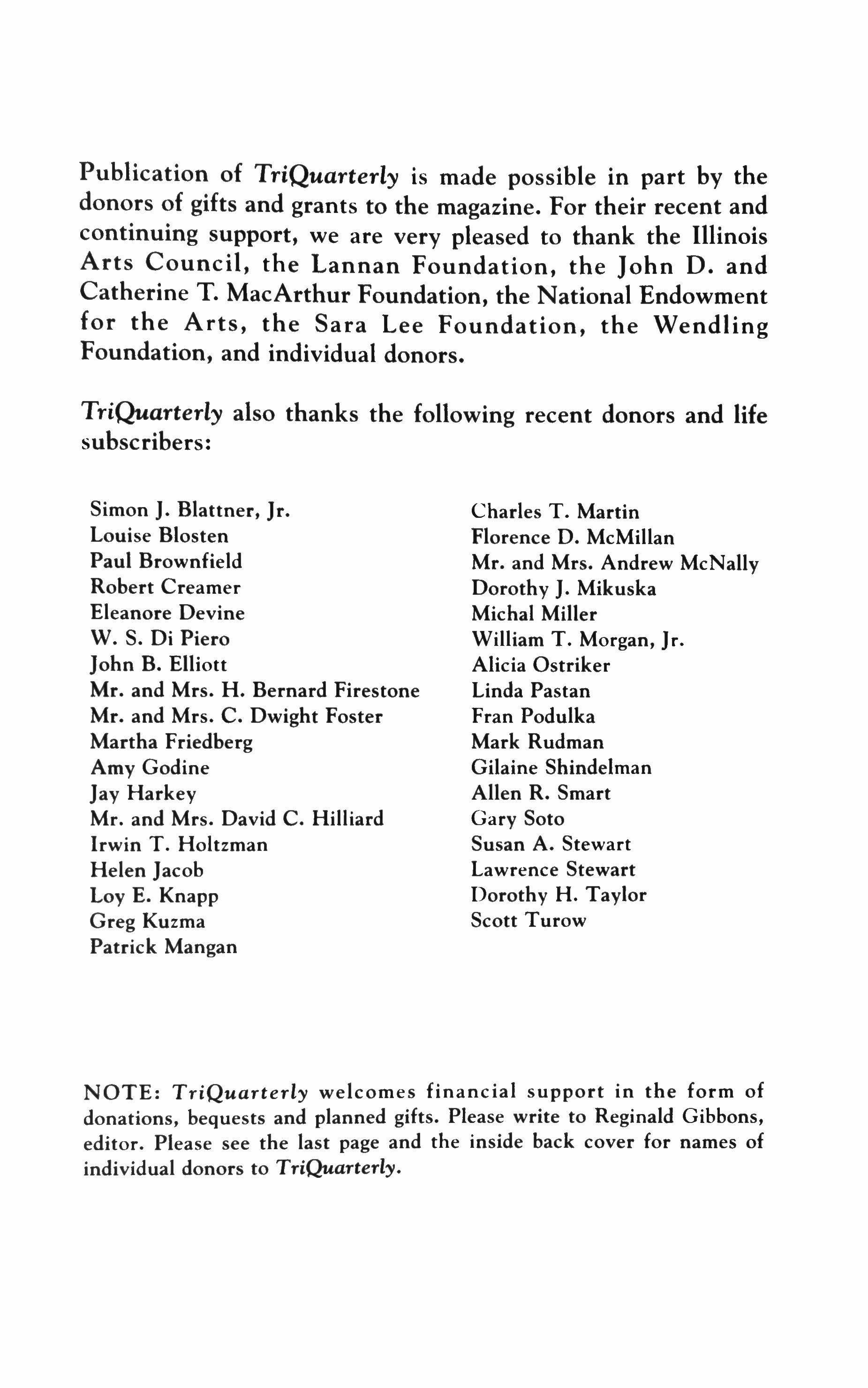
Charles T. Martin
Florence D. McMillan
Mr. and Mrs. Andrew McNally
Dorothy J. Mikuska
Michal Miller
William T. Morgan, Jr.
Alicia Ostriker
Linda Pastan
Fran Podulka
Mark Rudman
Gilaine Shindelman
Allen R. Smart
Gary Soto
Susan A. Stewart
Lawrence Stewart
Dorothy H. Taylor
Scott Turow
NOTE: TriQuarterly welcomes financial support in the form of donations, bequests and planned gifts. Please write to Reginald Gibbons, editor. Please see the last page and the inside back cover for names of individual donors to TriQuarterly.

FALL 1995 BOOKS AND BACKLIST
presenting two first books: DAVID BARBER
The Spirit Level

76 pages
$29.95, cloth (0-8101-5023-9)
$12.95, paper (0-8101-5024-7)
DANCHAON
Fitting Ends
250 pages
$35, cloth (0-8101-5021-2)
$14.95, paper (0-8101-5022-0)
Winner of the 1995 Terrence Des Pres Prize for Poetry
Representing the world as a place of feverish energies, Barber creates a virtuoso tension between playful, sometimes flamboyant, diction and the seriousness of his concerns. Filled with rich detail and striking metaphor, his poetry is both technically brilliant and irresistibly inviting.
David Barber is the assistant poetry editor at the Atlantic Monthly and the recipient of a PENINew England Discovery Award for poetry. The Spirit Level is his first published book of poems.
In thirteen deft stories, Dan Chaon details the almost panicked angst of the American generation now approachingthirty. Unnerved by the discrepancy between their youthful expectations and the experience of adult reality, his characters long for understanding but are thwarted by failed love, familydisruptions, dulling work and sexual confusion.
It is the telling, the subtle shifts of perspective, and the transfonnation ofcharacter in a shortspace that distinguish Chaon as a writer to watch.
-LIBRARY JOURNAL
Dan Chaon has published stories in Ploughshares, American Short Fiction and Story among otherjournals.
w. S. DI PIERO
Shadows Burning
Few other poets of his generation have succeeded in forging a style as original as w. s. Di Piero's. This sixth volume moves backward through the poet's life and American history, returning to origins both cultural and personal. With imaginative and linguistic power, Di Piero creates an elusive proportioning, a mourning and celebrating of his material.
In its intense preoccupation with change,hopelessness and thefrailty ofwhatevercontinuities ofmemory and imagination we devise to order the unorderable, [Shadows Burning] makes an importantcontribution to American poetry. -Alan Shapiro
EUGENE GARBER
The Historian
Winner of the 1992 William Goyen Prize for Fiction
This rollickingmetaphysical tale takes readers on a rich fictional odyssey that is a meditation on the American character and experience. The historian's quest to find the American Woman, whose vitality has been all but written out ofhistorybypuritan consciousness, leads him to muses, lovers, figures ofsensual liberation, frontierswomen and powerfulagents for social change. Thebattle between myth and fact, between romance and science, to grasp the soul of historythe so-called truth of a given time-is at the heart ofGarber's compelling tale.
FIRST PAPERBACK PUBUCATION
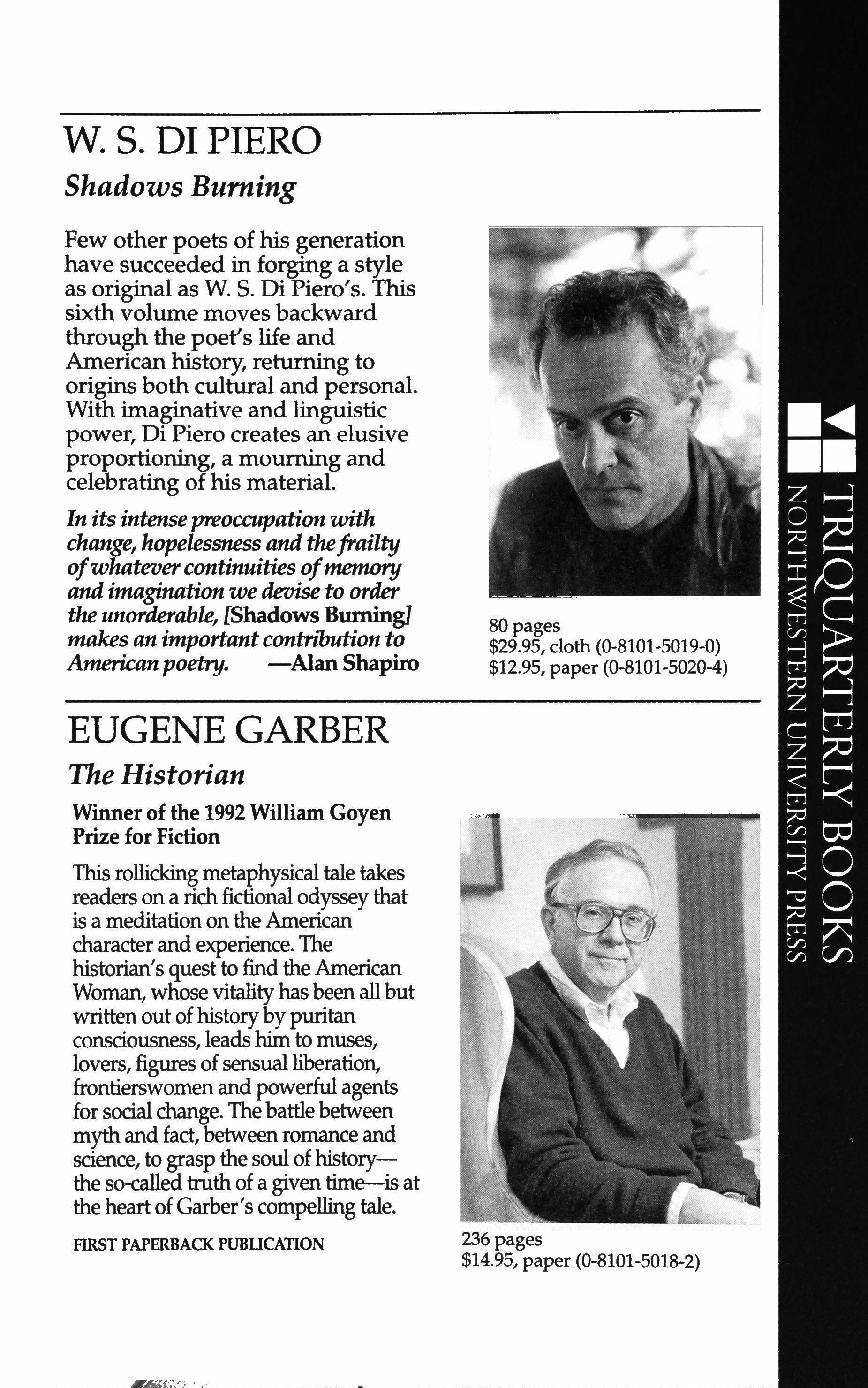
80 pages $29.95, cloth (0-8101-5019-0) $12.95, paper (0-8101-5020-4)
236 pages $14.95, paper (0-8101-5018-2)
THEODORE WEISS
Selected Poems

This definitive selection of poems by one of America's most distinguished and original poets recovers work that is immensely contemporary and at the same time reaches back to the roots of an accomplished generation of poets that includes Lowell, Jarrell, Berryman and Bishop. Weiss's distinctive, idiosyncratic poems, noted for their syntactic compression and linking of intimate experience and historical incident, are a majoraccomplishment. [Weiss'spoetry] is among the most valuable work produced in our time.
-James Merrill
ADRIAN C. LOUIS
Vortex ofIndian Fevers
260 pages
$49.95, cloth (0-8101-5037-9)
$15.95, paper (0-8101-5040-9)
Beautifully aglow with the love of language.
-James Tate
Prophetic, terrifyingly intelligent, unconditionallygermane.
-Hayden Carruth
Wordplay,metaphoricbrilliance, technical virtuosity and a scathingly sardonic critique of selfand society fill this new collection Louis celebrates life amid hardship and self-destructiveness, and consecrates a part of the past as a source ofideals for the present. N. Scott Momaday has characterized Louis's work as /I acceptance and defiance brought into delicatebalance." Fueledby both anger and irony, Louis analyzes, excoriates,jests, praysand mourns. The result is psychologically and culturallycomplex.
76 pages
$29.95, doth (0-8101-5017-4)
$11.95, paper (0-8101-5042-5)
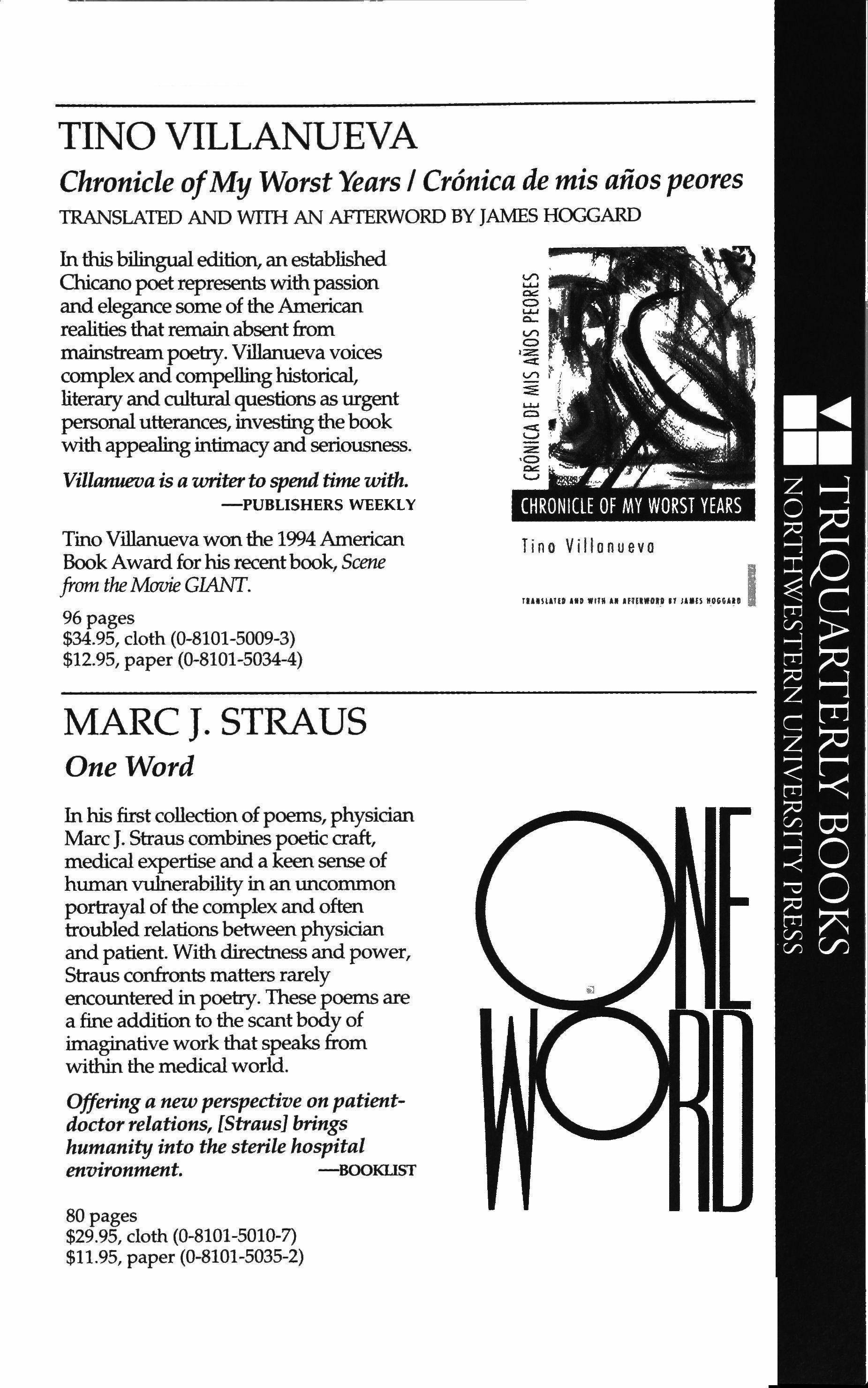
TINO VILLANUEVA
Chronicle ofMy Worst Years I Cronica de mis aiios peores
TRANSLATED AND WTIH AN AFTERWORD BY
In this bilingualedition, an established Chicano poetrepresents withpassion and elegance some of the American realities that remain absent from mainstream poetry. Villanueva voices complex and compellinghistorical, literary and cultural questions as urgent personal utterances, investing the book with appealingintimacyand seriousness.
Villanueva is a writer to spend time with.
-PUBLISHERS WEEKLY
Tino Villanueva won the 1994 American Book Award for his recentbook, Scene from theMovie GIANT.
96 pages
$34.95, cloth (0-8101-5009-3)
$12.95, paper (0-8101-5034-4)
MARC J. STRAUS
One Word
In his first collection of poems, physician Marc J. Straus combines poetic craft, medical expertise and a keen sense of human vulnerability in an uncommon portrayal of the complex and often troubled relations between physician and patient. With directness and power, Straus confronts matters rarely encountered in poetry. These poems are a fine addition to the scant body of imaginative work that speaks from within the medical world.
Offering a new perspective on patientdoctor relations, [Straus1 brings humanity into the sterile hospital environment. -BOOKLlST
80 pages
$29.95, cloth (0-8101-5010-7)
$11.95, paper (0-8101-5035-2)
JAMES HOCGARD
"US"'" ," tr ,UIl 1
Tino Villonueva
DIANE GLANCY
Monkey Secret
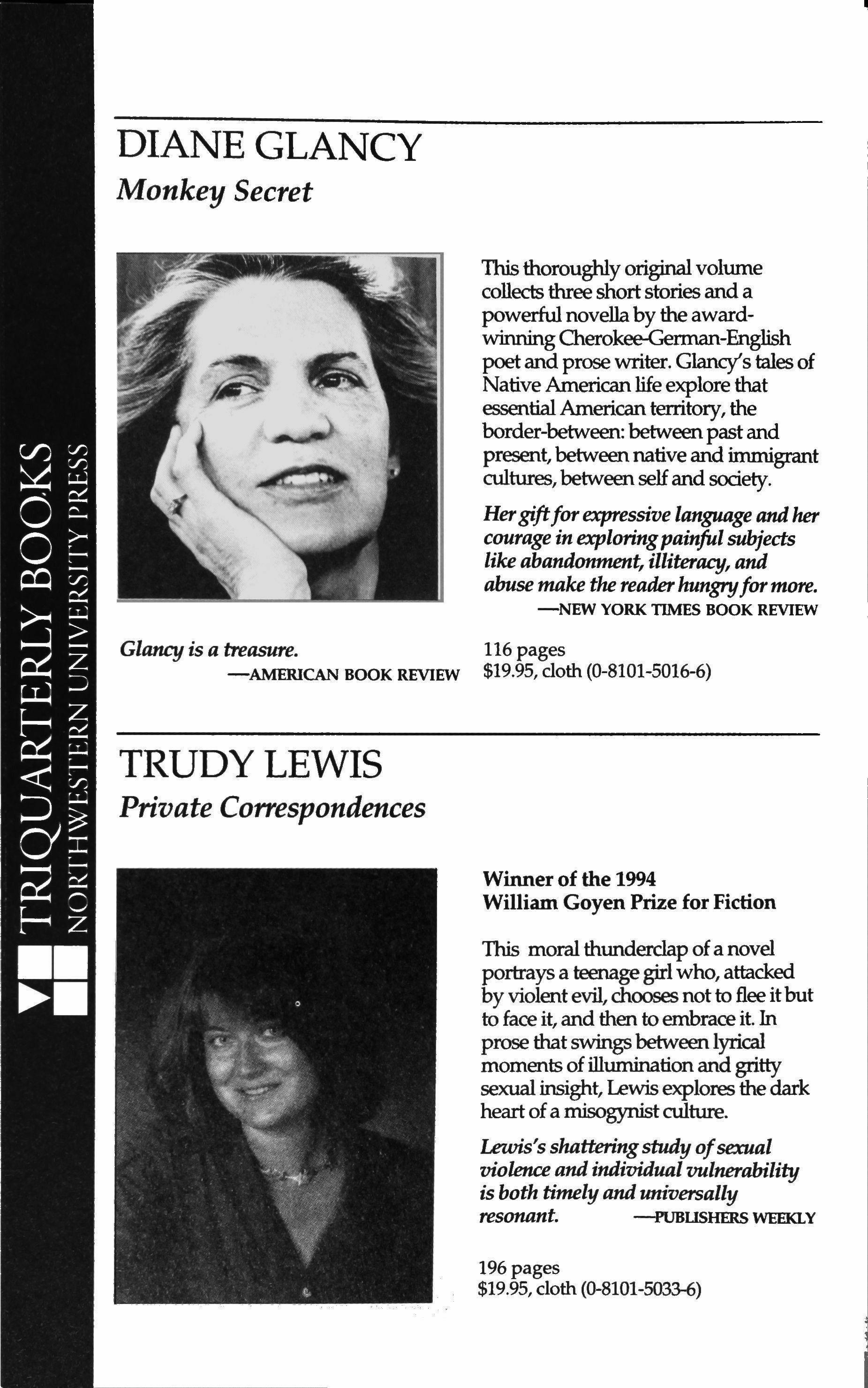
This thoroughlyoriginal volume collects three short stories and a powerful novellaby the awardwinningCherokee-Gennan-English poet and prose writer. Glancy's tales of Native American life explore that essentialAmerican territory, the border-between:between past and present, between native and immigrant cultures,between selfand society.
Hergiftforexpressivelanguage and her courage in exploringpainfulsubjects like abandonment, illiteracy, and abuse make the readerhungryfor more. -NEW YORK TIMES BOOK REVIEW
Glancy is a treasure.
116 pages -AMERICAN BOOK REVIEW $19.95, cloth (0-8101-5016-6)
TRUDY LEWIS
Private Correspondences
VVnruner of the 1994 VVilliam Goyen Prize for Fiction
This moral thunderclap of a novel portrays a teenagegirlwho, attacked by violentevil, chooses not to flee itbut to face it, and then to embrace it. In prose that swings between lyrical moments ofillumination and gritty sexual insight, Lewis explores the dark heart of a misogynistculture.
Lewis's shatteringstudyofsexual violence and individual vulnerability is both timely and universally resonant. --PUBUSHERS WEEKLY
196 pages $19.95, doth (0-8101-5033-6)

CYRUS COLTER
A Chocolate Soldier
Colter's fourth novel is a cautionary tale of revolutionary dreams, bitter realities, and the persistence of both hope and falsehood. A kind of historical fable about the possibilities and perils of black revolution within and against twentieth-century white America, this novel is brilliantly structured and voiced. It is Colter's greatest and crowning work, and no reader will forget the tale it tells.
This powerful writer should win the attention ofevery serious reader of fiction.
SATURDAY REVIEW
278 pages $14.95, paper (0-8101-5038-7)
CYRUS COLTER
The Hippodrome
Set in a Chicago seething with physical and psychological violence, this novel examines power and exploitation and their entanglement with sexuality.
In the tradition ofhisfictional ancestors, Dostoevsky and Faulkner, [Colter] has produced a work which uses the world of everyday reality in a manner beyond the scope ofjournalism or sociology-as an entree to the soul.
-Jailles Park Sloan CHICAGO SUN-TIMES
Colter is a writer ofdistinction. --{CHOICE
214 pages $13.95, paper (0-8101-5036-0)
� • • • • , • • :n �: ".,C' ,.. (>�, .., .\ cIIC)C!()I••\ a r I: S() I. ') II� I�
WILLIAM GOYEN
Arcadio
Completed while he was dying, William Goyen's Arcadio is one of the most affecting and imaginative farewells to life ever written.
Arcadio, whose voice is inimitably Goyenesque, is a creature from beyond the normal walks of life. Half man, half woman, raised in a whorehouse and for years the veteran exhibitionist of an itinerant circus sideshow, he has escaped from the show and has been wandering in a quest for his lost family. Speaking intimately and secretly to the reader, he tells the bizarre and fantastic tale of his life.
148 pages $12.95, paper (0-8101-5006-9)
WILLIAM GOYEN
Half a Look of Cain: A Fantastical Narrative
Chris, whose leg is injured, and his lover Stella, with whom he lives in a ruined, abandoned house; Chris's male nurse; Marvello, the circus aerialist; a lighthouse keeper; a flagpole-sitter in small-town America-these are the creatures of William Goyen's visionary fable of love, lust and loneliness. Because of its central focus on the erotic and its unusual novelistic form, Halfa Look ofCain was rejected in the 1950s by Goyen's publisher. The first publication of this novel inaugurates a TriQuarterly Books/Northwestern University Press plan to publish and reprint all of Goyen's out-ofprint work.
[Arcadio] virtuallypulses with life; it is both audacious and wise; a timelessfable that manages to be boldlycontemporary as well.
-Joyce Carol Oates
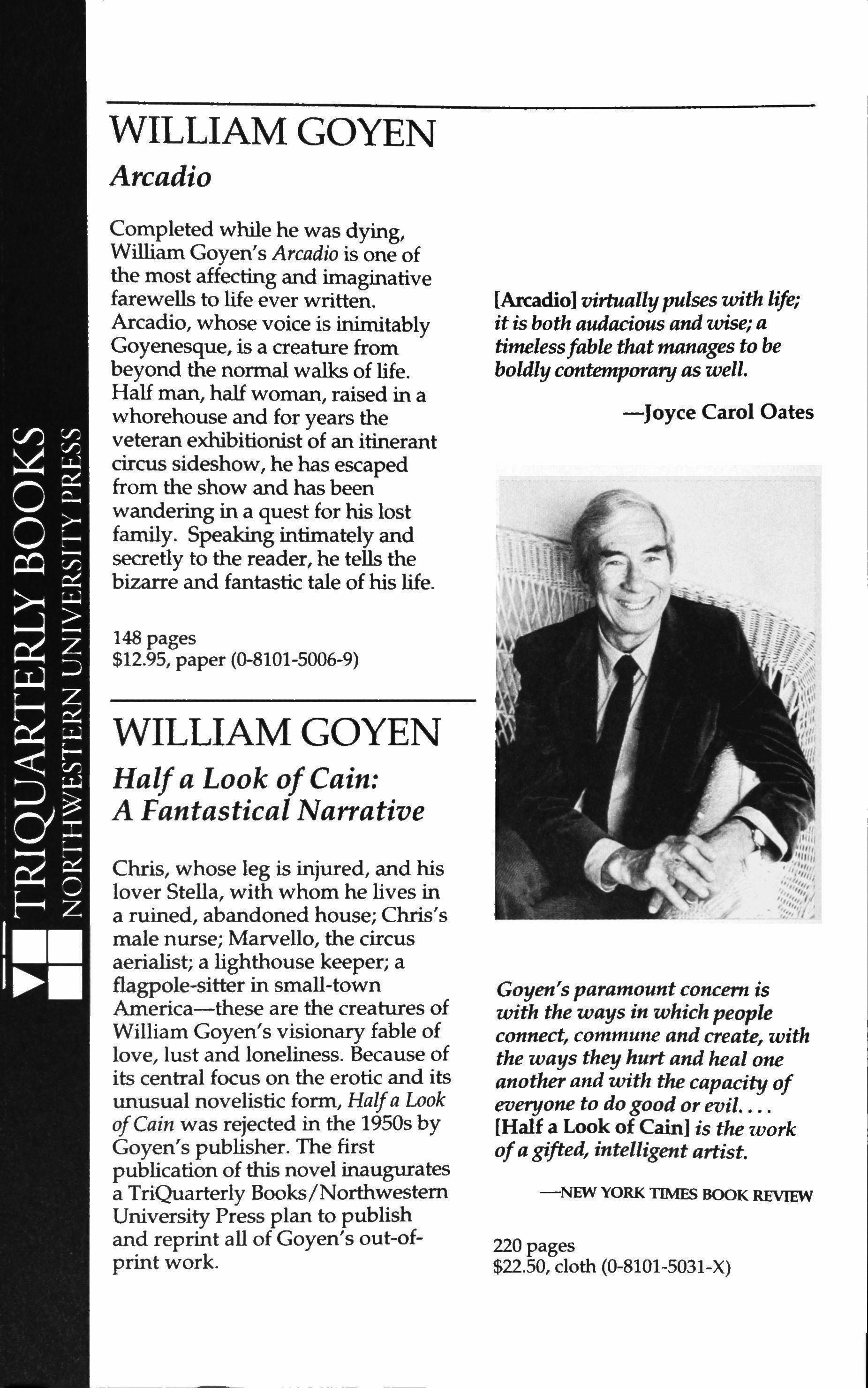
Goyen'sparamount concern is with the ways in which people connect, commune and create, with the ways they hurt and heal one another and with the capacity of everyone to do good or evil [Half a Look of Cain] is the work of a gifted, intelligent artist.
-NEW YORK TIMFS BOOK REVIEW
220 pages $22.50, cloth (0-8101-S031-X)
WILLIAM GOYEN
In a Farther Country
Subtitled II A Romance," In a Farther Country is an intense performance, both lyrical and colloquial, shaped as a series of meditative narratives. Set in a Spanish arts factory in New York City, the novel grows around the conflict of its main character's mixed ancestry. Marietta McGee-Chavez and her friends and acquaintances populate a world in which they experience dreams and reality, sexual desire and loneliness, triumph and defeat. This is the first paperback edition of Goyen's small neglected masterpiece.
182 pages
$13.95, paper (0-8101-5039-5)
ANNE CALCAGNO
PrayforYourself
Anne Calcagno vividly captures the textures of women's lives in this exhilarating collection of short stories. Her characters grapple with problems ranging from domestic violence to obsessiveness with body weight; the dramatic situations are extreme, edgy and utterly convincing.
Calcagno has the clean voice and sharp unblinking eye of a true storyteller.
-Larry Heinemann
Language as maddeninglyfascinating as a fifty-car locomotive, perfectly carved, from a singlepiece ofwood.
-Lynda Barry
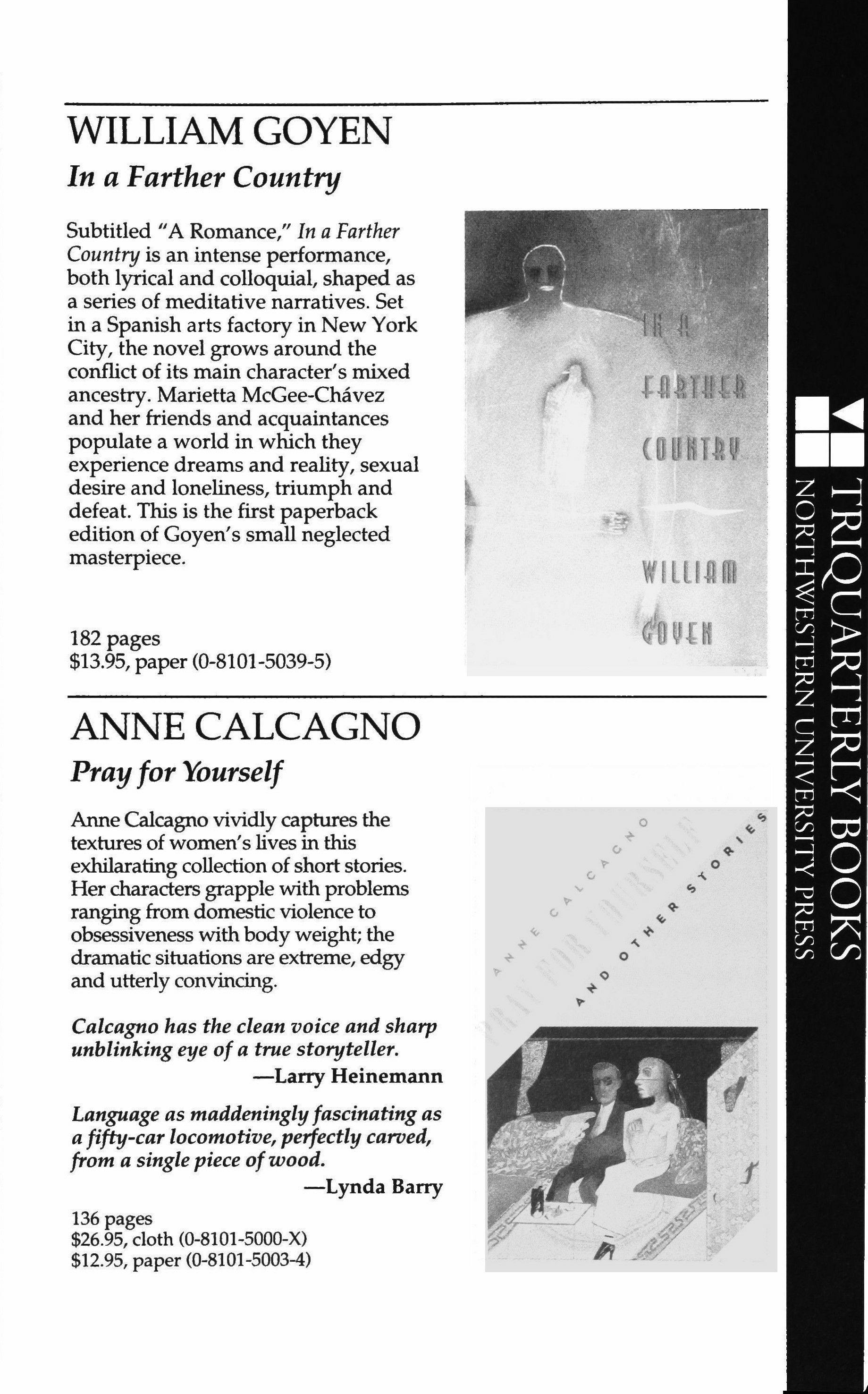
136 pages
$26.95, cloth (0-8101-5000-X)
$12.95, paper (0-8101-5003-4)
�-UVt"
WIUBUI
CAROL FROST
Pure
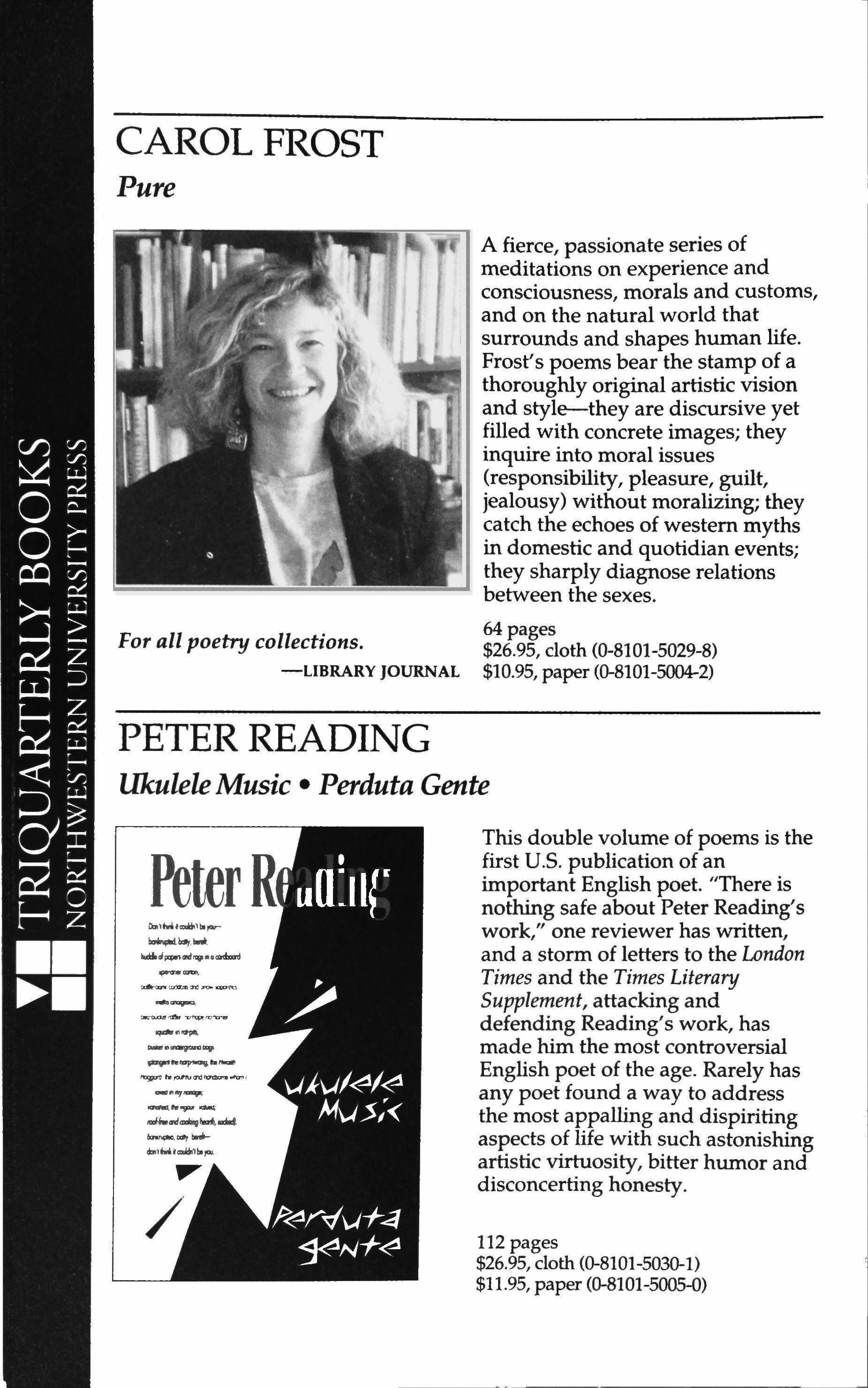
For all poetry collections. -LIBRARY JOURNAL
PETER READING
A fierce, passionate series of meditations on experience and consciousness, morals and customs, and on the natural world that surrounds and shapes human life. Frost's poems bear the stamp of a thoroughly original artistic vision and style-they are discursive yet I filled with concrete images; they inquire into moral issues (responsibility, pleasure, guilt, jealousy) without moralizing; they catch the echoes of western myths in domestic and quotidian events; they sharply diagnose relations between the sexes.
64 pages
$26.95, cloth (0-8101-5029-8)
$10.95, paper (0-8101-5004-2)
UkuleleMusic • Perduta Gente
DllMlJII.-patqjJ
This double volume of poems is the first u.s. publication of an important English poet. "There is nothing safe about Peter Reading's work," one reviewer has written, and a storm of letters to the London Times and the Times Literary Supplement, attacking and defending Reading's work, has made him the most controversial English poet of the age. Rarely has any poet found a way to address the most appalling and dispiriting aspects of life with such astonishing artistic virtuosity, bitter humor and disconcerting honesty.
112 pages
$26.95, cloth (0-8101-5030-1)
$11.95, paper (0-8101-5005-0)
� ltlIJ1P1)"tohua'I:J�-"OT<1 -".,�
ANGELA JACKSON
Dark Legs and Silk Kisses: The Beatitudes ofthe
Wmnerofthe Carl SandburgAward andthe 1993 Chicago Sun-TImes Book ofthe YearAward in Poetry
AngelaJacksonbrings remarkable gifts to the articulation of African-American experience. Her poetry features an impressivevariety of characters exploring social identity, the rituals of race relations, the female psyche, creativity and spiritual experience.
Angela Jackson has known,for long, what is rightfor her attention and scrupulous investigation.
-Gwendolyn Brooks

120 pages
$25, cloth (0-8101-5026-3)
$11.95, paper (0-8101-5001-8)
TIMOTHY RUSSELL
Adversaria
Wmnerofthe 1993 Terrence Des Pres Prize forPoetry
Adversaria celebrates the rough beauty of ordinary life and laments its inevitable decline. These poems, titled in Latin, combine colloquial style with a late imperial tone to capture the stark contrasts and contradictions of a life lived between a steel mill and the quiet, graceful natural world.
To read Adversaria is to be in the presence of a lively and supple and various mind, as tough as it is American.
104 pages
$25, cloth (0-8101-5027-1)
-Li-Young Lee
$10.95, paper (0-8101-5002-6)
Spinners
"""UI:IIII (II' fltl �".1 T llle,.CIII DU. ""'IU ".101.. '011 rOlTIliT -.ussell
MURIEL RUKEYSER
Out of Silence: Selected Poems
EDITED BY KATE DANIELS
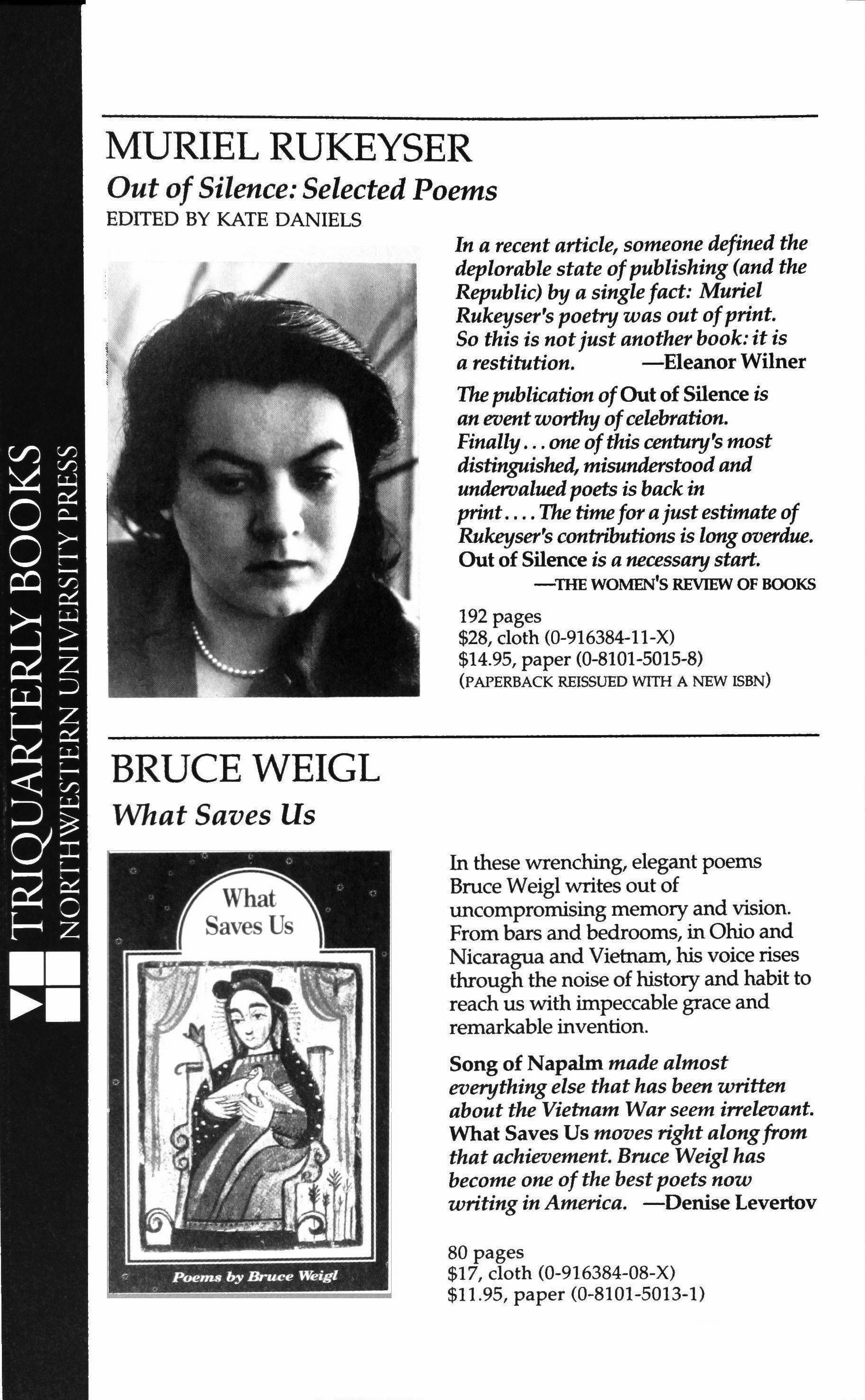
In a recent article, someone defined the deplorable state ofpublishing (and the Republic) by a singlefact: Muriel Rukeyser's poetry was out ofprint. So this is notjust another book: it is a restitution. -Eleanor Wilner
ThepublicationofOut of Silence is an event worthy ofcelebration. Finally one ofthis century's most distinguished, misunderstoodand undervaluedpoets is back in print The timefor a just estimate of Rukeyser's contributions is long overdue. Out of Silence is a necessary start.
-THE WOMEN'S REVIEW OF BOOKS
192 pages
$28, cloth (0-916384-11-X)
$14.95, paper (0-8101-5015-8) (PAPERBACK REISSUED WITH A NEW ISBN)
BRUCE WEIGL
What Saves Us
In these wrenching, elegant poems Bruce Weigl writes out of uncompromising memory and vision. From bars and bedrooms, in Ohio and Nicaragua and Vietnam, his voice rises through the noise of history and habit to reach us with impeccable grace and remarkable invention.
Song of Napalm made almost everything else that has been written about the Vietnam War seem irrelevant. What Saves Us moves right alongfrom that achievement. Bruce Weigl has become one ofthe bestpoets now writing in America. -Denise Levertov
80 pages
$17, cloth (0-916384-08-X)
$11.95, paper (0-8101-5013-1)
LINDA McCARRISTON
Eva-Mary
1991 National Book Award Finalist
Wmner ofthe 1991 Terrence Des Pres Prize forPoetry
NOW IN A FOURTH PRINTING!
An extended poetic meditation on suffering and change, on cruelty and innocence, on love and endurance.
Eva-Mary l
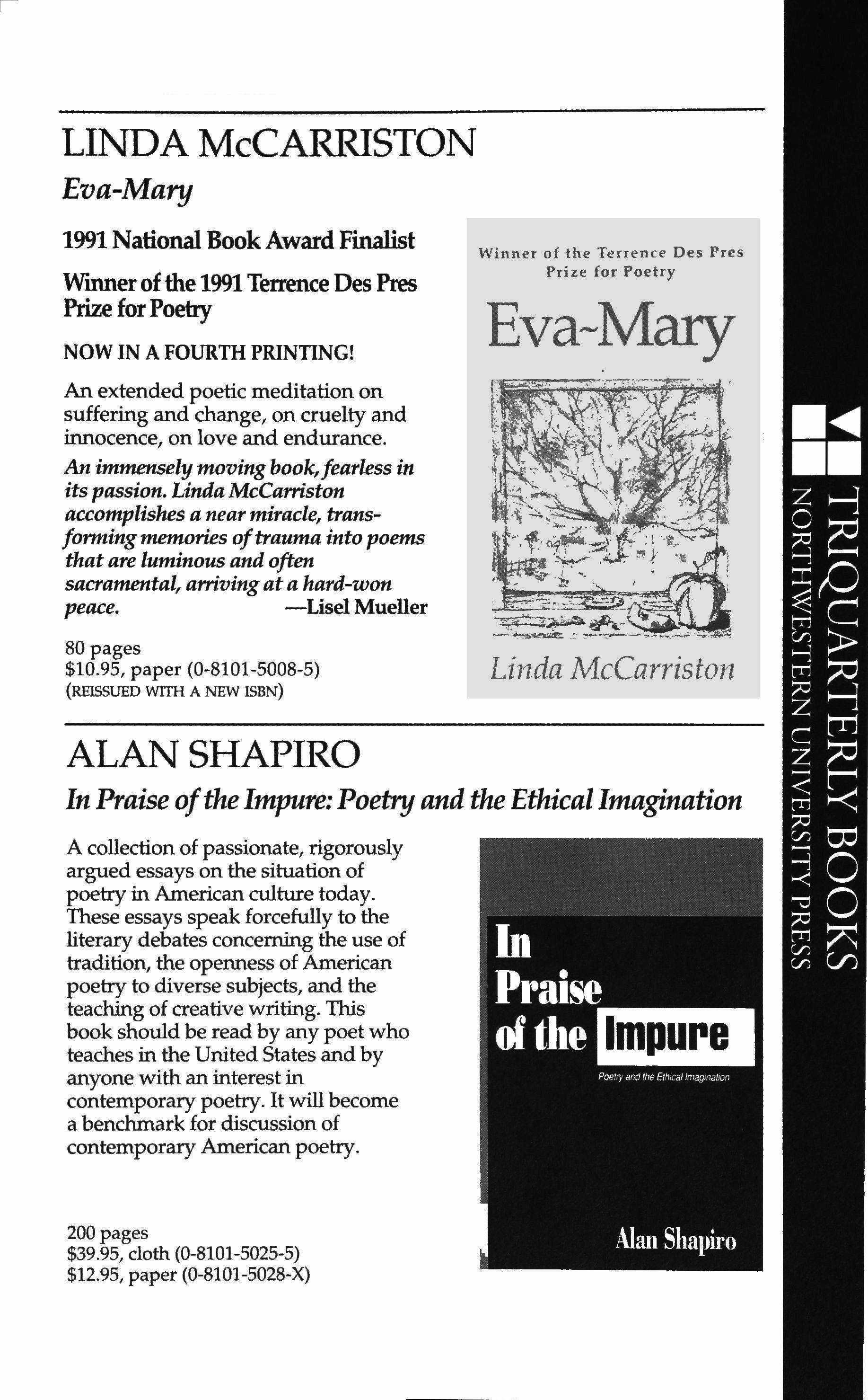
An immenselymovingbook,fearless in its passion. Linda McCarriston accomplishes a near miracle, transforming memories oftrauma into poems that are luminous and often sacramental, arriving at a hard-won peace.
80 pages
-Lisel Mueller
$10.95, paper (0-8101-5008-5) (REISSUED WITH A NEW ISBN)
ALAN SHAPIRO
In Praise ofthe Impure:Poetry and the Ethical Imagination
A collection of passionate, rigorously argued essays on the situation of poetry in American culture today. These essays speak forcefully to the literary debates concerning the use of tradition, the openness of American poetry to diverse subjects, and the teaching of creative writing. This book should be read by any poet who teaches in the United States and by anyone with an interest in contemporary poetry. It will become a benchmark for discussion of contemporary American poetry.
200 pages
$39.95, cloth (0-8101-5025-5)
$12.95, paper (0-8101-5028-X)
Winner of the Terrence Des Pres Prize for Poetry
Linda McCarriston
EVAN ZIMROTH
Dead, Dinner, or Naked

We hear in these poems a song of tenderness, anger, intelligence and wit. Evan Zimroth's erotic, intense poems are rooted in history, myth and everyday life. Her strong, singular voice makes us look where we might not have looked, see what we might have missed, face what we would avoid.
I love the combination ofsmartness, pain, and what one might call conscious postmodem trashiness in this book A profoundly urban book, ofharsh memory andfantasy, set in harsher reality. -Alicia Ostriker
80 pages
$15, cloth (0-916384-10-1)
$8.95, paper (0-916384-14-4)
Fiction ofthe Eighties
Edited by Reginald Gibbons and Susan Hahn
This landmark anthologyhonoring TriQuarterly's 25th anniversary includes 47 of the best short stories to have appeared in the magazine over the past decade. The stories range widely over the experience of modern life, and share a high level of artistry. An incomparable primer of the contemporarypossibilities of fiction.
Forcontemporaryfiction [Fiction ofthe Eighties] is a standard-bearer The multiplicity and depth ofthefictional lives here are astonishing wisdom and wildness ofwriters too numerous to thank. -PUBllSHERS WEEKLY
592 pages
$26.95, cloth (0-916384-05-5)
$16.95, paper (0-916384-06-3)
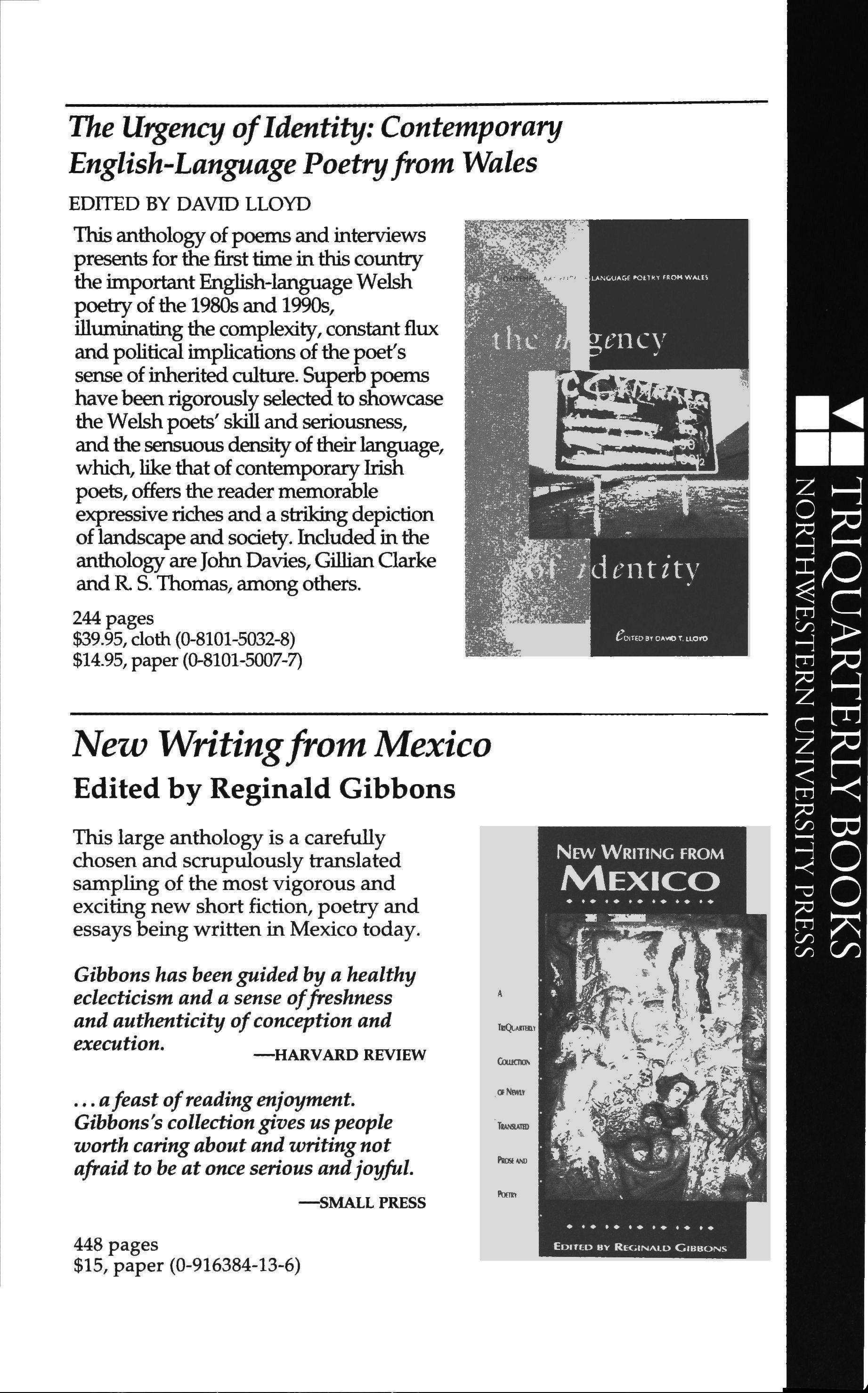
The Urgency ofIdentity: Contemporary English-Language
Poetryfrom Wales
EDITED BY DAVID LLOYD
This anthology ofpoems and interviews presents for the first time in this country the importantEnglish-language Welsh poetry of the 1980s and 1990s, illuminating the complexity, constant flux and politicalimplications of the poet's sense of inherited culture. Superb poems have been rigorously selected to showcase the Welsh poets' skill and seriousness, and the sensuous density of their language, which, like that of contemporary Irish poets, offers the reader memorable expressive riches and a strikingdepiction oflandscape and society. Included in the anthology are John Davies, Gillian Clarke and R S. Thomas, among others.
244 pages
$39.95, cloth (0-8101-5032-8) $14.95, paper (0-8101-5007-7)
New WritingfromMexico
Edited by Reginald Gibbons
This large anthology is a carefully chosen and scrupulously translated sampling of the most vigorous and exciting new short fiction, poetry and essays being written in Mexico today.
Gibbons has been guided by a healthy eclecticism and a sense offreshness and authenticity ofconception and execution.
-HARVARD REVIEW
.•. afeastofreadingenjoyment. Gibbons's collection gives us people worth caring about and writing not afraid to be at once serious andjoyful.
-SMALL PRESS
448 pages $15, paper (0-916384-13-6)
Writersfrom South Africa

Based on the proceedings of a literary conference hosted by TriQuarterly magazine and Northwestern University in the autumn of 1987, this collection of speeches and dialogues by fourteen leading South African writers, poets and intellectuals opens up the world of contemporary South African literary culture to U.S. audiences, outlining such concerns as writing and censorship, worker poetry, the place of poetry in society and many others.
128 pages $6.50, paper (0-916384-03-9) Order Form
Writers from South Africa CULTURE, POLITICS AND LITERARY THEORY AND ACTIVITY IN SOUTH AFRICA TODAY
Order from your bookseller or from: Northwestern llnil'ersity Press Chicago Distribution Center 11030 South Langley Avenue Chicago, IL 60628 TEL. 800/621-2736 OR 3121568-1550 FAX 8001621-8476 OR 3121660-2235
Address City State Zip AuthorlI'itle ClothlPaper Quantity Unit Price Total :.:J Check or money order enclosed o MastercardlVisa number: Subtotal Shipping and handling* TOTAL Expiration Date Signature: *Domestic-$3.50 first book. $.75 each additional book. *Foreign-$4.50 first book. $1.00 each additional book
Name
Editor
Reginald Gibbons
Managing Editor Kirstie Felland
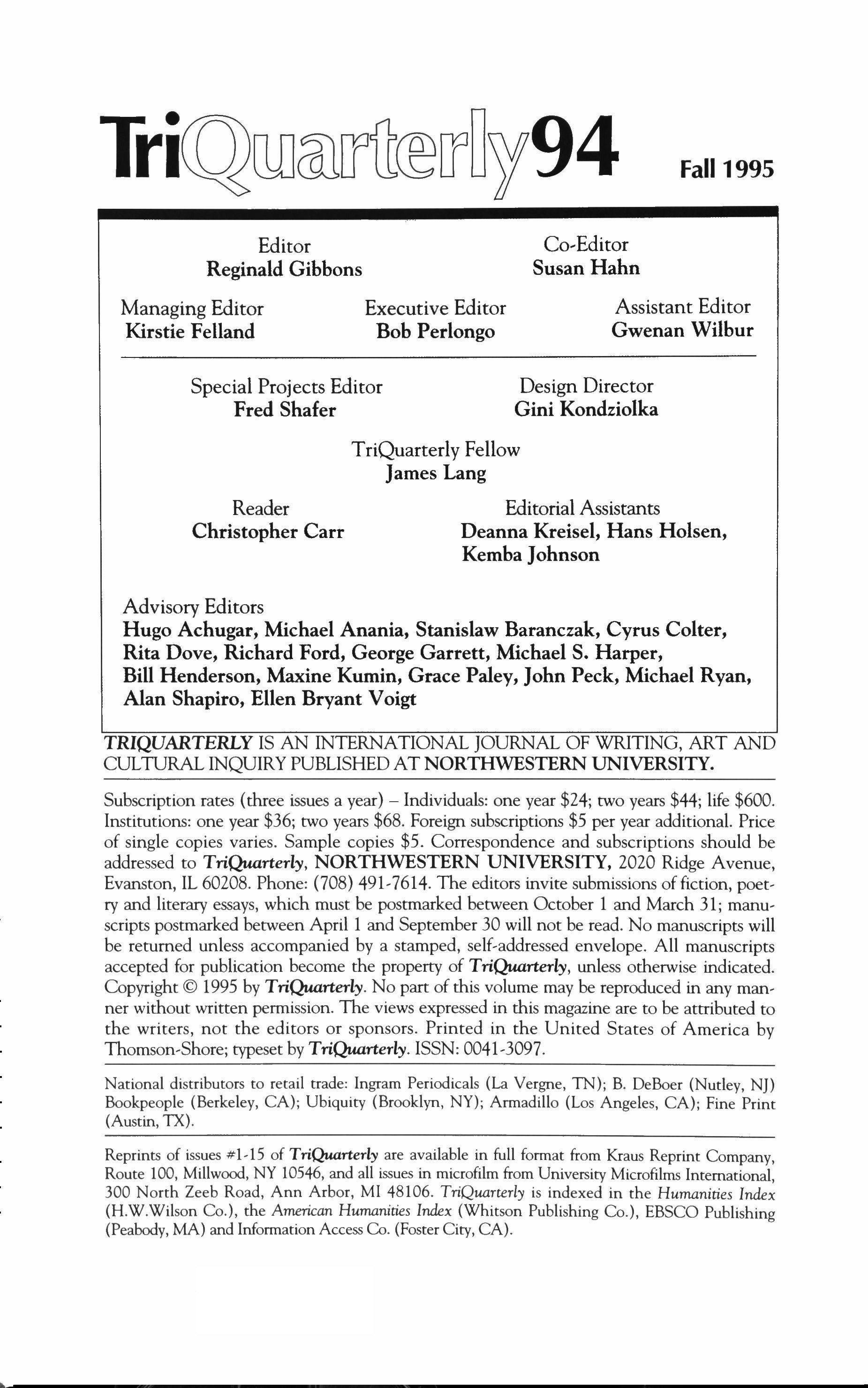
Executive Editor Bob Perlongo
Special Projects Editor
Fred Shafer
Co-Editor
Susan Hahn
Assistant Editor Gwenan Wilbur
Design Director Gini Kondziolka
TriQuarterly Fellow
James Lang
Reader
Christopher Carr
Advisory Editors
Editorial Assistants
Deanna Kreisel, Hans Holsen, Kemba Johnson
Hugo Achugar, Michael Anania, Stanislaw Baranczak, Cyrus Colter, Rita Dove, Richard Ford, George Garrett, Michael S. Harper, Bill Henderson, Maxine Kumin, Grace Paley, John Peck, Michael Ryan, Alan Shapiro, Ellen Bryant Voigt
TRIQUARTERLY IS AN INTERNATIONAL JOURNAL OF WRITING, ART AND CULTURAL INQUIRY PUBLISHED AT NORTHWESTERN UNIVERSITY.
Subscription rates (three issues a year) - Individuals: one year $24; two years $44; life $600. Institutions: one year $36; two years $68. Foreign subscriptions $5 per year additional. Price of single copies varies. Sample copies $5. Correspondence and subscriptions should be addressed to TriQuarterly, NORTHWESTERN UNIVERSITY, 2020 Ridge Avenue, Evanston, IL 60208. Phone: (708) 491-7614. The editors invite submissions offiction, poetry and literary essays, which must be postmarked between October 1 and March 31; manuscripts postmarked between April 1 and September 30 will not be read. No manuscripts will be returned unless accompanied by a stamped, self-addressed envelope. All manuscripts accepted for publication become the property of TriQuarterly, unless otherwise indicated. Copyright © 1995 by TriQuarterly. No part of this volume may be reproduced in any manner without written permission. The views expressed in this magazine are to be attributed to the writers, not the editors or sponsors. Printed in the United States of America by Thomson-Shore; typeset by TriQuarterly. ISSN: 0041-3097.
National distributors to retail trade: Ingram Periodicals (La Vergne, TN); B. DeBoer (Nutley, NJ) Bookpeople (Berkeley, CA); Ubiquity (Brooklyn, NY); Armadillo (Los Angeles, CA); Fine Print (Austin, TX).
Reprints of issues #1-15 of TriQuarterly are available in full format from Kraus Reprint Company, Route 100, Millwood, NY 10546, and all issues in microfilm from University Microfilms International, 300 North Zeeb Road, Ann Arbor, MI 48106. TriQuaTteTly is indexed in the Humanities Index (H.W.Wilson Co.), the American Humanities Index (Whitson Publishing Co.), EBSCO Publishing (Peabody, MA) and Information Access Co. (Foster City, CA).
Fall 1995

Due to rising paper and postage prices, TriQuarterly must raise its cover price and subscription rates starting with this issue. The cover price is now $11.95, and the prices for individual subscriptions are now $24 for one year and $44 for two years. Institutional subscriptions are $36 for one year and $68 for two years. Life subscriptions are $600.
Illinois Arts Council 1995 Literary Awards of $1,000 each have been received by the following writers for works published in TriQuarterly: Tammie Bob (for "The Match [Blessed Is the Match]," story, TQ #89) and Richard Jones (for "The Novel," poem, TQ #91). TriQuarterly, as publisher, has received matching awards. In addition, Tammie Bob received for her story the fifth annual Daniel Curley Award of $1,000 for Recent Illinois Short Fiction, given to the author of the highest, ranked work of short fiction.
"Super Night," a story by Charles Baxter that appeared in TQ #91, has been included in The Pushcart Prize XX anthology (1995,96 edition).
Editor of this issue: Reginald Gibbons
NOVELLA

OTHER FICTION
From The Twilight of the Bums ("Foolish Questions," "The Turncoats," "This and That," "The Beauty of Loneliness," "The Story of the Sparrow," "Commentaries on the Story of the Sparrow," "Winter Wheat," "Making a Distinction," "A Quiet Evening at Home") (surfiction/critifiction)
Contents
The Ambassador's Son .•••....•.........................•..... 23 Johnny Payne
94 Federman
Fitting Ends (story) 195 DanChaon Ancestry (story) ..........••.•...••........................•••• 212 John Stewart Irony, Irony, Irony (story) •......•..•..............•....... 244 Antonya Nelson 19
/Chambers Chambers/Federman

Louis Armstrong and the Astronauts Meet at the Langley AFB Pool; A Supernatural Narrative; A Librarian's Gift; Mississippi River Bridge; Nature Moment; Another Nature Moment; About the Farmer's Daughter; Irish Whiskey in the Backyard
Smith
POETRY
••....•..... 71 Dave
Statement and Poem ("Translations"} ••••....•..•••...• 79 Michelle
Translated from the French by Serge Gavronsky Lucretian 109 Peter Reading Poet; When the Spirit Spray,Paints the Sky 113 Sterling Plumpp Bluejays 120 Don Stap Black Hat; My Mother's Hand Thinks; The Nightgown 122 Renate Wood Two Sections from The Bob Hope Poem ("The Secret Life of Capital" and "The Triumph of Capitalism") 170 Campbell McGrath Prison for Stars; Illumination; Rough Being; Citadel 191 Claire Malraux Translated from the French by C. K. Williams 20
Grangaud
A Hint of Grief; Bazaar Scene; Living in Orissa 229
Jayanta Mahapatra
Narcissus in Plato's Cave; Narcissus Learning the Words to This Song; Narcissus as Gnostic 232
Reginald Shepherd
Parejas/Couples; Los condenados de la tierra/ The Wretched of the Earth; Para ti/For You; Walter Benjamin se va de Paris/Walter Benjamin Leaves Paris 236
Jose Emilio Pacheco
Translated from the Spanish by Cynthia Steele
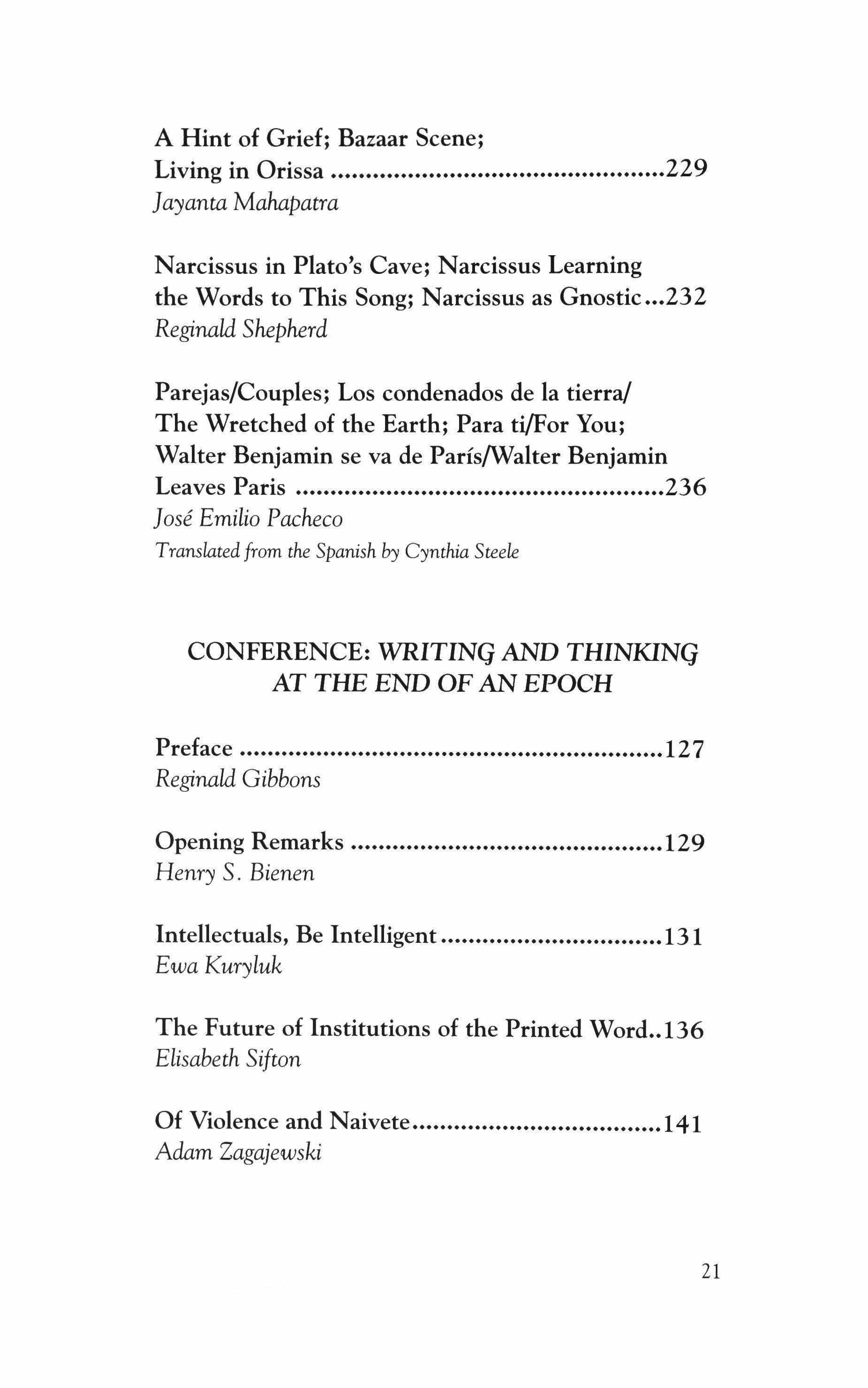
Preface
Reginald Gibbons
Opening Remarks
Henry S. Bienen Intellectuals, Be Intelligent
Ewa Kuryluk The Future of Institutions of the Printed Word
Elisabeth Sifton
Zagajewski
CONFERENCE: WRITING AND THINKING AT THE END OF AN EPOCH
127
129
131
136
Of Violence and Naivete ••••.•......••...••••....•....•.•.•. 141 Adam
21
Ted Solotaroff
Prague Report: Literature Remains Alive and Well
]osefKroutvor
Translated from the German by Richard Drury
Boycott Lufthansa: Literature and Publicity
Today-A Few Ruminations and a Suggestion
Elke Schmitter
Translated from the German by Wilhelm Werthem
Epitaph as Prologue (Literature at the End of the Century)
Norman Manea
Translated from the Roumanian by Patrick Camiller
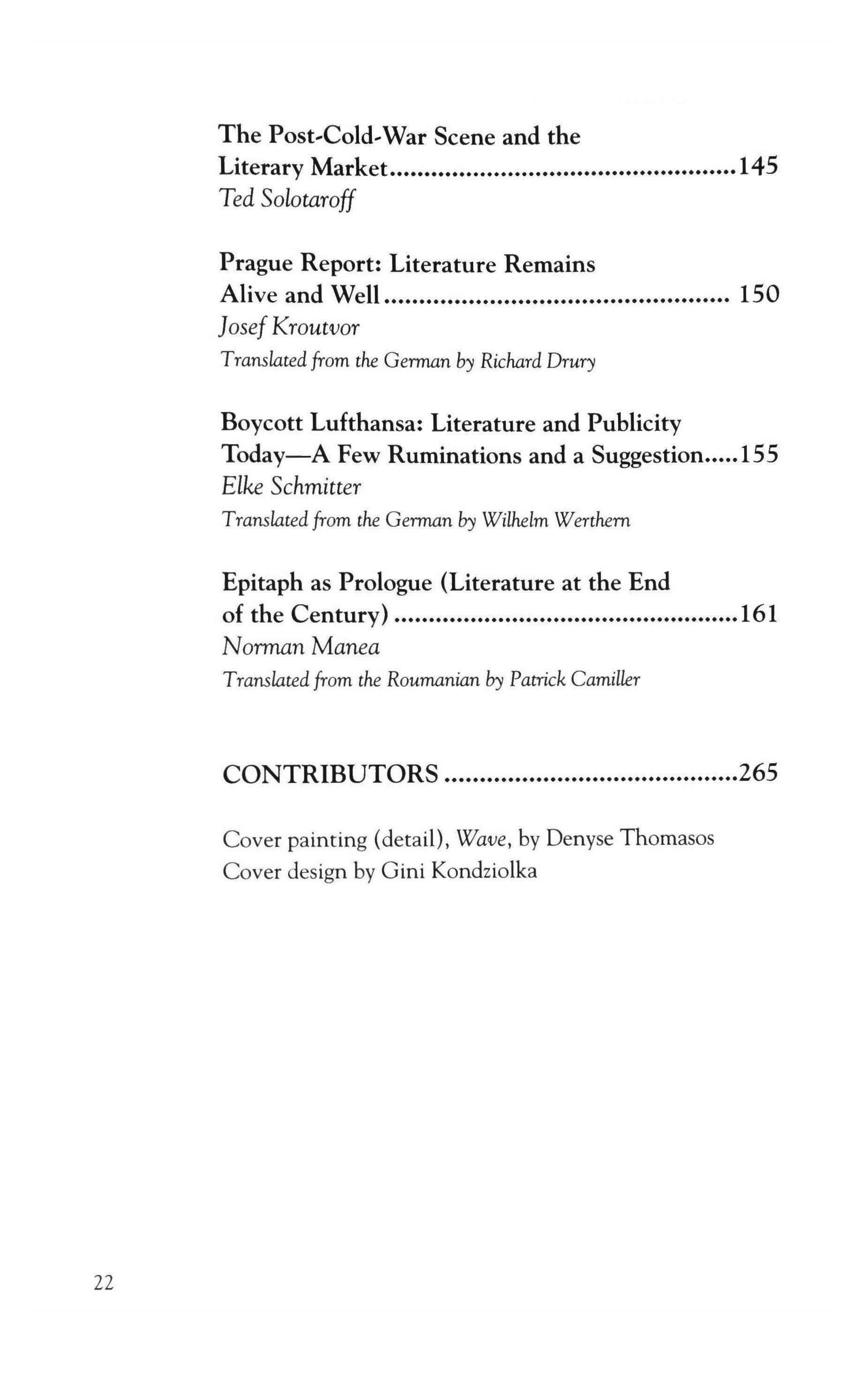
Cover painting (detail), Wave, by Denyse Thomasos
Cover design by Gini Kondziolka
The Post-Cold.War Scene and the Literary Market 145
150
155
161
CONTRIBUTORS ...........•................•............. 265
22
The Ambassador's Son
Johnny Payne

IWhat are those men doing, Chuck?
Checking the level of contamination in the water. They're going to run chemical analyses on the samples. Rumors are going around that there's been an outbreak of some unusual disease. Some people say that it's being caused by waste released from oceangoing ships. It's all my employees can talk about this week. I called the Ministry of Health this morning, to get the straight dope on it and try to allay fears. You know how Fujimori's ministers and their staff are masters of indirection and euphemism. Saniferal malfestations of seafoam. I always feel like they're speaking Old Norse. They're not sure at this point what to call it.
Any speculation?
Cholera, maybe. But they don't want the word to spread just yet.
Just the disease. Isn't cholera usually confined to livestock?
It's been pretty rare in these parts for a long time, I gather. But they've gone so far as to discourage people from eating marine products, and posted signs on some of the beaches that prohibit swimming. I can't imagine who would want to swim this time of year anyway. It was low tide, and debris littered the beach, branches of kelp with floaters like arthritic joints, fish heads, clam husks, the carcasses of crabs. Workers wearing oxygen masks wandered about the sand spearing pieces ofplankton and garbage with pointed sticks, depositing them in small plastic bags and tagging each.
Except you. Chuck's the original polar bear, General. Every day at sunrise, he's out in the pool, splashing around in the shallow end to wake himself up. The maid thinks he's demented. Back when we lived
TRIQUARTERLY
23
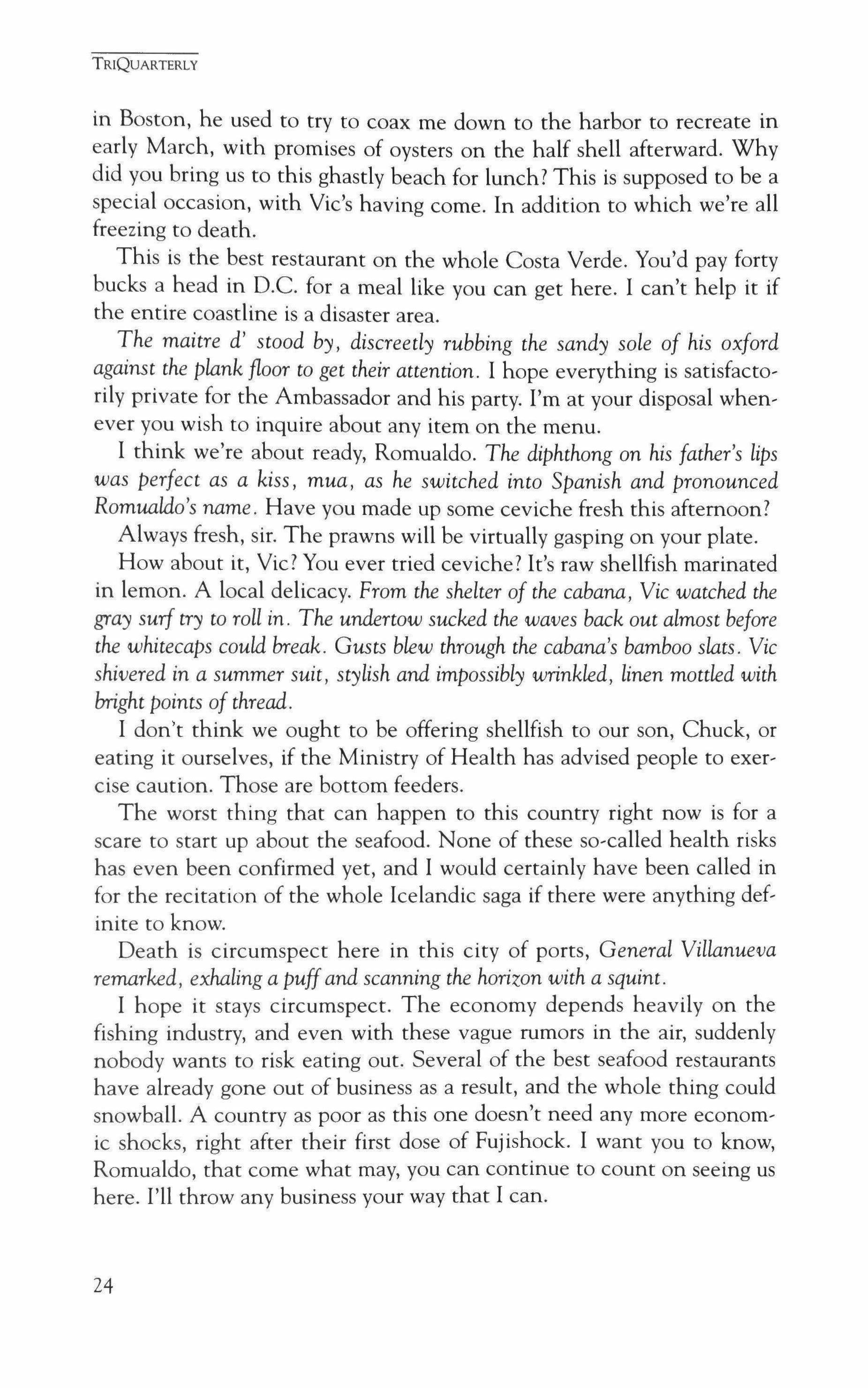
in Boston, he used to try to coax me down to the harbor to recreate in early March, with promises of oysters on the half shell afterward. Why did you bring us to this ghastly beach for lunch? This is supposed to be a special occasion, with Vic's having come. In addition to which we're all freezing to death.
This is the best restaurant on the whole Costa Verde. You'd pay forty bucks a head in D.C. for a meal like you can get here. I can't help it if the entire coastline is a disaster area.
The maitre d' stood by, discreetly rubbing the sandy sole of his oxford against the plank floor to get their attention. I hope everything is satisfactorily private for the Ambassador and his party. I'm at your disposal whenever you wish to inquire about any item on the menu.
I think we're about ready, Romualdo. The diphthong on his father's lips was perfect as a kiss, mua, as he switched into Spanish and pronounced Romualdo's name. Have you made up some ceviche fresh this afternoon?
Always fresh, sir. The prawns will be virtually gasping on your plate.
How about it, Vic? You ever tried ceviche? It's raw shellfish marinated in lemon. A local delicacy. From the shelter of the cabana, Vic watched the gray surf try to roll in. The undertow sucked the waves back out almost before the whitecaps could break. Gusts blew through the cabana's bamboo slats. Vic shivered in a summer suit, stylish and impossibly wrinkled, linen mottled with bright points of thread.
I don't think we ought to be offering shellfish to our son, Chuck, or eating it ourselves, if the Ministry of Health has advised people to exercise caution. Those are bottom feeders.
The worst thing that can happen to this country right now is for a scare to start up about the seafood. None of these so-called health risks has even been confirmed yet, and I would certainly have been called in for the recitation of the whole Icelandic saga if there were anything definite to know.
Death is circumspect here in this city of ports, General Villanueva remarked, exhaling a puffand scanning the horizon with a squint.
I hope it stays circumspect. The economy depends heavily on the fishing industry, and even with these vague rumors in the air, suddenly nobody wants to risk eating out. Several of the best seafood restaurants have already gone out of business as a result, and the whole thing could snowball. A country as poor as this one doesn't need any more economic shocks, right after their first dose of Fujishock. I want you to know, Romualdo, that come what may, you can continue to count on seeing us here. I'll throw any business your way that I can.
TRIQUARTERLY
24

We appreciate your patronage, Ambassador. We always look forward to your proximate appearance. Finding a water stain on Vic's knife, Romualdo burnished the utensil, making diversionary eye contact all the while.
Plus, there are all kinds of other things on the menu. Beef hearts on a skewer. Nobody at this table has to eat seafood if he doesn't feel cornfortable. I'm not forcing anyone.
All right, then, I'll try some of the seafood, but only for the sake of solidarity. I'm not even in the mood for it. How is the sole, Romualdo? Oh, but that's a bottom feeder too, isn't it? It has both eyes on the same side of its head.
Senora, not to apply undue pressure or suasion to your selection, but we take the utmost precautions in all of our preparatory techniques, even during seasons when there are no plagues in the offing. The sole is first steamed in addition to being braised, in order to purge it of any impurities. The resulting entree is indescribably tender and exquisite.
O.K., I'll bite. How about you, Vic?
I'll have the beef tongue, please. Medium rare. Wouldn't you prefer it a little more cooked, honey? That's how I eat it.
O.K., your funeral. General Villanueva?
Whatever the senora is having.
Give me the ceviche, and bring us a couple of bottles of Chilean Chardonnay to start.
Are you all right, son? You're shaking, and your lips look blue.
I'm O.K. It will take me a few days to get acclimated.
Let's move indoors, Chuck. It doesn't even smell that fresh out here. You'd think with the coastal wind we'd at least get that.
I'll buy a sweater tomorrow.
The salt air out here will be salutary for him. But the beach is a disgrace, there's no question about it. You see that kelp lying there rotting? That's what you smell. I was talking the other day to a young marine scientist down here working with the Ministry of Fisheries on a Fulbright. He's doing a study, says that all that kelp, instead of uselessly decaying, could be harvested and put to use. Apparently it's a natural source of iodine if you tum it to ashes. He's proposing a massive water purification system using iodine extracted from kelp as its main active ingredient. It's ecological, uses native resources, and if there is contamination in the ocean, it might squelch this supposed epidemic in the making before it really gets started. At first I was skeptical, it sounded about as realistic as
TRIQUARTERLY
25
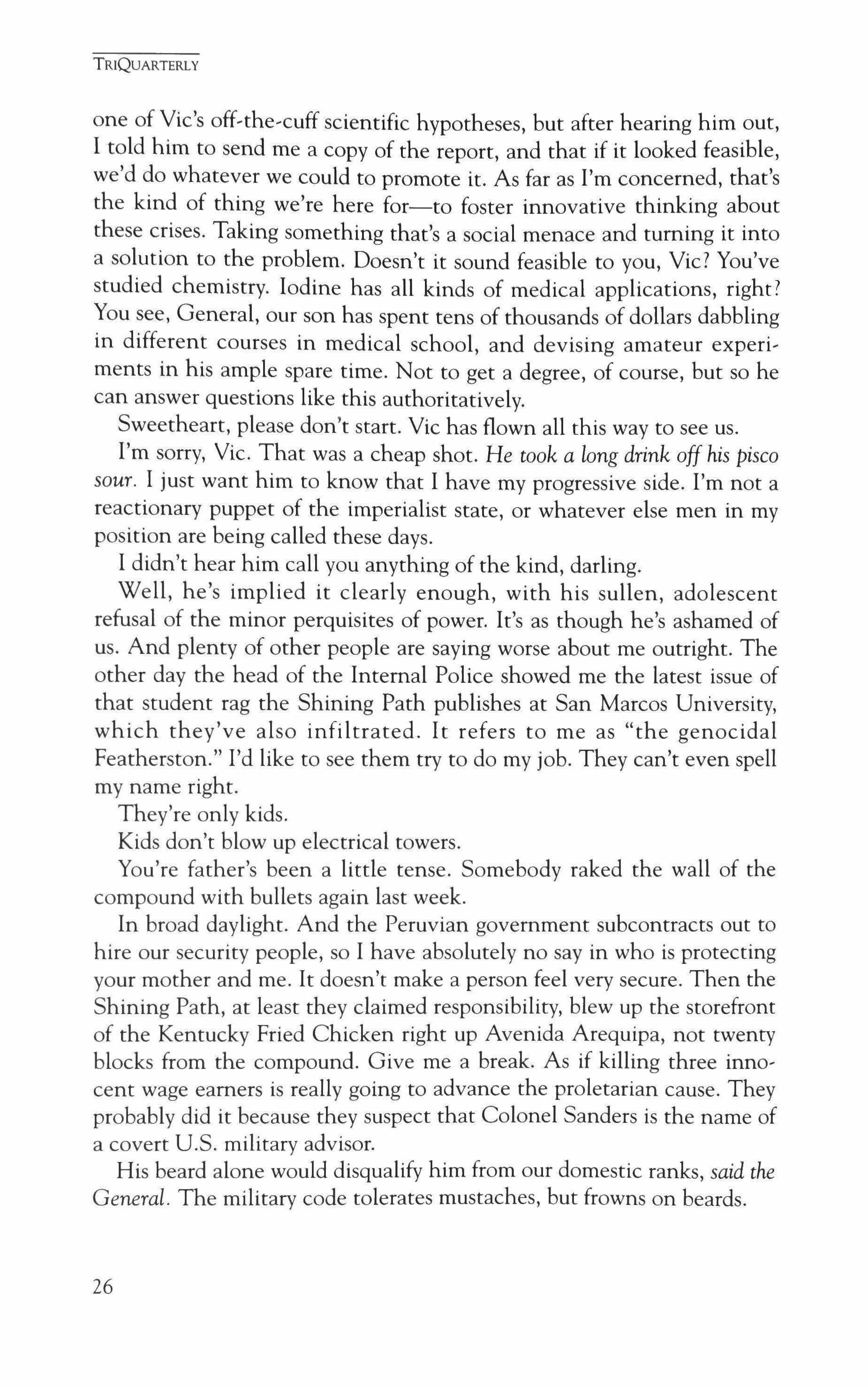
one of Vic's off-the-cuff scientific hypotheses, but after hearing him out, I told him to send me a copy of the report, and that if it looked feasible, we'd do whatever we could to promote it. As far as I'm concerned, that's the kind of thing we're here for-to foster innovative thinking about these crises. Taking something that's a social menace and turning it into a solution to the problem. Doesn't it sound feasible to you, Vic? You've studied chemistry. Iodine has all kinds of medical applications, right? You see, General, our son has spent tens of thousands of dollars dabbling in different courses in medical school, and devising amateur experiments in his ample spare time. Not to get a degree, of course, but so he can answer questions like this authoritatively.
Sweetheart, please don't start. Vic has flown all this way to see us.
I'm sorry, Vic. That was a cheap shot. He took a long drink off his pisco sour. I just want him to know that I have my progressive side. I'm not a reactionary puppet of the imperialist state, or whatever else men in my position are being called these days.
I didn't hear him call you anything of the kind, darling.
Well, he's implied it clearly enough, with his sullen, adolescent refusal of the minor perquisites of power. It's as though he's ashamed of us. And plenty of other people are saying worse about me outright. The other day the head of the Internal Police showed me the latest issue of that student rag the Shining Path publishes at San Marcos University, which they've also infiltrated. It refers to me as "the genocidal Featherston." I'd like to see them try to do my job. They can't even spell my name right.
They're only kids.
Kids don't blow up electrical towers.
You're father's been a little tense. Somebody raked the wall of the compound with bullets again last week.
In broad daylight. And the Peruvian government subcontracts out to hire our security people, so I have absolutely no say in who is protecting your mother and me. It doesn't make a person feel very secure. Then the Shining Path, at least they claimed responsibility, blew up the storefront of the Kentucky Fried Chicken right up Avenida Arequipa, not twenty blocks from the compound. Give me a break. As if killing three innocent wage earners is really going to advance the proletarian cause. They probably did it because they suspect that Colonel Sanders is the name of a covert U.S. military advisor.
His beard alone would disqualify him from our domestic ranks, said the General. The military code tolerates mustaches, but frowns on beards.
TRIQUARTERLY
26
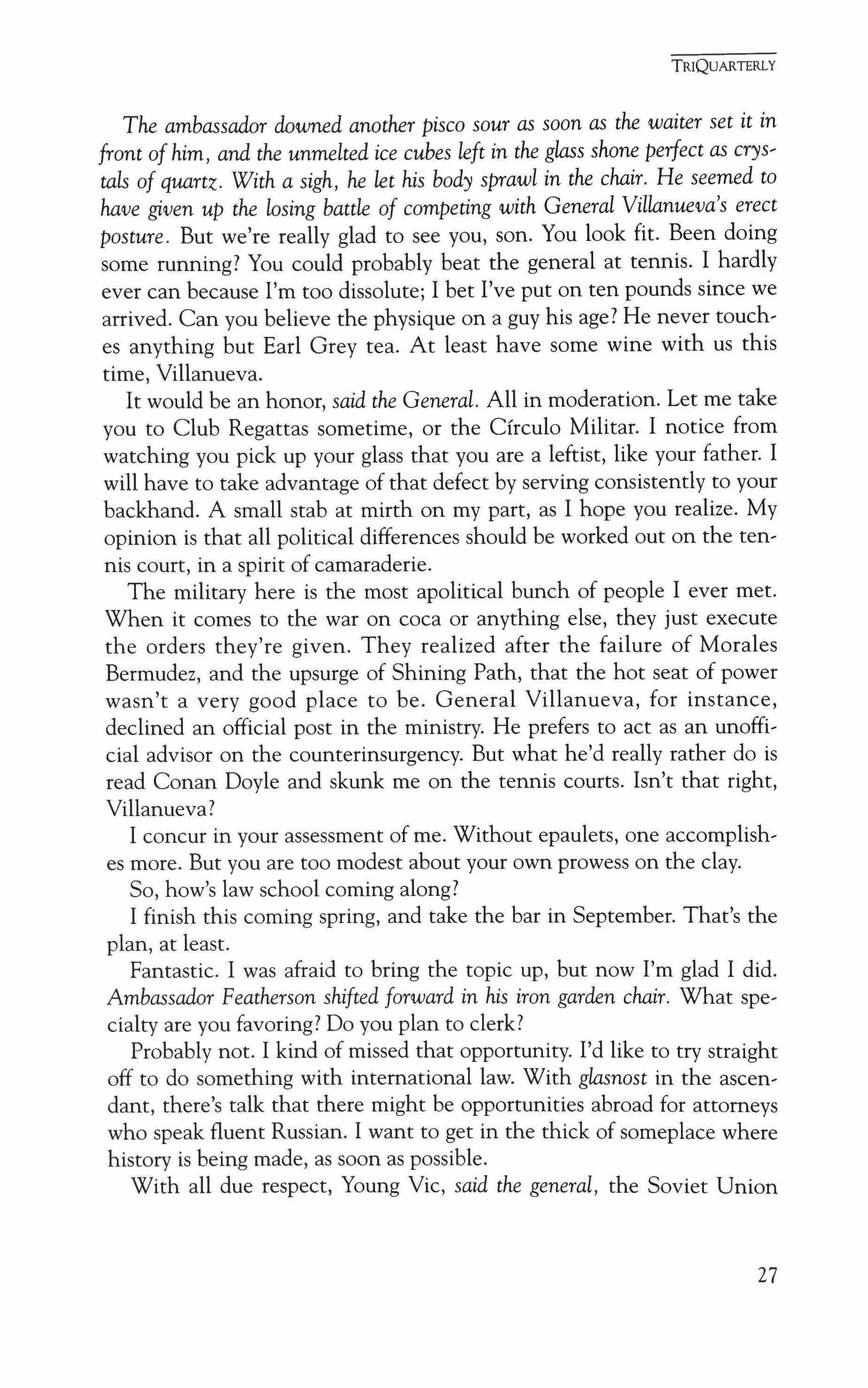
The ambassador downed another Pisco sour as soon as the waiter set it in front ofhim, and the unmelted ice cubes left in the glass shone perfect as crys, tals of quartz. With a sigh, he let his body sprawl in the chair. He seemed to have given up the losing battle of competing with General Villanueva's erect posture. But we're really glad to see you, son. You look fit. Been doing some running? You could probably beat the general at tennis. I hardly ever can because I'm too dissolute; I bet I've put on ten pounds since we arrived. Can you believe the physique on a guy his age? He never touch, es anything but Earl Grey tea. At least have some wine with us this time, Villanueva.
It would be an honor, said the General. All in moderation. Let me take you to Club Regattas sometime, or the Cfrculo Militar, I notice from watching you pick up your glass that you are a leftist, like your father. I will have to take advantage of that defect by serving consistently to your backhand. A small stab at mirth on my part, as I hope you realize. My opinion is that all political differences should be worked out on the tennis court, in a spirit of camaraderie.
The military here is the most apolitical bunch of people I ever met. When it comes to the war on coca or anything else, they just execute the orders they're given. They realized after the failure of Morales Bermudez, and the upsurge of Shining Path, that the hot seat of power wasn't a very good place to be. General Villanueva, for instance, declined an official post in the ministry. He prefers to act as an unofficial advisor on the counterinsurgency. But what he'd really rather do is read Conan Doyle and skunk me on the tennis courts. Isn't that right, Villanueva?
I concur in your assessment of me. Without epaulets, one accomplishes more. But you are too modest about your own prowess on the clay. So, how's law school coming along?
I finish this coming spring, and take the bar in September. That's the plan, at least.
Fantastic. I was afraid to bring the topic up, but now I'm glad I did. Ambassador Featherson shifted forward in his iron garden chair. What specialty are you favoring? Do you plan to clerk?
Probably not. I kind of missed that opportunity. I'd like to try straight off to do something with international law. With glasnost in the ascendant, there's talk that there might be opportunities abroad for attorneys who speak fluent Russian. I want to get in the thick of someplace where history is being made, as soon as possible.
With all due respect, Young Vic, said the general, the Soviet Union
TRIQUARTERLY
27
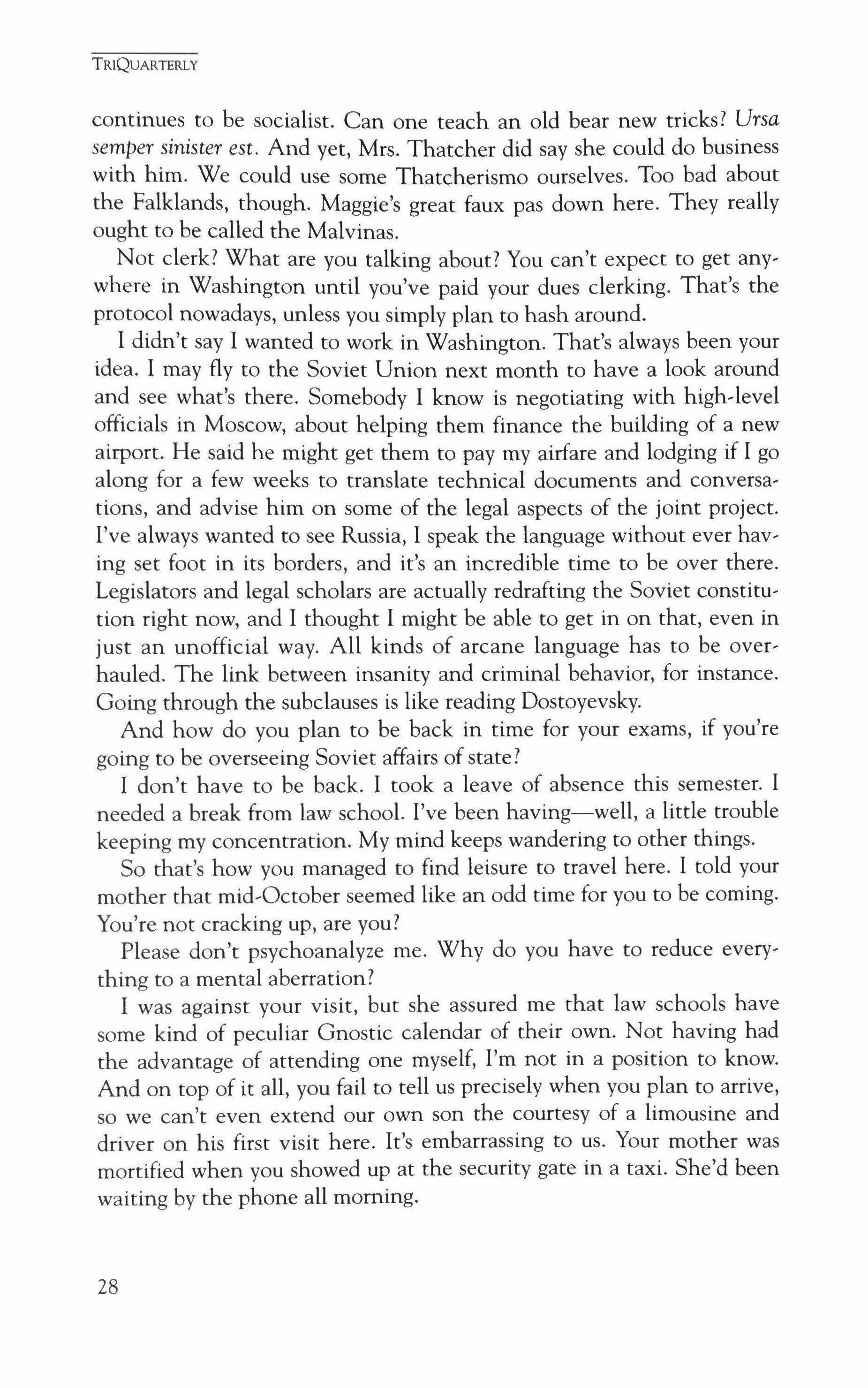
continues to be socialist. Can one teach an old bear new tricks? Ursa semper sinister est. And yet, Mrs. Thatcher did say she could do business with him. We could use some Thatcherismo ourselves. Too bad about the Falklands, though. Maggie's great faux pas down here. They really ought to be called the Malvinas.
Not clerk? What are you talking about? You can't expect to get anywhere in Washington until you've paid your dues clerking. That's the protocol nowadays, unless you simply plan to hash around.
I didn't say I wanted to work in Washington. That's always been your idea. I may fly to the Soviet Union next month to have a look around and see what's there. Somebody I know is negotiating with high-level officials in Moscow, about helping them finance the building of a new airport. He said he might get them to pay my airfare and lodging if I go along for a few weeks to translate technical documents and conversations, and advise him on some of the legal aspects of the joint project. I've always wanted to see Russia, I speak the language without ever having set foot in its borders, and it's an incredible time to be over there. Legislators and legal scholars are actually redrafting the Soviet constitution right now, and I thought I might be able to get in on that, even in just an unofficial way. All kinds of arcane language has to be overhauled. The link between insanity and criminal behavior, for instance. Going through the subclauses is like reading Dostoyevsky.
And how do you plan to be back in time for your exams, if you're going to be overseeing Soviet affairs of state?
I don't have to be back. I took a leave of absence this semester. I needed a break from law school. I've been having-well, a little trouble keeping my concentration. My mind keeps wandering to other things.
So that's how you managed to find leisure to travel here. I told your mother that mid-October seemed like an odd time for you to be coming. You're not cracking up, are you?
Please don't psychoanalyze me. Why do you have to reduce everything to a mental aberration?
I was against your visit, but she assured me that law schools have some kind of peculiar Gnostic calendar of their own. Not having had the advantage of attending one myself, I'm not in a position to know. And on top of it all, you fail to tell us precisely when you plan to arrive, so we can't even extend our own son the courtesy of a limousine and driver on his first visit here. It's embarrassing to us. Your mother was mortified when you showed up at the security gate in a taxi. She'd been waiting by the phone all morning.
TRIQUARTERLY
28

Just layoff me, will you? I didn't ask you to foot the bill for this trip or any other. Or my law school. So if I want to go to Russia, or to hell in a handbasket for that matter, I don't know how that's any concern of yours.
Where do you hatch these pathetically grandiose notions that you're going to sweep in somewhere you've never been and alter the course of history, the fate of humankind? I hate to tell you, but that's not how it works. Except for the uncombed shock of hair, you're not Rasputin. Whatever megalomaniac fantasy you may have constructed in your mind, Gorbachev is not going to appoint you on the spot as a shadow advisor to prophesy for him. World leaders don't operate that way. O.K., Reagan used psychics, but he's in his dotage now, thank God. That's probably how he chose my assignments back in the early eighties, come to think of it. I can't figure out any other explanation. But on the whole, civilization gets built and unbuilt stick by stick. When you get to be an elder statesman, then you can dispense wisdom. In the meantime, when are you going to get down to work like all the rest of us? I'd like to see you change one person's life, just one, or even execute a specific order to satisfaction, then come back and talk to me about history.
The platters arrived, garnished with lettuce, tomato, and shreds of onion, and they ate without speaking, except for Vic's mother reminding him not to eat the lettuce, as the men in oxygen masks drifted further down the beach, brandishing their spears. Uncorked wine flowed, the ambassador devoting himself to refilling everyone's glasses in spite of the maitre d's repeated attempts to beat him to the bottle. The general dabbed at his mouth with delicacy and returned the napkin to his lap. All this talk of lawyers by the seaside reminds me of a joke I heard not too long ago from a good friend of mine, a former colonel whom I recently visited in San Francisco. We lost contact, because he was living under an assumed name there after he was spuriously charged, on minor legal technicalities, with various crimes against humanity for his participation in the Argentine junta. But they found him out, alas, and are now trying to extradite him to stand trial, poor fellow. In the face of all this harassment, he somehow retains his sense of humor. Ahead, death lurks patiently in the barrels of the guns. And yet he remains stoical. He said there were three professionals out fishing in a boat-a doctor, a priest, and a lawyer. A squall blew up, and carried them far from the shoreline, damaging their sail beyond repair. They decided amongst themselves that one of them would have to try to swim to shore for help, but the waters were known to be infested with sharks, and none of them was anxious to volunteer. I
TRIQUARTERLY
29
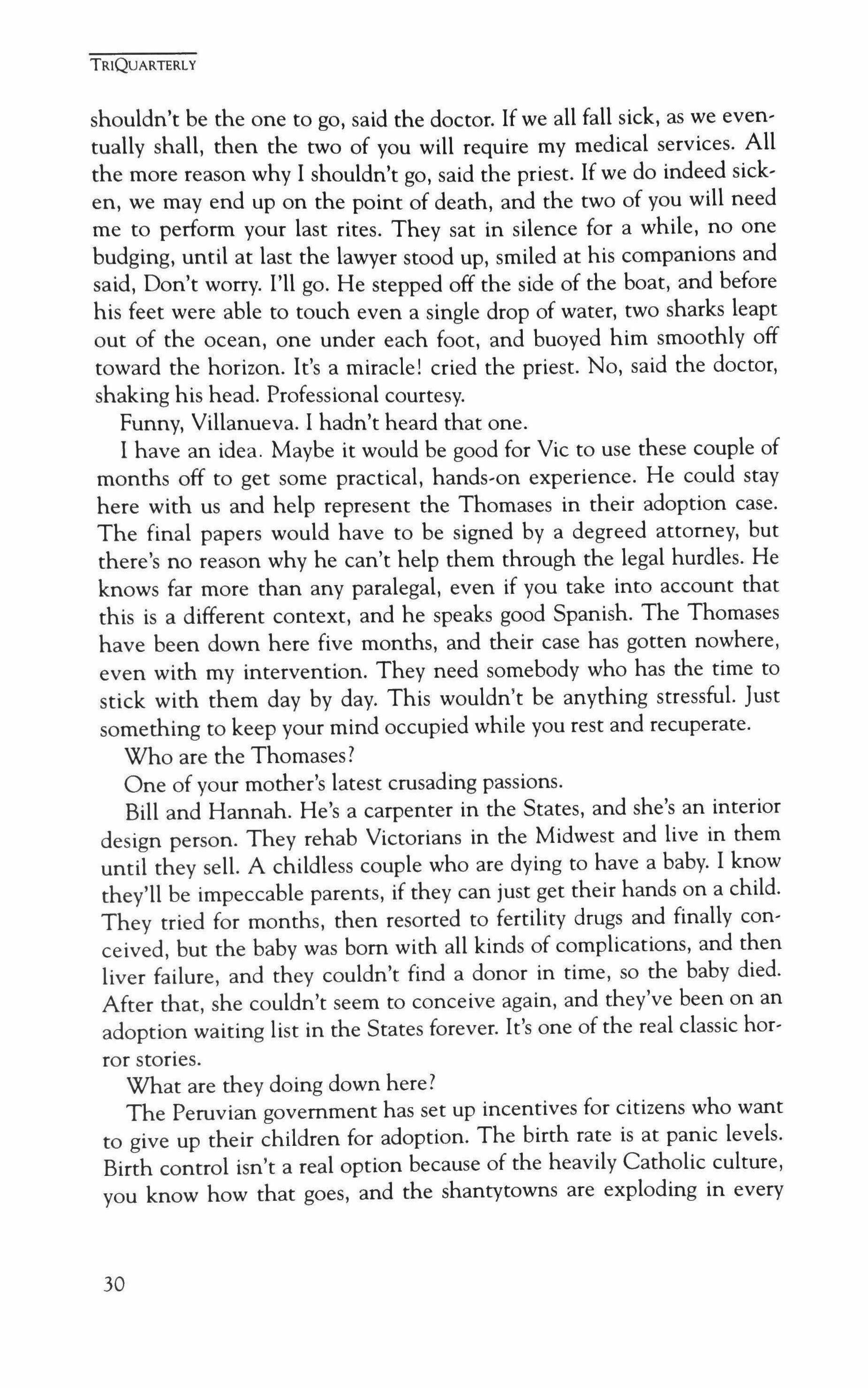
shouldn't be the one to go, said the doctor. If we all fall sick, as we eventually shall, then the two of you will require my medical services. All the more reason why I shouldn't go, said the priest. If we do indeed sicken, we may end up on the point of death, and the two of you will need me to perform your last rites. They sat in silence for a while, no one budging, until at last the lawyer stood up, smiled at his companions and said, Don't worry. I'll go. He stepped off the side of the boat, and before his feet were able to touch even a single drop of water, two sharks leapt out of the ocean, one under each foot, and buoyed him smoothly off toward the horizon. It's a miracle! cried the priest. No, said the doctor, shaking his head. Professional courtesy.
Funny, Villanueva. I hadn't heard that one.
I have an idea. Maybe it would be good for Vic to use these couple of months off to get some practical, hands-on experience. He could stay here with us and help represent the Thomases in their adoption case. The final papers would have to be signed by a degreed attorney, but there's no reason why he can't help them through the legal hurdles. He knows far more than any paralegal, even if you take into account that this is a different context, and he speaks good Spanish. The Thomases have been down here five months, and their case has gotten nowhere, even with my intervention. They need somebody who has the time to stick with them day by day. This wouldn't be anything stressful. Just something to keep your mind occupied while you rest and recuperate.
Who are the Thomases?
One of your mother's latest crusading passions.
Bill and Hannah. He's a carpenter in the States, and she's an interior design person. They rehab Victorians in the Midwest and live in them until they sell. A childless couple who are dying to have a baby. I know they'll be impeccable parents, if they can just get their hands on a child. They tried for months, then resorted to fertility drugs and finally conceived, but the baby was born with all kinds of complications, and then liver failure, and they couldn't find a donor in time, so the baby died. After that, she couldn't seem to conceive again, and they've been on an adoption waiting list in the States forever. It's one of the real classic horror stories.
What are they doing down here?
The Peruvian government has set up incentives for citizens who want to give up their children for adoption. The birth rate is at panic levels. Birth control isn't a real option because of the heavily Catholic culture, you know how that goes, and the shantytowns are exploding in every
TRIQUARTERLY
30
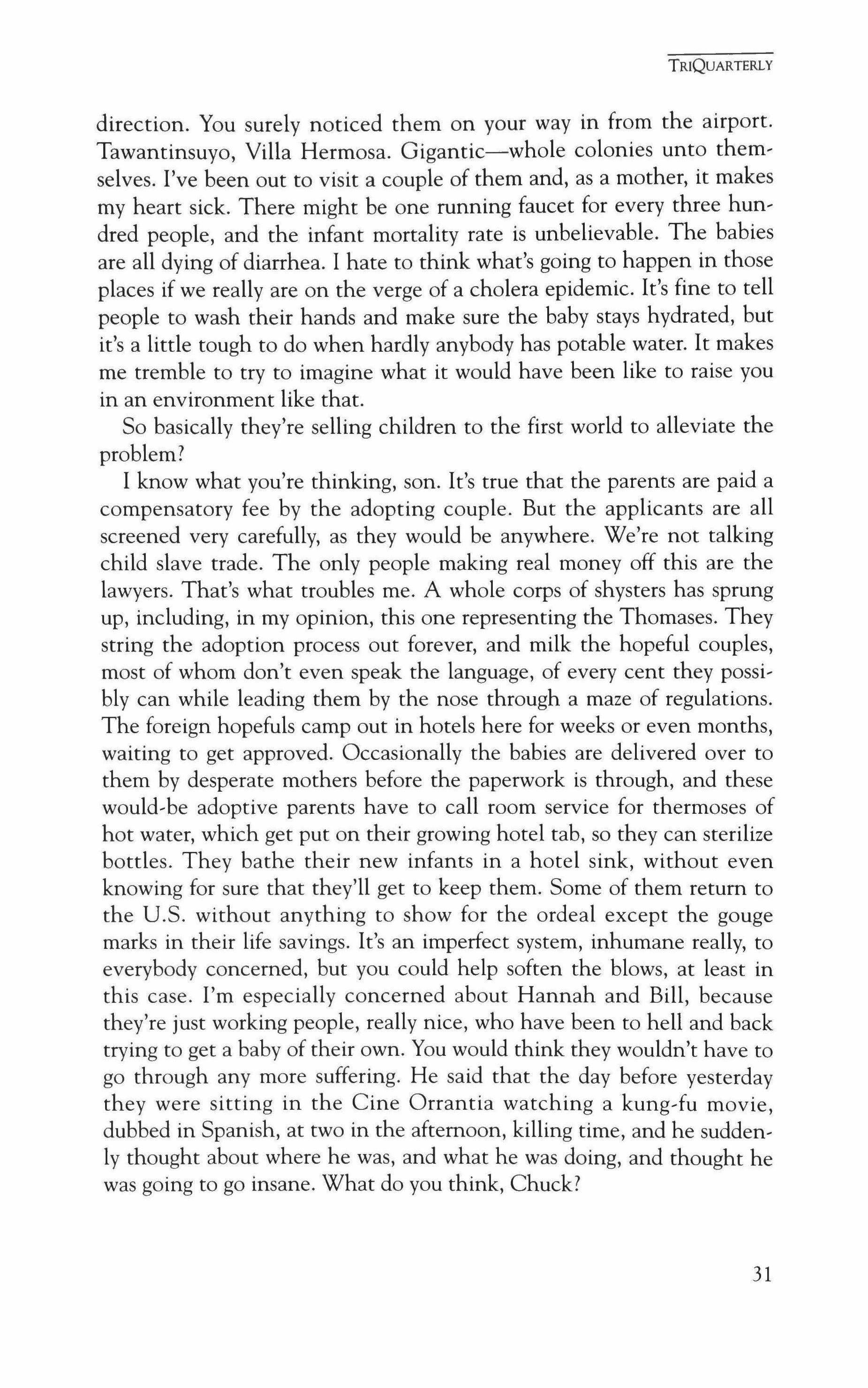
direction. You surely noticed them on your way in from the airport. Tawantinsuyo, Villa Hermosa. Gigantic-whole colonies unto themselves. I've been out to visit a couple of them and, as a mother, it makes my heart sick. There might be one running faucet for every three hundred people, and the infant mortality rate is unbelievable. The babies are all dying of diarrhea. I hate to think what's going to happen in those places if we really are on the verge of a cholera epidemic. It's fine to tell people to wash their hands and make sure the baby stays hydrated, but it's a little tough to do when hardly anybody has potable water. It makes me tremble to try to imagine what it would have been like to raise you in an environment like that.
So basically they're selling children to the first world to alleviate the problem?
I know what you're thinking, son. It's true that the parents are paid a compensatory fee by the adopting couple. But the applicants are all screened very carefully, as they would be anywhere. We're not talking child slave trade. The only people making real money off this are the lawyers. That's what troubles me. A whole corps of shysters has sprung up, including, in my opinion, this one representing the Thomases. They string the adoption process out forever, and milk the hopeful couples, most of whom don't even speak the language, of every cent they possibly can while leading them by the nose through a maze of regulations. The foreign hopefuls camp out in hotels here for weeks or even months, waiting to get approved. Occasionally the babies are delivered over to them by desperate mothers before the paperwork is through, and these would-be adoptive parents have to call room service for thermoses of hot water, which get put on their growing hotel tab, so they can sterilize bottles. They bathe their new infants in a hotel sink, without even knowing for sure that they'll get to keep them. Some of them return to the u.S. without anything to show for the ordeal except the gouge marks in their life savings. It's an imperfect system, inhumane really, to everybody concerned, but you could help soften the blows, at least in this case. I'm especially concerned about Hannah and Bill, because they're just working people, really nice, who have been to hell and back trying to get a baby of their own. You would think they wouldn't have to go through any more suffering. He said that the day before yesterday they were sitting in the Cine Orrantia watching a kung-fu movie, dubbed in Spanish, at two in the afternoon, killing time, and he suddenly thought about where he was, and what he was doing, and thought he was going to go insane. What do you think, Chuck?
TRIQUARTERLY
31
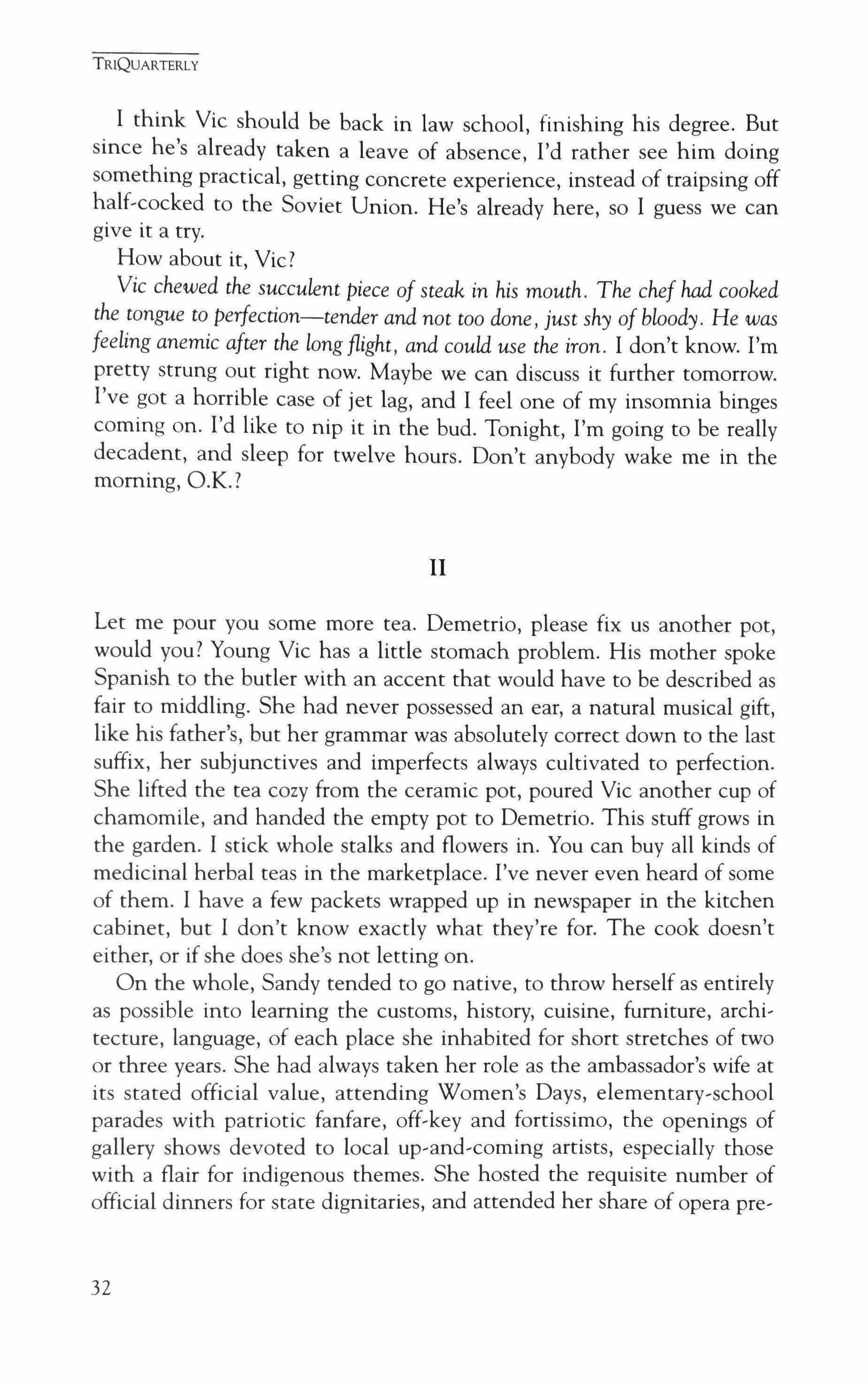
I think Vic should be back in law school, finishing his degree. But since he's already taken a leave of absence, I'd rather see him doing something practical, getting concrete experience, instead of traipsing off half-cocked to the Soviet Union. He's already here, so I guess we can give it a try.
How about it, Vic?
Vic chewed the succulent piece of steak in his mouth. The chef had cooked the tongue to perfection-tender and not too done, just shy ofbloody. He was feeling anemic after the longflight, and could use the iron. I don't know. I'm pretty strung out right now. Maybe we can discuss it further tomorrow. I've got a horrible case of jet lag, and I feel one of my insomnia binges coming on. I'd like to nip it in the bud. Tonight, I'm going to be really decadent, and sleep for twelve hours. Don't anybody wake me in the morning, O.K.?
II
Let me pour you some more tea. Demetrio, please fix us another pot, would you? Young Vic has a little stomach problem. His mother spoke Spanish to the butler with an accent that would have to be described as fair to middling. She had never possessed an ear, a natural musical gift, like his father's, but her grammar was absolutely correct down to the last suffix, her subjunctives and imperfects always cultivated to perfection. She lifted the tea cozy from the ceramic pot, poured Vic another cup of chamomile, and handed the empty pot to Demetrio. This stuff grows in the garden. I stick whole stalks and flowers in. You can buy all kinds of medicinal herbal teas in the marketplace. I've never even heard of some of them. I have a few packets wrapped up in newspaper in the kitchen cabinet, but I don't know exactly what they're for. The cook doesn't either, or if she does she's not letting on.
On the whole, Sandy tended to go native, to throw herself as entirely as possible into learning the customs, history, cuisine, furniture, architecture, language, of each place she inhabited for short stretches of two or three years. She had always taken her role as the ambassador's wife at its stated official value, attending Women's Days, elementary-school parades with patriotic fanfare, off-key and fortissimo, the openings of gallery shows devoted to local up-and-corning artists, especially those with a flair for indigenous themes. She hosted the requisite number of official dinners for state dignitaries, and attended her share of opera pre-
TRIQUARTERLY
32
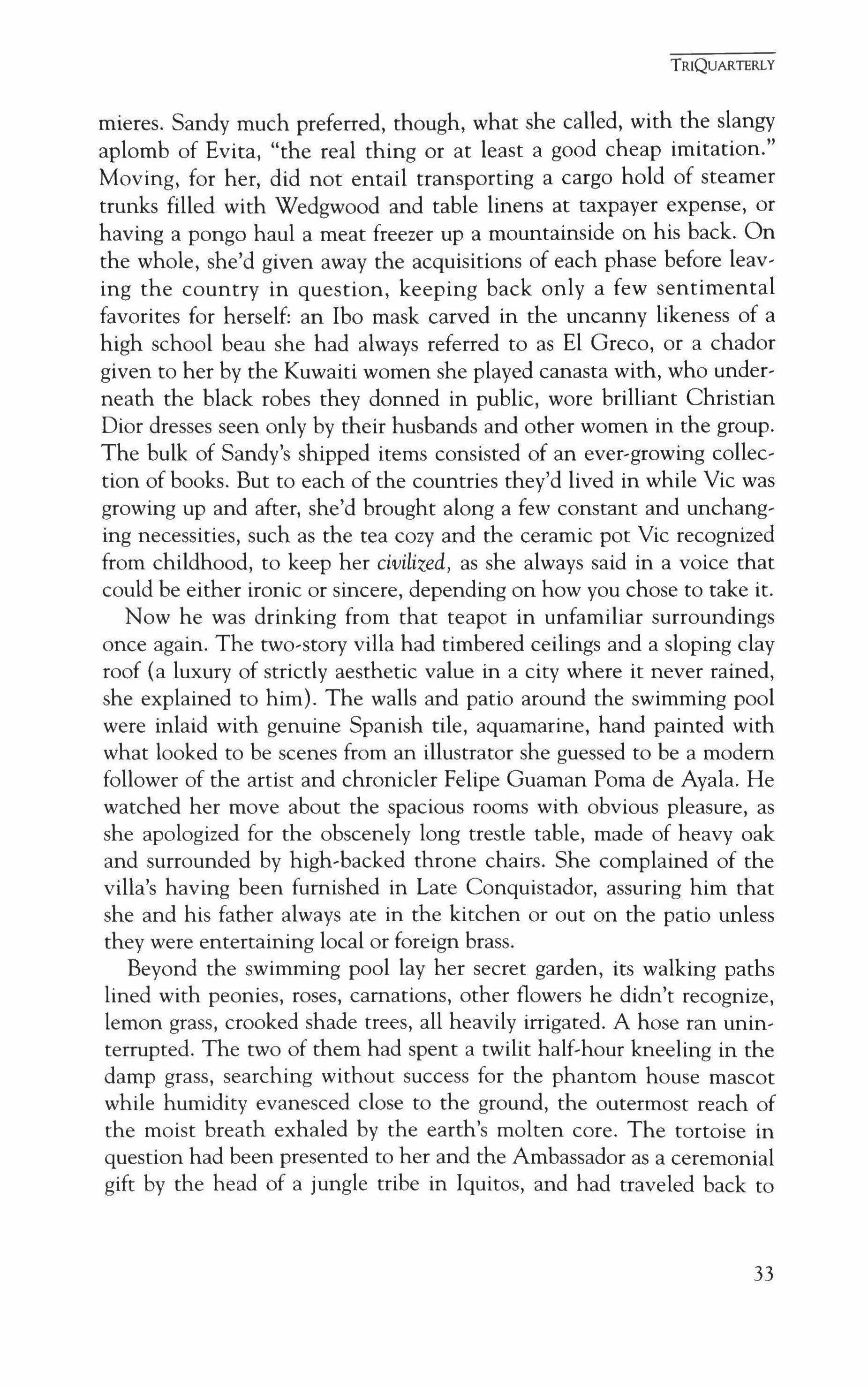
mieres. Sandy much preferred, though, what she called, with the slangy aplomb of Evita, "the real thing or at least a good cheap imitation." Moving, for her, did not entail transporting a cargo hold of steamer trunks filled with Wedgwood and table linens at taxpayer expense, or having a pongo haul a meat freezer up a mountainside on his back. On the whole, she'd given away the acquisitions of each phase before leaving the country in question, keeping back only a few sentimental favorites for herself: an Ibo mask carved in the uncanny likeness of a high school beau she had always referred to as El Greco, or a chador given to her by the Kuwaiti women she played canasta with, who underneath the black robes they donned in public, wore brilliant Christian Dior dresses seen only by their husbands and other women in the group. The bulk of Sandy's shipped items consisted of an ever-growing collection of books. But to each of the countries they'd lived in while Vic was growing up and after, she'd brought along a few constant and unchanging necessities, such as the tea cozy and the ceramic pot Vic recognized from childhood, to keep her civilized, as she always said in a voice that could be either ironic or sincere, depending on how you chose to take it.
Now he was drinking from that teapot in unfamiliar surroundings once again. The two-story villa had timbered ceilings and a sloping clay roof (a luxury of strictly aesthetic value in a city where it never rained, she explained to him). The walls and patio around the swimming pool were inlaid with genuine Spanish tile, aquamarine, hand painted with what looked to be scenes from an illustrator she guessed to be a modem follower of the artist and chronicler Felipe Guaman Poma de Ayala. He watched her move about the spacious rooms with obvious pleasure, as she apologized for the obscenely long trestle table, made of heavy oak and surrounded by high-backed throne chairs. She complained of the villa's having been furnished in Late Conquistador, assuring him that she and his father always ate in the kitchen or out on the patio unless they were entertaining local or foreign brass.
Beyond the swimming pool lay her secret garden, its walking paths lined with peonies, roses, carnations, other flowers he didn't recognize, lemon grass, crooked shade trees, all heavily irrigated. A hose ran uninterrupted. The two of them had spent a twilit half-hour kneeling in the damp grass, searching without success for the phantom house mascot while humidity evanesced close to the ground, the outermost reach of the moist breath exhaled by the earth's molten core. The tortoise in question had been presented to her and the Ambassador as a ceremonial gift by the head of a jungle tribe in Iquitos, and had traveled back to
TRIQUARTERLY
33
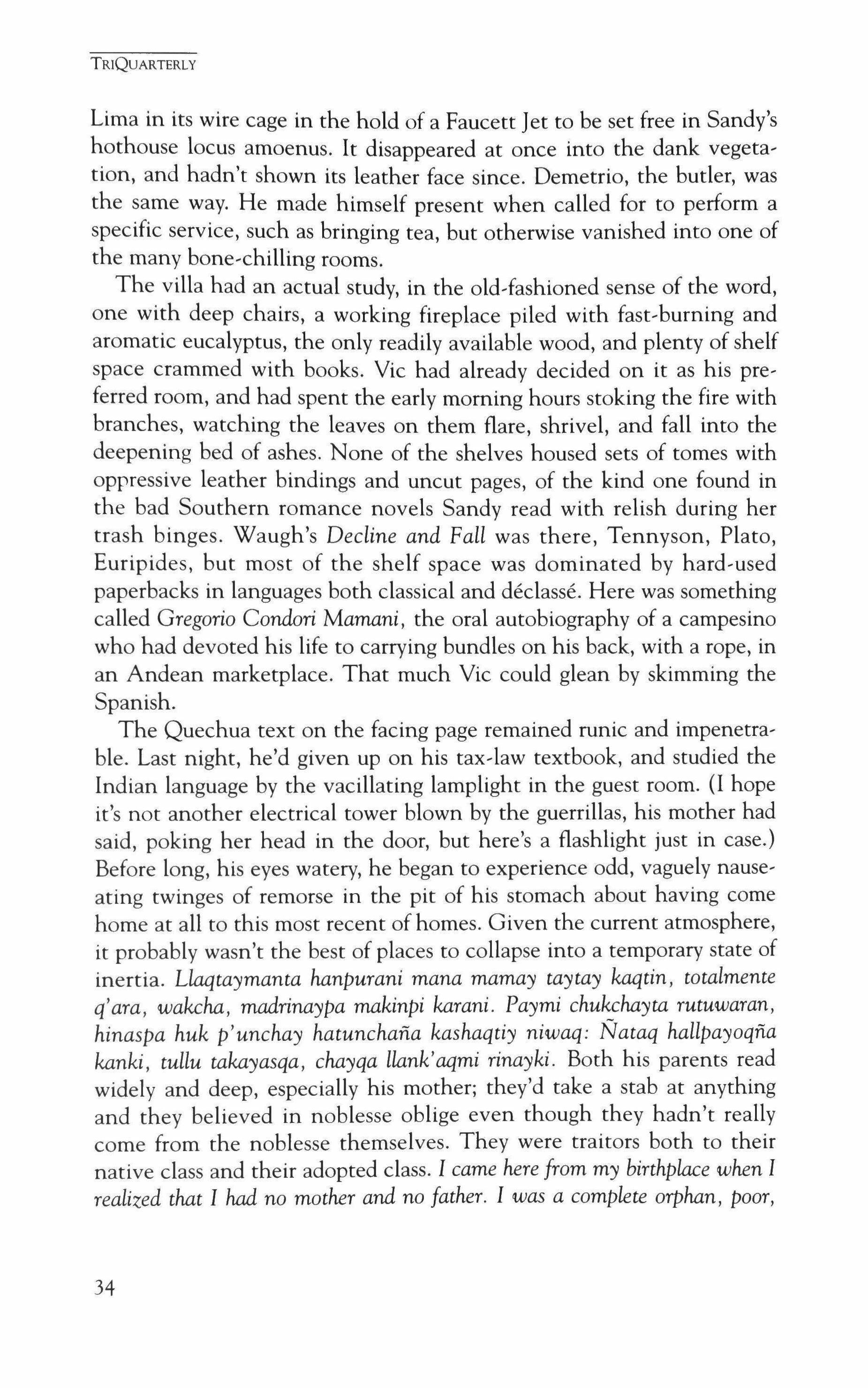
Lima in its wire cage in the hold of a Faucett Jet to be set free in Sandy's hothouse locus amoenus. It disappeared at once into the dank vegetation, and hadn't shown its leather face since. Demetrio, the butler, was the same way. He made himself present when called for to perform a specific service, such as bringing tea, but otherwise vanished into one of the many bone-chilling rooms.
The villa had an actual study, in the old-fashioned sense of the word, one with deep chairs, a working fireplace piled with fast-burning and aromatic eucalyptus, the only readily available wood, and plenty of shelf space crammed with books. Vic had already decided on it as his preferred room, and had spent the early morning hours stoking the fire with branches, watching the leaves on them flare, shrivel, and fall into the deepening bed of ashes. None of the shelves housed sets of tomes with oppressive leather bindings and uncut pages, of the kind one found in the bad Southern romance novels Sandy read with relish during her trash binges. Waugh's Decline and Fall was there, Tennyson, Plato, Euripides, but most of the shelf space was dominated by hard-used paperbacks in languages both classical and declasse. Here was something called Gregorio Condori Mamani, the oral autobiography of a campesino who had devoted his life to carrying bundles on his back, with a rope, in an Andean marketplace. That much Vic could glean by skimming the Spanish.
The Quechua text on the facing page remained runic and impenetrable. Last night, he'd given up on his tax-law textbook, and studied the Indian language by the vacillating lamplight in the guest room. (I hope it's not another electrical tower blown by the guerrillas, his mother had said, poking her head in the door, but here's a flashlight just in case.) Before long, his eyes watery, he began to experience odd, vaguely nauseating twinges of remorse in the pit of his stomach about having come home at all to this most recent of homes. Given the current atmosphere, it probably wasn't the best of places to collapse into a temporary state of inertia. Llaqtaymanta hanpurani mana mamay taytay kaqtin, totalmente q'ara, wakcha, madrinaypa makinpi karani. Paymi chukchayta rutuwaran, hinaspa huk p'unchay hatunchana kashaqtiy niwaq: Nataq hallpayoqna kanki, tullu takayasqa, chayqa llank'aqmi rinayki. Both his parents read widely and deep, especially his mother; they'd take a stab at anything and they believed in noblesse oblige even though they hadn't really come from the noblesse themselves. They were traitors both to their native class and their adopted class. I came here from my birthplace when I realized that I had no mother and no father. I was a complete orphan, poor,
TRIQUARTERLY
34
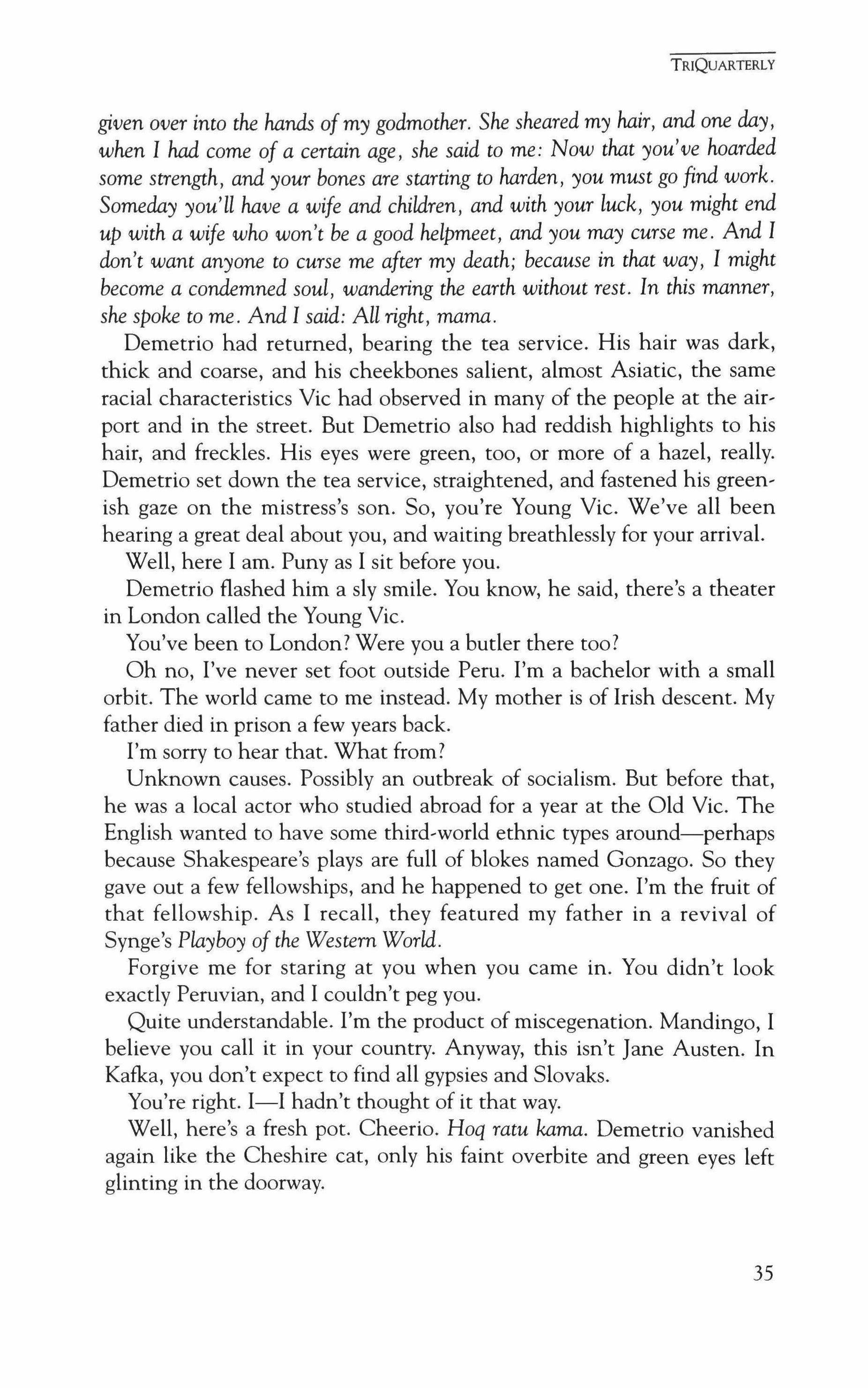
given over into the hands of my godmother. She sheared my hair, and one day, when I had come of a certain age, she said to me: Now that you've hoarded some strength, and your bones are starting to harden, you must go find work. Someday you'll have a wife and children, and with your luck, you might end up with a wife who won't be a good helpmeet, and you may curse me. And I don't want anyone to curse me after my death; because in that way, I might become a condemned soul, wandering the earth without rest. In this manner, she spoke to me. And I said: All right, mama.
Demetrio had returned, bearing the tea service. His hair was dark, thick and coarse, and his cheekbones salient, almost Asiatic, the same racial characteristics Vic had observed in many of the people at the air' port and in the street. But Demetrio also had reddish highlights to his hair, and freckles. His eyes were green, too, or more of a hazel, really. Demetrio set down the tea service, straightened, and fastened his green' ish gaze on the mistress's son. So, you're Young Vic. We've all been hearing a great deal about you, and waiting breathlessly for your arrival.
Well, here I am. Puny as I sit before you.
Demetrio flashed him a sly smile. You know, he said, there's a theater in London called the Young Vic.
You've been to London? Were you a butler there too?
Oh no, I've never set foot outside Peru. I'm a bachelor with a small orbit. The world came to me instead. My mother is of Irish descent. My father died in prison a few years back.
I'm sorry to hear that. What from?
Unknown causes. Possibly an outbreak of socialism. But before that, he was a local actor who studied abroad for a year at the Old Vic. The English wanted to have some third-world ethnic types around-perhaps because Shakespeare's plays are full of blokes named Gonzago. So they gave out a few fellowships, and he happened to get one. I'm the fruit of that fellowship. As I recall, they featured my father in a revival of Synge's Playboy of the Western World.
Forgive me for staring at you when you came in. You didn't look exactly Peruvian, and I couldn't peg you.
Quite understandable. I'm the product of miscegenation. Mandingo, I believe you call it in your country. Anyway, this isn't Jane Austen. In Kafka, you don't expect to find all gypsies and Slovaks.
You're right. I-I hadn't thought of it that way.
Well, here's a fresh pot. Cheerio. Hoq ratu kama. Demetrio vanished again like the Cheshire cat, only his faint overbite and green eyes left glinting in the doorway.
TRIQUARTERLY
35
TRIQUARTERLY

Drink the tea before it gets cold. Sandy laid the back of her hand against Vic's brow. Have your bowel movements started to return to normal?
My stomach's still a little loose, and I'm limp as a rag, but at least I'm not speaking melancholy Danish into the toilet bowl any more. And doing other equally disgusting things. I don't think there's much left inside me. Did I keep Dad awake all night with my retching?
He can cancel his meeting with that journalist from El Comercio, and take a nap this afternoon. The man never prints what he says anyway. He makes up his own quotes and arranges them in interview format, so I'm not sure what he needs Chuck for.
I guess you didn't sleep much either, coming in to give me water and hold my head. I'm really sorry. Sorry? Sorry for what?
You know. It's all so gross. Dealing with my bodily fluids. I kept hoping I would die and have a closed-casket service, so I wouldn't have to look you in the eye again. I really wish I'd checked into a hotel. At least nobody would have known me. I could have listed my profession as land surveyor in the register.
What sort of nonsense are you talking? I'm your mother. When something like that hits you, you can get dehydrated in a critical way, before you even know what's happening. I shouldn't have to tell you of all people that. I'm only glad we had enough bottled water on hand. I happened to send Chela out to stock up yesterday, on account of your arrival. Otherwise you would have been drinking a case of Inka Cola instead. Speaking of sleep, you couldn't have got more than half an hour yourself. Why don't you go lie down?
No, I'm not sleepy anymore. The wave passed. Besides, I'd rather hang out here in the study with you. This is the one room I really like. Whatever it was that hit me, I don't feel much like moving around.
At first I was certain your symptoms had to do with this cholera thing. You can't imagine what a scare you gave me. I had Chuck wake up the staff doctor over at the Embassy. He didn't seem terribly worried about it. Then I remembered that you'd ordered beef tongue. You should have eaten the fish; all the rest of us seem to be fine. Or at least had the tongue cooked well. Maybe it was trichinosis-do you get that from beef?
Pork.
Well, everybody seems to be catching livestock diseases these days. You probably just came down with a quick case of Montezuma's
36
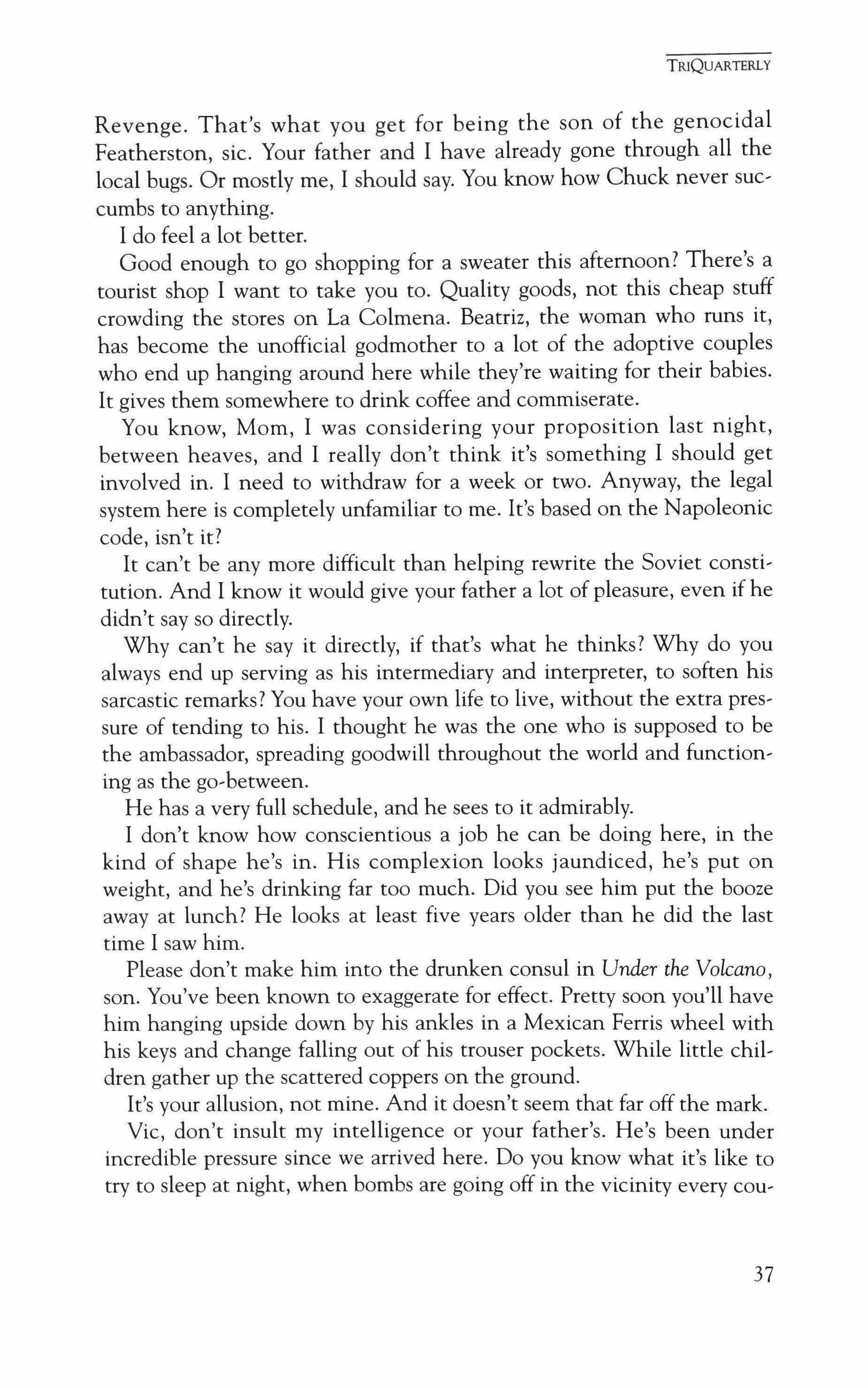
Revenge. That's what you get for being the son of the genocidal Featherston, sic. Your father and I have already gone through all the local bugs. Or mostly me, I should say. You know how Chuck never succumbs to anything.
I do feel a lot better.
Good enough to go shopping for a sweater this afternoon? There's a tourist shop I want to take you to. Quality goods, not this cheap stuff crowding the stores on La Colmena. Beatriz, the woman who runs it, has become the unofficial godmother to a lot of the adoptive couples who end up hanging around here while they're waiting for their babies. It gives them somewhere to drink coffee and commiserate.
You know, Mom, I was considering your proposition last night, between heaves, and I really don't think it's something I should get involved in. I need to withdraw for a week or two. Anyway, the legal system here is completely unfamiliar to me. It's based on the Napoleonic code, isn't it?
It can't be any more difficult than helping rewrite the Soviet constitution. And I know it would give your father a lot of pleasure, even if he didn't say so directly.
Why can't he say it directly, if that's what he thinks? Why do you always end up serving as his intermediary and interpreter, to soften his sarcastic remarks? You have your own life to live, without the extra pressure of tending to his. I thought he was the one who is supposed to be the ambassador, spreading goodwill throughout the world and functioning as the go-between.
He has a very full schedule, and he sees to it admirably.
I don't know how conscientious a job he can be doing here, in the kind of shape he's in. His complexion looks jaundiced, he's put on weight, and he's drinking far too much. Did you see him put the booze away at lunch? He looks at least five years older than he did the last time I saw him.
Please don't make him into the drunken consul in Under the Volcano, son. You've been known to exaggerate for effect. Pretty soon you'll have him hanging upside down by his ankles in a Mexican Ferris wheel with his keys and change falling out of his trouser pockets. While little children gather up the scattered coppers on the ground.
It's your allusion, not mine. And it doesn't seem that far off the mark. Vic, don't insult my intelligence or your father's. He's been under incredible pressure since we arrived here. Do you know what it's like to try to sleep at night, when bombs are going off in the vicinity every cou-
TRIQUARTERLY
37
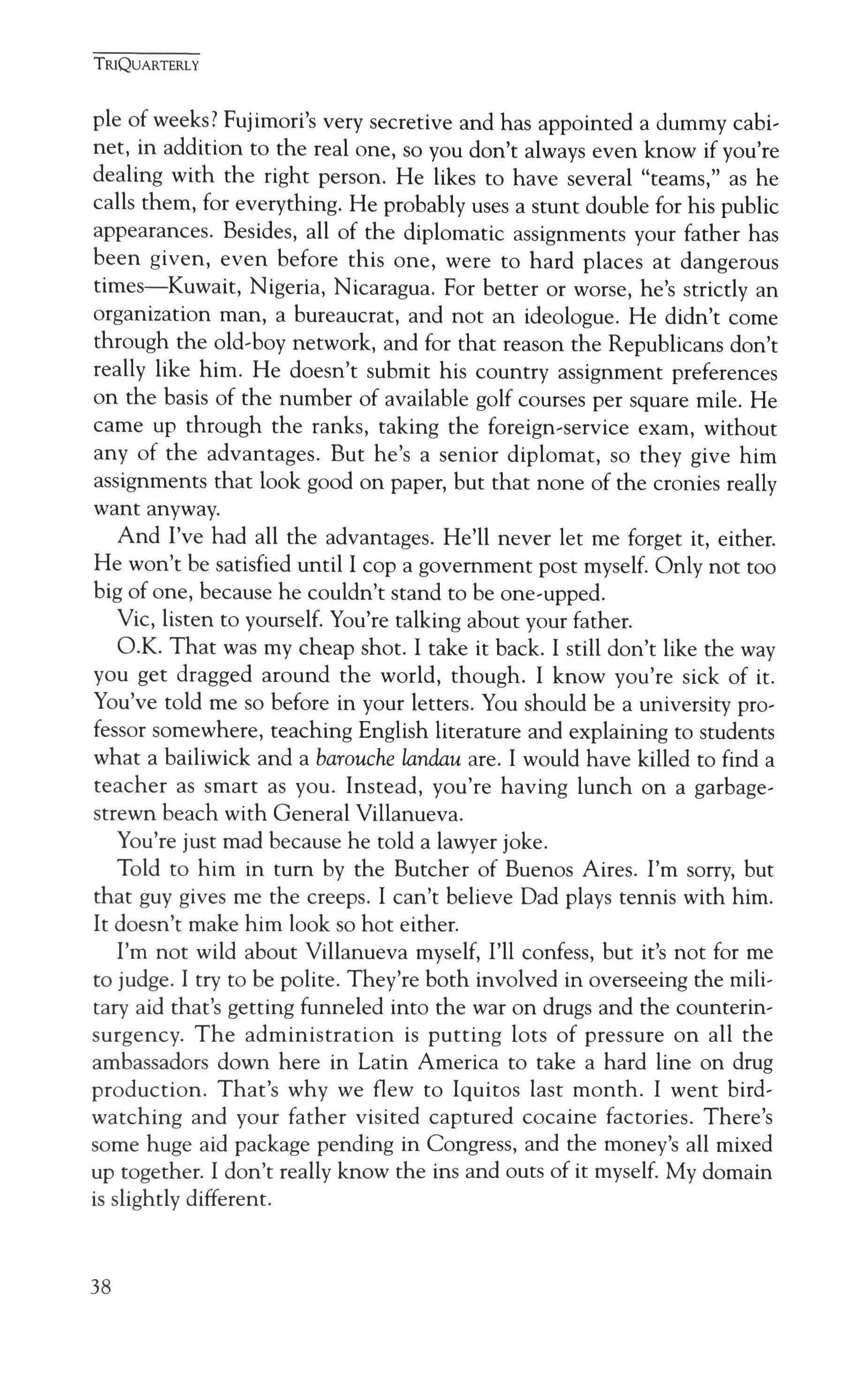
ple of weeks? Fujimori's very secretive and has appointed a dummy cabinet, in addition to the real one, so you don't always even know if you're dealing with the right person. He likes to have several "teams," as he calls them, for everything. He probably uses a stunt double for his public appearances. Besides, all of the diplomatic assignments your father has been given, even before this one, were to hard places at dangerous times-Kuwait, Nigeria, Nicaragua. For better or worse, he's strictly an organization man, a bureaucrat, and not an ideologue. He didn't come through the old,boy network, and for that reason the Republicans don't really like him. He doesn't submit his country assignment preferences on the basis of the number of available golf courses per square mile. He came up through the ranks, taking the foreign-service exam, without any of the advantages. But he's a senior diplomat, so they give him assignments that look good on paper, but that none of the cronies really want anyway.
And I've had all the advantages. He'll never let me forget it, either. He won't be satisfied until I cop a government post myself. Only not too big of one, because he couldn't stand to be one-upped.
Vic, listen to yourself. You're talking about your father.
O.K. That was my cheap shot. I take it back. I still don't like the way you get dragged around the world, though. I know you're sick of it. You've told me so before in your letters. You should be a university pro' fessor somewhere, teaching English literature and explaining to students what a bailiwick and a barouche landau are. I would have killed to find a teacher as smart as you. Instead, you're having lunch on a garbagestrewn beach with General Villanueva.
You're just mad because he told a lawyer joke.
Told to him in tum by the Butcher of Buenos Aires. I'm sorry, but that guy gives me the creeps. I can't believe Dad plays tennis with him. It doesn't make him look so hot either.
I'm not wild about Villanueva myself, I'll confess, but it's not for me to judge. I try to be polite. They're both involved in overseeing the military aid that's getting funneled into the war on drugs and the counterinsurgency. The administration is putting lots of pressure on all the ambassadors down here in Latin America to take a hard line on drug production. That's why we flew to Iquitos last month. I went bird, watching and your father visited captured cocaine factories. There's some huge aid package pending in Congress, and the money's all mixed up together. I don't really know the ins and outs of it myself. My domain is slightly different.
TRIQUARTERLY
38
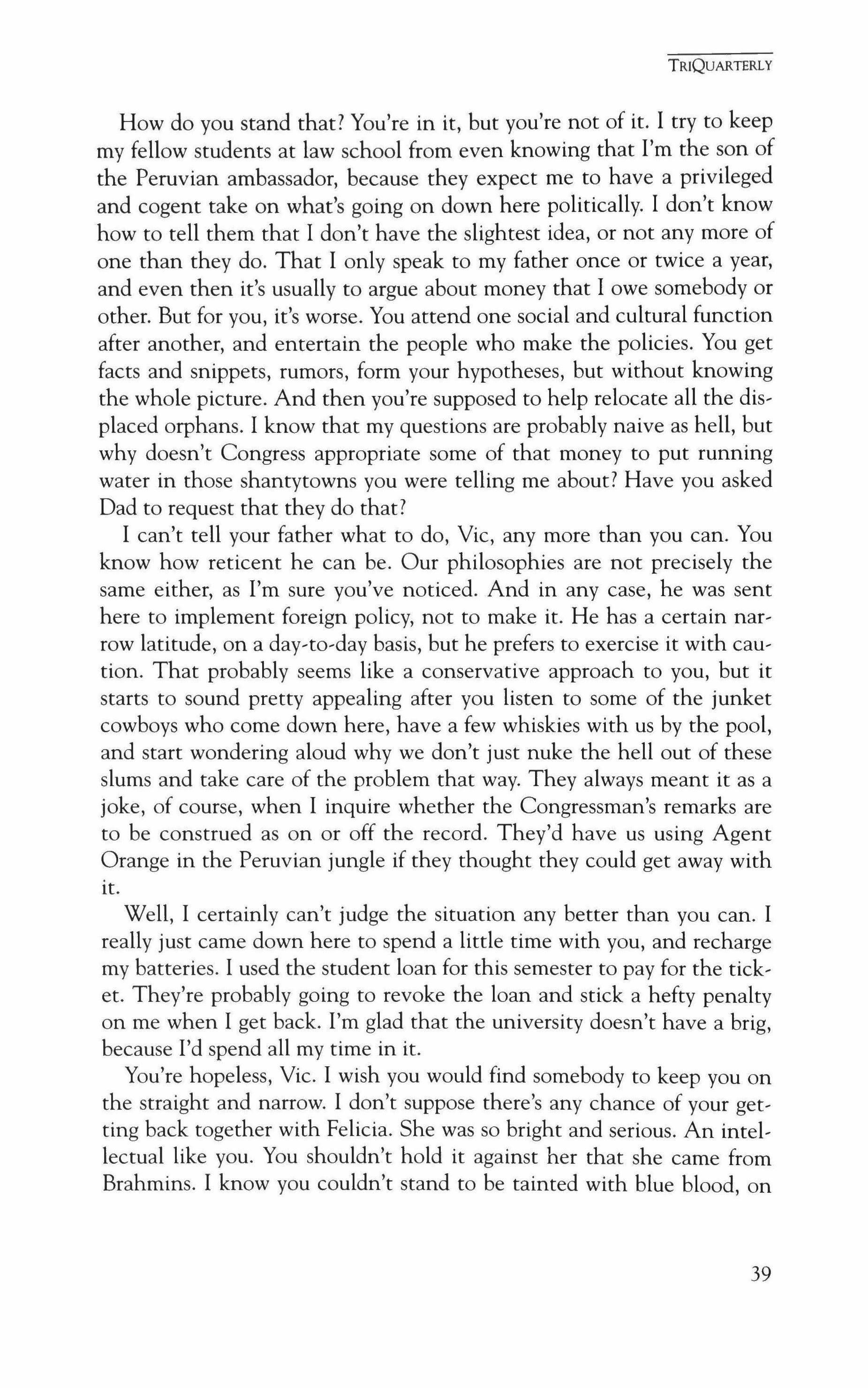
How do you stand that? You're in it, but you're not of it. I try to keep my fellow students at law school from even knowing that I'm the son of the Peruvian ambassador, because they expect me to have a privileged and cogent take on what's going on down here politically. I don't know how to tell them that I don't have the slightest idea, or not any more of one than they do. That I only speak to my father once or twice a year, and even then it's usually to argue about money that lowe somebody or other. But for you, it's worse. You attend one social and cultural function after another, and entertain the people who make the policies. You get facts and snippets, rumors, form your hypotheses, but without knowing the whole picture. And then you're supposed to help relocate all the displaced orphans. I know that my questions are probably naive as hell, but why doesn't Congress appropriate some of that money to put running water in those shantytowns you were telling me about? Have you asked Dad to request that they do that?
I can't tell your father what to do, Vic, any more than you can. You know how reticent he can be. Our philosophies are not precisely the same either, as I'm sure you've noticed. And in any case, he was sent here to implement foreign policy, not to make it. He has a certain narrow latitude, on a day-to-day basis, but he prefers to exercise it with caution. That probably seems like a conservative approach to you, but it starts to sound pretty appealing after you listen to some of the junket cowboys who come down here, have a few whiskies with us by the pool, and start wondering aloud why we don't just nuke the hell out of these slums and take care of the problem that way. They always meant it as a joke, of course, when I inquire whether the Congressman's remarks are to be construed as on or off the record. They'd have us using Agent Orange in the Peruvian jungle if they thought they could get away with it.
Well, I certainly can't judge the situation any better than you can. I really just came down here to spend a little time with you, and recharge my batteries. I used the student loan for this semester to pay for the ticket. They're probably going to revoke the loan and stick a hefty penalty on me when I get back. I'm glad that the university doesn't have a brig, because I'd spend all my time in it.
You're hopeless, Vic. I wish you would find somebody to keep you on the straight and narrow. I don't suppose there's any chance of your getting back together with Felicia. She was so bright and serious. An intellectual like you. You shouldn't hold it against her that she came from Brahmins. I know you couldn't stand to be tainted with blue blood, on
TRIQUARTERLY
39

top of being an ambassador's son. But if it will make you feel any better, a Brahmin is also a breed of cattle, you know. Even cows have pedigrees. It has a hump between the shoulders, and a pendulous dewlap. You could tell people she's a rodeo cowgirl, or a veterinarian. Or that she works in a freak show.
I don't hold her pedigree against her. We just had different expectations about things. Anyway, that was long ago.
I suppose you're still seeing that Andrea girl.
Your tone of voice tells me that you may yet be withholding a drop or two of approval.
I liked her quite well the time I met her in Boston. I found her positively--charming.
That's the most noncommital, nondescript, diplomatic adjective you could have selected.
1 know Andrea is smart, in her own way, but if you want me to be blunt, she struck me as a bit too much of the California golden girl. She's even tawny. I simply think that you need someone more ambitious and less frivolous. She's doubtless a delicious find for most any healthy young male, including yourself, but I can't imagine that it's going to last.
That's my affair. O.K.? End of discussion. In any event, I don't think I'm in much of a position to be judging the ambition of others.
You have plenty of ambition. The problem is that it shoots out of your pores in every direction, wreaking carnage, like Saint Sebastian's arrows in reverse. Do you understand how close you keep coming to messing up your life for good?
1 agree. That's why I don't think I'd be a very good choice for shepherding this couple through their troubles. It's the blind leading the blind.
Vic, please help me out on this. I need someone I can put my trust in, and I've seldom asked anything of you. The things I do may seem useless or strange, from your vantage point, and it's true that I do on occasion complain about them. Every task I perform here is based on half-truths, partial knowledge spoken in whispers at the bottom of a well. But an ambassador's wife is what I am, son. That's my life. I wield mandarin courtesies that I've spent my existence honing to razor sharpness. I can't sit here waiting for the ethical complications to sort themselves out. All I can manage is to exercise my peculiar, rarefied little domain of social clubs and the wives of prominent citizens in the best way I know how. And right now, what I want more than anything is for the Thomases to take possession of that baby waiting for them in Tawantinsuyo. That's
TRIQUARTERLY
40

something I can actually make happen. It's a task that's manageable enough to see through to the end. I even have dreams about it. When they told me their story, I felt as sad as if I had been the one to watch my child die. As if I'd lost you for all time, and could never live through the experience of holding you in my arms when you're weak and sick and limp, and in spite of the fact that you're twenty-eight years old, still be able to hear you cry out in the middle of the night Mama, Mama help me I think I'm dying. You gave me a real scare. I thought I was going to have to give you up, and I discovered that I'm not quite ready to do that.
In this manner, she spoke to him. And he said: All right, Mama.
III
They chose to have the driver leave them at the comer of Caruana and La Colmena, but within two minutes had reason to regret their decision. The moneychangers thronged about Sandy and Vic, brandishing solar calculators the size of credit cards, holding them heavenward so the digital display would receive the maximum exposure to the winter sun's rays, as they babbled hypothetical equations of intis to dollars, in thousands, tens of thousands, some running off like auctioneers on ether into the millions, or turning the calculators askew so that they flashed an endlessly repeating decimal, 6666666 or 8888888. As she and he pushed their way up the block, still more people milled about with placards lettered by hand. At first Vic feared a protest had formed on short notice. He didn't know whether or not his mother's face recognition and perceived importance were sufficient to summon up an event of that kind, whether she was serving as a second-string lightning rod for wrath about a recent visit by the IMF, or the coca policy, or the changes taking place in Czechoslovakia. But the signs all pertained to currency exchange, pure and simple. I ACCEPT TORN TAPED STAPLED BURNT RIPPED DOLLARS. BUY OR SELL ALL THE SAME TO ME.
She took him by the arm with surprising strength, and using her elbow as a rudder, hustled him through the gauntlet with her head down, as if they were attending a rowdy political rally and she wanted to keep him from being assassinated. He felt instinctively that if someone had in fact begun sniping, she would have thrown her body across his without hesitation to receive the bullets herself. She was not the type to be left a grieving mother or widow. At length they came out on a wide
TruQUARTERLY
41
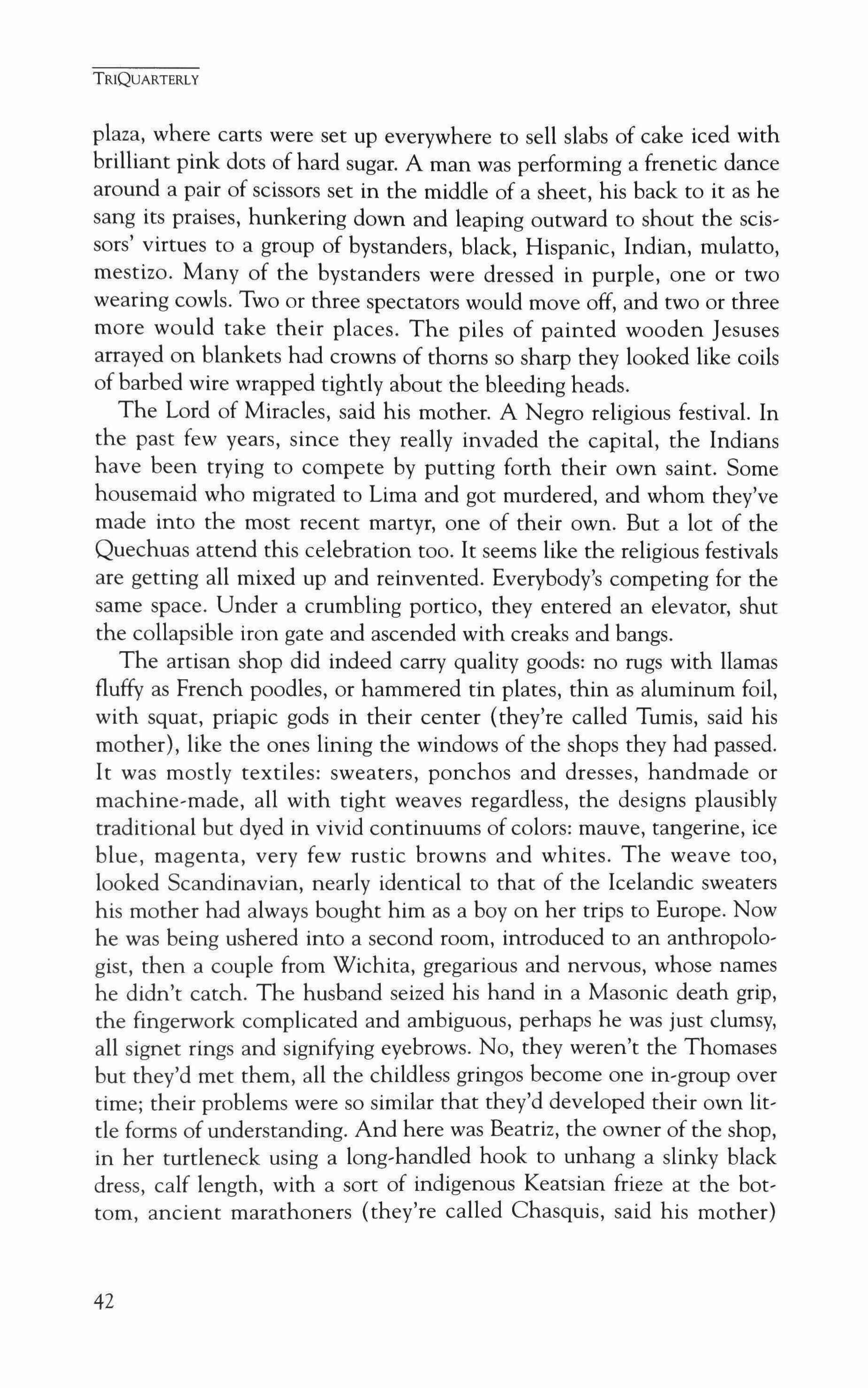
plaza, where carts were set up everywhere to sell slabs of cake iced with brilliant pink dots of hard sugar. A man was performing a frenetic dance around a pair of scissors set in the middle of a sheet, his back to it as he sang its praises, hunkering down and leaping outward to shout the scissors' virtues to a group of bystanders, black, Hispanic, Indian, mulatto, mestizo. Many of the bystanders were dressed in purple, one or two wearing cowls. Two or three spectators would move off, and two or three more would take their places. The piles of painted wooden Jesuses arrayed on blankets had crowns of thorns so sharp they looked like coils of barbed wire wrapped tightly about the bleeding heads.
The Lord of Miracles, said his mother. A Negro religious festival. In the past few years, since they really invaded the capital, the Indians have been trying to compete by putting forth their own saint. Some housemaid who migrated to Lima and got murdered, and whom they've made into the most recent martyr, one of their own. But a lot of the Quechuas attend this celebration too. It seems like the religious festivals are getting all mixed up and reinvented. Everybody's competing for the same space. Under a crumbling portico, they entered an elevator, shut the collapsible iron gate and ascended with creaks and bangs.
The artisan shop did indeed carry quality goods: no rugs with llamas fluffy as French poodles, or hammered tin plates, thin as aluminum foil, with squat, priapic gods in their center (they're called Tumis, said his mother), like the ones lining the windows of the shops they had passed. It was mostly textiles: sweaters, ponchos and dresses, handmade or machine-made, all with tight weaves regardless, the designs plausibly traditional but dyed in vivid continuums of colors: mauve, tangerine, ice blue, magenta, very few rustic browns and whites. The weave too, looked Scandinavian, nearly identical to that of the Icelandic sweaters his mother had always bought him as a boy on her trips to Europe. Now he was being ushered into a second room, introduced to an anthropologist, then a couple from Wichita, gregarious and nervous, whose names he didn't catch. The husband seized his hand in a Masonic death grip, the fingerwork complicated and ambiguous, perhaps he was just clumsy, all signet rings and signifying eyebrows. No, they weren't the Thomases but they'd met them, all the childless gringos become one in-group over time; their problems were so similar that they'd developed their own little forms of understanding. And here was Beatriz, the owner of the shop, in her turtleneck using a long-handled hook to unhang a slinky black dress, calf length, with a sort of indigenous Keatsian frieze at the bottom, ancient marathoners (they're called Chasquis, said his mother)
TRIQUARTERLY
42
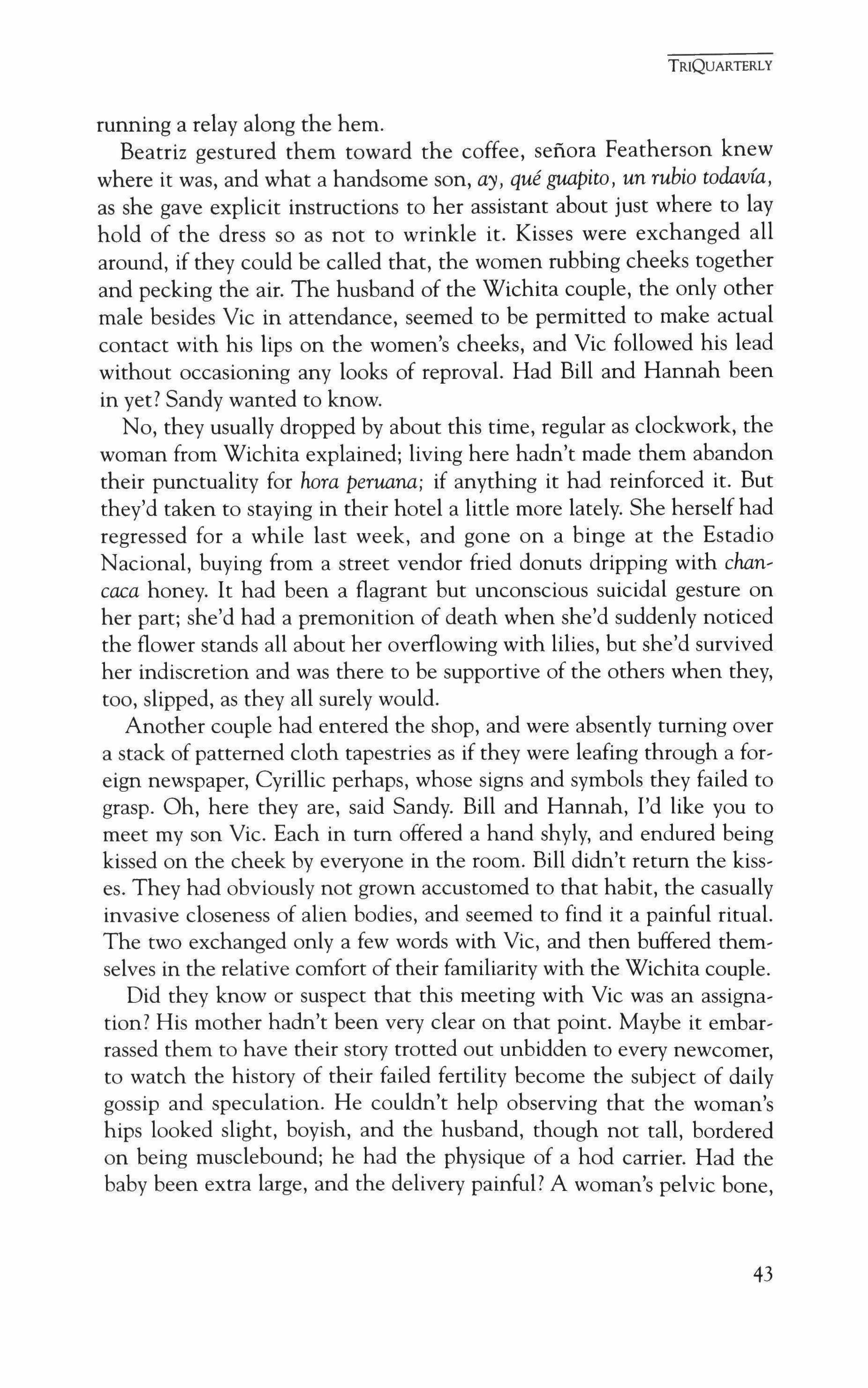
running a relay along the hem.
Beatriz gestured them toward the coffee, senora Featherson knew where it was, and what a handsome son, ay, que guapito, un rubio todavia, as she gave explicit instructions to her assistant about just where to lay hold of the dress so as not to wrinkle it. Kisses were exchanged all around, if they could be called that, the women rubbing cheeks together and pecking the air. The husband of the Wichita couple, the only other male besides Vic in attendance, seemed to be permitted to make actual contact with his lips on the women's cheeks, and Vic followed his lead without occasioning any looks of reproval. Had Bill and Hannah been in yet? Sandy wanted to know.
No, they usually dropped by about this time, regular as clockwork, the woman from Wichita explained; living here hadn't made them abandon their punctuality for hom peruana; if anything it had reinforced it. But they'd taken to staying in their hotel a little more lately. She herself had regressed for a while last week, and gone on a binge at the Estadio Nacional, buying from a street vendor fried donuts dripping with chan� caca honey. It had been a flagrant but unconscious suicidal gesture on her part; she'd had a premonition of death when she'd suddenly noticed the flower stands all about her overflowing with lilies, but she'd survived her indiscretion and was there to be supportive of the others when they, too, slipped, as they all surely would.
Another couple had entered the shop, and were absently turning over a stack of patterned cloth tapestries as if they were leafing through a foreign newspaper, Cyrillic perhaps, whose signs and symbols they failed to grasp. Oh, here they are, said Sandy. Bill and Hannah, I'd like you to meet my son Vic. Each in tum offered a hand shyly, and endured being kissed on the cheek by everyone in the room. Bill didn't return the kisses. They had obviously not grown accustomed to that habit, the casually invasive closeness of alien bodies, and seemed to find it a painful ritual. The two exchanged only a few words with Vic, and then buffered themselves in the relative comfort of their familiarity with the Wichita couple. Did they know or suspect that this meeting with Vic was an assignation? His mother hadn't been very clear on that point. Maybe it embarrassed them to have their story trotted out unbidden to every newcomer, to watch the history of their failed fertility become the subject of daily gossip and speculation. He couldn't help observing that the woman's hips looked slight, boyish, and the husband, though not tall, bordered on being musclebound; he had the physique of a hod carrier. Had the baby been extra large, and the delivery painful? A woman's pelvic bone,
TRIQUARTERLY
43
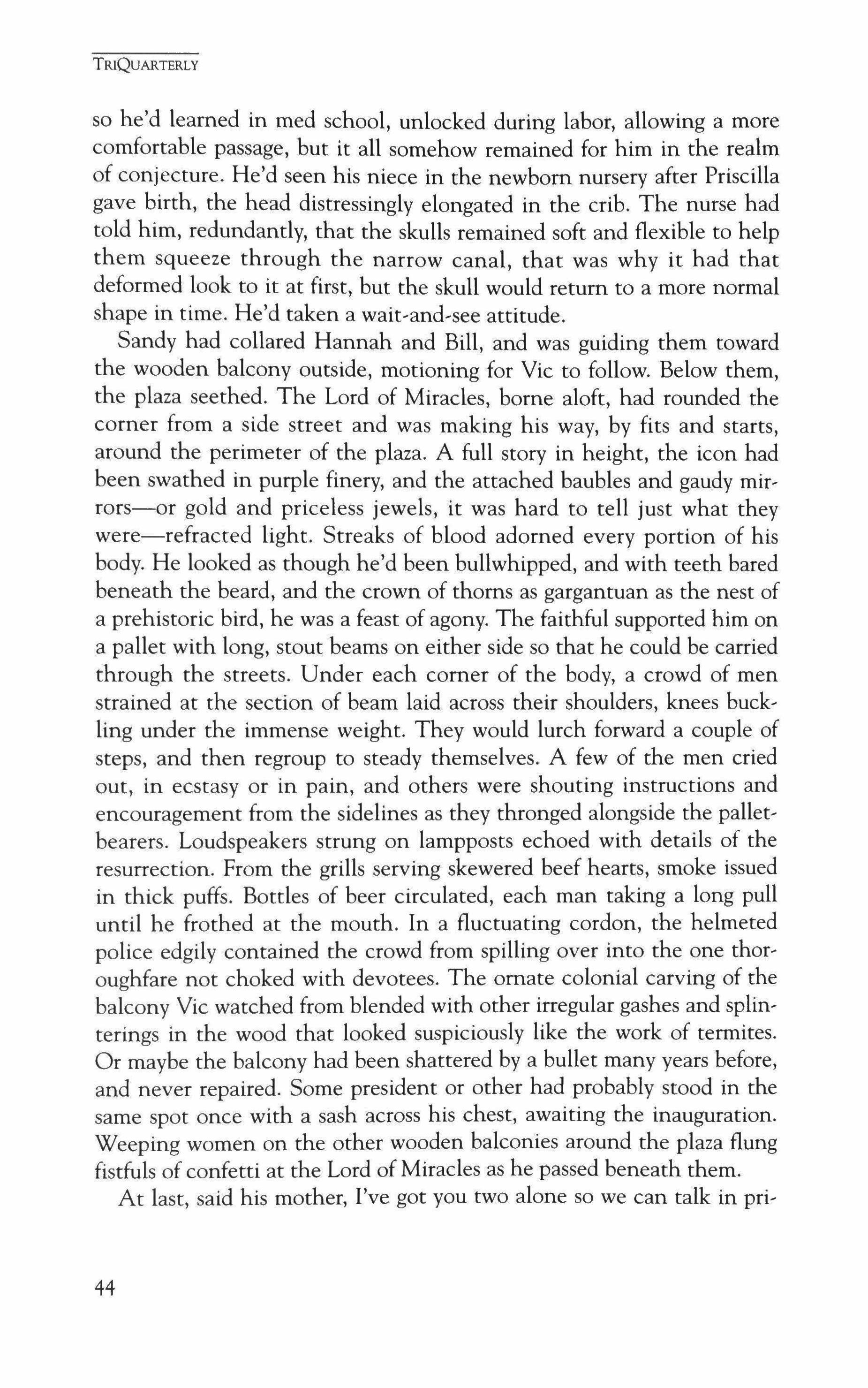
so he'd learned in med school, unlocked during labor, allowing a more comfortable passage, but it all somehow remained for him in the realm of conjecture. He'd seen his niece in the newborn nursery after Priscilla gave birth, the head distressingly elongated in the crib. The nurse had told him, redundantly, that the skulls remained soft and flexible to help them squeeze through the narrow canal, that was why it had that deformed look to it at first, but the skull would return to a more normal shape in time. He'd taken a wait-and-see attitude.
Sandy had collared Hannah and Bill, and was guiding them toward the wooden balcony outside, motioning for Vic to follow. Below them, the plaza seethed. The Lord of Miracles, borne aloft, had rounded the corner from a side street and was making his way, by fits and starts, around the perimeter of the plaza. A full story in height, the icon had been swathed in purple finery, and the attached baubles and gaudy mirrors-or gold and priceless jewels, it was hard to tell just what they were-refracted light. Streaks of blood adorned every portion of his body. He looked as though he'd been bullwhipped, and with teeth bared beneath the beard, and the crown of thorns as gargantuan as the nest of a prehistoric bird, he was a feast of agony. The faithful supported him on a pallet with long, stout beams on either side so that he could be carried through the streets. Under each corner of the body, a crowd of men strained at the section of beam laid across their shoulders, knees buckling under the immense weight. They would lurch forward a couple of steps, and then regroup to steady themselves. A few of the men cried out, in ecstasy or in pain, and others were shouting instructions and encouragement from the sidelines as they thronged alongside the palletbearers. Loudspeakers strung on lampposts echoed with details of the resurrection. From the grills serving skewered beef hearts, smoke issued in thick puffs. Bottles of beer circulated, each man taking a long pull until he frothed at the mouth. In a fluctuating cordon, the helmeted police edgily contained the crowd from spilling over into the one thoroughfare not choked with devotees. The ornate colonial carving of the balcony Vic watched from blended with other irregular gashes and splinterings in the wood that looked suspiciously like the work of termites. Or maybe the balcony had been shattered by a bullet many years before, and never repaired. Some president or other had probably stood in the same spot once with a sash across his chest, awaiting the inauguration. Weeping women on the other wooden balconies around the plaza flung fistfuls of confetti at the Lord of Miracles as he passed beneath them. At last, said his mother, I've got you two alone so we can talk in pri-
TRIQUARTERLY
44
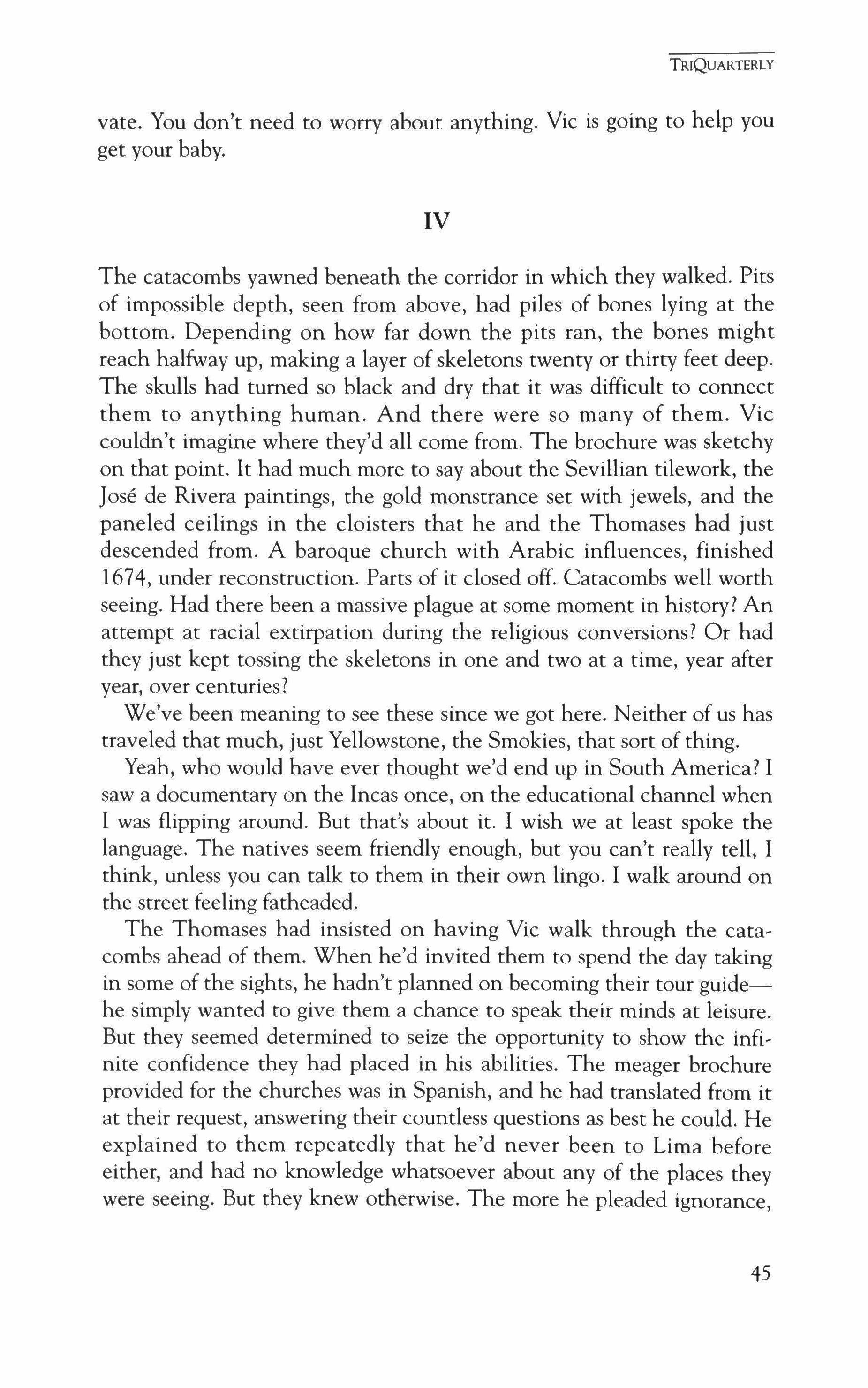
vate. You don't need to worry about anything. Vic is going to help you get your baby.
IV
The catacombs yawned beneath the corridor in which they walked. Pits of impossible depth, seen from above, had piles of bones lying at the bottom. Depending on how far down the pits ran, the bones might reach halfway up, making a layer of skeletons twenty or thirty feet deep. The skulls had turned so black and dry that it was difficult to connect them to anything human. And there were so many of them. Vic couldn't imagine where they'd all come from. The brochure was sketchy on that point. It had much more to say about the Sevillian tilework, the Jose de Rivera paintings, the gold monstrance set with jewels, and the paneled ceilings in the cloisters that he and the Thomases had just descended from. A baroque church with Arabic influences, finished 1674, under reconstruction. Parts of it closed off. Catacombs well worth seeing. Had there been a massive plague at some moment in history? An attempt at racial extirpation during the religious conversions? Or had they just kept tossing the skeletons in one and two at a time, year after year, over centuries?
We've been meaning to see these since we got here. Neither of us has traveled that much, just Yellowstone, the Smokies, that sort of thing.
Yeah, who would have ever thought we'd end up in South America? I saw a documentary on the Incas once, on the educational channel when I was flipping around. But that's about it. I wish we at least spoke the language. The natives seem friendly enough, but you can't really tell, I think, unless you can talk to them in their own lingo. I walk around on the street feeling fatheaded.
The Thomases had insisted on having Vic walk through the catacombs ahead of them. When he'd invited them to spend the day taking in some of the sights, he hadn't planned on becoming their tour guidehe simply wanted to give them a chance to speak their minds at leisure. But they seemed determined to seize the opportunity to show the infinite confidence they had placed in his abilities. The meager brochure provided for the churches was in Spanish, and he had translated from it at their request, answering their countless questions as best he could. He explained to them repeatedly that he'd never been to Lima before either, and had no knowledge whatsoever about any of the places they were seeing. But they knew otherwise. The more he pleaded ignorance,
TRIQUARTERLY
45
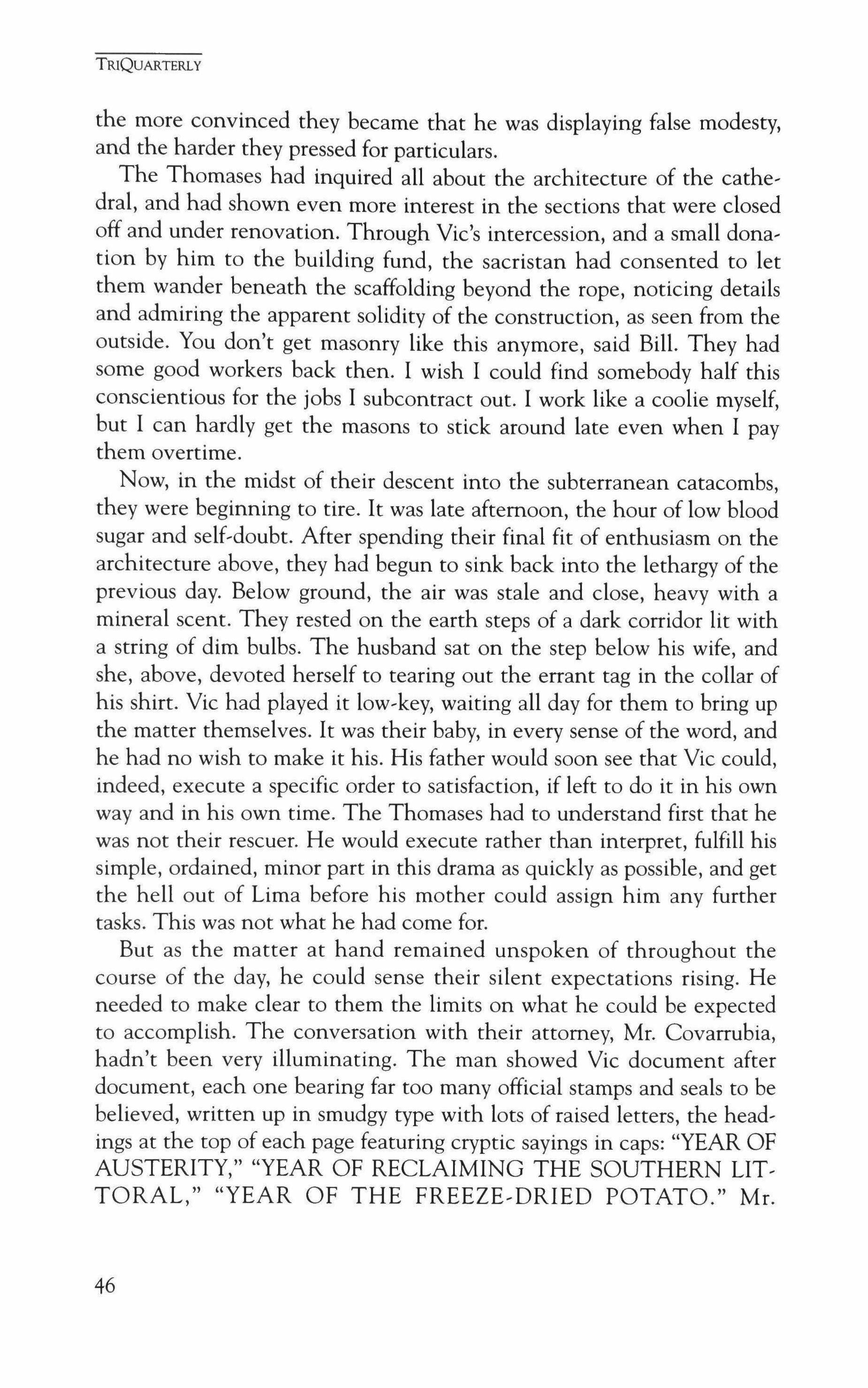
the more convinced they became that he was displaying false modesty, and the harder they pressed for particulars.
The Thomases had inquired all about the architecture of the cathedral, and had shown even more interest in the sections that were closed off and under renovation. Through Vic's intercession, and a small donation by him to the building fund, the sacristan had consented to let them wander beneath the scaffolding beyond the rope, noticing details and admiring the apparent solidity of the construction, as seen from the outside. You don't get masonry like this anymore, said Bill. They had some good workers back then. I wish I could find somebody half this conscientious for the jobs I subcontract out. I work like a coolie myself, but I can hardly get the masons to stick around late even when I pay them overtime.
Now, in the midst of their descent into the subterranean catacombs, they were beginning to tire. It was late afternoon, the hour of low blood sugar and self-doubt. After spending their final fit of enthusiasm on the architecture above, they had begun to sink back into the lethargy of the previous day. Below ground, the air was stale and close, heavy with a mineral scent. They rested on the earth steps of a dark corridor lit with a string of dim bulbs. The husband sat on the step below his wife, and she, above, devoted herself to tearing out the errant tag in the collar of his shirt. Vic had played it low-key, waiting all day for them to bring up the matter themselves. It was their baby, in every sense of the word, and he had no wish to make it his. His father would soon see that Vic could, indeed, execute a specific order to satisfaction, if left to do it in his own way and in his own time. The Thomases had to understand first that he was not their rescuer. He would execute rather than interpret, fulfill his simple, ordained, minor part in this drama as quickly as possible, and get the hell out of Lima before his mother could assign him any further tasks. This was not what he had come for.
But as the matter at hand remained unspoken of throughout the course of the day, he could sense their silent expectations rising. He needed to make clear to them the limits on what he could be expected to accomplish. The conversation with their attorney, Mr. Covarrubia, hadn't been very illuminating. The man showed Vic document after document, each one bearing far too many official stamps and seals to be believed, written up in smudgy type with lots of raised letters, the headings at the top of each page featuring cryptic sayings in caps: "YEAR OF AUSTERITY," "YEAR OF RECLAIMING THE SOUTHERN LlT� TORAL," "YEAR OF THE FREEZE�DRIED POTATO." Mr.
TRIQUARTERLY
46

Covarrubia obviously resented Vic's injection into the proceedings, especially after he found out Vic didn't actually have a degree. And the decrepit, windowless office, with its deeply scarred desk, plus the people who kept coming over to borrow his pen-apparently the only one in the place that worked-didn't inspire Vic's confidence in Mr. Covarrubia either. Nor did he appreciate the attorney's habit of con' stantly and testily referring to Vic as joven, instead of by his name.
Yet Covarrubia didn't seem to be withholding any information, as far as Vic could tell. It looked as though he had gone through all the appro' priate steps so far. Though not inspired, the attorney was competent. The only incriminating thing was that each step had taken so long. The attorney blamed it on the fact that the most efficient judges kept getting assassinated by the Shining Path. And the mother of the baby, one Anastasia Wamani, keeps changing her story. He handed Vic the file. After leafing through it, Vic tried to give the file back, but the attorney held up his hand. Oh, no. It's yours now.
The Thomases still hadn't brought up the matter of adoption in the course of the outing by the time Vic led them into the San Francisco Church. When the sacristan had casually mentioned that for another small donation, this time to the charity fund, the catacombs too could be opened, Vic hadn't hesitated. He gave the man an unambiguously large tip, and let him know they preferred to have a self,guided tour. Now the three of them were alone in the catacombs, physically under, ground, with only the petrified and thoroughly dead bones of departed souls for company.
Are you unhappy with the way the adoption process has gone so far?
Unhappy? Hannah weighed the syllables of the adjective, one at a time. How can we tell? In every meeting we've had, the attorney has had to translate for us. We tell him what to tell them, and can only assume he's reporting to them accurately what we say.
Accuracy is vital, said Vic. We've got to strip this business down to its bare'bones lineaments, if we're going to get anywhere. Throw off the superfluous detail, and get to the heart of the matter.
Yes, but the woman at the agency talks for two minutes, waving her arms and pointing at us, to me she looks angry, ready to jump across her desk, and Mr. Covarrubia paraphrases her in a couple of dry sentences. He tells us she says that everything is going as smoothly as a person can expect. We sign papers when we're not exactly sure what their contents are. We have to trust him. Whether you're suspicious-minded or not, in the end the whole thing is an act of faith. That's why we're so grateful
TRIQUARTERLY
47

you came onto the scene. Our future happiness is in your hands. And the questions, said Bill. They want to know everything about us. I know they have to be thorough and all. But it's like the Inquisition. How much did we make for each of the past ten years, what exactly happened to our first baby, how did it die. You don't know what it's like to have to tell that story over and over. Can't they let him rest in peace? His life for eight months was nothing but pure torture and suffering, and then it ended. I honestly thought adopting would be a lot easier than this. You wouldn't think these people could afford to insist on so much bureaucracy. They got so many babies down here starving to death. Why are they so picky? We just want to give a good home to one of them. Fatten it up. Spoil the hell out of it. And they treat us like a couple of goddamned criminals. If I had to do it over again, I swear I'm not so sure I'd go through with all of this.
Hannah looked around herself uneasily. Don't say that, Bill. And don't take the Lord's name in vain in a place like this.
O.K., honey. You're feeling superstitious, that's all right. Ain't nothing but a shitload of bones.
I don't care. I don't want anything to jinx us. We've come this far.
This city makes a person edgy. We're both a little edgy. Don't it make you edgy too, Vic? I used to dance on graves in the boneyard when I was a kid, just to smart off, but I sure as hell don't feel like dancing now.
Promise me that once we have this baby, we're not going to move into any more dilapidated houses. I'm tired of restoring rotting Victorians, fixing them up to where they're perfect, to where we really like them, and then selling them to somebody else, so they can enjoy it.
That's our livelihood.
We can get normal jobs. You can work for a contractor at a regular wage. You're too proud.
I don't want to be somebody's brick-lackey my whole life. See them scars on my fingers? I been working like a damn coolie since I was fifteen years old. And when I kick off, they're going to throw me in a pauper's grave like this one, unless I got some money socked away for my burial. You want to be able to pay for a house outright, don't you? Instead of a thirty-year mortgage, where all the money goes to payoff interest so bankers can take vacations in Hawaii? We've been building up. Each one we finish and sell, we've ended up with a little more equity. What difference does it make? We're going to squander the whole nest egg down here before this wretched business is through. Promise me we're not going to start the process all over.
TRIQUARTERLY
48

I can't say anything for sure right now. Let's wait and see what Vic can do for us before we decide.
I'm not going back up aboveground until you swear a solemn oath.
O.K., O.K. I promise by my mother's shade. Let's not do our family laundry in front of Vic here.
I know we're not the most exciting people in the world. We probably watch too much television. But we're going to love this baby. Love it to death.
Hey, look who's jinxing us now. See there, we both need to lighten up. Sandy's son has come all the way down from the U.s.A. to help us, and the situation is looking up. He's got everything under control. We've done our penance these last couple of years, and now it's time for good things to start happening. We got the top man. With heavy hitters like the Feathersons on our side, it's going to be a cinch. A matter of a few weeks at most now. Would you tell her, Vic?
I spent some time talking with your attorney, and up to this point I believe that his work has mostly been in order. What remains is to tie up the loose ends. It wasn't as much of a morass as I'd been led to believe, once I sat down and looked at the specific documentation. That's good to hear. We've kind of been anxious to get a second opinion. I won't lie to you, we've been starting to lose hope a little. Sweating bullets every night, I don't mind saying. This stuff is all out of our depth, and we never know what to expect next. You hear lots of rumors. Somebody we met at the souvenir shop knew somebody who got frustrated with all the red tape, and tried to adopt in Colombia through a private service. Said the people took them in a helicopter up to a mountain village. There were cages in the plaza lined up with kids inside, reaching their hands through the bars, saying, Take me, take me, mister. A real horror show. They freaked, and didn't pick anybody. Got the hell out of there, more like. The agency here won't let us meet with the mother of the baby, even though we've asked to several times, so it makes us think something ain't quite kosher about the whole business.
I don't think it works that way here. Above all, you shouldn't listen to rumors. The only thing second- and third-hand gossip does is create an atmosphere of uncertainty. In your case, there's reason for cautious hope. Very cautious.
Cautious, right. You mean it's going to happen one way or another, just maybe down the road aways.
It could be next week or six months from now, if at all. But I'll do everything in my limited power. The only other thing I can accomplish
TRIQUARTERLY
49
TRIQUARTERLY

at the moment is to go and talk to the mother, if you'd like me to, in a calm and reasonable way, and make sure that she hasn't changed her mind about this, so that if and when the paperwork is all through, you can take possession of the baby right away. Changed her mind? What do you mean?
Whoa there, Jittering Jenny. You're shaking like a leaf, baby. Vic didn't say the woman changed her mind. He just said he's going to double-check to make sure all the bases are covered. Ain't that right?
Right. That's the general idea. I don't have to do it, though, if it makes either of you uneasy.
No, you go. We'd appreciate it a lot. Hannah, we both got to calm down. We been seeing too many slasher movies. It does something to a person's nervous system. I didn't even know they showed them down here, but they're all over the place. It's a way of killing time. Last week we saw Friday the 13th, only here they call it Tuesday the 13th-martes. I sure couldn't figure that one out. They must have a different type of folklore; same superstition, only different name. We're the last people on earth who need to be watching that stuff right now, but you know how that goes. Human beings go straight for something that's going to scare the bejeezus out of them. Go figure. Hey, remember this from when you were a kid? I bet this made you sleep with the light on. Bill turned and placed his hands on Hannah's ankles, started moving them slowly up toward the calves. I'm on the first step. I'm on the second step. I'm on the third step. Woooh, woooh, who took my liver? Giiiiiiive me back my liiiiiiiiiver.
Hannah burst into tears. Her body heaved, sob after sob as she tried to push him away. Bill looked bewildered for a moment, then came up on his knees and put his arms around her. I'm sorry, baby. I'm awful sorry. I didn't even make the connection. It just came out. With all this pressure, I'm not thinking straight. God, I feel like a jerk. He turned to Vic. Our baby. He died from
Vic held up his hand. I know, he said. You don't have to say the word again.
I hope you can help us out. I don't know how much more of this place we can stand.
v
Mr. Covarrubia drove Vic far into Tawantinsuyo, along unpaved roads scored with ruts and tire tracks, rough as lava flow. Most of the vehicles
50
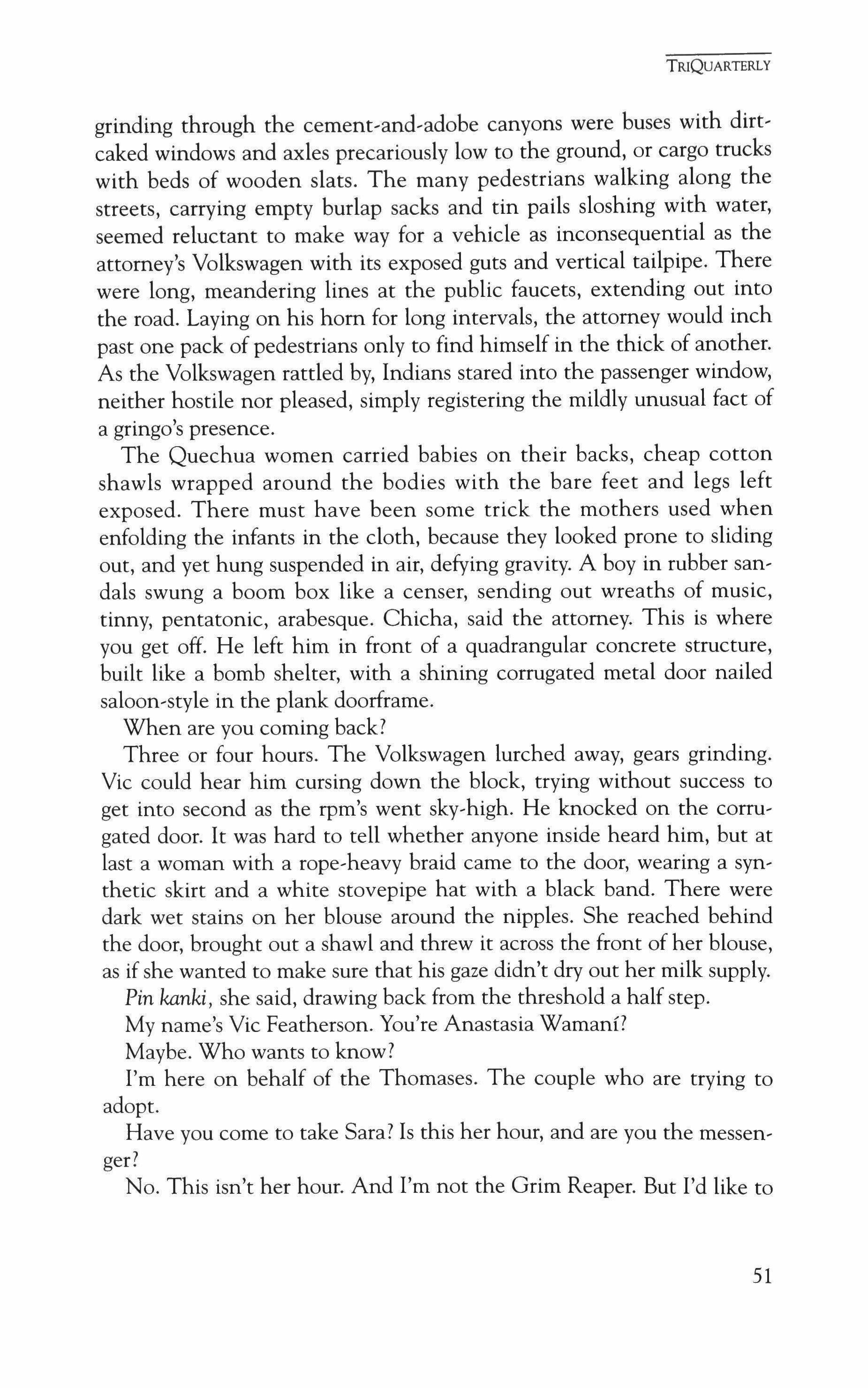
grinding through the cement-and-adobe canyons were buses with dirtcaked windows and axles precariously low to the ground, or cargo trucks with beds of wooden slats. The many pedestrians walking along the streets, carrying empty burlap sacks and tin pails sloshing with water, seemed reluctant to make way for a vehicle as inconsequential as the attorney's Volkswagen with its exposed guts and vertical tailpipe. There were long, meandering lines at the public faucets, extending out into the road. Laying on his hom for long intervals, the attorney would inch past one pack of pedestrians only to find himself in the thick of another. As the Volkswagen rattled by, Indians stared into the passenger window, neither hostile nor pleased, simply registering the mildly unusual fact of a gringo's presence.
The Quechua women carried babies on their backs, cheap cotton shawls wrapped around the bodies with the bare feet and legs left exposed. There must have been some trick the mothers used when enfolding the infants in the cloth, because they looked prone to sliding out, and yet hung suspended in air, defying gravity. A boy in rubber sandals swung a boom box like a censer, sending out wreaths of music, tinny, pentatonic, arabesque. Chicha, said the attorney. This is where you get off. He left him in front of a quadrangular concrete structure, built like a bomb shelter, with a shining corrugated metal door nailed saloon-style in the plank doorframe.
When are you coming back?
Three or four hours. The Volkswagen lurched away, gears grinding. Vic could hear him cursing down the block, trying without success to get into second as the rpm's went sky-high. He knocked on the corrugated door. It was hard to tell whether anyone inside heard him, but at last a woman with a rope-heavy braid came to the door, wearing a synthetic skirt and a white stovepipe hat with a black band. There were dark wet stains on her blouse around the nipples. She reached behind the door, brought out a shawl and threw it across the front of her blouse, as if she wanted to make sure that his gaze didn't dry out her milk supply.
Pin kanki, she said, drawing back from the threshold a half step.
My name's Vic Featherson. You're Anastasia Wamanf?
Maybe. Who wants to know?
I'm here on behalf of the Thomases. The couple who are trying to adopt.
Have you come to take Sara? Is this her hour, and are you the messenger?
No. This isn't her hour. And I'm not the Grim Reaper. But I'd like to
TRIQUARTERLY
51
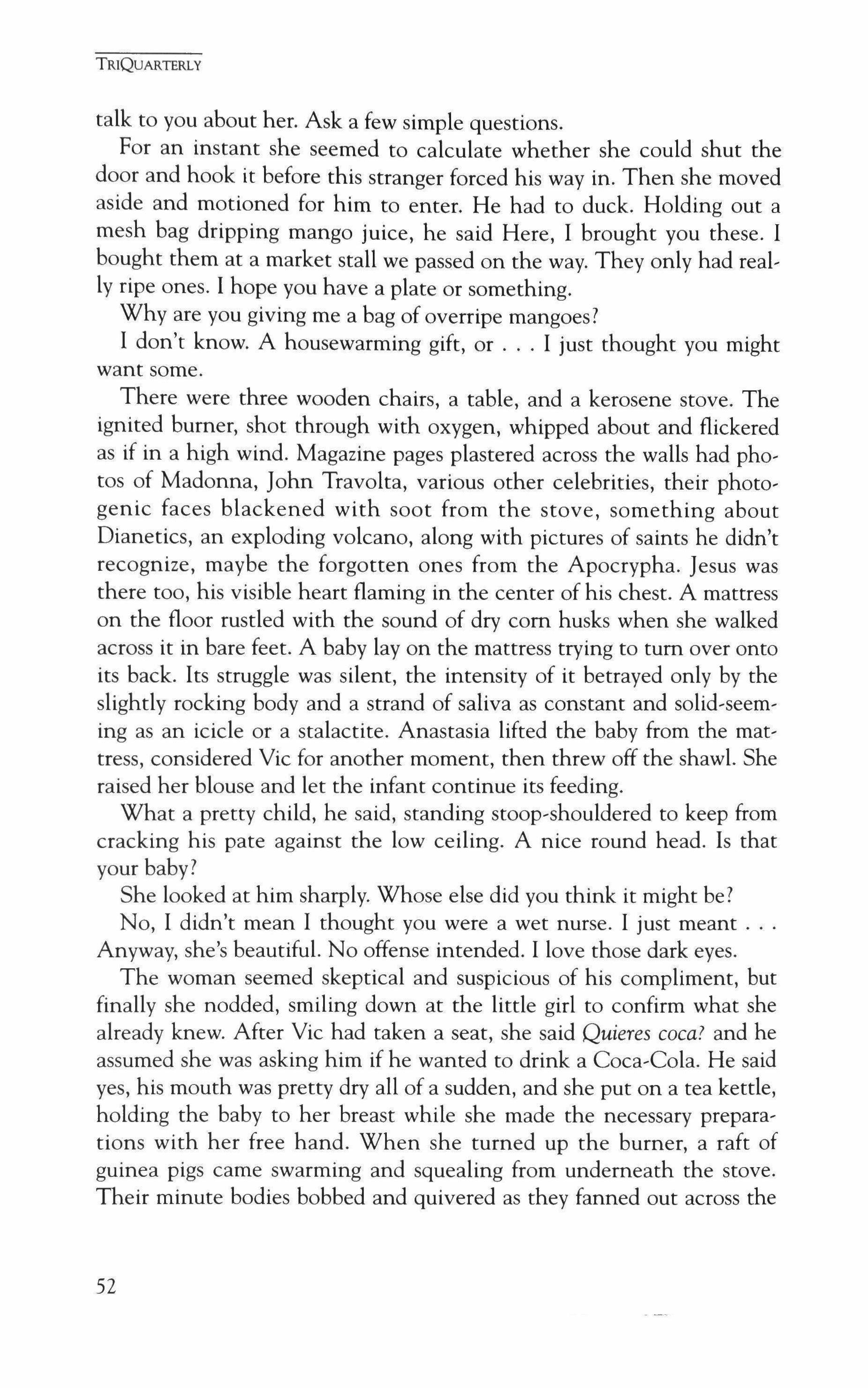
talk to you about her. Ask a few simple questions. For an instant she seemed to calculate whether she could shut the door and hook it before this stranger forced his way in. Then she moved aside and motioned for him to enter. He had to duck. Holding out a mesh bag dripping mango juice, he said Here, I brought you these. I bought them at a market stall we passed on the way. They only had really ripe ones. I hope you have a plate or something.
Why are you giving me a bag of overripe mangoes?
I don't know. A housewarming gift, or I just thought you might want some.
There were three wooden chairs, a table, and a kerosene stove. The ignited burner, shot through with oxygen, whipped about and flickered as if in a high wind. Magazine pages plastered across the walls had photos of Madonna, John Travolta, various other celebrities, their photogenic faces blackened with soot from the stove, something about Dianetics, an exploding volcano, along with pictures of saints he didn't recognize, maybe the forgotten ones from the Apocrypha. Jesus was there too, his visible heart flaming in the center of his chest. A mattress on the floor rustled with the sound of dry corn husks when she walked across it in bare feet. A baby lay on the mattress trying to turn over onto its back. Its struggle was silent, the intensity of it betrayed only by the slightly rocking body and a strand of saliva as constant and solid-seeming as an icicle or a stalactite. Anastasia lifted the baby from the mattress, considered Vic for another moment, then threw off the shawl. She raised her blouse and let the infant continue its feeding.
What a pretty child, he said, standing stoop-shouldered to keep from cracking his pate against the low ceiling. A nice round head. Is that your baby?
She looked at him sharply. Whose else did you think it might be?
No, I didn't mean I thought you were a wet nurse. I just meant Anyway, she's beautiful. No offense intended. I love those dark eyes.
The woman seemed skeptical and suspicious of his compliment, but finally she nodded, smiling down at the little girl to confirm what she already knew. After Vic had taken a seat, she said Quieres coca? and he assumed she was asking him if he wanted to drink a Coca-Cola. He said yes, his mouth was pretty dry all of a sudden, and she put on a tea kettle, holding the baby to her breast while she made the necessary preparations with her free hand. When she turned up the burner, a raft of guinea pigs came swarming and squealing from underneath the stove. Their minute bodies bobbed and quivered as they fanned out across the
TRIQUARTERLY
52

floor to search for scraps of food. Neither of them spoke while they wait, ed for the water to boil. A long time passed. The only sound was the occasional loud suckle when the seal of the baby's mouth broke. The woman whispered to it short and sharp, clucked and readjusted her breast. Her aureole was so large that even with its unlocked jaw, the baby couldn't cover it all. Anastasia took a few small leaves from a plastic bag, dropped them in a tin mug, and poured the water. Steam rolled off the surface as she handed the cup to him. It didn't have a handle, and he had to hold it at the rim to keep from burning his fingers. A clump of wet leaves floated on the top, steeping. One of them separated and drifted to the bottom.
Thanks. You're not going to have any?
No. You're not paying me a social call. Drink. He drank, and the taste was bitter. What is this?
Coca tea. Don't worry. Foreigners always exaggerate the potency of the leaf in its natural form. It depends on how susceptible you are, I guess.
I'm a lightweight. They sell these in the marketplace, don't they? I noticed them among the medicinal herbs when I stopped to buy the mangoes.
We mostly use it for religious purposes. But it dulls hunger, too.
I guess that's an important property around here.
We all drink the tea. It's also good for altitude sickness. A lot of your kind, gringos, faint as soon as they come to the mountains. The leaf revives them.
But we're at sea level.
At the moment, yes. That's why the water took so long to heat. The next pot won't take as long. The higher you go, the more all things seek to turn to vapor and gases. You'll see what I mean. Where's the other man?
You mean Mr. Covarrubia?
The one with the loud car and all the papers. I heard the motor when you came, and thought it was him. That's why I didn't come out at first. I don't know his name. He wanted to give me money.
And you didn't want to take it.
Not yet. I need to be sure of some things. I found out that they're going to take Sara away to a very cold place called Chicago. They say the wind blows all the time there. I wanted her to be in a warmer elimate, where she won't catch so many colds.
But you should have known that from the beginning. The location is no secret. Didn't Mr. Covarrubia tell you about it right at the outset?
TRIQUARTERLY
53
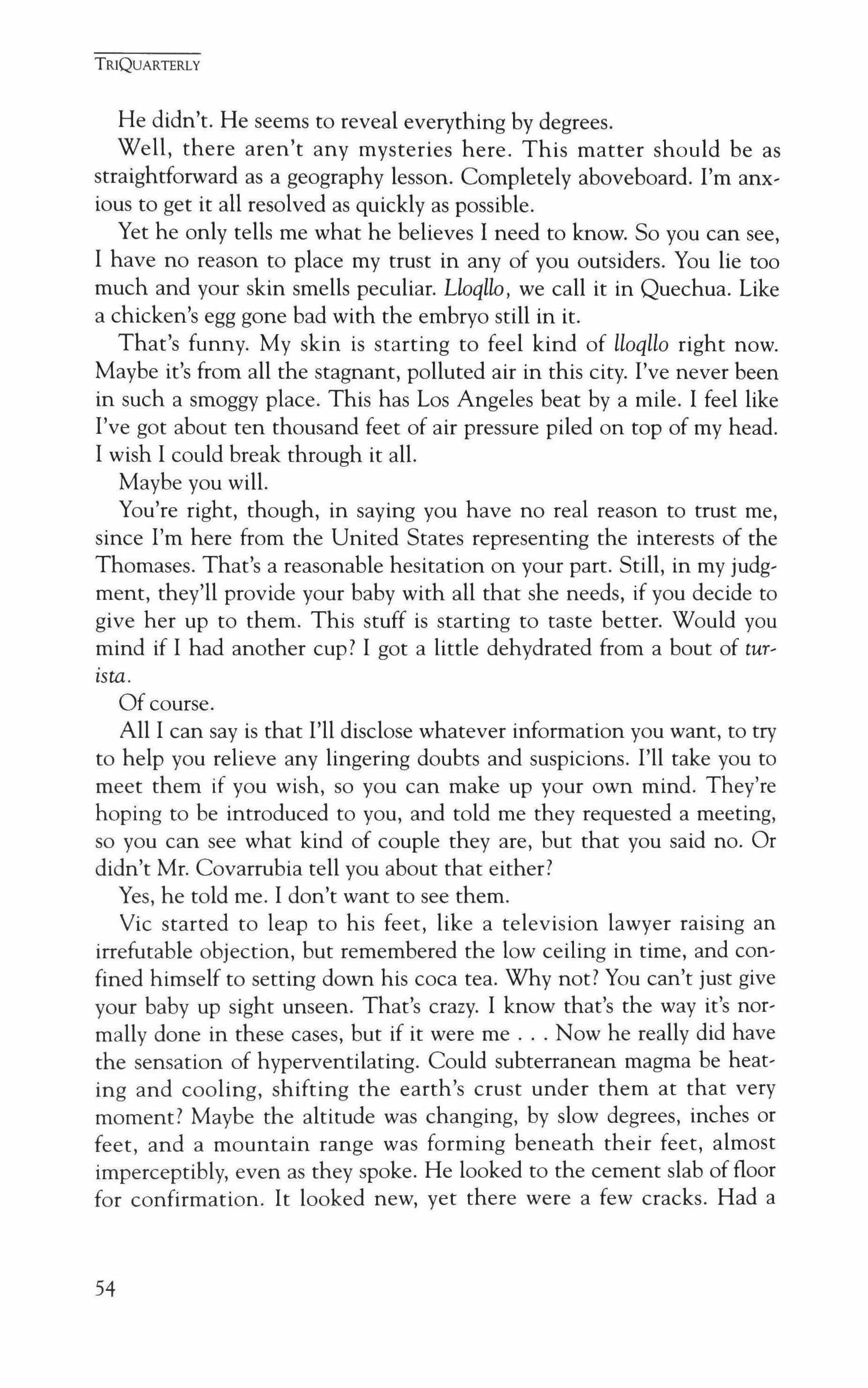
He didn't. He seems to reveal everything by degrees. Well, there aren't any mysteries here. This matter should be as straightforward as a geography lesson. Completely aboveboard. I'm anxious to get it all resolved as quickly as possible.
Yet he only tells me what he believes I need to know. So you can see, I have no reason to place my trust in any of you outsiders. You lie too much and your skin smells peculiar. Lloqllo, we call it in Quechua. Like a chicken's egg gone bad with the embryo still in it.
That's funny. My skin is starting to feel kind of lloqllo right now. Maybe it's from all the stagnant, polluted air in this city. I've never been in such a smoggy place. This has Los Angeles beat by a mile. I feel like I've got about ten thousand feet of air pressure piled on top of my head. I wish I could break through it all.
Maybe you will.
You're right, though, in saying you have no real reason to trust me, since I'm here from the United States representing the interests of the Thomases. That's a reasonable hesitation on your part. Still, in my judgment, they'll provide your baby with all that she needs, if you decide to give her up to them. This stuff is starting to taste better. Would you mind if I had another cup? I got a little dehydrated from a bout of rurista.
Of course.
All I can say is that I'll disclose whatever information you want, to try to help you relieve any lingering doubts and suspicions. I'll take you to meet them if you wish, so you can make up your own mind. They're hoping to be introduced to you, and told me they requested a meeting, so you can see what kind of couple they are, but that you said no. Or didn't Mr. Covarrubia tell you about that either?
Yes, he told me. I don't want to see them.
Vic started to leap to his feet, like a television lawyer raising an irrefutable objection, but remembered the low ceiling in time, and confined himself to setting down his coca tea. Why not? You can't just give your baby up sight unseen. That's crazy. I know that's the way it's normally done in these cases, but if it were me Now he really did have the sensation of hyperventilating. Could subterranean magma be heating and cooling, shifting the earth's crust under them at that very moment? Maybe the altitude was changing, by slow degrees, inches or feet, and a mountain range was forming beneath their feet, almost imperceptibly, even as they spoke. He looked to the cement slab of floor for confirmation. It looked new, yet there were a few cracks. Had a
TRIQUARTERLY
54

tremor passed through the house just then? Lima did lie directly on a major fault line, the San Andreas, where two tectonic plates came together. California really could have been a part of Peru before the continental drift. The guinea pigs still swarmed, whiskers aquiver. They couldn't seem to settle down. Had the noise of the burner alone brought them scurrying out from underneath the stove when she'd set the teapot on? Rats had poured forth from the foundations of buildings after the San Francisco earthquake. The coca tea seemed to be making matters worse rather than improving them. He could feel his heart palpitating in his temple.
I didn't say I was giving Sara to them. I only said I didn't want to meet them. You must have misunderstood me.
Excuse my outburst. My head's swimming. My opinion is irrelevant, of course. I simply meant to ask what your hesitation is about establishing contact with my clients.
Do they speak Spanish? Do they speak Quechua?
I'm afraid not.
Have they been driven out of their homes? Have the graves of their ancestors been disturbed, bringing forth restless souls? Have they watched the undead spew flames out of their mouths?
Flames? Uh, I'm not sure. I hope not.
Her fiery gaze swept through the atoms of Vic's body. He felt the molecules drifting apart, trying to send him into the gaseous state. He clenched his teeth until the molecules cohered again, and a shiver passed through him. There had definitely been a noticeable drop in temperature.
Then we can't talk to each other. All I risk by meeting with them is for them to afflict Sara with the mal de aja by looking at her with feasting eyes, desiring her too much. Only when I know that the ground has been prepared properly, can I even think of yielding her up. I've kept Sara alive and healthy this long, against great odds, and I don't want anything to happen to her. I have to protect her from ill winds and ill will. So I proceed with caution. I don't know if you're telling me things straight. But since you're absentmindedly eating the soggy leaves out of your tea, and since you made me a gift of rotten mangoes, I think maybe you don't have much experience at this business. You've come with goodwill.
Vic wiped his forehead with the sleeve of his sweater. Let's get back to the matter at hand. What information do you want from me to help you make up your mind?
TRIQUARTERLY
55
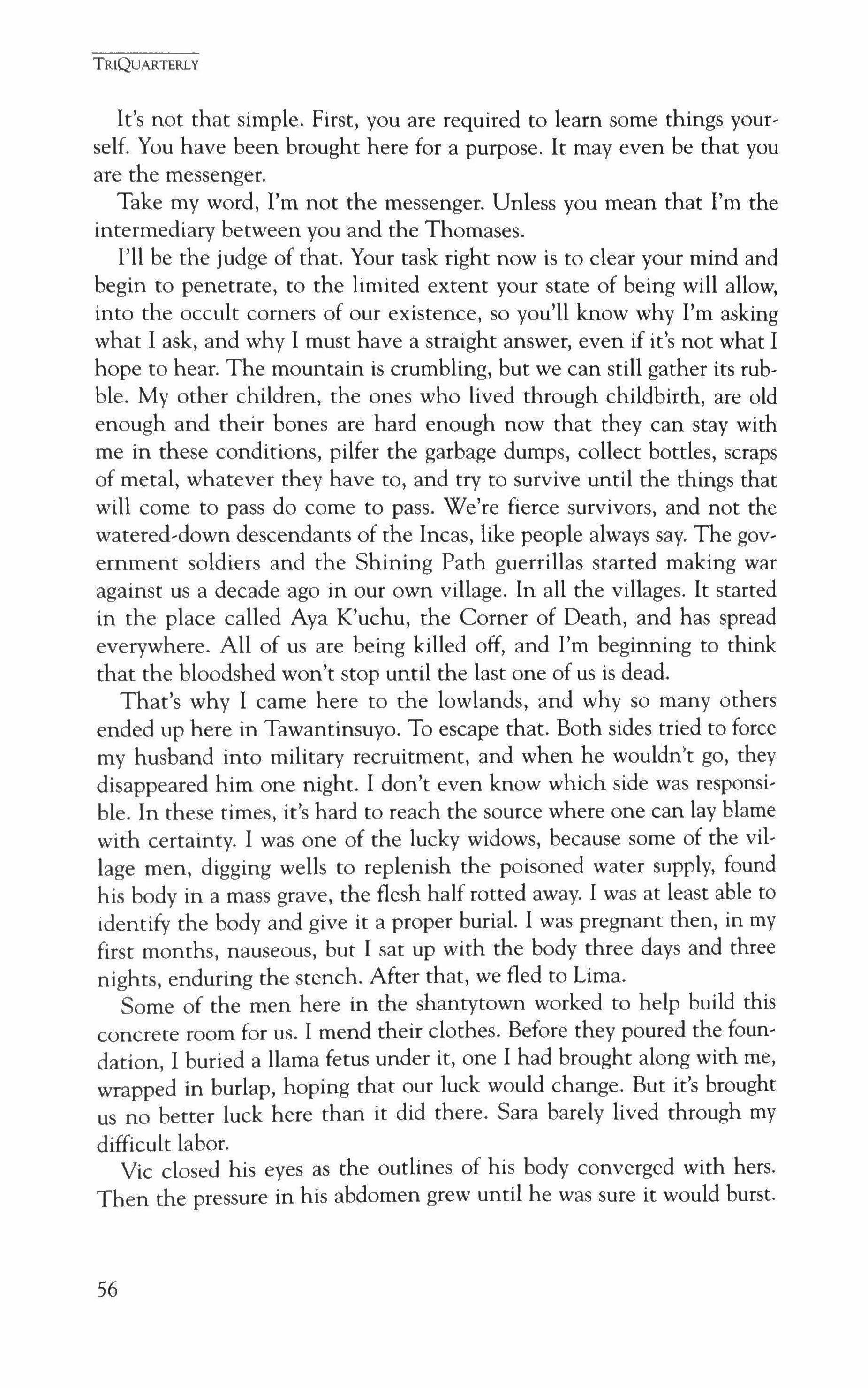
It's not that simple. First, you are required to learn some things yourself. You have been brought here for a purpose. It may even be that you are the messenger.
Take my word, I'm not the messenger. Unless you mean that I'm the intermediary between you and the Thomases.
I'll be the judge of that. Your task right now is to clear your mind and begin to penetrate, to the limited extent your state of being will allow, into the occult corners of our existence, so you'll know why I'm asking what I ask, and why I must have a straight answer, even if it's not what I hope to hear. The mountain is crumbling, but we can still gather its rubble. My other children, the ones who lived through childbirth, are old enough and their bones are hard enough now that they can stay with me in these conditions, pilfer the garbage dumps, collect bottles, scraps of metal, whatever they have to, and try to survive until the things that will come to pass do come to pass. We're fierce survivors, and not the watered-down descendants of the Incas, like people always say. The government soldiers and the Shining Path guerrillas started making war against us a decade ago in our own village. In all the villages. It started in the place called Aya K'uchu, the Corner of Death, and has spread everywhere. All of us are being killed off, and I'm beginning to think that the bloodshed won't stop until the last one of us is dead.
That's why I came here to the lowlands, and why so many others ended up here in Tawantinsuyo. To escape that. Both sides tried to force my husband into military recruitment, and when he wouldn't go, they disappeared him one night. I don't even know which side was responsible. In these times, it's hard to reach the source where one can lay blame with certainty. I was one of the lucky widows, because some of the village men, digging wells to replenish the poisoned water supply, found his body in a mass grave, the flesh half rotted away. I was at least able to identify the body and give it a proper burial. I was pregnant then, in my first months, nauseous, but I sat up with the body three days and three nights, enduring the stench. After that, we fled to Lima.
Some of the men here in the shantytown worked to help build this concrete room for us. I mend their clothes. Before they poured the foundation, I buried a llama fetus under it, one I had brought along with me, wrapped in burlap, hoping that our luck would change. But it's brought us no better luck here than it did there. Sara barely lived through my difficult labor.
Vic closed his eyes as the outlines of his body converged with hers. Then the pressure in his abdomen grew until he was sure it would burst.
TRIQUARTERLY
56
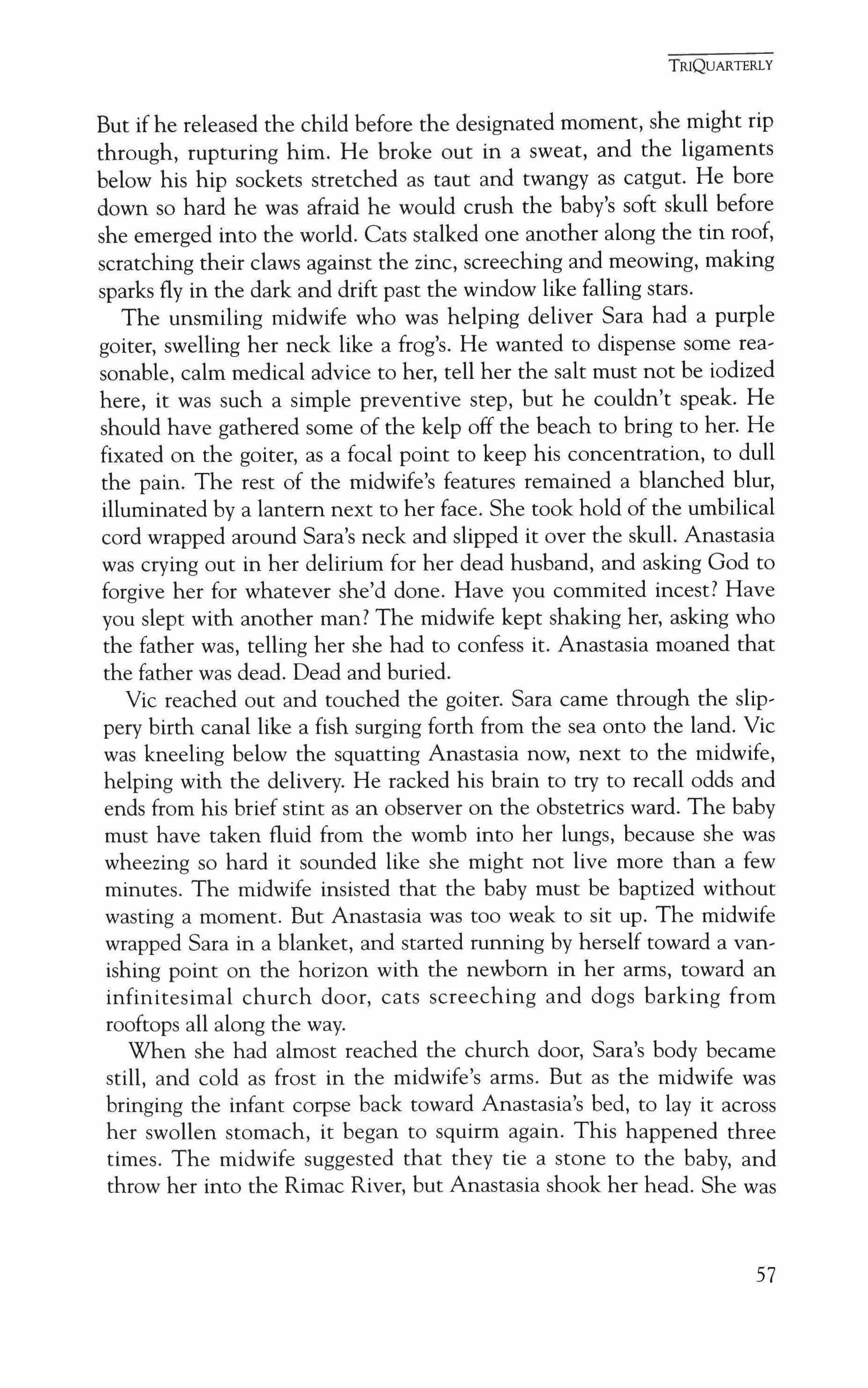
But if he released the child before the designated moment, she might rip through, rupturing him. He broke out in a sweat, and the ligaments below his hip sockets stretched as taut and twangy as catgut. He bore down so hard he was afraid he would crush the baby's soft skull before she emerged into the world. Cats stalked one another along the tin roof, scratching their claws against the zinc, screeching and meowing, making sparks fly in the dark and drift past the window like falling stars.
The unsmiling midwife who was helping deliver Sara had a purple goiter, swelling her neck like a frog's. He wanted to dispense some reasonable, calm medical advice to her, tell her the salt must not be iodized here, it was such a simple preventive step, but he couldn't speak. He should have gathered some of the kelp off the beach to bring to her. He fixated on the goiter, as a focal point to keep his concentration, to dull the pain. The rest of the midwife's features remained a blanched blur, illuminated by a lantern next to her face. She took hold of the umbilical cord wrapped around Sara's neck and slipped it over the skull. Anastasia was crying out in her delirium for her dead husband, and asking God to forgive her for whatever she'd done. Have you commited incest? Have you slept with another man? The midwife kept shaking her, asking who the father was, telling her she had to confess it. Anastasia moaned that the father was dead. Dead and buried.
Vic reached out and touched the goiter. Sara came through the slippery birth canal like a fish surging forth from the sea onto the land. Vic was kneeling below the squatting Anastasia now, next to the midwife, helping with the delivery. He racked his brain to try to recall odds and ends from his brief stint as an observer on the obstetrics ward. The baby must have taken fluid from the womb into her lungs, because she was wheezing so hard it sounded like she might not live more than a few minutes. The midwife insisted that the baby must be baptized without wasting a moment. But Anastasia was too weak to sit up. The midwife wrapped Sara in a blanket, and started running by herself toward a vanishing point on the horizon with the newborn in her arms, toward an infinitesimal church door, cats screeching and dogs barking from rooftops all along the way.
When she had almost reached the church door, Sara's body became still, and cold as frost in the midwife's arms. But as the midwife was bringing the infant corpse back toward Anastasia's bed, to lay it across her swollen stomach, it began to squirm again. This happened three times. The midwife suggested that they tie a stone to the baby, and throw her into the Rimae River, but Anastasia shook her head. She was
TRIQUARTERLY
57
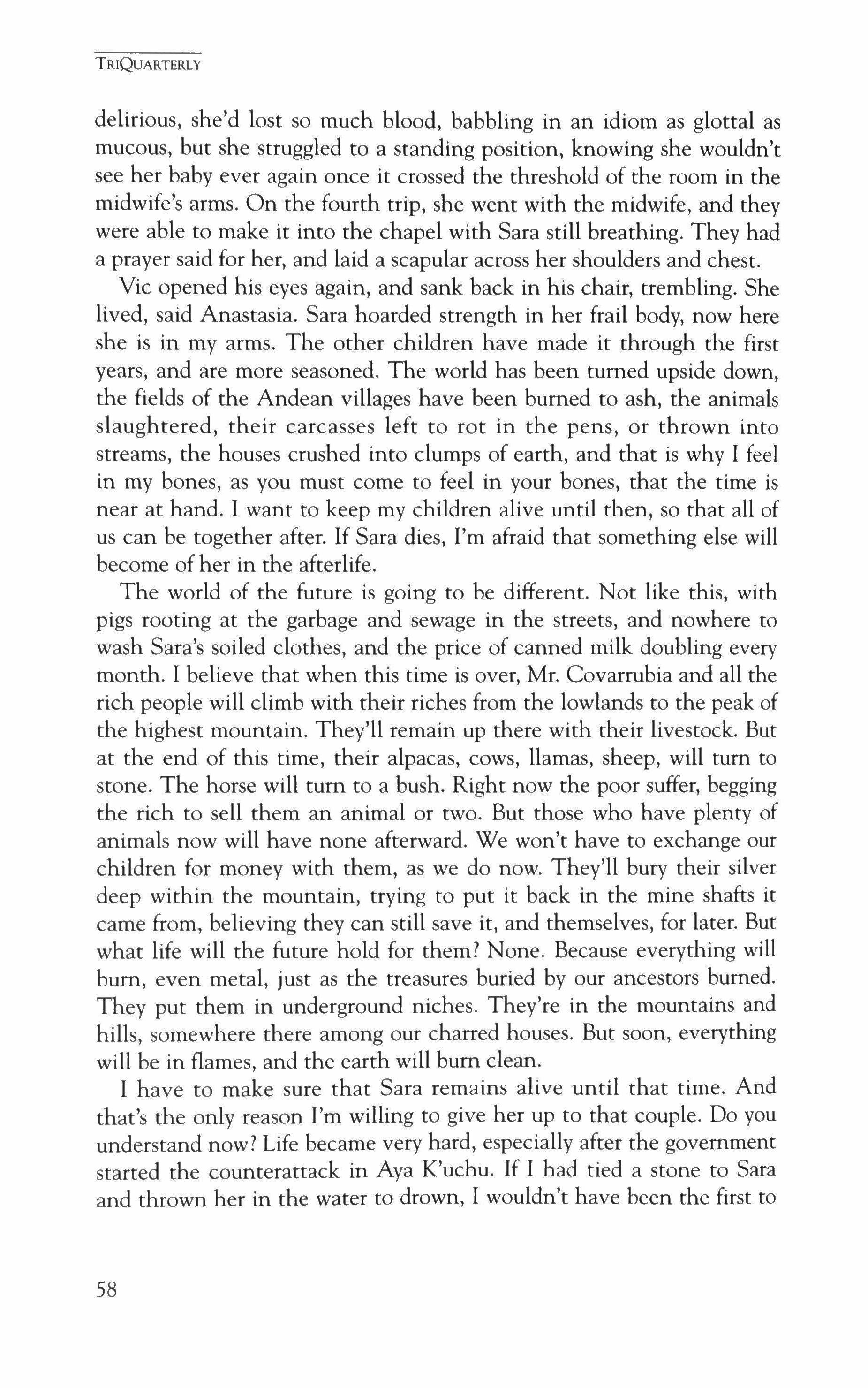
delirious, she'd lost so much blood, babbling in an idiom as glottal as mucous, but she struggled to a standing position, knowing she wouldn't see her baby ever again once it crossed the threshold of the room in the midwife's arms. On the fourth trip, she went with the midwife, and they were able to make it into the chapel with Sara still breathing. They had a prayer said for her, and laid a scapular across her shoulders and chest.
Vic opened his eyes again, and sank back in his chair, trembling. She lived, said Anastasia. Sara hoarded strength in her frail body, now here she is in my arms. The other children have made it through the first years, and are more seasoned. The world has been turned upside down, the fields of the Andean villages have been burned to ash, the animals slaughtered, their carcasses left to rot in the pens, or thrown into streams, the houses crushed into clumps of earth, and that is why I feel in my bones, as you must come to feel in your bones, that the time is near at hand. I want to keep my children alive until then, so that all of us can be together after. If Sara dies, I'm afraid that something else will become of her in the afterlife.
The world of the future is going to be different. Not like this, with pigs rooting at the garbage and sewage in the streets, and nowhere to wash Sara's soiled clothes, and the price of canned milk doubling every month. I believe that when this time is over, Mr. Covarrubia and all the rich people will climb with their riches from the lowlands to the peak of the highest mountain. They'll remain up there with their livestock. But at the end of this time, their alpacas, cows, llamas, sheep, will tum to stone. The horse will tum to a bush. Right now the poor suffer, begging the rich to sell them an animal or two. But those who have plenty of animals now will have none afterward. We won't have to exchange our children for money with them, as we do now. They'll bury their silver deep within the mountain, trying to put it back in the mine shafts it came from, believing they can still save it, and themselves, for later. But what life will the future hold for them? None. Because everything will bum, even metal, just as the treasures buried by our ancestors burned. They put them in underground niches. They're in the mountains and hills, somewhere there among our charred houses. But soon, everything will be in flames, and the earth will bum clean.
I have to make sure that Sara remains alive until that time. And that's the only reason I'm willing to give her up to that couple. Do you understand now? Life became very hard, especially after the government started the counterattack in Aya K'uchu. If I had tied a stone to Sara and thrown her in the water to drown, I wouldn't have been the first to
TRIQUARTERLY
58
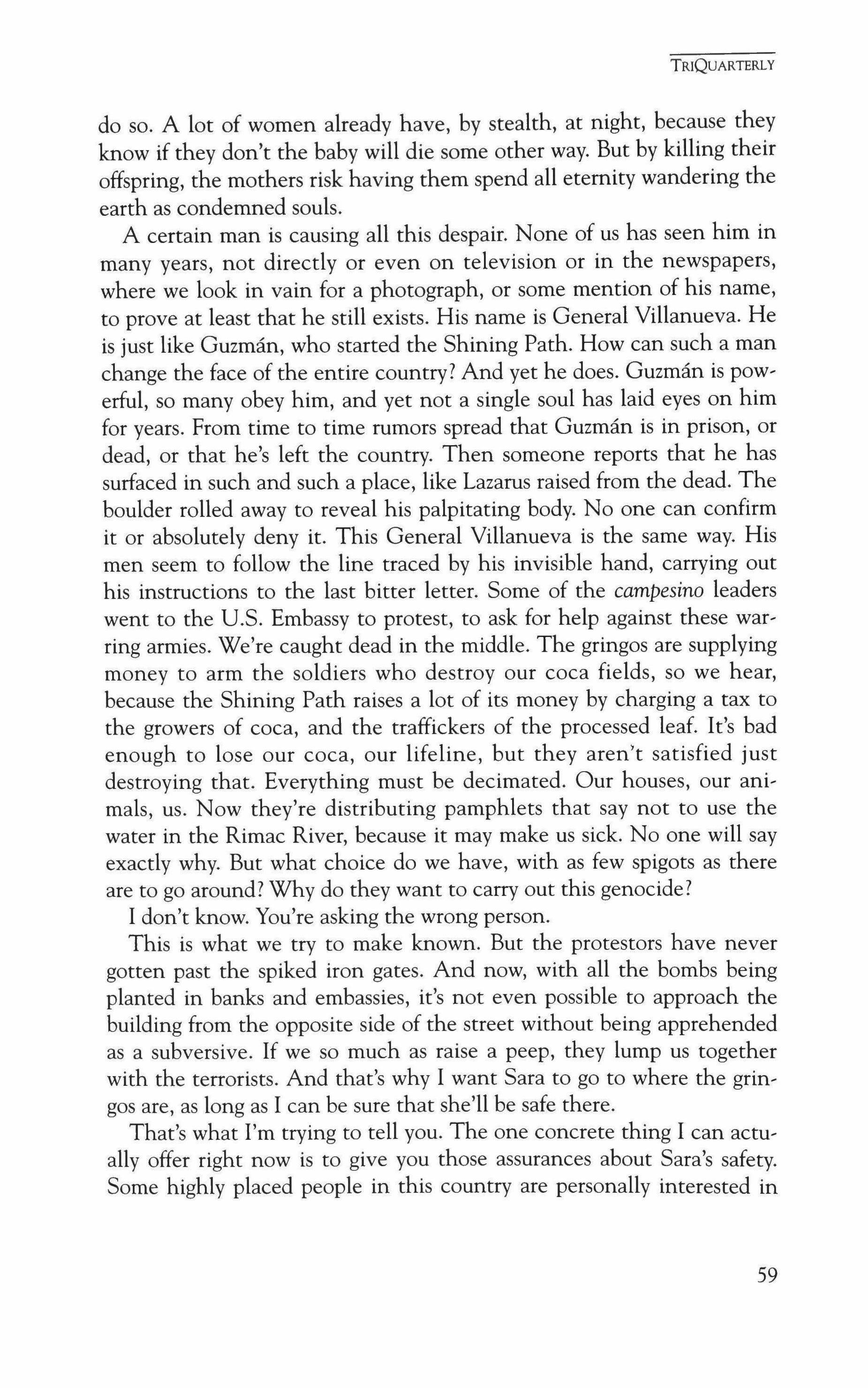
do so. A lot of women already have, by stealth, at night, because they know if they don't the baby will die some other way. But by killing their offspring, the mothers risk having them spend all eternity wandering the earth as condemned souls.
A certain man is causing all this despair. None of us has seen him in many years, not directly or even on television or in the newspapers, where we look in vain for a photograph, or some mention of his name, to prove at least that he still exists. His name is General Villanueva. He is just like Guzman, who started the Shining Path. How can such a man change the face of the entire country? And yet he does. Guzman is pow, erful, so many obey him, and yet not a single soul has laid eyes on him for years. From time to time rumors spread that Guzman is in prison, or dead, or that he's left the country. Then someone reports that he has surfaced in such and such a place, like Lazarus raised from the dead. The boulder rolled away to reveal his palpitating body. No one can confirm it or absolutely deny it. This General Villanueva is the same way. His men seem to follow the line traced by his invisible hand, carrying out his instructions to the last bitter letter. Some of the campesino leaders went to the U.S. Embassy to protest, to ask for help against these war' ring armies. We're caught dead in the middle. The gringos are supplying money to arm the soldiers who destroy our coca fields, so we hear, because the Shining Path raises a lot of its money by charging a tax to the growers of coca, and the traffickers of the processed leaf. It's bad enough to lose our coca, our lifeline, but they aren't satisfied just destroying that. Everything must be decimated. Our houses, our ani, mals, us. Now they're distributing pamphlets that say not to use the water in the Rimae River, because it may make us sick. No one will say exactly why. But what choice do we have, with as few spigots as there are to go around? Why do they want to carry out this genocide?
I don't know. You're asking the wrong person. This is what we try to make known. But the protestors have never gotten past the spiked iron gates. And now, with all the bombs being planted in banks and embassies, it's not even possible to approach the building from the opposite side of the street without being apprehended as a subversive. If we so much as raise a peep, they lump us together with the terrorists. And that's why I want Sara to go to where the grin, gos are, as long as I can be sure that she'll be safe there.
That's what I'm trying to tell you. The one concrete thing I can actually offer right now is to give you those assurances about Sara's safety. Some highly placed people in this country are personally interested in
TRIQUARTERLY
59
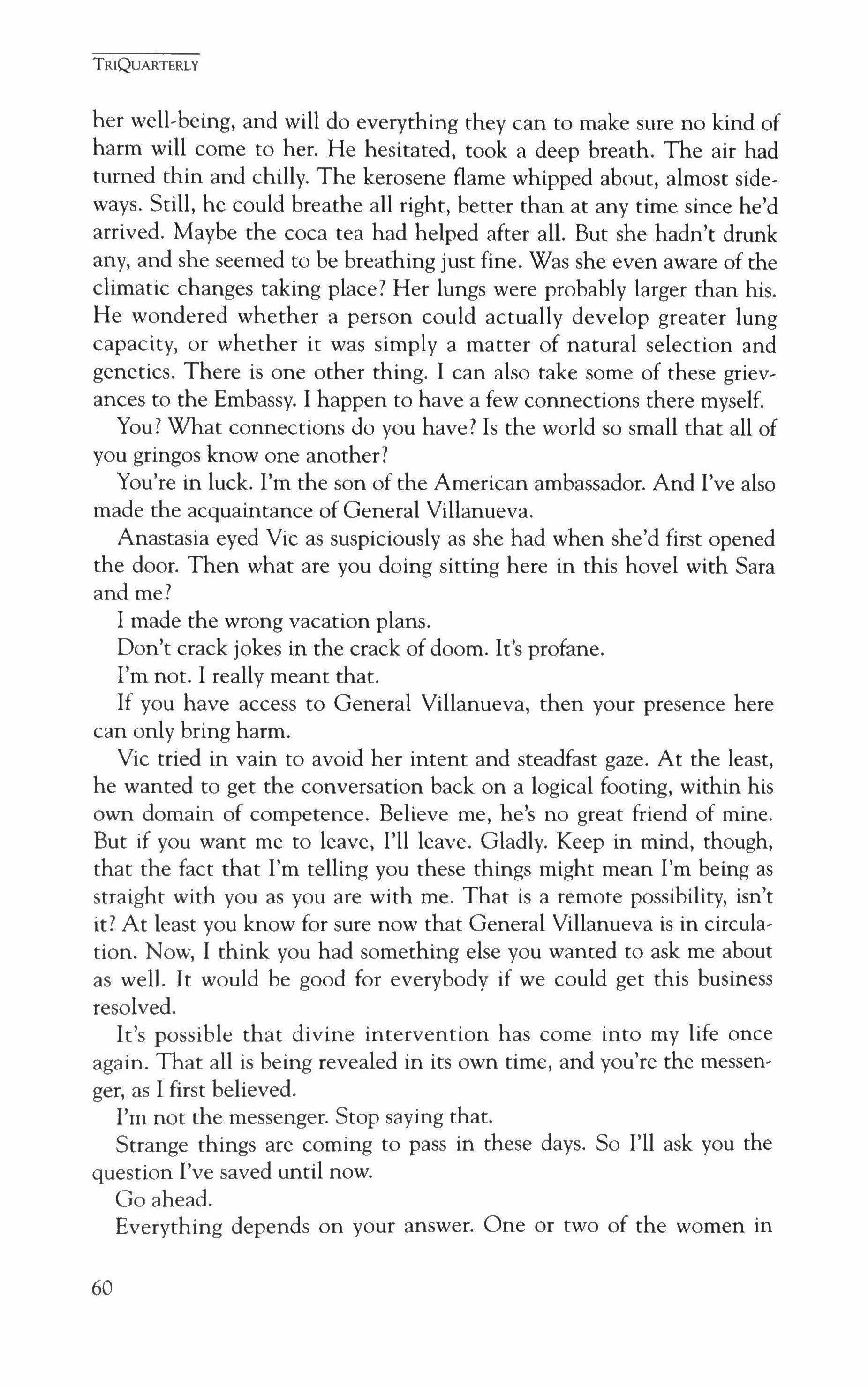
her well-being, and will do everything they can to make sure no kind of harm will come to her. He hesitated, took a deep breath. The air had turned thin and chilly. The kerosene flame whipped about, almost sideways. Still, he could breathe all right, better than at any time since he'd arrived. Maybe the coca tea had helped after all. But she hadn't drunk any, and she seemed to be breathing just fine. Was she even aware of the climatic changes taking place? Her lungs were probably larger than his. He wondered whether a person could actually develop greater lung capacity, or whether it was simply a matter of natural selection and genetics. There is one other thing. I can also take some of these grievances to the Embassy. I happen to have a few connections there myself. You? What connections do you have? Is the world so small that all of you gringos know one another?
You're in luck. I'm the son of the American ambassador. And I've also made the acquaintance of General Villanueva.
Anastasia eyed Vic as suspiciously as she had when she'd first opened the door. Then what are you doing sitting here in this hovel with Sara and me?
I made the wrong vacation plans. Don't crack jokes in the crack of doom. It's profane.
I'm not. I really meant that.
If you have access to General Villanueva, then your presence here can only bring harm.
Vic tried in vain to avoid her intent and steadfast gaze. At the least, he wanted to get the conversation back on a logical footing, within his own domain of competence. Believe me, he's no great friend of mine. But if you want me to leave, I'll leave. Gladly. Keep in mind, though, that the fact that I'm telling you these things might mean I'm being as straight with you as you are with me. That is a remote possibility, isn't it? At least you know for sure now that General Villanueva is in circulation. Now, I think you had something else you wanted to ask me about as well. It would be good for everybody if we could get this business resolved.
It's possible that divine intervention has come into my life once again. That all is being revealed in its own time, and you're the messenger, as I first believed.
I'm not the messenger. Stop saying that.
Strange things are coming to pass in these days. So I'll ask you the question I've saved until now.
Go ahead.
Everything depends on your answer. One or two of the women in
TRIQUARTERLY
60

Tawantinsuyo gave up children for adoption, and of course they've never seen them again. Everyone around here has watched carefully to see what would occur. The children disappear, and no one knows just what happens to them after they're taken away. Much the same way as when their husbands disappeared in the villages. The mothers received letters from these supposed families, in striped envelopes, red and blue, but like me, they can't even read Spanish, much less English. As always, someone has to translate. Who knows where those letters have come from, or what they actually say? We have no hard proof. When we raise such questions, the social workers treat us as if we're ignorant and superstitious savages, and the babies are lucky to have escaped our clutches. Now the mothers have nearly gone mad, repenting of what they did in a moment of desperation, and wondering what became of their children. One of them has stopped by to visit me several times, because she knows I'm thinking of giving up Sara. She sits in that chair rubbing her empty hands up and down the lap of her skirt, eyeing my daughter. I see that this woman can barely keep herself from wrestling Sara from my arms and running away with her, to replace her own lost child. She begs me over and over not to give my daughter away, says that it's better for her to be strangled in her swaddling cloth, if it comes to that, than to let these gringos get their hands on her. I always keep Sara well wrapped up when this woman comes around, and keep her face turned toward me, so that such a sorrowful mother won't have the chance to stare directly into her eyes for too long. I know that the woman is half-crazed with grief, the way that any mother would be. And yet, I listen to her words. Do you know what a iiak'aq is?
I've never heard of it before.
It's a being that lives off devouring the entrails of humans. The women around here are starting to say that the reason the gringos come around so much is because there are nak'aqs in your country who remove the organs from some people, living as well as dead, and put them inside others. My comadre said that no one fears them, as we do here, but that instead a cult has grown up around them. They are treated like gods, venerated, worshipped, fresh sacrifices offered up to them, no matter how much the victims suffer, and even the government pays them thousands or millions of dollars. They're always in search of new flesh.
Surgeons. You're talking about surgeons. You have them here too, in the hospitals.
I don't go to the hospitals, and my neighbors don't either. Too many
TRIQUARTERLY
61

people die there. So it's true, then. I told my neighbor she was listening to too much gossip.
In med school, Vic had gotten far enough along in his studies to have been present once in the emergency room when a team of surgeons removed the still-fresh organs of a motorcycle-accident victim, plucking them intact from the deceased. They called it "harvesting." In anatomy class, he'd watched autopsies performed. He still remembered with great precision the sound of the instrument sawing into the breastbone with its fine, jagged teeth, and the way the cadaver's ribcage folded back neatly once a hinge was created, laying open to view the glossy guts, the heart, lungs, pancreas. Up until that time, the only organs he'd ever seen were the ones displayed in shrink-wrap at the meat counters of grocery stores. The autopsies had been handled with a similar sanitized offhandedness, the organs passed around among the novices so that they would become familiar objects, banishing from the first-year med students' impressionable minds all the gross, eerie, nonempiricallore they'd been piling up since childhood. But that didn't keep the urban legends from proliferating among them, the stories about a friend of a friend at another med school, the young woman who'd had to miss her aunt's funeral in order to study for midterms, but the aunt turned up the following week on the medical-school autopsy table. It turned out she had donated her cadaver to science, and the niece suffered a collapse when she had to watch her relative being quartered and offered up for the inspection of her classmates. The recounting of the story was always followed by nervous laughter.
It's true. You can check a box on your driver's license if you want the surgeons to take the organs out of your body. That's how they find out about diseases, and help prolong life for other people. But those organ removals concern the dead, not the living. If the donors are alive, they only donate organs that they have extras of. Like a kidney, for instance. It's all voluntary.
Answer me this. The woman at the agency, and Mr. Covarrubia, have both told me that this couple-
The Thomases.
Yes, the Thomases, lost a child not many months after it was born. But no one will say what it died from. When I ask, they tell me that they don't want to violate the confidentiality of these people. Now, you say that you're willing to tell me everything I wish to know. So, what did the baby die from?
I see what you're driving at. But you're thinking about this all in the
TRIQUARTERLY
62
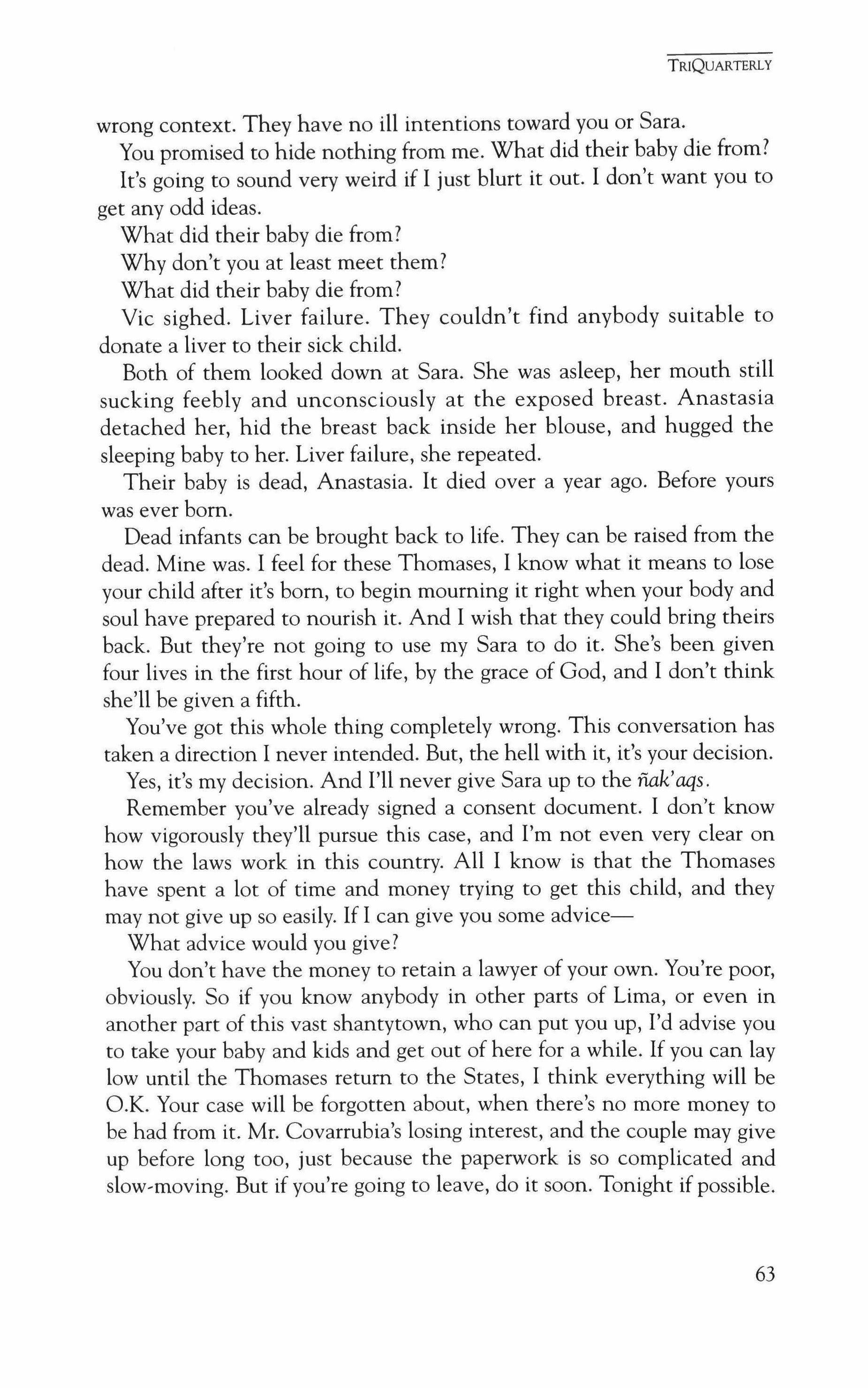
wrong context. They have no ill intentions toward you or Sara. You promised to hide nothing from me. What did their baby die from?
It's going to sound very weird if I just blurt it out. I don't want you to get any odd ideas.
What did their baby die from?
Why don't you at least meet them?
What did their baby die from?
Vic sighed. Liver failure. They couldn't find anybody suitable to donate a liver to their sick child.
Both of them looked down at Sara. She was asleep, her mouth still sucking feebly and unconsciously at the exposed breast. Anastasia detached her, hid the breast back inside her blouse, and hugged the sleeping baby to her. Liver failure, she repeated.
Their baby is dead, Anastasia. It died over a year ago. Before yours was ever born.
Dead infants can be brought back to life. They can be raised from the dead. Mine was. I feel for these Thomases, I know what it means to lose your child after it's born, to begin mourning it right when your body and soul have prepared to nourish it. And I wish that they could bring theirs back. But they're not going to use my Sara to do it. She's been given four lives in the first hour of life, by the grace of God, and I don't think she'll be given a fifth.
You've got this whole thing completely wrong. This conversation has taken a direction I never intended. But, the hell with it, it's your decision.
Yes, it's my decision. And I'll never give Sara up to the ftak'aqs.
Remember you've already signed a consent document. I don't know how vigorously they'll pursue this case, and I'm not even very clear on how the laws work in this country. All I know is that the Thomases have spent a lot of time and money trying to get this child, and they may not give up so easily. If I can give you some adviceWhat advice would you give?
You don't have the money to retain a lawyer of your own. You're poor, obviously. So if you know anybody in other parts of Lima, or even in another part of this vast shantytown, who can put you up, I'd advise you to take your baby and kids and get out of here for a while. If you can lay low until the Thomases return to the States, I think everything will be O.K. Your case will be forgotten about, when there's no more money to be had from it. Mr. Covarrubia's losing interest, and the couple may give up before long too, just because the paperwork is so complicated and slow-moving. But if you're going to leave, do it soon. Tonight if possible.
TRIQUARTERLY
63
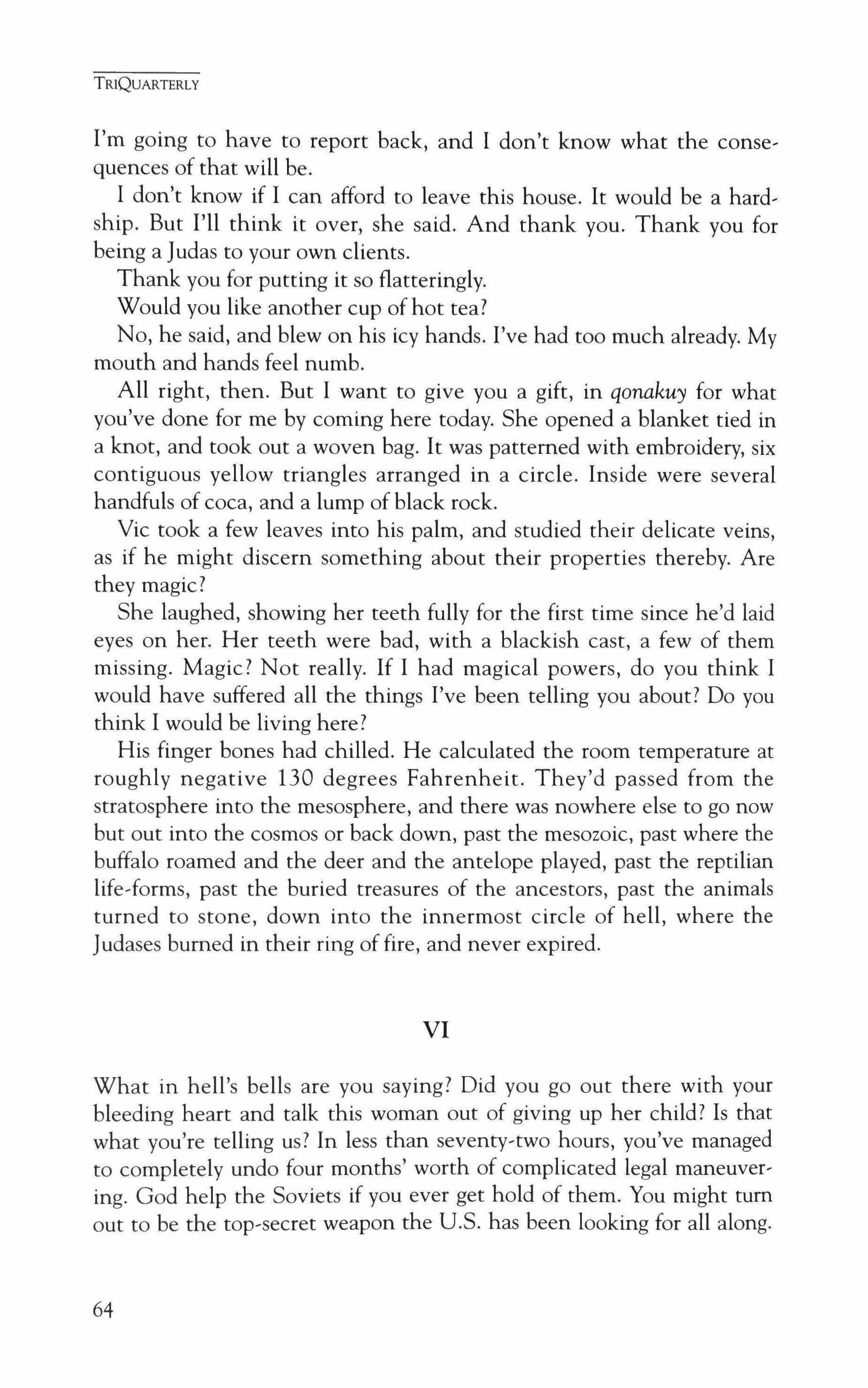
I'm going to have to report back, and I don't know what the consequences of that will be.
I don't know if I can afford to leave this house. It would be a hardship. But I'll think it over, she said. And thank you. Thank you for being a Judas to your own clients.
Thank you for putting it so flatteringly. Would you like another cup of hot tea?
No, he said, and blew on his icy hands. I've had too much already. My mouth and hands feel numb.
All right, then. But I want to give you a gift, in qonakuy for what you've done for me by coming here today. She opened a blanket tied in a knot, and took out a woven bag. It was patterned with embroidery, six contiguous yellow triangles arranged in a circle. Inside were several handfuls of coca, and a lump of black rock.
Vic took a few leaves into his palm, and studied their delicate veins, as if he might discern something about their properties thereby. Are they magic?
She laughed, showing her teeth fully for the first time since he'd laid eyes on her. Her teeth were bad, with a blackish cast, a few of them missing. Magic? Not really. If I had magical powers, do you think I would have suffered all the things I've been telling you about? Do you think I would be living here?
His finger bones had chilled. He calculated the room temperature at roughly negative 130 degrees Fahrenheit. They'd passed from the stratosphere into the mesosphere, and there was nowhere else to go now but out into the cosmos or back down, past the mesozoic, past where the buffalo roamed and the deer and the antelope played, past the reptilian life-forms, past the buried treasures of the ancestors, past the animals turned to stone, down into the innermost circle of hell, where the Judases burned in their ring of fire, and never expired.
VI
What in hell's bells are you saying? Did you go out there with your bleeding heart and talk this woman out of giving up her child? Is that what you're telling us? In less than seventy-two hours, you've managed to completely undo four months' worth of complicated legal maneuvering. God help the Soviets if you ever get hold of them. You might tum out to be the top-secret weapon the U.S. has been looking for all along.
TRIQUARTERLY
64

Bigger than Star Wars. More expensive. More mystical. More unreliable. I didn't talk her out of anything. I'm not really sure what happened. I asked a few questions and she answered them. Then she asked some questions, and I answered them.
Questions about livers.
Yes, livers.
Did you cover chicken livers while you were at it? And cirrhosis of the liver? That's an important one. Do you realize the implications of your screwup? If it gets around among the prospects that there's some sort of nefarious scheme afoot in the U.S. to harvest the organs of Peruvian children, and put them into our own, then the entire program, which has taken an immense effort to put into motion, could go right down the tubes.
The rumor has already gotten around among them. Don't blame me. I didn't start it. I'm just reporting it to you as I heard it.
The idea is so absurd, it makes me want to laugh. But I'm not laughing, did you notice that? Because I know from bitter experience that this is a rumor-mongering city. And a superstitious people. They already think we're the devil. Even the educated ones have their suspicions. Then you add to that all the saints and ghosts and who knows what else floating around in this underworld, and you might as well forget trying to establish any kind of credibility. I'm all for respecting indigenous beliefs, local customs, being sensitive to the native population, and so on. God knows your mother has given me plenty of lectures on that. But when they start substituting our doctors for their knock-knocks, or whatever the hell you said they're called, that's where I draw the line. We're not evil spirits. I'm already known as the genocidal Featherston, my house is raked with gunfire on a regular basis, and I don't want to add any more fuel to the already raging flames.
Maybe there's a reason why they call you the genocidal Featherston. What are you suggesting? That you agree with their description of me? Were you given a glimpse of special enlightenment on your trip to the mountain, so that now you feel entitled to call me names too? If I wasn't a diplomat, I'd knock your block off right now.
Vic looked to his mother to take his part, to intervene as she had on the first day of his visit, before the accusations between them could escalate any further. But she remained silent, looking at him with sad disappointment. Her mute reproach stung him more than the rage of his father. What doubtless caused her the most pain was that she would now have to explain everything to the Thomases herself, about how her son had failed once again, how he had
TRIQUARTERLY
65
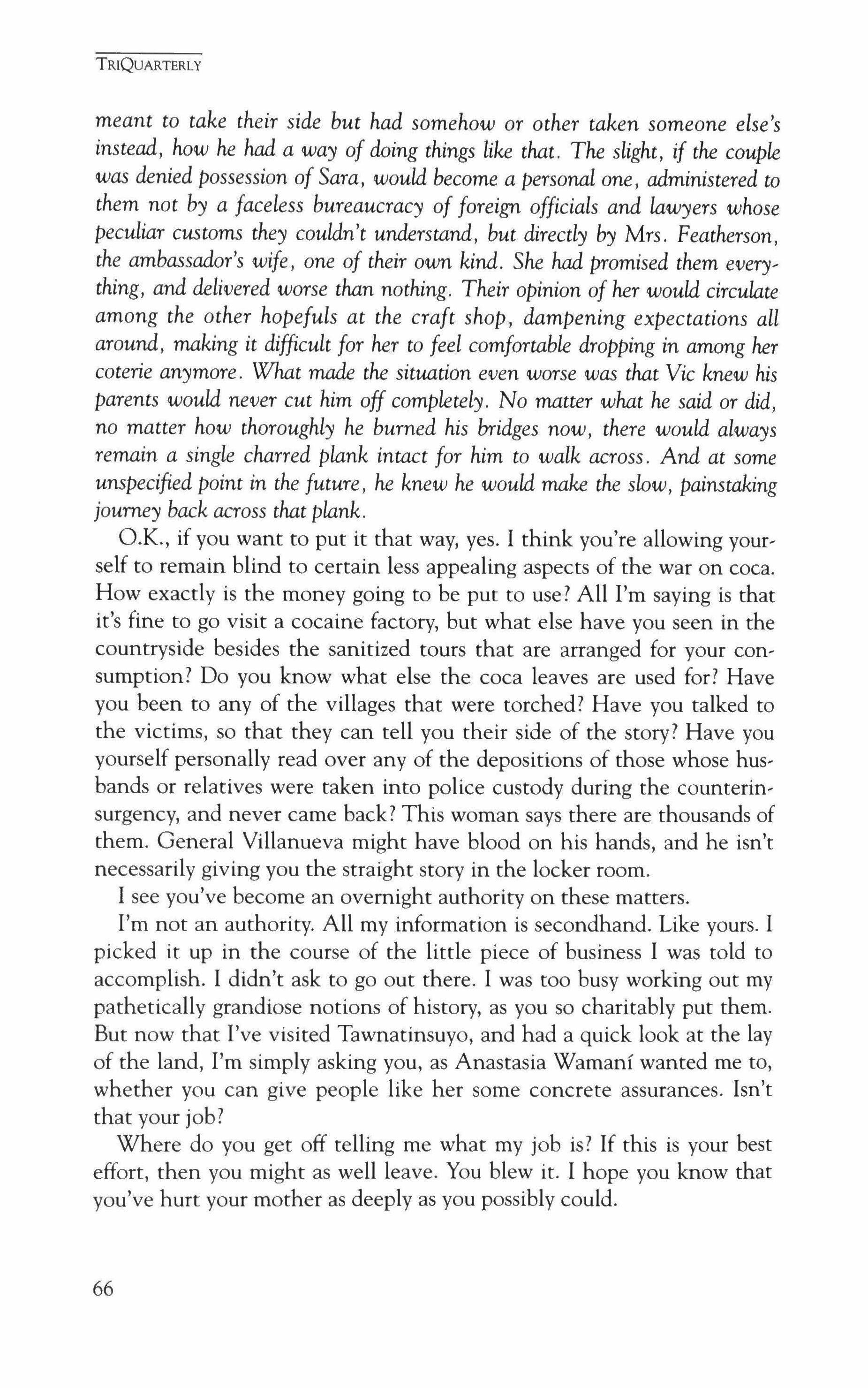
meant to take their side but had somehow or other taken someone else's instead, how he had a way of doing things like that. The slight, if the couple was denied possession of Sara, would become a personal one, administered to them not by a faceless bureaucracy of foreign officials and lawyers whose peculiar customs they couldn't understand, but directly by Mrs. Featherson, the ambassador's wife, one of their own kind. She had promised them every, thing, and delivered worse than nothing. Their opinion of her would circulate among the other hopefuls at the craft shop, dampening expectations all around, making it difficult for her to feel comfortable dropping in among her coterie anymore. What made the situation even worse was that Vic knew his parents would never cut him off completely. No matter what he said or did, no matter how thoroughly he burned his bridges now, there would always remain a single charred plank intact for him to walk across. And at some unspecified point in the future, he knew he would make the slow, painstaking journey back across that plank.
O.K., if you want to put it that way, yes. I think you're allowing your, self to remain blind to certain less appealing aspects of the war on coca. How exactly is the money going to be put to use? All I'm saying is that it's fine to go visit a cocaine factory, but what else have you seen in the countryside besides the sanitized tours that are arranged for your con, surnption? Do you know what else the coca leaves are used for? Have you been to any of the villages that were torched? Have you talked to the victims, so that they can tell you their side of the story? Have you yourself personally read over any of the depositions of those whose husbands or relatives were taken into police custody during the counterinsurgency, and never came back? This woman says there are thousands of them. General Villanueva might have blood on his hands, and he isn't necessarily giving you the straight story in the locker room.
I see you've become an overnight authority on these matters.
I'm not an authority. All my information is secondhand. Like yours. I picked it up in the course of the little piece of business I was told to accomplish. I didn't ask to go out there. I was too busy working out my pathetically grandiose notions of history, as you so charitably put them. But now that I've visited Tawnatinsuyo, and had a quick look at the lay of the land, I'm simply asking you, as Anastasia Wamanf wanted me to, whether you can give people like her some concrete assurances. Isn't that your job?
Where do you get off telling me what my job is? If this is your best effort, then you might as well leave. You blew it. I hope you know that you've hurt your mother as deeply as you possibly could.
TRIQUARTERLY
66
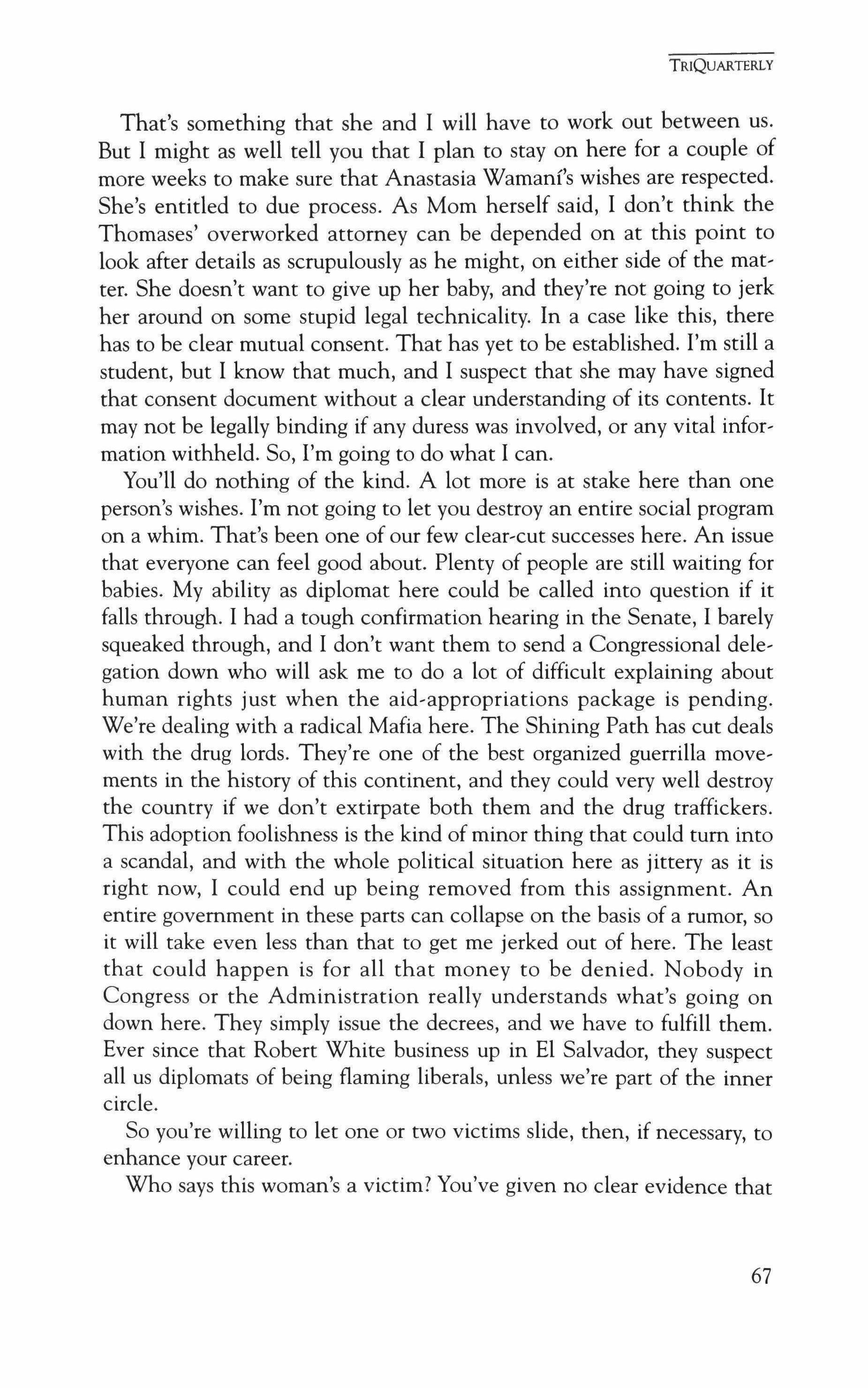
That's something that she and I will have to work out between us. But I might as well tell you that I plan to stay on here for a couple of more weeks to make sure that Anastasia Wamanf's wishes are respected. She's entitled to due process. As Mom herself said, I don't think the Thomases' overworked attorney can be depended on at this point to look after details as scrupulously as he might, on either side of the mat, ter. She doesn't want to give up her baby, and they're not going to jerk her around on some stupid legal technicality. In a case like this, there has to be clear mutual consent. That has yet to be established. I'm still a student, but I know that much, and I suspect that she may have signed that consent document without a clear understanding of its contents. It may not be legally binding if any duress was involved, or any vital information withheld. So, I'm going to do what I can.
You'll do nothing of the kind. A lot more is at stake here than one person's wishes. I'm not going to let you destroy an entire social program on a whim. That's been one of our few clear-cut successes here. An issue that everyone can feel good about. Plenty of people are still waiting for babies. My ability as diplomat here could be called into question if it falls through. I had a tough confirmation hearing in the Senate, I barely squeaked through, and I don't want them to send a Congressional dele' gation down who will ask me to do a lot of difficult explaining about human rights just when the aid,appropriations package is pending. We're dealing with a radical Mafia here. The Shining Path has cut deals with the drug lords. They're one of the best organized guerrilla move, ments in the history of this continent, and they could very well destroy the country if we don't extirpate both them and the drug traffickers. This adoption foolishness is the kind of minor thing that could tum into a scandal, and with the whole political situation here as jittery as it is right now, I could end up being removed from this assignment. An entire government in these parts can collapse on the basis of a rumor, so it will take even less than that to get me jerked out of here. The least that could happen is for all that money to be denied. Nobody in Congress or the Administration really understands what's going on down here. They simply issue the decrees, and we have to fulfill them. Ever since that Robert White business up in EI Salvador, they suspect all us diplomats of being flaming liberals, unless we're part of the inner circle.
So you're willing to let one or two victims slide, then, if necessary, to enhance your career.
Who says this woman's a victim? You've given no clear evidence that
TRIQUARTERLY
67

she is. And please don't forget that you're not yet an attorney. Even if you can find somebody to represent her, do you think your case, based on tales of bogeymen, would hold up in a court of law?
That's what I intend to find out. That's what the legal system's for, isn't it?
Not this time. Save it for the moot court. This is the real world.
I really don't see that you can stop me. What are you going to do, deport me?
Yes. That's precisely what I plan to do, if it comes to that. I'm going to have your visa revoked.
You can't kick me out of Peru. I'm a private citizen.
Believe me, if there's one thing I still can do, it's get somebody removed. All you have is a tourist visa anyway. You should have had the foresight to let us make arrangements on your behalf. Those are trickier to undo, once we've given our own seal of approval. It would have bought you a week or two, anyway. But you were too proud for that. You didn't want to be associated with Ambassador Featherson, the imperialist and paterfamilias, so have it your way. Be an orphan. All it takes is a personal request from me to have a simple tourist visa canceled, as long as that person is from my country. It had been years since Vic last traveled with his name included on his mother's diplomatic passport, bathed in an aura ofparenthetical importance, charisma twice removed. The only perk he could remember was getting to transport his pet rabbit, a pink-eyed animal suspiciously verging on distemper, from place to place with no questions asked.
In this case, that orphaned countryman still happens to have the same last name as you. That's going to look pretty funny. As a matter of fact, I'd be willing to bet some of the journalists in Lima would find the whole case of great human interest. Page one material. Political parricide. Oedipus in Peru, staggering blind among the ruins of Machu Picchu. Luckily for me, I speak the lingo. I hung around a lot of foreign countries in my youth.
Son. His mother spoke only that one word, but it was sufficient. Contained in the single syllable of it was a conversation they'd been holding with one another since his birth, since she first cradled him in her arms and he began to make the rudimentary noises of all languages gradually narrowing them down until he articulated only the ones that came from her mouth, and from his father's mouth. She had made a career of soothing and nurturing, and she knew exactly where her power lay and when and how to exercise it. No recriminations would come from her quarter except those implied in the tone of voice in which she spoke his name.
TRIQUARTERLY
68
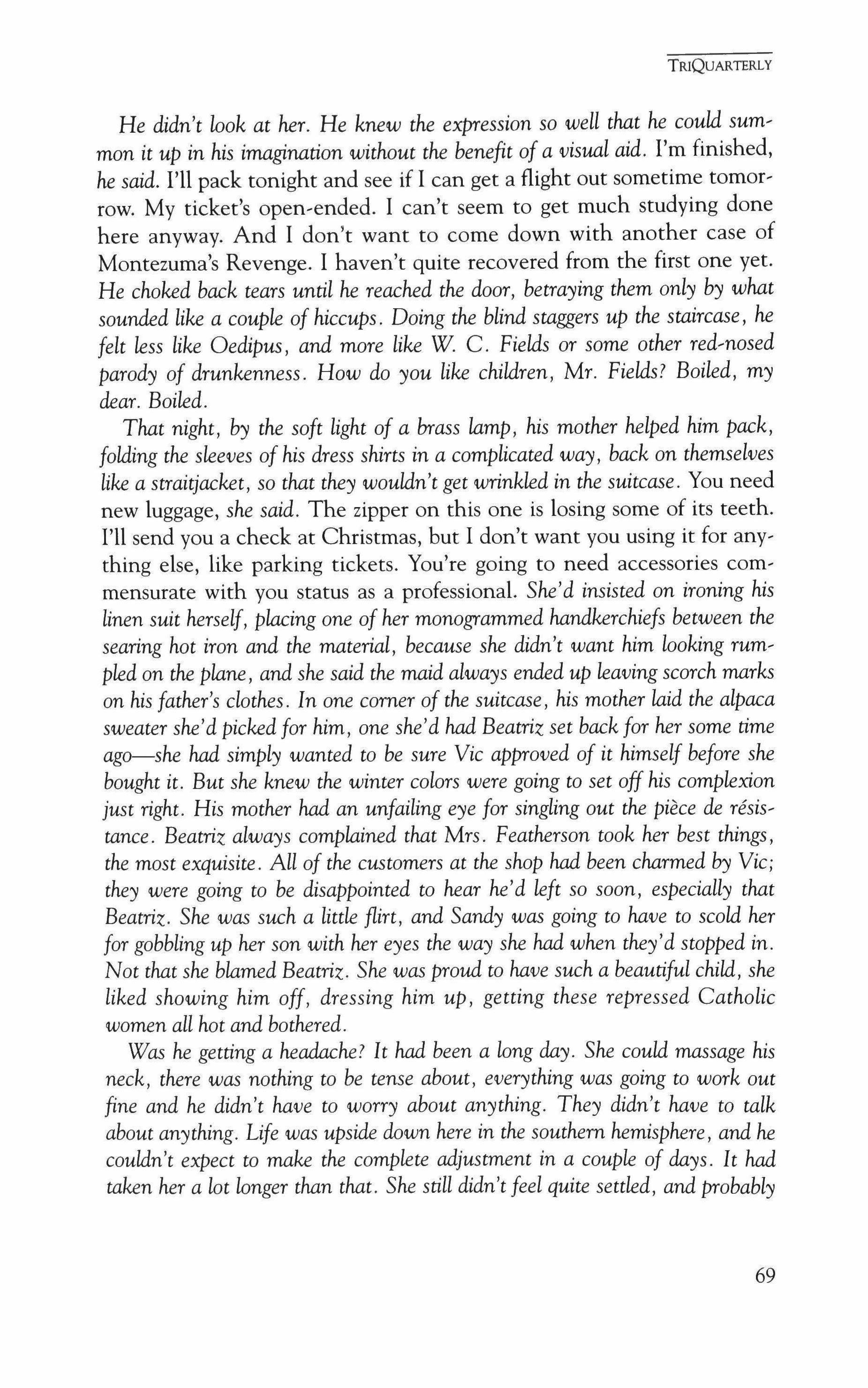
He didn't look at her. He knew the expression so well that he could summon it up in his imagination without the benefit of a visual aid. I'm finished, he said. I'll pack tonight and see if I can get a flight out sometime tomorrow. My ticket's open-ended. I can't seem to get much studying done here anyway. And I don't want to come down with another case of Montezuma's Revenge. I haven't quite recovered from the first one yet. He choked back tears until he reached the door, betraying them only by what sounded like a couple of hiccups. Doing the blind staggers up the staircase, he felt less like Oedipus, and more like W. C. Fields or some other red�nosed parody of drunkenness. How do you like children, Mr. Fields? Boiled, my dear. Boiled.
That night, by the soft light of a brass lamp, his mother helped him pack, folding the sleeves of his dress shirts in a complicated way, back on themselves like a straitjacket, so that they wouldn't get wrinkled in the suitcase. You need new luggage, she said. The zipper on this one is losing some of its teeth. I'll send you a check at Christmas, but I don't want you using it for anything else, like parking tickets. You're going to need accessories commensurate with you status as a professional. She'd insisted on ironing his linen suit herself, placing one of her monogrammed handkerchiefs between the searing hot iron and the material, because she didn't want him looking rumpled on the plane, and she said the maid always ended up leaving scorch marks on his father's clothes. In one comer of the suitcase, his mother laid the alpaca sweater she'd picked for him, one she'd had Beatriz set back for her some time ago-she had simply wanted to be sure Vic approved of it himself before she bought it. But she knew the winter colors were going to set off his complexion just right. His mother had an unfailing eye for singling out the piece de tesistance. Beatriz always complained that Mrs. Featherson took her best things, the most exquisite. All of the customers at the shop had been charmed by Vic; they were going to be disappointed to hear he'd left so soon, especially that Beamz. She was such a little flirt, and Sandy was going to have to scold her for gobbling up her son with her eyes the way she had when they'd stopped in. Not that she blamed Beatriz. She was proud to have such a beautiful child, she liked showing him off, dressing him up, getting these repressed Catholic women all hot and bothered. Was he getting a headache? It had been a long day. She could massage his neck, there was nothing to be tense about, everything was going to work out fine and he didn't have to worry about anything. They didn't have to talk about anything. Life was upside down here in the southern hemisphere, and he couldn't expect to make the complete adjustment in a couple of days. It had taken her a lot longer than that. She still didn't feel quite settled, and probably
TRIQUARTERLY
69
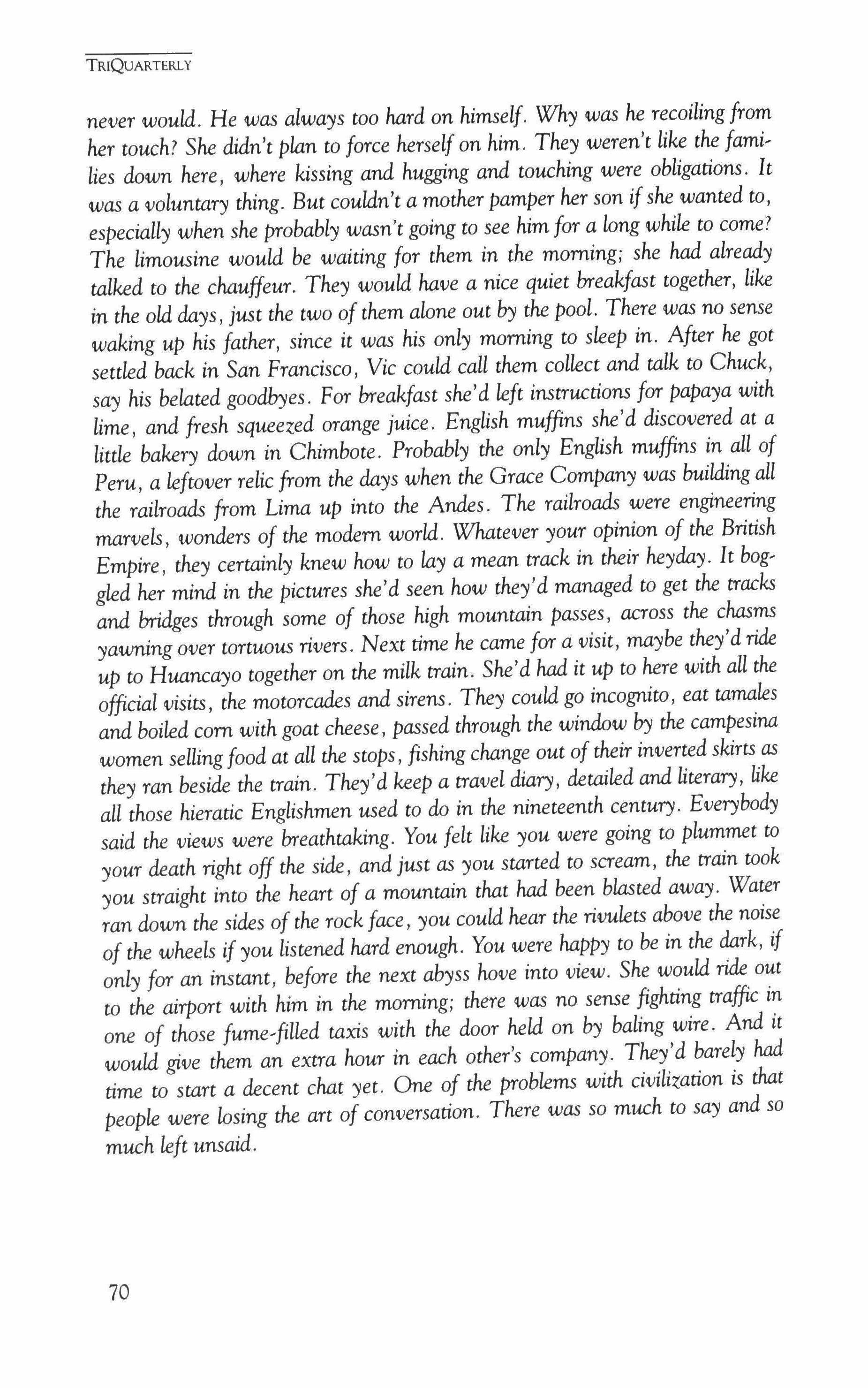
never would. He was always too hard on himself. Why was he recoilingfrom her touch? She didn't plan to force herself on him. They weren't like the [amilies down here, where kissing and hugging and touching were obligations. It was a voluntary thing. But couldn't a mother pamper her son ifshe wanted to, especially when she probably wasn't going to see him for a long while to come? The limousine would be waiting for them in the morning; she had already talked to the chauffeur. They would have a nice quiet breakfast together, like in the old days, just the two ofthem alone out by the pool. There was no sense waking up his father, since it was his only morning to sleep in. After he got settled back in San Francisco, Vic could call them collect and talk to Chuck, say his belated goodbyes. For breakfast she'd left instructions for papaya with lime, and fresh squeezed orange juice. English muffins she'd discovered at a little bakery down in Chimbote. Probably the only English muffins in all of Peru, a leftover relic from the days when the Grace Company was building all the railroads from Lima up into the Andes. The railroads were engineering marvels, wonders of the modern world. Whatever your opinion of the British Empire, they certainly knew how to lay a mean track in their heyday. It bog� gled her mind in the pictures she'd seen how they'd managed to get the tracks and bridges through some of those high mountain passes, across the chasms yawning over tortuous rivers. Next time he came for a visit, maybe they'd ride up to Huancayo together on the milk train. She'd had it up to here with all the official visits, the motorcades and sirens. They could go incognito, eat tamales and boiled corn with goat cheese, passed through the window by the campesina women sellingfood at all the stops, fishing change out of their inverted skirts as they ran beside the train. They'd keep a travel diary, detailed and literary, like all those hieratic Englishmen used to do in the nineteenth century. Everybody said the views were breathtaking. You felt like you were going to plummet to your death right off the side, and just as you started to scream, the train took you straight into the heart of a mountain that had been blasted away. Water ran down the sides of the rock face, you could hear the rivulets above the noise of the wheels if you listened hard enough. You were happy to be in the dark, if only for an instant, before the next abyss hove into view. She would ride out to the airport with him in the morning; there was no sense fighting traffic in one of those fume�filled taxis with the door held on by baling wire. And it would give them an extra hour in each other's company. They'd barely had time to start a decent chat yet. One of the problems with civilization is that people were losing the art of conversation. There was so much to say and so much left unsaid.
TRIQUARTERLY
70
Eight Poems
David Smith

Louis Armstrong and the Astronauts
Meet at the Langley AFB Pool
Eighteen, out to celebrate the fresh wedding of his mother and the Major ofjets, he saw the famous one wipe his brow and make the joke: My Man Tan's sweatin' off! Brassy jazz rang. The astronauts, America's heroes, others, aped whatever worst men can do. Drunk, howling, the raw bodies moonsleeked, heads boiling in that quick blue like planets, the swimming gods seemed telescoped. He felt his youth smoked, watched, was bound to earth. The vision of great men shirting in the pool blew something deep inside. They humped like goats. With him, the girl he'd marry. Soon she'd fuck her boss. While she puked, someone lifted the hem of her dress.
TRIQUARTERLY
71

A Supernatural Narrative
He wanted something to happen but it would not. All day the cheep of cardinals over spring grass, lyric crows, raucous finch negotiations, and yesterday the great owl's dire who�who. But nothing happened; no one married, died, called over the fence, ran off with a piece of trash, tried to abort herself with a Coke, or swelled at armpit with costs only the future knew. Still, he thought, things must be happening, the blue lights burned the ballfield, sirens spiraled, then hushed machines from yard to yard, all steady, and all just life, what the moths ached for, the black widow. Her web shook his room. He kneeled to get close.
TRIQUARTERLY
72
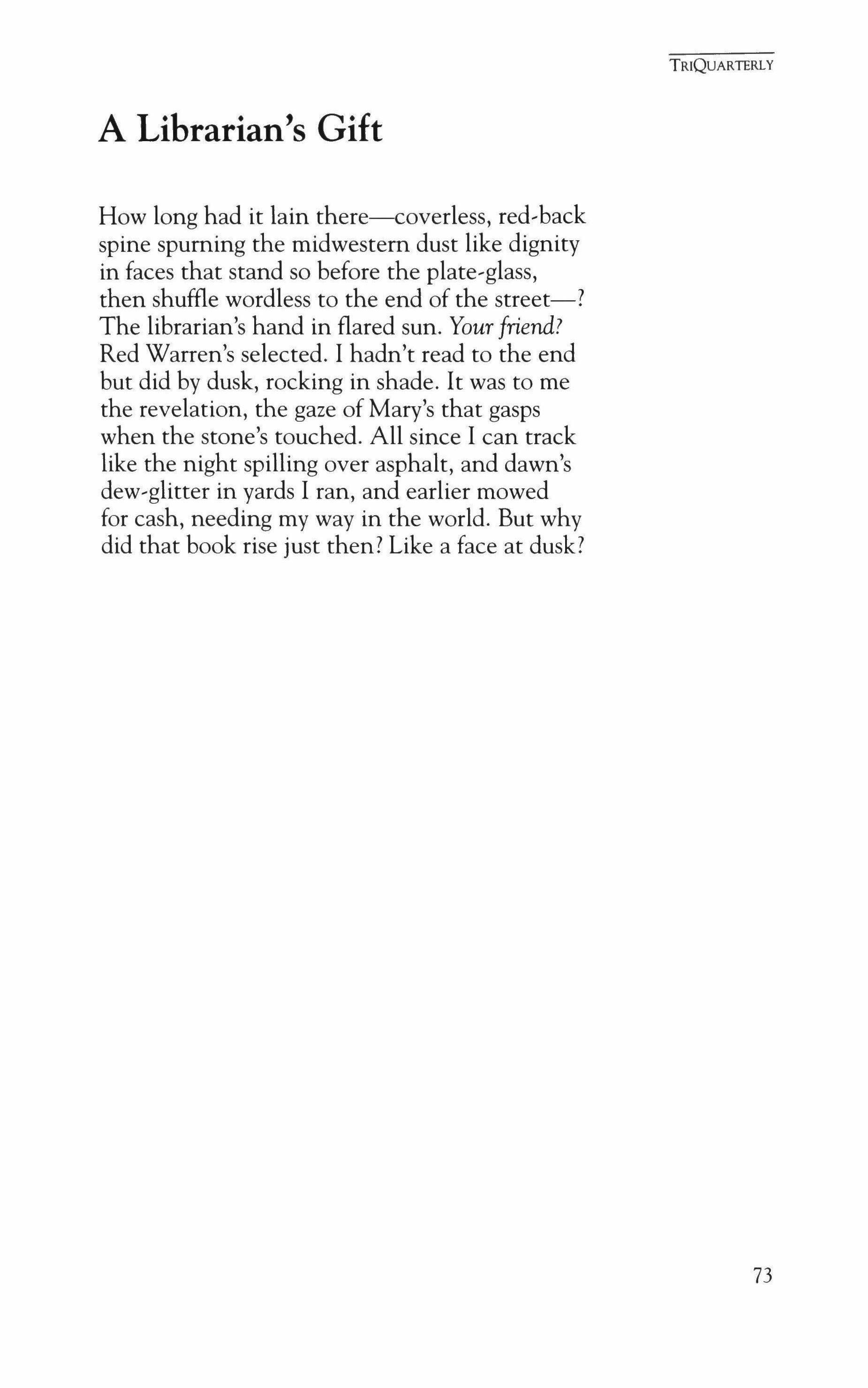
A Librarian's Gift
How long had it lain there-coverless, red-back spine spurning the midwestern dust like dignity in faces that stand so before the plate-glass, then shuffle wordless to the end of the street-? The librarian's hand in flared sun. Your friend? Red Warren's selected. I hadn't read to the end but did by dusk, rocking in shade. It was to me the revelation, the gaze of Mary's that gasps when the stone's touched. All since I can track like the night spilling over asphalt, and dawn's dew,glitter in yards I ran, and earlier mowed for cash, needing my way in the world. But why did that book rise just then? Like a face at dusk?
TRIQUARTERLY 73

Mississippi River Bridge
Running after dusk, I see the far southwest corner of the lake shaken. Is it rising Up?
Girders gleam in glaze of sun, the highest peak wheels or feet can scroll over in this land, no mountains, cliffs, gorges, wooded vistas, little to make the heart thud for littleness of man, except the slow clay-brown swell the Mississippi drags past like hope, manly water deeper than the height the bridge makes in the air, its movement refusing our tossed nightmares. We need crossing points to go, delighted as birds, where all is down and swept under but us; then, still running, we grin toward snaky lights far off.
TRIQUARTERLY
74
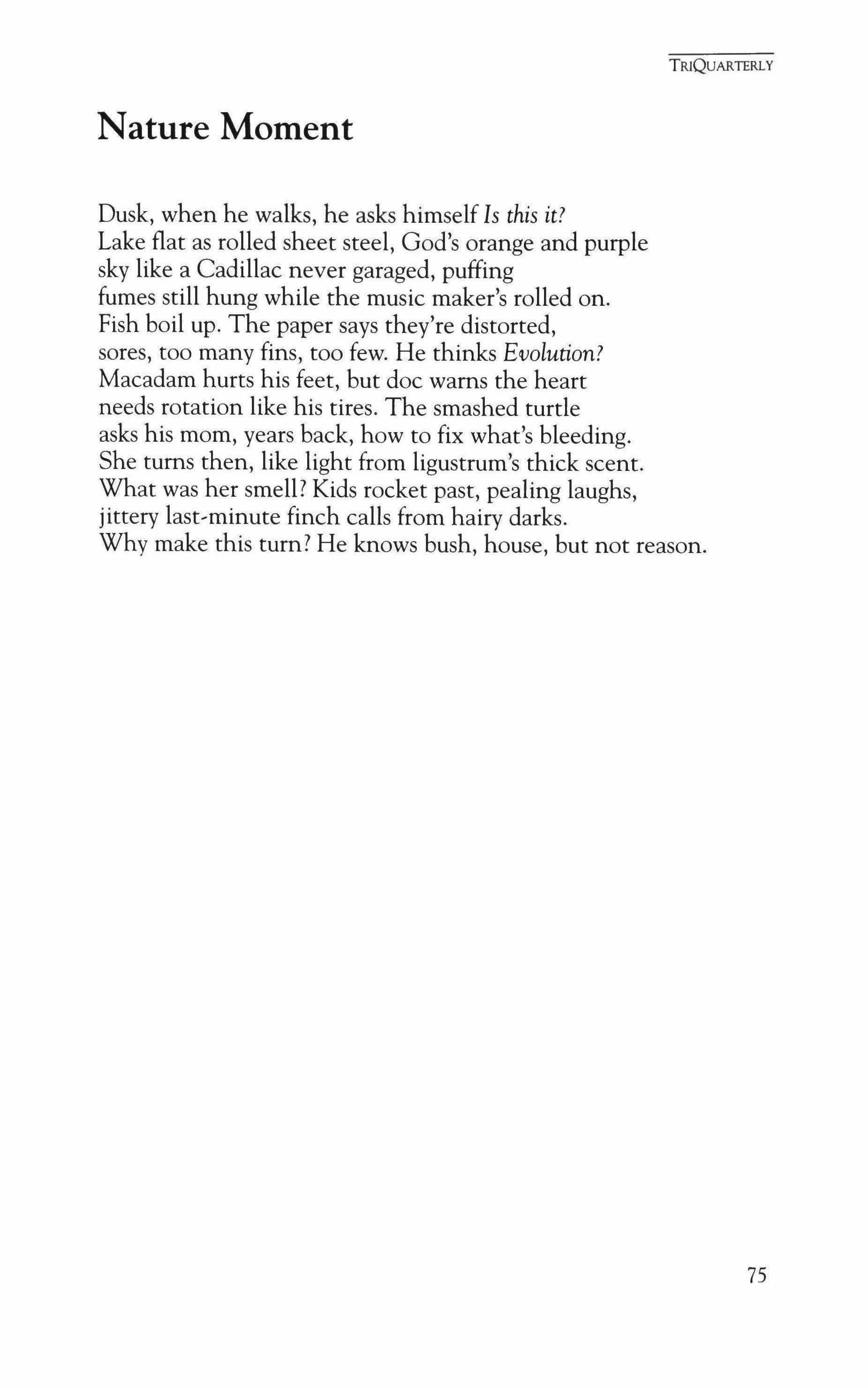
Nature Moment
Dusk, when he walks, he asks himself Is this it? Lake flat as rolled sheet steel, God's orange and purple sky like a Cadillac never garaged, puffing fumes still hung while the music maker's rolled on. Fish boil up. The paper says they're distorted, sores, too many fins, too few. He thinks Evolution? Macadam hurts his feet, but doc warns the heart needs rotation like his tires. The smashed turtle asks his mom, years back, how to fix what's bleeding. She turns then, like light from ligustrum's thick scent. What was her smell? Kids rocket past, pealing laughs, jittery last-minute finch calls from hairy darks. Why make this tum? He knows bush, house, but not reason.
TRlQUARTERLY
75

Another Nature Moment
My Deep South, still famous for heat, lassitude, hospitality, and mannerly ways of keeping its big gut-wrench with the past hidden, unless you can read, or fail to see its trash gets swept away one side of town, yet adorns the other, is paralyzed. An invasion of air TV claims from beyond our borders spills its tingling brittle little mirrors all over magnolia, azalea, marigold, banana palm, hibiscus, and clinging rose. Ladies step out, damage assessors, down flagstone to lift shards of ice from dirt they've long curried. They toss aside the dark face, still none they know.
TRIQUARTERLY
76
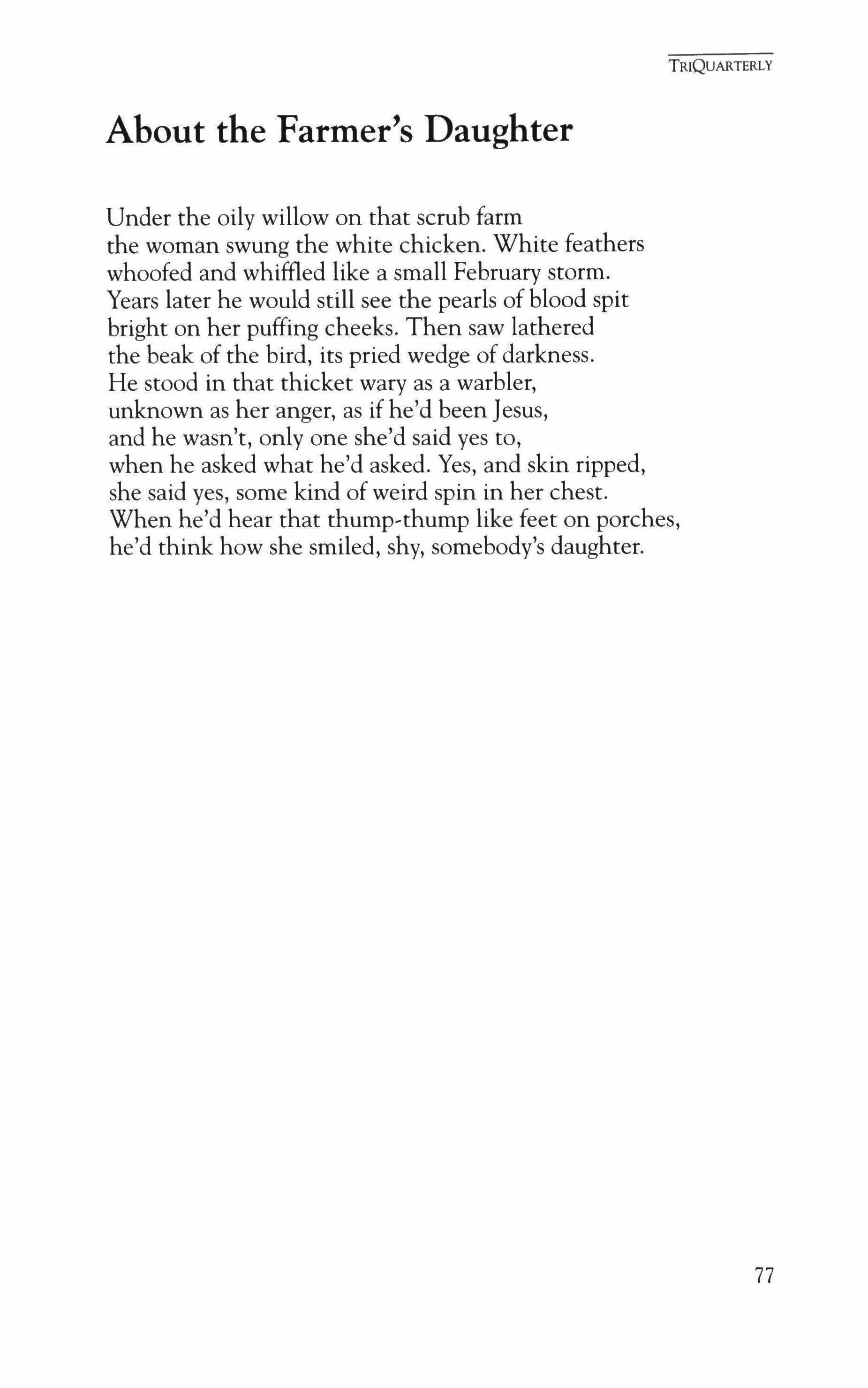
About the Farmer's Daughter
Under the oily willow on that scrub farm the woman swung the white chicken. White feathers whoofed and whiffled like a small February storm. Years later he would still see the pearls of blood spit bright on her puffing cheeks. Then saw lathered the beak of the bird, its pried wedge of darkness. He stood in that thicket wary as a warbler, unknown as her anger, as if he'd been Jesus, and he wasn't, only one she'd said yes to, when he asked what he'd asked. Yes, and skin ripped, she said yes, some kind of weird spin in her chest. When he'd hear that thump,thump like feet on porches, he'd think how she smiled, shy, somebody's daughter.
TRIQUARTERLY
77

Irish Whiskey in the Backyard
Two dwarf oranges, one tangerine, one grapefruit rescued from Kmart's clearance sale, leafless souls, luminous with Louisiana sun, volts near liquid, rare buds of white like a woman's part, the green waxy leaves it takes a long time to open to peak conception, which is work, fate, or luck good as orphans get. December's blush here might be Christ's happy gaze spilled, not salt lapping every road you take, not cold house,ache, not winter's bloodless shuffle past dark and light, faces like roadside toads, flashbulbed and stunned. But who knows what happiness is? I drink and stroll, lord, as night comes cool as years ahead's clamped vaults.
TRIQUARTERLY
78
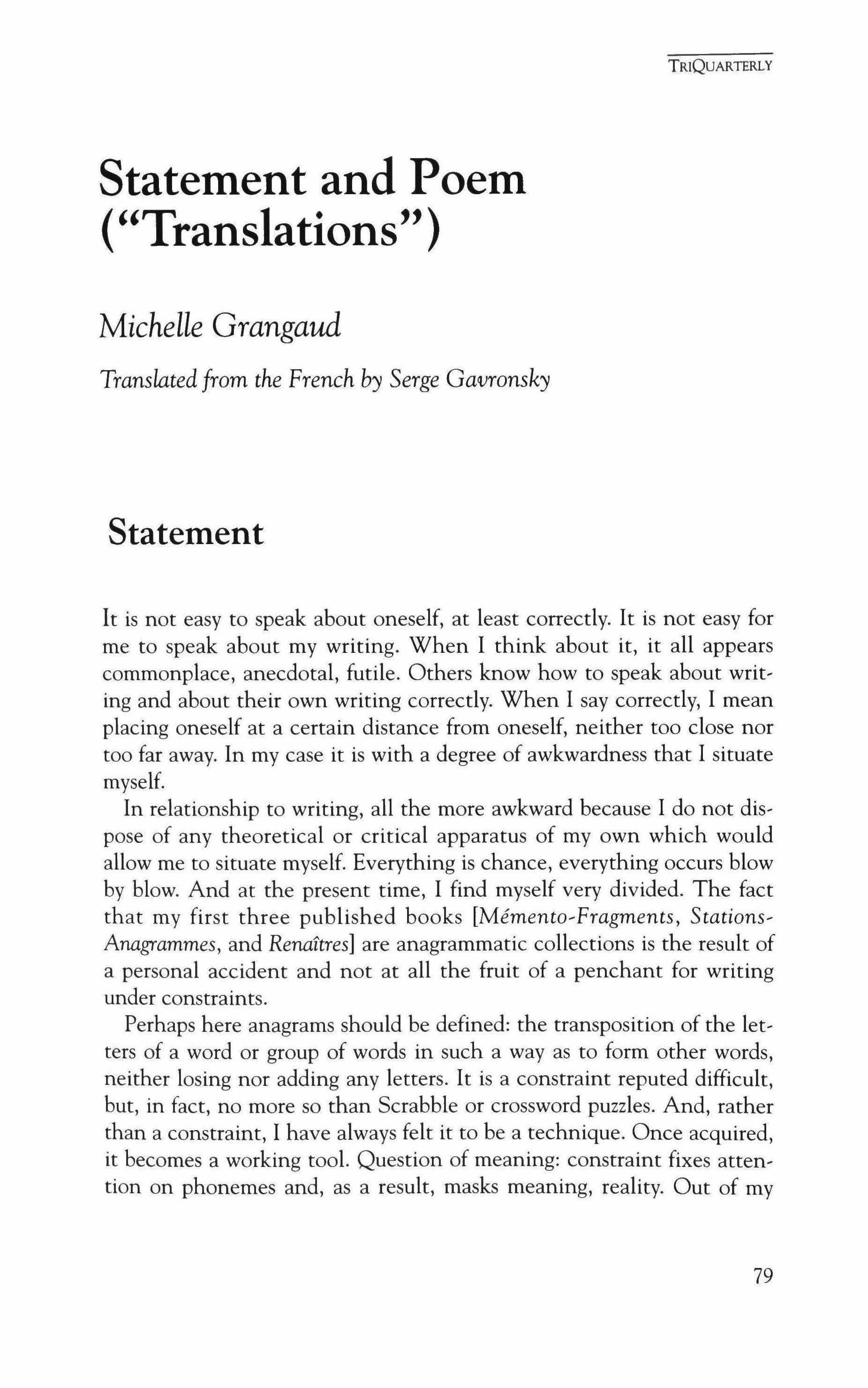
Statement and Poem {"Translations"}
Michelle Grangaud
Translated from the French by
Serge Gavronsky
Statement
It is not easy to speak about oneself, at least correctly. It is not easy for me to speak about my writing. When I think about it, it all appears commonplace, anecdotal, futile. Others know how to speak about writing and about their own writing correctly. When I say correctly, I mean placing oneself at a certain distance from oneself, neither too close nor too far away. In my case it is with a degree of awkwardness that I situate myself.
In relationship to writing, all the more awkward because I do not dispose of any theoretical or critical apparatus of my own which would allow me to situate myself. Everything is chance, everything occurs blow by blow. And at the present time, I find myself very divided. The fact that my first three published books [Memento-Fragments, StationsAnagrammes, and Renaftres] are anagrammatic collections is the result of a personal accident and not at all the fruit of a penchant for writing under constraints.
Perhaps here anagrams should be defined: the transposition of the letters of a word or group of words in such a way as to form other words, neither losing nor adding any letters. It is a constraint reputed difficult, but, in fact, no more so than Scrabble or crossword puzzles. And, rather than a constraint, I have always felt it to be a technique. Once acquired, it becomes a working tool. Question of meaning: constraint fixes attention on phonemes and, as a result, masks meaning, reality. Out of my
TRIQUARTERLY
79

anagrammatic practice emerges, nevertheless, fragments of reality, often the most violent, which surface independently of all desire to speak. This involuntary return of reality transforms, so it seems to me, the anagram into something other than a pure exercise in virtuosity. One can say as much about all forms of poetic writing: there is a division, the intentionality of discourse (and of a personal affectivity) which find themselves short-circuited and, at that, the anecdotal falls to the side.
I call anecdotal the whole process of identification, beginning with the problem of proper names. It seems to me that, being forced to carry a name, for a writer or a poet, and what's more, a proper name, constitutes a serious contradiction. When the question is asked, insofar as I'm concerned, I think of a pseudonym, as so many others have doubtless done before, but this makes matters worse, a sort of narcissistic emphasis. Now I regret not having thought of taking for a name my Social Security number, or rather, since it is a bit too long to say out loud, the last three digits, which I prefer because they're the most insignificant ones. Or the two key digits: Zero-Four would then appear to me to be a relatively acceptable name.
It seems to me that it is always the greatest absence of identity that produces the most powerful singularity in the case of a writer or a poet. In order to be original, begin by copying-that's what Proust says. And singularity, as a criterion of aesthetic value, is so readily received that one shouldn't insist on this.
In my childhood, what most contributed to the shaping my thought, what nourished my appetite for reading and writing, were myths: the Odyssey, One Thousand and One Nights, and the Bible, which I read not out of religious conviction but out of taste for myth. I knew very early that Bible meant Book. And for a long time I remained persuaded that the first sentence in Genesis was: "In the beginning was the Word, and the Word was with God, and the Word was God." In fact, that is the first verse in the Gospel according to John. I long marveled at that sentence. That said, my love of myths is inversely proportional to the one I have for religions in general and to Christian variants in particular.
Direct influence on my current work: William Burroughs for cut-ups and Unica Zorn, in whom I discovered the possibility of the anagrammatic poem. Finally, with the American Objectivist poets I found a manner of theorizing a way of writing which I had already begun to practice intuitively-that is, in a less than rigorous manner. There's no doubt that it isn't by chance that I found my sources in languages other than French. At one time Proust influenced me, and markedly so, as
TRIQUARTERLY
80

much in my ways of thinking as in my writing. He held sway over me to such an extent, fascinated me so, that I finally realized that I had to tum away from him, to separate myself from him.
Philosophy (Spinoza in the first place), psychoanalysis, films (but I haven't seen one for many years), contemporary painting and musicall are forms of a pure consumption. But in general I do not feel any influence at all, other than very indirect, on my ways of writing.
I would like to practice writing prose again, the litheness, the fluidity of prose, all the while holding onto the anagrammatic lesson of nonintentional discourse and-this goes without saying-without an identity.
Does the fact of being a woman playa role in my thinking? Without a doubt it plays a part, but what part I would not be able to say. It truly conceals a role. In fact, I have a tendency of suspecting it, this beingwoman; it appears to me to be a bit like a false brother. The dictionary tells us that the term poetess quickly acquired a pejorative connotation. That is a societal truth, probably more so in a Mediterranean society, a fact which, unfortunately, does not affect only poetesses! In painting, music sculpture, architecture-the feminine ending simply does not exist. No need to discuss it. And yet we have in the government a Minister for Women to defend us; we-we are also battered wives, daughters raped by their fathers and secretaries by their bosses in that sweet land of France with its legendary gallantry. There's much bread on the table for our Minister, but it seems we're not eating our share of it.
Poetry, as we near the end of the century, of course, is in a state of confusion-induced less, perhaps, by what is explicitly denounced (the crisis in publishing, increasing popularity of television's ineptitude) than by an historical and political questioning. On the one hand, we possess an enormous cultural stockpile. It is difficult in front of such a mountain of masterpieces not to feel one's individual insignificance. On the other hand, the question has always been asked, but it seems to me that today it is asked with redoubled acuity: artistic activity, in its demands for singularity (from which it distinguishes itself from other aesthetic activities in general-artisanal, folkloric or techniques of mass production), is it anything other than an activity of the healthy and well-fed? What if only the well-fed had access to a privileged condition on this earth where, to a large extent, famine reigns and all around there's extreme poverty? I certainly do not believe I have an answer to this double question; simply, it happens that, at times, I ask it of myself.
TRIQUARTERLY
81
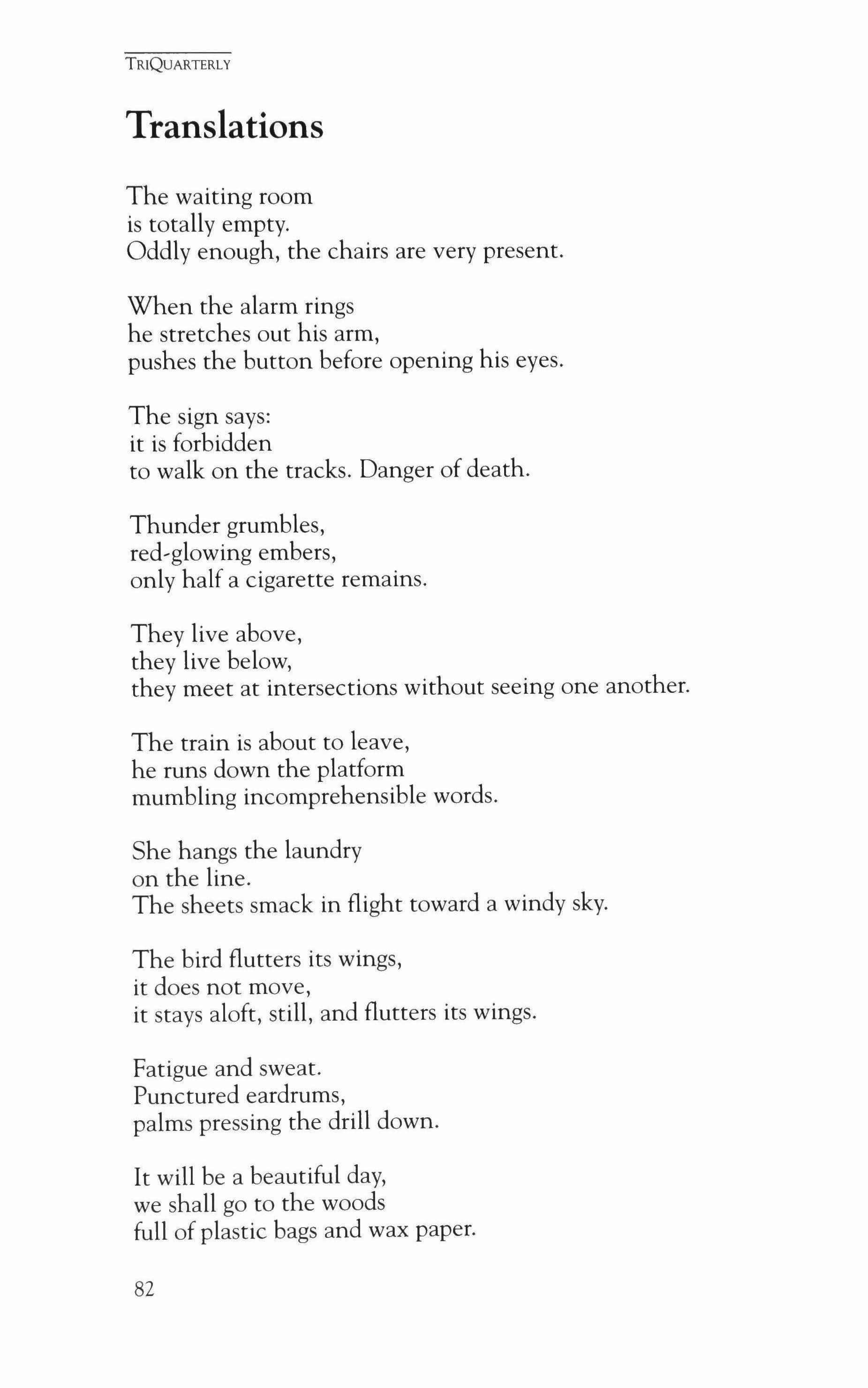
Translations
The waiting room is totally empty. Oddly enough, the chairs are very present.
When the alarm rings he stretches out his arm, pushes the button before opening his eyes.
The sign says: it is forbidden to walk on the tracks. Danger of death.
Thunder grumbles, red-glowing embers, only half a cigarette remains.
They live above, they live below, they meet at intersections without seeing one another.
The train is about to leave, he runs down the platform mumbling incomprehensible words.
She hangs the laundry on the line.
The sheets smack in flight toward a windy sky.
The bird flutters its wings, it does not move, it stays aloft, still, and flutters its wings.
Fatigue and sweat. Punctured eardrums, palms pressing the drill down.
It will be a beautiful day, we shall go to the woods full of plastic bags and wax paper.
TRIQUARTERLY
82
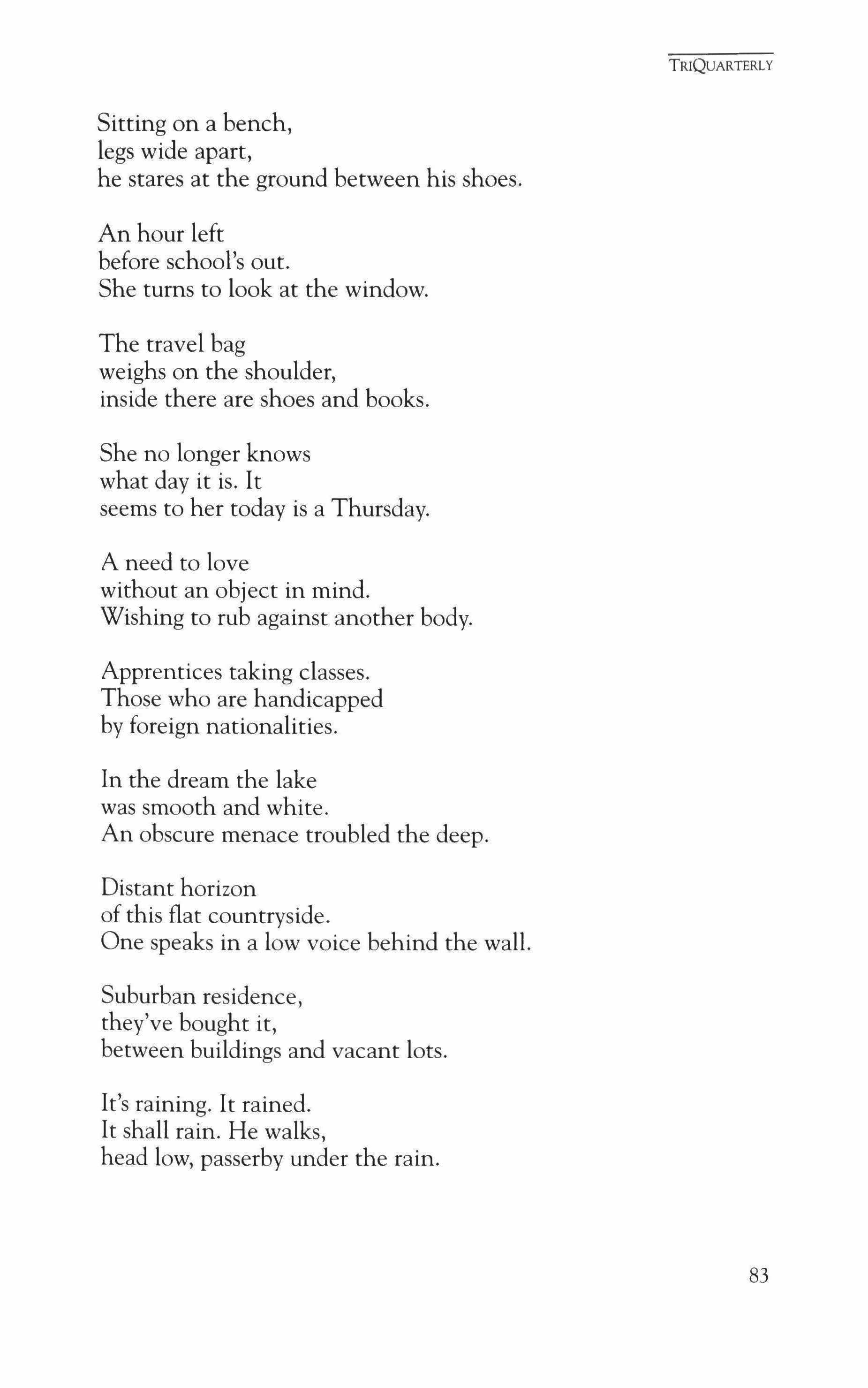
Sitting on a bench, legs wide apart, he stares at the ground between his shoes.
An hour left before school's out. She turns to look at the window.
The travel bag weighs on the shoulder, inside there are shoes and books.
She no longer knows what day it is. It seems to her today is a Thursday.
A need to love without an object in mind. Wishing to rub against another body.
Apprentices taking classes. Those who are handicapped by foreign nationalities.
In the dream the lake was smooth and white. An obscure menace troubled the deep.
Distant horizon of this flat countryside. One speaks in a low voice behind the wall.
Suburban residence, they've bought it, between buildings and vacant lots.
It's raining. It rained. It shall rain. He walks, head low, passerby under the rain.
TRIQUARTERLY
83
TRIQUARTERLY
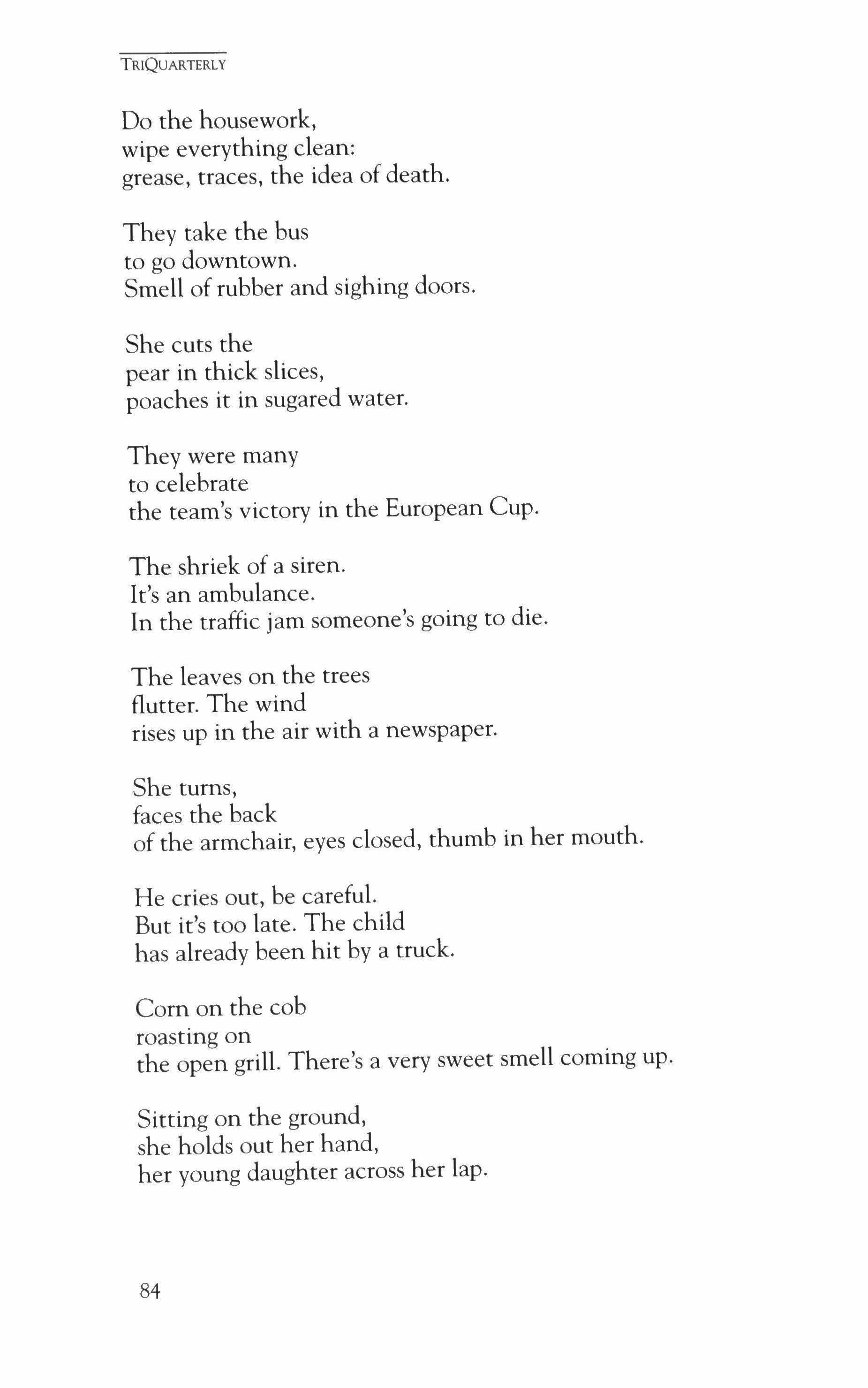
Do the housework, wipe everything clean: grease, traces, the idea of death.
They take the bus to go downtown. Smell of rubber and sighing doors.
She cuts the pear in thick slices, poaches it in sugared water.
They were many to celebrate the team's victory in the European Cup.
The shriek of a siren. It's an ambulance. In the traffic jam someone's going to die.
The leaves on the trees flutter. The wind rises up in the air with a newspaper.
She turns, faces the back of the armchair, eyes closed, thumb in her mouth.
He cries out, be careful. But it's too late. The child has already been hit by a truck.
Com on the cob roasting on the open grill. There's a very sweet smell coming up.
Sitting on the ground, she holds out her hand, her young daughter across her lap.
84

He bends over to tie his shoelaces. His fingers tremble a lot and his vision blurs.
The strawhat she's wearing with a somber blue ribbon, it's a souvenir.
A chilly morning, the water in the kettle never stops simmering.
In front of the sink, standing, quickly swallowing antidepressants.
Earplugs out of the box: press the button, they drop into your hand.
He leaves to check in at the unemployment office, from having smoked so much, his heart is beating.
She no longer wants to open the shutters, no longer wants to leave, no longer wants light.
He writes: you know. Then puts the pen down to think. Lights a cigarette.
She dips the tips of her fingers in water to feel them ringed.
The population is distributed on paper in circles of different sizes.
TRIQUARTERLY 85
TRIQUARTERLY
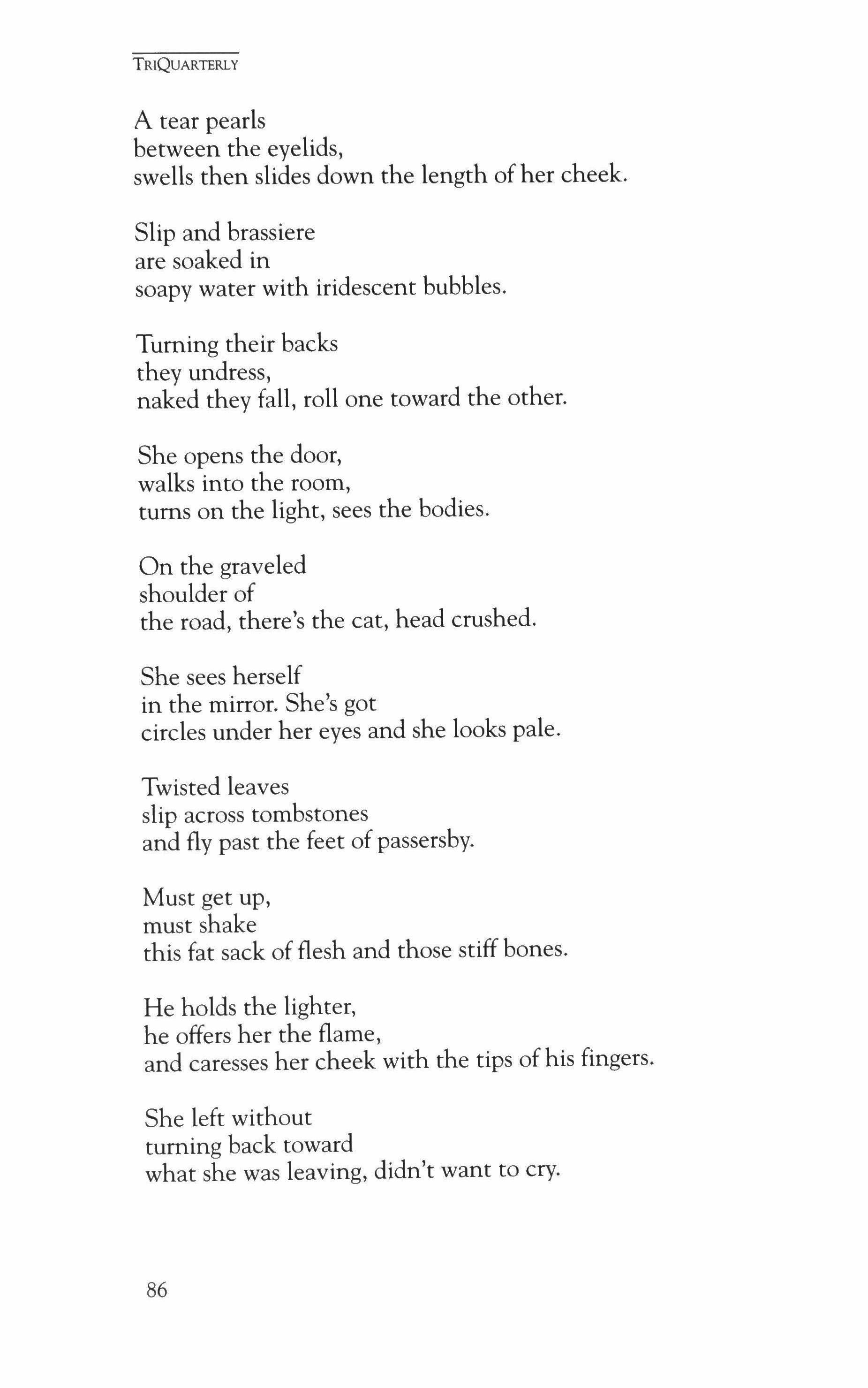
A tear pearls between the eyelids, swells then slides down the length ofher cheek.
Slip and brassiere are soaked in soapy water with iridescent bubbles.
Turning their backs they undress, naked they fall, roll one toward the other.
She opens the door, walks into the room, turns on the light, sees the bodies.
On the graveled shoulder of the road, there's the cat, head crushed.
She sees herself in the mirror. She's got circles under her eyes and she looks pale.
Twisted leaves slip across tombstones and fly past the feet ofpassersby.
Must get up, must shake this fat sack of flesh and those stiff bones.
He holds the lighter, he offers her the flame, and caresses her cheek with the tips of his fingers.
She left without turning back toward what she was leaving, didn't want to cry.
86
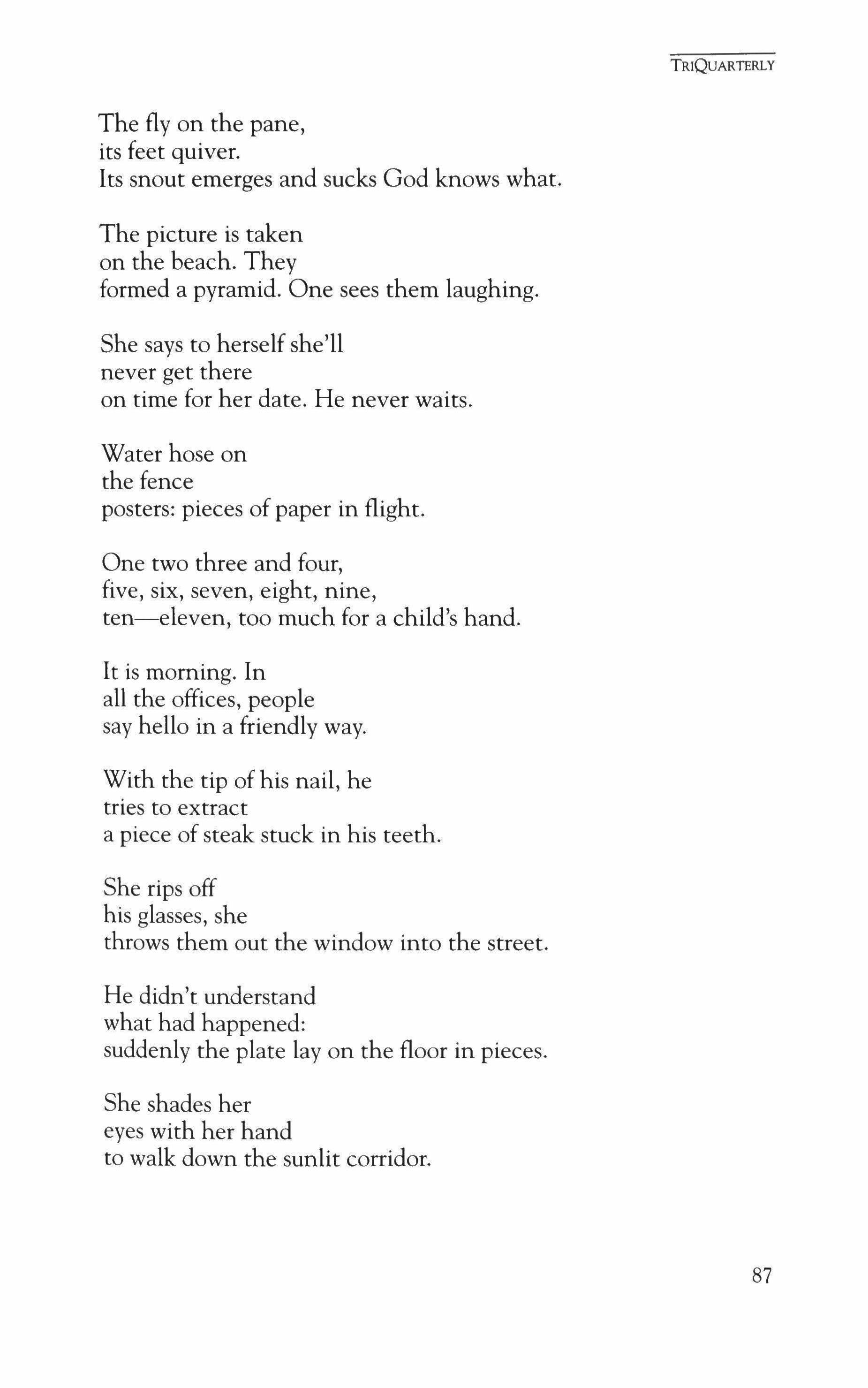
The fly on the pane, its feet quiver. Its snout emerges and sucks God knows what.
The picture is taken on the beach. They formed a pyramid. One sees them laughing.
She says to herself she'll never get there on time for her date. He never waits.
Water hose on the fence posters: pieces of paper in flight.
One two three and four, five, six, seven, eight, nine, ten-eleven, too much for a child's hand.
It is morning. In all the offices, people say hello in a friendly way.
With the tip of his nail, he tries to extract a piece of steak stuck in his teeth.
She rips off his glasses, she throws them out the window into the street.
He didn't understand what had happened: suddenly the plate lay on the floor in pieces.
She shades her eyes with her hand to walk down the sunlit corridor.
TRIQUARTERLY
87
TRIQUARTERLY

The days are long, it's summer. Flashes of thunder or stifling nights.
Tips of breasts. They are gray in the shadow of the room, lit only by a streetlamp.
He sees himself in a dream following an unknown woman. She hobbles, one heel higher than the other.
She turns off the lamp. Lies down and thinks again about what she'll put down in her will.
Kites by the hundreds. The child sees the sky like a roof trembling with colors.
She's alone in a bus, someone vomited.
One can see the sun under the splashes.
He unzips, pisses a long time on the corrugated sheer-metal fence.
Spreading laughter, sharp as a cry, the squeal of an animal caught in a trap.
The sharp smack, just after the lightning: the whole neighborhood suddenly plunges in darkness.
Pavillons-sous-bois, Fontenay-sous-bois, Aulnay, Clichy, Rosny, nothing but concrete.
88

Feet, crowds of feet, ceaselessly stamping on the sidewalk.
He holds a pencil, sticks out his tongue, draws a hanged man sticking out his tongue.
Throwing the living crab into boiling water, she catches sight of the child's terrified look.
In the barracks. He waits his tum, waits to take a shower. Boredom.
Adult education undertaken in public-school buildings.
Adenoma of the liver, says the doctor. How are you ever going to stop having another glass?
Between her thumb and her index finger, she curls, nervous fingers, a strand of hair.
He slips his hand, furtively, under the table. Under her skirt, he feels her very soft skin, naked.
On the computer keyboard, she types in: departure 9:35.
Enormous machine reducing the gesture to a singular agitation of phantom fingers.
TRIQUARTERLY 89
TRIQUARTERLY

The shadow of the room striated by slits in the shutters. Lighter rays of light.
He shaves. Wonders how he'll be able to tell her he no longer wants her.
She says, Johnny, with a smile, Johnny, you know, he was all my youth.
The nurse wheels her rolling bed toward the delivery room for the birth.
The peach having been passed under the faucet, she tastes, under the water, its velvety skin.
The child is slapped, traces offingers, a volley marking her temples.
She turns off the lamp, twists around in bed, without being able to fall asleep.
It's two A.M. in the morn. He walks alone up the boulevard. Not a cat in sight on the sidewalks.
The rain on the window leaves traces. Like tears inside the head.
After a day of work, one's got to do the shopping for the evening meal.
90

He seals the door and the windows with tape before turning on the gas.
An accident, two dead and six seriously injured on Highway 13.
The air is transparent. The weather will change. They say one doesn't know what to wear anymore.
Her arm reaches out of the toll booth to give back the change to all those vacationers.
He looks over his paycheck. Checks everything on his calculator.
One's got to repeat the same work, marking off thirty-nine hours per week.
One goes to the beach, naked feet in the sand, and in the nose the scent of solar amber.
The Down's-syndrome child splashes his bathwater all around and laughs.
He takes his cat in his arms and brings him to the vet to be fixed.
The sirens whistle it's already noon, first Wednesday of the month. She sighs.
TRIQUARTERLY 91
TRIQUARTERL
Y
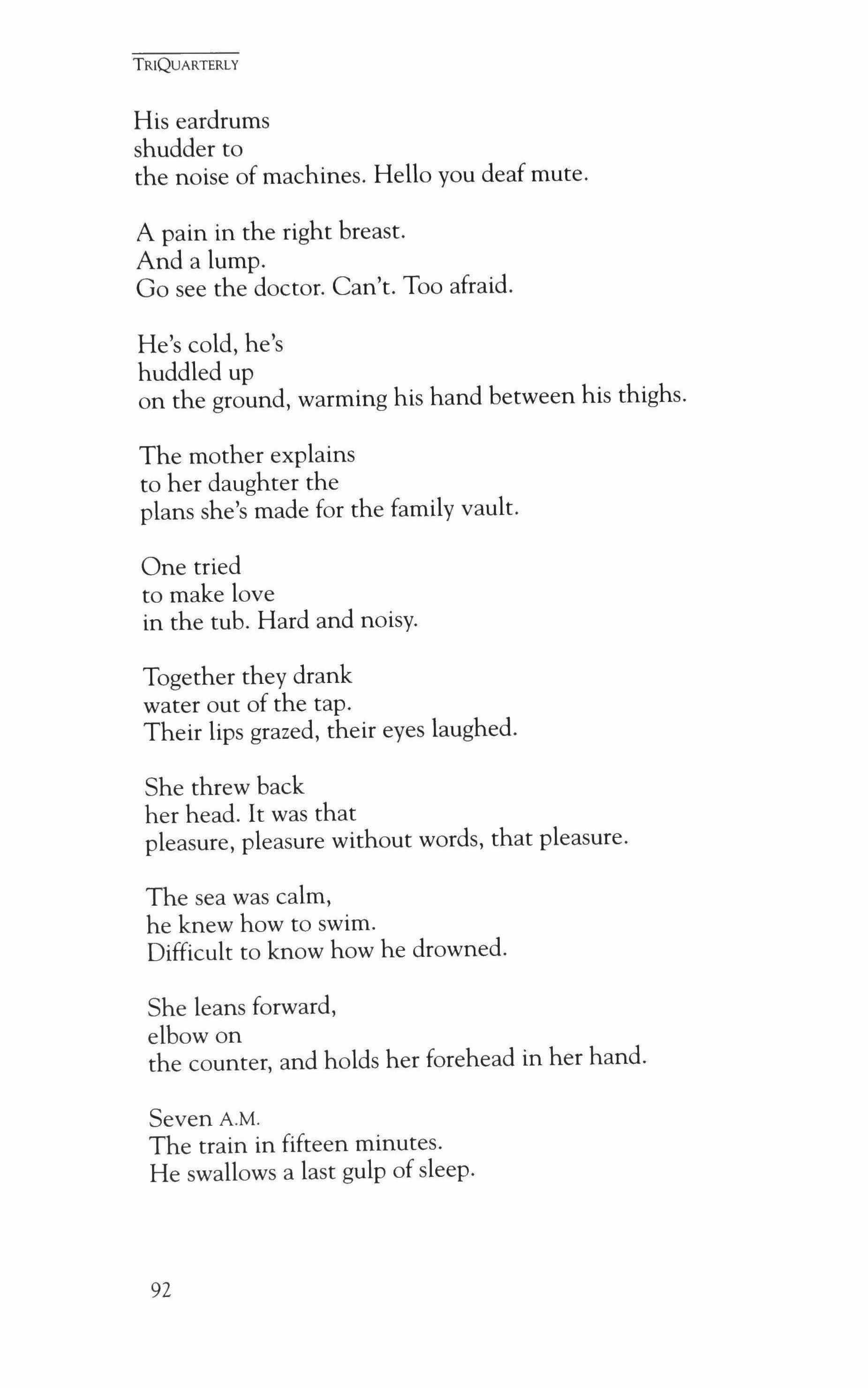
His eardrums shudder to the noise of machines. Hello you deaf mute.
A pain in the right breast. And a lump. Go see the doctor. Can't. Too afraid.
He's cold, he's huddled up on the ground, warming his hand between his thighs.
The mother explains to her daughter the plans she's made for the family vault.
One tried to make love in the tub. Hard and noisy.
Together they drank water out of the tap. Their lips grazed, their eyes laughed.
She threw back her head. It was that pleasure, pleasure without words, that pleasure.
The sea was calm, he knew how to swim. Difficult to know how he drowned.
She leans forward, elbow on the counter, and holds her forehead in her hand.
Seven A.M. The train in fifteen minutes. He swallows a last gulp of sleep.
92
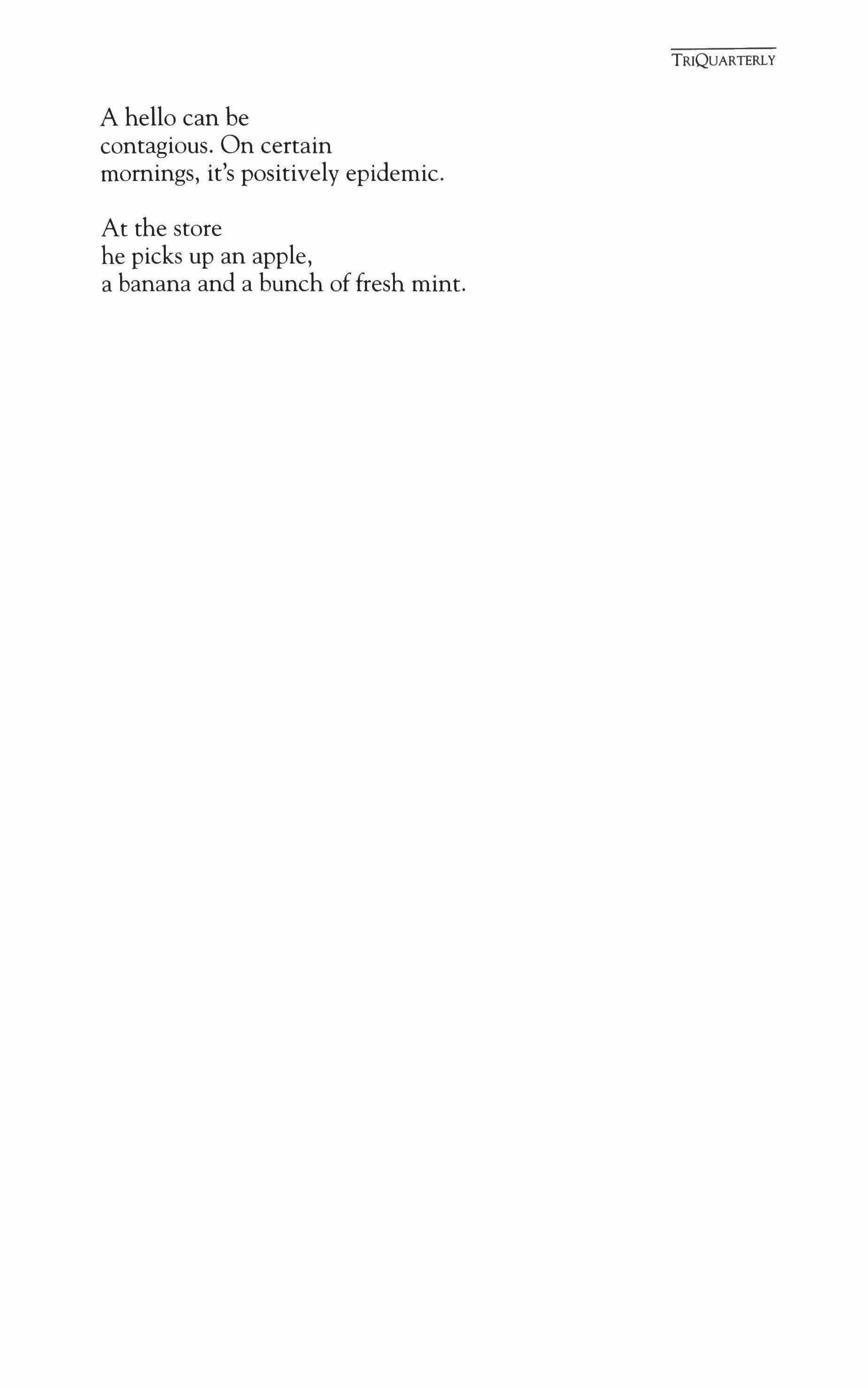
A hello can be contagious. On certain mornings, it's positively epidemic.
At the store he picks up an apple, a banana and a bunch of fresh mint.
TRIQUARTERLY
From The Twilight of the Bums
Federman/Chambers
Chambers/Federman
Foolish Questions

How did the bums meet? Dear reader, you are of a rather cumber, some curiosity. By the Devil what does it matter how the bums met? But if you insist we will tell you that they met by chance, like everyone else.
What are their names? What do you care? Does it matter if their names are Sam & Ace or Urn & Laut or Blank & Blank or F & C? They are bums, and that's what they should be called.
Where do they come from? The nearest place. No, that's wrong! The farthest place.
Where are they going? Does one really know where one is going?
What are they saying? Bum One is saying nothing. He is listening to Bum Two who is saying that everything that happens to them here on earth, good or bad, is written above.
TRIQUARTERLY
94
The Turncoats

Between them the bums can speak and/or understand Turkish, French, Erse, Japanese, Latin, American, Javanese, German, British, Italian, Hebrew, Dutch, Spanish, Yiddish, and even Ladino, that lovely little language which the Sephardim invented after they were kicked out of Spain a few times ago.
But none of these has worked. The bums are lost in a big city, and no one has any idea what they are trying to say, it's a bad dream.
They make a hand gesture which they believe is the international sign for being lost, for distress, but from every person in this city to whom they perform this gesture all they get in return is the bite of the thumb, a gesture they do not understand a fig.
It is not understand a fig.
What is then, Schmartie?
It's give a fig.
What does it mean?
Dunno.
The old bums are lost, they are lost and tired. They are lost and tired and hungry. They are lost and hungry and thirsty and tired.
Fooled you, didn't I?
What?
Fooled you, didn't I?
You just said that.
You expected a certain order based on expectation in the last run
TRIQUARTERLY
95

of sentences, didn't you?
I'm tired.
I am tired and thirsty.
We're lost.
The bums sit on a bench. What a lovely city, a small city somewhere, it looks like the western Argentine. What a lovely city, a small city somewhere in the Argentine, or in the Crimea, or in the Persian Alps. But still, provincial beauty notwithstanding, they cannot make themselves understood. And every time they try, the folk bite their thumbs.
The smaller of the two bums takes off his coat. He turns this coat inside out and puts it on again. Looks ridiculous, all the bits of stuffing and loose thread and stitching are exposed. You do likewise, he says to the fat bum. Tum your coat inside out.
But it is embarrassing, and very uncomfortable.
Do it anyway, my mama told me a story once about a lost kid who did this.
So, what happened to him?
I don't know, she died before she could finish the story.
That fast?
It was a long story.
Oh, well then. Fat bum turns his coat inside out while Small Bum steps behind the bench to reverse his trousers.
There they sit then, dear Reader, the inside-out gang, our two lost bums, two turncoats on a bench somewhere on earth. What do you suppose happens next? Or do you suppose the bums are already saved? It is up to you to finish the tale.
TRIQUARTERLY
96
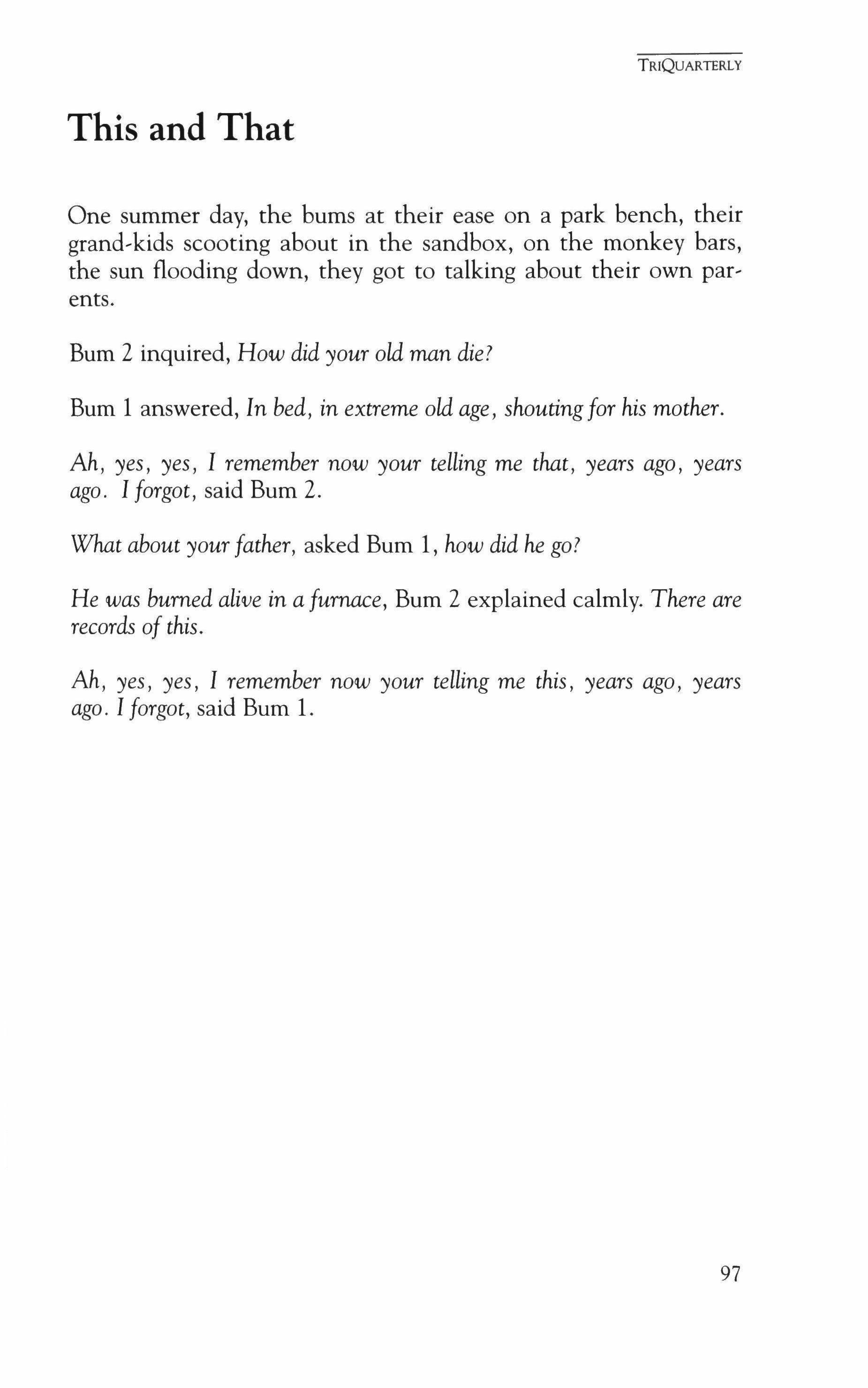
This and That
One summer day, the bums at their ease on a park bench, their grand-kids scooting about in the sandbox, on the monkey bars, the sun flooding down, they got to talking about their own par' ents.
Bum 2 inquired, How did your old man die?
Bum 1 answered, In bed, in extreme old age, shoutingfor his mother.
Ah, yes, yes, I remember now your telling me that, years ago, years ago. I forgot, said Bum 2.
What about your father, asked Bum 1, how did he go?
He was burned alive in a furnace, Bum 2 explained calmly. There are records of this.
Ah, yes, yes, I remember now your telling me this, years ago, years ago. I forgot, said Bum 1.
TRIQUARTERLY
97

The Beauty of Loneliness
Loneliness is a natural state, says Old Guy One, I believe in lone, liness beyond life, when we feel lonely among our friends it is only a presentiment of our lonely future or an aftertaste of our lonely past.
Quite right, replies Old Guy Two, and I would add that since everything except loneliness is parenthetical, a passing perturbation, then loneliness is security.
I'll go further than that, says Old Guy One, hell is a nightmare without loneliness, without calm, without consistency, therefore loneliness is our dream of paradise.
Yes, concludes Old Guy Two, too much distance or too much closeness is loneliness, that is the beauty of loneliness, and that is why loneliness is a natural state.
TRIQUARTERLY
98

The Story of the Sparrow
This is what Bum One told Bum Two as they were traveling by train from Budapest to Bucharest on their tour of East European countries.
Ahmed Souliaman, a Siberian Tartar, told the Story of the Sparrow to Vasily Michailowitch Tolmatchoff who spent twenty years in a Siberian Gulag, Tolmatchoff told the story to Tiberiu Paskuy of Roumania who spent seven years in jail where he met Mircea Cartarescu who also spent seven years in jail for having written subversive poetry, and while in jail Tiberiu told Mircea the Story of the Sparrow, in tum Mircea after he got out of jail told that story to Gezim Hadj of Albania who after having been tortured and condemned to death for refusing to kiss the feet of the President of Albania managed to escape to Roumania and there met Mircea who told him the Story of the Sparrow in a Bucharest cafe where they met and exchanged stories, eventually after wandering for eight years Gezim ended up in Czechoslovakia where one of his cousins had also escaped, and there in Prague Gezim told his cousin Peter the Story of the Sparrow who then told it to his best friend Ivo Hlavizna, a young dissident who had almost been killed by a Russian tank when the Russian tanks rolled into Prague, Ivo met Maciej Swierkocki from Lodz on a train traveling from Prague to Moscow where both were going to attend a conference on Ways to Improve Your Life in the Socialist World, and Ivo told Maciej the story of the Sparrow, and so during the conference Maciej then told the story to Jerzy Patkowski, a friend he had not seen in years because Jerzy had been in jail for twelve years for reasons which were never revealed to him, and when Jerzy whom everyone called Jurek got back home to Krakow he told the story to Andreij Slominski who during World War Two helped Jews escape from the death camps, and Andreij told the story to Namredef X a survivor of Auschwitz who many years later told me the Story of the Sparrow, and now I will tell you that story, and perhaps after you have heard it you too may want to tell it to a friend, or even to an enemy. This is THE STORY OF THE SPARROW:
TRIQUARTERLY
99
TRIQUARTERLY
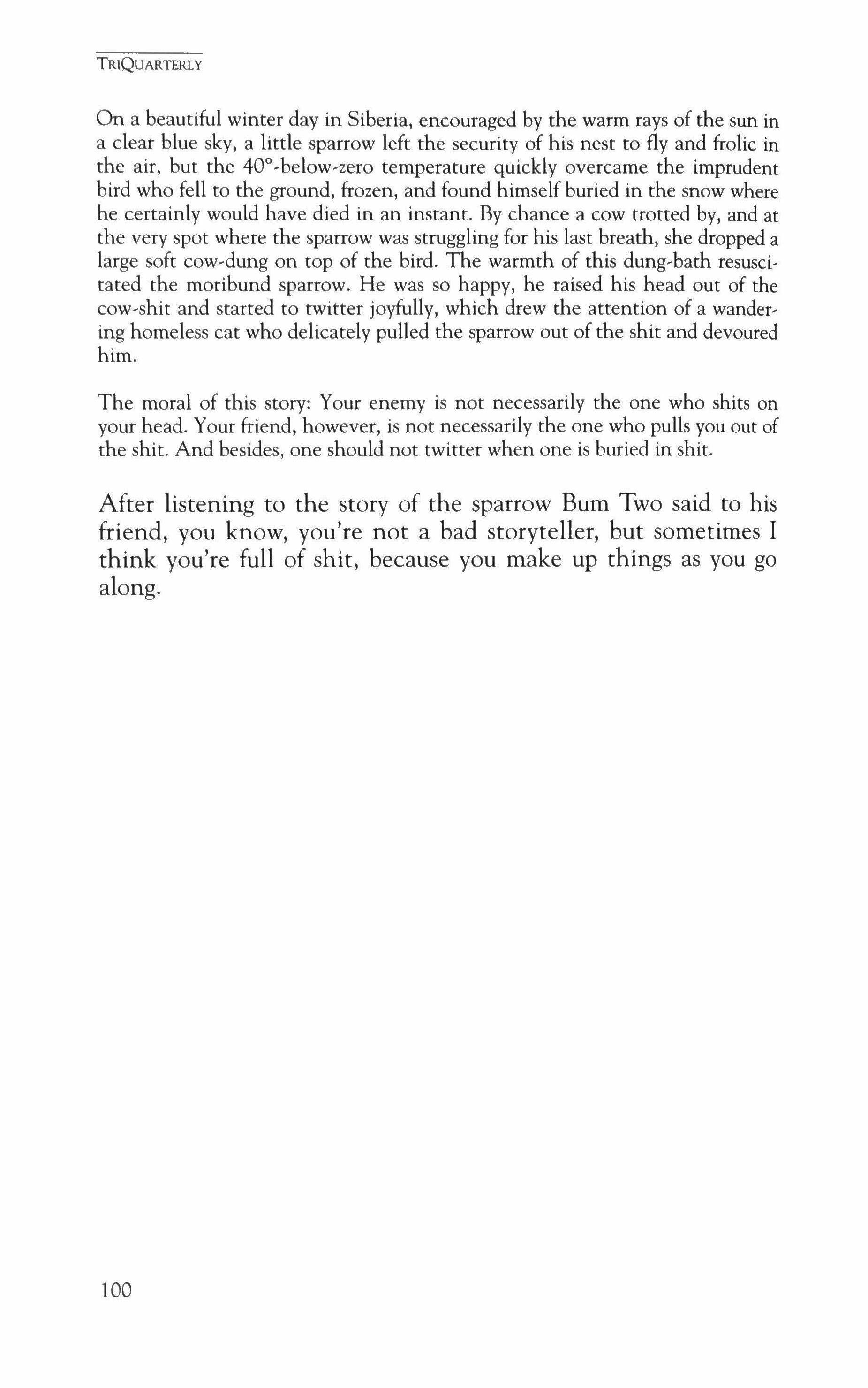
On a beautiful winter day in Siberia, encouraged by the warm rays of the sun in a clear blue sky, a little sparrow left the security of his nest to fly and frolic in the air, but the 40°-below-zero temperature quickly overcame the imprudent bird who fell to the ground, frozen, and found himself buried in the snow where he certainly would have died in an instant. By chance a cow trotted by, and at the very spot where the sparrow was struggling for his last breath, she dropped a large soft cow-dung on top of the bird. The warmth of this dung-bath resuscitated the moribund sparrow. He was so happy, he raised his head out of the cow-shit and started to twitter joyfully, which drew the attention of a wandering homeless cat who delicately pulled the sparrow out of the shit and devoured him.
The moral of this story: Your enemy is not necessarily the one who shits on your head. Your friend, however, is not necessarily the one who pulls you out of the shit. And besides, one should not twitter when one is buried in shit.
After listening to the story of the sparrow Bum Two said to his friend, you know, you're not a bad storyteller, but sometimes I think you're full of shit, because you make up things as you go along.
100

Commentaries on the Story of the Sparrow
After a long moment of reflection, while the train meandered through the Transylvanian Alps, Bum Two turned to Bum One and said:
From prehomeric times this tale has been a constant, a fate tale. One aspect of it is the good in the bad. Ullie is captured by a wild beauty while on his way home to Penny, and has no choice but to refresh himself on such fair island flesh. Another element of the story is that the operation of fate takes mere mortals off the moral hook, necessity is always the ubervirtue, if you can't be with the one you love, love the one you're with. The modern antihero Namredef X proves the point again. Left to rot in a closet with only a sack of his own shit to warm him was the true provenance of a life which was subsequently charmed to the degree that it was threatened. We now jump to the Old Testament where we learn that losing is the condition of finding. A further throw on this story is that it has been a classic of the oppressed who of all other gruppens have been sustained by its paradoxes. We don't think of Alexander the Macedonian gay commander as oppressed, but such was always the case no matter his victories. Steeped in shit, he warbled and twittered as the lead in his flagon leached into the wine. X's story, however, remains untold, fate has yet to reveal her last act to us for him. But to observe this is to affirm the particular nature of this historical parable of the sparrow, which is here to tell us that it is endless. Love the one you're with.
Bum One shook his head: and you tell me I'm full of shit.
TRIQUARTERLY
101
Winter Wheat

One day, the bums [let's call them the two old men for this occasion] went out on a familiar walk. A good mile through a stand of old oak, down the steep cut to the sixty-year-old steel bridge, its rusting structure suggesting a monument to something [we know not what]' and thence northward along the railroad tracks, in file, silently [heads bowed, eyes to the ground] into the fog collecting, rising.
Slowly along the winding deer path downward toward the tracks they went, each with a walking stick [hand-carved, it should be noted, for the sake of harmony]' in file through the dark woods, over the wet compact of [dead] leaves, late in the day, late in November [although it could have been early December]' the old men trudging along.
The smaller, slighter of the two [and older perhaps by a couple of years] first, leading, the larger one [larger not only in stature but also in posture] following, neither one a leader or a follower but rather taking up those positions naturally, as, for instance, brothers might, although in that case a competitive tension would be likely pre' sent [since brothers are usually more inclined to be enemies than friends].
In old [tattered] overcoats, hats [that of the smaller one greenish, that of the larger one brownish], and gloves [nondescript], carrying sticks fashioned rudely [by hand, as already noted, probably with a pocketknife] from windfall limbs, the old men proceeded northward [in truth, more northeastward] along the ties, both noting a band of green [the fog intensifying its green]; a passing grain car had obviously sown this field of winter wheat, now a healthy three inch-stand, thriving in the rock bed between the rails, and on the ties as well [if this notion can be maintained].
The one ahead stooped, pulled a few shoots out of the rocks, rubbed them between his fingers, then threw them down [correction: scattered them into the air].
What each man was thinking cannot be revealed [how can it be?
TRIQUARTERLY
102
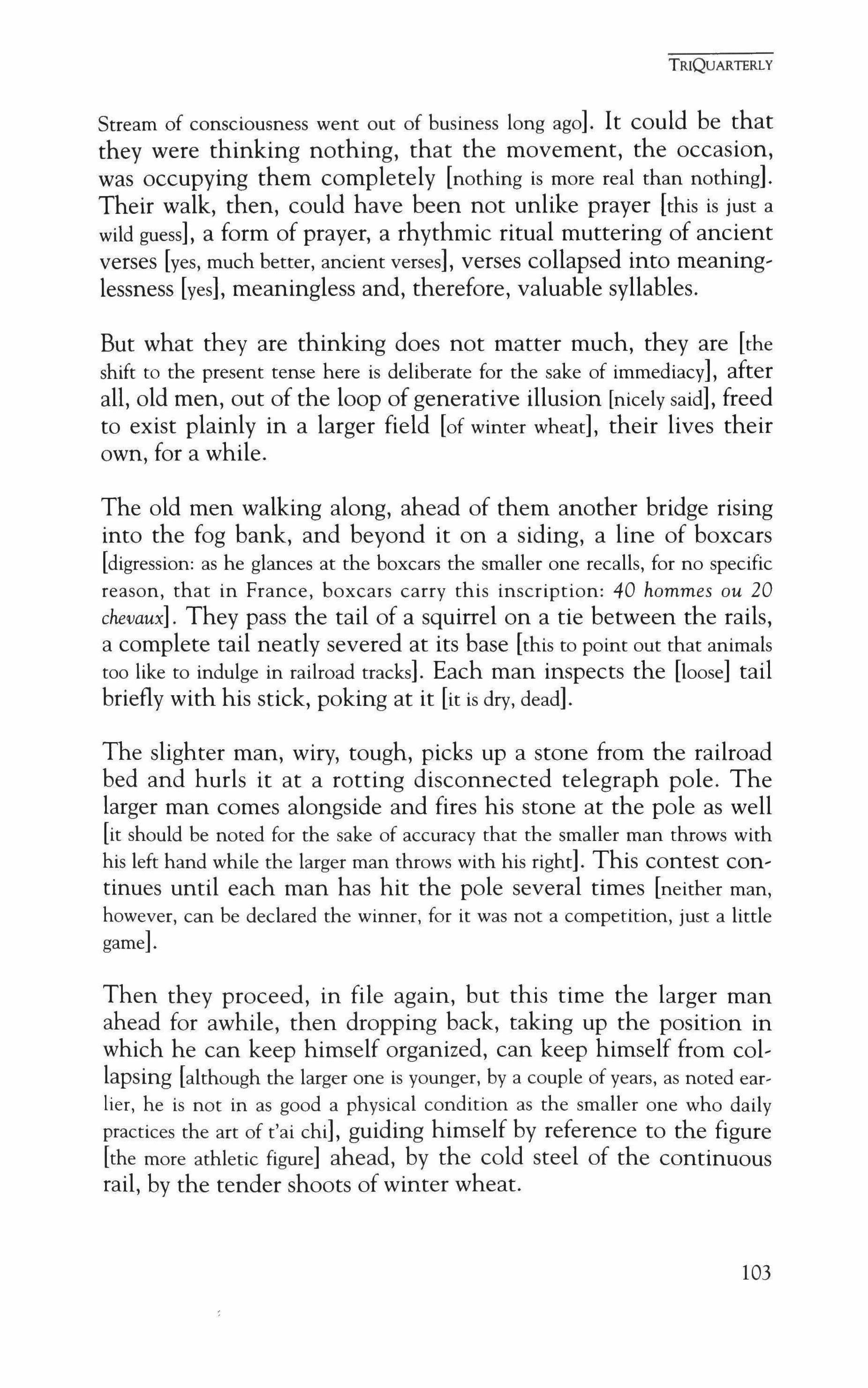
Stream of consciousness went out of business long ago]. It could be that they were thinking nothing, that the movement, the occasion, was occupying them completely [nothing is more real than nothing]. Their walk, then, could have been not unlike prayer [this is just a wild guess], a form of prayer, a rhythmic ritual muttering of ancient verses [yes, much better, ancient verses], verses collapsed into meaninglessness [yes], meaningless and, therefore, valuable syllables.
But what they are thinking does not matter much, they are [the shift to the present tense here is deliberate for the sake of immediacy], after all, old men, out of the loop of generative illusion [nicely said], freed to exist plainly in a larger field [of winter wheat], their lives their own, for a while.
The old men walking along, ahead of them another bridge rising into the fog bank, and beyond it on a siding, a line of boxcars [digression: as he glances at the boxcars the smaller one recalls, for no specific reason, that in France, boxcars carry this inscription: 40 hammes au 20 chevaux]. They pass the tail of a squirrel on a tie between the rails, a complete tail neatly severed at its base [this to point out that animals too like to indulge in railroad tracks]. Each man inspects the [loose] tail briefly with his stick, poking at it [it is dry, dead].
The slighter man, wiry, tough, picks up a stone from the railroad bed and hurls it at a rotting disconnected telegraph pole. The larger man comes alongside and fires his stone at the pole as well [it should be noted for the sake of accuracy that the smaller man throws with his left hand while the larger man throws with his right]. This contest continues until each man has hit the pole several times [neither man, however, can be declared the winner, for it was not a competition, just a little game].
Then they proceed, in file again, but this time the larger man ahead for awhile, then dropping back, taking up the position in which he can keep himself organized, can keep himself from collapsing [although the larger one is younger, by a couple of years, as noted earlier, he is not in as good a physical condition as the smaller one who daily practices the art of t'ai chi], guiding himself by reference to the figure [the more athletic figure] ahead, by the cold steel of the continuous rail, by the tender shoots of winter wheat.
TRIQUARTERLY
103
TRIQUARTERLY
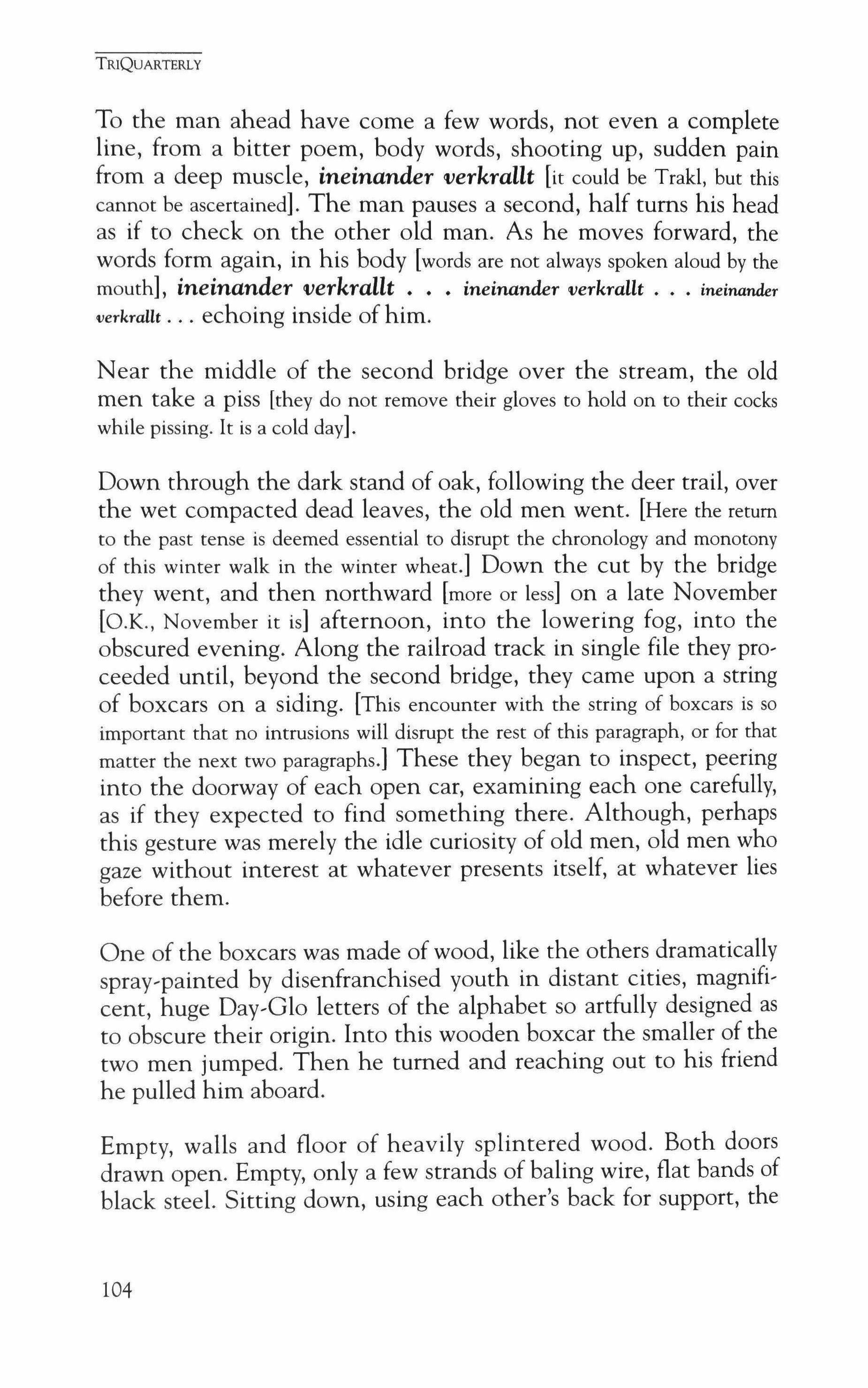
To the man ahead have come a few words, not even a complete line, from a bitter poem, body words, shooting up, sudden pain from a deep muscle, ineinander verkrallt [it could be Trakl, but this cannot be ascertained]. The man pauses a second, half turns his head as if to check on the other old man. As he moves forward, the words form again, in his body [words are not always spoken aloud by the mouth}, ineinander verkrallt ineinander verkraUt ineinander verkrallt echoing inside of him.
Near the middle of the second bridge over the stream, the old men take a piss [they do not remove their gloves to hold on to their cocks while pissing. It is a cold day].
Down through the dark stand of oak, following the deer trail, over the wet compacted dead leaves, the old men went. [Here the return to the past tense is deemed essential to disrupt the chronology and monotony of this winter walk in the winter wheat.] Down the cut by the bridge they went, and then northward [more or less] on a late November [O.K., November it is] afternoon, into the lowering fog, into the obscured evening. Along the railroad track in single file they pro' ceeded until, beyond the second bridge, they came upon a string of boxcars on a siding. [This encounter with the string of boxcars is so important that no intrusions will disrupt the rest of this paragraph, or for that matter the next two paragraphs.] These they began to inspect, peering into the doorway of each open car, examining each one carefully, as if they expected to find something there. Although, perhaps this gesture was merely the idle curiosity of old men, old men who gaze without interest at whatever presents itself, at whatever lies before them.
One of the boxcars was made of wood, like the others dramatically spray-painted by disenfranchised youth in distant cities, magnificent, huge Dav-Glo letters of the alphabet so artfully designed as to obscure their origin. Into this wooden boxcar the smaller of the two men jumped. Then he turned and reaching out to his friend he pulled him aboard.
Empty, walls and floor of heavily splintered wood. Both doors drawn open. Empty, only a few strands of baling wire, flat bands of black steel. Sitting down, using each other's back for support, the
104

men took up position. The one facing the west door, the other the east.
Here they sat in silence for a long time, for an unusually long time [intrusion: it is difficult to establish how long an unusually long time is]. Here they sat relaxed, quietly, not moving. Inwardly, as children sit in a kitchen near their mother-with mother, as she prepares supper. Here they sat back to back [in silence, except for the sound of their breathing], the fog gathering, lowering, weaving through the boxcar, inhabiting the space with the old men.
On a rail nearby paused a red-tailed fox, one paw on the rail, the other hovering, as if feeling something, alert to the presence of the old men, its nostrils in attentive quiver, its big bushy tail tense, still.
By pure blind association, since from where he sat he could not possibly see the fox on the railroad track, a few words of a fable [he once knew by heart] surged in the smaller man's body: Un vieux Renard, mais des plus fins •.. Fut enfin au piege attrappe.
The larger man must have felt in his body that something was speaking inside his friend. He did not say anything, but with his back he pressed a bit harder on his friend's back.
Before they jumped down to the railroad bed, the old men tried to decipher [their one communal act on that day, except for the deliberate pressure of the back of the one against the other] the remnants of words cut into the wood at one end of the boxcar. The closed curve of a T or perhaps an E, the angle of an L or a B.
Strange how long they inspected the few bits of words cut into the wood, bits of letters, bits of exclamation. [No, there was no carving of a heart pierced by an arrow, only letters, remnants of words.] Standing at the wall [squinting] in the act of study, the old men inspected, much longer than by any compass seemed necessary.
Then the old men climbed out of the car and retraced their steps, back to the place where they had begun [up the hill], walking in file, as before, the fog steady, unchanged, the wind still, things
TRIQUARTERLY
105

much as they were [earlier, during the descent]. Along the green ribbon of winter wheat glowing between the rails, over the first bridge, then up the steeply cut embankment [the old men puffing a little now] to the deer path winding through some woods.
Then along this path, over the soft wet compacted [dead] leaves, and then, from the valley came the burgeoning blunt sound of diesel engines pulling a heavy load, diesel engines hard at work, that deep powerful throbbing strain of diesel engines [the old men could smell the burning diesel oil]. That first, then that, accompanied by the sound of rolling stock, of steel wheels on the steel tracks.
Impoverished ironies stretch endless as continuously forged steel rails back and forth, hin und her, back into time and through time to nothing and beyond that place to nothing more, and to here, here to this empty text [full of intrusions], and then to more, forever ineinander verkrallt enfin au piege attrappe.
TRIQUARTERLY
106

Making a Distinction
The two displaced bums are having a friendly discussion about what exactly a Schlemiel is, a name they often call each other.
Displaced Bum One gives this definition: A Schlemiel is someone who breaks his thumb in his vest pocket.
That's not a Schlemiel, exclaims D. B. Two, that's a Schlimazel! A Schlemiel, he goes on to explain, is someone who falls on his back and breaks his nose.
TRIQUARTERLY
J) 107
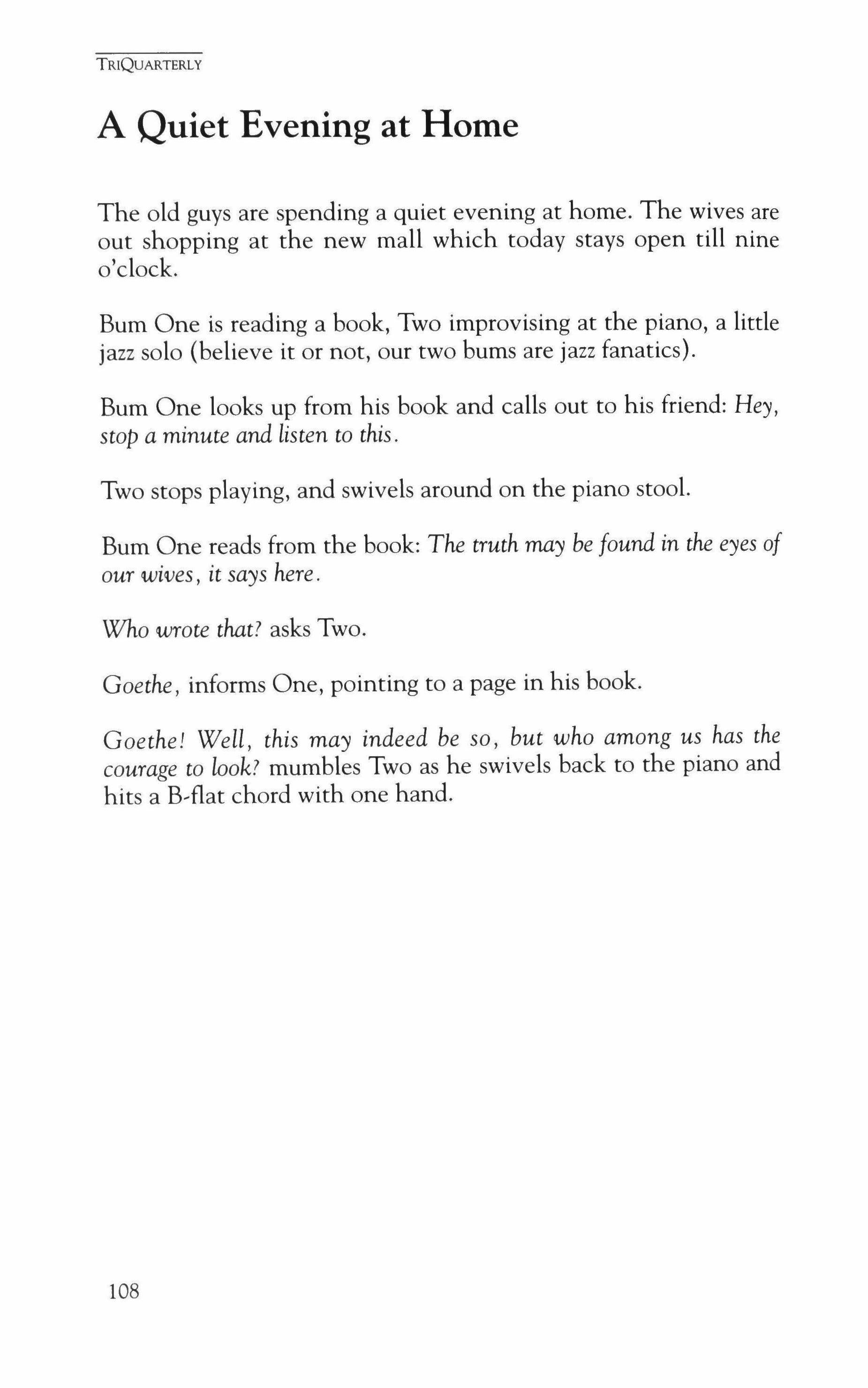
A Quiet Evening at Home
The old guys are spending a quiet evening at home. The wives are out shopping at the new mall which today stays open till nine o'clock.
Bum One is reading a book, Two improvising at the piano, a little jazz solo (believe it or not, our two bums are jazz fanatics).
Bum One looks up from his book and calls out to his friend: Hey, stop a minute and listen to this.
Two stops playing, and swivels around on the piano stool.
Bum One reads from the book: The truth may be found in the eyes of our wives, it says here.
Who wrote that? asks Two.
Goethe, informs One, pointing to a page in his book.
Goethe! Well, this may indeed be so, but who among us has the courage to look? mumbles Two as he swivels back to the piano and hits a B�flat chord with one hand.
TRIQUARTERLY
108
Lucretian
Peter Reading

When men were oppressed by the gods, scared shitless by superstition, Epicurus, empiricist hero, first took a cool look at religion, boldly concluded, "Balderdash!" He wasn't impressed by the twaddle of sky-pilots-c-thunder and lightning, he knew, was Physics not Zeus. In his mind he meandered the cosmos, came back triumphant to tell us what can and cannot exist, and the limits of natural phenomena. So he trampled the trite old trash underfoot, and raised our status.
Religio-rnagico-malice->remember the slaughter at Aulis when innocent Iphigenia was sacrificed by her own father, deluded devout Agamemnon, who thought that to summon a breeze which would speed his fleet to Troy he must first placate bloodthirsty Artemis with a welter of gore and guts
TR1QUARTERLY
109
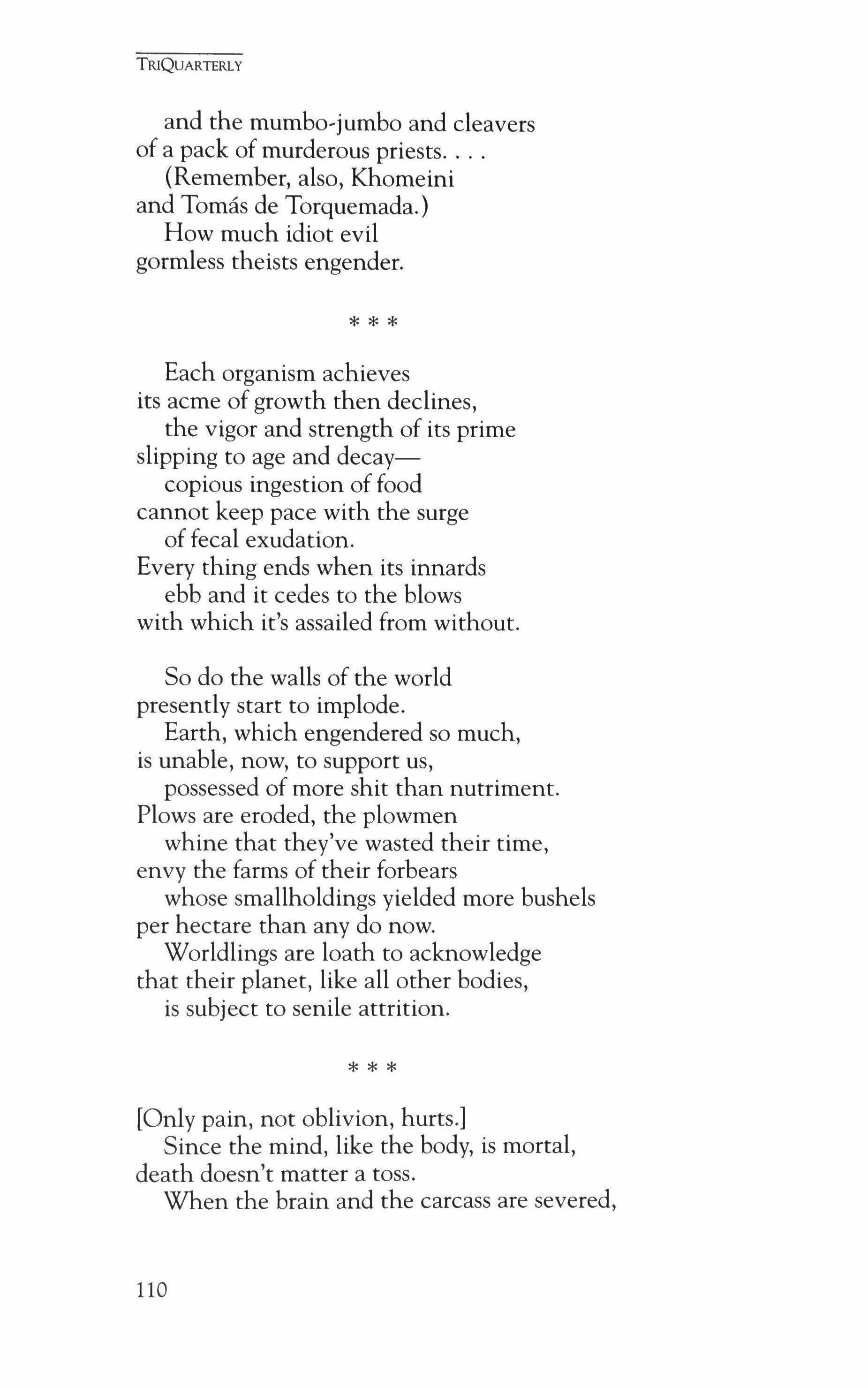
and the mumbo-jumbo and cleavers of a pack of murderous priests (Remember, also, Khomeini and Tomas de Torquemada.)
How much idiot evil gormless theists engender.
* * *
Each organism achieves its acme of growth then declines, the vigor and strength of its prime slipping to age and decaycopious ingestion of food cannot keep pace with the surge of fecal exudation. Every thing ends when its innards ebb and it cedes to the blows with which it's assailed from without.
So do the walls of the world presently start to implode. Earth, which engendered so much, is unable, now, to support us, possessed of more shit than nutriment. Plows are eroded, the plowmen whine that they've wasted their time, envy the farms of their forbears whose smallholdings yielded more bushels per hectare than any do now.
Worldlings are loath to acknowledge that their planet, like all other bodies, is subject to senile attrition. * * *
[Only pain, not oblivion, hurts.]
Since the mind, like the body, is mortal, death doesn't matter a toss. When the brain and the carcass are severed,
TRIQUARTERLY
110
we, who shall then be nothing, can be troubled by nothing at all.
If we have ever existed in any previous state, we now know nothing about it; so, when we snuff it, we won't feel deprived of the present.
If, after death, there were dearth, then the mind would have to be present to experience deprivation; but death, which denies the existence of thought, exempts us from this.
One who no longer is can't suffer-is merely the same as one who has never been.
In sleep, neither mind nor body feels itself "absent" or craves life. Extend this repose to etemityno sense of loss can obtain.
Prolonging life doesn't reduce the duration of death, for the time after departure is infinitenon-being lasts just as long for those who expire today as it does for defunct Eolithics.

Consider earth, ocean and sky, matter so diverse in natureall, in one day, will expire. Our planet, its structure and substance, 4,600 million years old, in a day will collapse.
TRIQUARTERLY
* * *
111
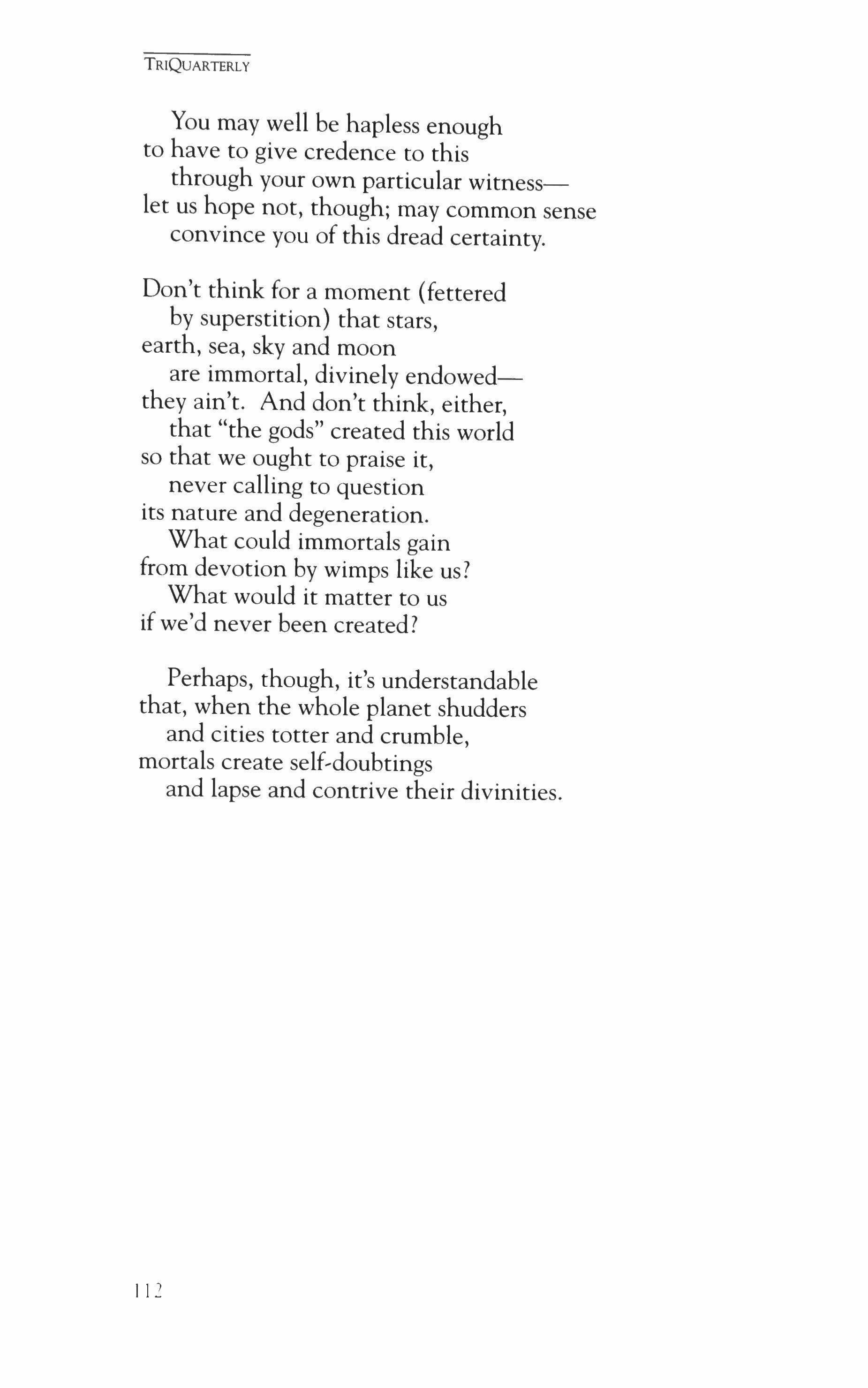
You may well be hapless enough to have to give credence to this through your own particular witnesslet us hope not, though; may common sense convince you of this dread certainty.
Don't think for a moment (fettered by superstition) that stars, earth, sea, sky and moon are immortal, divinely endowedthey ain't. And don't think, either, that "the gods" created this world so that we ought to praise it, never calling to question its nature and degeneration. What could immortals gain from devotion by wimps like us? What would it matter to us if we'd never been created?
Perhaps, though, it's understandable that, when the whole planet shudders and cities totter and crumble, mortals create self-doubtings and lapse and contrive their divinities.
TRIQUARTERLY
I 12
Two Poems
Sterling Plumpp
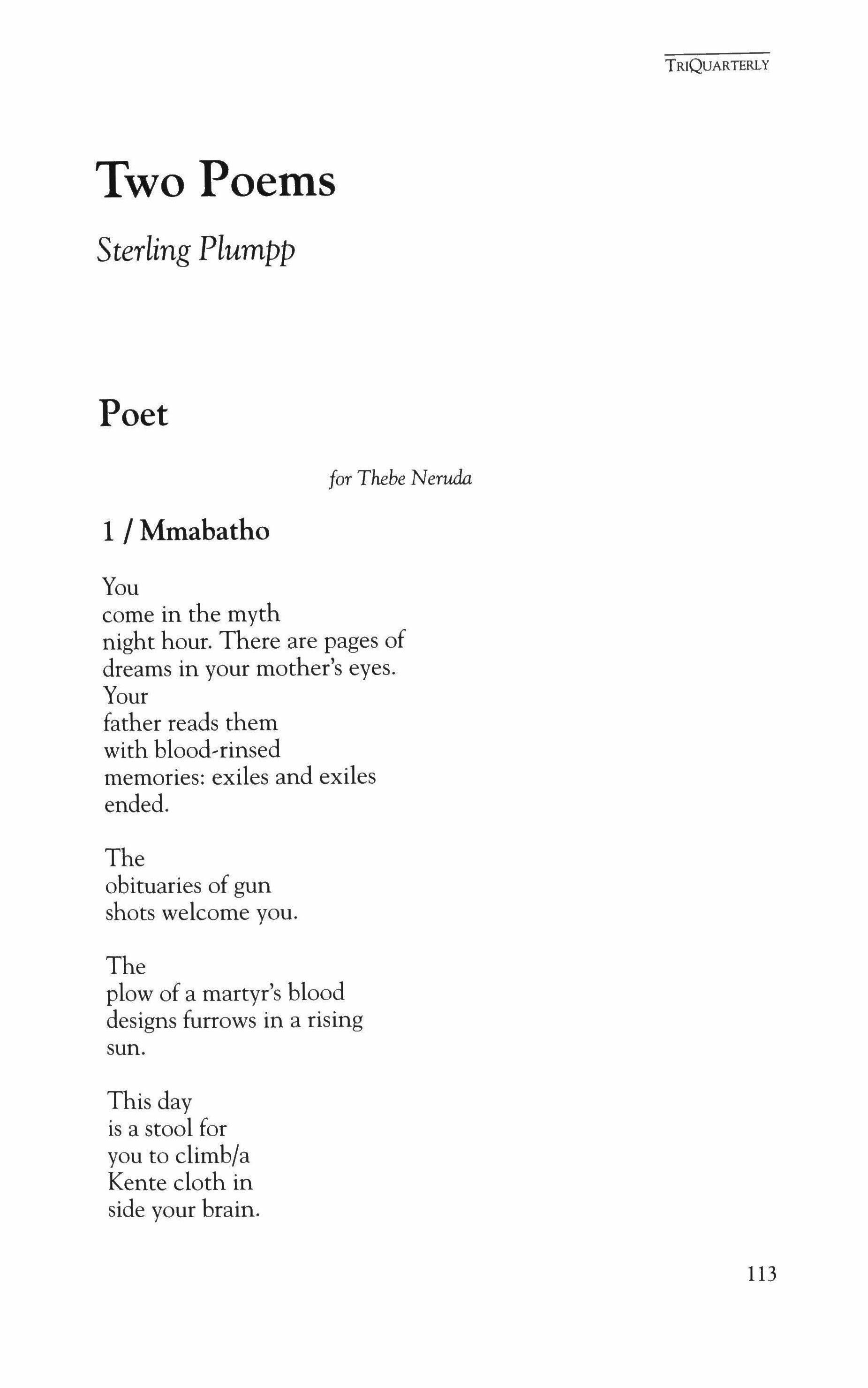
Poet
for Thebe NenAlla
l/Mmabatho
You come in the myth night hour. There are pages of dreams in your mother's eyes. Your father reads them with blood-rinsed memories: exiles and exiles ended.
The obituaries of gun shots welcome you.
The plow of a martyr's blood designs furrows in a rising sun.
This day is a stool for you to climb/a Kente cloth in side your brain.
TRIQUARTERLY
113

2 / Johannesburg Shell
There are no crabs in side/here. No softness commingled/with leisured strides. No squinting eyes. No tentacles of bone. This is a place of steel. Here. Spears crumble/fall like the home lands. This is the New Age. This is the cross roads instructed properly. This is the day/you named after. The poet's tough tale scaling history. To give Chile Allende's peopled vision. Words are bullets here. Words are periods here. This is the end/of a sentence.
3 /New Day
Hector Petersen's spirit will use Modibo's pen to sign the new constitution. Soweto's children wrote it with MK ink. They used Sach's blown away arm as quill. Then Hani's spirit ignites flames for the ceremonial 114
TRIQUARTERLY
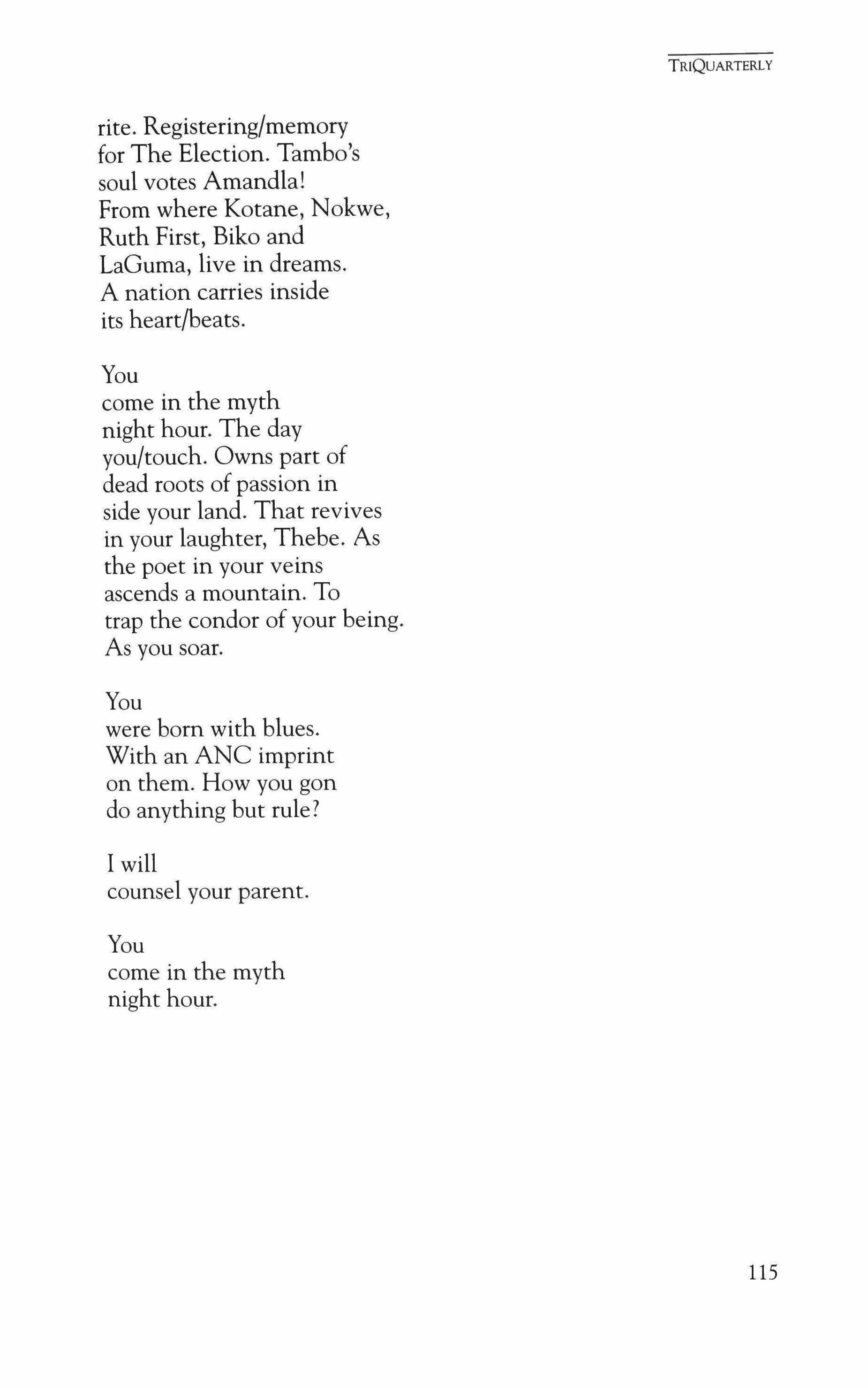
rite. Registering/memory for The Election. Tambo's soul votes Amandla!
From where Kotane, Nokwe, Ruth First, Biko and LaGuma, live in dreams. A nation carries inside its heart/beats.
You come in the myth night hour. The day you/touch. Owns part of dead roots of passion in side your land. That revives in your laughter, Thebe. As the poet in your veins ascends a mountain. To trap the condor of your being. As you soar.
You were born with blues. With an ANC imprint on them. How you gon do anything but rule?
I will counsel your parent.
You come in the myth night hour.
TRIQUARTERLY
115
When the Spirit Spray-Paints the Sky
for Moagi J 1994
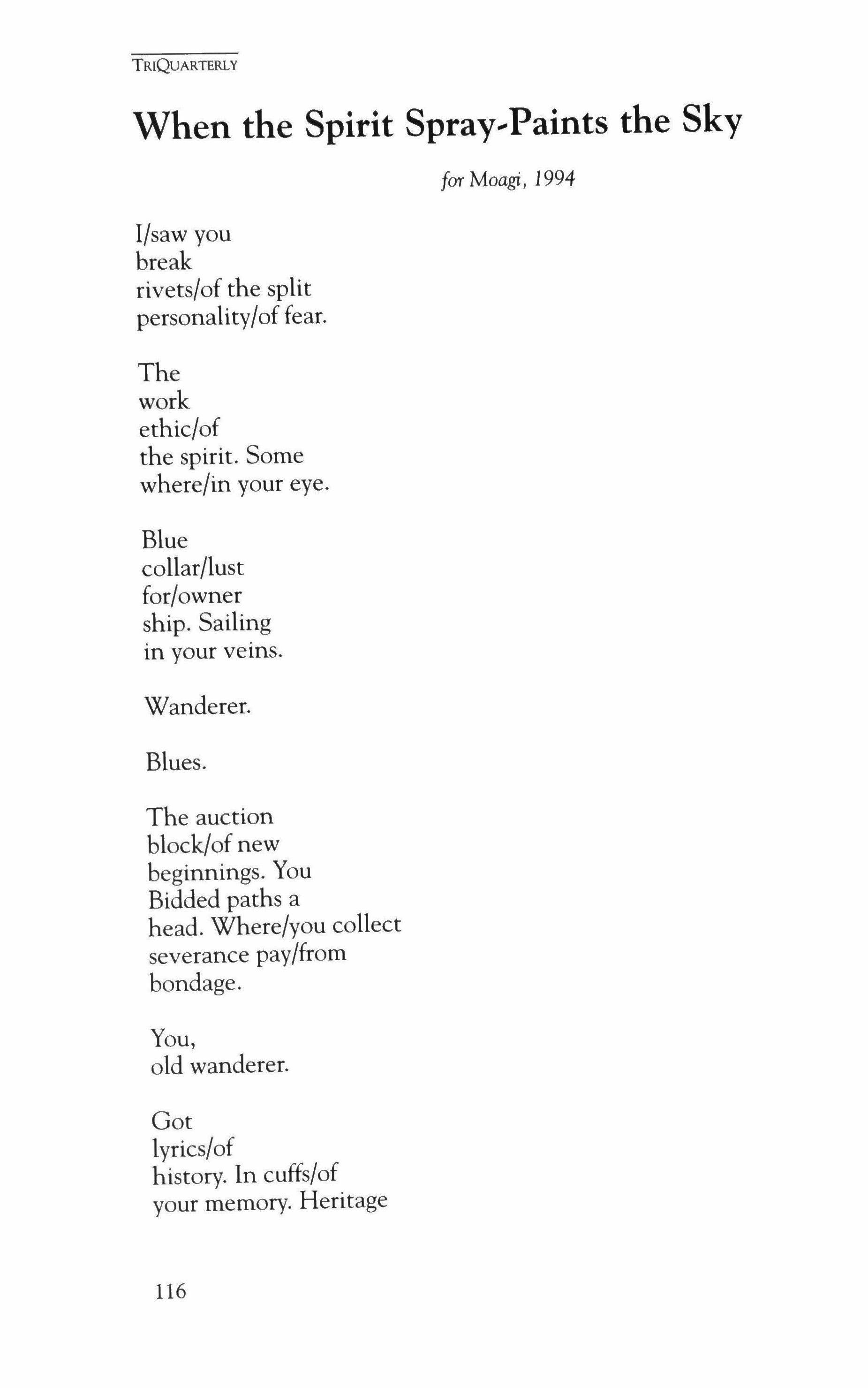
I/saw you break rivets/of the split personality/offear. The work ethic/of the spirit. Some where/in your eye.
Blue collar/lust for/owner ship. Sailing in your veins.
Wanderer. Blues. The auction block/of new beginnings. You Bidded paths a head. Where/you collect severance pay/from bondage.
You, old wanderer. Got lyrics/of history. In cuffs/of your memory. Heritage
TRIQUARTERLY
116

is/an opening in/your laughter. Where half/your wives reside. Forlorn/moons greet you/with Dvnatural mornings/on crutches. Where/night has a broken arm/swearing.
l/declare. Silence weaves/your yester days/in to a tortured/load. Covering your head.
l/be dog gone/if your dance ain't a gathering/place Where/you spray paint/the sky.
Say.
l/sell blues/to its walking shoes.
Say. l/peddle things/the spirit can not/lose.
Say.
l/got a Monday half/price Tuesday/ten cents off. Wednesday/for
TRIQUARTERLY
117
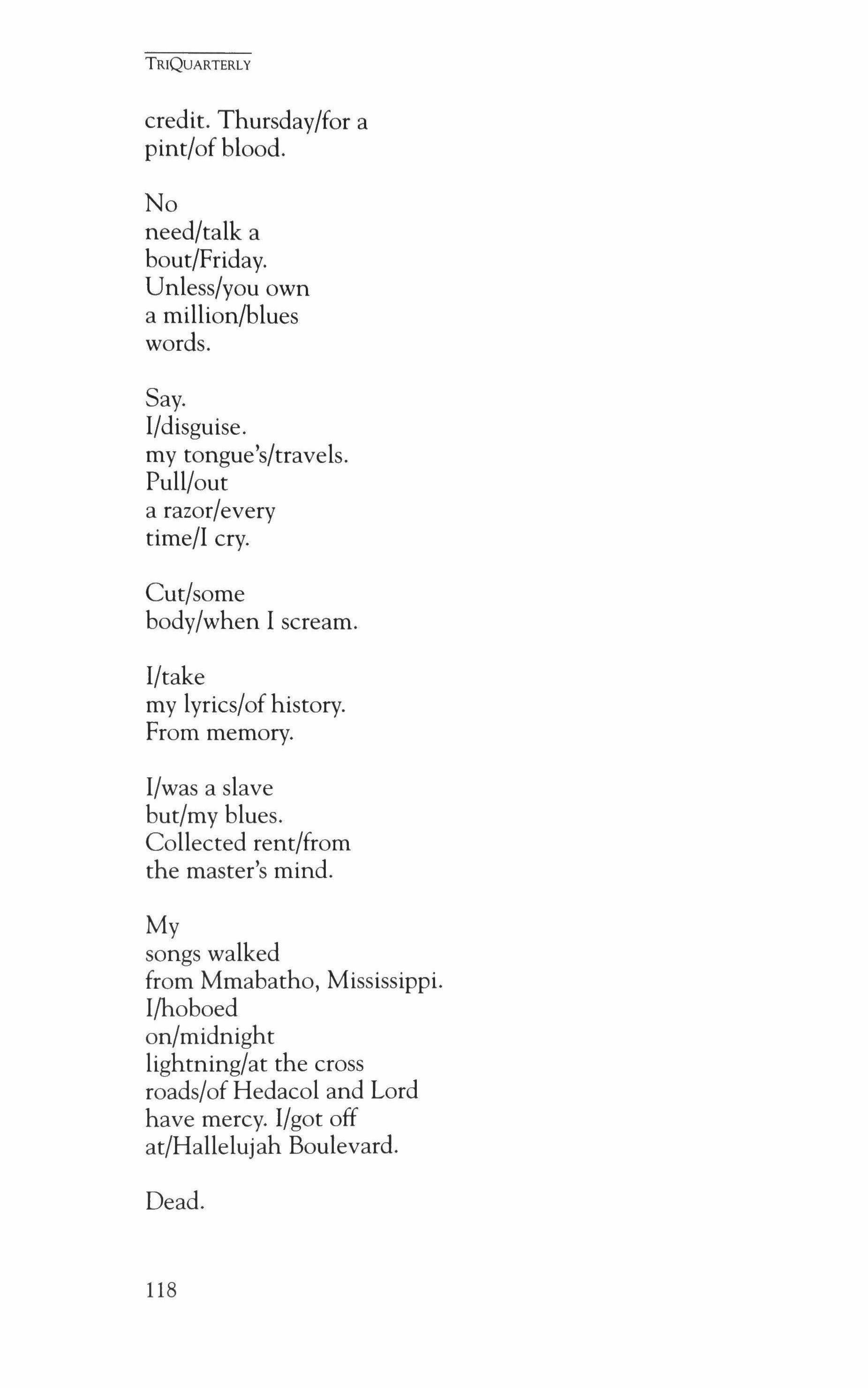
credit. Thursday/for a pint/of blood.
No need/talk a bout/Friday. Unless/you own a million/blues words.
Say. I/disguise. my tongue's/travels. Pull/out a razor/every time/I cry.
Cut/some body/when I scream.
I/take my lyrics/ofhistory. From memory.
I/was a slave but/my blues. Collected rent/from the master's mind.
My songs walked from Mmabatho, Mississippi. I/hoboed on/midnight lightning/at the cross roads/of Hedacol and Lord have mercy. I/gor off at/Hallelujah Boulevard.
Dead.
TRIQUARTERLY
118
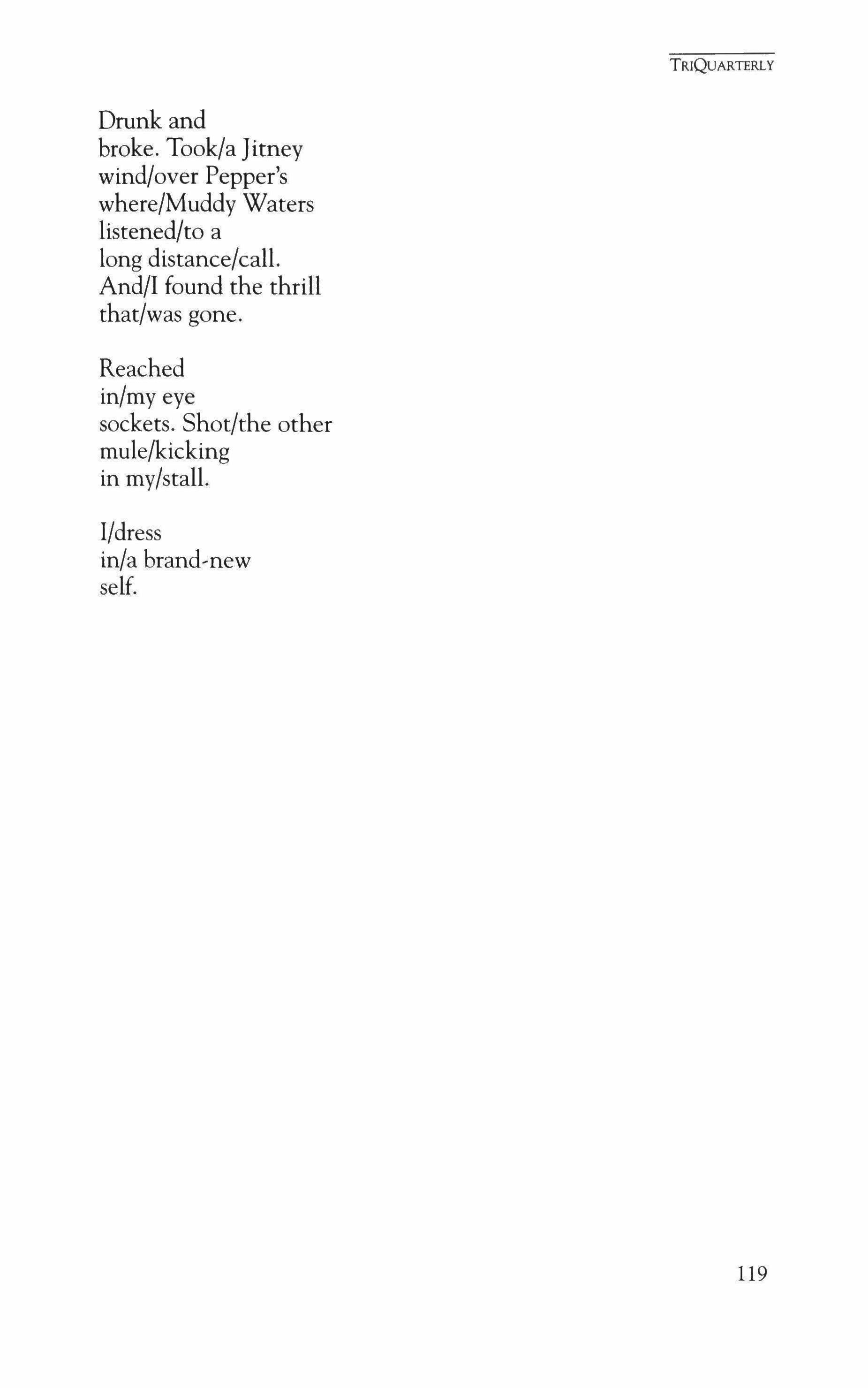
Drunk and broke. Took/a Jitney wind/over Pepper's where/Muddy Waters listened/to a long distance/call. And/I found the thrill that/was gone. Reached in/my eye sockets. Shot/the other mule/kicking in my/stall.
I/dress in/a brand-new self.
TRIQUARTERLY
119
Bluejays
Don Stap

For a long time I lay sleepless listening to the hounds of Tuskawilla kennels saw the night in two, and once when I opened my eyes, ready to give up I saw an upside-down quarter moon hanging above me.
Half an hour before sunrise
I heard a sound like the creaky swingset I once rode into the pale blue high above the schoolyard a thousand miles from here, 120
TRIQUARTERLY
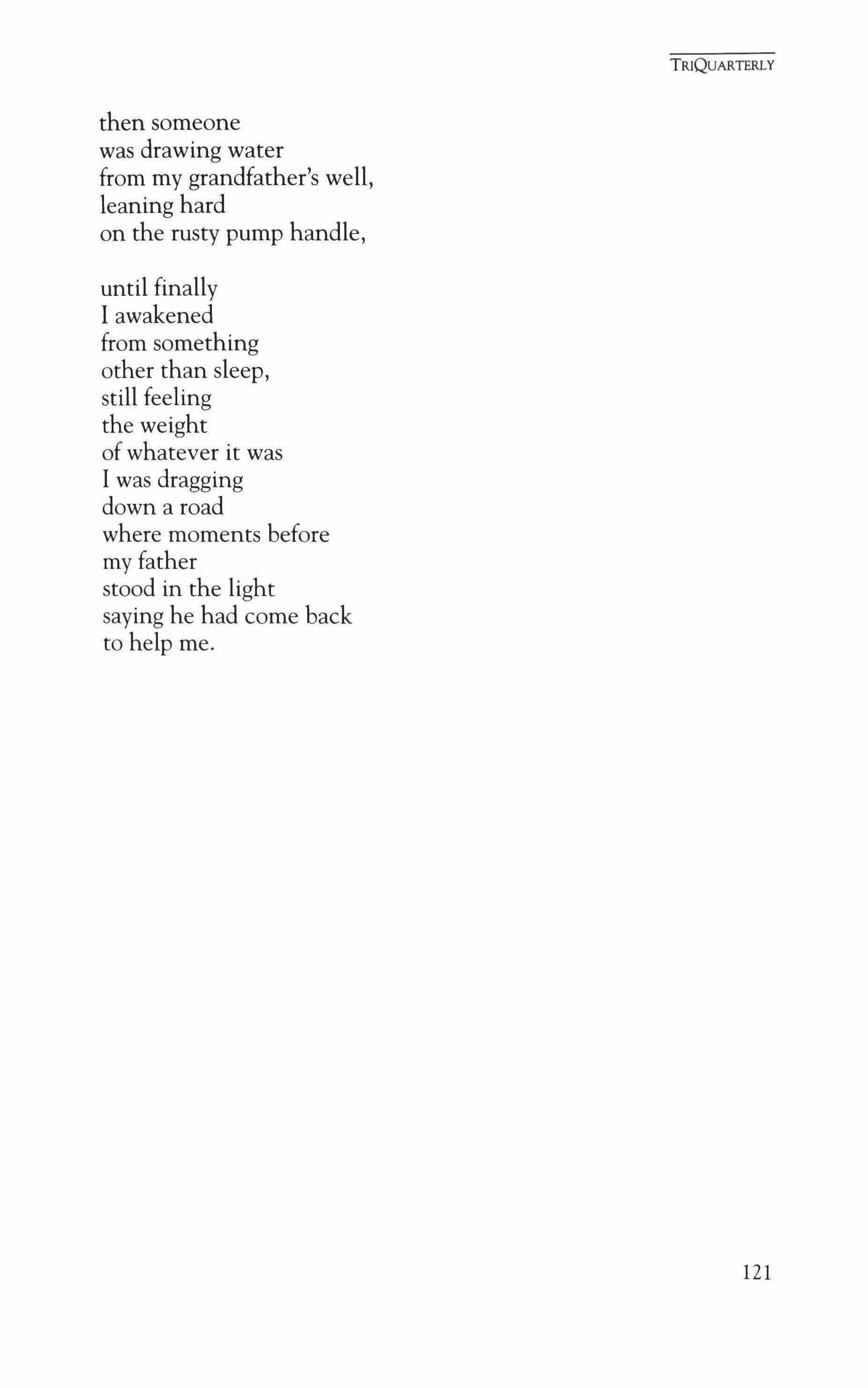
then someone was drawing water from my grandfather's well, leaning hard on the rusty pump handle, until finally I awakened from something other than sleep, still feeling the weight of whatever it was I was dragging down a road where moments before my father stood in the light saying he had come back to help me.
TRiQUARTERLY
121
Three Poems
Renate Wood Black Hat
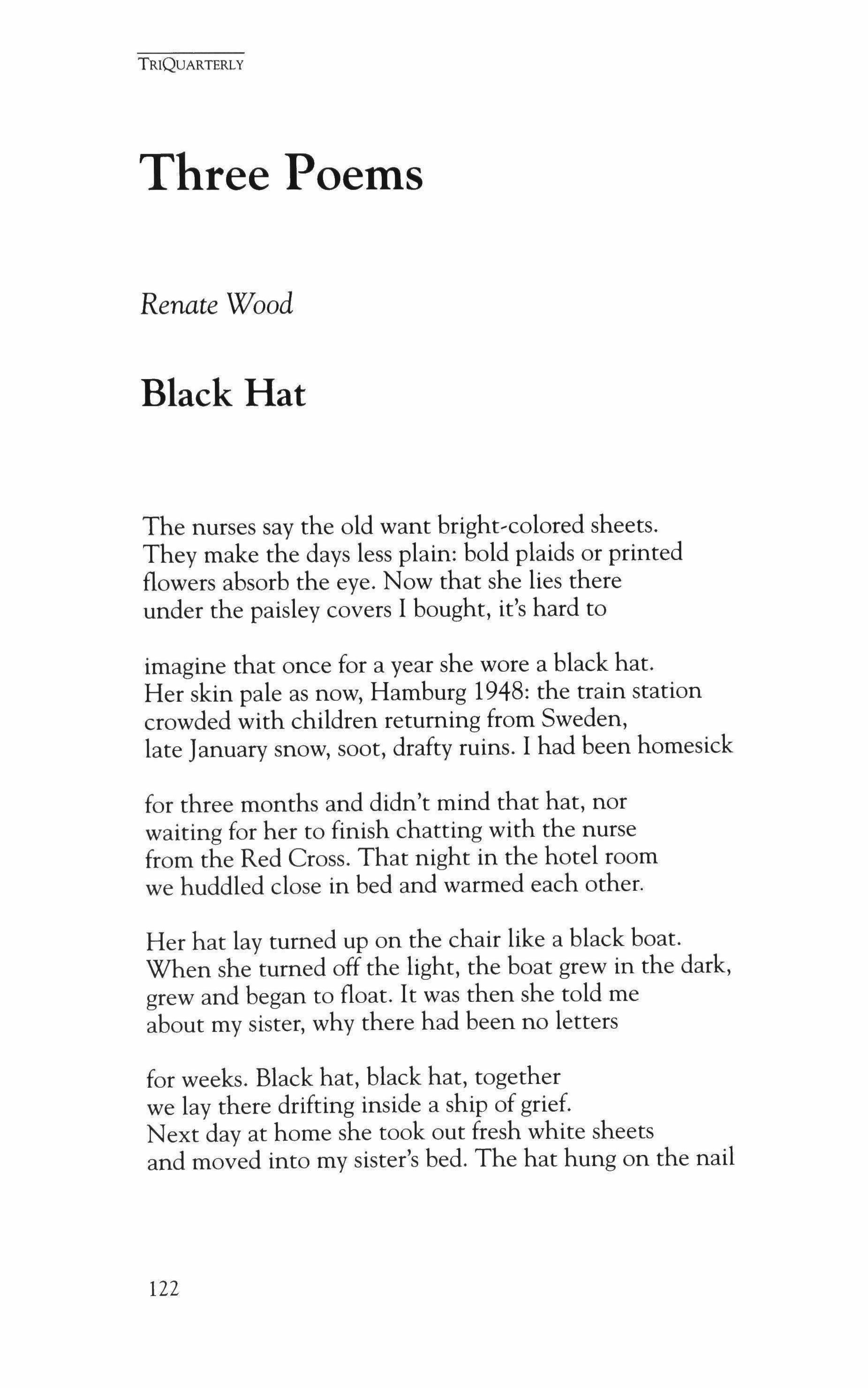
The nurses say the old want bright-colored sheets. They make the days less plain: bold plaids or printed flowers absorb the eye. Now that she lies there under the paisley covers I bought, it's hard to imagine that once for a year she wore a black hat. Her skin pale as now, Hamburg 1948: the train station crowded with children returning from Sweden, late January snow, soot, drafty ruins. I had been homesick for three months and didn't mind that hat, nor waiting for her to finish chatting with the nurse from the Red Cross. That night in the hotel room we huddled close in bed and warmed each other. Her hat lay turned up on the chair like a black boat. When she turned off the light, the boat grew in the dark, grew and began to float. It was then she told me about my sister, why there had been no letters for weeks. Black hat, black hat, together we lay there drifting inside a ship of grief. Next day at home she took out fresh white sheets and moved into my sister's bed. The hat hung on the nail
TRIQUARTERLY
122
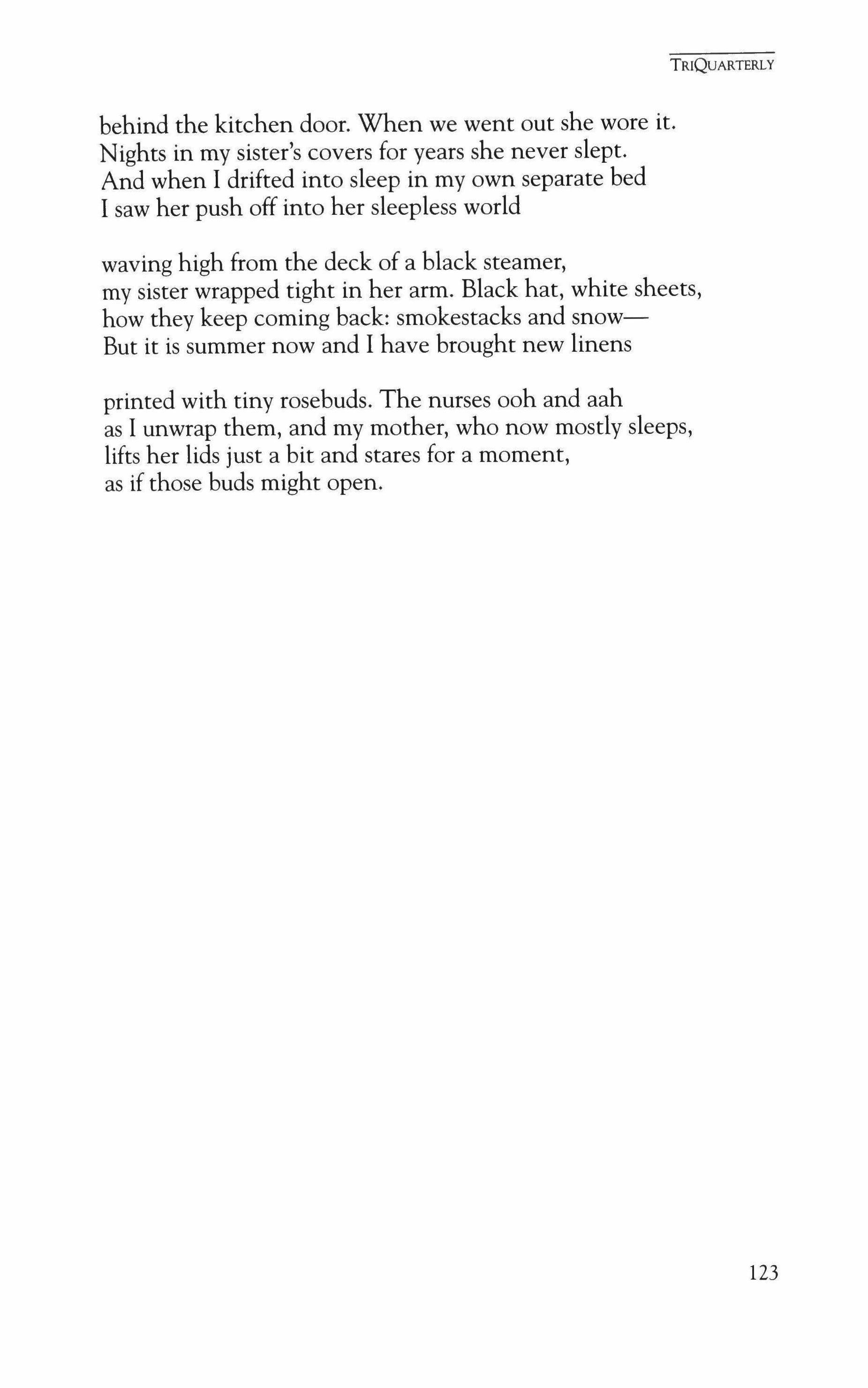
behind the kitchen door. When we went out she wore it. Nights in my sister's covers for years she never slept. And when I drifted into sleep in my own separate bed I saw her push off into her sleepless world
waving high from the deck of a black steamer, my sister wrapped tight in her arm. Black hat, white sheets, how they keep coming back: smokestacks and snowBut it is summer now and I have brought new linens
printed with tiny rosebuds. The nurses ooh and aah as I unwrap them, and my mother, who now mostly sleeps, lifts her lids just a bit and stares for a moment, as if those buds might open.
TRIQUARTERLY
123
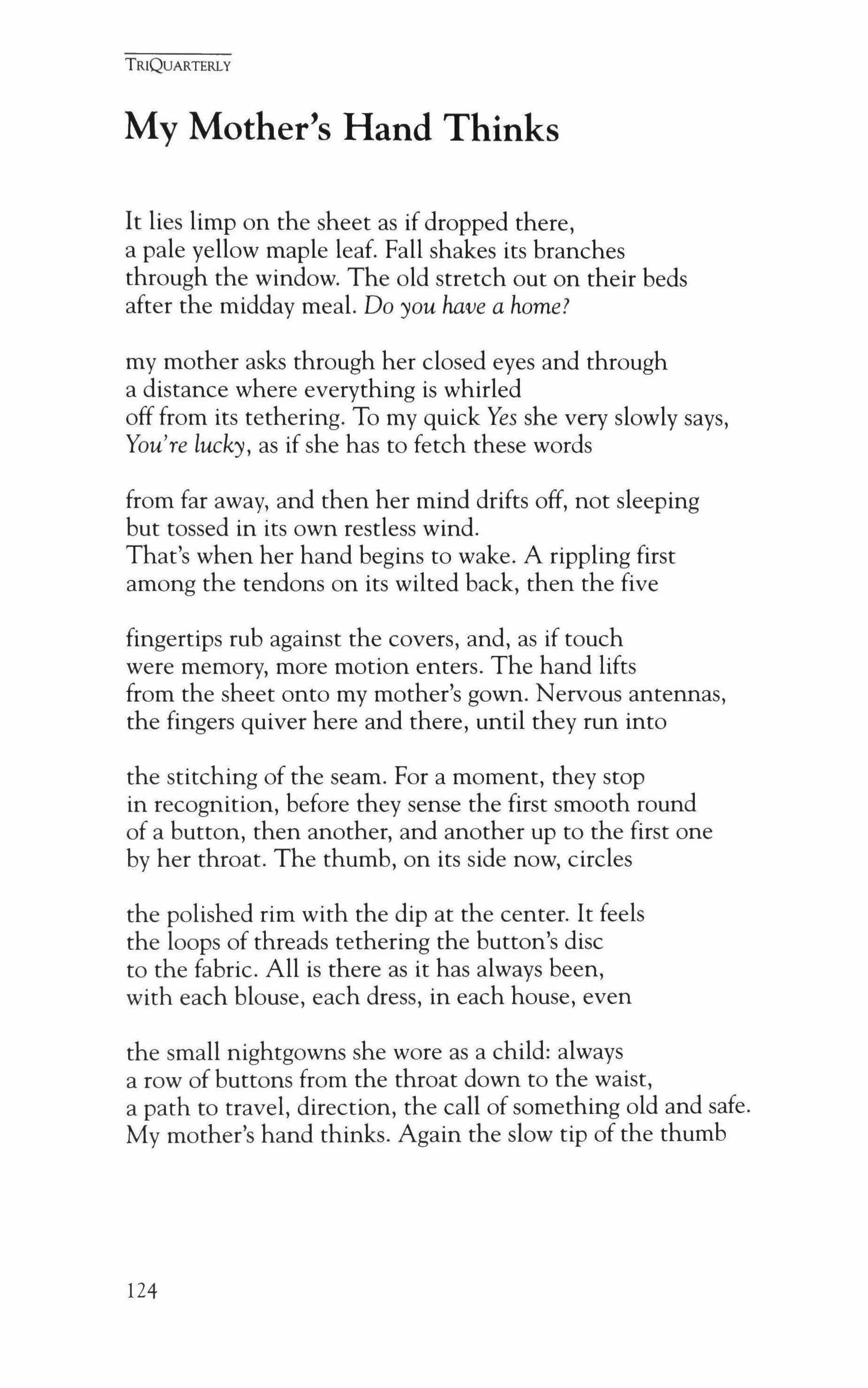
My Mother's Hand Thinks
It lies limp on the sheet as if dropped there, a pale yellow maple leaf. Fall shakes its branches through the window. The old stretch out on their beds after the midday meal. Do you have a home?
my mother asks through her closed eyes and through a distance where everything is whirled off from its tethering. To my quick Yes she very slowly says, You're lucky, as if she has to fetch these words from far away, and then her mind drifts off, not sleeping but tossed in its own restless wind. That's when her hand begins to wake. A rippling first among the tendons on its wilted back, then the five fingertips rub against the covers, and, as if touch were memory, more motion enters. The hand lifts from the sheet onto my mother's gown. Nervous antennas, the fingers quiver here and there, until they run into
the stitching of the seam. For a moment, they stop in recognition, before they sense the first smooth round of a button, then another, and another up to the first one by her throat. The thumb, on its side now, circles
the polished rim with the dip at the center. It feels the loops of threads tethering the button's disc to the fabric. All is there as it has always been, with each blouse, each dress, in each house, even the small nightgowns she wore as a child: always a row of buttons from the throat down to the waist, a path to travel, direction, the call of something old and safe. My mother's hand thinks. Again the slow tip of the thumb
TRIQUARTERLY
124
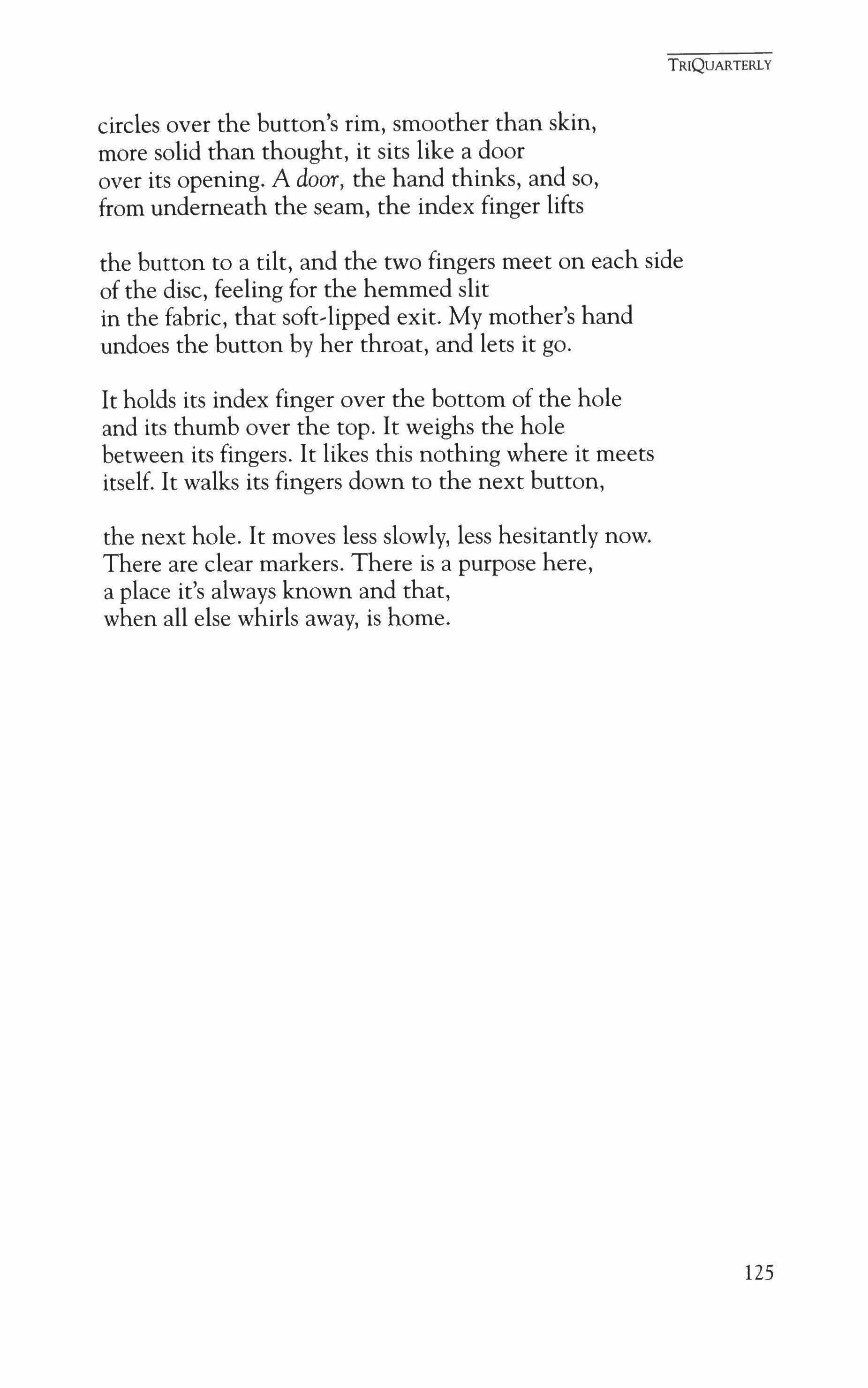
circles over the button's rim, smoother than skin, more solid than thought, it sits like a door over its opening. A door, the hand thinks, and so, from underneath the seam, the index finger lifts
the button to a tilt, and the two fingers meet on each side of the disc, feeling for the hemmed slit in the fabric, that soft-lipped exit. My mother's hand undoes the button by her throat, and lets it go.
It holds its index finger over the bottom of the hole and its thumb over the top. It weighs the hole between its fingers. It likes this nothing where it meets itself. It walks its fingers down to the next button,
the next hole. It moves less slowly, less hesitantly now. There are clear markers. There is a purpose here, a place it's always known and that, when all else whirls away, is home.
TRIQUARTERLY
125
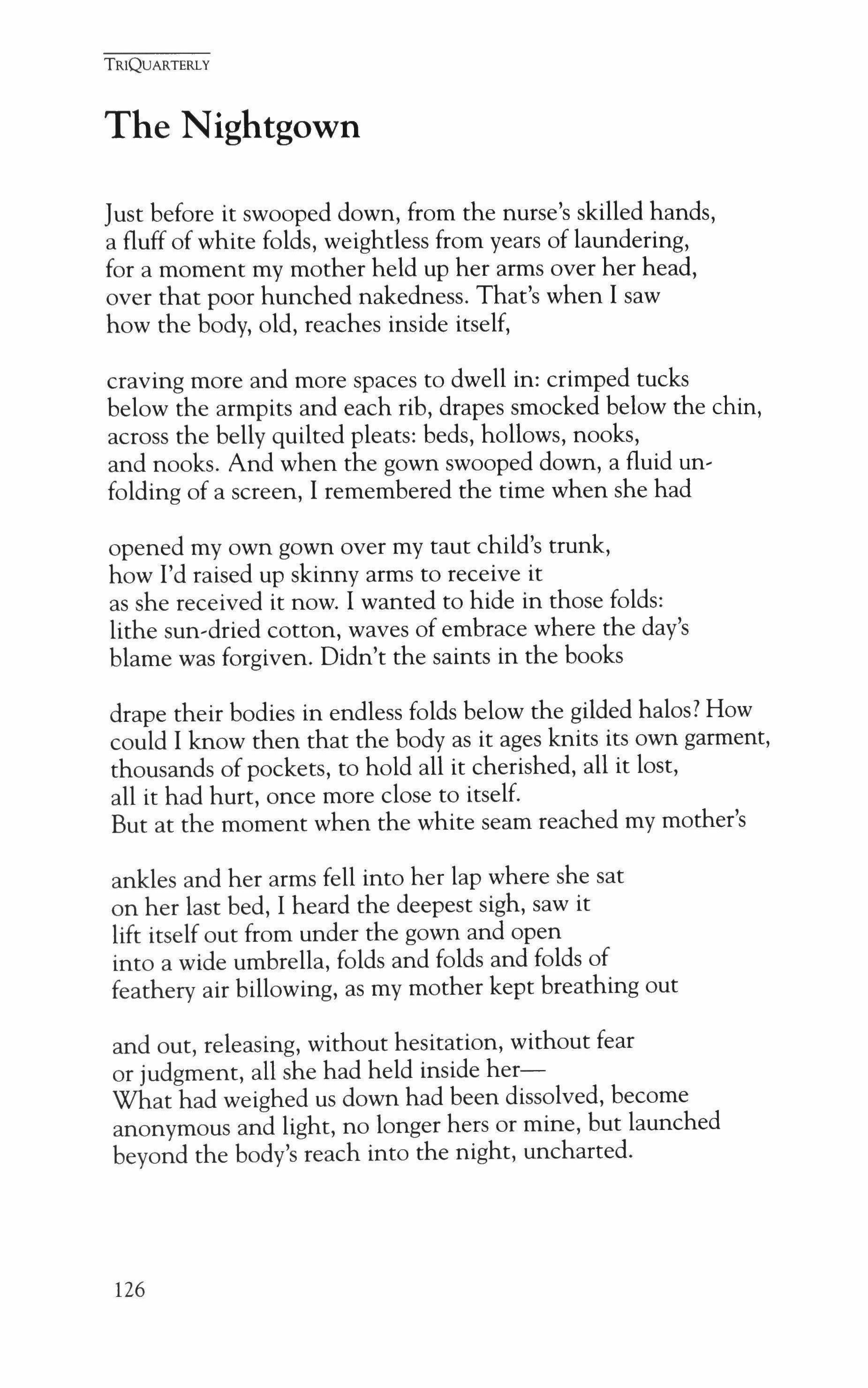
The Nightgown
Just before it swooped down, from the nurse's skilled hands, a fluff of white folds, weightless from years of laundering, for a moment my mother held up her arms over her head, over that poor hunched nakedness. That's when I saw how the body, old, reaches inside itself,
craving more and more spaces to dwell in: crimped tucks below the armpits and each rib, drapes smocked below the chin, across the belly quilted pleats: beds, hollows, nooks, and nooks. And when the gown swooped down, a fluid unfolding of a screen, I remembered the time when she had
opened my own gown over my taut child's trunk, how I'd raised up skinny arms to receive it as she received it now. I wanted to hide in those folds: lithe sun-dried cotton, waves of embrace where the day's blame was forgiven. Didn't the saints in the books
drape their bodies in endless folds below the gilded halos? How could I know then that the body as it ages knits its own garment, thousands of pockets, to hold all it cherished, all it lost, all it had hurt, once more close to itself. But at the moment when the white seam reached my mother's
ankles and her arms fell into her lap where she sat on her last bed, I heard the deepest sigh, saw it lift itself out from under the gown and open into a wide umbrella, folds and folds and folds of feathery air billowing, as my mother kept breathing out and out, releasing, without hesitation, without fear or judgment, all she had held inside herWhat had weighed us down had been dissolved, become anonymous and light, no longer hers or mine, but launched beyond the body's reach into the night, uncharted.
TRIQUARTERLY
126
Conference: Writing and Thinking at the End of an Epoch Preface
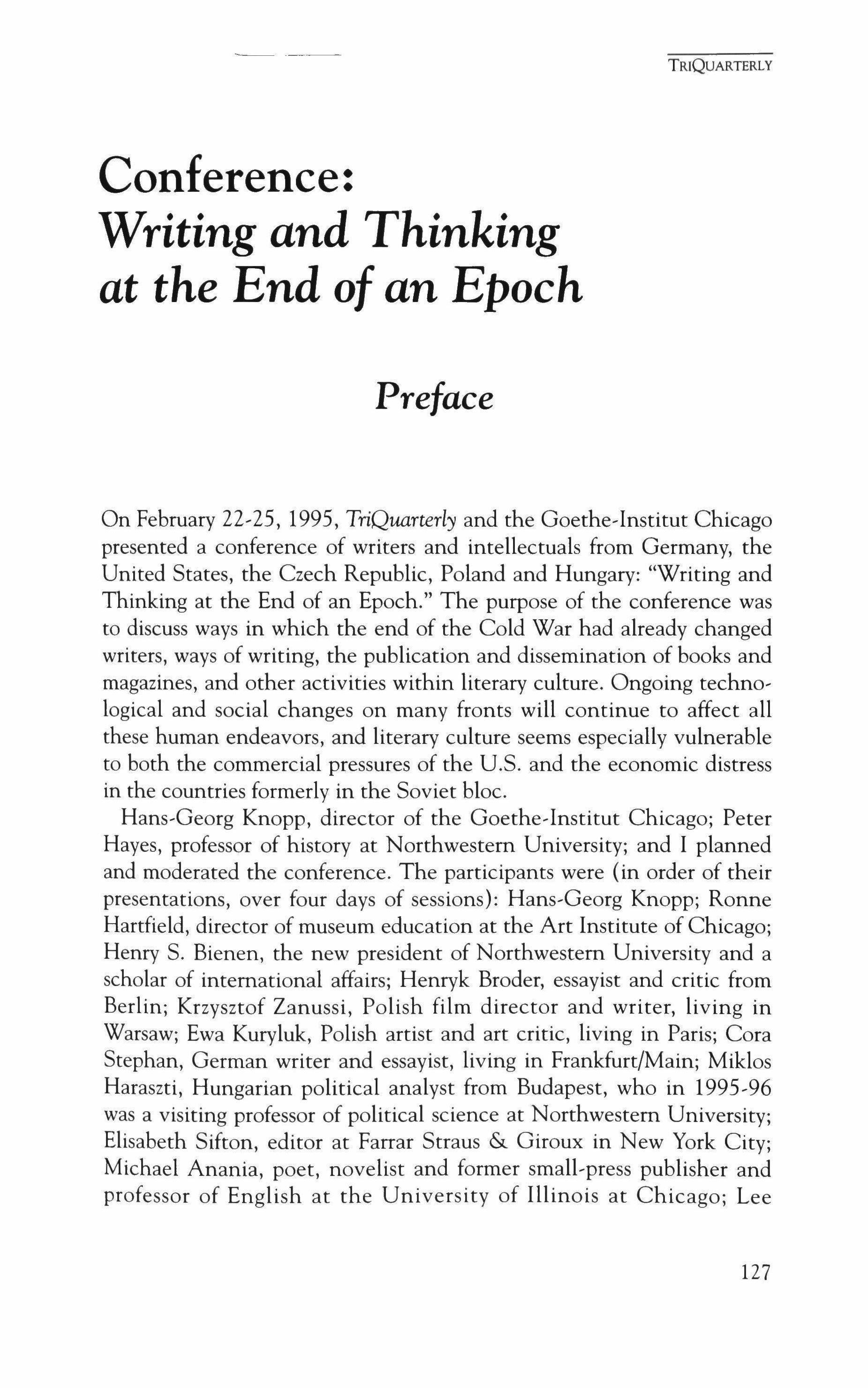
On February 22�25, 1995, TriQuarterly and the Goethe-Institut Chicago presented a conference of writers and intellectuals from Germany, the United States, the Czech Republic, Poland and Hungary: "Writing and Thinking at the End of an Epoch." The purpose of the conference was to discuss ways in which the end of the Cold War had already changed writers, ways of writing, the publication and dissemination of books and magazines, and other activities within literary culture. Ongoing technological and social changes on many fronts will continue to affect all these human endeavors, and literary culture seems especially vulnerable to both the commercial pressures of the U.S. and the economic distress in the countries formerly in the Soviet bloc.
Hans-Georg Knopp, director of the Goethe-Institut Chicago; Peter Hayes, professor of history at Northwestern University; and I planned and moderated the conference. The participants were (in order of their presentations, over four days of sessions): Hans-Georg Knopp; Ronne Hartfield, director of museum education at the Art Institute of Chicago; Henry S. Bienen, the new president of Northwestern University and a scholar of international affairs; Henryk Broder, essayist and critic from Berlin; Krzysztof Zanussi, Polish film director and writer, living in Warsaw; Ewa Kuryluk, Polish artist and art critic, living in Paris; Cora Stephan, German writer and essayist, living in Frankfurt/Main; Miklos Haraszti, Hungarian political analyst from Budapest, who in 1995-96 was a visiting professor of political science at Northwestern University; Elisabeth Sifton, editor at Farrar Straus & Giroux in New York City; Michael Anania, poet, novelist and former small-press publisher and professor of English at the University of Illinois at Chicago; Lee
TRIQUARTERLY
127

Huebner, former publisher of the International Herald Tribune and now a professor of communication studies at Northwestern; Michael Janeway, dean of the Medill School of Journalism at Northwestern; Nicholas Weir-Williams, director of the Northwestern University Press; Ted Solotaroff, writer, formerly a book editor and now a contributing editor of the Nation; Elke Schmitter, German journalist and newspaper editor living in Berlin; Adam Zagajewski, Polish poet living half the year in Paris and during the rest of the year teaching at the University of Houston; and Josef Kroutvor, Czech poet, writer and museum curator, living in Prague.
Following are several presentations from the conference, plus an essay by Norman Manea, Roumanian fiction writer and essayist now teaching at Bard College in upstate New York, who intended to participate but was unable to do so because of illness. The remarks of the participants offer interesting contrasts to our customary practices and ideas in the U.S., and show us significant differences (and some similarities) in experience. In the U.S. we face our own post-Cold-War changes, including new ideas about and attitudes toward culture and the artsideas about artists and audiences, the funding of the arts, cultural institutions, and the relationship of the arts and artists to society. As has often been the case in American history, some of the new attitudes represent a desire to curb or even punish artistic expression and confine it to the norms of conventional habits of thought, especially the habits of thought of elected officials, business sponsors and, in the last few decades, public-relations experts, professional spokespersons and marketers. There is also a rising moralistic pressure on the arts from religious organizations and conservative politicians.
In response to such pressures, it seems worth pointing out that neither markets nor forms of consensus have ever had anything to do with reliable judgments of what is truly valuable in writing or other arts. Indeed, "What is valuable?" is really another hidden question, "How is art valuable?" Neither markets nor social, political or religious consensus or fiat acknowledge the complexity of this question. Nor have markets or consensus had much to do, in the history of the fine and performing arts, with the creation, dissemination or preservation of artistic and humanistic works-most especially those very works which so many self-proclaimed public defenders of virtue invoke as the endangered heritage of western culture. Works of art or the humanities-even the noncontroversial-are endangered far less by those who indeed cherish artistic expression and independent thought, no matter how they ques-
TRIQUARTERLY
128
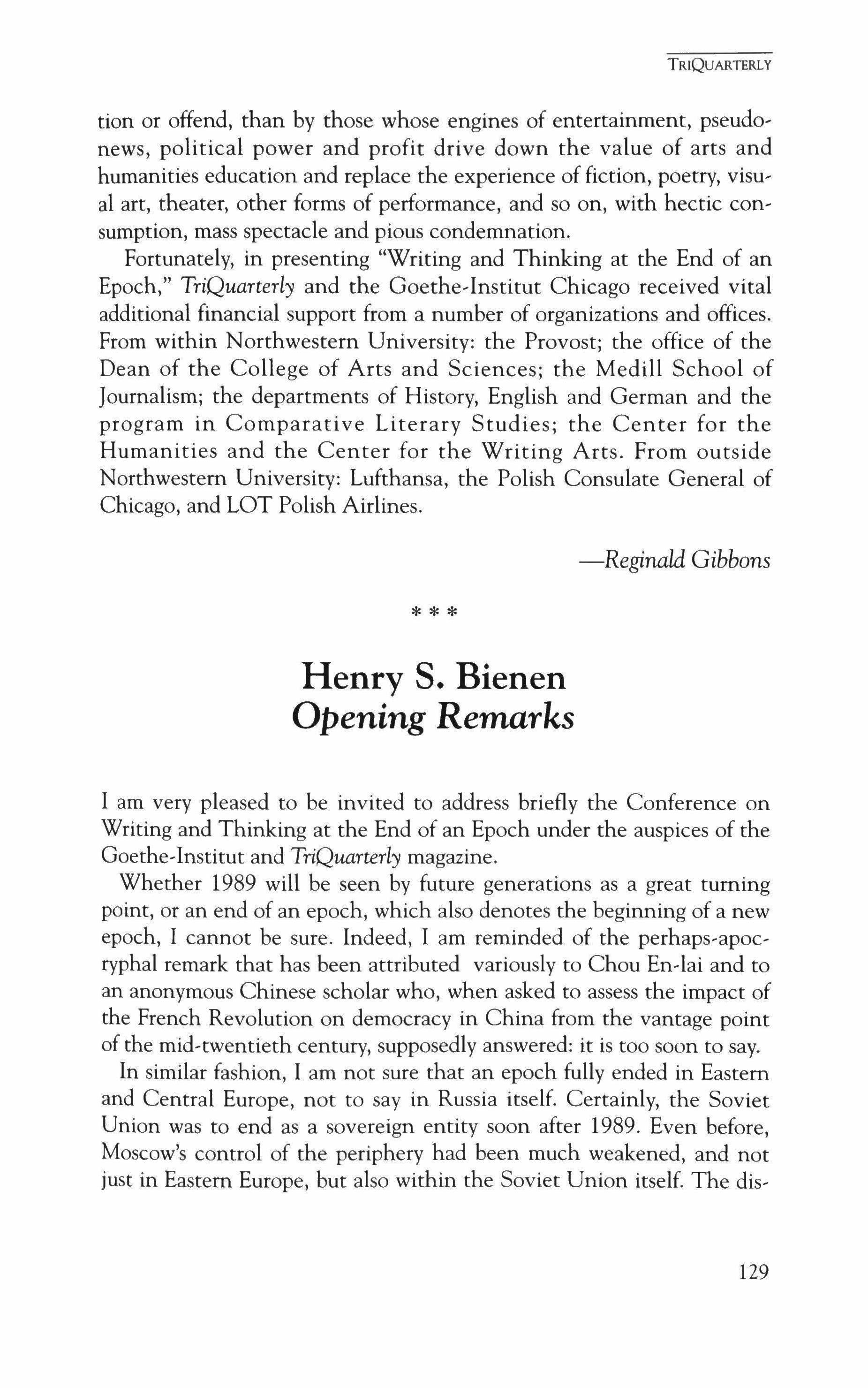
tion or offend, than by those whose engines of entertainment, pseudo, news, political power and profit drive down the value of arts and humanities education and replace the experience of fiction, poetry, visual art, theater, other forms of performance, and so on, with hectic con' sumption, mass spectacle and pious condemnation.
Fortunately, in presenting "Writing and Thinking at the End of an Epoch," TriQuarterly and the Goethe-Institut Chicago received vital additional financial support from a number of organizations and offices. From within Northwestern University: the Provost; the office of the Dean of the College of Arts and Sciences; the Medill School of Journalism; the departments of History, English and German and the program in Comparative Literary Studies; the Center for the Humanities and the Center for the Writing Arts. From outside Northwestern University: Lufthansa, the Polish Consulate General of Chicago, and LOT Polish Airlines.
-Reginald Gibbons
Henry S. Bienen
Opening Remarks
I am very pleased to be invited to address briefly the Conference on Writing and Thinking at the End of an Epoch under the auspices of the Goethe-Institut and TriQuarterly magazine.
Whether 1989 will be seen by future generations as a great turning point, or an end of an epoch, which also denotes the beginning of a new epoch, I cannot be sure. Indeed, I am reminded of the perhaps-apocryphal remark that has been attributed variously to Chou En-lai and to an anonymous Chinese scholar who, when asked to assess the impact of the French Revolution on democracy in China from the vantage point of the mid-twentieth century, supposedly answered: it is too soon to say. In similar fashion, I am not sure that an epoch fully ended in Eastern and Central Europe, not to say in Russia itself. Certainly, the Soviet Union was to end as a sovereign entity soon after 1989. Even before, Moscow's control of the periphery had been much weakened, and not just in Eastern Europe, but also within the Soviet Union itself. The dis-
TRIQUARTERLY
* * *
129
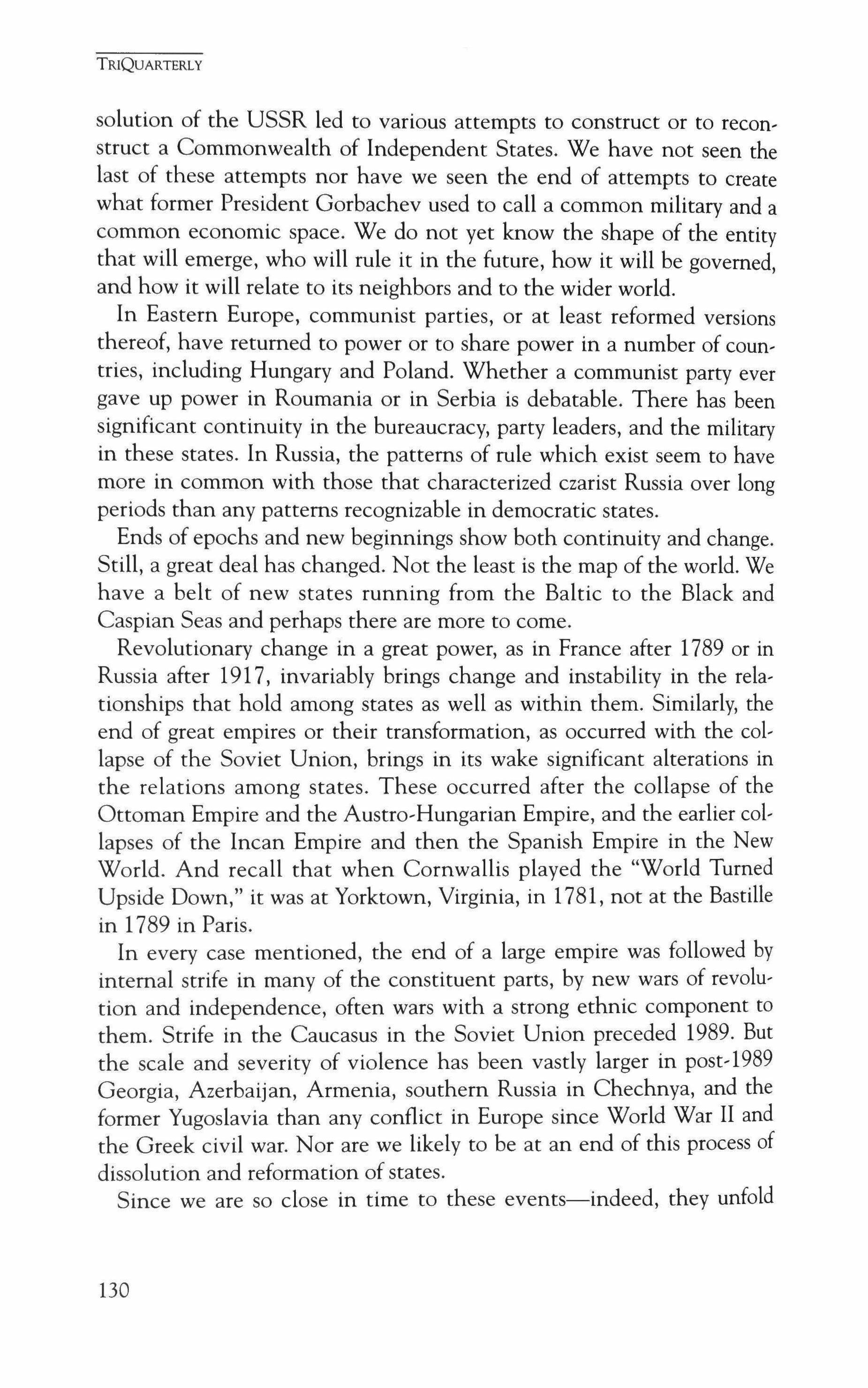
solution of the USSR led to various attempts to construct or to reconstruct a Commonwealth of Independent States. We have not seen the last of these attempts nor have we seen the end of attempts to create what former President Gorbachev used to call a common military and a common economic space. We do not yet know the shape of the entity that will emerge, who will rule it in the future, how it will be governed, and how it will relate to its neighbors and to the wider world.
In Eastern Europe, communist parties, or at least reformed versions thereof, have returned to power or to share power in a number of countries, including Hungary and Poland. Whether a communist party ever gave up power in Roumania or in Serbia is debatable. There has been significant continuity in the bureaucracy, party leaders, and the military in these states. In Russia, the patterns of rule which exist seem to have more in common with those that characterized czarist Russia over long periods than any patterns recognizable in democratic states.
Ends of epochs and new beginnings show both continuity and change. Still, a great deal has changed. Not the least is the map of the world. We have a belt of new states running from the Baltic to the Black and Caspian Seas and perhaps there are more to come.
Revolutionary change in a great power, as in France after 1789 or in Russia after 1917, invariably brings change and instability in the relationships that hold among states as well as within them. Similarly, the end of great empires or their transformation, as occurred with the collapse of the Soviet Union, brings in its wake significant alterations in the relations among states. These occurred after the collapse of the Ottoman Empire and the Austro-Hungarian Empire, and the earlier collapses of the Incan Empire and then the Spanish Empire in the New World. And recall that when Cornwallis played the "World Turned Upside Down," it was at Yorktown, Virginia, in 1781, not at the Bastille in 1789 in Paris.
In every case mentioned, the end of a large empire was followed by internal strife in many of the constituent parts, by new wars of revolution and independence, often wars with a strong ethnic component to them. Strife in the Caucasus in the Soviet Union preceded 1989. But the scale and severity of violence has been vastly larger in post-1989 Georgia, Azerbaijan, Armenia, southern Russia in Chechnya, and the former Yugoslavia than any conflict in Europe since World War II and the Greek civil war. Nor are we likely to be at an end of this process of dissolution and reformation of states.
Since we are so close in time to these events-indeed, they unfold
TRIQUARTERLY
130

today as we meet-it may be that the historians do not have a comparative advantage in assessing them. Moreover, writers of fiction and essay' ists of culture, who perhaps have more in common with each other than not, have a great deal to tell us about politics. I am not sure where history, on one hand, and fiction and myth, on the other, begin and end in the works of Gabriel Garda Marquez or in Ryzard Kapuzcinski. I would rather read The General in His Labyrinth or The Emperor to learn about leadership and change and the human condition than to read works of most political scientists {although Machiavelli, the first modem political scientist, was not a bad guide either}.
Literature and drama often presage political change. The thaw in Russia in art and fiction under Khrushchev did not lead to fundamental political change in the 1950s, surely not in all respects. However, it did signal the end of the terror. But, then neither did the Prague Spring of 1968 lead to permanent political change; and neither does history move in a linear fashion.
Thus, it is fitting that artists and writers should help us to make sense of an epoch or even to help us decide whether we are at its end and what might the new beginnings be. In Eastern Europe, we have had the phenomenon of playwrights becoming politicians and assuming leader, ship roles through their courage and their conviction and even redeem' ing the honor of society through that courage and conviction. Moreover, the very definitions of those beginnings and endings too must depend on, and be understood and analyzed through, art, as well as through more narrowly crafted political analyses. Thus I am very pleased that Northwestern University, through TriQuarterly magazine-an out' standing journal of arts and culture-together with the Goethe-Institut, has convened this forum.
Ewa Kuryluk Intellectuals, Be Intelligent
The topic of this conference suggests that intellectuals have a better understanding of the world than other people, and thus can make a difference. But what difference?
I wonder, remembering two old jokes. The first asks: Who invented 131
TRIQUARTERLY
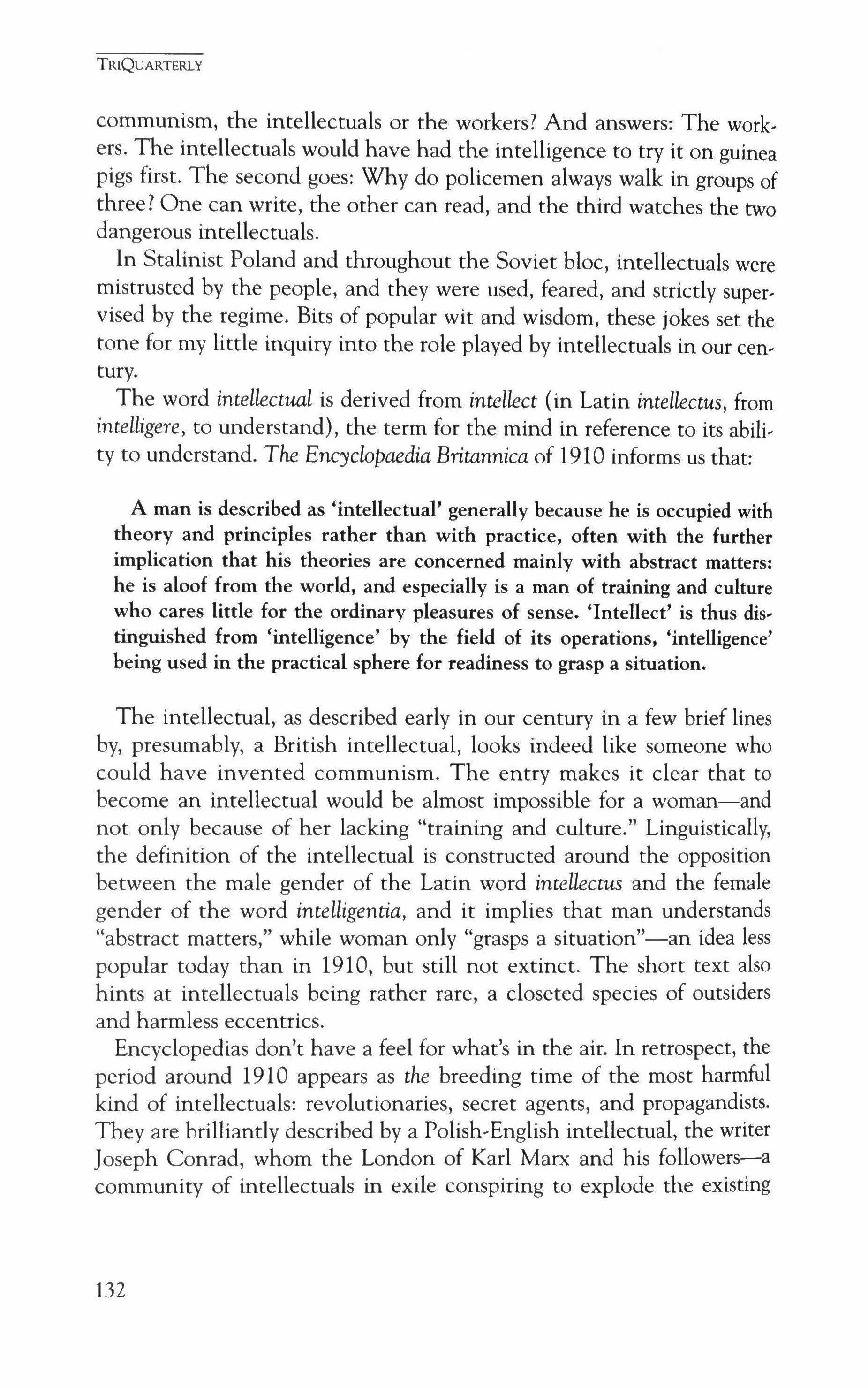
communism, the intellectuals or the workers? And answers: The workers. The intellectuals would have had the intelligence to try it on guinea pigs first. The second goes: Why do policemen always walk in groups of three? One can write, the other can read, and the third watches the two dangerous intellectuals.
In Stalinist Poland and throughout the Soviet bloc, intellectuals were mistrusted by the people, and they were used, feared, and strictly supervised by the regime. Bits of popular wit and wisdom, these jokes set the tone for my little inquiry into the role played by intellectuals in our century.
The word intellectual is derived from intellect (in Latin intellectus, from intelligere, to understand), the term for the mind in reference to its ability to understand. The Encyclopaedia Britannica of 1910 informs us that:
A man is described as 'intellectual' generally because he is occupied with theory and principles rather than with practice, often with the further implication that his theories are concerned mainly with abstract matters: he is aloof from the world, and especially is a man of training and culture who cares little for the ordinary pleasures of sense. 'Intellect' is thus distinguished from 'intelligence' by the field of its operations, 'intelligence' being used in the practical sphere for readiness to grasp a situation.
The intellectual, as described early in our century in a few brief lines by, presumably, a British intellectual, looks indeed like someone who could have invented communism. The entry makes it clear that to become an intellectual would be almost impossible for a woman-and not only because of her lacking "training and culture." Linguistically, the definition of the intellectual is constructed around the opposition between the male gender of the Latin word intellectus and the female gender of the word intelligentia, and it implies that man understands "abstract matters," while woman only "grasps a situation"-an idea less popular today than in 1910, but still not extinct. The short text also hints at intellectuals being rather rare, a closeted species of outsiders and harmless eccentrics.
Encyclopedias don't have a feel for what's in the air. In retrospect, the period around 1910 appears as the breeding time of the most harmful kind of intellectuals: revolutionaries, secret agents, and propagandists. They are brilliantly described by a Polish-English intellectual, the writer Joseph Conrad, whom the London of Karl Marx and his followers-a community of intellectuals in exile conspiring to explode the existing
TRIQUARTERLY
132
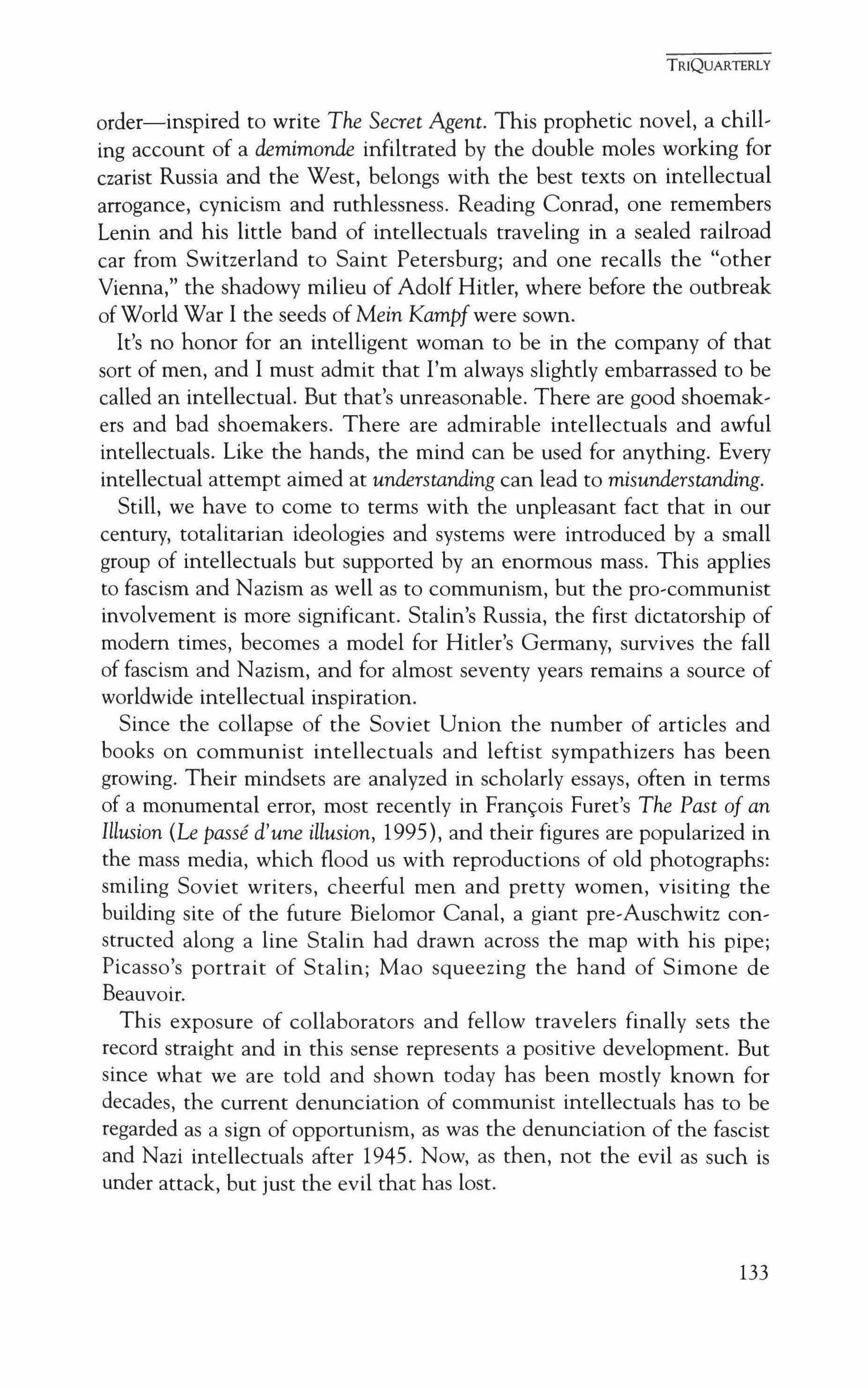
order-inspired to write The Secret Agent. This prophetic novel, a chill, ing account of a demimonde infiltrated by the double moles working for czarist Russia and the West, belongs with the best texts on intellectual arrogance, cynicism and ruthlessness. Reading Conrad, one remembers Lenin and his little band of intellectuals traveling in a sealed railroad car from Switzerland to Saint Petersburg; and one recalls the "other Vienna," the shadowy milieu of Adolf Hitler, where before the outbreak of World War I the seeds of Mein Kampf were sown.
It's no honor for an intelligent woman to be in the company of that sort of men, and I must admit that I'm always slightly embarrassed to be called an intellectual. But that's unreasonable. There are good shoernakers and bad shoemakers. There are admirable intellectuals and awful intellectuals. Like the hands, the mind can be used for anything. Every intellectual attempt aimed at understanding can lead to misunderstanding.
Still, we have to come to terms with the unpleasant fact that in our century, totalitarian ideologies and systems were introduced by a small group of intellectuals but supported by an enormous mass. This applies to fascism and Nazism as well as to communism, but the pro'communist involvement is more significant. Stalin's Russia, the first dictatorship of modem times, becomes a model for Hitler's Germany, survives the fall of fascism and Nazism, and for almost seventy years remains a source of worldwide intellectual inspiration.
Since the collapse of the Soviet Union the number of articles and books on communist intellectuals and leftist sympathizers has been growing. Their mindsets are analyzed in scholarly essays, often in terms of a monumental error, most recently in Francois Furet's The Past of an Illusion (Le passe d'une illusion, 1995), and their figures are popularized in the mass media, which flood us with reproductions of old photographs: smiling Soviet writers, cheerful men and pretty women, visiting the building site of the future Bielomor Canal, a giant pre'Auschwitz con, structed along a line Stalin had drawn across the map with his pipe; Picasso's portrait of Stalin; Mao squeezing the hand of Simone de Beauvoir.
This exposure of collaborators and fellow travelers finally sets the record straight and in this sense represents a positive development. But since what we are told and shown today has been mostly known for decades, the current denunciation of communist intellectuals has to be regarded as a sign of opportunism, as was the denunciation of the fascist and Nazi intellectuals after 1945. Now, as then, not the evil as such is under attack, but just the evil that has lost.
TRIQUARTERLY
133

Denouncing systems that have gone down the drain, people engage in self-exorcism and guilt transfer; focusing on the past, they ignore the present. After World War II, with Nazism and fascism dead but Stalinism alive and well, it would have been a sign of courage, and by far more useful, to denounce Gorky or an Aragon rather than to demonize a Heidegger or a Pound. Today it makes more sense to direct one's eyes to ethnic cleansing, the new imperialist schemes of Russia, or the ex-Maoists turned Muslim fundamentalists, than to get over-excited about Auschwitz and the Gulag. Forgetting the past is bad, forgetting the present worse.
The massive attack on the leftist tradition that for so long has been so close to so many people's hearts has one serious consequence. As recently as ten years ago the term intellectual was semi-synonymous with the term leftist throughout the West. As the leftist tradition is being discredited, so are the intellectuals who have been part of it. So they disappear, revise their positions, change. This might explain the recent phenomenon of intellectuals as government advisers and officials, and as philanthropists.
In the winter of 1995 tout Paris has been asking itself: Who of the well-known ex-anarchist, ex-Stalinist, ex-Maoist intellectuals who right now monopolize the media, will actually become advisers to the next president of the French Republic, and even ministers? Similarly, in the countries of the ex-Soviet bloc, many intellectuals-initially mostly the members of the democratic opposition, but recently also some ex-communists-assist the newly elected governments or participate in them. Today democracy and capitalism are backed by an unusually large number of intellectuals in the West and East.
Equally significant is the new philanthropic activism of the intellectualso They become involved in charities and media campaigns to benefit starving children in Somalia, drug addicts, AIDS patients, the homeless, or the civil population of Sarajevo. It is fascinating to watch philosophers, writers and former revolutionaries run soup kitchens and kiss babies infected with HIV, since, in the past, charity-traditionally the domain of society ladies-was ridiculed and despised by the intellectualso This humanitarian effort is given enormous publicity. So it transforms the participating intellectuals into TV stars, moral authorities and potential candidates for top government posts, makes their books into best-sellers, and reveals a more self-serving character than the charity of society ladies-without being more effective or less problematic. Indeed, it does bring some relief, but it also preserves the status quo.
TRIQUARTERLY
134
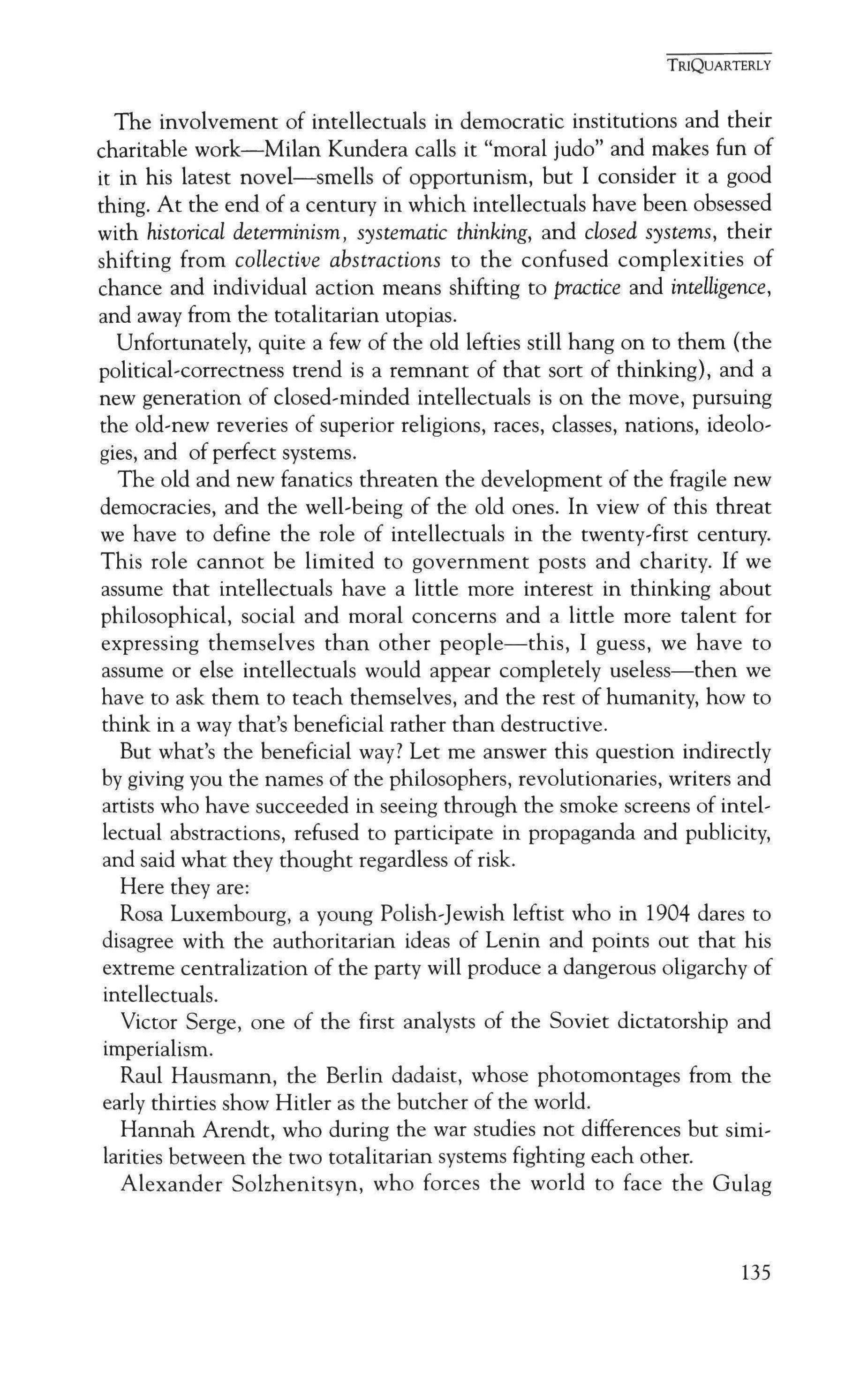
The involvement of intellectuals in democratic institutions and their charitable work-Milan Kundera calls it "moral judo" and makes fun of it in his latest novel-smells of opportunism, but I consider it a good thing. At the end of a century in which intellectuals have been obsessed with historical determinism, systematic thinking, and closed systems, their shifting from collective abstractions to the confused complexities of chance and individual action means shifting to practice and intelligence, and away from the totalitarian utopias.
Unfortunately, quite a few of the old lefties still hang on to them (the political-correctness trend is a remnant of that sort of thinking), and a new generation of closed-minded intellectuals is on the move, pursuing the old-new reveries of superior religions, races, classes, nations, ideologies, and of perfect systems.
The old and new fanatics threaten the development of the fragile new democracies, and the well-being of the old ones. In view of this threat we have to define the role of intellectuals in the twenty-first century. This role cannot be limited to government posts and charity. If we assume that intellectuals have a little more interest in thinking about philosophical, social and moral concerns and a little more talent for expressing themselves than other people-this, I guess, we have to assume or else intellectuals would appear completely useless-then we have to ask them to teach themselves, and the rest of humanity, how to think in a way that's beneficial rather than destructive.
But what's the beneficial way? Let me answer this question indirectly by giving you the names of the philosophers, revolutionaries, writers and artists who have succeeded in seeing through the smoke screens of intellectual abstractions, refused to participate in propaganda and publicity, and said what they thought regardless of risk.
Here they are:
Rosa Luxembourg, a young Polish-jewish leftist who in 1904 dares to disagree with the authoritarian ideas of Lenin and points out that his extreme centralization of the party will produce a dangerous oligarchy of intellectuals.
Victor Serge, one of the first analysts of the Soviet dictatorship and imperialism.
Raul Hausmann, the Berlin dadaist, whose photomontages from the early thirties show Hitler as the butcher of the world.
Hannah Arendt, who during the war studies not differences but similarities between the two totalitarian systems fighting each other.
Alexander Solzhenitsyn, who forces the world to face the Gulag 135
TRIQUARTERLY
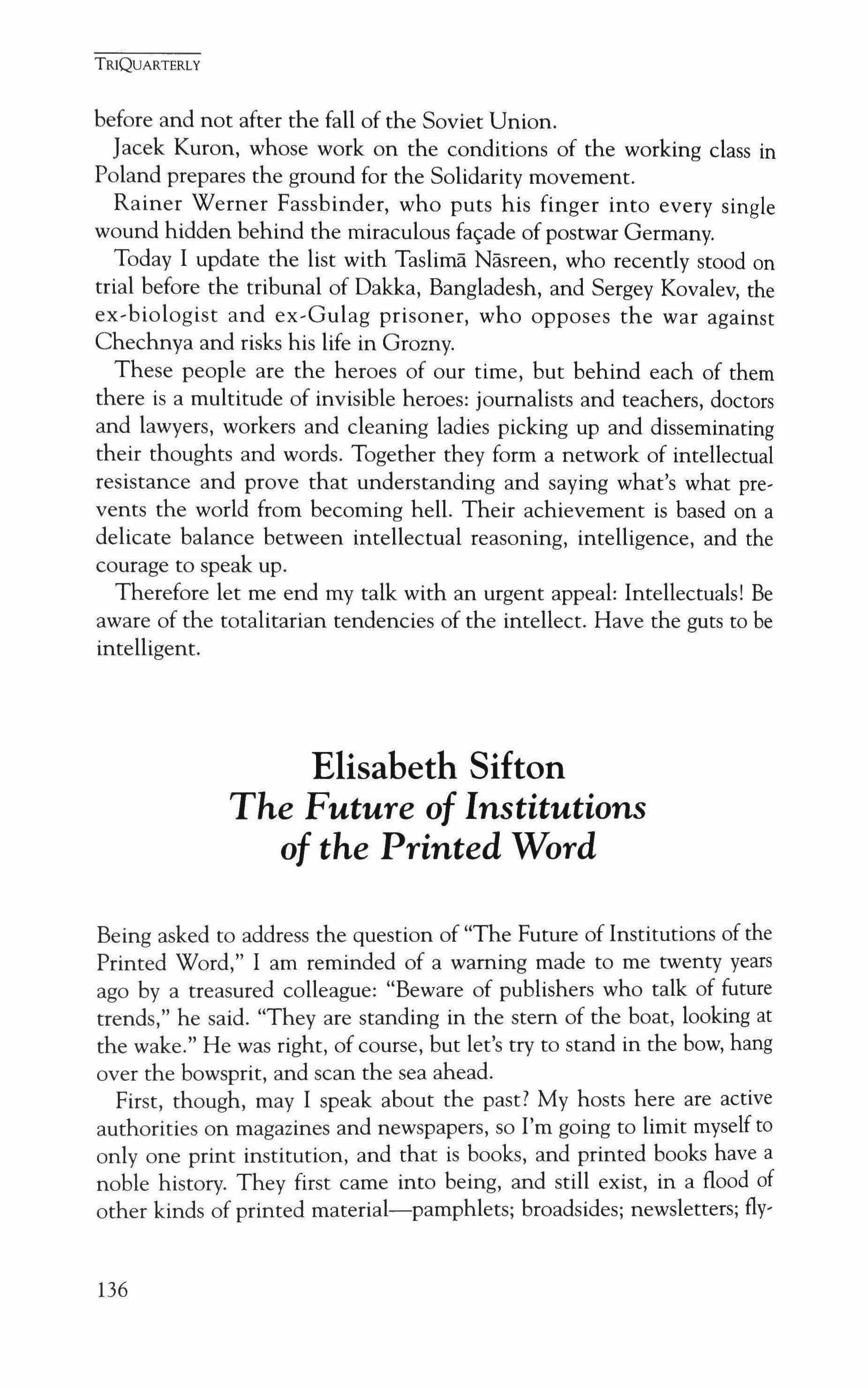
before and not after the fall of the Soviet Union.
Jacek Kuron, whose work on the conditions of the working class in Poland prepares the ground for the Solidarity movement.
Rainer Werner Fassbinder, who puts his finger into every single wound hidden behind the miraculous facade of postwar Germany.
Today I update the list with Taslima Nasreen, who recently stood on trial before the tribunal of Dakka, Bangladesh, and Sergey Kovalev, the ex-biologist and ex-Gulag prisoner, who opposes the war against Chechnya and risks his life in Grozny.
These people are the heroes of our time, but behind each of them there is a multitude of invisible heroes: journalists and teachers, doctors and lawyers, workers and cleaning ladies picking up and disseminating their thoughts and words. Together they form a network of intellectual resistance and prove that understanding and saying what's what prevents the world from becoming hell. Their achievement is based on a delicate balance between intellectual reasoning, intelligence, and the courage to speak up.
Therefore let me end my talk with an urgent appeal: Intellectuals! Be aware of the totalitarian tendencies of the intellect. Have the guts to be intelligent.
Elisabeth Sifton
The Future of Institutions of the Printed Word
Being asked to address the question of "The Future of Institutions of the Printed Word," I am reminded of a warning made to me twenty years ago by a treasured colleague: "Beware of publishers who talk of future trends," he said. "They are standing in the stem of the boat, looking at the wake." He was right, of course, but let's try to stand in the bow, hang over the bowsprit, and scan the sea ahead.
First, though, may I speak about the past? My hosts here are active authorities on magazines and newspapers, so I'm going to limit myself to only one print institution, and that is books, and printed books have a noble history. They first came into being, and still exist, in a flood of other kinds of printed material-pamphlets; broadsides; newsletters; fly-
TRIQUARTERLY
136
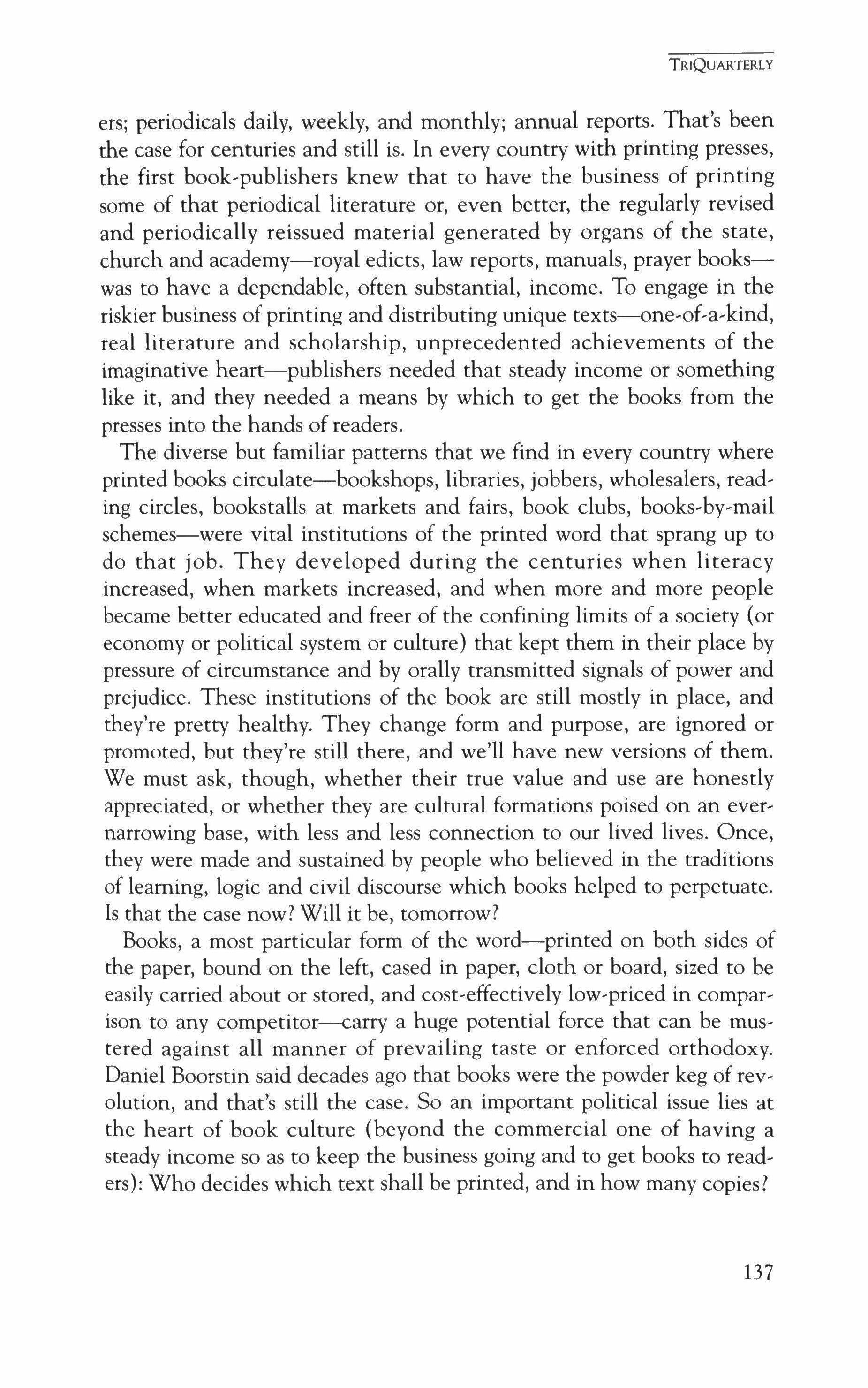
ers; periodicals daily, weekly, and monthly; annual reports. That's been the case for centuries and still is. In every country with printing presses, the first book-publishers knew that to have the business of printing some of that periodical literature or, even better, the regularly revised and periodically reissued material generated by organs of the state, church and academy-royal edicts, law reports, manuals, prayer bookswas to have a dependable, often substantial, income. To engage in the riskier business of printing and distributing unique texts-c-one-of-a-kind, real literature and scholarship, unprecedented achievements of the imaginative heart-publishers needed that steady income or something like it, and they needed a means by which to get the books from the presses into the hands of readers.
The diverse but familiar patterns that we find in every country where printed books circulate-bookshops, libraries, jobbers, wholesalers, reading circles, bookstalls at markets and fairs, book clubs, books-by-mail schemes-were vital institutions of the printed word that sprang up to do that job. They developed during the centuries when literacy increased, when markets increased, and when more and more people became better educated and freer of the confining limits of a society (or economy or political system or culture) that kept them in their place by pressure of circumstance and by orally transmitted signals of power and prejudice. These institutions of the book are still mostly in place, and they're pretty healthy. They change form and purpose, are ignored or promoted, but they're still there, and we'll have new versions of them. We must ask, though, whether their true value and use are honestly appreciated, or whether they are cultural formations poised on an evernarrowing base, with less and less connection to our lived lives. Once, they were made and sustained by people who believed in the traditions of learning, logic and civil discourse which books helped to perpetuate. Is that the case now? Will it be, tomorrow?
Books, a most particular form of the word-printed on both sides of the paper, bound on the left, cased in paper, cloth or board, sized to be easily carried about or stored, and cost-effectively low-priced in comparison to any competitor-carry a huge potential force that can be mustered against all manner of prevailing taste or enforced orthodoxy. Daniel Boorstin said decades ago that books were the powder keg of revolution, and that's still the case. So an important political issue lies at the heart of book culture (beyond the commercial one of having a steady income so as to keep the business going and to get books to readers): Who decides which text shall be printed, and in how many copies?
TRIQUARTERLY
137
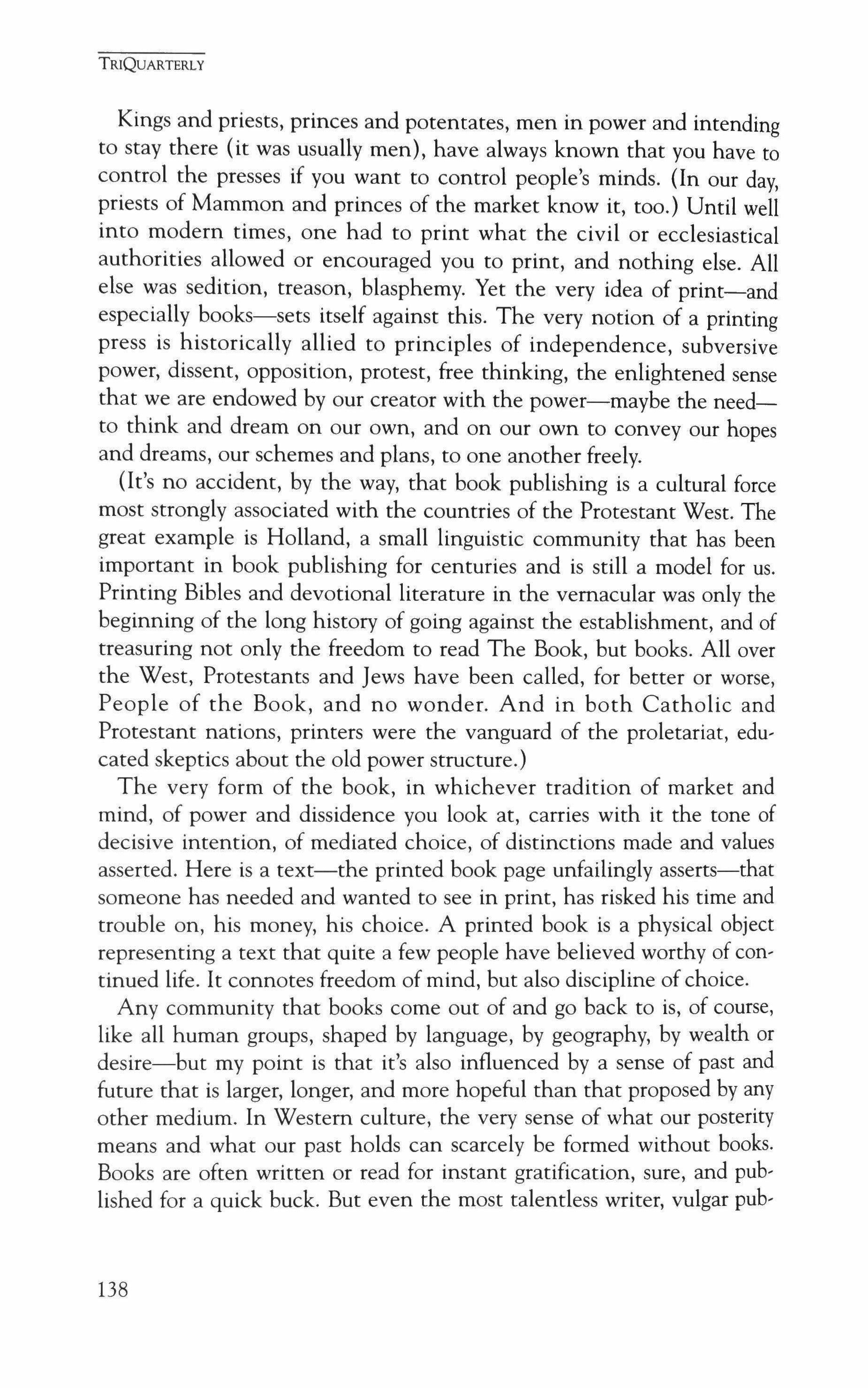
Kings and priests, princes and potentates, men in power and intending to stay there (it was usually men), have always known that you have to control the presses if you want to control people's minds. (In our day, priests of Mammon and princes of the market know it, tOO.) Until well into modern times, one had to print what the civil or ecclesiastical authorities allowed or encouraged you to print, and nothing else. All else was sedition, treason, blasphemy. Yet the very idea of print-and especially books-sets itself against this. The very notion of a printing press is historically allied to principles of independence, subversive power, dissent, opposition, protest, free thinking, the enlightened sense that we are endowed by our creator with the power-maybe the needto think and dream on our own, and on our own to convey our hopes and dreams, our schemes and plans, to one another freely.
(It's no accident, by the way, that book publishing is a cultural force most strongly associated with the countries of the Protestant West. The great example is Holland, a small linguistic community that has been important in book publishing for centuries and is still a model for us.
Printing Bibles and devotional literature in the vernacular was only the beginning of the long history of going against the establishment, and of treasuring not only the freedom to read The Book, but books. All over the West, Protestants and Jews have been called, for better or worse, People of the Book, and no wonder. And in both Catholic and Protestant nations, printers were the vanguard of the proletariat, educated skeptics about the old power structure.)
The very form of the book, in whichever tradition of market and mind, of power and dissidence you look at, carries with it the tone of decisive intention, of mediated choice, of distinctions made and values asserted. Here is a text-the printed book page unfailingly asserts-that someone has needed and wanted to see in print, has risked his time and trouble on, his money, his choice. A printed book is a physical object representing a text that quite a few people have believed worthy of continued life. It connotes freedom of mind, but also discipline of choice.
Any community that books come out of and go back to is, of course, like all human groups, shaped by language, by geography, by wealth or desire-but my point is that it's also influenced by a sense of past and future that is larger, longer, and more hopeful than that proposed by any other medium. In Western culture, the very sense of what our posterity means and what our past holds can scarcely be formed without books. Books are often written or read for instant gratification, sure, and published for a quick buck. But even the most talentless writer, vulgar pub-
TRIQUARTERLY
138

lisher, or craven bookseller is using and presuming on much grander, more benign habits of the spirit. Each is working in a long-term medium whose physical properties are loved---or anyway respected-for an ineffable, permanent value they bestow upon the texts they contain. No printout of an unsupervised text, no screen, no here-today, gone-tomorrow scrolling parade of cybertext even begins to have this charge-and never will.
This essential power of the book is in no way challenged or threatened by new technologies. Of course, as conveyors of information, reference sources and data banks, books are being and perhaps should be superseded or altered by more powerful, efficient, wider-ranging media--electronic, televisual, interactive, interpassive. But no shadow falls on the future of books cast by the World Wide Web or Internet or the A&E channel. These last are forms of commerce and time-spending {wasting?} that physically express transience and provisional non-choice {also intemperance and salesmanship} just as books suggest the opposite.
The shadows that fall on books are cast, as they always have been, by the forces that control the finances of their publication. Look always to the ownership of the means of production! Dangers loom-and this is new in our times-when publishers and bookstores are owned by cornpanies that invest in books not for themselves in all their unaccountable peculiarity, but because books give them access to material they believe will benefit their true interest-profit from mass-media commerce in what they call "popular" culture. Naturally, you can count on a huge audience for predigested, prearranged, and prejudged cliche and banalitv. Electronic and televisual media have vastly increased this audience. But to make and sell books only for that public, to encourage and overfeed it, and then to claim it as the "popular" one is grotesque prejudice. We once called this mistake a Hollywood kind of disease but it has now infected all our mass media and the book business as well.
For a host of technical reasons I won't bore you with, book publishing is necessarily a very low-profit business, and of course that means it always hungers for big markets. But it only works-and then only barely-e-if it stays close to the writers who create and the readers who cherish books. Another new peril is that book publishing is and will be dominated by people and companies who don't know or understand writers and readers, since they don't believe in books themselves, don't read them, don't trust them. They consider books obsolete though still profitable for their spin-off derivatives, as intellectual property to be fed into the maw of those alluring mass media, as culturally respectable fig
TRIQUARTERLY
139
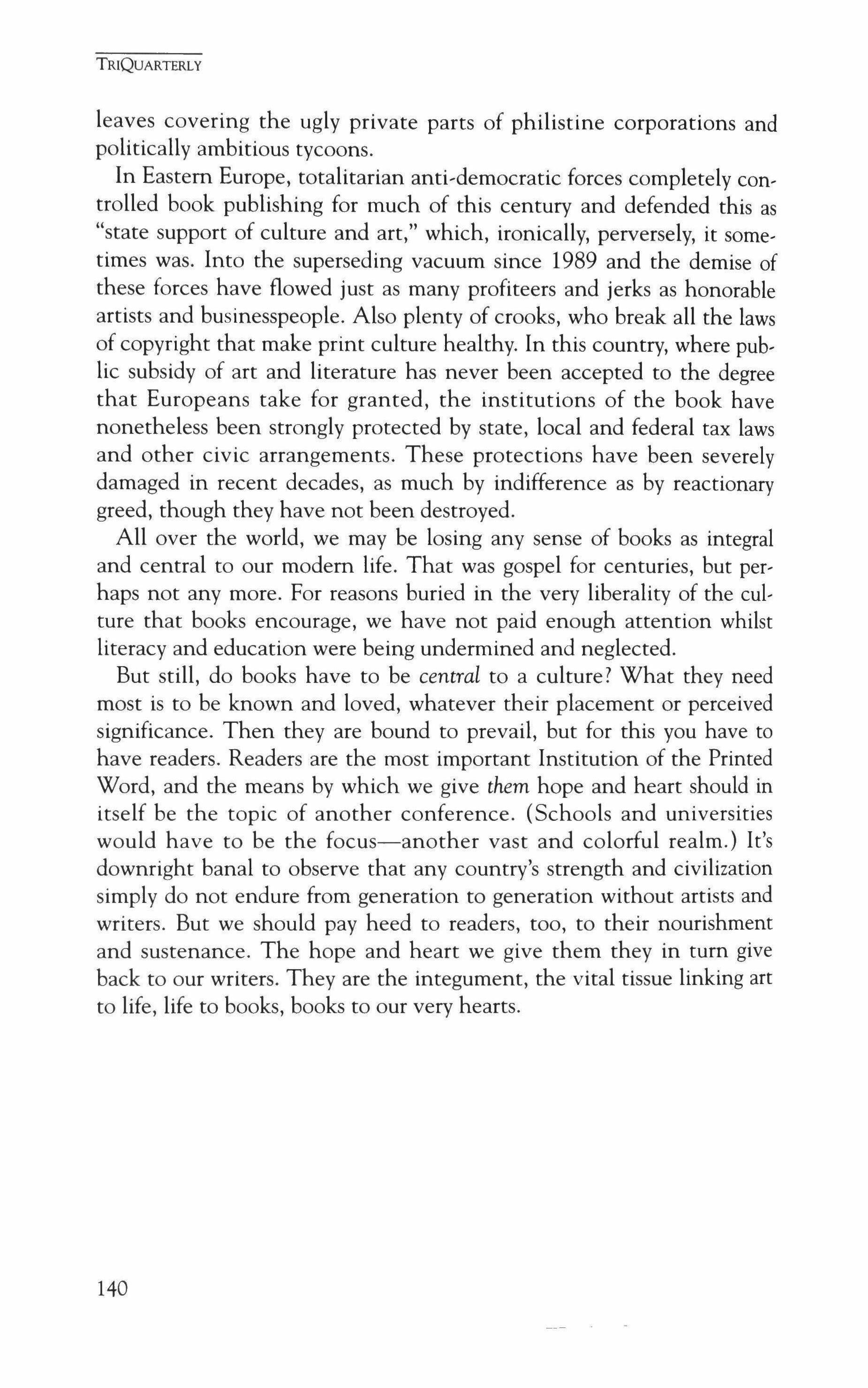
leaves covering the ugly private parts of philistine corporations and politically ambitious tycoons.
In Eastern Europe, totalitarian anti-democratic forces completely con, trolled book publishing for much of this century and defended this as "state support of culture and art," which, ironically, perversely, it some, times was. Into the superseding vacuum since 1989 and the demise of these forces have flowed just as many profiteers and jerks as honorable artists and businesspeople. Also plenty of crooks, who break all the laws of copyright that make print culture healthy. In this country, where pub, lie subsidy of art and literature has never been accepted to the degree that Europeans take for granted, the institutions of the book have nonetheless been strongly protected by state, local and federal tax laws and other civic arrangements. These protections have been severely damaged in recent decades, as much by indifference as by reactionary greed, though they have not been destroyed.
All over the world, we may be losing any sense of books as integral and central to our modem life. That was gospel for centuries, but per, haps not any more. For reasons buried in the very liberality of the culture that books encourage, we have not paid enough attention whilst literacy and education were being undermined and neglected.
But still, do books have to be central to a culture? What they need most is to be known and loved, whatever their placement or perceived significance. Then they are bound to prevail, but for this you have to have readers. Readers are the most important Institution of the Printed Word, and the means by which we give them hope and heart should in itself be the topic of another conference. (Schools and universities would have to be the focus-another vast and colorful realm.) It's downright banal to observe that any country's strength and civilization simply do not endure from generation to generation without artists and writers. But we should pay heed to readers, too, to their nourishment and sustenance. The hope and heart we give them they in tum give back to our writers. They are the integument, the vital tissue linking art to life, life to books, books to our very hearts.
ThlQUARTERLY
140

Adam Zagajewski
Of Violence and Naivete
We are historical and we live epochs of denial, of rejecting the creed of our fathers and grandfathers.
I'm teaching a seminar on "violent writers" at the University of Houston. By "violent writers" I mean writers belonging to the postNietzschean generation, fascinated with action, adventure, with physical, intellectual and political violence. Ernst Junger (who outlived everyone else), Pierre Drieu la Rochelle, Andre Malraux, Ernest Hemingway, Gottfried Benn, Vladimir Mayakovsky, Ernst von Salomon, Henri de Montherlant and Bertolt Brecht are just a few examples of writers of this unusual persuasion. It was not just the business of the radicalleft or radical right wing; there were many bridges of admiration and understanding between these two political camps.
The following quotation-just to give you the flavor of the fruit which is now forbidden-is in praise of Malraux:
Man of the twentieth century-and here Nietzsche is his magnificent predecessor-looks upon his life as upon an adventure. He cannot see it differently because he is at the same time too skeptical and too ardent. Too skeptical to believe in an ordered world whose parts fit seamlessly together-his creed is a relativistic one-and too passionate to be scared by this aspect of the world. On the contrary, the utter mystery that he encounters everywhere stimulates him and gives him a life filled with movement, a life which knows no repose.
The writer is Pierre Drieu la Rochelle, the fascist, the talented novelist who later collaborated with the Germans in occupied Paris and who-after Stalingrad-confessed in his diary that actually Stalin attracted him more than Hitler (because he was stronger). For a writer, for an intellectual, being violent meant something more essential than being communist or fascist (though we would barely see this kind of temperament drawn to more moderate parties or political philosophies). It was a Weltanschaung comprising both a metaphysical and an aesthetic disposition; fascination with many possible and actual incarnations of power. A shameless fascination, we would say. But not shameless for them.
These writers were Adventurers. They believed that they lived in a
TRIQUARTERLY
141
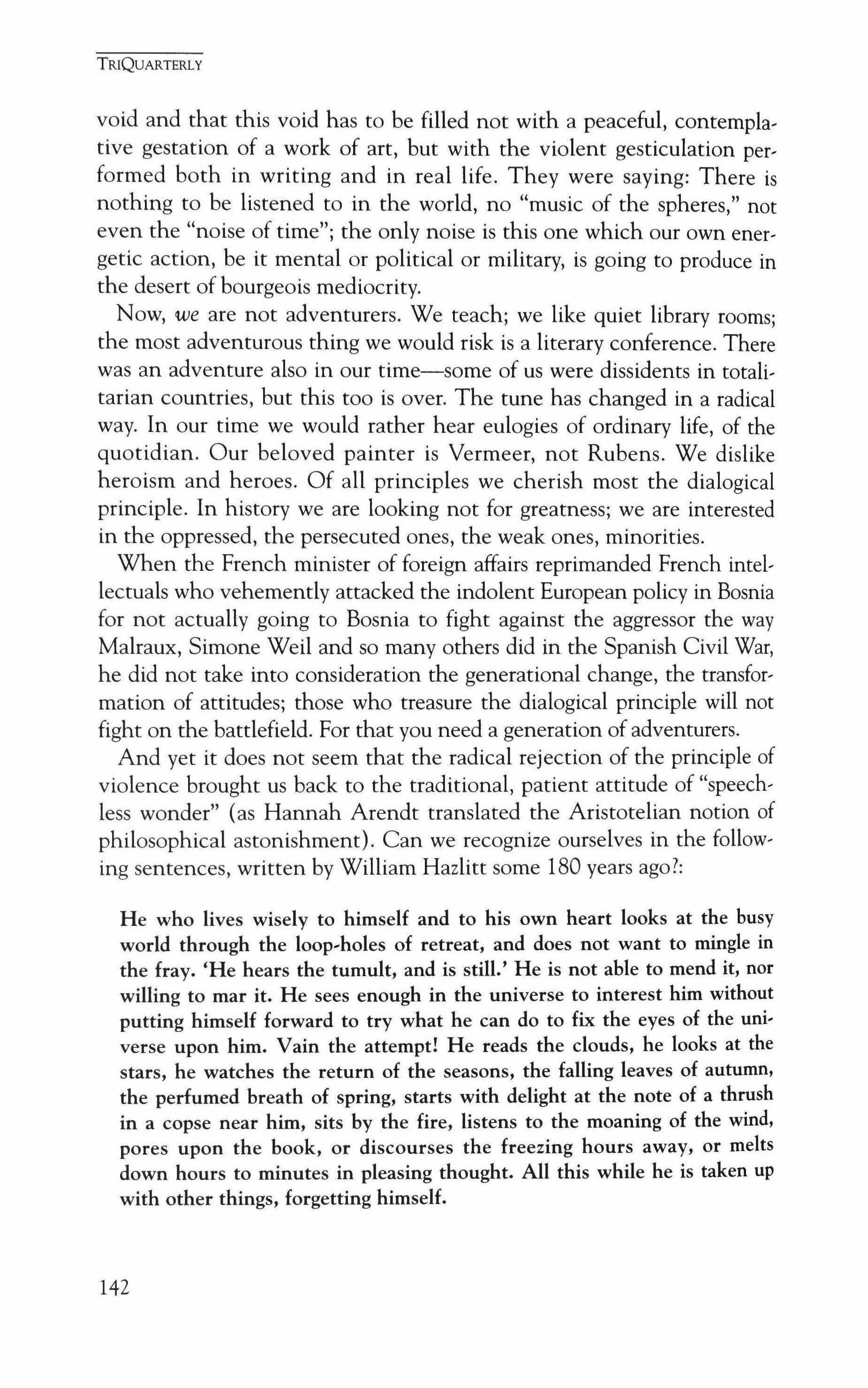
void and that this void has to be filled not with a peaceful, contemplative gestation of a work of art, but with the violent gesticulation performed both in writing and in real life. They were saying: There is nothing to be listened to in the world, no "music of the spheres," not even the "noise of time"; the only noise is this one which our own energetic action, be it mental or political or military, is going to produce in the desert of bourgeois mediocrity.
Now, we are not adventurers. We teach; we like quiet library rooms; the most adventurous thing we would risk is a literary conference. There was an adventure also in our time-some of us were dissidents in totalitarian countries, but this too is over. The tune has changed in a radical way. In our time we would rather hear eulogies of ordinary life, of the quotidian. Our beloved painter is Vermeer, not Rubens. We dislike heroism and heroes. Of all principles we cherish most the dialogical principle. In history we are looking not for greatness; we are interested in the oppressed, the persecuted ones, the weak ones, minorities.
When the French minister of foreign affairs reprimanded French intellectuals who vehemently attacked the indolent European policy in Bosnia for not actually going to Bosnia to fight against the aggressor the way Malraux, Simone Weil and so many others did in the Spanish Civil War, he did not take into consideration the generational change, the transformation of attitudes; those who treasure the dialogical principle will not fight on the battlefield. For that you need a generation of adventurers.
And yet it does not seem that the radical rejection of the principle of violence brought us back to the traditional, patient attitude of "speechless wonder" (as Hannah Arendt translated the Aristotelian notion of philosophical astonishment). Can we recognize ourselves in the following sentences, written by William Hazlitt some 180 years ago?:
He who lives wisely to himself and to his own heart looks at the busy world through the loop-holes of retreat, and does not want to mingle in the fray. 'He hears the tumult, and is still.' He is not able to mend it, nor willing to mar it. He sees enough in the universe to interest him without putting himself forward to try what he can do to fix the eyes of the universe upon him. Vain the attempt! He reads the clouds, he looks at the stars, he watches the return of the seasons, the falling leaves of autumn, the perfumed breath of spring, starts with delight at the note of a thrush in a copse near him, sits by the fire, listens to the moaning of the wind, pores upon the book, or discourses the freezing hours away, or melts down hours to minutes in pleasing thought. All this while he is taken up with other things, forgetting himself.
TRIQUARTERLY
142
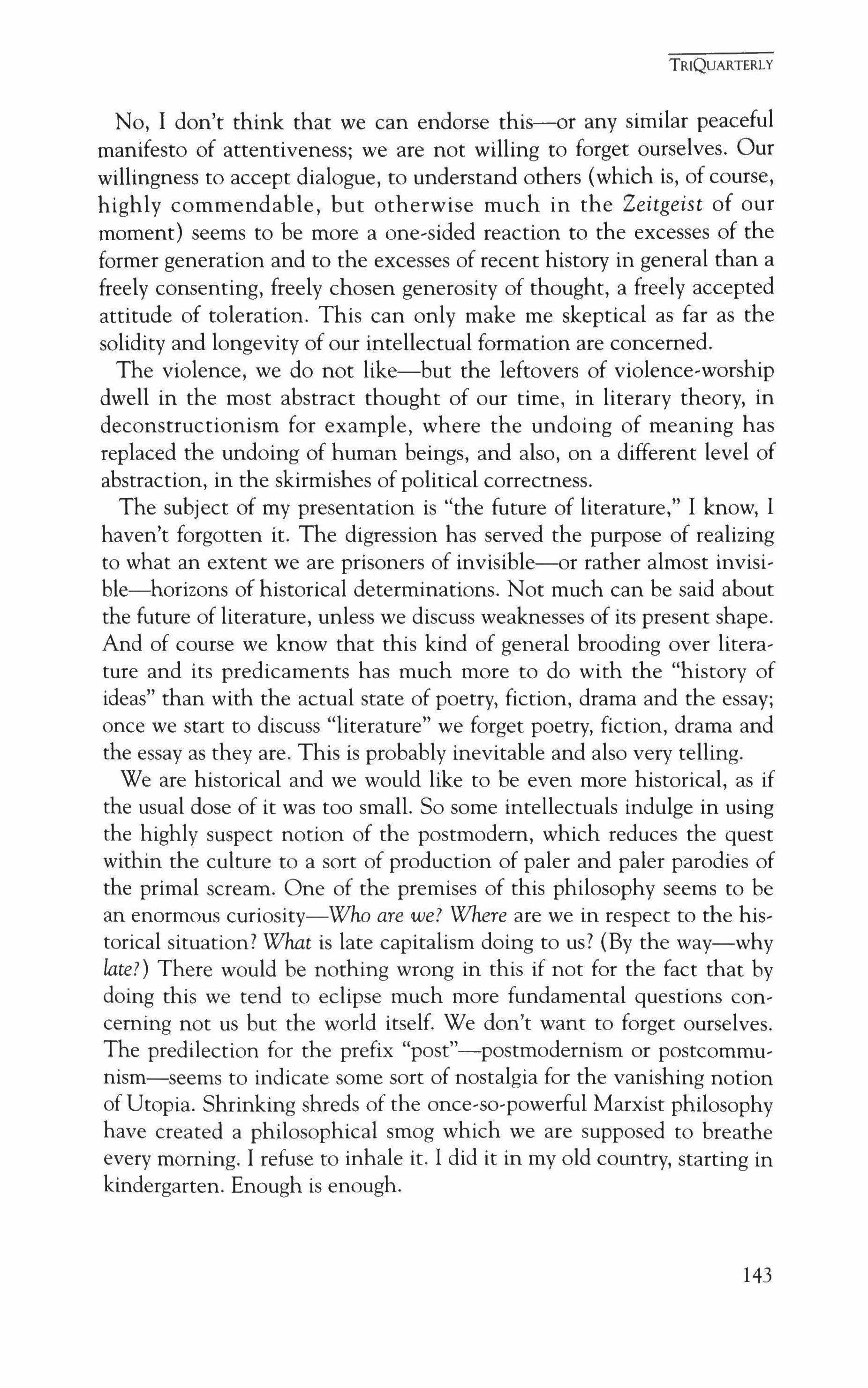
No, I don't think that we can endorse this-or any similar peaceful manifesto of attentiveness; we are not willing to forget ourselves. Our willingness to accept dialogue, to understand others (which is, of course, highly commendable, but otherwise much in the Zeitgeist of our moment) seems to be more a one-sided reaction to the excesses of the former generation and to the excesses of recent history in general than a freely consenting, freely chosen generosity of thought, a freely accepted attitude of toleration. This can only make me skeptical as far as the solidity and longevity of our intellectual formation are concerned.
The violence, we do not like-but the leftovers of violence-worship dwell in the most abstract thought of our time, in literary theory, in deconstructionism for example, where the undoing of meaning has replaced the undoing of human beings, and also, on a different level of abstraction, in the skirmishes of political correctness.
The subject of my presentation is "the future of literature," I know, I haven't forgotten it. The digression has served the purpose of realizing to what an extent we are prisoners of invisible-or rather almost invisible-horizons of historical determinations. Not much can be said about the future of literature, unless we discuss weaknesses of its present shape. And of course we know that this kind of general brooding over literature and its predicaments has much more to do with the "history of ideas" than with the actual state of poetry, fiction, drama and the essay; once we start to discuss "literature" we forget poetry, fiction, drama and the essay as they are. This is probably inevitable and also very telling.
We are historical and we would like to be even more historical, as if the usual dose of it was too small. So some intellectuals indulge in using the highly suspect notion of the postmodern, which reduces the quest within the culture to a sort of production of paler and paler parodies of the primal scream. One of the premises of this philosophy seems to be an enormous curiosity-Who are we? Where are we in respect to the historical situation? What is late capitalism doing to us? (By the way-why late?) There would be nothing wrong in this if not for the fact that by doing this we tend to eclipse much more fundamental questions concerning not us but the world itself. We don't want to forget ourselves. The predilection for the prefix "post"-postmodernism or postcommunism-seems to indicate some sort of nostalgia for the vanishing notion of Utopia. Shrinking shreds of the once-so-powerful Marxist philosophy have created a philosophical smog which we are supposed to breathe every morning. I refuse to inhale it. I did it in my old country, starting in kindergarten. Enough is enough.
TRIQUARTERLY
143
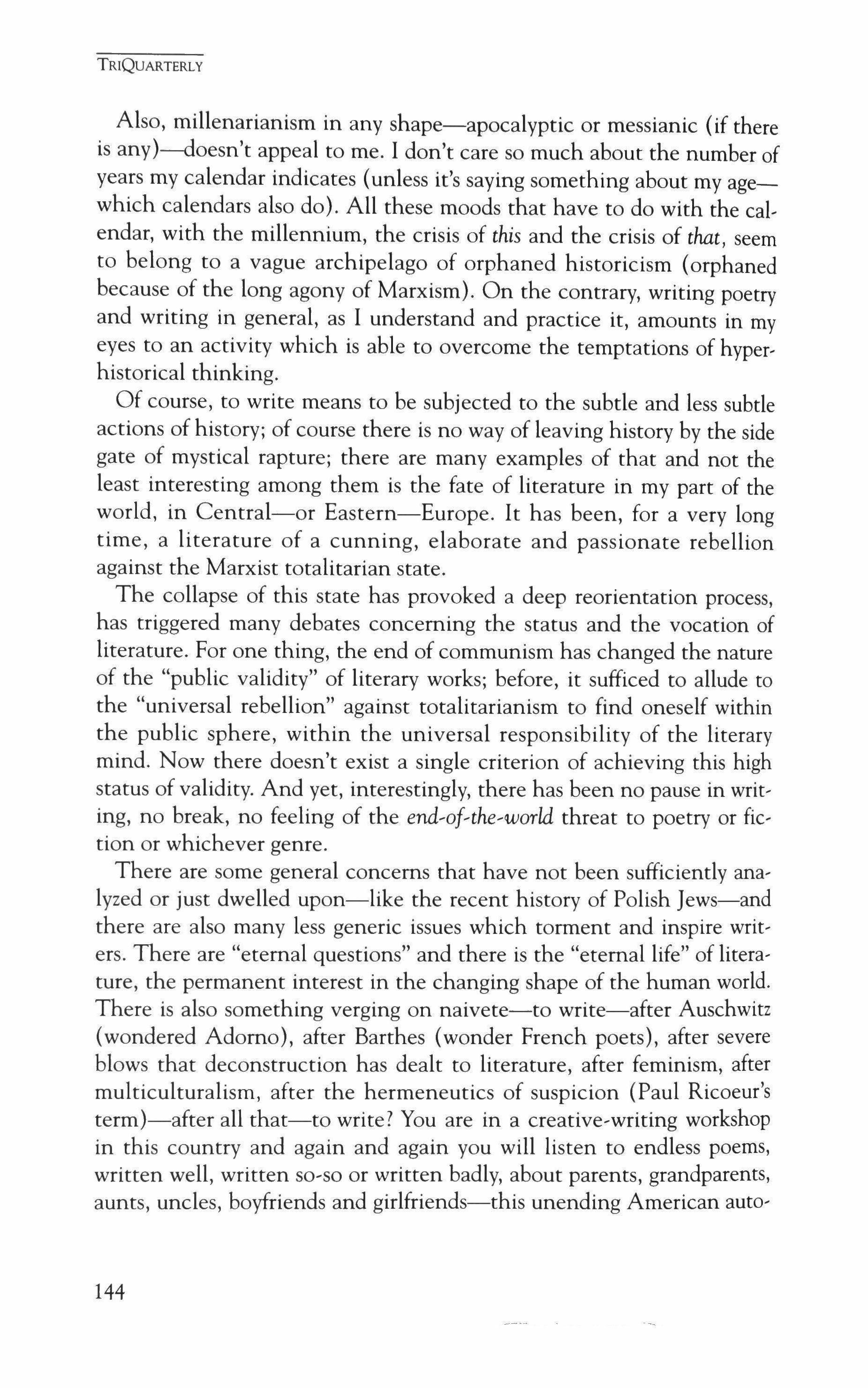
Also, millenarianism in any shape-apocalyptic or messianic (if there is any}--doesn't appeal to me. I don't care so much about the number of years my calendar indicates (unless it's saying something about my agewhich calendars also do). All these moods that have to do with the calendar, with the millennium, the crisis of this and the crisis of that, seem to belong to a vague archipelago of orphaned historicism (orphaned because of the long agony of Marxism). On the contrary, writing poetry and writing in general, as I understand and practice it, amounts in my eyes to an activity which is able to overcome the temptations of hyperhistorical thinking.
Of course, to write means to be subjected to the subtle and less subtle actions of history; of course there is no way of leaving history by the side gate of mystical rapture; there are many examples of that and not the least interesting among them is the fate of literature in my part of the world, in Central-or Eastern-Europe. It has been, for a very long time, a literature of a cunning, elaborate and passionate rebellion against the Marxist totalitarian state.
The collapse of this state has provoked a deep reorientation process, has triggered many debates concerning the status and the vocation of literature. For one thing, the end of communism has changed the nature of the "public validity" of literary works; before, it sufficed to allude to the "universal rebellion" against totalitarianism to find oneself within the public sphere, within the universal responsibility of the literary mind. Now there doesn't exist a single criterion of achieving this high status of validity. And yet, interestingly, there has been no pause in writing, no break, no feeling of the end-ofthe-world threat to poetry or fiction or whichever genre.
There are some general concerns that have not been sufficiently analyzed or just dwelled upon-like the recent history of Polish Jews-and there are also many less generic issues which torment and inspire writers. There are "eternal questions" and there is the "eternal life" of literature, the permanent interest in the changing shape of the human world. There is also something verging on naivete-to write-after Auschwitz (wondered Adorno), after Barthes (wonder French poets), after severe blows that deconstruction has dealt to literature, after feminism, after multiculturalism, after the hermeneutics of suspicion (Paul Ricoeur's term}-after all that-to write? You are in a creative-writing workshop in this country and again and again you will listen to endless poems, written well, written so-so or written badly, about parents, grandparents, aunts, uncles, boyfriends and girlfriends-this unending American auto-
TRIQUARTERLY
144
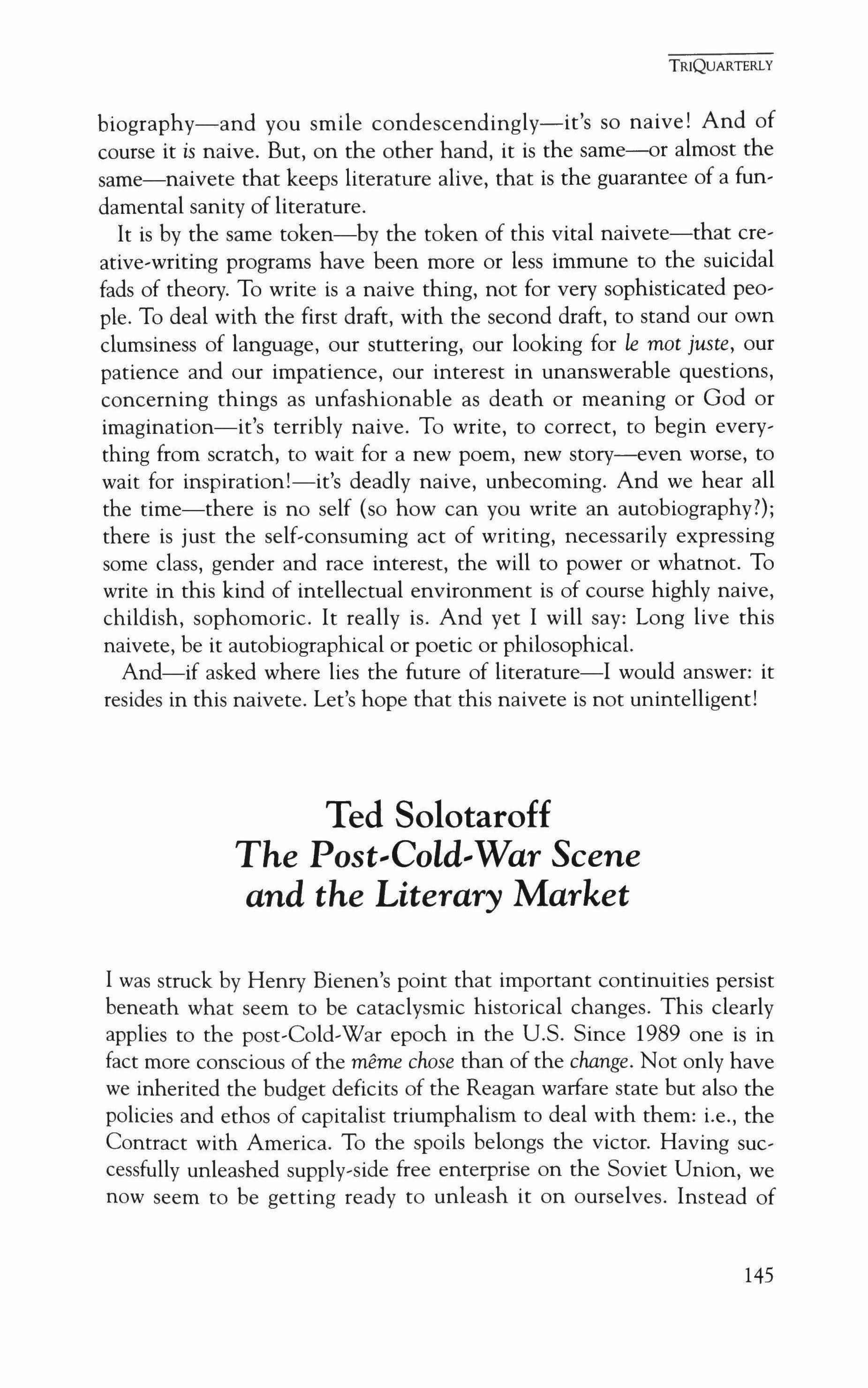
biography-and you smile condescendingly-it's so naive! And of course it is naive. But, on the other hand, it is the same-or almost the same-naivete that keeps literature alive, that is the guarantee of a fundamental sanity of literature.
It is by the same token-by the token of this vital naivete-that creative-writing programs have been more or less immune to the suicidal fads of theory. To write is a naive thing, not for very sophisticated people. To deal with the first draft, with the second draft, to stand our own clumsiness of language, our stuttering, our looking for le mot juste, our patience and our impatience, our interest in unanswerable questions, concerning things as unfashionable as death or meaning or God or imagination-it's terribly naive. To write, to correct, to begin everything from scratch, to wait for a new poem, new story-even worse, to wait for inspiration!-it's deadly naive, unbecoming. And we hear all the time-there is no self (so how can you write an autobiography?); there is just the self-consuming act of writing, necessarily expressing some class, gender and race interest, the will to power or whatnot. To write in this kind of intellectual environment is of course highly naive, childish, sophomoric. It really is. And yet I will say: Long live this naivete, be it autobiographical or poetic or philosophical. And-if asked where lies the future of literature-I would answer: it resides in this naivete. Let's hope that this naivete is not unintelligent!
Ted Solotaroff
The Post--Cold--War Scene and the Literary Market
I was struck by Henry Bienen's point that important continuities persist beneath what seem to be cataclysmic historical changes. This clearly applies to the post-Cold-War epoch in the u.s. Since 1989 one is in fact more conscious of the rnerne chose than of the change. Not only have we inherited the budget deficits of the Reagan warfare state but also the policies and ethos of capitalist triumphalism to deal with them: i.e., the Contract with America. To the spoils belongs the victor. Having successfully unleashed supply-side free enterprise on the Soviet Union, we now seem to be getting ready to unleash it on ourselves. Instead of
TRIQUARTERLY
145
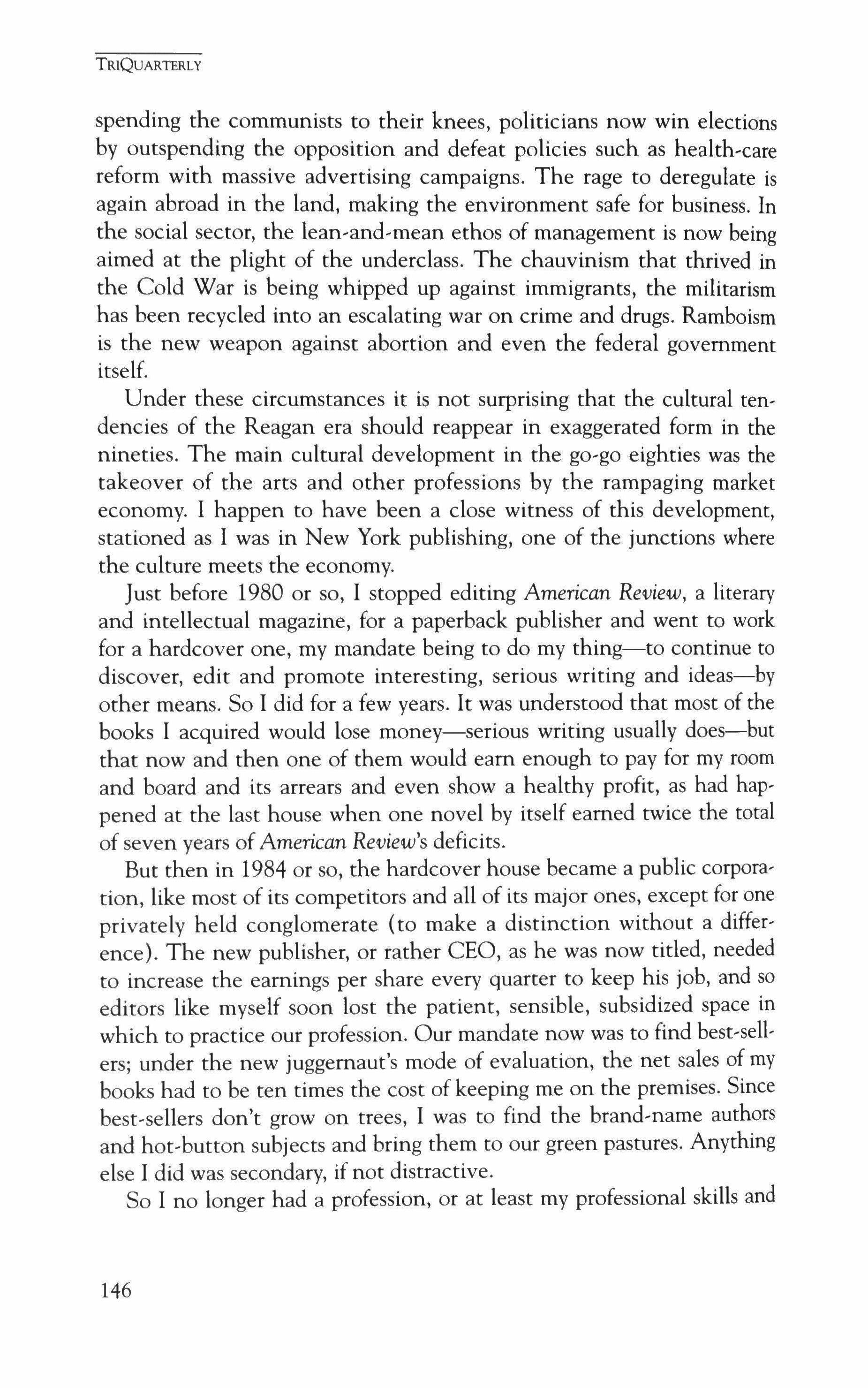
spending the communists to their knees, politicians now win elections by outspending the opposition and defeat policies such as health-cars reform with massive advertising campaigns. The rage to deregulate is again abroad in the land, making the environment safe for business. In the social sector, the lean-and-mean ethos of management is now being aimed at the plight of the underclass. The chauvinism that thrived in the Cold War is being whipped up against immigrants, the militarism has been recycled into an escalating war on crime and drugs. Ramboism is the new weapon against abortion and even the federal government itself.
Under these circumstances it is not surprising that the cultural ten, dencies of the Reagan era should reappear in exaggerated form in the nineties. The main cultural development in the go,go eighties was the takeover of the arts and other professions by the rampaging market economy. I happen to have been a close witness of this development, stationed as I was in New York publishing, one of the junctions where the culture meets the economy.
Just before 1980 or so, I stopped editing American Review, a literary and intellectual magazine, for a paperback publisher and went to work for a hardcover one, my mandate being to do my thing-to continue to discover, edit and promote interesting, serious writing and ideas-by other means. So I did for a few years. It was understood that most of the books I acquired would lose money-serious writing usually does-but that now and then one of them would earn enough to pay for my room and board and its arrears and even show a healthy profit, as had hap' pened at the last house when one novel by itself earned twice the total of seven years of American Review's deficits.
But then in 1984 or so, the hardcover house became a public corpora' tion, like most of its competitors and all of its major ones, except for one privately held conglomerate (to make a distinction without a difference). The new publisher, or rather CEO, as he was now titled, needed to increase the earnings per share every quarter to keep his job, and so editors like myself soon lost the patient, sensible, subsidized space in which to practice our profession. Our mandate now was to find best'sellers; under the new juggernaut's mode of evaluation, the net sales of my books had to be ten times the cost of keeping me on the premises. Since best-sellers don't grow on trees, I was to find the brand-name authors and hot-button subjects and bring them to our green pastures. Anything else I did was secondary, if not distractive.
So I no longer had a profession, or at least my professional skills and
TRIQUARTERLY
146
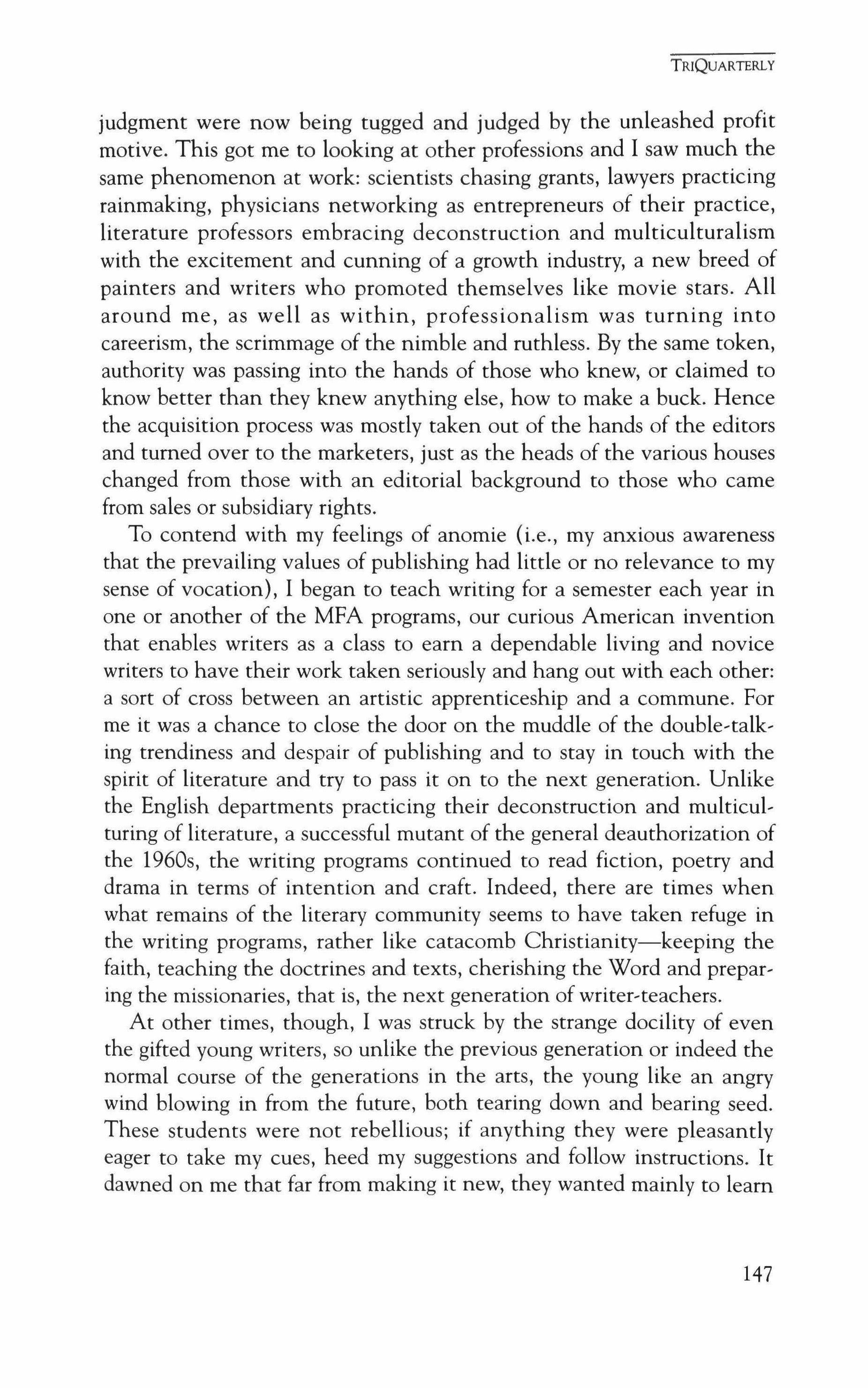
judgment were now being tugged and judged by the unleashed profit motive. This got me to looking at other professions and I saw much the same phenomenon at work: scientists chasing grants, lawyers practicing rainmaking, physicians networking as entrepreneurs of their practice, literature professors embracing deconstruction and multiculturalism with the excitement and cunning of a growth industry, a new breed of painters and writers who promoted themselves like movie stars. All around me, as well as within, professionalism was turning into careerism, the scrimmage of the nimble and ruthless. By the same token, authority was passing into the hands of those who knew, or claimed to know better than they knew anything else, how to make a buck. Hence the acquisition process was mostly taken out of the hands of the editors and turned over to the marketers, just as the heads of the various houses changed from those with an editorial background to those who came from sales or subsidiary rights.
To contend with my feelings of anomie (i.e., my anxious awareness that the prevailing values of publishing had little or no relevance to my sense of vocation), I began to teach writing for a semester each year in one or another of the MFA programs, our curious American invention that enables writers as a class to earn a dependable living and novice writers to have their work taken seriously and hang out with each other: a sort of cross between an artistic apprenticeship and a commune. For me it was a chance to close the door on the muddle of the double-talking trendiness and despair of publishing and to stay in touch with the spirit of literature and try to pass it on to the next generation. Unlike the English departments practicing their deconstruction and multiculturing of literature, a successful mutant of the general deauthorization of the 1960s, the writing programs continued to read fiction, poetry and drama in terms of intention and craft. Indeed, there are times when what remains of the literary community seems to have taken refuge in the writing programs, rather like catacomb Christianity-keeping the faith, teaching the doctrines and texts, cherishing the Word and preparing the missionaries, that is, the next generation of writer-teachers.
At other times, though, I was struck by the strange docility of even the gifted young writers, so unlike the previous generation or indeed the normal course of the generations in the arts, the young like an angry wind blowing in from the future, both tearing down and bearing seed. These students were not rebellious; if anything they were pleasantly eager to take my cues, heed my suggestions and follow instructions. It dawned on me that far from making it new, they wanted mainly to learn
TRIQUARTERLY
147

how to make it marketable. As my colleague at Columbia, the poet William Matthews, put it, "What they really want is to be like us"-Le., situated at the pleasant point peak where one has both a literary life and a living. (Little did they realize how treacherous it was.) If they turned out to be the next Ethan Canin or Mona Simpson, best-selling young authors of the time, so much the better.
This was more true of the male writers. The better female ones often had an edge of purpose and passion, the cutting edge of a feminist Weltanshiiung in the making. But both groups wrote in much the same mode of domestic realism, whether urban or rural, that was in fashion at the better-paying magazines. Though postmodernism was thriving next door in the English Department, it was already over or had never happened here. Beckett, Barth, Barthelme, Borges, Pynchon, Nabokov, Gass, Grass, Sontag, Kundera, whose fiction had been all the rage in the 1970s, didn't so much as darken the door of most of these young literary minds. The only innovation that seemed interesting to them was writing in the present tense, which accorded with the structure of their consciousness-shaped by the visual and the visceral and tuned to the vibes of the cultural moment. They were immensely conversant with popular culture and very spotty and rather tongue-tied about the culture of the past. Their umbilical connection to TV and film produced a characteristic style that was vigorous, flashy, boldly imagistic but without much underneath it, the depths where the tradition lives and works in narrative and poetry: their strength was in registering current experience, their weakness was in judging it or bringing ideas to bear on it. When I tried to point out this limitation, it was often difficult to make myself understood. I was talking about "literature," which is a telegraph system between the writer and the tradition that most matters to him or her, and they were talking about "writing"-a kind of cordless phone to the present. There was little gain for them in literature and much gain, they thought, in writing. Literature took a long time to learn how to do and even longer to get published; writing didn't, in either respect, judging by the example of their influential cohorts, the so-called Brat Pack. Their generational experience, steeped in the market economy, was telling them to write the type of stories and novels that paid.
The kind of writers I taught in the eighties have been publishing their novels and collections of stories in recent years. Their tales from the private life of the white middle class form one of the two streams of the fiction of the nineties, at least as it's reviewed in the New York Times Book Review, where their bland reviews of each other's account of a
TRIQUARTERLY
148

divorce-scarred adolescence, child or spousal abuse, sexual adventure, big-city life and careers, suburban disorder and rural nostalgia, et cetera, appear in the middle pages, the review almost indistinguishable from the quoted passages. I'm not in publishing anymore, but I guess there is an insatiable demand for what is called upmarket women's fiction, particularly if it deals with the inner child. Meanwhile, many of the quality male writers who have stayed the course find it increasingly difficult to be published by the big-time houses.
White heterosexual males are our new minority group, ascendant in politics, descendent in culture. The right has Congress, many of the large state governments and talk radio; the left has the campuses and the cities, where strange and not-so-strange versions of social struggle persist. If the avant-garde as understood by modernism has disappeared with it, the vanguard of postmodernism is emerging as a ferment of multiculturalism, which along with the ethnic and racial minorities includes the feminist and gay ones. One of the ironic paradoxes of capitalist triumphalism is that it fosters as a market what it seeks to curb or neutralize as politics. The most glaring example is rap music, but one sees multiculturalism driving educational and academic publishing and increasing literary publishing, as well as the theater. It is not uncommon for a novel or memoir by a young writer of color, particularly a woman, to receive an advance of $100,000 or more in the hope that she will tum out to be the next Maya Angelou or Louise Erdrich or Amy Tan.
This development illustrates the point that Elisabeth Sifton made at this conference about the major role that American writers have played in our nation of minority and regional cultures in defining, replenishing and complicating American identity. But in our time of swirling groupidentity consciousness pressing for expression, particularly on campuses, writers tend to be increasingly regarded by their identity tags drawn from the gender, racial, ethnic or sexual-orientation content of their work. John Updike, Saul Bellow, Robert Stone become white male writers, hence of relatively little interest. The driving interest and market are elsewhere. Alice Walker, Toni Morrison, John Edgar Wideman, Maxine Hong Kingston, James Welch, Leslie Silko, Louise Erdrich, Rudolfo Anaya, Cristina Garcia, Oscar Hijuelos, Amy Tan, the list goes on and on of the new wave of multicultural fiction that is cresting in our midst. The American theater today is the home of much of the same rainbow coalition, and is dominated by the most together and vocal of the minority communities, who have made Off Broadway into a parish of its afflicted and dying and even produced the one serious American
TRIQUARTERLY
149
play that has managed to hold the Broadway stage.
An article a few months ago in the New York Times Magazine vigorously describes the first stage of a populist movement in poetry, much of it the direct, demotic, very vocal voices of the street culture, news from the heart of the inner city mostly, loose in form, tight in feeling, telling it like it is, heavy in the rhythm section, language meant to be heardin both senses. Its center is in places like the Nuyorican Poets Cafe, which holds vocal poetry contests called "slams," a phenomenon that is spreading across the country. Some of its poets are beginning to appear in the New Yorker, the arbiter of what's in, and to be published by the trade, and shortly there will be anthologies of street poetry to place alongside those of Latino, Chicano, Native American, Asian-American, Afro-American and Caribbean-American, that jam the college bookstore because they're taught and read.
So though I don't think that we're at the end of an epoch politically, I suspect we may be so culturally. The battle is being joined once again between our palefaces and redskins, the party of standards versus the party of energy. It is a troubled time for literary culture. What is most troubling, perhaps, is a vision of the force of unleashed capitalism disseminating a literature that will be read by the flames ("Burn, Baby, Burn") of its war on the impoverished.
Josef Kroutvor Prague Report: Literature Remains Alive and Well
Translated by Richard Drury
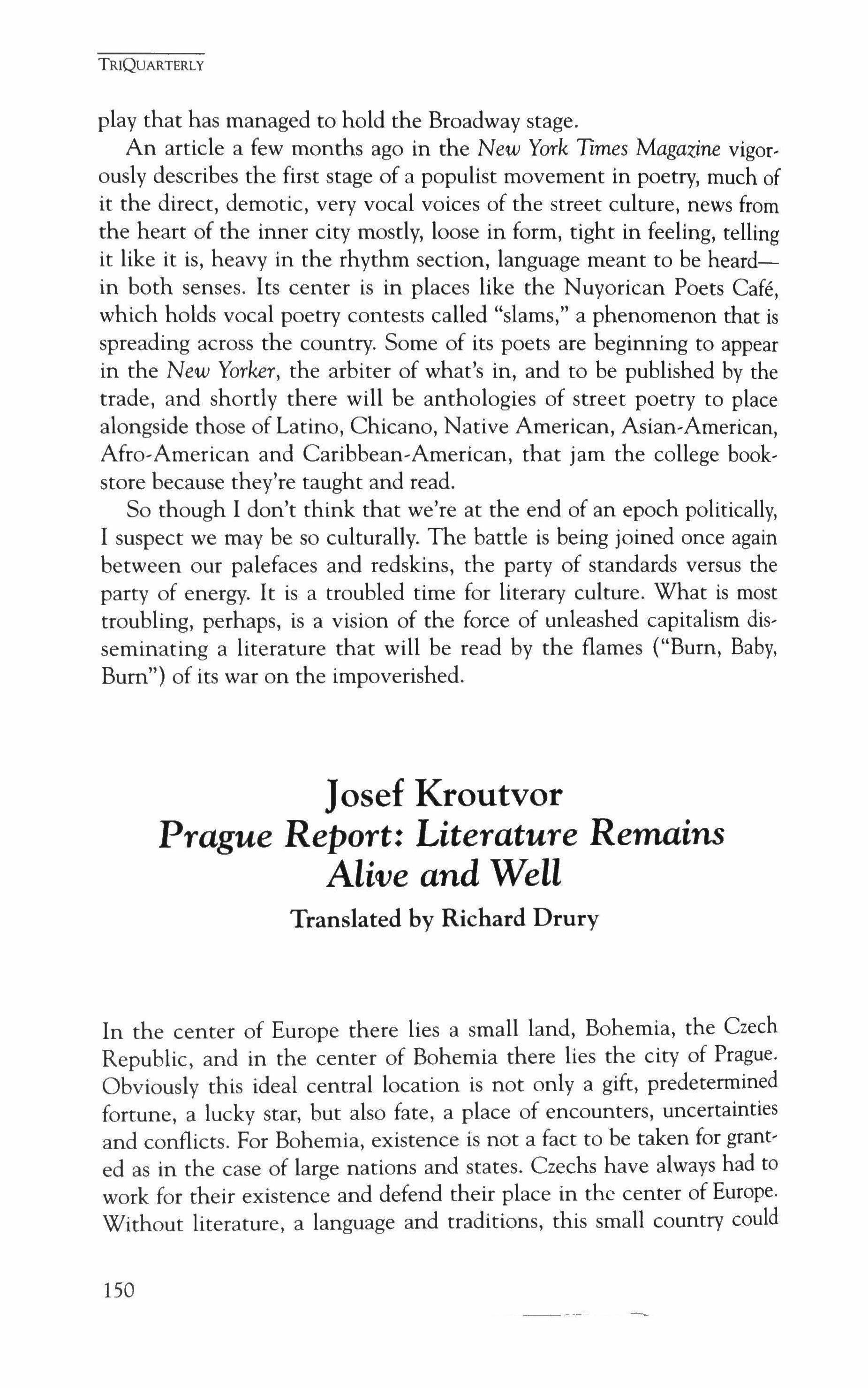
In the center of Europe there lies a small land, Bohemia, the Czech Republic, and in the center of Bohemia there lies the city of Prague. Obviously this ideal central location is not only a gift, predetermined fortune, a lucky star, but also fate, a place of encounters, uncertainties and conflicts. For Bohemia, existence is not a fact to be taken for granted as in the case of large nations and states. Czechs have always had to work for their existence and defend their place in the center of Europe. Without literature, a language and traditions, this small country could
TRIQUARTERLY
150

hardly have survived.
It seems that modem Czech literature of the nineteenth and twentieth century provides a suitable model for the study of the necessity of the written word. Towards the end of the eighteenth century, the Germanification of the Czech lands had reached such an extent that it appeared that the Czechs would lose their national identity. However, the enthusiasm of a small number of patriots resurrected the language, which was by that time spoken only by the rural population and crafts, men.
The beginnings of modem Czech literature were not auspiciouspatriots arranged a wide variety of discussion groups, small celebrations and balls, composing poetry in the style of declamatory verse and com, memorative odes. If we read these naive texts today, we cannot help smiling, since it was rather a matter of playing at literature than of liter, ature itself. Nevertheless, the cultural merit of those patriots is beyond doubt.
Only one poet outshone his contemporaries in the 1830s-Karel Hynek Macha. Of course Macha was neither accepted nor understood in his day, and was even condemned by patriots as a mysterious and obscure poet. This great romantic and admirer of Byron liberated poetry from primitive patriotic verse and thus laid the foundation for new liter, ary values and criteria. The notion of culture is not always covered by the notion of art, since culture as the cultural endeavor is within our power, but the spirit of art is only in the power of a true artist and poet.
Forgotten are those artists who faithfully submitted their work to their time. Celebrated, however, is Macha, who broke away from his era and created for the future. The poetry of Karel Hynek Macha is linked like a ritual with spring, with fresh blossoming and hopes, even though the poet knew that a human calling was in vain. Love and death create a unity of life and work, since only in opposites can one grasp the mean, ing of human existence.
Macha is read over and over in Bohemia, his verse repeated a hundred times without thinking, though it is, however, also experienced as a living literary witness and message. Each new generation of readers must discover Macha for itself and adopt his work in its own way. Macha's work is like a mirror placed before the reader, a mirror in which symbol, ists, decadents and, later, the modernists and surrealists discerned them, selves. Left-wing-oriented avant-garde writers elevated Macha in the 1930s to the status of an international revolutionary. Existentialists were able to find in him the first Czech existentialist, while dissidents in the
TRIQUARTERLY
151
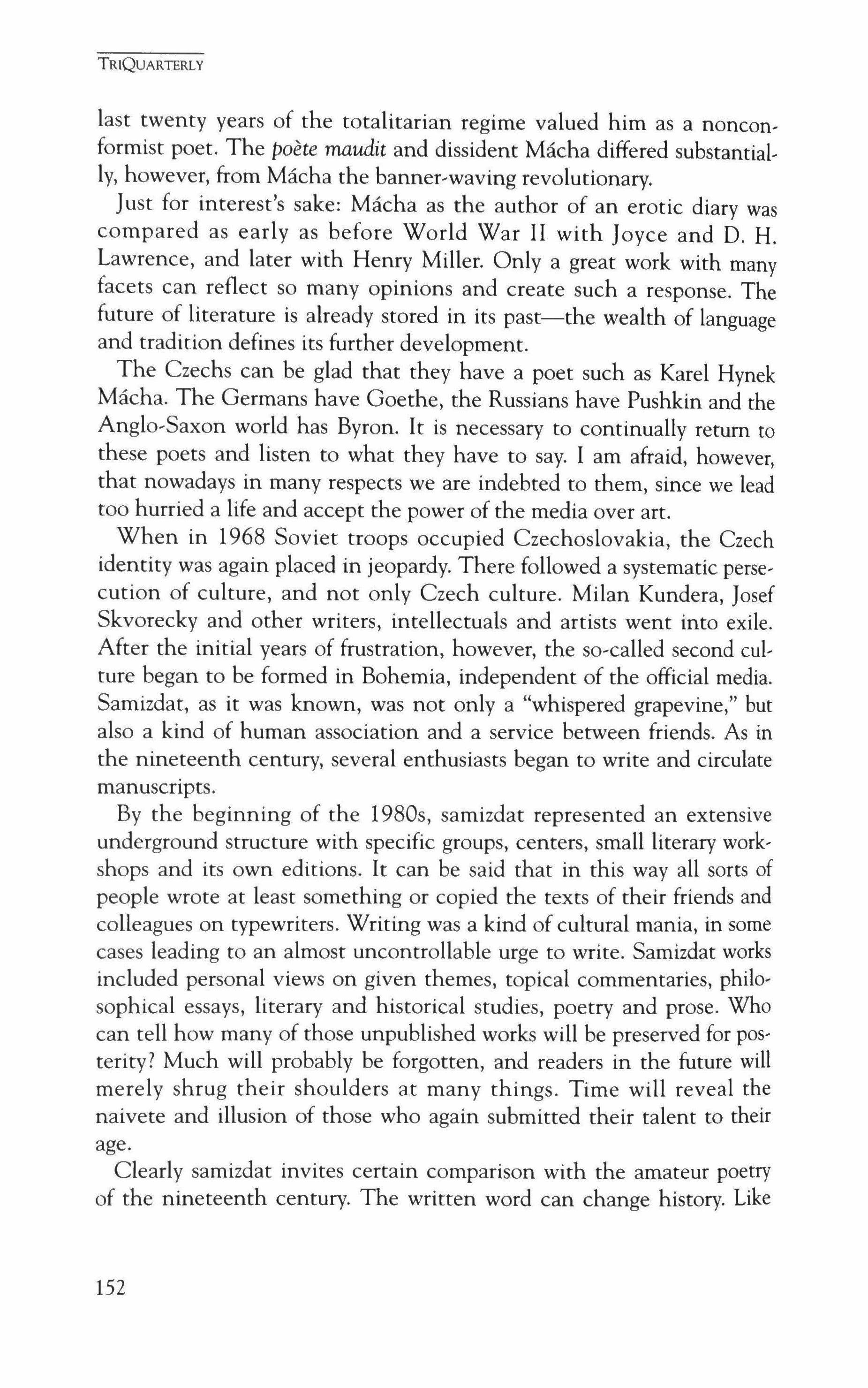
last twenty years of the totalitarian regime valued him as a nonconformist poet. The poete maudit and dissident Macha differed substantially, however, from Macha the banner-waving revolutionary.
Just for interest's sake: Macha as the author of an erotic diary was compared as early as before World War II with Joyce and D. H. Lawrence, and later with Henry Miller. Only a great work with many facets can reflect so many opinions and create such a response. The future of literature is already stored in its past-the wealth of language and tradition defines its further development.
The Czechs can be glad that they have a poet such as Karel Hynek Macha. The Germans have Goethe, the Russians have Pushkin and the Anglo-Saxon world has Byron. It is necessary to continually return to these poets and listen to what they have to say. I am afraid, however, that nowadays in many respects we are indebted to them, since we lead too hurried a life and accept the power of the media over art.
When in 1968 Soviet troops occupied Czechoslovakia, the Czech identity was again placed in jeopardy. There followed a systematic persecution of culture, and not only Czech culture. Milan Kundera, Josef Skvorecky and other writers, intellectuals and artists went into exile. After the initial years of frustration, however, the so-called second culture began to be formed in Bohemia, independent of the official media. Samizdat, as it was known, was not only a "whispered grapevine," but also a kind of human association and a service between friends. As in the nineteenth century, several enthusiasts began to write and circulate manuscripts.
By the beginning of the 1980s, samizdat represented an extensive underground structure with specific groups, centers, small literary workshops and its own editions. It can be said that in this way all sorts of people wrote at least something or copied the texts of their friends and colleagues on typewriters. Writing was a kind of cultural mania, in some cases leading to an almost uncontrollable urge to write. Samizdat works included personal views on given themes, topical commentaries, philosophical essays, literary and historical studies, poetry and prose. Who can tell how many of those unpublished works will be preserved for posterity? Much will probably be forgotten, and readers in the future will merely shrug their shoulders at many things. Time will reveal the naivete and illusion of those who again submitted their talent to their age.
Clearly samizdat invites certain comparison with the amateur poetry of the nineteenth century. The written word can change history. Like
TRIQUARTERLY
152
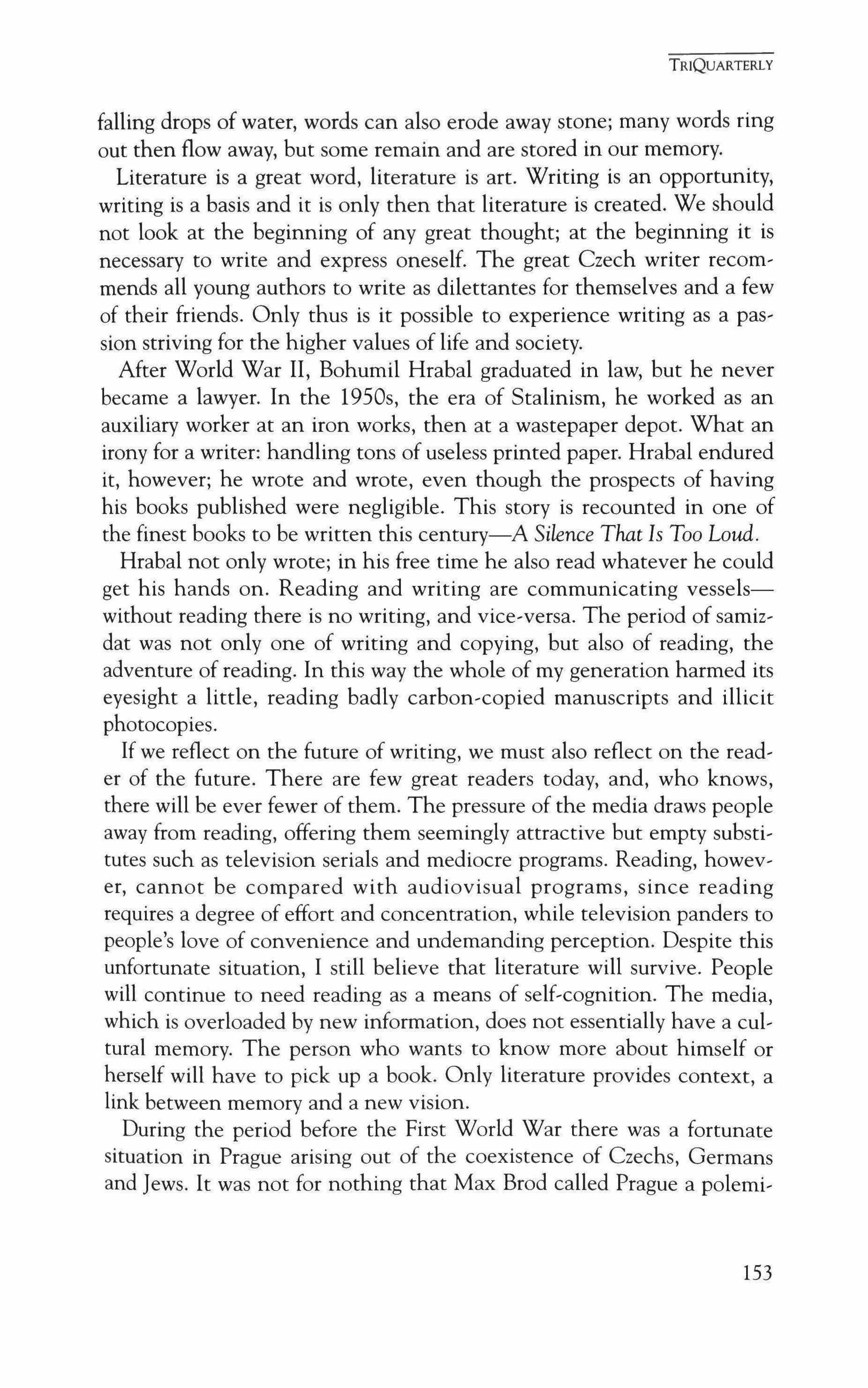
falling drops of water, words can also erode away stone; many words ring out then flow away, but some remain and are stored in our memory.
Literature is a great word, literature is art. Writing is an opportunity, writing is a basis and it is only then that literature is created. We should not look at the beginning of any great thought; at the beginning it is necessary to write and express oneself. The great Czech writer recommends all young authors to write as dilettantes for themselves and a few of their friends. Only thus is it possible to experience writing as a passion striving for the higher values of life and society.
After World War II, Bohumil Hrabal graduated in law, but he never became a lawyer. In the 1950s, the era of Stalinism, he worked as an auxiliary worker at an iron works, then at a wastepaper depot. What an irony for a writer: handling tons of useless printed paper. Hrabal endured it, however; he wrote and wrote, even though the prospects of having his books published were negligible. This story is recounted in one of the finest books to be written this century-A Silence That Is Too Loud.
Hrabal not only wrote; in his free time he also read whatever he could get his hands on. Reading and writing are communicating vesselswithout reading there is no writing, and vice-versa. The period of samizdat was not only one of writing and copying, but also of reading, the adventure of reading. In this way the whole of my generation harmed its eyesight a little, reading badly carbon-copied manuscripts and illicit photocopies.
If we reflect on the future of writing, we must also reflect on the reader of the future. There are few great readers today, and, who knows, there will be ever fewer of them. The pressure of the media draws people away from reading, offering them seemingly attractive but empty substitutes such as television serials and mediocre programs. Reading, however' cannot be compared with audiovisual programs, since reading requires a degree of effort and concentration, while television panders to people's love of convenience and undemanding perception. Despite this unfortunate situation, I still believe that literature will survive. People will continue to need reading as a means of self-cognition. The media, which is overloaded by new information, does not essentially have a cultural memory. The person who wants to know more about himself or herself will have to pick up a book. Only literature provides context, a link between memory and a new vision.
During the period before the First World War there was a fortunate situation in Prague arising out of the coexistence of Czechs, Germans and Jews. It was not for nothing that Max Brod called Prague a polerni-
TRIQUARTERLY
153

cal city. The whole world now knows Franz Kafka, a Prague citizen par excellence, though there are other literary figures who are just as interesting, whether one is talking of the twenties, thirties, sixties, or the present day. Prague is a literary city, so the future of literature is its question also.
Since the fall of the Czechoslovak totalitarian regime in 1989 much has changed, and commercial pressure has begun to be exerted on literature. The readership of the Czech Literary News, once an important weekly, has dropped significantly. People say that they have no time for reading, and even that they doubt the meaning of literature. The media are expanding their sphere of influence, while television has a large degree of control over cultural life, which it often also manipulates. Meanwhile, literary reviews fight for survival and the publication of fine books is often marked by difficulties. The invisible hand of market forces is not one that treats culture gently-freedom of expression also has its downside.
Since the 1989 Revolution, Prague has attracted many young Americans--one estimate puts the number at around 66,000. This community already has its own newspapers, radio stations, clubs and meeting places. Prague, a city with tradition and culture, is even compared with Paris of the twenties and thirties. The Americans in Prague are an entity, a legend. In Prague the first American stories have already been written, and will doubtless be followed by more. This also represents the future of literature, one which knows no bounds. There is probably no need to fear for the future of literature; the need to read and write is as strong as the need to love. Literature is a strong and beautiful passion, it is a message aimed at the reader of the future. The future of literature is not in the stars but in the human soul, in tradition and cultural values. We should not jump ahead of our time, but rather we should let ourselves be surprised and captivated by our new experiences.
TRIQUARTERLY
154
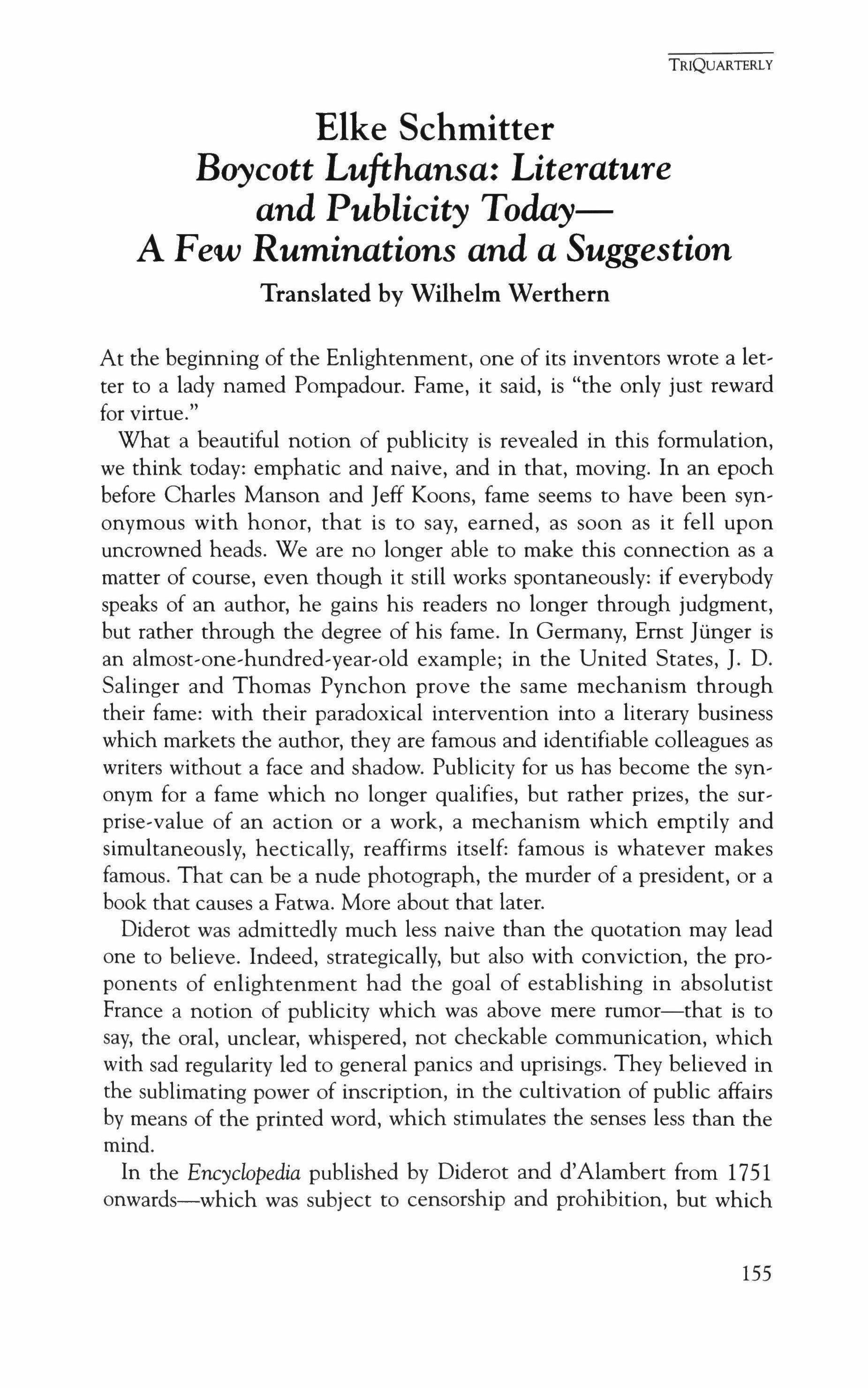
Eike Schmitter Boycott Lufthansa: Literature and Publicity TodayA Few Ruminations and a Suggestion
Translated by Wilhelm Werthern
At the beginning of the Enlightenment, one of its inventors wrote a letter to a lady named Pompadour. Fame, it said, is "the only just reward for virtue."
What a beautiful notion of publicity is revealed in this formulation, we think today: emphatic and naive, and in that, moving. In an epoch before Charles Manson and Jeff Koons, fame seems to have been synonymous with honor, that is to say, earned, as soon as it fell upon uncrowned heads. We are no longer able to make this connection as a matter of course, even though it still works spontaneously: if everybody speaks of an author, he gains his readers no longer through judgment, but rather through the degree of his fame. In Germany, Ernst Junger is an almost-one-hundred-year-old example; in the United States, J. D. Salinger and Thomas Pynchon prove the same mechanism through their fame: with their paradoxical intervention into a literary business which markets the author, they are famous and identifiable colleagues as writers without a face and shadow. Publicity for us has become the synonym for a fame which no longer qualifies, but rather prizes, the surprise-value of an action or a work, a mechanism which emptily and simultaneously, hectically, reaffirms itself: famous is whatever makes famous. That can be a nude photograph, the murder of a president, or a book that causes a Fatwa. More about that later.
Diderot was admittedly much less naive than the quotation may lead one to believe. Indeed, strategically, but also with conviction, the proponents of enlightenment had the goal of establishing in absolutist France a notion of publicity which was above mere rumor-that is to say, the oral, unclear, whispered, not checkable communication, which with sad regularity led to general panics and uprisings. They believed in the sublimating power of inscription, in the cultivation of public affairs by means of the printed word, which stimulates the senses less than the mind.
In the Encyclopedia published by Diderot and d'Alambert from 1751 onwards-which was subject to censorship and prohibition, but which
TRIQUARTERLY
155

carne out draggingly because of economic difficulties (one can see that some problems are timeless}-it says slyly and calmingly: "We must not expect from the freedom of the press the horrible consequences which in Athens followed the public speeches and in Rome the speeches of the tribunes. In his room, a man reads a book or a satire completely alone and quite calmly. There is therefore no need to fear that he will be infected by the passions and the enthusiasm of another man, nor that he will lose control because of the vehemence of a rhetorical invective. Even if he should be brought to indignation, he would nonetheless not find easy means to release his emotions freely. The freedom of the press, therefore, cannot cause unrest amongst the people, regardless of how much it may be abused."
Even at the time, such sentences were received with skepticism. Still, one can read in them an offer to the political powers, which said: "You cannot control and censor rumor, even if you yourself release one into the public in order to influence the situation. But if there is a mediated public sphere which uses progress-then you can register, censor, and prohibit it. And you have an audience which no longer runs through the streets screaming, but one which thoughtfully turns the pages and which thinks about what follows from the reading of the text."
In a certain sense, this has turned out to be true. The printed word has perhaps lost some dignity-even though the slanderous pamphlet and the true text were invented simultaneously-but the isolation does indeed have a calming effect. And-even though this is due to capitalist conditions of production and consumption rather than to political calculation-it seems to be the consequence of every new medium: if the newspaper was at the beginning read together in the cafes, and books in a cozy group around the fireplace, soon everybody could afford his own newspaper, and his own book. At its beginning, the radio assembled enthusiastic listeners, and the TV formed the center of the living-room ensemble: today one listens to or watches programs alone, or one does it interactively-also alone. Wherever a society is saturated with capitalism and media, people leave their houses less frequently. One prefers watching the demonstration on the screen. Diderot, then, was right in his speculation that information-that is to say, the technical production of publicity-does not necessarily produce public action-or an active public sphere.
Our notion of publicity is thus doubly weak or perhaps devalued: fame does not qualify anything anymore, and nothing necessarily comes of information anymore. Whether the mistrust of information in the infer-
TRIQUARTERLY
156
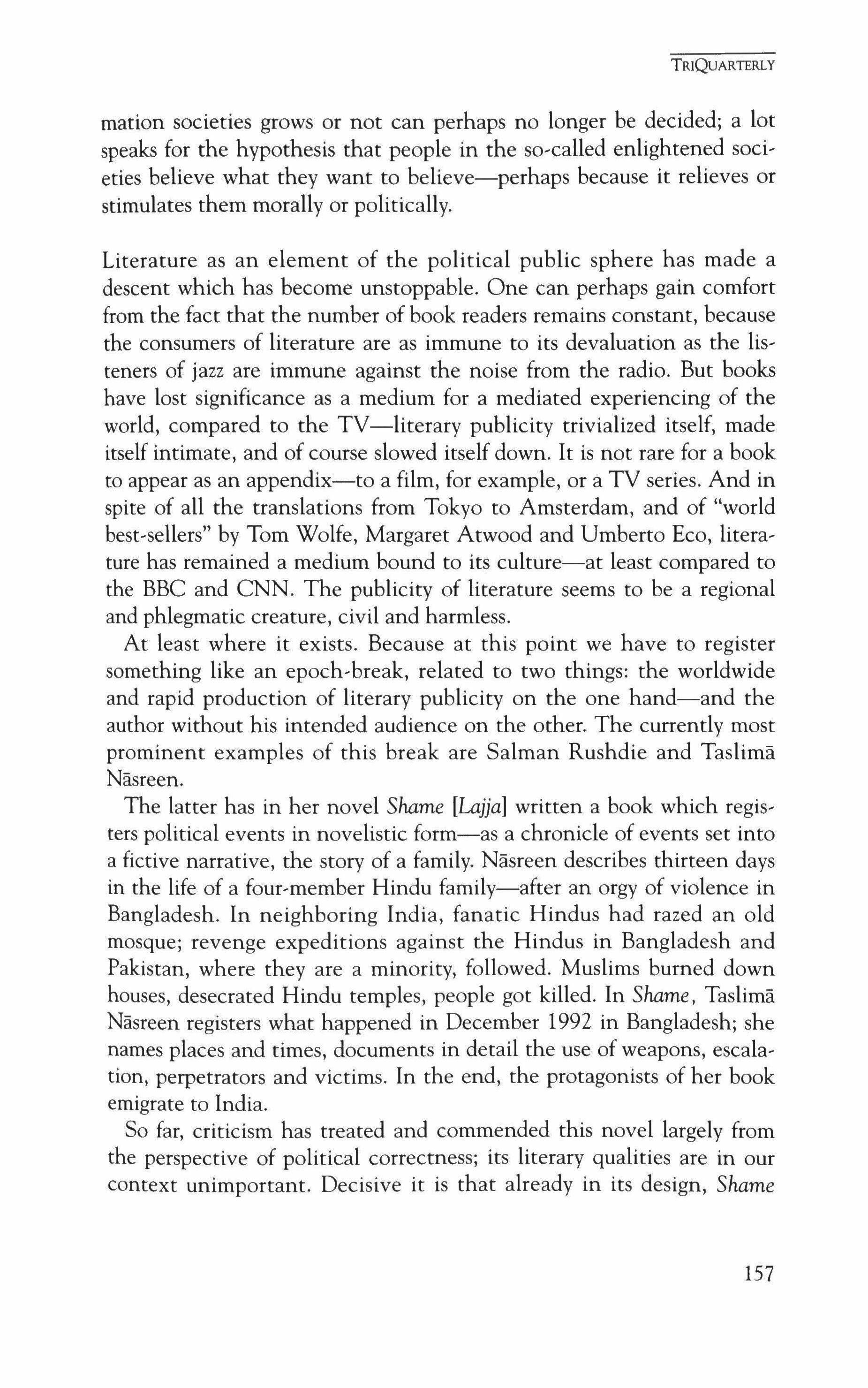
mation societies grows or not can perhaps no longer be decided; a lot speaks for the hypothesis that people in the so-called enlightened societies believe what they want to believe-perhaps because it relieves or stimulates them morally or politically.
Literature as an element of the political public sphere has made a descent which has become unstoppable. One can perhaps gain comfort from the fact that the number of book readers remains constant, because the consumers of literature are as immune to its devaluation as the listeners of jazz are immune against the noise from the radio. But books have lost significance as a medium for a mediated experiencing of the world, compared to the TV-literary publicity trivialized itself, made itself intimate, and of course slowed itself down. It is not rare for a book to appear as an appendix-to a film, for example, or a TV series. And in spite of all the translations from Tokyo to Amsterdam, and of "world best-sellers" by Tom Wolfe, Margaret Atwood and Umberto Eco, literature has remained a medium bound to its culture-at least compared to the BBC and CNN. The publicity of literature seems to be a regional and phlegmatic creature, civil and harmless.
At least where it exists. Because at this point we have to register something like an epoch-break, related to two things: the worldwide and rapid production of literary publicity on the one hand-and the author without his intended audience on the other. The currently most prominent examples of this break are Salman Rushdie and Taslima Nasreen.
The latter has in her novel Shame [Lajja] written a book which registers political events in novelistic form-as a chronicle of events set into a fictive narrative, the story of a family. Nasreen describes thirteen days in the life of a four-member Hindu family-after an orgy of violence in Bangladesh. In neighboring India, fanatic Hindus had razed an old mosque; revenge expeditions against the Hindus in Bangladesh and Pakistan, where they are a minority, followed. Muslims burned down houses, desecrated Hindu temples, people got killed. In Shame, Taslima Nasreen registers what happened in December 1992 in Bangladesh; she names places and times, documents in detail the use of weapons, escalation, perpetrators and victims. In the end, the protagonists of her book emigrate to India.
So far, criticism has treated and commended this novel largely from the perspective of political correctness; its literary qualities are in our context unimportant. Decisive it is that already in its design, Shame
TRIQUARTERLY
157
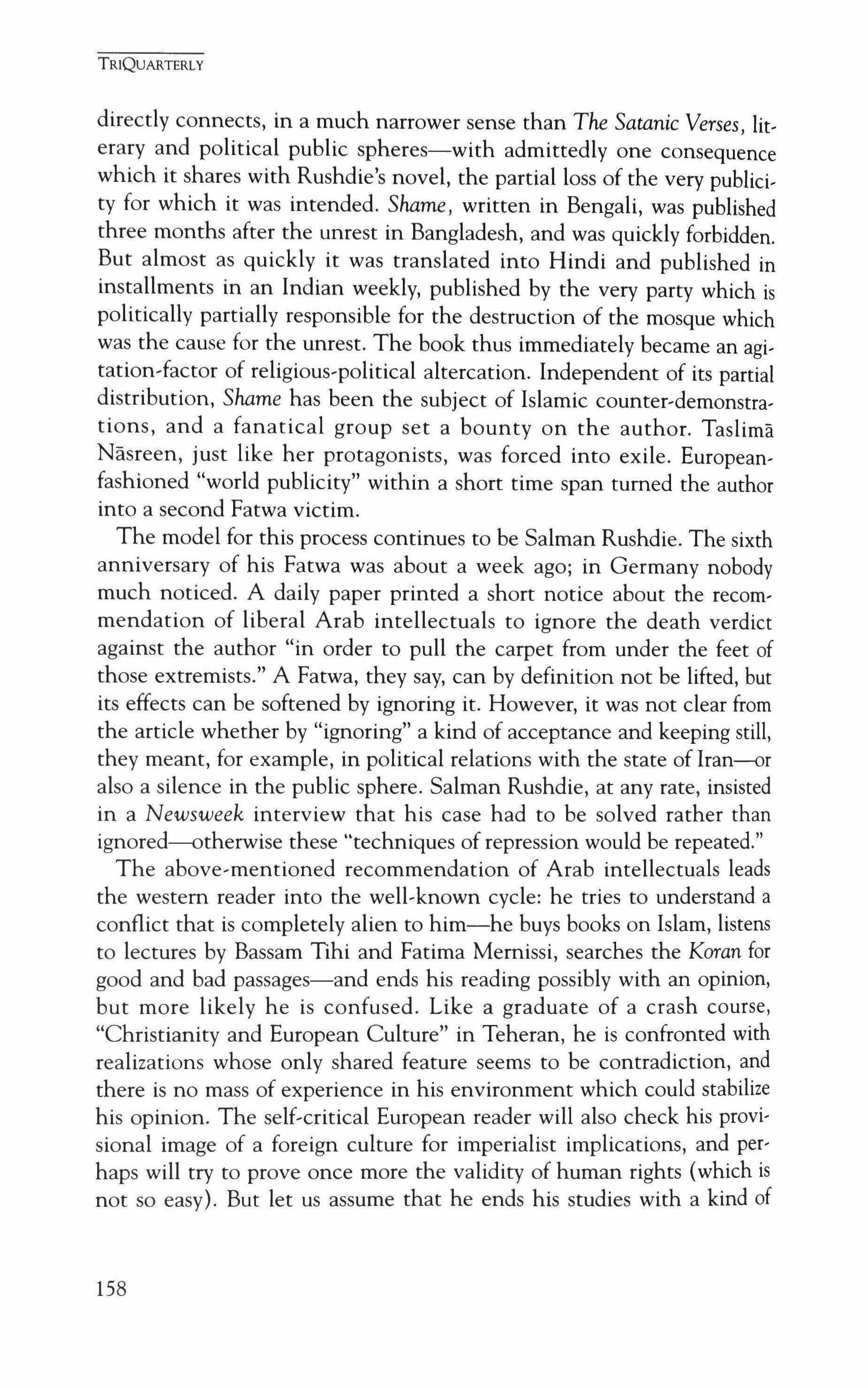
directly connects, in a much narrower sense than The Satanic Verses, literary and political public spheres-with admittedly one consequence which it shares with Rushdie's novel, the partial loss of the very publicity for which it was intended. Shame, written in Bengali, was published three months after the unrest in Bangladesh, and was quickly forbidden. But almost as quickly it was translated into Hindi and published in installments in an Indian weekly, published by the very party which is politically partially responsible for the destruction of the mosque which was the cause for the unrest. The book thus immediately became an agiration-factor of religious-political altercation. Independent of its partial distribution, Shame has been the subject of Islamic counter-dernonstrations, and a fanatical group set a bounty on the author. Taslima Nasreen, just like her protagonists, was forced into exile. Europeanfashioned "world publicity" within a short time span turned the author into a second Fatwa victim.
The model for this process continues to be Salman Rushdie. The sixth anniversary of his Fatwa was about a week ago; in Germany nobody much noticed. A daily paper printed a short notice about the recommendation of liberal Arab intellectuals to ignore the death verdict against the author "in order to pull the carpet from under the feet of those extremists." A Fatwa, they say, can by definition not be lifted, but its effects can be softened by ignoring it. However, it was not clear from the article whether by "ignoring" a kind of acceptance and keeping still, they meant, for example, in political relations with the state of Iran-or also a silence in the public sphere. Salman Rushdie, at any rate, insisted in a Newsweek interview that his case had to be solved rather than ignored-otherwise these "techniques of repression would be repeated."
The above,mentioned recommendation of Arab intellectuals leads the western reader into the well-known cycle: he tries to understand a conflict that is completely alien to him-he buys books on Islam, listens to lectures by Bassam Tihi and Fatima Mernissi, searches the Koran for good and bad passages-and ends his reading possibly with an opinion, but more likely he is confused. Like a graduate of a crash course, "Christianity and European Culture" in Teheran, he is confronted with realizations whose only shared feature seems to be contradiction, and there is no mass of experience in his environment which could stabilize his opinion. The self-critical European reader will also check his provisional image of a foreign culture for imperialist implications, and perhaps will try to prove once more the validity of human rights (which is not so easy). But let us assume that he ends his studies with a kind of
TRIQUARTERLY
158
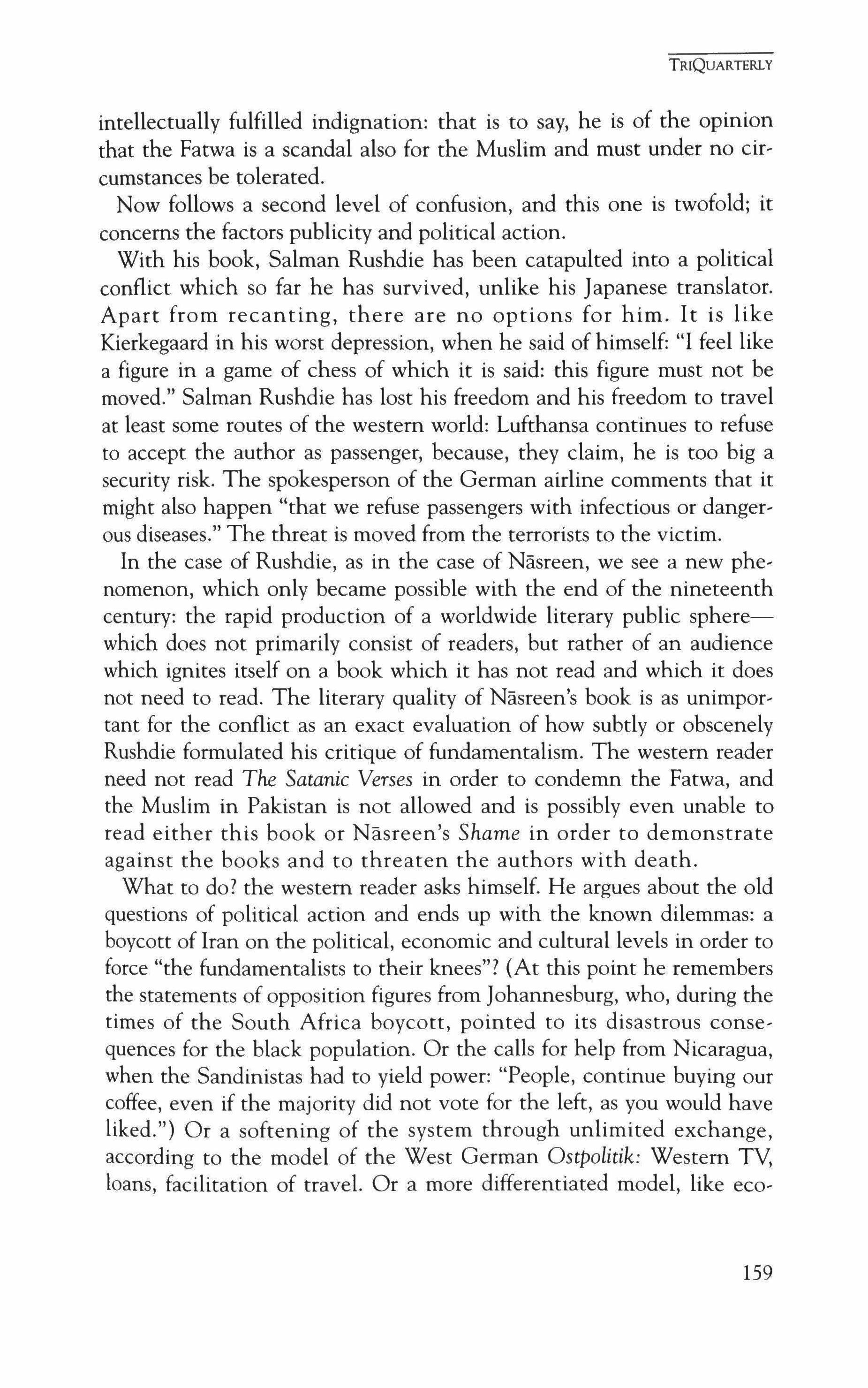
intellectually fulfilled indignation: that is to say, he is of the opinion that the Fatwa is a scandal also for the Muslim and must under no circumstances be tolerated.
Now follows a second level of confusion, and this one is twofold; it concerns the factors publicity and political action.
With his book, Salman Rushdie has been catapulted into a political conflict which so far he has survived, unlike his Japanese translator. Apart from recanting, there are no options for him. It is like Kierkegaard in his worst depression, when he said of himself: "I feel like a figure in a game of chess of which it is said: this figure must not be moved." Salman Rushdie has lost his freedom and his freedom to travel at least some routes of the western world: Lufthansa continues to refuse to accept the author as passenger, because, they claim, he is too big a security risk. The spokesperson of the German airline comments that it might also happen "that we refuse passengers with infectious or dangerous diseases." The threat is moved from the terrorists to the victim.
In the case of Rushdie, as in the case of Nasreen, we see a new phenomenon, which only became possible with the end of the nineteenth century: the rapid production of a worldwide literary public spherewhich does not primarily consist of readers, but rather of an audience which ignites itself on a book which it has not read and which it does not need to read. The literary quality of Nasreen's book is as unimportant for the conflict as an exact evaluation of how subtly or obscenely Rushdie formulated his critique of fundamentalism. The western reader need not read The Satanic Verses in order to condemn the Fatwa, and the Muslim in Pakistan is not allowed and is possibly even unable to read either this book or Nasreerr's Shame in order to demonstrate against the books and to threaten the authors with death.
What to do? the western reader asks himself. He argues about the old questions of political action and ends up with the known dilemmas: a boycott of Iran on the political, economic and cultural levels in order to force "the fundamentalists to their knees"? (At this point he remembers the statements of opposition figures from Johannesburg, who, during the times of the South Africa boycott, pointed to its disastrous consequences for the black population. Or the calls for help from Nicaragua, when the Sandinistas had to yield power: "People, continue buying our coffee, even if the majority did not vote for the left, as you would have liked.") Or a softening of the system through unlimited exchange, according to the model of the West German Ostpolitik: Western TV, loans, facilitation of travel. Or a more differentiated model, like eco-
TRIQUARTERLY
159
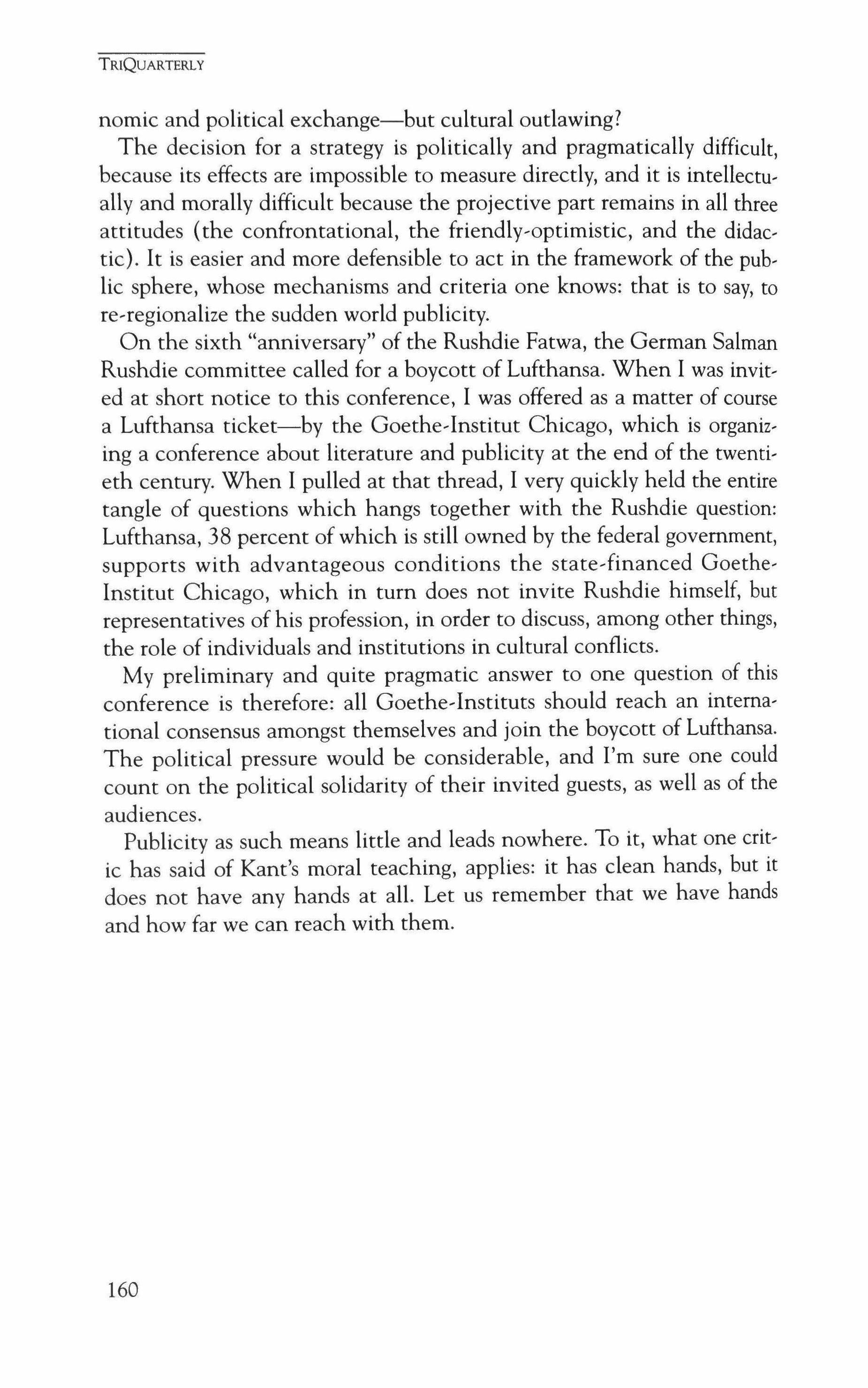
nomic and political exchange-but cultural outlawing?
The decision for a strategy is politically and pragmatically difficult, because its effects are impossible to measure directly, and it is intellectually and morally difficult because the projective part remains in all three attitudes (the confrontational, the friendly-optimistic, and the didactic). It is easier and more defensible to act in the framework of the public sphere, whose mechanisms and criteria one knows: that is to say, to re-regionalize the sudden world publicity.
On the sixth "anniversary" of the Rushdie Fatwa, the German Salman Rushdie committee called for a boycott of Lufthansa. When I was invited at short notice to this conference, I was offered as a matter of course a Lufthansa ticket-by the Goethe-Institut Chicago, which is organizing a conference about literature and publicity at the end of the twentieth century. When I pulled at that thread, I very quickly held the entire tangle of questions which hangs together with the Rushdie question: Lufthansa, 38 percent of which is still owned by the federal government, supports with advantageous conditions the state-financed GoetheInstitut Chicago, which in turn does not invite Rushdie himself, but representatives of his profession, in order to discuss, among other things, the role of individuals and institutions in cultural conflicts.
My preliminary and quite pragmatic answer to one question of this conference is therefore: all Goethe-Instituts should reach an international consensus amongst themselves and join the boycott of Lufthansa. The political pressure would be considerable, and I'm sure one could count on the political solidarity of their invited guests, as well as of the audiences.
Publicity as such means little and leads nowhere. To it, what one critic has said of Kant's moral teaching, applies: it has clean hands, but it does not have any hands at all. Let us remember that we have hands and how far we can reach with them.
TRIQUARTERLY
160

Norman Manea Epitaph as Prologue
(Literature at the End of the
Century)
Translated from the Roumanian by Patrick Camiller
Finally, as the century counts out its dizzying end, it seems in a hurry to clear the burden of its historical memory.
The First World War, the Russian Revolution, fascism, the war in Spain, the Second World War, the Holocaust, Hiroshima, the communist colonization of Eastern Europe, the wars against Israel, the Chinese Revolution, Hungary '56, the Korean War and the Vietnam War, decolonization, Biafra, Czechoslovakia '68, the Islamic Revolution, Polish Solidarity, the collapse of European Communism, the civil war in Bosnia, the conflicts between former Soviet republics, et cetera, et cetera. Anyone who has lived through at least some of these events knows the far-from-negligible price that they entail. Anyone who today examines that past called the twentieth century has a certain sense of weariness. It is a weariness not just with what was to be, but also with what is still to be after this exhausting "preliminary exercise" towards a radically new world, as it is announced {not only in a positive sense} by the new century and the new millennium already at our door.
"Un frisson extraordinaire a couru la moelle de l'Europe" ["An extraordinary shudder passed through the marrow of Europe"], wrote Paul Valery in 1919. Concerned at the spiritual crisis of the time and at the everdeeper crisis of what he considered to be European civilization, Valery would remain obsessed until the end of his life with the collapse of the world of which he himself had been a symbol. "Toutes les notions sur lesquelles nous avons vecu sont ebranlees" ["All the notions by which we lived are being shaken up"], he repeated in 1935 in Le bilan de l'intelli� gence, referring to "cette impression generale d'impuissance et d'incoherence" ["this general impression of impotence and incoherence"]. The sarcasm of his lucidity was aimed at the here-today, gone-tomorrow values, the conspiracy of the domestic that diminishes us and eventually cancels out freedom, the simplistic and often brutalizing forms of popular slogans. He was ever more aware that the civilization in which he had grown up was bound to disappear, like so many others before it. "A great
TRIQUARTERLY
161

ship going under"-that was the obsessive image in Valery's analysis, already in La crise de l'esprit in 1919, but also at later watersheds in 1935 and 1939 and immediately after the cataclysmic outbreak of the Second World War. "Dans toutes les affaires humaines, toutes les cartes ont ete brouillees" ["In all the affairs of man, everything has become jumbled up"], observed the disconsolate thinker.
To surrender to natural nostalgia for an idyllic past of European civilization would be both frivolous and, in the end, hypocritical. For it would be to mythologize a reality much more complex and painful than its graceful elitist appearances would lead one to believe.
Indeed, centrifugal modernity has resulted from the numerous contradictions and dead ends of a civilization which has been fast using up its stock of coherence and luminosity. Assaulted on all sides by its own explosions, shaken by the incomparably powerful winds of an expanded world, it has been dissipating its own certainties-and therefore its "center," the authority of an intangible spiritual enclave that it had maintained by seldom virtuous means and through ever more anachronistic and suspect supremacy and splendors.
What has happened to Europe this century is of an over-intense and gloomy significance: we have only to think (and how could we not?) of the morbid and barbaric apogee of the European crisis in Nazism and communism.
A more relaxed estimation of modernity would seem to emerge from the innovative American Experiment, which has left a decisive stamp upon our epoch.
"Nous autres, civilizations, nous savons maintenant que nous sommes mortelles" ["We, as civilizations, now know that we are mortal"]: in America, such a Valery-style warning would make no more sense today than it would have made when it was issued in 1919. The country's most extraordinary mobility and energy, its pioneering spirit and ahistorical freshness, hardly allow any breathing space for nostalgia where all is change and movement and civilization just "comes about" naturally, day by day, hour by hour, and on a mass scale, as people once used to say. That is, it "comes about" through a rapid process of altering and co-opting enthusiastic impulses and the (sometimes equally forceful) resistance to them, within a self-reproducing and self-perpetuating dynamic that is at once premise and goal-a timeless passing of time, yet capable of nonstop regeneration. From this point of view, America is the oldest
TRIQUARTERLY
162
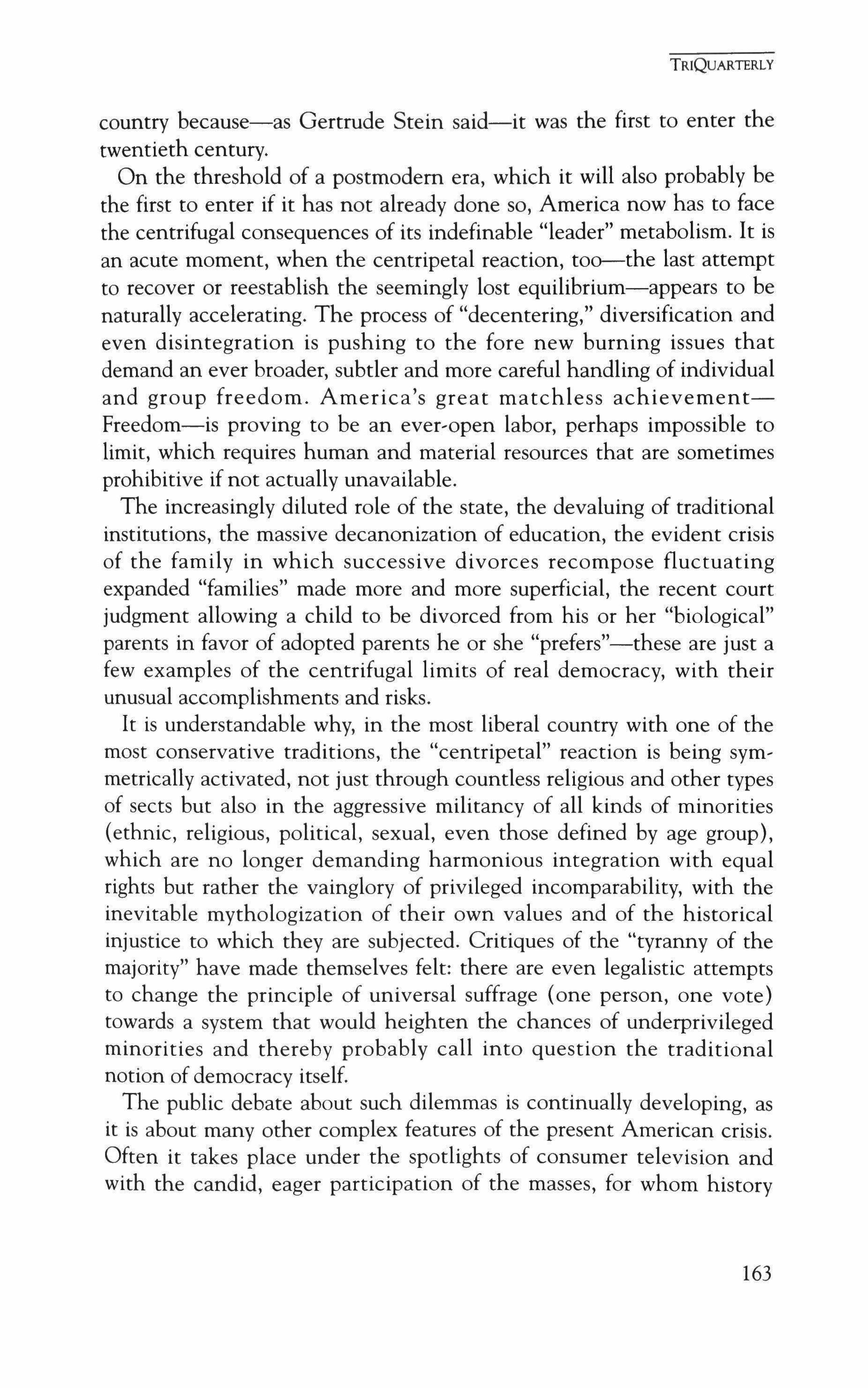
country because-as Gertrude Stein said-it was the first to enter the twentieth century.
On the threshold of a postmodern era, which it will also probably be the first to enter if it has not already done so, America now has to face the centrifugal consequences of its indefinable "leader" metabolism. It is an acute moment, when the centripetal reaction, too--the last attempt to recover or reestablish the seemingly lost equilibrium-appears to be naturally accelerating. The process of "decentering," diversification and even disintegration is pushing to the fore new burning issues that demand an ever broader, subtler and more careful handling of individual and group freedom. America's great matchless achievementFreedom-is proving to be an ever-open labor, perhaps impossible to limit, which requires human and material resources that are sometimes prohibitive if not actually unavailable.
The increasingly diluted role of the state, the devaluing of traditional institutions, the massive decanonization of education, the evident crisis of the family in which successive divorces recompose fluctuating expanded "families" made more and more superficial, the recent court judgment allowing a child to be divorced from his or her "biological" parents in favor of adopted parents he or she "prefers"-these are just a few examples of the centrifugal limits of real democracy, with their unusual accomplishments and risks.
It is understandable why, in the most liberal country with one of the most conservative traditions, the "centripetal" reaction is being symmetrically activated, not just through countless religious and other types of sects but also in the aggressive militancy of all kinds of minorities (ethnic, religious, political, sexual, even those defined by age group), which are no longer demanding harmonious integration with equal rights but rather the vainglory of privileged incomparability, with the inevitable mythologization of their own values and of the historical injustice to which they are subjected. Critiques of the "tyranny of the majority" have made themselves felt: there are even legalistic attempts to change the principle of universal suffrage (one person, one vote) towards a system that would heighten the chances of underprivileged minorities and thereby probably call into question the traditional notion of democracy itself.
The public debate about such dilemmas is continually developing, as it is about many other complex features of the present American crisis. Often it takes place under the spotlights of consumer television and with the candid, eager participation of the masses, for whom history
TRIQUARTERLY
163

seems to mean no more than last week's events and reality seems to legitimate, even to authenticate, itself merely through the trivializing selection of the small screen.
The baffling everyday aspects of what we might call the loss ofmeaning should never make us forget the extraordinary energy of democracy, its exuberant successes, which more than once have issued precisely from failures and wrong turns, huge rerhinkings and surprises, in an evermore instantaneous world already given over to the universal computer of the future.
What place does literature occupy today-in a society where popular culture, assiduously (and profitably) manipulated, naturally wins the contest and threatens to engulf culture per se?
It is no exaggeration to say that at this fin de siecle literature is in maximum danger. At a time when the image reigns supreme and communication takes place at ultra-high speed, it is no longer even necessary to invoke the traditional enemies of reading to measure the decisive weight of the present juncture. Whether it is a question of the latest rape scandal, the latest embezzlement, or the latest sensation in sports, policing or high society, genuinely worldwide TV drama "serials" are turned overnight into "books" and devoured by the same mass audience that can no longer distinguish between fiction and the throbbing "novel" of the day.
Vulgarity seems one of the emblems of liberation from rules constricting thought and behavior, and for many even an expression of "freedom" pure and simple. Does bad taste (that is, impoverished thought) actually lead to crime, as Stendhal foresaw with still innocent irony? Is it not a vain "cultural" simplification to explain by modem kitsch the fact that the United States, with five percent of the earth's population, produces seventy-five percent of its "serial killers"? Or that since 1970 there have been more of them than in the whole preceding period of American history?
The amazing complexity of many of these criminals does, we must admit, sometimes stir us with revelations from the lower depths: about loneliness and its secret, morbid impulses, the traumatic urgency of pleasure as a fleeting therapeutic confirmation of selfhood, or about a nocturnal, subterranean world devoid of barriers and consistency, seeking or inventing some minimal proof, however bizarre, of reality, existence, living. It is not surprising that democracy, in proclaiming and respecting the inalienable rights of the individual, may do too little to forestall bad
TRIQUARTERLY
164
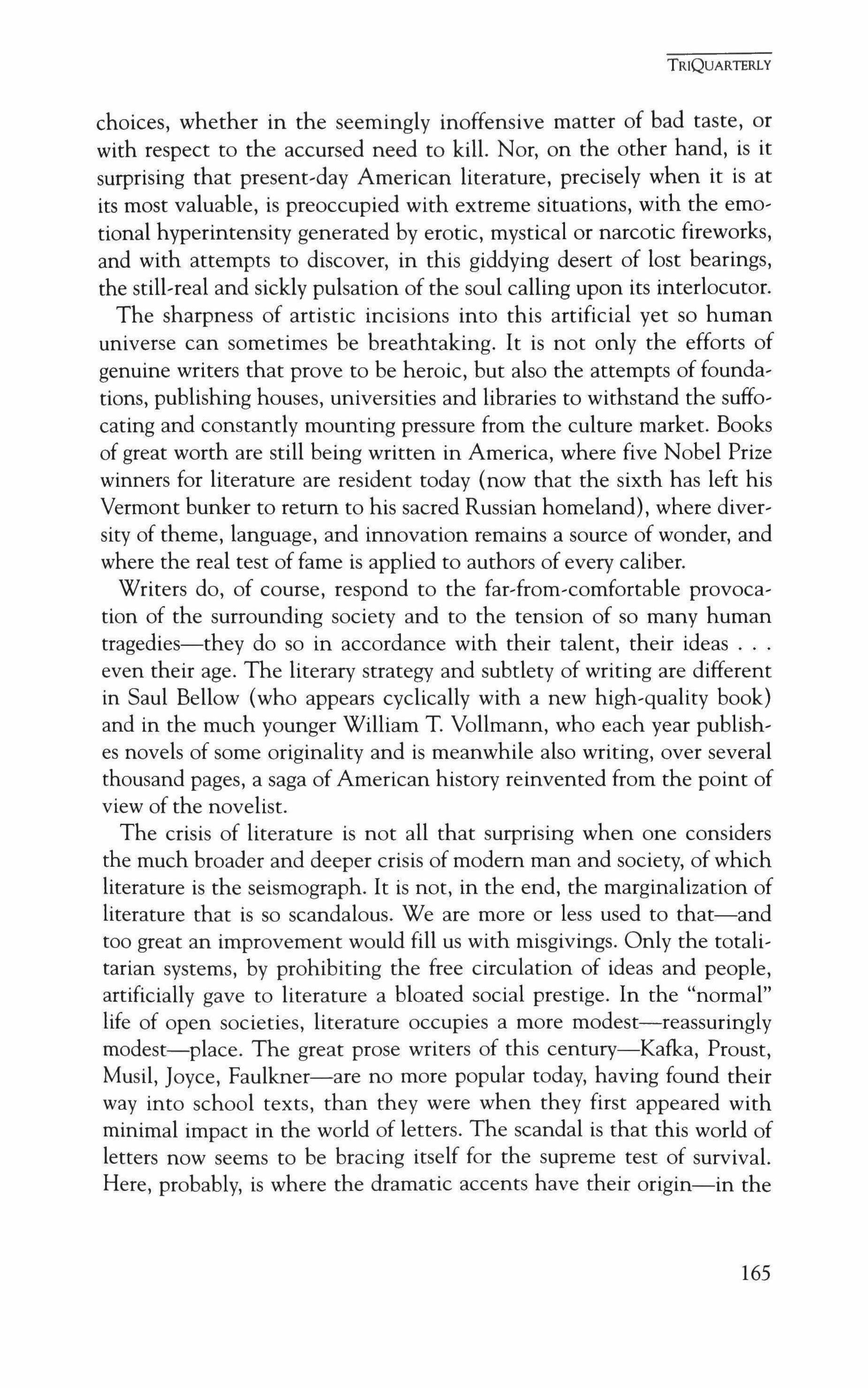
choices, whether in the seemingly inoffensive matter of bad taste, or with respect to the accursed need to kill. Nor, on the other hand, is it surprising that present-day American literature, precisely when it is at its most valuable, is preoccupied with extreme situations, with the ernotional hyperintensity generated by erotic, mystical or narcotic fireworks, and with attempts to discover, in this giddying desert of lost bearings, the still-real and sickly pulsation of the soul calling upon its interlocutor.
The sharpness of artistic incisions into this artificial yet so human universe can sometimes be breathtaking. It is not only the efforts of genuine writers that prove to be heroic, but also the attempts of foundations, publishing houses, universities and libraries to withstand the suffoeating and constantly mounting pressure from the culture market. Books of great worth are still being written in America, where five Nobel Prize winners for literature are resident today (now that the sixth has left his Vermont bunker to return to his sacred Russian homeland), where diversity of theme, language, and innovation remains a source of wonder, and where the real test of fame is applied to authors of every caliber.
Writers do, of course, respond to the far-from-comfortable provocation of the surrounding society and to the tension of so many human tragedies-they do so in accordance with their talent, their ideas even their age. The literary strategy and subtlety of writing are different in Saul Bellow (who appears cyclically with a new high-quality book) and in the much younger William T. Vollmann, who each year publishes novels of some originality and is meanwhile also writing, over several thousand pages, a saga of American history reinvented from the point of view of the novelist.
The crisis of literature is not all that surprising when one considers the much broader and deeper crisis of modem man and society, of which literature is the seismograph. It is not, in the end, the marginalization of literature that is so scandalous. We are more or less used to that-and too great an improvement would fill us with misgivings. Only the totalitarian systems, by prohibiting the free circulation of ideas and people, artificially gave to literature a bloated social prestige. In the "normal" life of open societies, literature occupies a more modest-reassuringly modest-place. The great prose writers of this century-Kafka, Proust, Musil, Joyce, Faulkner-are no more popular today, having found their way into school texts, than they were when they first appeared with minimal impact in the world of letters. The scandal is that this world of letters now seems to be bracing itself for the supreme test of survival. Here, probably, is where the dramatic accents have their origin-in the
TRIQUARTERLY
165
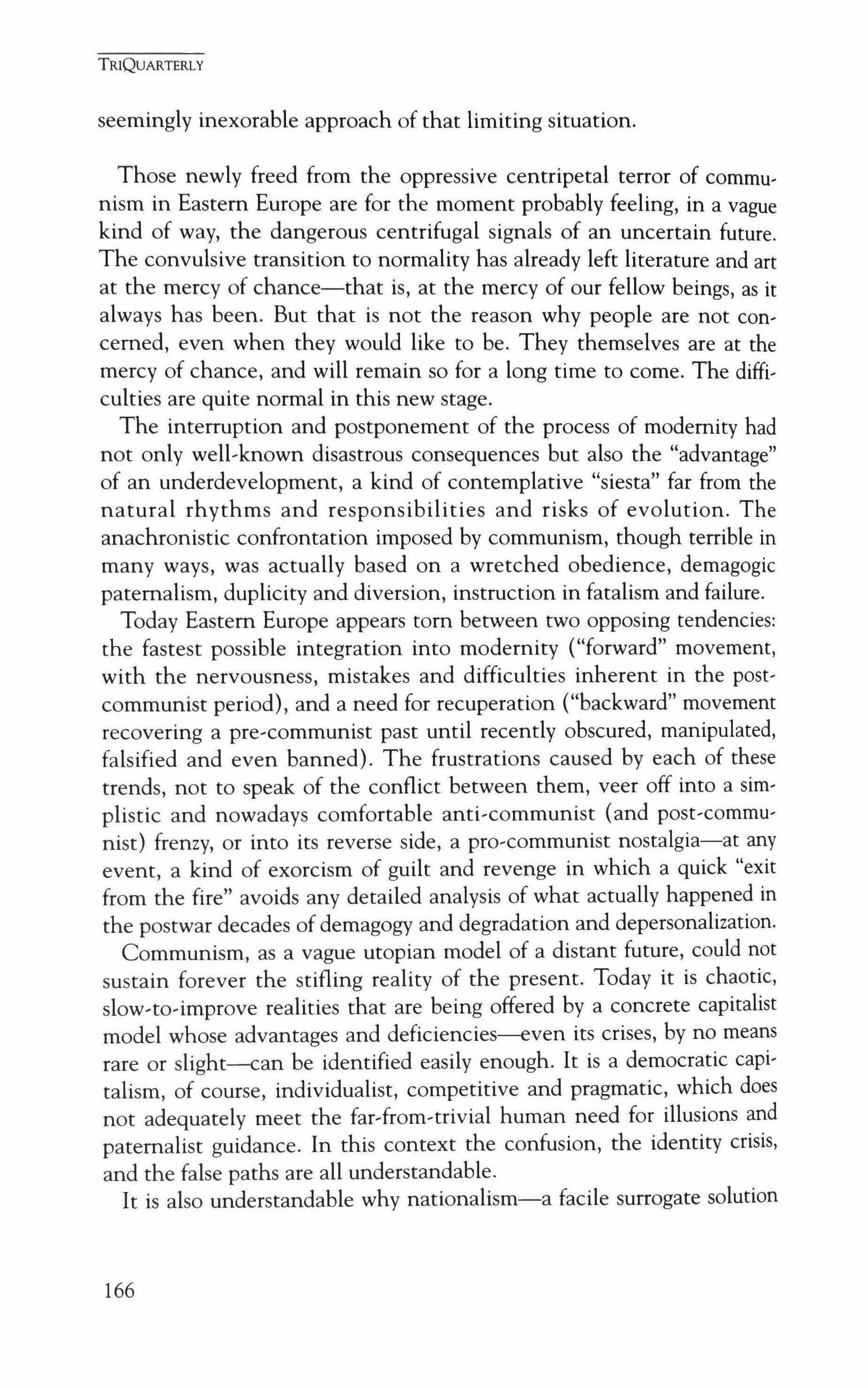
seemingly inexorable approach of that limiting situation.
Those newly freed from the oppressive centripetal terror of communism in Eastern Europe are for the moment probably feeling, in a vague kind of way, the dangerous centrifugal signals of an uncertain future. The convulsive transition to normality has already left literature and art at the mercy of chance-that is, at the mercy of our fellow beings, as it always has been. But that is not the reason why people are not concerned, even when they would like to be. They themselves are at the mercy of chance, and will remain so for a long time to come. The difficulties are quite normal in this new stage.
The interruption and postponement of the process of modernity had not only well-known disastrous consequences but also the "advantage" of an underdevelopment, a kind of contemplative "siesta" far from the natural rhythms and responsibilities and risks of evolution. The anachronistic confrontation imposed by communism, though terrible in many ways, was actually based on a wretched obedience, demagogic paternalism, duplicity and diversion, instruction in fatalism and failure.
Today Eastern Europe appears torn between two opposing tendencies: the fastest possible integration into modernity {"forward" movement, with the nervousness, mistakes and difficulties inherent in the postcommunist period}, and a need for recuperation {"backward" movement recovering a pre-communist past until recently obscured, manipulated, falsified and even banned}. The frustrations caused by each of these trends, not to speak of the conflict between them, veer off into a simplistic and nowadays comfortable anti-communist {and post-communist} frenzy, or into its reverse side, a pro-communist nostalgia-at any event, a kind of exorcism of guilt and revenge in which a quick "exit from the fire" avoids any detailed analysis of what actually happened in the postwar decades of demagogy and degradation and depersonalization. Communism, as a vague utopian model of a distant future, could not sustain forever the stifling reality of the present. Today it is chaotic, slow-to-improve realities that are being offered by a concrete capitalist model whose advantages and deficiencies---even its crises, by no means rare or slight-can be identified easily enough. It is a democratic capitalism, of course, individualist, competitive and pragmatic, which does not adequately meet the far-from-trivial human need for illusions and paternalist guidance. In this context the confusion, the identity crisis, and the false paths are all understandable. It is also understandable why nationalism-a facile surrogate solution
TRIQUARTERLY
166

promising regained identity but also recognition, communality and protection-has gained evident opportunities. Nationalism has always been harder to combat than an overly abstract and inclusive "internationalism" that is readily suspected of altruism. Loyalty to family, ethnicity, church and nation corresponds better to man's essential egotism and vulnerability than do overgenerous, general virtues of equality, fraternity and universalism. As a reaction to the dispersion and deracination of the modern world, centripetal nationalism has the further advantage in Eastern Europe today that it can present itself as a traditional adversary of communism and a force for reuniting communities shaped for generations by authoritarian socialist centralism.
The shock of transition from a rigid, regimented society to the mobilityand incoherence of individualist competition is generating a kind of pre-modern neurosis; this is distinct from the present neurosis of a modernity called into question by the global exigencies of an ever less hospitable planet with its impoverished migrant surplus, where fanaticism of all kinds is becoming as banal as ultra-sophisticated communications unwavering in their precision and science-fiction performance.
The offbeat rhythms which for the moment are forcing themselves on Eastern Europe have an inevitable influence on the situation-and also, presumably, the themes-of its art and culture. The move from a statecontrolled and censored literature to the competitive "chaos" of the book market is not a smooth process, especially as the persistent economic (as well as political, moral and psychological) crisis is a source of considerable discouragement. Writers used to negotiating their literary survival with just one astute and all-powerful Maecenas, and to attuning their challenge to authority in such a way that it also gives them a chance of accreditation, will have been rather bemused by the cynical and unpredictable cement mixer of the free market and the sales imperative, in a world with too few Maecenases and too many writers aspiring to replace the ones of old. For many, of course, the unbearable vulgarity of the new situation will have marked a cultural regression of the nation, a robbing of art's sacred aura of beauty and truth, a deadening of its ethical impact.
Yet rigorous scrutiny of the literature produced under communism will soon show that such regrets are without foundation; and a close look at the literature produced in the West in the same period will certainly allow a more accurate evaluation of the future. It is not that important works did not come out of those forty years and more of oppression
TRIQUARTERLY
167
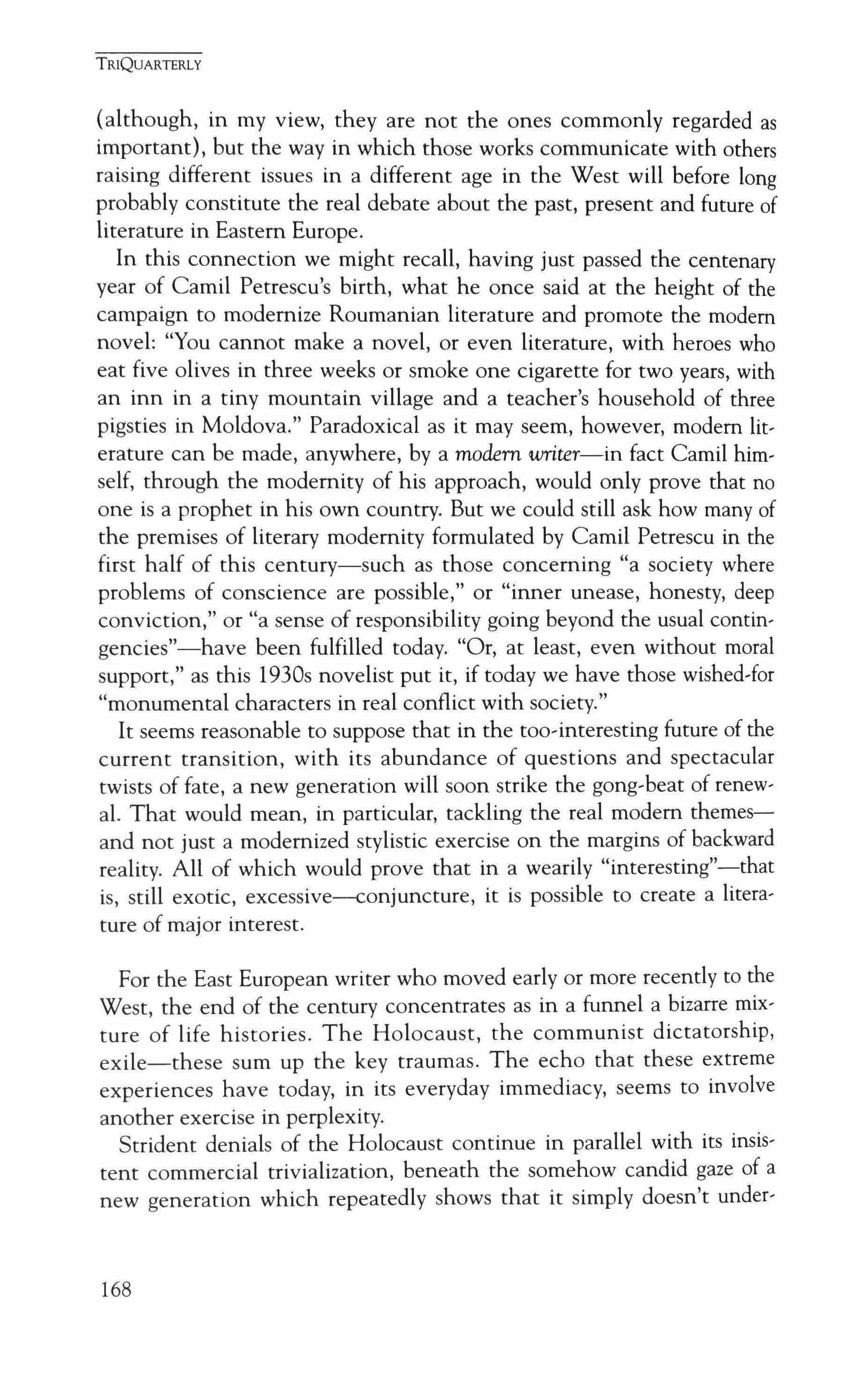
{although, in my view, they are not the ones commonly regarded as important}, but the way in which those works communicate with others raising different issues in a different age in the West will before long probably constitute the real debate about the past, present and future of literature in Eastern Europe.
In this connection we might recall, having just passed the centenary year of Camil Petrescu's birth, what he once said at the height of the campaign to modernize Roumanian literature and promote the modern novel: "You cannot make a novel, or even literature, with heroes who eat five olives in three weeks or smoke one cigarette for two years, with an inn in a tiny mountain village and a teacher's household of three pigsties in Moldova." Paradoxical as it may seem, however, modem literature can be made, anywhere, by a modem writer-in fact Camil himself, through the modernity of his approach, would only prove that no one is a prophet in his own country. But we could still ask how many of the premises of literary modernity formulated by Camil Petrescu in the first half of this century-such as those concerning "a society where problems of conscience are possible," or "inner unease, honesty, deep conviction," or "a sense of responsibility going beyond the usual contingencies"-have been fulfilled today. "Or, at least, even without moral support," as this 1930s novelist put it, if today we have those wished-for "monumental characters in real conflict with society."
It seems reasonable to suppose that in the too-interesting future of the current transition, with its abundance of questions and spectacular twists of fate, a new generation will soon strike the gong-beat of renewal. That would mean, in particular, tackling the real modem themesand not just a modernized stylistic exercise on the margins of backward reality. All of which would prove that in a wearily "interesting"-that is, still exotic, excessive--conjuncture, it is possible to create a literature of major interest.
For the East European writer who moved early or more recently to the West, the end of the century concentrates as in a funnel a bizarre mixture of life histories. The Holocaust, the communist dictatorship, exile-these sum up the key traumas. The echo that these extreme experiences have today, in its everyday immediacy, seems to involve another exercise in perplexity.
Strident denials of the Holocaust continue in parallel with its insistent commercial trivialization, beneath the somehow candid gaze of a new generation which repeatedly shows that it simply doesn't under-
TRIQUARTERLY
168

stand what this is all about.
The "velvet" or "corridor" or "carnival" revolutions that finally brought the long-awaited liberation of Eastern Europe seem to be posthumously caricaturing themselves, hastily and indescribably producing despair and farce. You don't know what to think-or you know only too well-when you hear that in Bucharest holders of the "revolutionary's certificate," issued by a parliament incapable of establishing whether or what kind of a revolution actually took place in 1989, are awarded the privilege of competing for some tiny commercial space of up to fifty square meters (in former bakers' or shoemakers' shops or bottle-collection centers), and that recently a thousand applications fought it out to occupy three "revolutionary" spaces of this kind. Even the imagination of a Garda Marquez could hardly have thought up a cruder way of today evoking Lenin, Trotsky, Mao, Guevara and, why not?, Ceausescu-except that here it is a question of heroes dispelling the myths represented by those famous predecessors.
In the end, let us admit, everyday sequences in the Free New World where everything is possible are sometimes no less disconcerting. Recently the paper of the college where I teach published a full-page open letter from a female student. It began with these unconventional words: "Two nights before Intersession of this year, I was forced to engage in unprotected anal intercourse." In this public sentence speak both the dying century and its successor already announcing its presence. Such a voluntary public declaration would have been hard to imagine, not only in Roumania but also in America, in the year of my birth more than half a century ago, or even thirty years ago when I had already finished my time as a student.
The way in which memories of the fascist extermination camp and the communist penal colony communicate with this kind of new "extreme situation" might perhaps deserve deeper examination. No less deserving of honor is the (not always beneficial) fervor of the incomparable passengers on our old planet.
And at this end-beginning of the world the miracle of a fate never fully understood, the fleeting and constant human anxiety, its extraordinary uniqueness, are here with us, around and beyond us, in the century-Iong moment of each still-living day.
TRIQUARTERLY
169

Two Sections from The Bob Hope Poem
Campbell McGrath
The Secret Life of Capital
It is a great temptation to try to make the spirit explicit.
- Wittgenstein
These elephantine snowflakes sashaying lazily earthward look about as likely as three-dollar bills. Huge and shambling, avuncular as churchgoers, delicately laced as linen doilies, fluffy as kittens or cotton swabs, linked arm in arm in a ticker-tape parade ofpaper-doll Rockettes or lurching like waves of drunken longshoremen
they're larger than life, bigger than medicine balls,
they're just about as plump and juicy as the porkchops at the unpronounceable Polish restaurant on Milwaukee Avenue,
yes, double-stuffed-shallelujah, it's raining T�bones,
it's snowing Birdseye frozen vegetables, a succotash blizzard of sweet baby limas and tender com niblets,
such terms of endearment, such love,
ThIQUARTERLY
170
thank you, thank you, Madison Avenue.
Now a flake has become ensnared in an invisible eddy or current of air outside my window and circles and circles the way the liners must be up there, above the iron clouds, waiting for the runways at O'Hare to clear.
Which my sidewalk surely isn't.
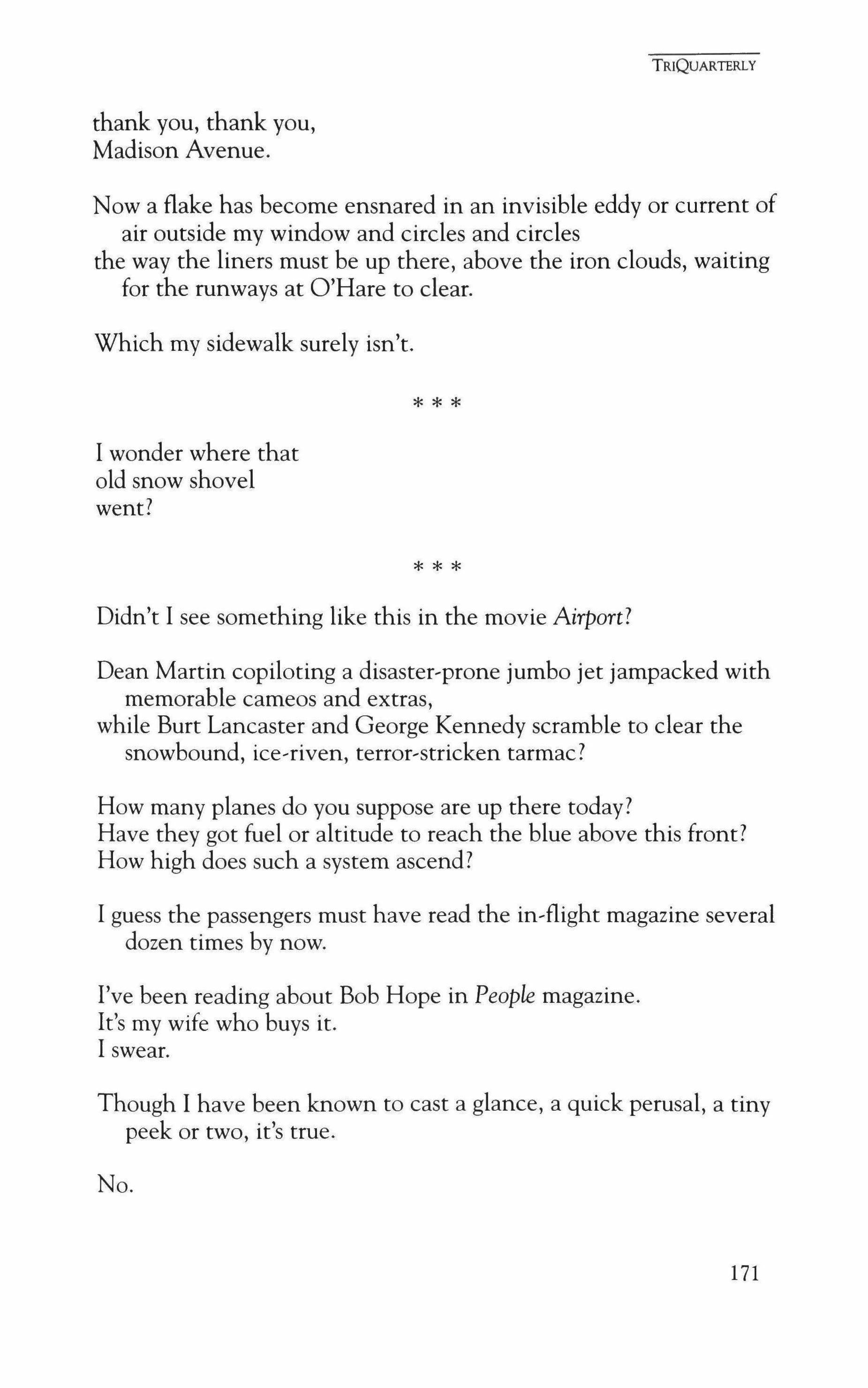
I wonder where that old snow shovel went?
Didn't I see something like this in the movie Airport?
Dean Martin copiloting a disaster-prone jumbo jet jampacked with memorable cameos and extras, while Burt Lancaster and George Kennedy scramble to clear the snowbound, ice-riven, terror,stricken tarmac?
How many planes do you suppose are up there today? Have they got fuel or altitude to reach the blue above this front? How high does such a system ascend?
I guess the passengers must have read the in-flight magazine several dozen times by now.
I've been reading about Bob Hope in People magazine. It's my wife who buys it. I swear.
Though I have been known to cast a glance, a quick perusal, a tiny peek or two, it's true.
No.
TRIQUARTERLY
* * *
* * *
171

Let's be perfectly frank.
The truth is I've been sitting here for over an hour, feet on the desk, chair tilted back, drinking black-currant tea and reading People, while the ubiquitous squirrels frolic and dance and the snowflakes do their gravitational thing.
I wanted it, I longed for it, I craved its guilty familiarity, saucy headline lip-glossed against that loud, emphatic jacket. I searched the house to find it, buried by newspapers and take-out menus from Ho Wah Garden, and brought it here, to my office, carried it right to the desk-but no, I didn't even dare to pick it up, couldn't find the courage to carry it, but merely slid it across the floor with my foot, as if I could mitigate my guilt so easily, as if I could deny any active intention and simply discover its fortuitous presence there, on the Navajo rug, by my chair.
Well, well, well. People magazine. Guess I'll take a look.
How sad. How banal. How pitiful our human interests, simple or compounded daily.
How profligate to grant unthinking assent to this most glib and hour-wasting gratification,
TRIQUARTERLY
172
though time, as they say, is money, and times are tough, and money does not grow on trees, and nothing makes money like money.
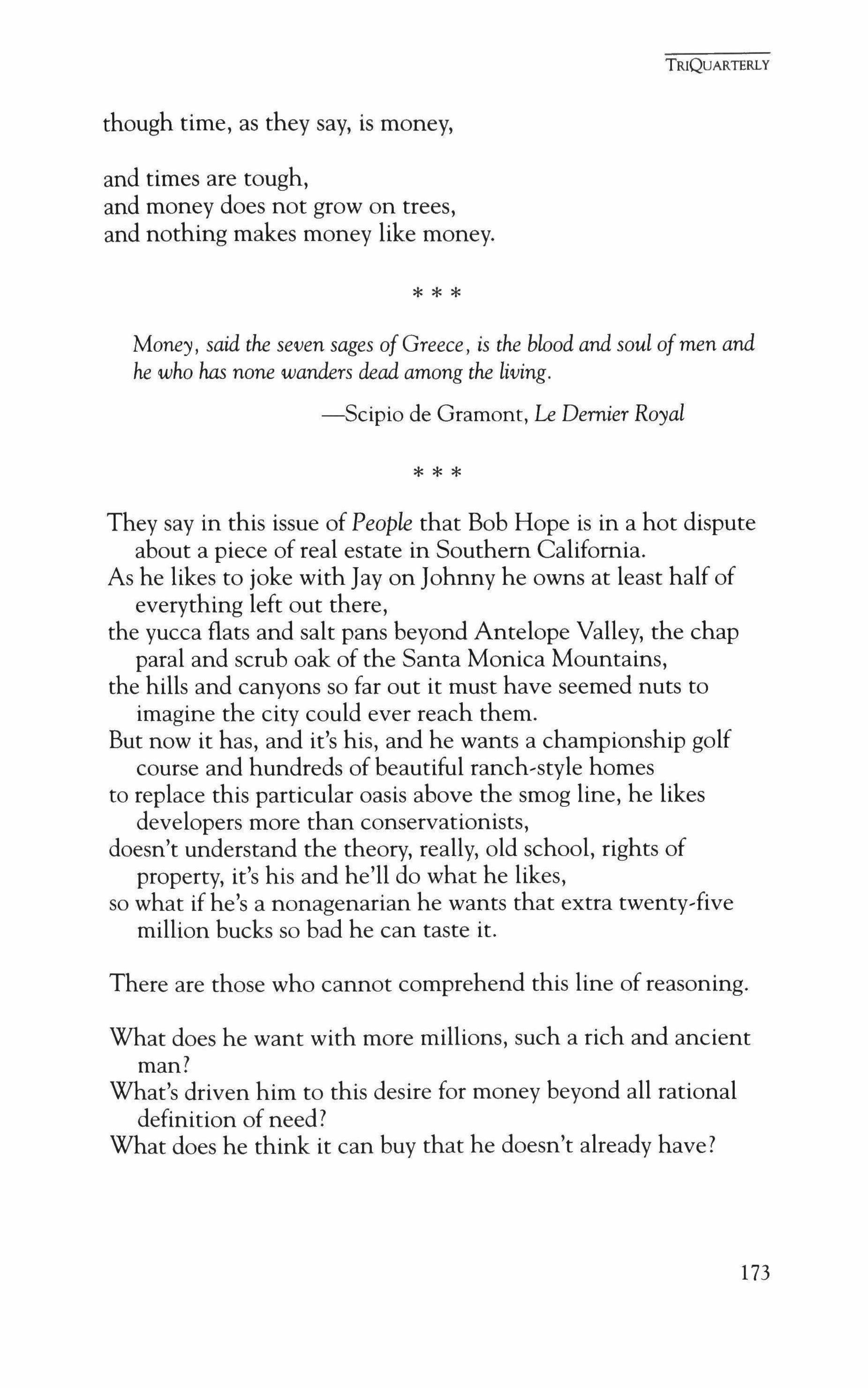
Money, said the seven sages ofGreece, is the blood and soul of men and he who has none wanders dead among the living.
-Scipio de Gramont, Le Demier Royal
They say in this issue of People that Bob Hope is in a hot dispute about a piece of real estate in Southern California. As he likes to joke with Jay on Johnny he owns at least half of everything left out there, the yucca flats and salt pans beyond Antelope Valley, the chap paral and scrub oak of the Santa Monica Mountains, the hills and canyons so far out it must have seemed nuts to imagine the city could ever reach them. But now it has, and it's his, and he wants a championship golf course and hundreds of beautiful ranch,style homes to replace this particular oasis above the smog line, he likes developers more than conservationists, doesn't understand the theory, really, old school, rights of property, it's his and he'll do what he likes, so what if he's a nonagenarian he wants that extra twenty-five million bucks so bad he can taste it.
There are those who cannot comprehend this line of reasoning.
What does he want with more millions, such a rich and ancient man?
What's driven him to this desire for money beyond all rational definition of need? What does he think it can buy that he doesn't already have?
TRIQUARTERLY
* * *
*
* *
173

What is it with this generation of white men from Southern California-the highway builders and golfplayers, the oil barons, the water hoarders, the dream merchants, the oligarchs, the last frontiersmen, Uncle Walt and the Duke, Nixon's Committee of 100 and the whole Reagan crew, who willingly testified to their fondness for none but former Marines and self-made millionaires like themselves,
though it proved so hard to assert anything categorical under oath.
They are such fossils! I mean that constructively.
Is not the very earth we stand upon built from the bones of the past?
Are not these men somehow akin to the animate saber-rattling skeletons of a Saturday-morning Sinbad movie, the residual flesh of war and hegemony, of the Great Depression and the Pax Americana,
a golden age of capital acquisition when the romance of wealth glowed like some uncharted Polynesian atoll awaiting initial contact,
though they say no man is an island,
and I assume that these of all men would deny the implicitly pro-union metaphor of sedimentation, preferring instead the heroic agency of individual enactment, the volcanic will that lifted the Hawaiian archipelago from the deep Pacific abyss,
which indeed is one of two viable geological models for islandbuilding-the other being the slow communal accretion ofcoral.
TRIQUARTERLY
174
What is it about Americans that insists on elevating these men to positions of authority and esteem among us?

Two sums of money are distinguishable only by their amount.
-Marx, Das Kapital
The thing that really gets me about Bob is, there should be no magical aura or mystical signification attached to money. A house, a car, a pool, a mountain, a harem, an empire: it buys a lot, but nothing you don't know about.
There is no phantom realm: fat cats eat club sandwiches and drink iced tea after eighteen holes just like you do. So maybe they had pheasant last night and you had Dinty Moore, does it really matter?
I honestly believe that Dinty Moore tastes better, which is beside the point, I admit, but who says we can't engage in a little sophistry in pursuit of our ideals?
Sure, money's more powerful than neutron bombs, it is the lever of Archimedes, it is the rainbow but not the pot of gold.
It's a beautiful metaphor, a poetic analogy, a diagram, a model, a map of the stars, doppelganger, robot, tool, system, language, operating software for the super computer of western civilization.
TRIQUARTERLY
* *
*
* *
*
175
TRIQUARTERLY
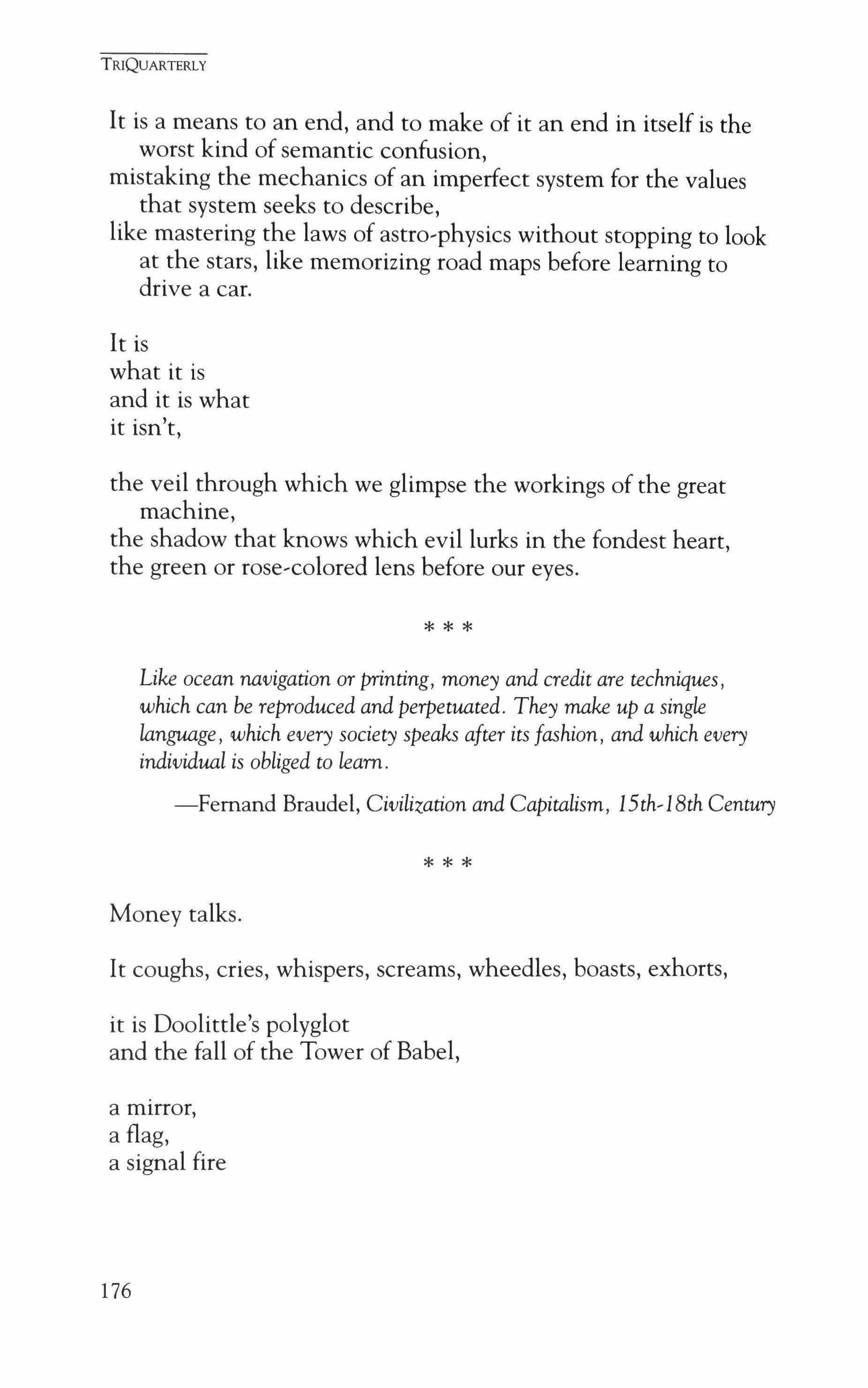
It is a means to an end, and to make of it an end in itself is the worst kind of semantic confusion, mistaking the mechanics of an imperfect system for the values that system seeks to describe, like mastering the laws of astro-physics without stopping to look at the stars, like memorizing road maps before learning to drive a car.
It is what it is and it is what it isn't, the veil through which we glimpse the workings of the great machine, the shadow that knows which evil lurks in the fondest heart, the green or rose-colored lens before our eyes.
* * *
Like ocean navigation or printing) money and credit are techniques) which can be reproduced and perpetuated. They make up a single language) which every society speaks after its fashion) and which every individual is obliged to learn.
-Femand Braudel, Civilization and Capitalism) 15th-18th Century
* * * Money talks.
It coughs, cries, whispers, screams, wheedles, boasts, exhorts, it is Doolittle's polyglot and the fall of the Tower of Babel, a mirror, a flag, a signal fire
176
in the smoke of whose burning we live out our lives.
Wampum and cowrie shells, feathers and dog's teeth; salt, tobacco, pigs, nails, beads, ingots; stocks and bonds, arbs and strips, futures and options and certificates of deposit; shillings, shekels, rubles, rupees, talers, dinars, pesos; yen, sen, won, kips, leks, birrs, dongs; sylis, takas, kwanzas, kyats, ringgits, tugriks, quetzals, balboas, ekueles, ngultrums; moolah, jack, simoleons, mazuma:
it all amounts to the same thing, which is everything or nothing, depending on where you stand.
Location, location, location, as they say in the real-estate biz.
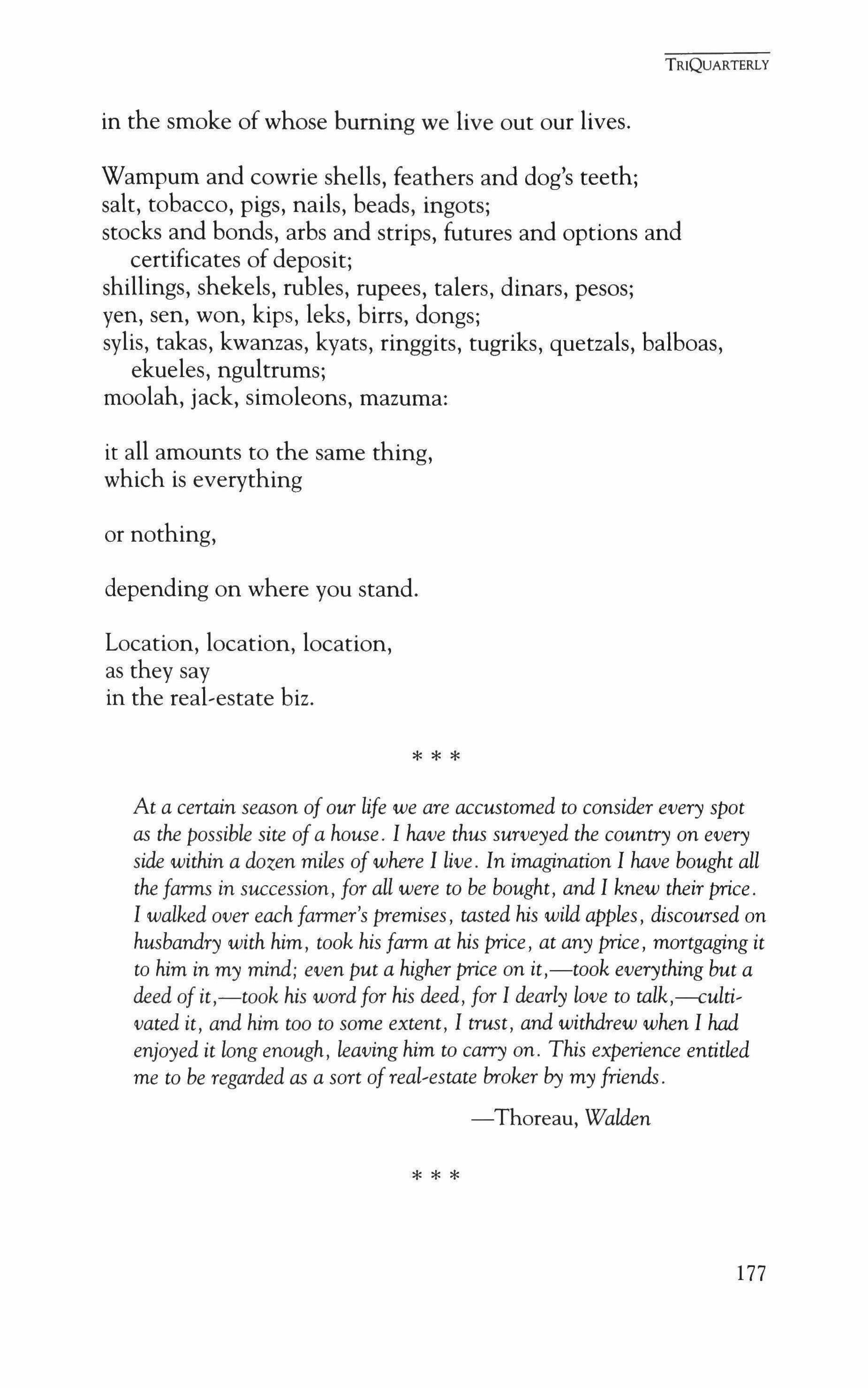
At a certain season of our life we are accustomed to consider every spot as the possible site of a house. I have thus surveyed the country on every side within a dozen miles ofwhere I live. In imagination I have bought all the farms in succession, for all were to be bought, and I knew their price. I walked over each farmer's premises, tasted his wild apples, discoursed on husbandry with him, took his farm at his price, at any price, mortgaging it to him in my mind; even put a higher price on it,-took everything but a deed ofit,-took his word for his deed, for I dearly love to talk,---culti� vated it, and him too to some extent, I trust, and withdrew when I had enjoyed it long enough, leaving him to carryon. This experience entitled me to be regarded as a sort ofreal�estate broker by my friends.
-Thoreau, Walden
TRIQUARTERLY
* * *
* * * 177
TRIQUARTERLY
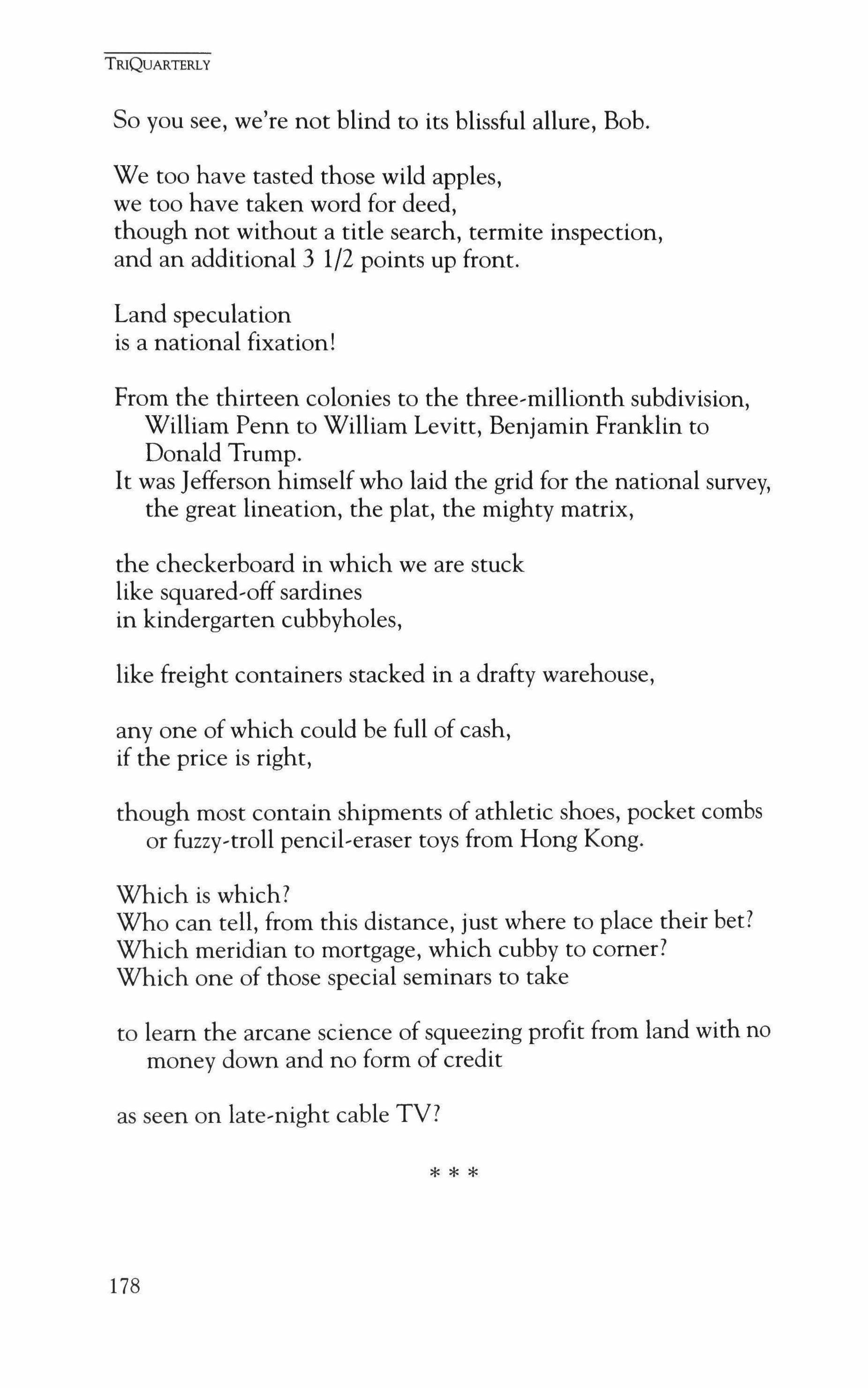
So you see, we're not blind to its blissful allure, Bob.
We too have tasted those wild apples, we too have taken word for deed, though not without a title search, termite inspection, and an additional 3 1/2 points up front.
Land speculation is a national fixation!
From the thirteen colonies to the three-millionth subdivision, William Penn to William Levitt, Benjamin Franklin to Donald Trump.
It was Jefferson himself who laid the grid for the national survey, the great lineation, the plat, the mighty matrix, the checkerboard in which we are stuck like squared-off sardines in kindergarten cubbyholes, like freight containers stacked in a drafty warehouse, anyone of which could be full of cash, if the price is right,
though most contain shipments of athletic shoes, pocket combs or fuzzy,troll pencil-eraser toys from Hong Kong.
Which is which?
Who can tell, from this distance, just where to place their bet? Which meridian to mortgage, which cubby to corner?
Which one of those special seminars to take to learn the arcane science of squeezing profit from land with no money down and no form of credit
as seen on late-night cable TV?
* * * 178
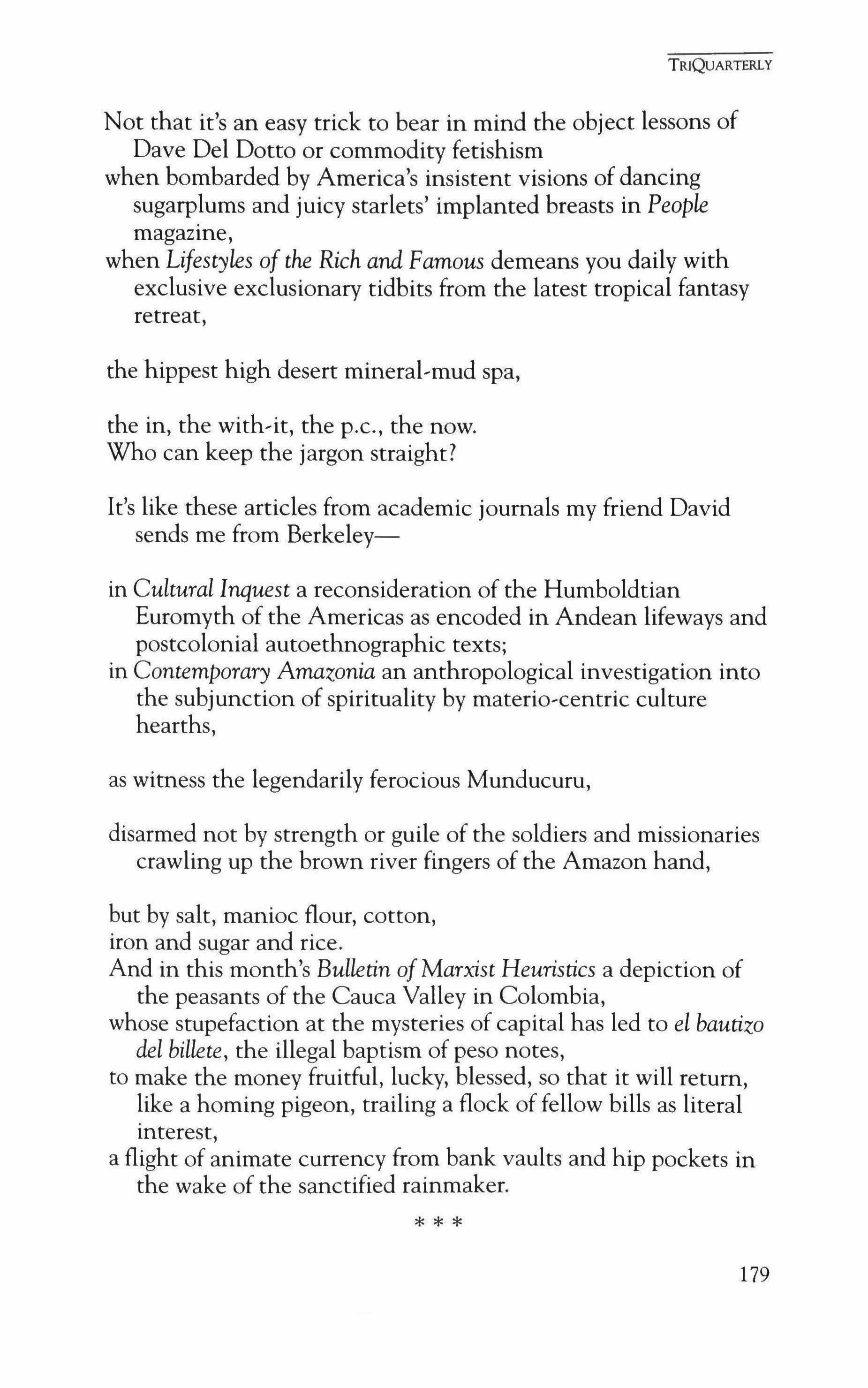
Not that it's an easy trick to bear in mind the object lessons of Dave Del Dotto or commodity fetishism when bombarded by America's insistent visions of dancing sugarplums and juicy starlets' implanted breasts in People magazine, when Lifestyles of the Rich and Famous demeans you daily with exclusive exclusionary tidbits from the latest tropical fantasy retreat, the hippest high desert mineral-mud spa, the in, the with-it, the p.c., the now. Who can keep the jargon straight?
It's like these articles from academic journals my friend David sends me from Berkeley-
in Cultural Inquest a reconsideration of the Humboldtian Euromyth of the Americas as encoded in Andean lifeways and postcolonial autoethnographic texts; in Contemporary Amazonia an anthropological investigation into the subjunction of spirituality by materio-centric culture hearths,
as witness the legendarily ferocious Munducuru, disarmed not by strength or guile of the soldiers and missionaries crawling up the brown river fingers of the Amazon hand, but by salt, manioc flour, cotton, iron and sugar and rice.
And in this month's Bulletin of Marxist Heuristics a depiction of the peasants of the Cauca Valley in Colombia, whose stupefaction at the mysteries of capital has led to el bautin: del billete, the illegal baptism of peso notes, to make the money fruitful, lucky, blessed, so that it will return, like a homing pigeon, trailing a flock of fellow bills as literal interest, a flight of animate currency from bank vaults and hip pockets in the wake of the sanctified rainmaker.
TRIQUARTERLY
* * * 179
One of the few successful black store owners in the village was saved from a great loss only by a most unusual coincidence. Serving in his shop he was startled to hear a strange noise in his cash register. Peering in he saw two bills fighting with each other for possession of the contents, and he realized that two customers, each with their own baptized bills, must have just paid them over and were awaiting their return. This strange comcidence allowed him to prevent the spiriting away of his cash.
-Michael T. Taussig, "The Genesis of Capitalism Amongst a South American Peasantry: Devil's Labor and the Baptism of Money"
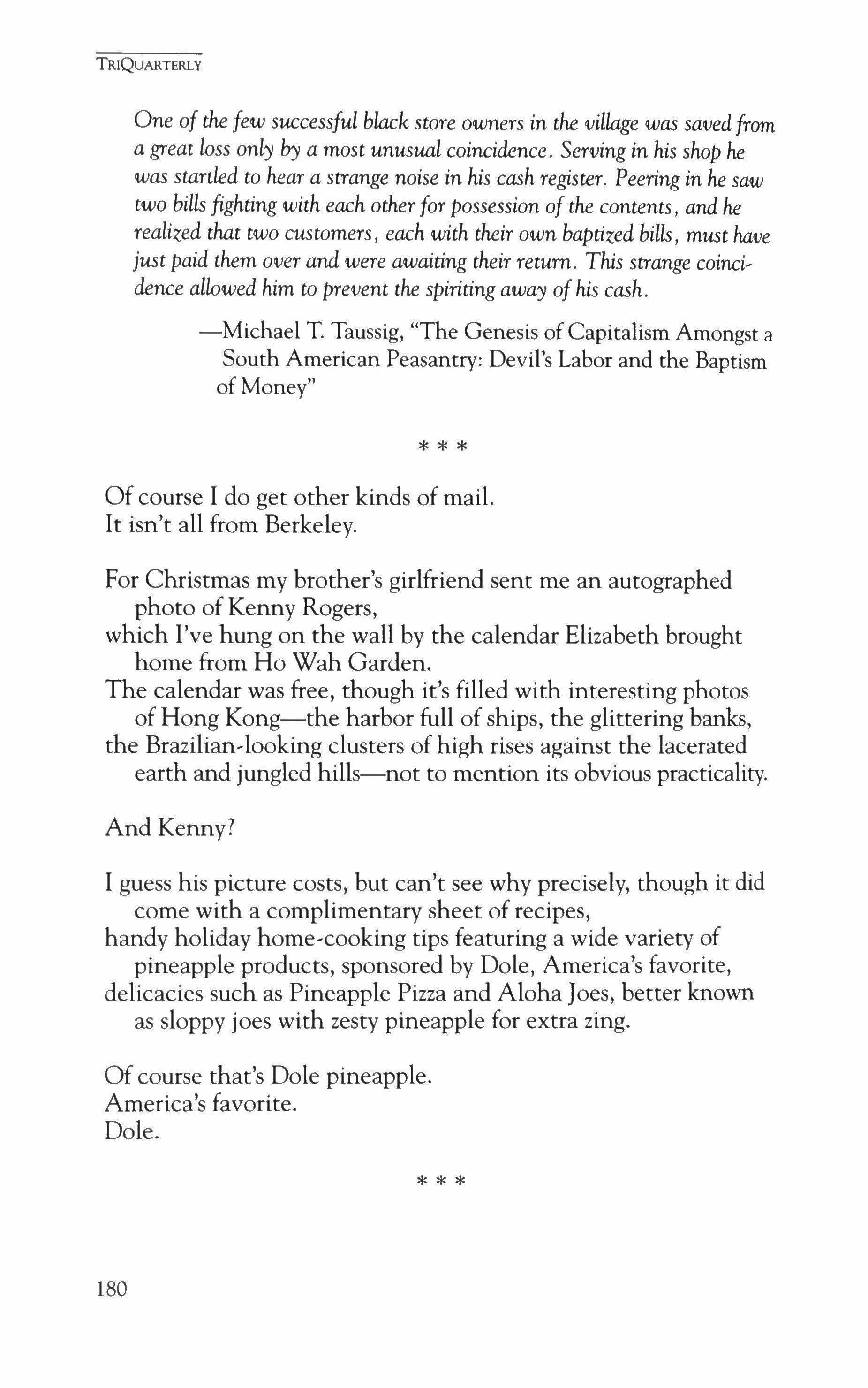
Of course I do get other kinds of mail. It isn't all from Berkeley.
For Christmas my brother's girlfriend sent me an autographed photo of Kenny Rogers, which I've hung on the wall by the calendar Elizabeth brought home from Ho Wah Garden. The calendar was free, though it's filled with interesting photos of Hong Kong-the harbor full of ships, the glittering banks, the Brazilian-looking clusters of high rises against the lacerated earth and jungled hills-not to mention its obvious practicality.
And Kenny?
I guess his picture costs, but can't see why precisely, though it did come with a complimentary sheet of recipes, handy holiday home-cooking tips featuring a wide variety of pineapple products, sponsored by Dole, America's favorite, delicacies such as Pineapple Pizza and Aloha [oes, better known as sloppy joes with zesty pineapple for extra zing.
Of course that's Dole pineapple. America's favorite. Dole.
TRIQUARTERLY
* * *
* *
180
*

Coincidentally, the first part of my Elvis screen,trilogy is set in Hong Kong.
A madcap comedy about organized crime. And the name I picked at random for the Chinese mobsters was Ong.
Only last week I read in the Times that the "Godfather of Chinatown" is named Bennie Ong.
They're all named Ong, the most dangerous family in America!
Talk about serendipity. Thank you Hollywood for ignoring my very existence!
TRIQUARTERLY
181
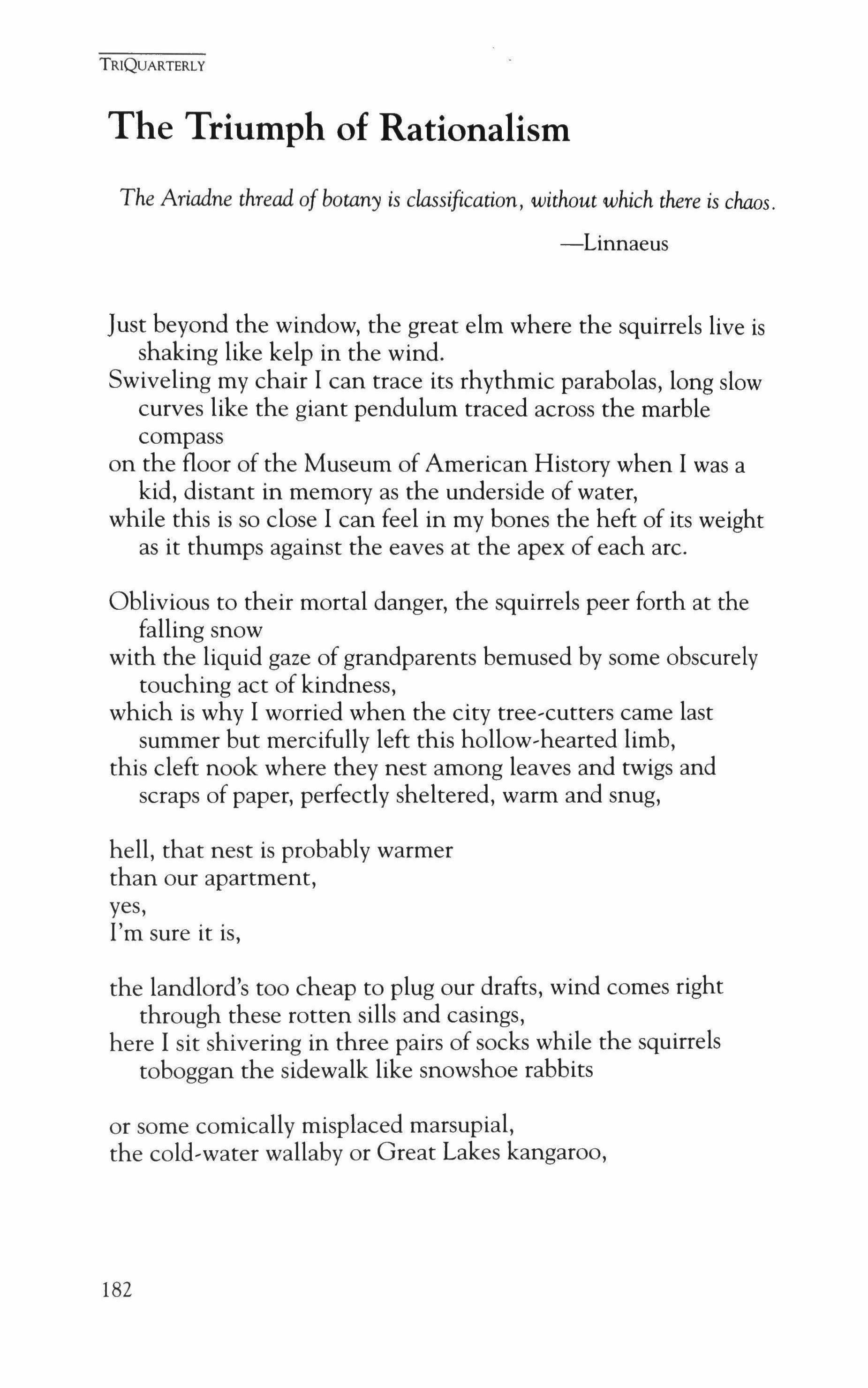
The Triumph of Rationalism
The Ariadne thread ofbotany is classification, without which there is chaos.
-Linnaeus
Just beyond the window, the great elm where the squirrels live is shaking like kelp in the wind.
Swiveling my chair I can trace its rhythmic parabolas, long slow curves like the giant pendulum traced across the marble compass on the floor of the Museum of American History when I was a kid, distant in memory as the underside of water, while this is so close I can feel in my bones the heft of its weight as it thumps against the eaves at the apex of each arc.
Oblivious to their mortal danger, the squirrels peer forth at the falling snow with the liquid gaze of grandparents bemused by some obscurely touching act of kindness, which is why I worried when the city tree-cutters came last summer but mercifully left this hollow-hearted limb, this cleft nook where they nest among leaves and twigs and scraps of paper, perfectly sheltered, warm and snug, hell, that nest is probably warmer than our apartment, yes, I'm sure it is,
the landlord's too cheap to plug our drafts, wind comes right through these rotten sills and casings, here I sit shivering in three pairs of socks while the squirrels toboggan the sidewalk like snowshoe rabbits
or some comically misplaced marsupial, the cold-water wallaby or Great Lakes kangaroo,
TRIQUARTERLY
182
though somehow more sinister-note the claws, the fanged grin and chiseled jaw, the pooled, clairvoyant eyes.
Only now do I recognize the uncanny resemblance to Murnau's infamous expressionistic vampire,
albeit four-legged and somewhat furrier, yes, it's true, they are a race of pint-sized
Nosferatu!
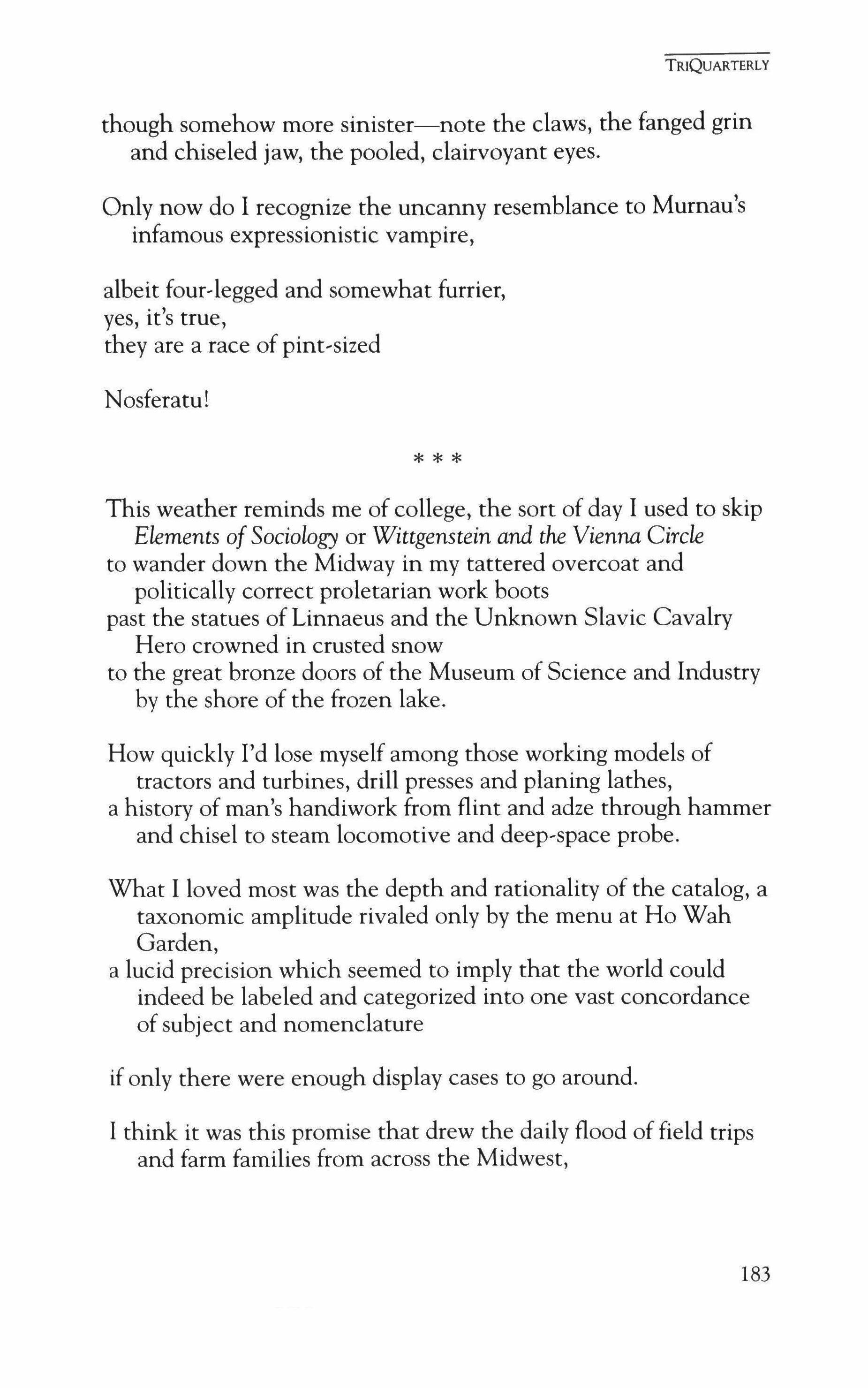
This weather reminds me of college, the sort of day I used to skip Elements ofSociology or Wittgenstein and the Vienna Circle to wander down the Midway in my tattered overcoat and politically correct proletarian work boots past the statues of Linnaeus and the Unknown Slavic Cavalry Hero crowned in crusted snow to the great bronze doors of the Museum of Science and Industry by the shore of the frozen lake.
How quickly I'd lose myself among those working models of tractors and turbines, drill presses and planing lathes, a history of man's handiwork from flint and adze through hammer and chisel to steam locomotive and deep-space probe.
What I loved most was the depth and rationality of the catalog, a taxonomic amplitude rivaled only by the menu at Ho Wah Garden, a lucid precision which seemed to imply that the world could indeed be labeled and categorized into one vast concordance of subject and nomenclature
if only there were enough display cases to go around.
I think it was this promise that drew the daily flood of field trips and farm families from across the Midwest,
TRIQUARTERLY
* * *
183
a glimpse at the inner workings of their world, the cogs that run the great machine, the nuts and bolts of the system revealed-
a vision of such faith in the adequacy of the visible, in the efficacy of the material, mechanistic world that my skin of callow intellectual self-certainty was riven right down to the molten, cynical core.
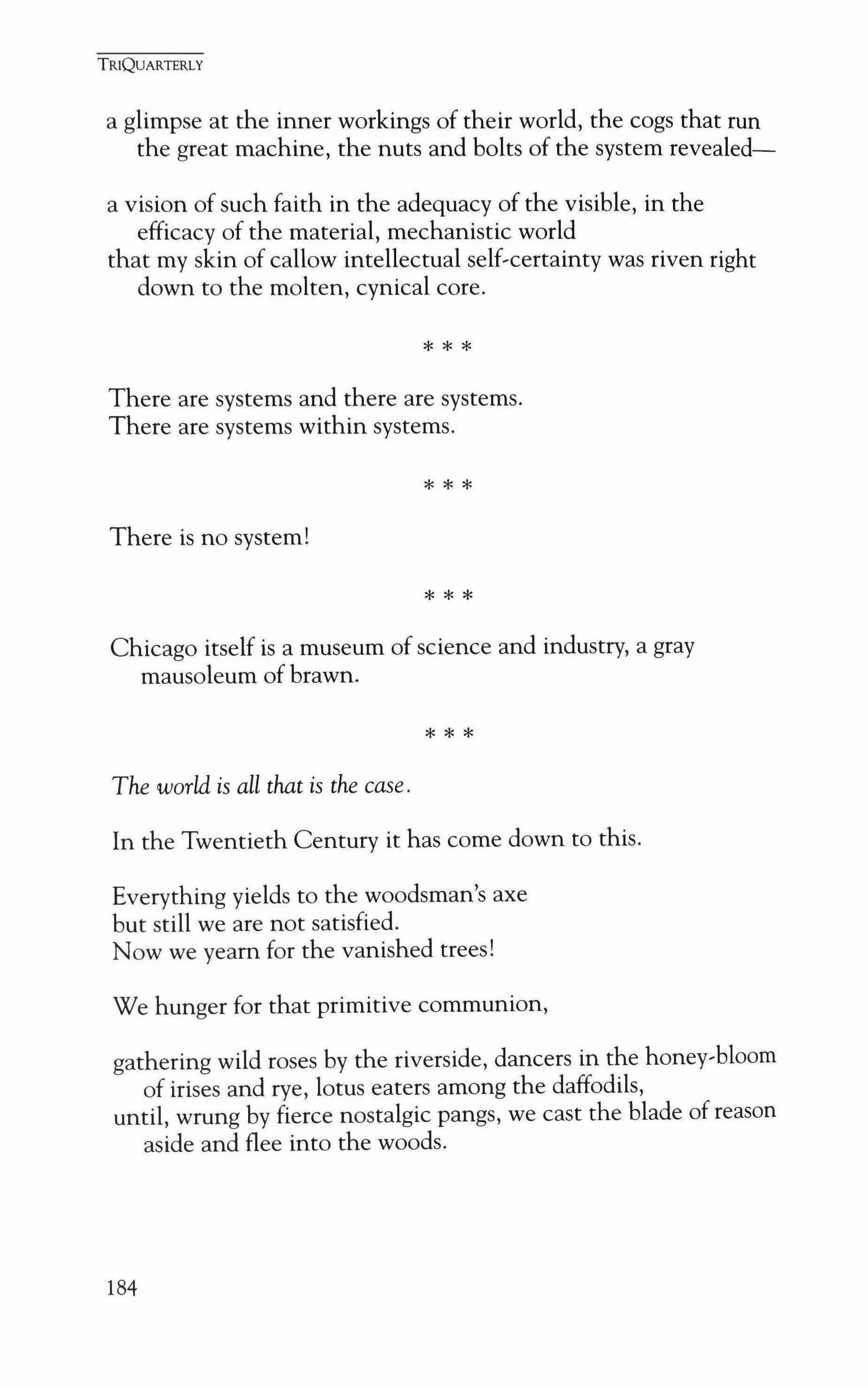
There are systems and there are systems. There are systems within systems.
There is no system!
Chicago itself is a museum of science and industry, a gray mausoleum of brawn.
The world is all that is the case.
In the Twentieth Century it has come down to this.
Everything yields to the woodsman's axe but still we are not satisfied. Now we yearn for the vanished trees!
We hunger for that primitive communion, gathering wild roses by the riverside, dancers in the honey-bloom of irises and rye, lotus eaters among the daffodils, until, wrung by fierce nostalgic pangs, we cast the blade of reason aside and flee into the woods.
TRIQUARTERLY
* * *
* * *
* * *
* * *
184
That is, we wish we dared relinquish it, wish we even knew the forest for the ghosts of illustrious hardwoods that haunt us. Thus we arrange the wooden blocks around the scene of the accident and say this is the car, this the pedestrian struck down in the crosswalk, which however flawlessly logical leaves the bereaved to drink pink lemonade and sink alone beneath the millstone of grief.
We are all of us alone, together, in our suffering.
At this juncture certain incurable romantics and distinguished French semioticians feel themselves compelled to leap into the breech and are in tum struck down by that reckless jalopy careening backward up a one-way street.
I guess they didn't see the sign in all this snow, or couldn't apprehend its Saussurean essence, or simply missed the drift.
Think how much eludes us, after all, willful elisions and bad translations, collateral damage to indigenous personnel.
Take the "galaxy of black-fry ink-fish," which means squid in bean sauce at Ho Wah Garden. Take the Melanesian tribesmen watching from the slopes of their sacred volcano for a great white ship laden with cargoshoes, shovels, Jeeps, spam-
an end to earthly need in the wild benevolence of the spirit-world.
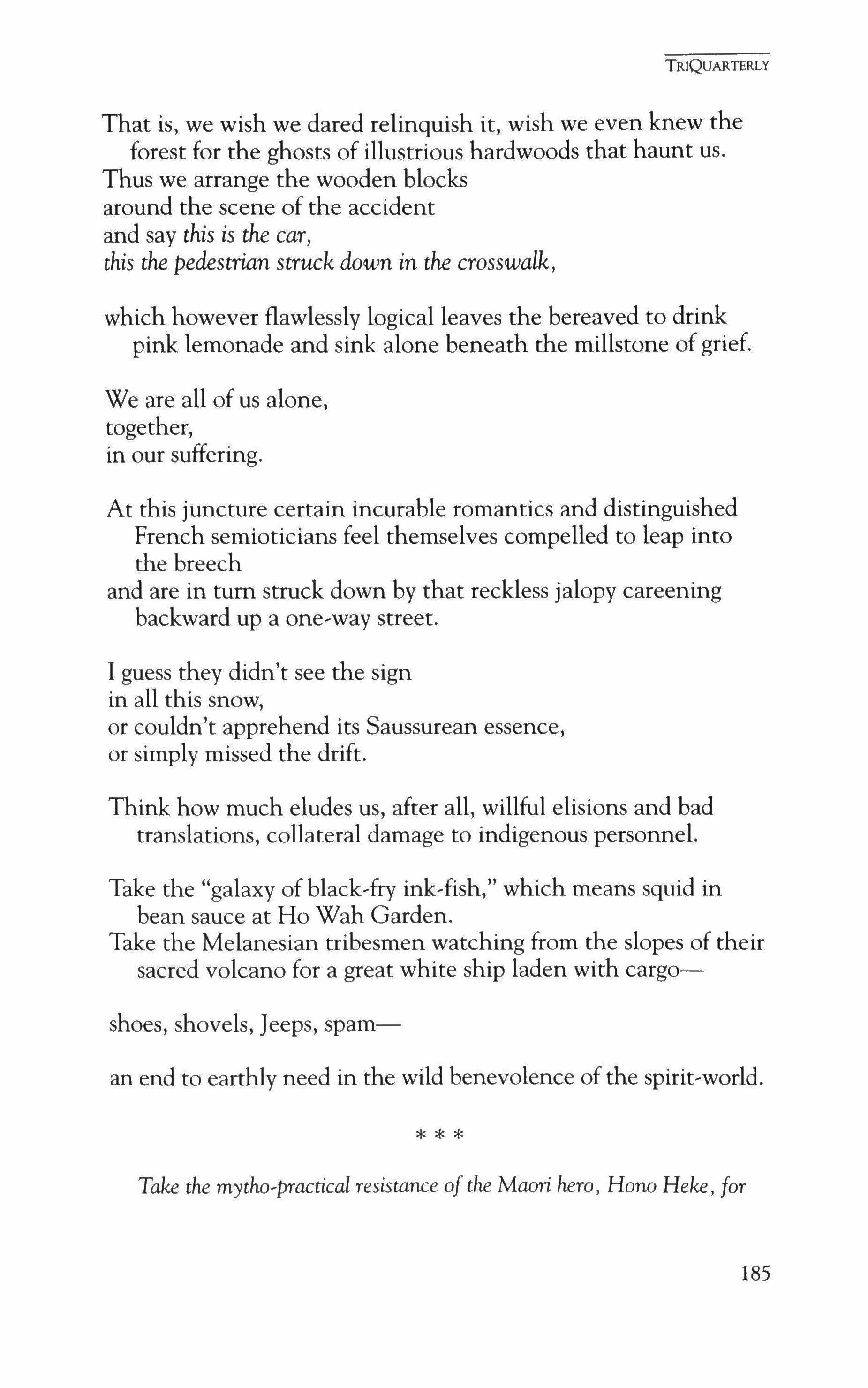
Take the mytho�prQCtical resistance of the Maori hero, Hono Heke, for 185
TRIQUARTERLY
* * *
instance. In 1845 Hono Heke deployed his warriors to assault--and unintentionally overwhelm-the largest colonial settlement in New Zealand, as a diversionary tactic: that is, in order to accomplish the exploit Heke always considered more decisive, and on four different occcsions performed, which was to cut down a certain flagpole the British had erected above the town. "Let us fight," he said, "for the flagpole alone."
-Marshall Sahlins, Islands ofHistory
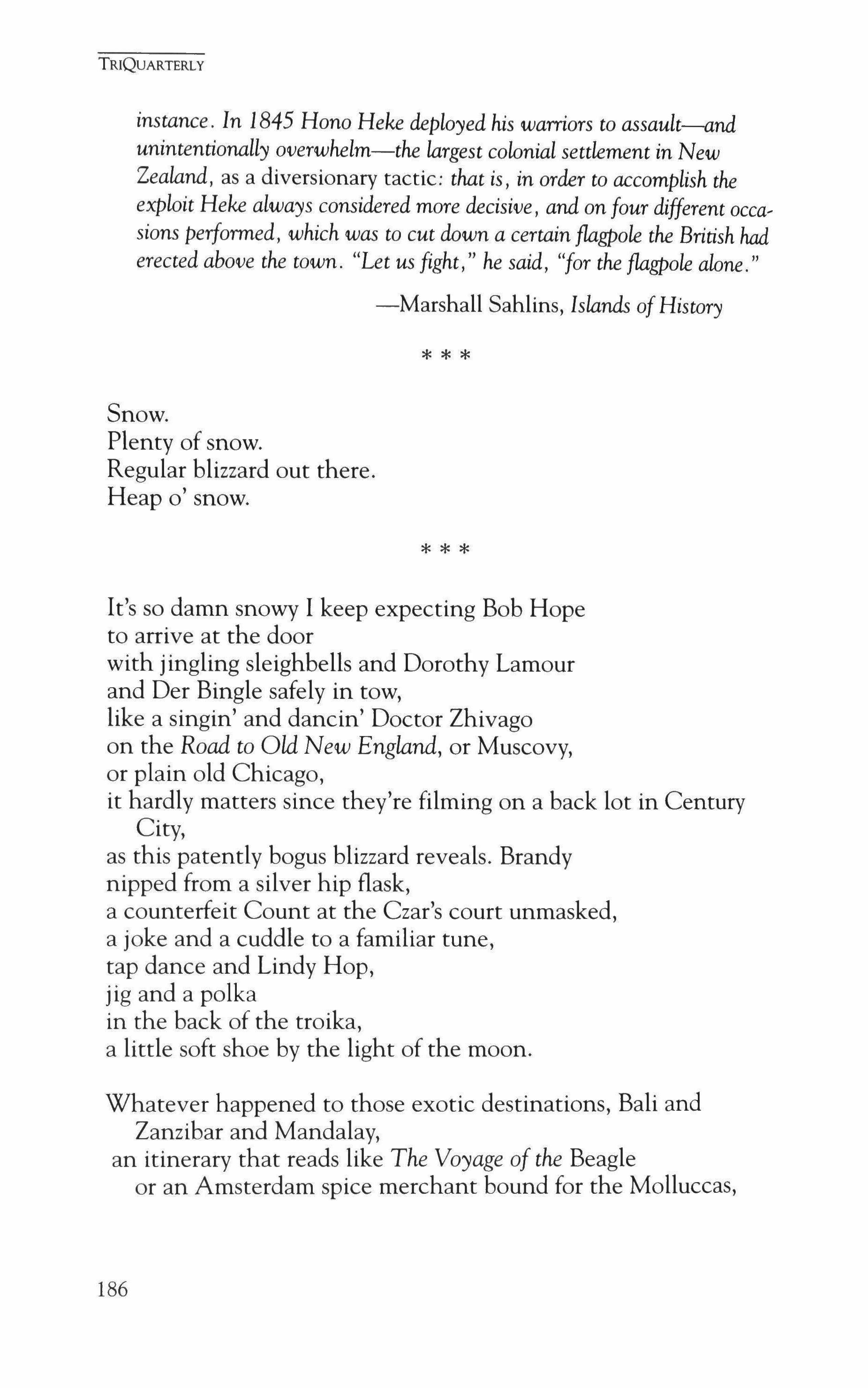
Snow.
Plenty of snow.
Regular blizzard out there.
Heap 0' snow.
It's so damn snowy I keep expecting Bob Hope to arrive at the door with jingling sleighbells and Dorothy Lamour and Der Bingle safely in tow, like a singin' and dancin' Doctor Zhivago on the Road to Old New England, or Muscovy, or plain old Chicago, it hardly matters since they're filming on a back lot in Century City, as this patently bogus blizzard reveals. Brandy nipped from a silver hip flask, a counterfeit Count at the Czar's court unmasked, a joke and a cuddle to a familiar tune, tap dance and Lindy Hop, jig and a polka in the back of the troika, a little soft shoe by the light of the moon.
Whatever happened to those exotic destinations, Bali and Zanzibar and Mandalay, an itinerary that reads like The Voyage of the Beagle or an Amsterdam spice merchant bound for the Molluccas,
TRIQUARTERlY
* * *
* * *
186
the road to romance, which is also the path of empire?
What's become of Bob,
our whirling Vishnu hoofing and hamming and yucking it up for the buzz-cut boys of sixty years of war, a man whose life so nearly matches the course of the century, our century, as surely as the seventeenth belonged to the Dutch?
What's become of us, America, our Bob-ness, our Self,Hope?
Do all roads lead to the materialist apotheosis, that miraculous oasis amid the golf,bedazzled desert of Palm Springs?
Is this the world we danced into creation, brilliant pebbles, a thousand points of light?

Driven down in anger the snow becomes a kind of shroud or wind,luffed veil tom at and buffeted in contradictory billows. In a lull it disintegrates to particles in suspension, like krill, a cur' tain of sediment stirred up by water through a wheel race or gold,miners panning river shallows or the changing tide plunging through a pass in the outer reef of a ringed atoll. The trunks of the big trees sway together, bending and rising through the swirling blizzard like underwater plants.
The snow,covered branches are intricate as fan-coral, their brilliant mesh as lovely as the Astrolabe Reef of Fiji, as the Great Barrier Reef itself, powdered breakers against the numberless branches and ramifications, the blind shoals where Captain Cook ran aground in the Endeavour, June 16, 1770, all hands saved from sinking by the lucky knob of coral that broke away to plug the clear,cut hole in her keel.
TRIQUARTERLY
* * *
187
Seven weeks of repairs on a shore of desolate mangrove and the distant smoke of aboriginal fires.
While Cook collected fresh greens against scurvy-palm cabbage and wild plantain, purslane and beans and tarothe men fished for stingrays, shot bandicoots and ducks and dingos, dug giant clams and harpooned turtles in the mud flats.
In the service of scientific inquiry, Joseph Banks hunted down specimens, sketched strange birds and unidentified shellfish, glimpsed, in the thorny underbrush, a mysterious animal-"large as a stag, mouse-colored, faster than a greyhound"that was, after elaborate effort, shot and killed and taken aboard to be skinned, preserved and duly cataloged.
Thus does the kangaroo enter the ledgers of Natural Science.

The woods and vegetation are as green as in April in Andalucia, and the song of the little birds might make a man wish never to leave here. The flocks ofparrots that darken the sun and the large and small birds of so many species are so differentfrom our own that it is a wonder. In addi, tion, there are trees of a thousand kinds, all with fruit according to their kind, and they all give off a marvelous fragrance. I am the saddest man in the world for not knowing what kind ofthings these are because I am very sure that they are valuable. I am bringing a sample ofeverything I can.
-Columbus, October 21, 1492
Few young birds in England have been injured by man, yet all are afraid ofhim; many individuals, on the other hand, both at the Galapagos and at the Falklands, have been injured, but yet have not learned that salutary dread. We may inferfrom these facts, what havoc the introduction ofany new beast ofprey must cause in a country, before the instincts of the abo' rigines become adapted to the stranger's craft or power.
-Darwin, The Voyage of the Beagle
TRIQUARTERLY
*
* *
* *
*
*
188
* *
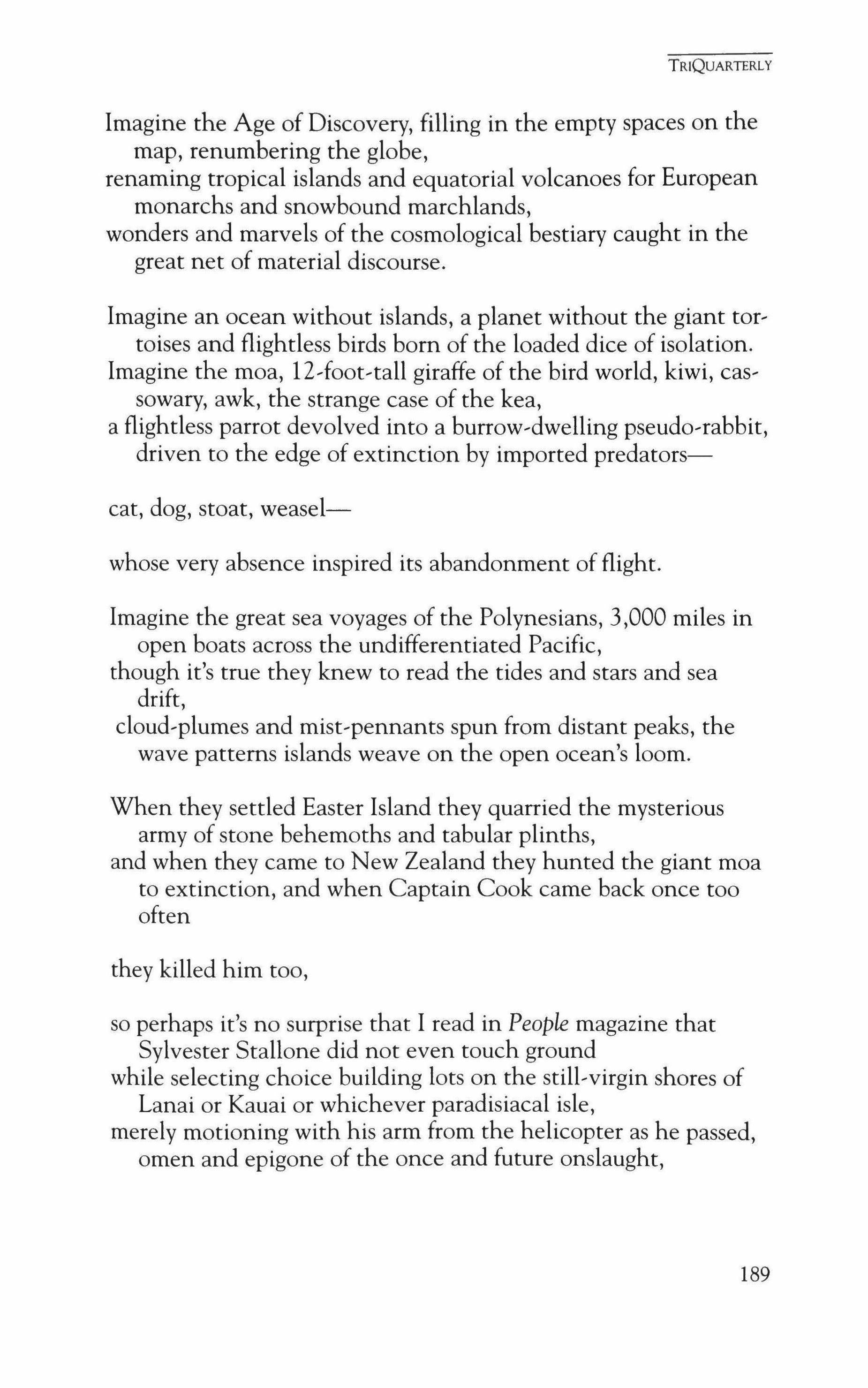
Imagine the Age of Discovery, filling in the empty spaces on the map, renumbering the globe, renaming tropical islands and equatorial volcanoes for European monarchs and snowbound marchlands, wonders and marvels of the cosmological bestiary caught in the great net of material discourse.
Imagine an ocean without islands, a planet without the giant tor' toises and flightless birds born of the loaded dice of isolation. Imagine the moa, 12,foot,tall giraffe of the bird world, kiwi, cas, sowary, awk, the strange case of the kea, a flightless parrot devolved into a burrow-dwelling pseudo-rabbit, driven to the edge of extinction by imported predatorscat, dog, stoat, weaselwhose very absence inspired its abandonment of flight.
Imagine the great sea voyages of the Polynesians, 3,000 miles in open boats across the undifferentiated Pacific, though it's true they knew to read the tides and stars and sea drift, cloud-plumes and mist-pennants spun from distant peaks, the wave patterns islands weave on the open ocean's loom.
When they settled Easter Island they quarried the mysterious army of stone behemoths and tabular plinths, and when they came to New Zealand they hunted the giant moa to extinction, and when Captain Cook came back once too often they killed him too,
so perhaps it's no surprise that I read in People magazine that Sylvester Stallone did not even touch ground while selecting choice building lots on the still,virgin shores of Lanai or Kauai or whichever paradisiacal isle, merely motioning with his arm from the helicopter as he passed, omen and epigone of the once and future onslaught,
TRIQUARTERLY
189
as Cook himself was harbinger for the British mercantile colonialism which served as host and hatchling for the current weltwirtschaft kudzu, his death, therefore, a kind of consumerist revenge-fantasy, especially as it was in all likelihood a British dagger that killed him, having been loaded and shipped as trade goods for "ye Natives" in 1776, the year of American independence,
not to mention the publication of The Wealth of Nations.
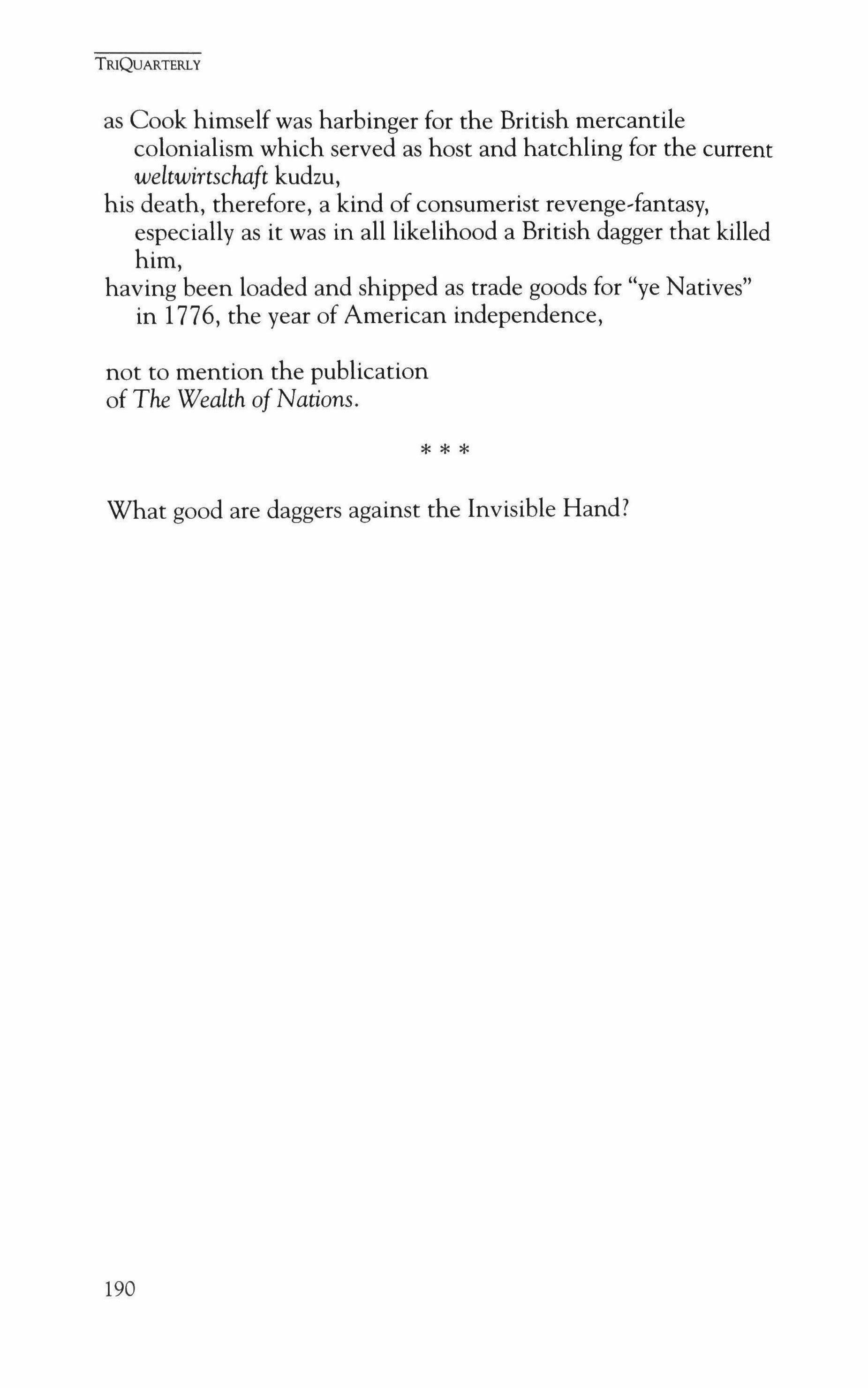
What good are daggers against the Invisible Hand?
TRIQUARTERLY
* * *
190
Four Poems
Claire Malraux
Translated from the French by C. K. Williams
Citadel
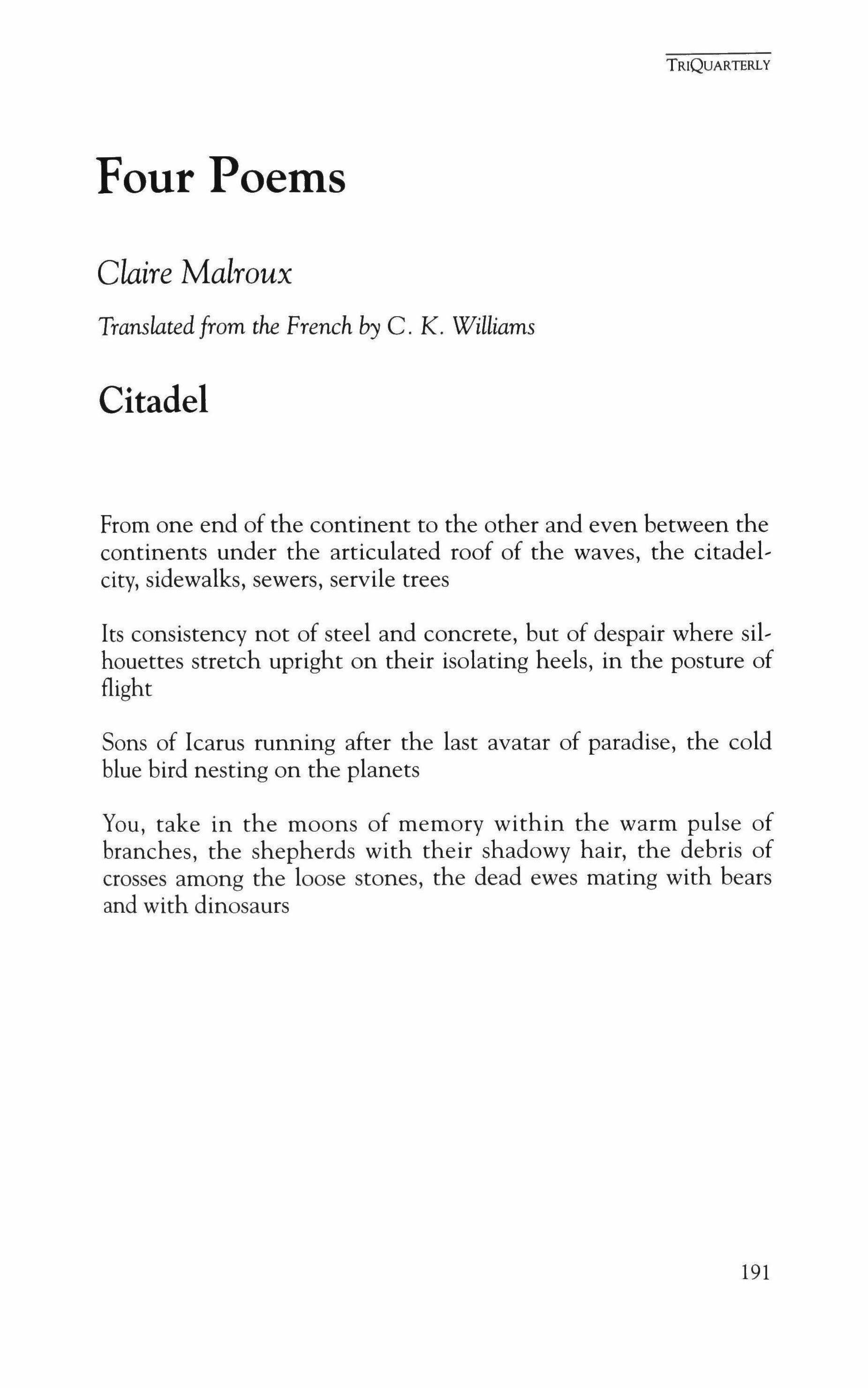
From one end of the continent to the other and even between the continents under the articulated roof of the waves, the citadelcity, sidewalks, sewers, servile trees
Its consistency not of steel and concrete, but of despair where silhouettes stretch upright on their isolating heels, in the posture of flight
Sons of Icarus running after the last avatar of paradise, the cold blue bird nesting on the planets
You, take in the moons of memory within the warm pulse of branches, the shepherds with their shadowy hair, the debris of crosses among the loose stones, the dead ewes mating with bears and with dinosaurs
TRIQUARTERLY
191
Prison for Stars
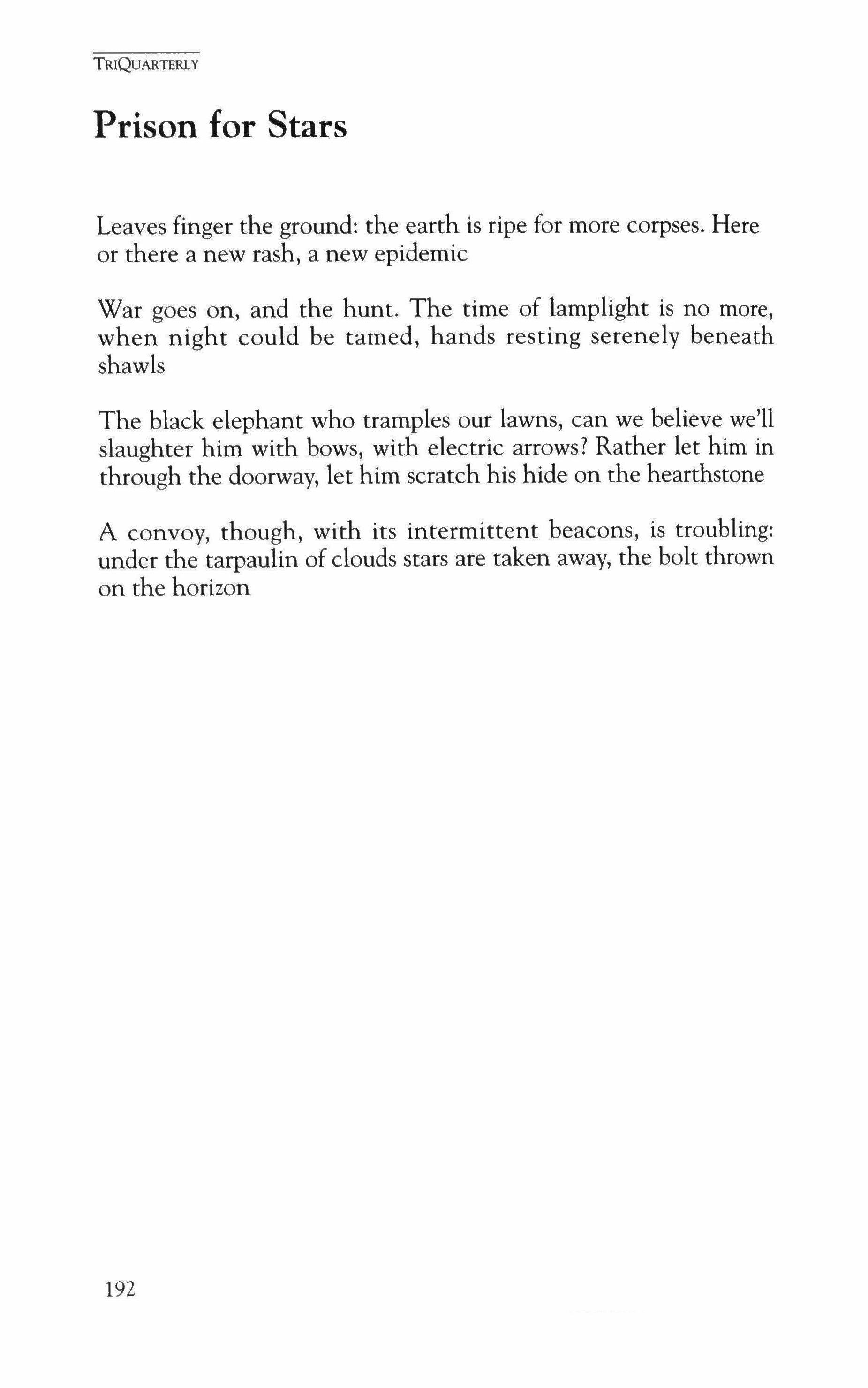
Leaves finger the ground: the earth is ripe for more corpses. Here or there a new rash, a new epidemic
War goes on, and the hunt. The time of lamplight is no more, when night could be tamed, hands resting serenely beneath shawls
The black elephant who tramples our lawns, can we believe we'll slaughter him with bows, with electric arrows? Rather let him in through the doorway, let him scratch his hide on the hearthstone
A convoy, though, with its intermittent beacons, is troubling: under the tarpaulin of clouds stars are taken away, the bolt thrown on the horizon
TRIQUARTERLY
192

Illumination
Shoot away, stars, pour down onto the plateau where we're waiting for you this night of all nights, perhaps signs will appear
The hills dissolve, the razed earth reverts to ocean, grass casts its billions of diamond stitches around the incandescent path
All the clarity concentrated in this single line, this one point, as though God's beacon had suddenly focused on the furthest outpost of his galaxies
Or as though death had come for a child of tomorrow, or hope with its array of extraterrestrial objects
TRIQUARTERLY
193
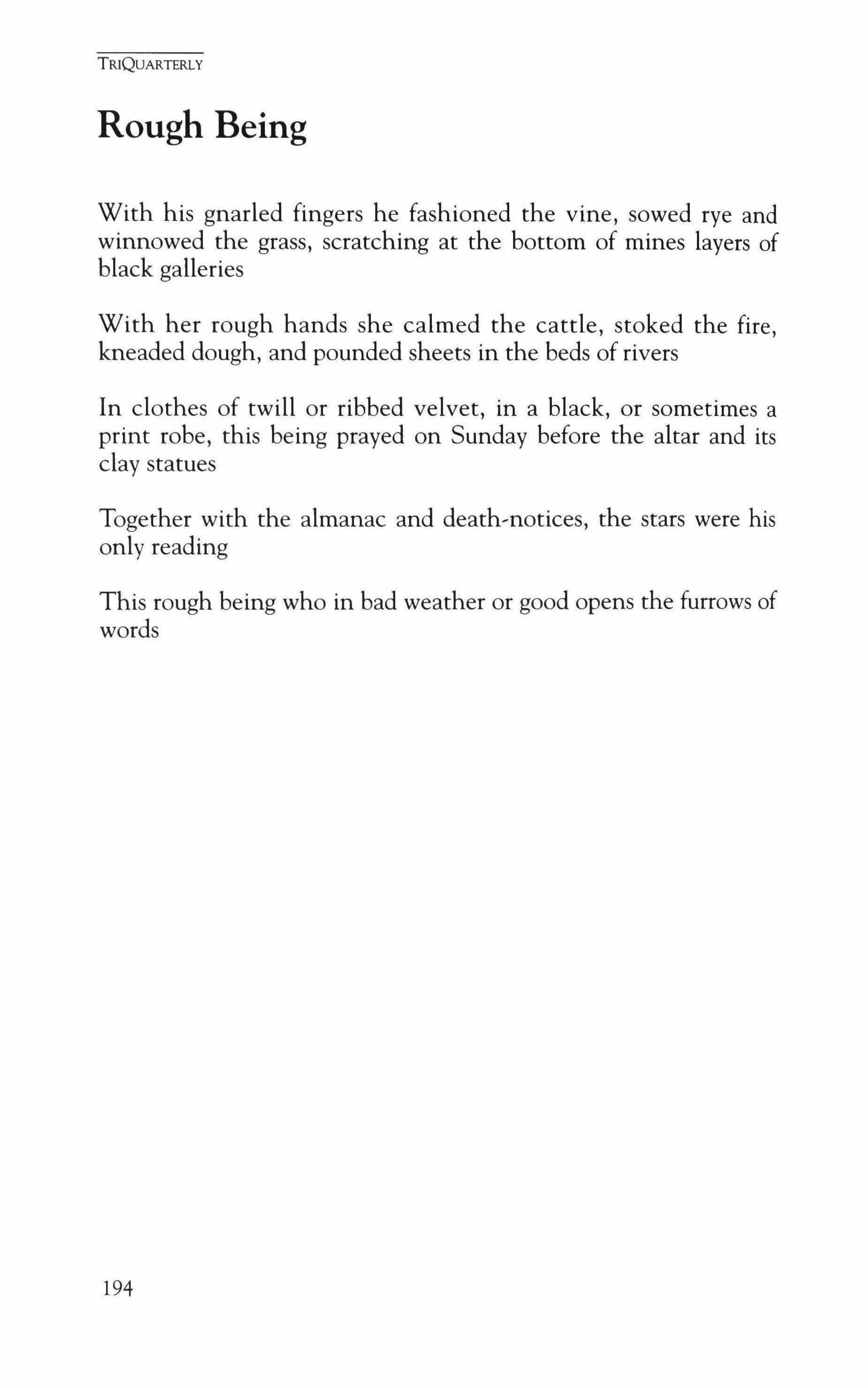
Rough Being
With his gnarled fingers he fashioned the vine, sowed rye and winnowed the grass, scratching at the bottom of mines layers of black galleries
With her rough hands she calmed the cattle, stoked the fire, kneaded dough, and pounded sheets in the beds of rivers
In clothes of twill or ribbed velvet, in a black, or sometimes a print robe, this being prayed on Sunday before the altar and its clay statues
Together with the almanac and death-notices, the stars were his only reading
This rough being who in bad weather or good opens the furrows of words
TRIQUARTERLY
194
Fitting Ends
DanChaon

There is a story about my brother Del which appears in a book called More True Tales of the Weird and Supernatural. The piece on Del is about three pages long, full of exclamation points and supposedly eerie descriptions. It is based on what the writer calls "true facts."
The writer spends much of the first few paragraphs setting the scene, trying to make it sound spooky. "The tiny, isolated village of Pyramid, Nebraska," is what the author calls the place where I grew up. I had never thought of it as a village. It wasn't much of anything, really-it wasn't even on the map, and hadn't been since my father was a boy, when it was a stop on the Union Pacific railroad line. Back then, there was a shantytown for the railroad workers, a dance hall, a general store, a post office. By the time I was growing up, all that was left was a cluster of mostly boarded-up, run-down houses. My family-my parents and grandparents and my brother and I-lived in the only occupied buildings. There was a grain elevator, which my grandfather had run until he retired and my father took over. "PYRAMID" was painted in peeling block letters on one of the silos.
The man who wrote the story got fixated on that elevator. He talks of it as "a menacing, hulking structure," and says it is like "Childe Roland's ancient dark tower, presiding over the barren fields and empty, sentient houses." He even goes so far as to mention "the soundless flutter of bats flying in and out of the single, eve-like window at the top of the elevator," and "the distant, melancholy calls of coyotes from the hills beyond," which are then drowned out by "the strange echoing moan of a freight train as it passes in the night."
TRIQUARTERLY
195
TRIQUARTERLY

There really are bats, of course; you find them in every country place. Personally, I never heard coyotes, though it is true they were around. I saw one once when I was about twelve. I was staring from my bedroom window late one night and there he was. He had come down from the hills and was crouched in our yard, licking drops of water off the propeller of the sprinkler. As for the trains, they passed through about every half-hour, day and night. If you lived there, you didn't even hear them-or maybe only half-heard them, the way, now that I live in a town, I might vaguely notice the bells of the nearby Catholic church at noon.
But anyway, this is how the writer sets things up. Then he begins to tell about some of the train engineers, how they dreaded passing through this particular stretch. He quotes one man as saying he got goose bumps every time he started to come up on Pyramid. "There was just something about that place," says this man. There were a few bad accidents at the crossing-a carload of drunken teenagers who tried to beat the train, an old guy who had a heart attack as his pickup bumped across the tracks. That sort of thing. Actually, this happens anywhere that has a railroad crossing.
Then came the sightings. An engineer would see "a figure" walking along the tracks in front of the train, just beyond the Pyramid elevator. The engineer would blow his hom, but the person, "the figure," would seem not to notice. The engineer blasted the hom several more times, more and more insistent. But the person kept walking; pretty soon the train's headlights glared onto a tall, muscular boy with shaggy dark hair and a green fatigue jacket. They tried to brake the train, but it was too late. The boy suddenly fell to his knees, and the engineer was certain he'd hit him. But of course, when the train was stopped, they could find nothing. "Not a trace," says our author. This happened to three different engineers; three different incidents in a two-year period.
You can imagine the ending, of course: that was how my brother died, a few years after these supposed sightings began. His car had run out of gas a few miles from home, and he was walking back. He was drunk. Who knows why he was walking along the tracks? Who knows why he suddenly kneeled down? Maybe he stumbled, or had to throw up. Maybe he did it on purpose. He was killed instantly.
The whole ghost stuff came out afterward. One of the engineers who'd seen the "ghost" recognized Del's picture in the paper, and came forward or something. I always believed it was made up. It was stupid, I always thought, like a million campfire stories you'd heard or some cheesy pro-
196
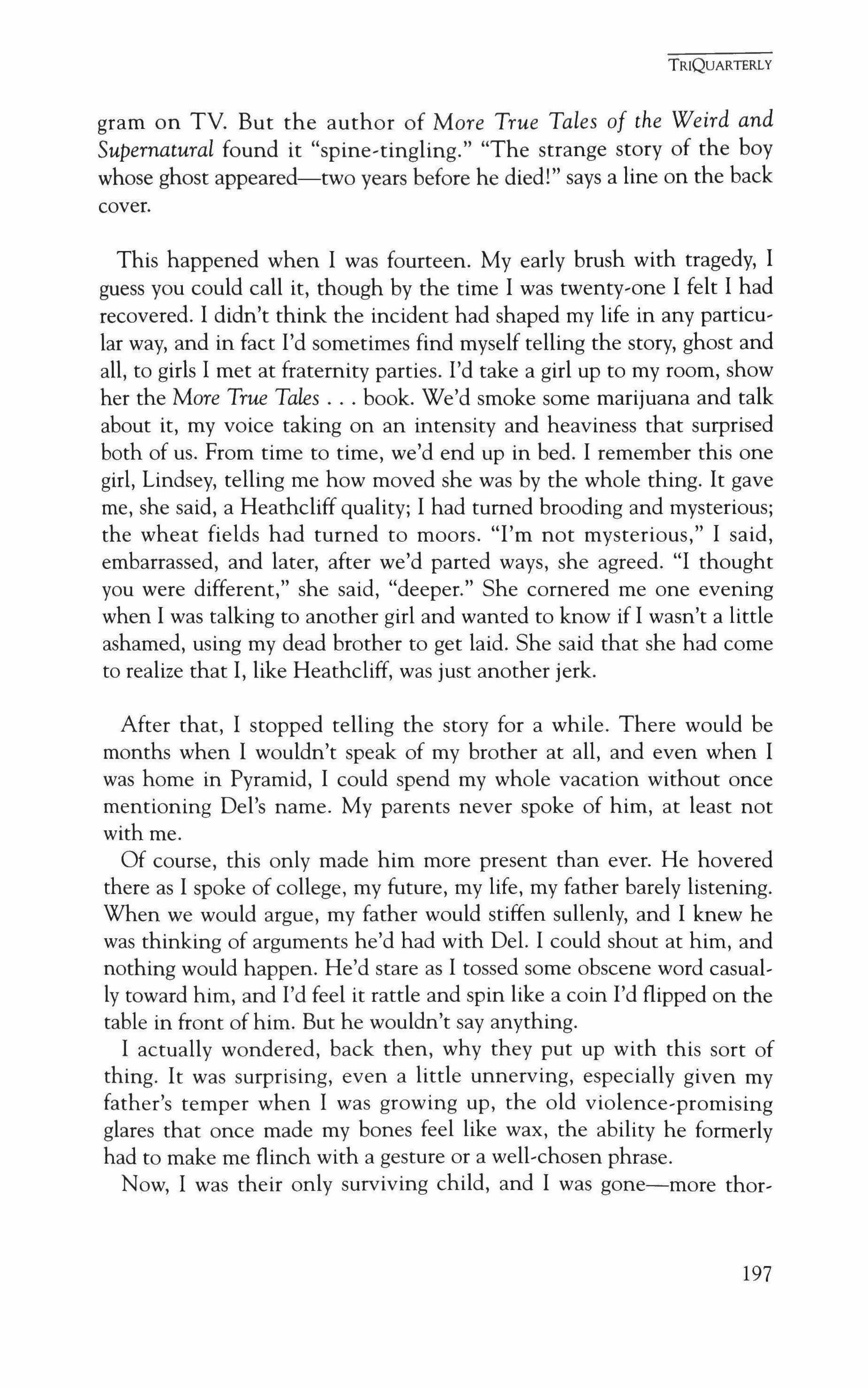
gram on TV. But the author of More True Tales of the Weird and Supernatural found it "spine-tingling." "The strange story of the boy whose ghost appeared-two years before he died!" says a line on the back cover.
This happened when I was fourteen. My early brush with tragedy, I guess you could call it, though by the time I was twenty-one I felt I had recovered. I didn't think the incident had shaped my life in any particular way, and in fact I'd sometimes find myself telling the story, ghost and all, to girls I met at fraternity parties. I'd take a girl up to my room, show her the More True Tales book. We'd smoke some marijuana and talk about it, my voice taking on an intensity and heaviness that surprised both of us. From time to time, we'd end up in bed. I remember this one girl, Lindsey, telling me how moved she was by the whole thing. It gave me, she said, a Heathcliff quality; I had turned brooding and mysterious; the wheat fields had turned to moors. "I'm not mysterious," I said, embarrassed, and later, after we'd parted ways, she agreed. "I thought you were different," she said, "deeper." She cornered me one evening when I was talking to another girl and wanted to know if I wasn't a little ashamed, using my dead brother to get laid. She said that she had come to realize that I, like Heathcliff, was just another jerk.
After that, I stopped telling the story for a while. There would be months when I wouldn't speak of my brother at all, and even when I was home in Pyramid, I could spend my whole vacation without once mentioning Del's name. My parents never spoke of him, at least not with me.
Of course, this only made him more present than ever. He hovered there as I spoke of college, my future, my life, my father barely listening. When we would argue, my father would stiffen sullenly, and I knew he was thinking of arguments he'd had with Del. I could shout at him, and nothing would happen. He'd stare as I tossed some obscene word casually toward him, and I'd feel it rattle and spin like a coin I'd flipped on the table in front of him. But he wouldn't say anything.
I actually wondered, back then, why they put up with this sort of thing. It was surprising, even a little unnerving, especially given my father's temper when I was growing up, the old violence-promising glares that once made my bones feel like wax, the ability he formerly had to make me flinch with a gesture or a well-chosen phrase.
Now, I was their only surviving child, and I was gone-more thor-
TRIQUARTERLY
197

oughly gone than Del was, in a way. I'd driven off to college in New York, and it was clear I wasn't ever coming back. Even my visits became shorter and shorter-summer trimmed down from three months to less than two weeks over the course of my years at college; at Christmas, I'd stay on campus after finals, wandering the emptying passageways of my residence hall, loitering in the student center, my hands clasped behind my back, staring at the ragged bulletin boards as if they were paintings in a museum. I found excuses to keep from going back. And then, when I got there, finally, I was just another ghost.
About a year before he died, Del saved my life. It was no big deal, I thought. It was summer, trucks were coming to the grain elevator, and my brother and I had gone up to the roof to fix a hole. The elevator was flat on top, and when I was little, I used to imagine that being up there was like being in the turret of a lighthouse. I used to stare out over the expanse of prairie, across the fields and their flotsam of machinery, cattle, men, over the rooftops of houses, along the highways and railroad tracks that trailed off into the horizon. When I was small, this would fill me with wonder. My father would stand there with me, holding my hand, and the wind would ripple our clothes.
I was thinking of this, remembering, when I suddenly started to do a little dance. I didn't know why I did such things: my father said that ever since I started junior high school I'd been like a "-holic" of some sort, addicted to making an ass out of myself. Maybe this was true, because I started to caper around, and Del said "I'd laugh if you fell, you idiot," stern and condescending, as if I was the juvenile delinquent. I ignored him. With my back turned to him, I began to sing "Ain't No Mountain High Enough" in a deep corny voice, like my father's. I'd never been afraid of heights, and I suppose I was careless. Too close to the edge, I slipped, and my brother caught my arm.
I was never able to recall exactly what happened in that instant. I remember being surprised by the sound that came from my throat, a high scream like a rabbit's that seemed to ricochet downward, a stone rattling through a long drainpipe. I looked up and my brother's mouth was wide open, as if he'd made the sound. The tendons on his neck stood out.
I told myself that if I'd been alone, nothing would have happened. I would've just teetered a little, then gained my balance again. But when my brother grabbed me, I lost my equilibrium, and over the edge I went. There were a dozen trucks lined up to have their loads weighed, and all
TRIQUARTERLY
198

the men down there heard that screech, looked up startled to see me dangling there with two hundred feet between me and the ground. They all watched Del yank me back up to safety.
I was on the ground before it hit me. Harvesters were getting out of their trucks and ambling toward us, and I could see my father pushing his way through the crowd. It was then that my body took heed of what had happened. The solid earth kept opening up underneath me, and Del put his arm around me as I wobbled. Then my father loomed. He got hold of me, clenching my shoulders, shaking me. "My sore neck!" I cried out. "Dad, my neck!" The harvesters' faces jittered, pressing closer; I could see a man in sunglasses with his black, glittering eyes fixed on me. "Del pushed me," I cried out as my father's gritted teeth carne toward my face. Tears slipped suddenly out of my eyes. "Del pushed me, Dad! It wasn't my fault."
My father had good reason to believe this lie, even though he and some twelve or more others had been witness to my singing and careless prancing up there. The possibility still existed that Del might have given me a shove from behind. My father didn't want to believe Del was capable of such a thing. But he knew he was.
Del had only been back horne for about three weeks. Prior to that, he'd spent several months in a special program for juvenile delinquents. The main reason for this was that he'd become so belligerent, so violent, that my parents didn't feel they could control him. He'd also, over the course of things, stolen a car.
For much of the time that my brother was in this program, I wore a neck brace. He'd tried to strangle me the night before he was sent away. He claimed he'd seen me smirking at him, though actually I was only thinking of something funny I'd seen on TV. Del was the furthest thing from my thoughts until he jumped on me. If my father hadn't separated us, Del probably would have choked me to death.
This was one of the things that my father must have thought of. He must have remembered the other times that Del might have killed me: the time when I was twelve and he threw a can of motor oil at my head when my back was turned; the time when I was seven and he pushed me off the tailgate of a moving pickup, where my father had let us sit when he was driving slowly down a dirt road. My father was as used to hearing these horror stories as I was to telling them.
Though he was only three and a half years older than I, Del was much larger. He was much bigger than I'll ever be, and I was just starting to
TRIQUARTERLY
199
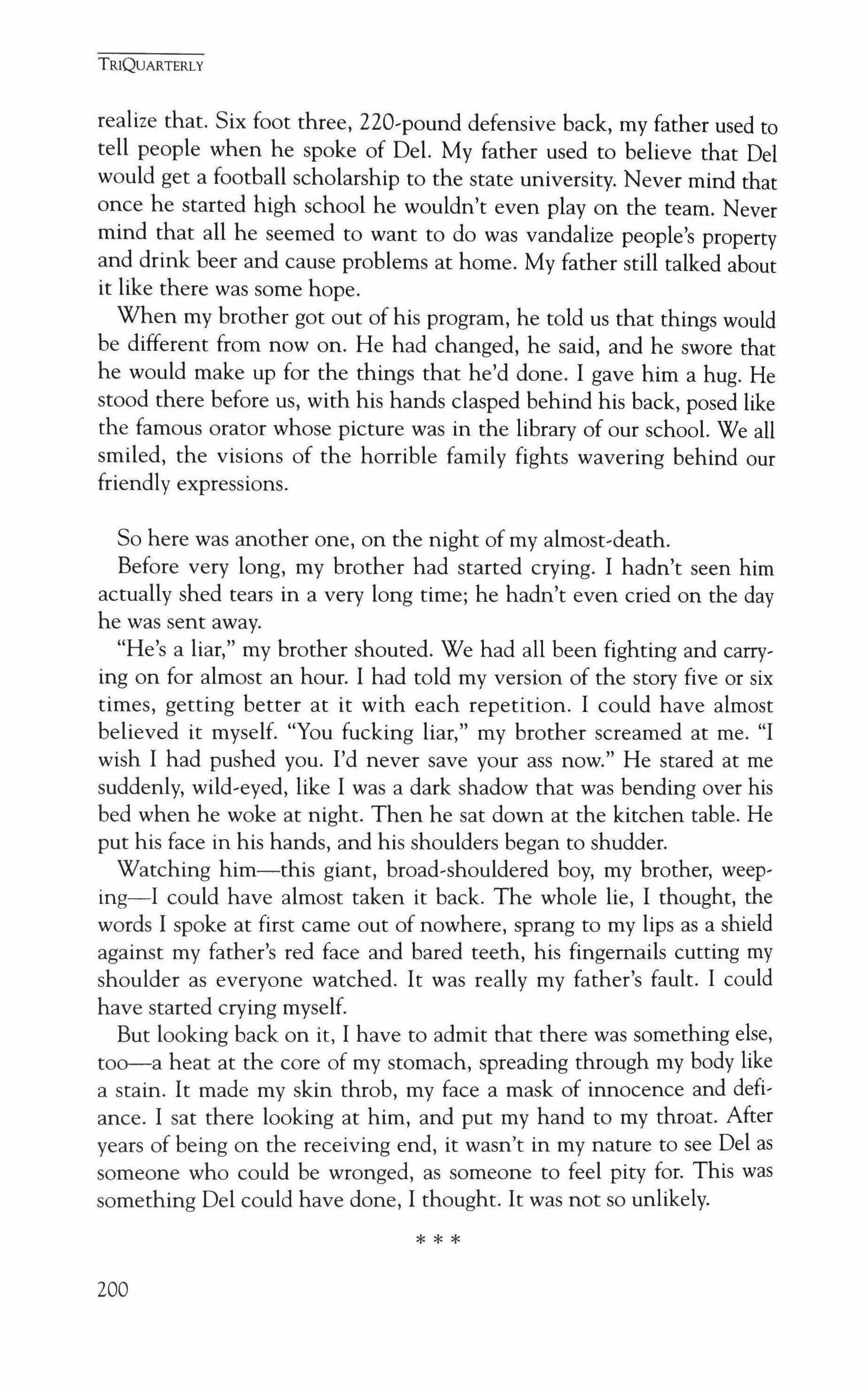
realize that. Six foot three, 220,pound defensive back, my father used to tell people when he spoke of Del. My father used to believe that Del would get a football scholarship to the state university. Never mind that once he started high school he wouldn't even play on the team. Never mind that all he seemed to want to do was vandalize people's property and drink beer and cause problems at home. My father still talked about it like there was some hope.
When my brother got out of his program, he told us that things would be different from now on. He had changed, he said, and he swore that he would make up for the things that he'd done. I gave him a hug. He stood there before us, with his hands clasped behind his back, posed like the famous orator whose picture was in the library of our school. We all smiled, the visions of the horrible family fights wavering behind our friendly expressions.
So here was another one, on the night of my almost-death.
Before very long, my brother had started crying. I hadn't seen him actually shed tears in a very long time; he hadn't even cried on the day he was sent away.
"He's a liar," my brother shouted. We had all been fighting and carry' ing on for almost an hour. I had told my version of the story five or six times, getting better at it with each repetition. I could have almost believed it myself. "You fucking liar," my brother screamed at me. "I wish I had pushed you. I'd never save your ass now." He stared at me suddenly, wild-eyed, like I was a dark shadow that was bending over his bed when he woke at night. Then he sat down at the kitchen table. He put his face in his hands, and his shoulders began to shudder.
Watching him-this giant, broad-shouldered boy, my brother, weep' ing-I could have almost taken it back. The whole lie, I thought, the words I spoke at first came out of nowhere, sprang to my lips as a shield against my father's red face and bared teeth, his fingernails cutting my shoulder as everyone watched. It was really my father's fault. I could have started crying myself.
But looking back on it, I have to admit that there was something else, too-a heat at the core of my stomach, spreading through my body like a stain. It made my skin throb, my face a mask of innocence and defiance. I sat there looking at him, and put my hand to my throat. After years of being on the receiving end, it wasn't in my nature to see Del as someone who could be wronged, as someone to feel pity for. This was something Del could have done, I thought. It was not so unlikely.
TRIQUARTERLY
*** 200
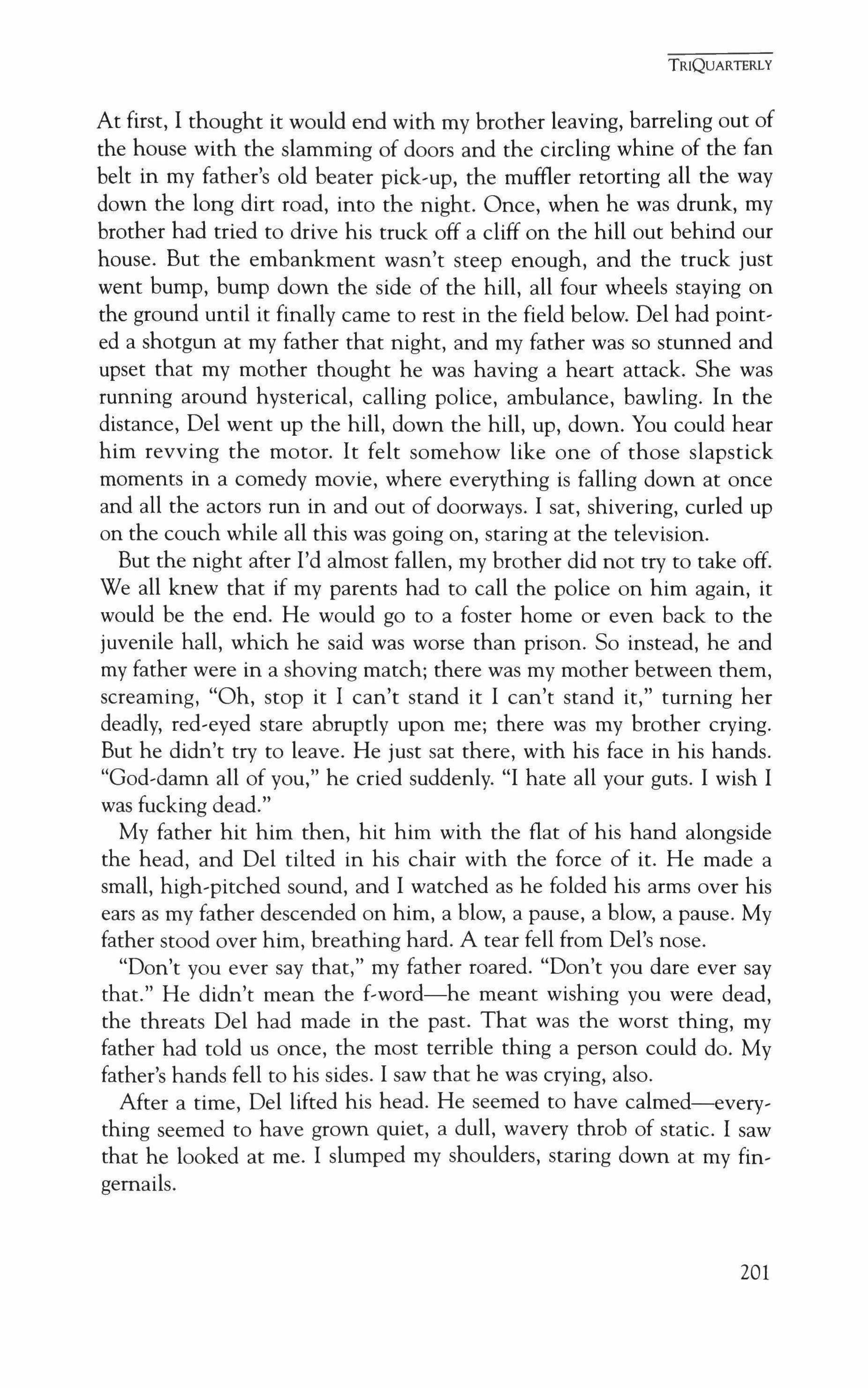
At first, I thought it would end with my brother leaving, barreling out of the house with the slamming of doors and the circling whine of the fan belt in my father's old beater pick-up, the muffler retorting all the way down the long dirt road, into the night. Once, when he was drunk, my brother had tried to drive his truck off a cliff on the hill out behind our house. But the embankment wasn't steep enough, and the truck just went bump, bump down the side of the hill, all four wheels staying on the ground until it finally came to rest in the field below. Del had pointed a shotgun at my father that night, and my father was so stunned and upset that my mother thought he was having a heart attack. She was running around hysterical, calling police, ambulance, bawling. In the distance, Del went up the hill, down the hill, up, down. You could hear him revving the motor. It felt somehow like one of those slapstick moments in a comedy movie, where everything is falling down at once and all the actors run in and out of doorways. I sat, shivering, curled up on the couch while all this was going on, staring at the television.
But the night after I'd almost fallen, my brother did not try to take off. We all knew that if my parents had to call the police on him again, it would be the end. He would go to a foster home or even back to the juvenile hall, which he said was worse than prison. So instead, he and my father were in a shoving match; there was my mother between them, screaming, "Oh, stop it I can't stand it I can't stand it," turning her deadly, red-eved stare abruptly upon me; there was my brother crying. But he didn't try to leave. He just sat there, with his face in his hands. "God-damn all of you," he cried suddenly. "I hate all your guts. I wish I was fucking dead."
My father hit him then, hit him with the flat of his hand alongside the head, and Del tilted in his chair with the force of it. He made a small, high-pitched sound, and I watched as he folded his arms over his ears as my father descended on him, a blow, a pause, a blow, a pause. My father stood over him, breathing hard. A tear fell from Del's nose.
"Don't you ever say that," my father roared. "Don't you dare ever say that." He didn't mean the f�word-he meant wishing you were dead, the threats Del had made in the past. That was the worst thing, my father had told us once, the most terrible thing a person could do. My father's hands fell to his sides. I saw that he was crying, also.
After a time, Del lifted his head. He seemed to have calmed-s-evervthing seemed to have grown quiet, a dull, wavery throb of static. I saw that he looked at me. I slumped my shoulders, staring down at my fingemails.
TRIQUARTERLY
201

"You lie," Del said softly. "You can't even look me in the face." He got up and stumbled a few steps, as if my father would go after him again. But my father just stood there.
"Get out of my sight," he said. "Go on."
I heard Del's tennis shoes thump up the stairs, the slam of our bedroom door. But just as I felt my body start to untense, my father turned to me. He wiped the heel of his hand over his eyes, gazing at me without blinking. After all of Del's previous lies, his denials, his betrayals, you would think they would never believe his side of things again. But I could see a slowly creaking hinge of doubt behind my father's expression. I looked down.
"If I ever find out you're lying to me, boy," my father said.
He didn't ever find out. The day I almost fell was another one of those things we never got around to talking about again. It probably didn't seem very significant to my parents, in the span of events that had happened before and came after. They dwelt on other things.
On what, I never knew. My wife found this unbelievable: "Didn't they say anything after he died?" she asked me, and I had to admit that I didn't remember. They were sad, I told her. I recalled my father crying. But they were country people. I tried to explain this to my wife, good Boston girl that she is, the sort of impossible grief that is like something gnarled and stubborn and underground. I never really believed it myself. For years, I kept expecting things to go back to normal, waiting for whatever was happening to them to finally be over.
My parents actually became quite mellow in the last years of their lives. My mother lost weight, was often ill. Eventually, shortly after her sixtieth birthday, she went deaf. Her hearing slipped away quickly, like a skin she was shedding, and all the tests proved inconclusive. That was the year that my son was born. In January, when my wife discovered that she was pregnant, my parents were in the process of buying a fancy, expensive hearing aid. By the time the baby was four months old, the world was completely soundless for my mother, hearing aid or not.
The problems of my college years had passed away by that time. I was working at a small private college in upstate New York, in alumni relations. My wife and I seldom went back to Nebraska; we couldn't afford the money or the time. But I talked to my parents regularly on the phone, once or twice a month.
We ended up going back that Christmas after Ezra was born. My mother's letters had made it almost impossible to avoid. "It breaks my
TRIQUARTERLY
202

heart that I can't hear my grandson's voice, now that he is making his little sounds," she had written. "But am getting by O.K. and will begin lip-reading classes in Denver after Xmas. It will be easier for me then." She would get on the phone when I called my father. "I can't hear you talking, but I love you," she'd say.
"We have to work to make her feel involved in things," my father told us as we drove from the airport, where he'd picked us up. "The worst thing is that they start feeling isolated," he told us. "We got little pads so we can write her notes." He looked over at me, strangely academic, looking in the new glasses he had for driving. In the last few years he had begun to change, his voice turning slow and gentle, as if he were watching something out in the distance beyond the window, or some' thing sad and mysterious on TV as we talked. His former short temper had vanished, leaving only a soft reproachfulness in its place. But even that was muted. He knew that he couldn't really make me feel guilty. "You know how she is," he said to my wife and me, though of course we did not, either one of us, really know her. "You know how she is. The hardest part is, you know, we don't want her to get depressed."
She looked awful. Every time I saw her since I graduated from college, this stunned me. I came in, carrying my sleeping son, and she was sitting at the kitchen table, her spine curved a little bit more than the last time, thinner, so skinny that her muscles seemed to stand out against the bone. Back in New York, I worked with alumni ladies older than she who played tennis, who dressed in trendy clothes, who walked with a casual and still sexy ease. These women wouldn't look like my mother for another twenty years, if ever. I felt my smile pull awkwardly on my face.
"Hello!" I called, but of course she didn't look up. My father flicked on the porch light. "She hates it when you surprise her," he said softly, as if there were still some possibility of her overhearing. My wife looked over at me. Her eyes said that this was going to be another holiday that was like work for her.
My mother lifted her head. Her shrewdness was still intact, at least, and she was ready for us the moment the porch light hit her consciousness. That terrible, monkeyish dullness seemed to lift from her expression as she looked up.
"Well, howdy," she called, in the same jolly, slightly ironic way she always did when she hadn't seen me in a long time. She came over to hug us, then peered down at Ezra, who stirred a little as she pushed back his parka hood to get a better look. "Oh, what an angel," she whispered. "It's about killed me, not being able to see this boy." Then she stared
TRIQUARTERLY
203

down at Ezra again. How he'd grown, she told us. She thought he looked like me, she said, and I was relieved. Actually, I'd begun to think that Ezra somewhat resembled the pictures I'd seen of Del as a baby. But my mother didn't say that, at least.
I had planned to have a serious talk with them on this trip. Or maybe "planned" is the wrong word=-t'constdered" might be closer, though even that doesn't express the vague, unpleasantly anxious urge that I could feel at the back of my neck. I didn't really know what I wanted to know. And the truth was, these quiet, fragile, distantly tender people bore little resemblance to the mother and father in my mind. It had been ten years since I'd lived at home. Ten years!- which filled the long, snowy evenings with a numbing politeness. My father sat in his easy chair, after dinner, watching the news. My wife read. My mother and I did the dishes together, silently, nodding as the plate she had rinsed passed from her hand to mine, to be dried and put away. When a train passed, the little window above the sink vibrated, humming like a piece of cellophane. But she did not notice this.
We did have a talk of sorts that trip, my father and I. It was on the third day after our arrival, a few nights before Christmas Eve. My wife and my mother were both asleep. My father and I sat out on the closedin porch, drinking beer, watching the snow drift across the yard, watching the wind send fingers of snow slithering along low to the ground. I had drunk more than he had. I saw him glance sharply at me for a second when I came back from the refrigerator a fourth time, and popped open the can. But the look faded quickly. Outside, beyond the window, I could see the blurry shape of the elevator through the falling snow, its outlines indistinct, wavering like a mirage.
"Do you remember that time," I said, "when I almost fell off the elevator?"
It came out like that, abrupt, stupid. As I sat there in my father's silence, I realized how impossible it was, how useless to try to patch years of ellipsis into something resembling dialogue. I looked down, and he cleared his throat.
"Sure," he said at last, noncommittal. "Of course I remember."
"I think about that sometimes," I said. Drunk-I felt the alcohol edge into my voice as I spoke. "It seems," I said, "significant." That was the word that came to me. "It seems significant sometimes," I said.
My father considered this for a while. He stiffened formally, as if he were being interviewed. "Well," he said. "I don't know. There were so
TRIQUARTERLY
204
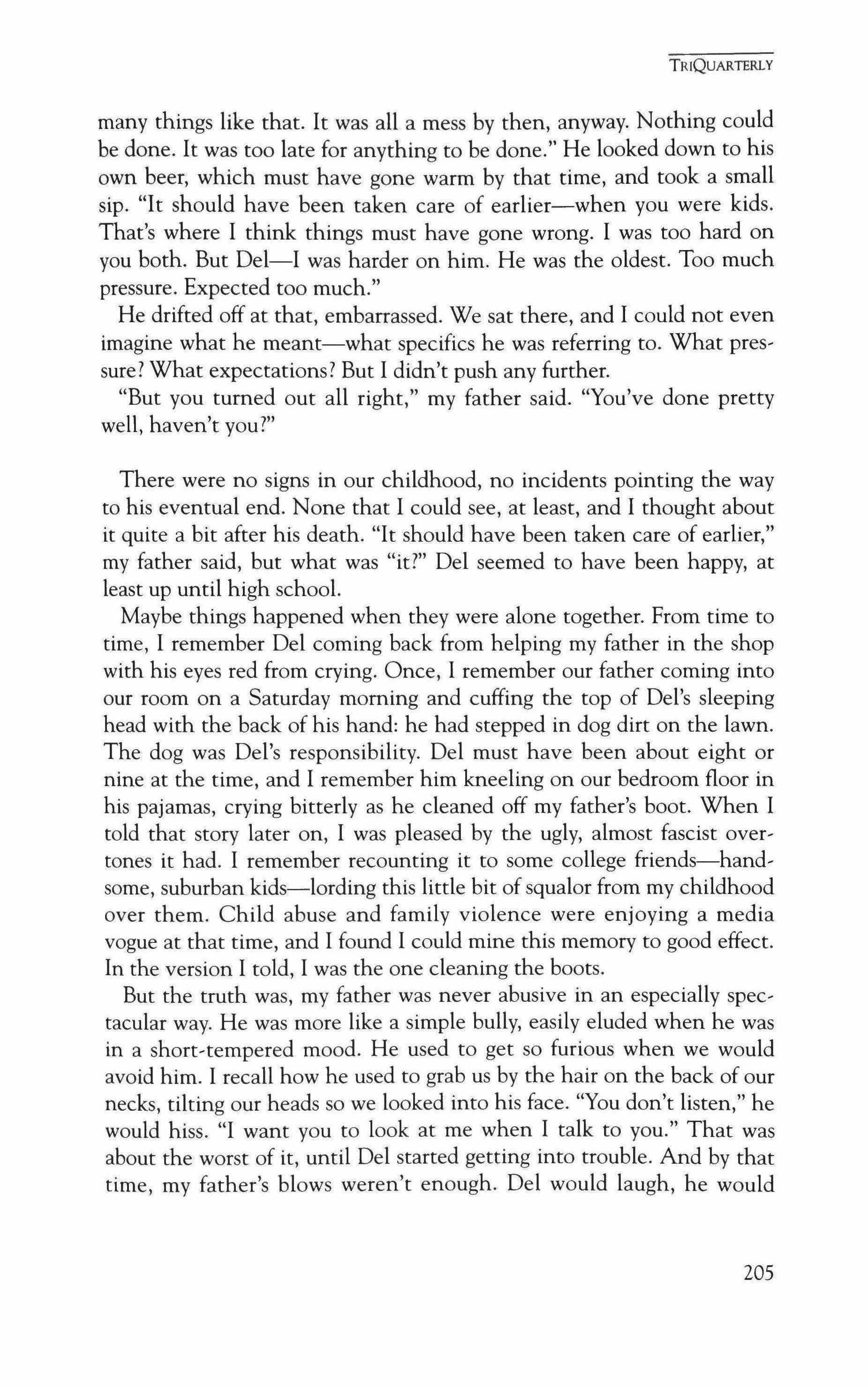
many things like that. It was all a mess by then, anyway. Nothing could be done. It was too late for anything to be done." He looked down to his own beer, which must have gone warm by that time, and took a small sip. "It should have been taken care of earlier-when you were kids. That's where I think things must have gone wrong. I was too hard on you both. But Del-I was harder on him. He was the oldest. Too much pressure. Expected too much."
He drifted off at that, embarrassed. We sat there, and I could not even imagine what he meant-what specifics he was referring to. What pressure? What expectations? But I didn't push any further.
"But you turned out all right," my father said. "You've done pretty well, haven't you?"
There were no signs in our childhood, no incidents pointing the way to his eventual end. None that I could see, at least, and I thought about it quite a bit after his death. "It should have been taken care of earlier," my father said, but what was "it?" Del seemed to have been happy, at least up until high school.
Maybe things happened when they were alone together. From time to time, I remember Del coming back from helping my father in the shop with his eyes red from crying. Once, I remember our father coming into our room on a Saturday morning and cuffing the top of Del's sleeping head with the back of his hand: he had stepped in dog dirt on the lawn. The dog was Del's responsibility. Del must have been about eight or nine at the time, and I remember him kneeling on our bedroom floor in his pajamas, crying bitterly as he cleaned off my father's boot. When I told that story later on, I was pleased by the ugly, almost fascist overtones it had. I remember recounting it to some college friends-handsome, suburban kids-lording this little bit of squalor from my childhood over them. Child abuse and family violence were enjoying a media vogue at that time, and I found I could mine this memory to good effect. In the version I told, I was the one cleaning the boots.
But the truth was, my father was never abusive in an especially spectacular way. He was more like a simple bully, easily eluded when he was in a short-tempered mood. He used to get so furious when we would avoid him. I recall how he used to grab us by the hair on the back of our necks, tilting our heads so we looked into his face. "You don't listen," he would hiss. "I want you to look at me when I talk to you." That was about the worst of it, until Del started getting into trouble. And by that time, my father's blows weren't enough. Del would laugh, he would
TRIQUARTERLY
205
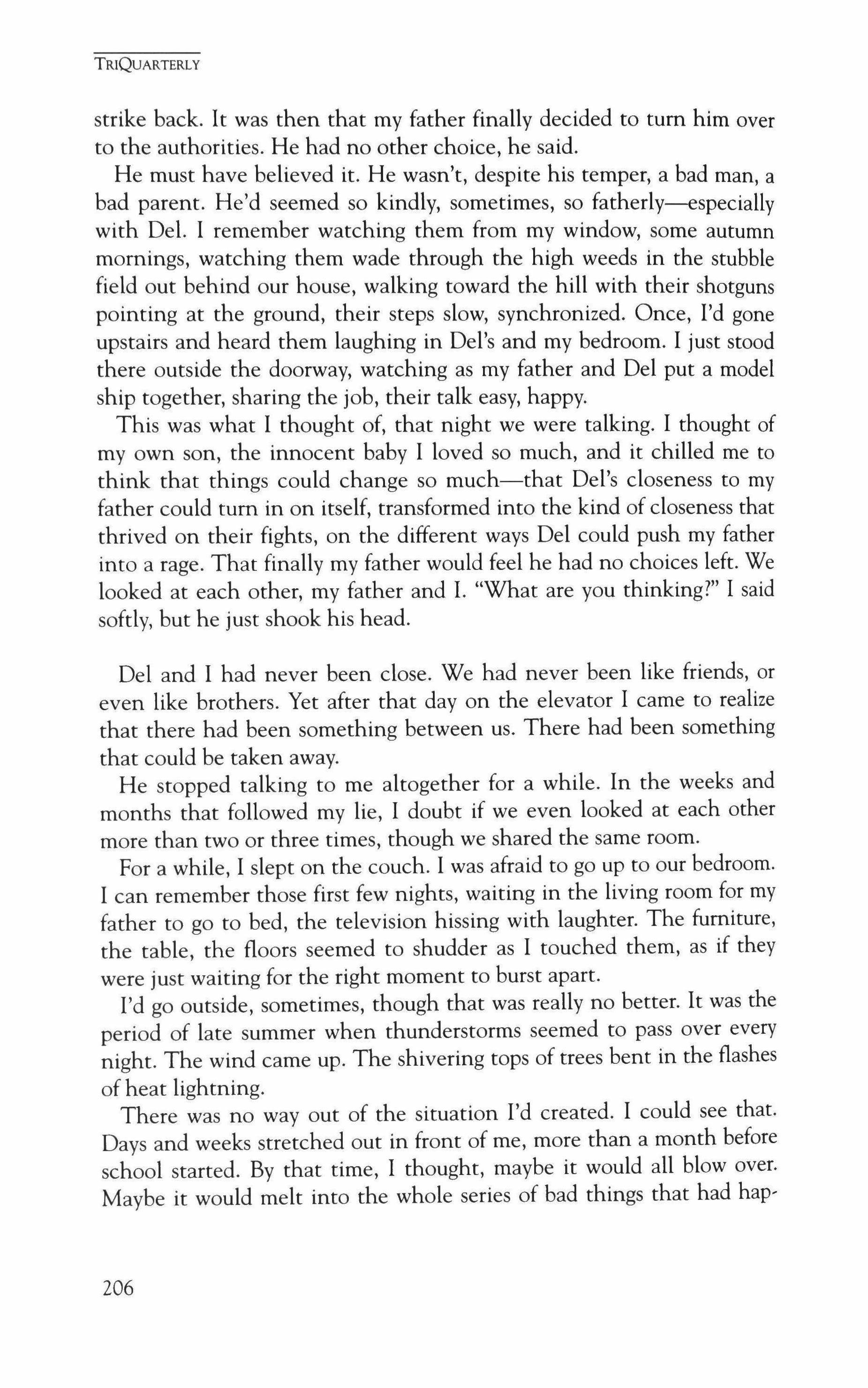
strike back. It was then that my father finally decided to turn him over to the authorities. He had no other choice, he said.
He must have believed it. He wasn't, despite his temper, a bad man, a bad parent. He'd seemed so kindly, sometimes, so fatherly-especially with Del. I remember watching them from my window, some autumn mornings, watching them wade through the high weeds in the stubble field out behind our house, walking toward the hill with their shotguns pointing at the ground, their steps slow, synchronized. Once, I'd gone upstairs and heard them laughing in Del's and my bedroom. I just stood there outside the doorway, watching as my father and Del put a model ship together, sharing the job, their talk easy, happy.
This was what I thought of, that night we were talking. I thought of my own son, the innocent baby I loved so much, and it chilled me to think that things could change so much-that Del's closeness to my father could turn in on itself, transformed into the kind of closeness that thrived on their fights, on the different ways Del could push my father into a rage. That finally my father would feel he had no choices left. We looked at each other, my father and 1. "What are you thinking?" I said softly, but he just shook his head.
Del and I had never been close. We had never been like friends, or even like brothers. Yet after that day on the elevator I came to realize that there had been something between us. There had been something that could be taken away.
He stopped talking to me altogether for a while. In the weeks and months that followed my lie, I doubt if we even looked at each other more than two or three times, though we shared the same room.
For a while, I slept on the couch. I was afraid to go up to our bedroom. I can remember those first few nights, waiting in the living room for my father to go to bed, the television hissing with laughter. The furniture, the table, the floors seemed to shudder as I touched them, as if they were just waiting for the right moment to burst apart.
I'd go outside, sometimes, though that was really no better. It was the period of late summer when thunderstorms seemed to pass over every night. The wind came up. The shivering tops of trees bent in the flashes of heat lightning.
There was no way out of the situation I'd created. I could see that. Days and weeks stretched out in front of me, more than a month before school started. By that time, I thought, maybe it would all blow over. Maybe it would melt into the whole series of bad things that had hap-
TRIQUARTERLY
206

pened, another layer of paint that would eventually be covered over by a new one, forgotten.
If he really had pushed me, that was what would have happened. It would have been like the time he tried to choke me, or the time he tried to drive the car off the hill. Once those incidents were over, there was always the possibility that this was the last time. There was always the hope that everything would be better now.
In retrospect, it wouldn't have been so hard to recant. There would have been a big scene, of course. I would have been punished, humiliated. I would have had to endure my brother's triumph, my parent's disgust. But I realize now that it wouldn't have been so bad.
I might have finally told the truth, too, if Del had reacted the way I expected. I imagined that there would be a string of confrontations in the days that followed, that he'd continue to protest with my father. I figured he wouldn't give up.
But he did. After that night, he didn't try to deny it anymore. For a while, I even thought that maybe he had begun to believe that he pushed me. He acted like a guilty person, eating his supper in silence, walking noiselessly through the living room, his shoulders hunched like a traveler on a snowy road.
My parents seemed to take this as penitence. They still spoke sternly, but their tone began to be edged by gentleness, a kind of forgiveness. "Did you take out the trash?" they would ask. "Another potato?"-and they would wait for him to quickly nod. He was truly sorry, they thought. Everything was finally going to be O.K. He was shaping up.
At these times, I noticed something in his eyes-a kind of sharpness, a subtle shift of the iris. He would lower his head, and the comers of his mouth would move slightly. To me, his face seemed to flicker with hidden, mysterious thoughts.
When I finally began to sleep in our room again, he pretended I wasn't there. I would come in, almost as quiet as he himself had become, to find him sitting at our desk or on his bed, peeling off a sock with such slow concentration that it might have been his skin. It was as if there were an unspoken agreement between us-I no longer existed. He wouldn't look at me, but I could watch him for as long as I wanted. I would pull the covers over myself and just lie there, observing, as he went about doing whatever he was doing as if oblivious. He listened to a tape on his headphones; flipped through a magazine; did sit-ups: sat staring out the window; turned out the light. And all that time his face remained neutral, impassive. Once, he even chuckled to himself at a
TRIQUARTERLY
207

book he was reading, a paperback anthology of The Far Side cartoons. When I was alone in the room, I found myself looking through his things, with an interest I'd never had before. I ran my fingers over his models, the monster-wheeled trucks and B-IO Bombers. I flipped through his collection of tapes. I found some literature he'd brought home from the detention center, brochures with titles like Teens and Alcohol: What You Should Know! and Rap Session, Talking about Feelings. Underneath this stuff, I found the essay he'd been working on.
He had to write an essay so that they would let him back into high school. There was a letter from the guidance counselor, explaining the school's policy, and then there were several sheets of notebook paper with his handwriting on them. He'd scratched out lots of words, sometimes whole paragraphs. In the margins, he'd written little notes to him-
If "( )" "7" "N" H h bl k 1 se: sp. or or o. e wrote m scratc y oc etters.
His essay told of the Outward Bound program. "I had embarked on a sixty-day rehabilitation program in the form of a wilderness survival course name of Outward Bound," he had written. "THESIS: The wilderness has allowed for me to reach deep inside my inner self and grasp ahold of my morals and values that would set the standard and tell the story of the rest of my life."
I would go into our room when my brother was out and take the essay out of the drawer where he'd hidden it. He was working on it, off and on, all that month; I'd flip it open to discover new additions or deletions-whole paragraphs appearing as if overnight. I never saw him doing it.
The majority of the essay was a narrative, describing their trip. They had hiked almost two hundred miles, he said. "Up by sun and down by moon," he wrote. There were obstacles they had to cross. Once, they had to climb down a hundred-foot cliff. "The repelling was very exciting but also scary," he'd written. "This was meant to teach us trust and confidence in ourselves as well as our teammates, they said. Well as I reached the peak of my climb I saw to my despair that the smallest fellow in the group was guiding my safety rope. Now he was no more than one hundred and ten pounds and I was tipping the scales at about two twenty five needless to say I was reluctant."
But they made it. I remember reading this passage several times; it seemed very vivid in my mind. In my imagination, I was in the place of the little guy holding the safety rope. I saw my brother hopping lightly, bit by bit, down the sheer face of the cliff to the ground below, as if he could fly, as if there were no gravity anymore.
TRIQUARTERLY
208

"My experience with the Outward Bound program opened my eyes to such values as friendship, trust, responsibility and sharing," Del wrote in his conclusion. "Without the understanding of these I would not exist as I do now but would probably instead be another statistic. With these values I will purely succeed. Without I would surely fail." Next to this he'd written: "Sounds like bullshit (?)"
I don't know that I recognized that distinct ache that I felt on reading this, or understood why his sudden distance, the silent, moody aura he trailed after him in those weeks should have affected me in such a way. Years later, I would recall that feeling-standing over my son's crib, a dark shape leaning over him as he stirred with dreams-waiting at the window for the headlights of my wife's car to turn into our driveway. That sad, trembly feeling was a species of love-or at least a symptom of it.
I thought of this a long time after the fact. I loved my brother, I thought. Briefly.
None of this lasted. By the time he died, a year later, he'd worked his way back to his normal self, or a slightly modified, moodier version. Just like before, money had begun to disappear from my mother's purse; my parents searched his room for drugs. He and my father had argued that morning about the friends he was hanging around with, about his wanting to take the car every night. Del claimed that he was dating a girl, said he only wanted to see a movie in town. He'd used that one before, often lying ridiculously when he was asked the next day about the plot of the film. I remember him telling my mother that the war film Apocalypse Now was set in the future, which I knew was not true from an article I'd read in the paper. I remember making some comment in reference to this as he was getting ready to go out, and he looked at me in that careful, hooded way, reminiscent of the time when he was pretending I didn't exist. "Eat shit and die, Stewart," he murmured, without heat. Unfortunately, I believe that this was the last thing he ever said to me.
Afterward, his friends said that he had seemed like he was in a good mood. They had all been in his car, my father's car, driving up and down the main street in Scottsbluff. They poured a little rum into their cans of Coke, cruising from one end of town to the other, calling out the window at a earful of passing teenage girls, revving the engine at the stoplights. He wasn't that drunk, they said.
TRIQUARTERLY
209
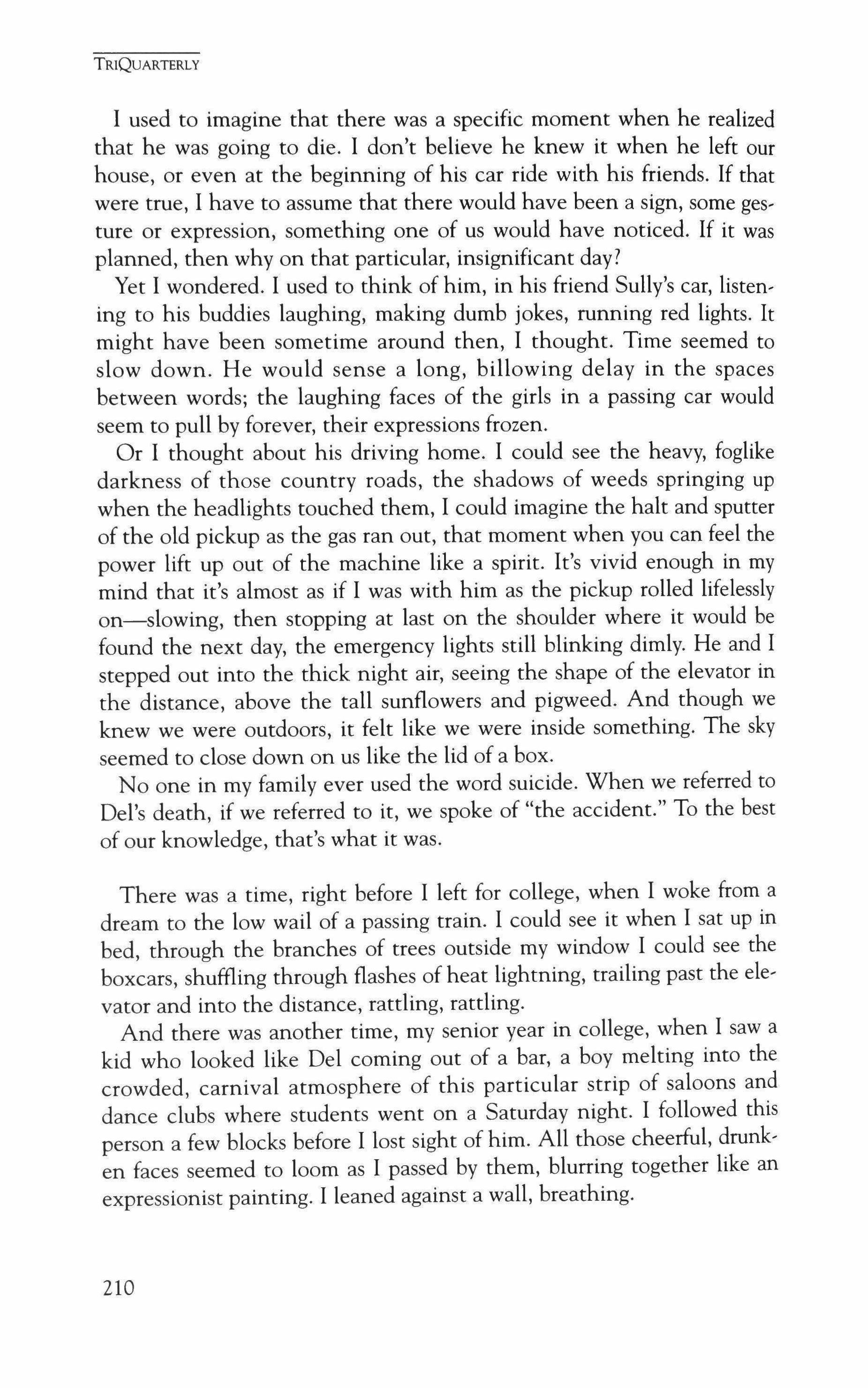
I used to imagine that there was a specific moment when he realized that he was going to die. I don't believe he knew it when he left our house, or even at the beginning of his car ride with his friends. If that were true, I have to assume that there would have been a sign, some gesture or expression, something one of us would have noticed. If it was planned, then why on that particular, insignificant day?
Yet I wondered. I used to think of him, in his friend Sully's car, listening to his buddies laughing, making dumb jokes, running red lights. It might have been sometime around then, I thought. Time seemed to slow down. He would sense a long, billowing delay in the spaces between words; the laughing faces of the girls in a passing car would seem to pull by forever, their expressions frozen.
Or I thought about his driving home. I could see the heavy, foglike darkness of those country roads, the shadows of weeds springing up when the headlights touched them, I could imagine the halt and sputter of the old pickup as the gas ran out, that moment when you can feel the power lift up out of the machine like a spirit. It's vivid enough in my mind that it's almost as if I was with him as the pickup rolled lifelessly on-slowing, then stopping at last on the shoulder where it would be found the next day, the emergency lights still blinking dimly. He and I stepped out into the thick night air, seeing the shape of the elevator in the distance, above the tall sunflowers and pigweed. And though we knew we were outdoors, it felt like we were inside something. The sky seemed to close down on us like the lid of a box.
No one in my family ever used the word suicide. When we referred to Del's death, if we referred to it, we spoke of "the accident." To the best of our knowledge, that's what it was.
There was a time, right before I left for college, when I woke from a dream to the low wail of a passing train. I could see it when I sat up in bed, through the branches of trees outside my window I could see the boxcars, shuffling through flashes of heat lightning, trailing past the elevator and into the distance, rattling, rattling.
And there was another time, my senior year in college, when I saw a kid who looked like Del coming out of a bar, a boy melting into the crowded, carnival atmosphere of this particular strip of saloons and dance clubs where students went on a Saturday night. I followed this person a few blocks before I lost sight of him. All those cheerful, drunken faces seemed to loom as I passed by them, blurring together like an expressionist painting. I leaned against a wall, breathing.
TRIQUARTERLY
210
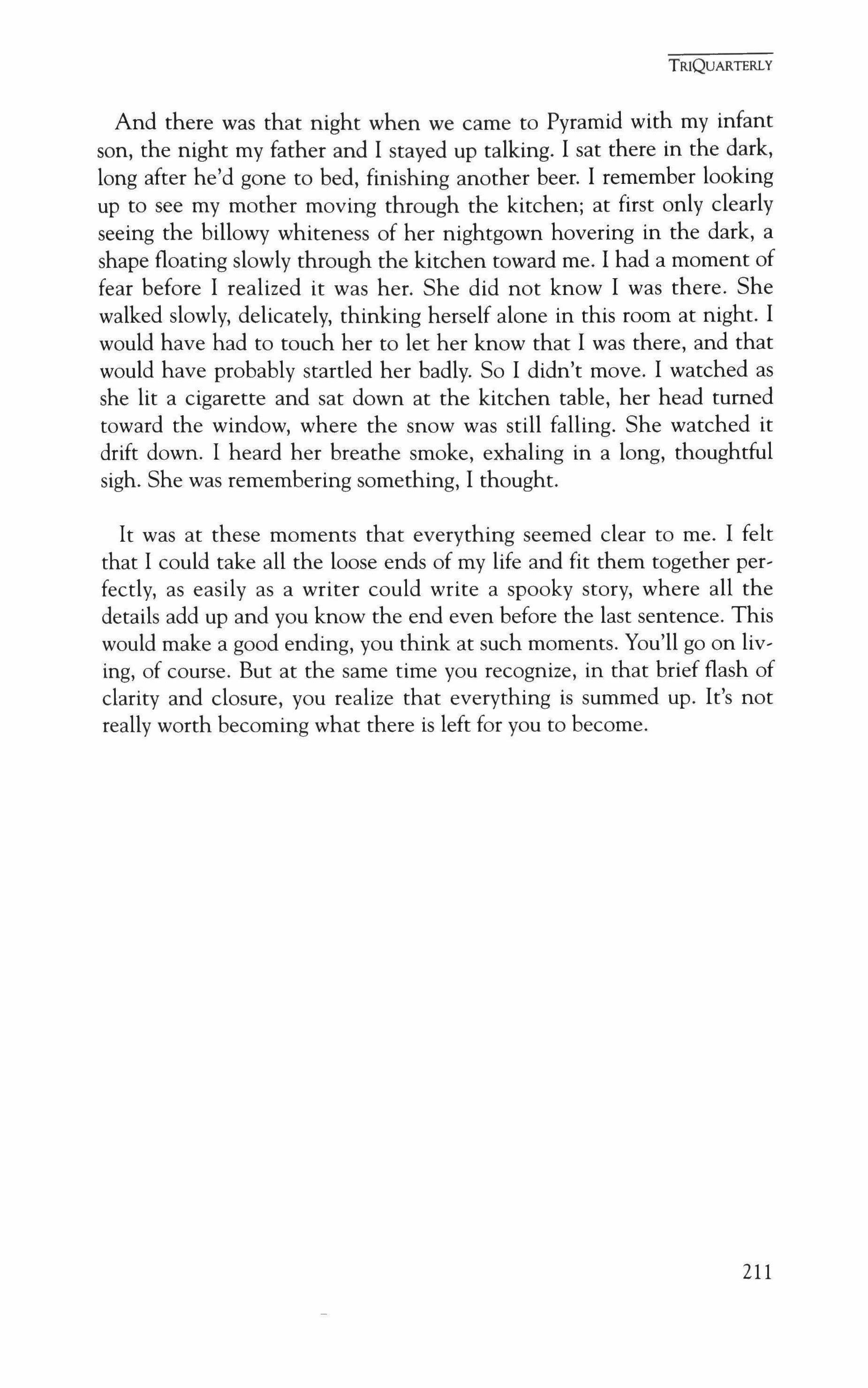
And there was that night when we came to Pyramid with my infant son, the night my father and I stayed up talking. I sat there in the dark, long after he'd gone to bed, finishing another beer. I remember looking up to see my mother moving through the kitchen; at first only clearly seeing the billowy whiteness of her nightgown hovering in the dark, a shape floating slowly through the kitchen toward me. I had a moment of fear before I realized it was her. She did not know I was there. She walked slowly, delicately, thinking herself alone in this room at night. I would have had to touch her to let her know that I was there, and that would have probably startled her badly. So I didn't move. I watched as she lit a cigarette and sat down at the kitchen table, her head turned toward the window, where the snow was still falling. She watched it drift down. I heard her breathe smoke, exhaling in a long, thoughtful sigh. She was remembering something, I thought.
It was at these moments that everything seemed clear to me. I felt that I could take all the loose ends of my life and fit them together perfectly, as easily as a writer could write a spooky story, where all the details add up and you know the end even before the last sentence. This would make a good ending, you think at such moments. You'll go on living, of course. But at the same time you recognize, in that brief flash of clarity and closure, you realize that everything is summed up. It's not really worth becoming what there is left for you to become.
TRIQUARTERLY
211
Ancestry ]ohn Stewart

There comes a time in each man's life when he needs to justify his personal history.
He opens his window to the morning breeze, and answers when his neighbor calls, "Morning, Mr. Daaga. How you do this morning?"
"I'm there." But his mind is elsewhere.
"You have clothes for the wash today?"
"No, no. Nothing today."
"So I hear what happen to the boy last night."
"Yes."
"You know what the police going to do with him?"
"No. I don't know." But his mind is elsewhere, going over the decisions he had to make.
"They pass through here with their Jeep just when church over, and when I hear the news I say to miself 'Oh God!' because I know you went in the forest yourself. Whole night I listen to hear you come in but I didn't even hear you open yuh door."
"Well, it was late, and I didn't bother to wake up anybody."
"I give God thanks for keeping you out of their hands. But you see what does happen when children don't hear? Everybody warn Rodney not to have nothing to do with those hooligans. They say they're fighting government, but they thiefing too much from people."
"Well, not all of them hooligans. And Rodney, I don't think he was in any thiefing."
"But he's up there in the bush with them all this time
"Yes. That's why I went in yesterday evening to see if I could get him."
TRIQUARTERLY
212

"But you didn't succeed ?"
"No. I didn't succeed." Elsewhere his mind is rolling his decisions round and round, looking for a catch, a sign to confirm he's taking the right one.
"I thinking about you, I thinking about that boy whole night. Where they have him, and all those beast they have for policeman You're going down to bail him out?"
"To tell the truth, it would be better for somebody else to go
"I will do it. First thing eight o'clock I will take a taxi to the station. I could use mi own papers
"Yes. Take your own papers, but I will give you the money "When I get back. When the boy home you could pay me back."
"Well, I'm in your debt already
"You can't get outa that But you see these government police? They're so advantageous!"
"They have the power." But his mind is elsewhere. In a misty back glance to the time and place Voice in the sky warns he should not remember. Night. And he's running. Moonlight streaming through the trees spangles the snaking trace, and he's running. He knows where he is, barely. He did not have time to learn this section of the forest properly but remembers there are two hills to come before he reaches the main road. He's running. His lungs are coming through his chest, and in the next stride will explode. But he holds on. He tells his body he can't be winded now. He's running
"They behave like they have power, but God not on their side."
"No, no."
"Their time will come. Is only May-Mav I worry about. He is her only son. No mind he leave her on her own long time, a mama's belly can never forget and is she I worry for."
"Yes, yes. I will pass by later and see if I could give her a hand."
"You remember where her garden is?"
"I know where it is, over by Number Three Branch Road." Now there's something practical to do, Voice in the sky agrees. It is time to make the banks ready for yam seed. It is time to make the banks ready, and there's work to do.
"I'll pass by later too, and take some figs for her. As mother, you bring them in the world, but you never know how they'll tum out."
"That's true."
"You're sure you have nothing for the wash today? I know when you go hunting in the forest at night how dirty yuh does come back."
TRIQUARTERLY
213

"Is true, Miss Kate. But I didn't go down in any mud. Everything dry where I pass last night."
"Well, let me rub out the few things I have before it's time to go. You going to garden?"
"Yes. And I'll pass by Miss May." That's right. Something practical to do, Voice says. But in his mind he is still running. He turns away from the window and goes to wash his mouth, but he's still running, and he knows his end would come if he doesn't hold on. Oxygen debt, oxygen debt, he reminds himself. Words to be set aside when there's running. The dried ruts where his feet come down drive straight up through his shins and his knees begin to hurt. There are two hills up ahead. Keep running. Voice in the sky says he should not remember, but he can't help himself.
He gets a cup of water from the bucket on the kitchen table. Some salt from the jar on the ledge above the table. He rubs his teeth and rinses, then bathes his face out the window. He should eat, he thinks, but he has no wish for food. There are ripe plantains hanging on the wall, and leftover fish in his cupboard. But he has no wish for food.
The church doors don't stay open unless there's service, and even if they were open he wouldn't go in. But there should be a place where he could pray. It's been years since he's felt like praying, and he thinks of one or two, but they don't seem suitable. Of course he knows a man should be able to drop down on his knees wherever he happens to be if he truly wants to pray. Calling for a special place, the feeling can't be serious.
He puts on his cap which is a carbon copy of the one Fidel wears, and pulls the cracked rubber boots over his bare feet. He finds the three-cornered file for his pocket, and gets his cutlass and stick from the comer. There's work to do. First, he'll have to cut the ground. Then begin dig, ging the banks for yam seed. In time, the sun will be very hot. Maybe it would be better not to wear Fidel today. He gets the worn straw hat off its nail and pulls it on. It keeps his head cool. He doesn't fill his water bottle at the bucket, he ties it empty at his waist and starts out. He pushes the door shut, and kicks the stone in place that keeps it from fly, ing open in the wind. He gets the fork and hoe from their comer on the gallery that was never finished, and uses the long-handled hoe to skip the two empty steps where the treaders were broken off and need replac' ing.
In the yard, the para grass is still wet with dew. The sun is not yet up high enough to reach down to the pawpaw trees, but Miss Kate is already at her washtub, singing. Nobody in the road as he starts out for
TRIQUARTERLY
214
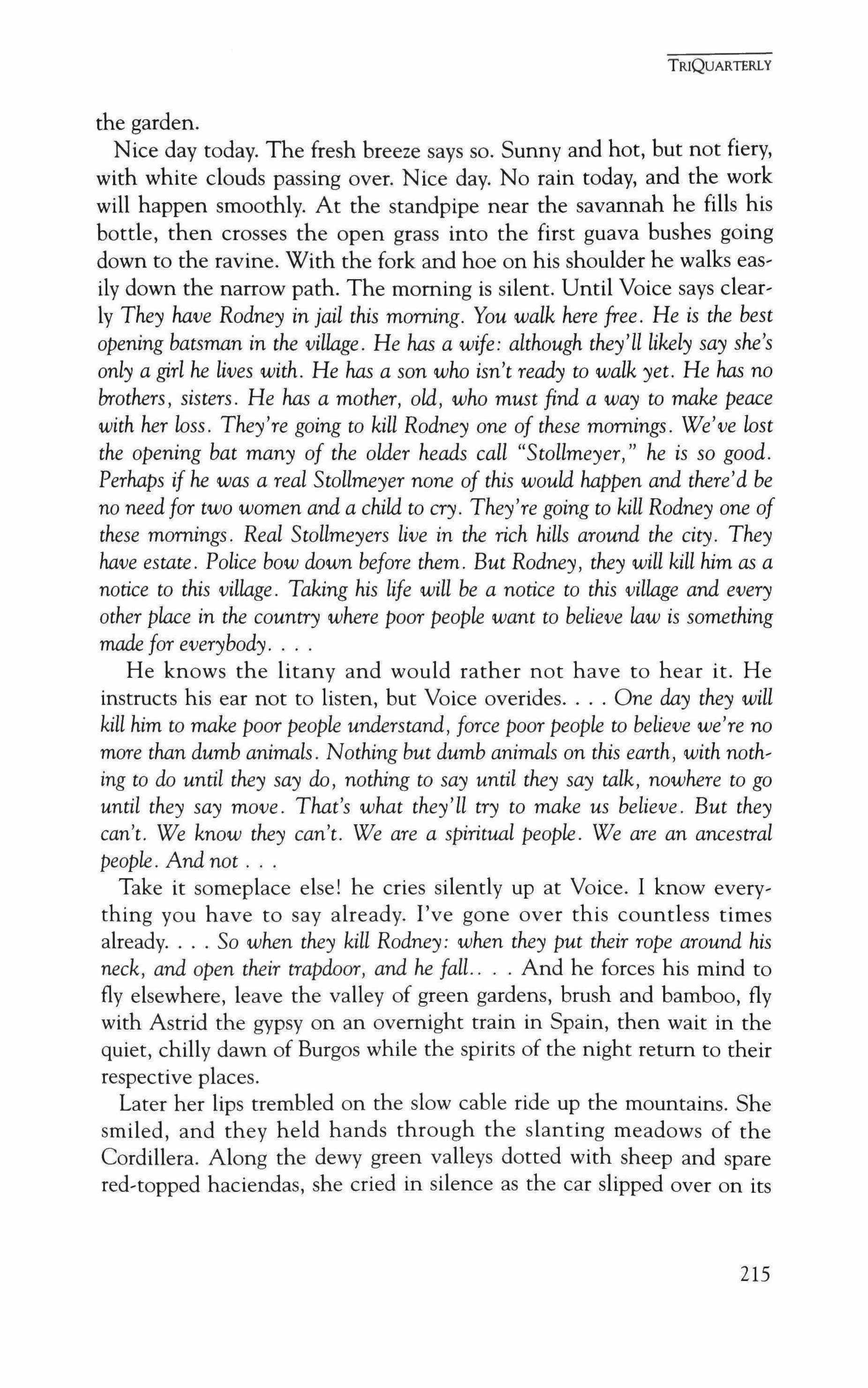
the garden.
Nice day today. The fresh breeze says so. Sunny and hot, but not fiery, with white clouds passing over. Nice day. No rain today, and the work will happen smoothly. At the standpipe near the savannah he fills his bottle, then crosses the open grass into the first guava bushes going down to the ravine. With the fork and hoe on his shoulder he walks easily down the narrow path. The morning is silent. Until Voice says clear, ly They have Rodney in jail this morning. You walk here free. He is the best opening batsman in the village. He has a wife: although they'll likely say she's only a girl he lives with. He has a son who isn't ready to walk yet. He has no brothers, sisters. He has a mother, old, who must find a way to make peace with her loss. They're going to kill Rodney one of these mornings. We've lost the opening bat many of the older heads call "Stollmeyer," he is so good. Perhaps if he was a real Stollmeyer none of this would happen and there'd be no need for two women and a child to cry. They're going to kill Rodney one of these mornings. Real Stollmeyers live in the rich hills around the city. They have estate. Police bow down before them. But Rodney, they will kill him as a notice to this village. Taking his life will be a notice to this village and every other place in the country where poor people want to believe law is something made for everybody.
He knows the litany and would rather not have to hear it. He instructs his ear not to listen, but Voice overides One day they will kill him to make poor people understand, force poor people to believe we're no more than dumb animals. Nothing but dumb animals on this earth, with noth, ing to do until they say do, nothing to say until they say talk, nowhere to go until they say move. That's what they'll try to make us believe. But they can't. We know they can't. We are a spiritual people. We are an ancestral people. And not
Take it someplace else! he cries silently up at Voice. I know every' thing you have to say already. I've gone over this countless times already. So when they kill Rodney: when they put their rope around his neck, and open their trapdoor, and he fall. And he forces his mind to fly elsewhere, leave the valley of green gardens, brush and bamboo, fly with Astrid the gypsy on an overnight train in Spain, then wait in the quiet, chilly dawn of Burgos while the spirits of the night return to their respective places.
Later her lips trembled on the slow cable ride up the mountains. She smiled, and they held hands through the slanting meadows of the Cordillera. Along the dewy green valleys dotted with sheep and spare red,topped haciendas, she cried in silence as the car slipped over on its
TRIQUARTERLY
215
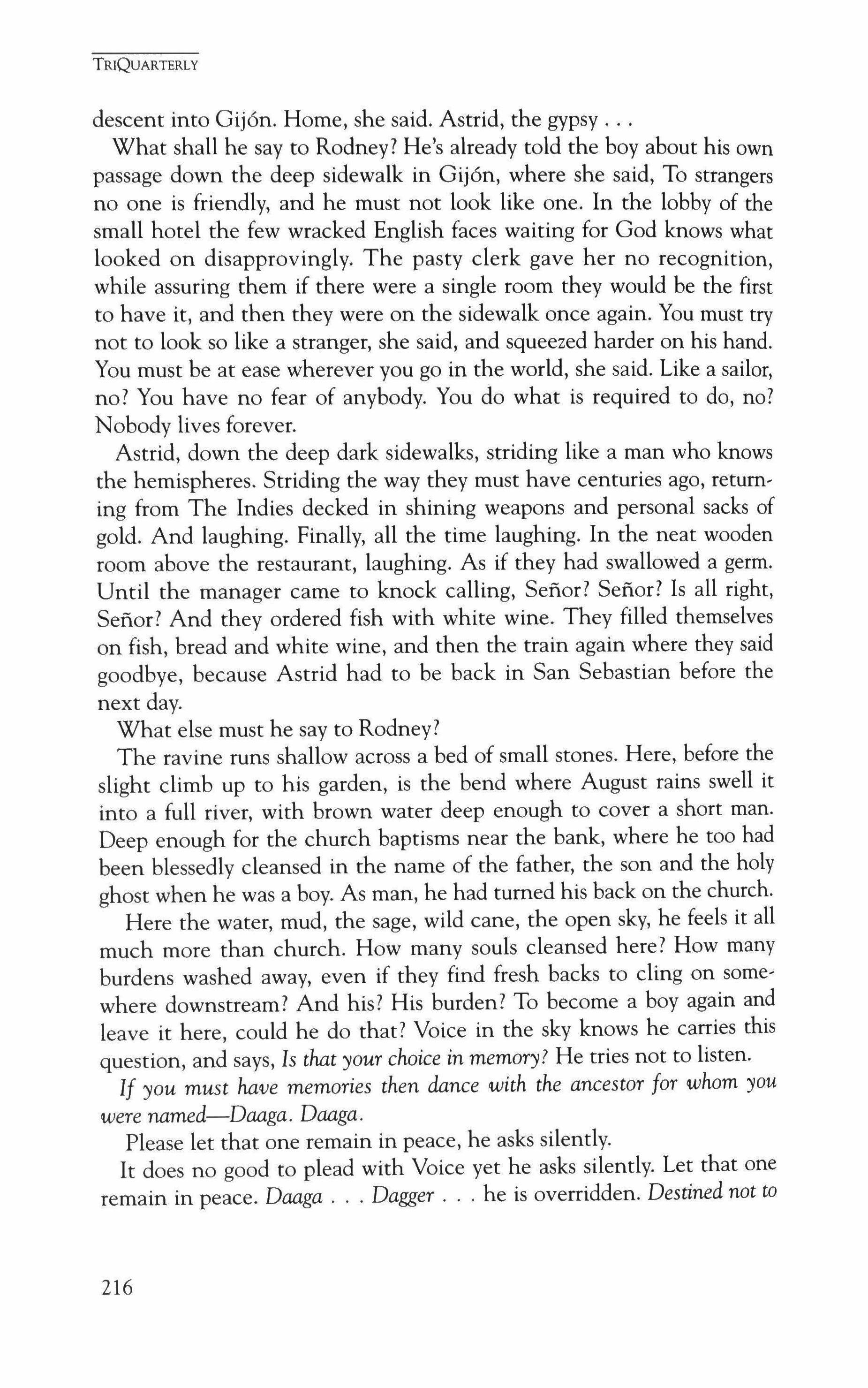
descent into Gij6n. Home, she said. Astrid, the gypsy
What shall he say to Rodney? He's already told the boy about his own passage down the deep sidewalk in Gij6n, where she said, To strangers no one is friendly, and he must not look like one. In the lobby of the small hotel the few wracked English faces waiting for God knows what looked on disapprovingly. The pasty clerk gave her no recognition, while assuring them if there were a single room they would be the first to have it, and then they were on the sidewalk once again. You must try not to look so like a stranger, she said, and squeezed harder on his hand. You must be at ease wherever you go in the world, she said. Like a sailor, no? You have no fear of anybody. You do what is required to do, no? Nobody lives forever.
Astrid, down the deep dark sidewalks, striding like a man who knows the hemispheres. Striding the way they must have centuries ago, returning from The Indies decked in shining weapons and personal sacks of gold. And laughing. Finally, all the time laughing. In the neat wooden room above the restaurant, laughing. As if they had swallowed a germ. Until the manager came to knock calling, Senor? Senor? Is all right, Senor? And they ordered fish with white wine. They filled themselves on fish, bread and white wine, and then the train again where they said goodbye, because Astrid had to be back in San Sebastian before the next day.
What else must he say to Rodney?
The ravine runs shallow across a bed of small stones. Here, before the slight climb up to his garden, is the bend where August rains swell it into a full river, with brown water deep enough to cover a short man. Deep enough for the church baptisms near the bank, where he too had been blessedly cleansed in the name of the father, the son and the holy ghost when he was a boy. As man, he had turned his back on the church. Here the water, mud, the sage, wild cane, the open sky, he feels it all much more than church. How many souls cleansed here? How many burdens washed away, even if they find fresh backs to cling on somewhere downstream? And his? His burden? To become a boy again and leave it here, could he do that? Voice in the sky knows he carries this question, and says, Is that your choice in memory? He tries not to listen. If you must have memories then dance with the ancestor for whom you were named-Daaga. Daaga. Please let that one remain in peace, he asks silently. It does no good to plead with Voice yet he asks silently. Let that one remain in peace. Daaga Dagger he is overridden. Destined not to
TRIQUARTERLY
216
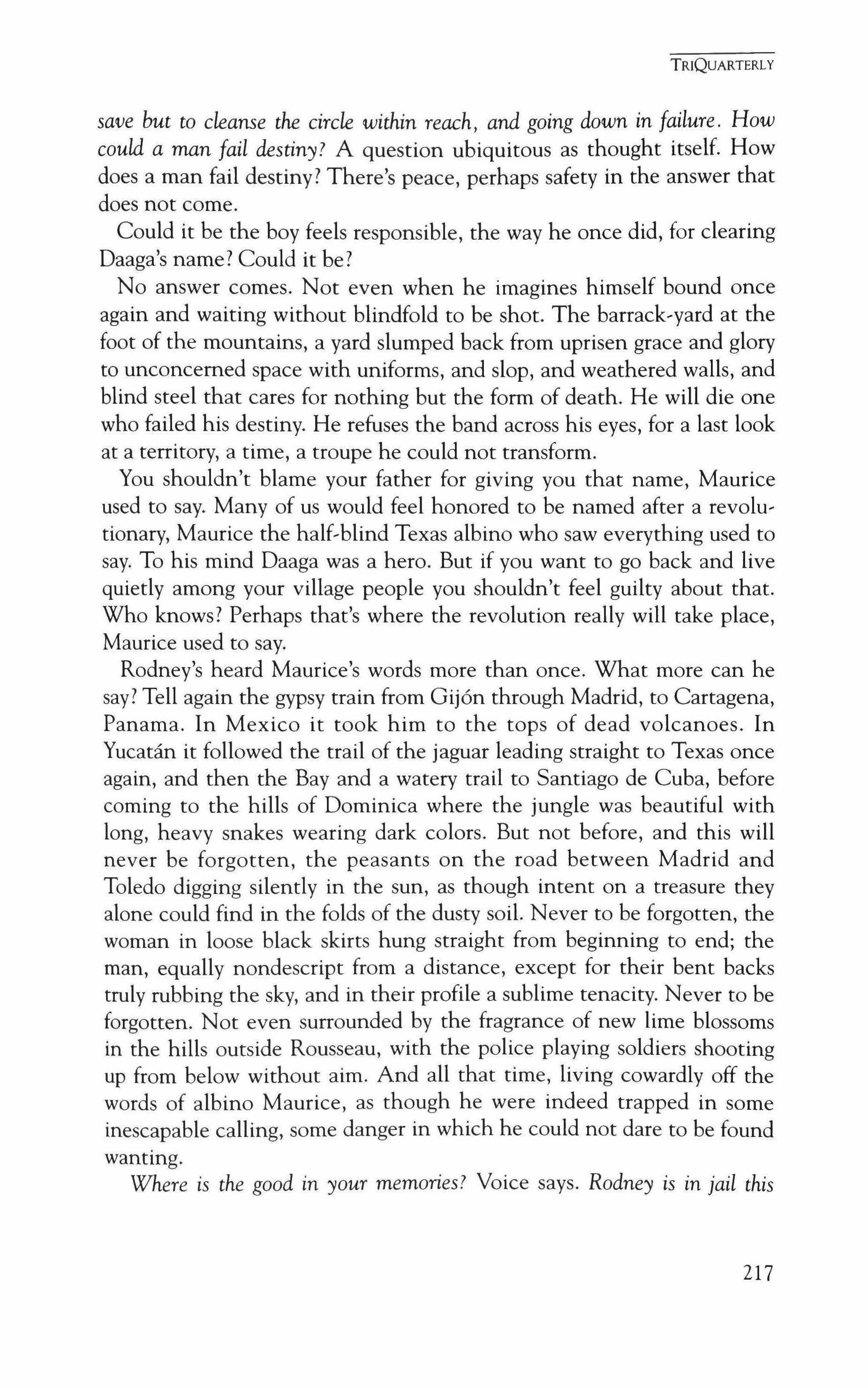
save but to cleanse the circle within reach, and going down in failure. How could a man fail destiny? A question ubiquitous as thought itself. How does a man fail destiny? There's peace, perhaps safety in the answer that does not come.
Could it be the boy feels responsible, the way he once did, for clearing Oaaga's name? Could it be?
No answer comes. Not even when he imagines himself bound once again and waiting without blindfold to be shot. The barrack,yard at the foot of the mountains, a yard slumped back from uprisen grace and glory to unconcerned space with uniforms, and slop, and weathered walls, and blind steel that cares for nothing but the form of death. He will die one who failed his destiny. He refuses the band across his eyes, for a last look at a territory, a time, a troupe he could not transform.
You shouldn't blame your father for giving you that name, Maurice used to say. Many of us would feel honored to be named after a revolutionary, Maurice the half-blind Texas albino who saw everything used to say. To his mind Daaga was a hero. But if you want to go back and live quietly among your village people you shouldn't feel guilty about that. Who knows? Perhaps that's where the revolution really will take place, Maurice used to say.
Rodney's heard Maurice's words more than once. What more can he say? Tell again the gypsy train from Gijon through Madrid, to Cartagena, Panama. In Mexico it took him to the tops of dead volcanoes. In Yucatan it followed the trail of the jaguar leading straight to Texas once again, and then the Bay and a watery trail to Santiago de Cuba, before coming to the hills of Dominica where the jungle was beautiful with long, heavy snakes wearing dark colors. But not before, and this will never be forgotten, the peasants on the road between Madrid and Toledo digging silently in the sun, as though intent on a treasure they alone could find in the folds of the dusty soil. Never to be forgotten, the woman in loose black skirts hung straight from beginning to end; the man, equally nondescript from a distance, except for their bent backs truly rubbing the sky, and in their profile a sublime tenacity. Never to be forgotten. Not even surrounded by the fragrance of new lime blossoms in the hills outside Rousseau, with the police playing soldiers shooting up from below without aim. And all that time, living cowardly off the words of albino Maurice, as though he were indeed trapped in some inescapable calling, some danger in which he could not dare to be found wanting.
Where is the good in your memories? Voice says. Rodney is in jail this
TRIQUARTERLY
217
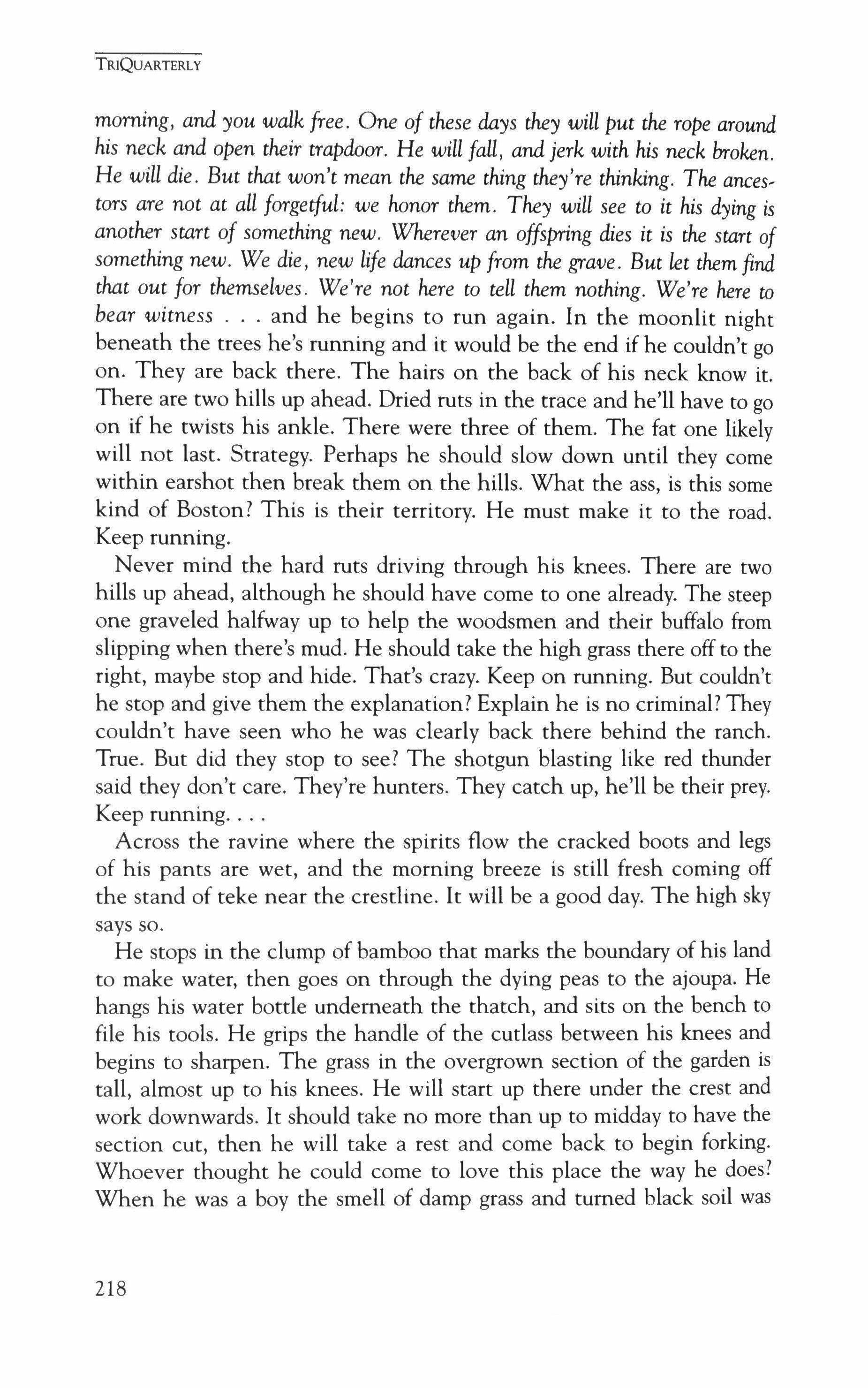
morning, and you walk free. One of these days they will put the rope around his neck and open their trapdoor. He will fall, and jerk with his neck broken. He will die. But that won't mean the same thing they're thinking. The zmcestors are not at all forgetful: we honor them. They will see to it his dying is another start of something new. Wherever an offspring dies it is the start of something new. We die, new life dances up from the grave. But let them find that out for themselves. We're not here to tell them nothing. We're here to bear witness and he begins to run again. In the moonlit night beneath the trees he's running and it would be the end if he couldn't go on. They are back there. The hairs on the back of his neck know it. There are two hills up ahead. Dried ruts in the trace and he'll have to go on if he twists his ankle. There were three of them. The fat one likely will not last. Strategy. Perhaps he should slow down until they come within earshot then break them on the hills. What the ass, is this some kind of Boston? This is their territory. He must make it to the road. Keep running.
Never mind the hard ruts driving through his knees. There are two hills up ahead, although he should have come to one already. The steep one graveled halfway up to help the woodsmen and their buffalo from slipping when there's mud. He should take the high grass there off to the right, maybe stop and hide. That's crazy. Keep on running. But couldn't he stop and give them the explanation? Explain he is no criminal? They couldn't have seen who he was clearly back there behind the ranch. True. But did they stop to see? The shotgun blasting like red thunder said they don't care. They're hunters. They catch up, he'll be their prey. Keep running
Across the ravine where the spirits flow the cracked boots and legs of his pants are wet, and the morning breeze is still fresh coming off the stand of teke near the crestline. It will be a good day. The high sky says so.
He stops in the clump of bamboo that marks the boundary of his land to make water, then goes on through the dying peas to the ajoupa. He hangs his water bottle underneath the thatch, and sits on the bench to file his tools. He grips the handle of the cutlass between his knees and begins to sharpen. The grass in the overgrown section of the garden is tall, almost up to his knees. He will start up there under the crest and work downwards. It should take no more than up to midday to have the section cut, then he will take a rest and come back to begin forking. Whoever thought he could come to love this place the way he does? When he was a boy the smell of damp grass and turned black soil was
TRIQUARTERLY
218
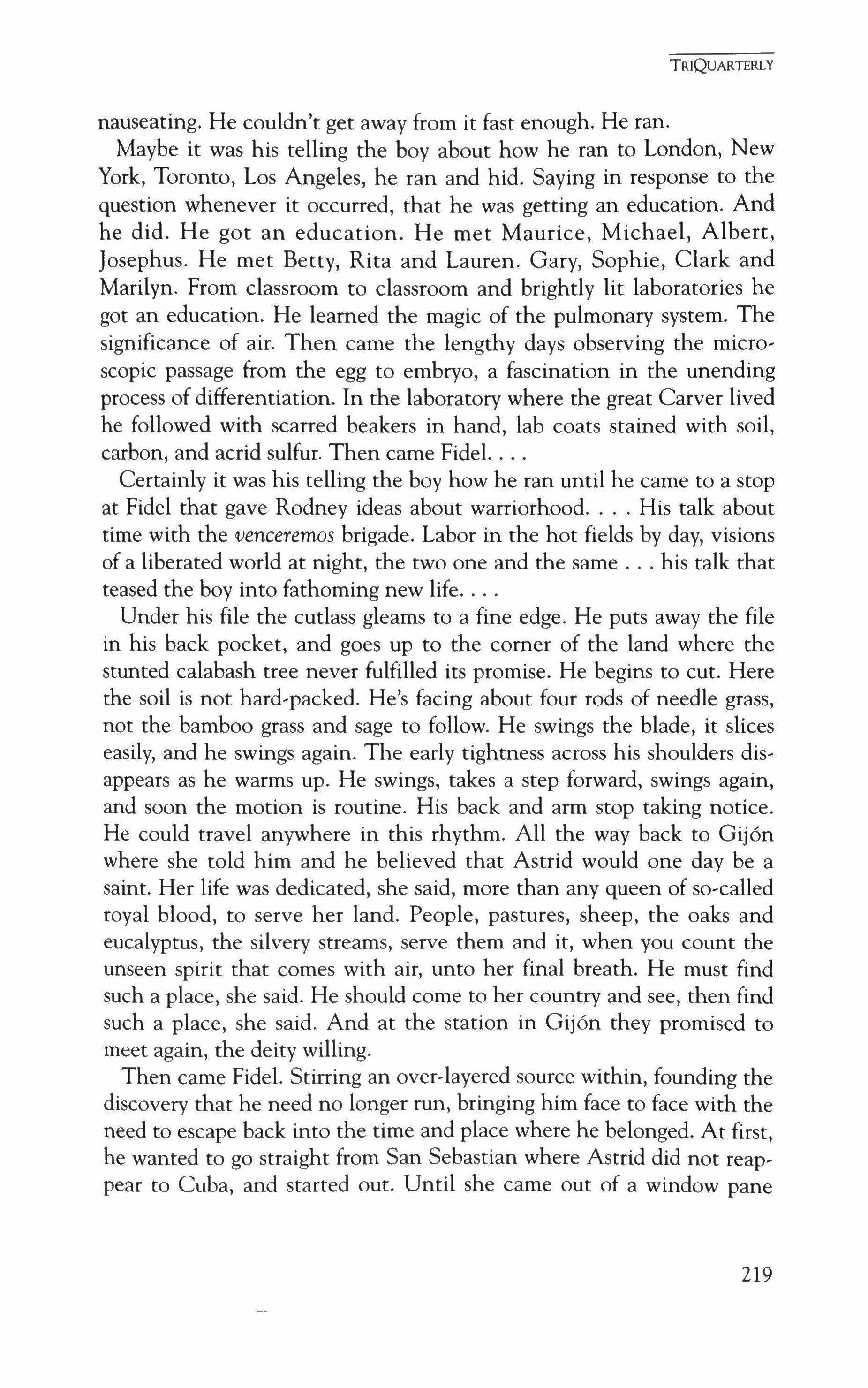
nauseating. He couldn't get away from it fast enough. He ran.
Maybe it was his telling the boy about how he ran to London, New York, Toronto, Los Angeles, he ran and hid. Saying in response to the question whenever it occurred, that he was getting an education. And he did. He got an education. He met Maurice, Michael, Albert, Josephus. He met Betty, Rita and Lauren. Gary, Sophie, Clark and Marilyn. From classroom to classroom and brightly lit laboratories he got an education. He learned the magic of the pulmonary system. The significance of air. Then came the lengthy days observing the microscopic passage from the egg to embryo, a fascination in the unending process of differentiation. In the laboratory where the great Carver lived he followed with scarred beakers in hand, lab coats stained with soil, carbon, and acrid sulfur. Then came Fidel.
Certainly it was his telling the boy how he ran until he came to a stop at Fidel that gave Rodney ideas about warriorhood His talk about time with the venceremos brigade. Labor in the hot fields by day, visions of a liberated world at night, the two one and the same his talk that teased the boy into fathoming new life
Under his file the cutlass gleams to a fine edge. He puts away the file in his back pocket, and goes up to the comer of the land where the stunted calabash tree never fulfilled its promise. He begins to cut. Here the soil is not hard-packed. He's facing about four rods of needle grass, not the bamboo grass and sage to follow. He swings the blade, it slices easily, and he swings again. The early tightness across his shoulders disappears as he warms up. He swings, takes a step forward, swings again, and soon the motion is routine. His back and arm stop taking notice. He could travel anywhere in this rhythm. All the way back to Gijon where she told him and he believed that Astrid would one day be a saint. Her life was dedicated, she said, more than any queen of so-called royal blood, to serve her land. People, pastures, sheep, the oaks and eucalyptus, the silvery streams, serve them and it, when you count the unseen spirit that comes with air, unto her final breath. He must find such a place, she said. He should come to her country and see, then find such a place, she said. And at the station in Gijon they promised to meet again, the deity willing.
Then came Fidel. Stirring an over-layered source within, founding the discovery that he need no longer run, bringing him face to face with the need to escape back into the time and place where he belonged. At first, he wanted to go straight from San Sebastian where Astrid did not reappear to Cuba, and started out. Until she came out of a window pane
TRIQUARTERLY
219
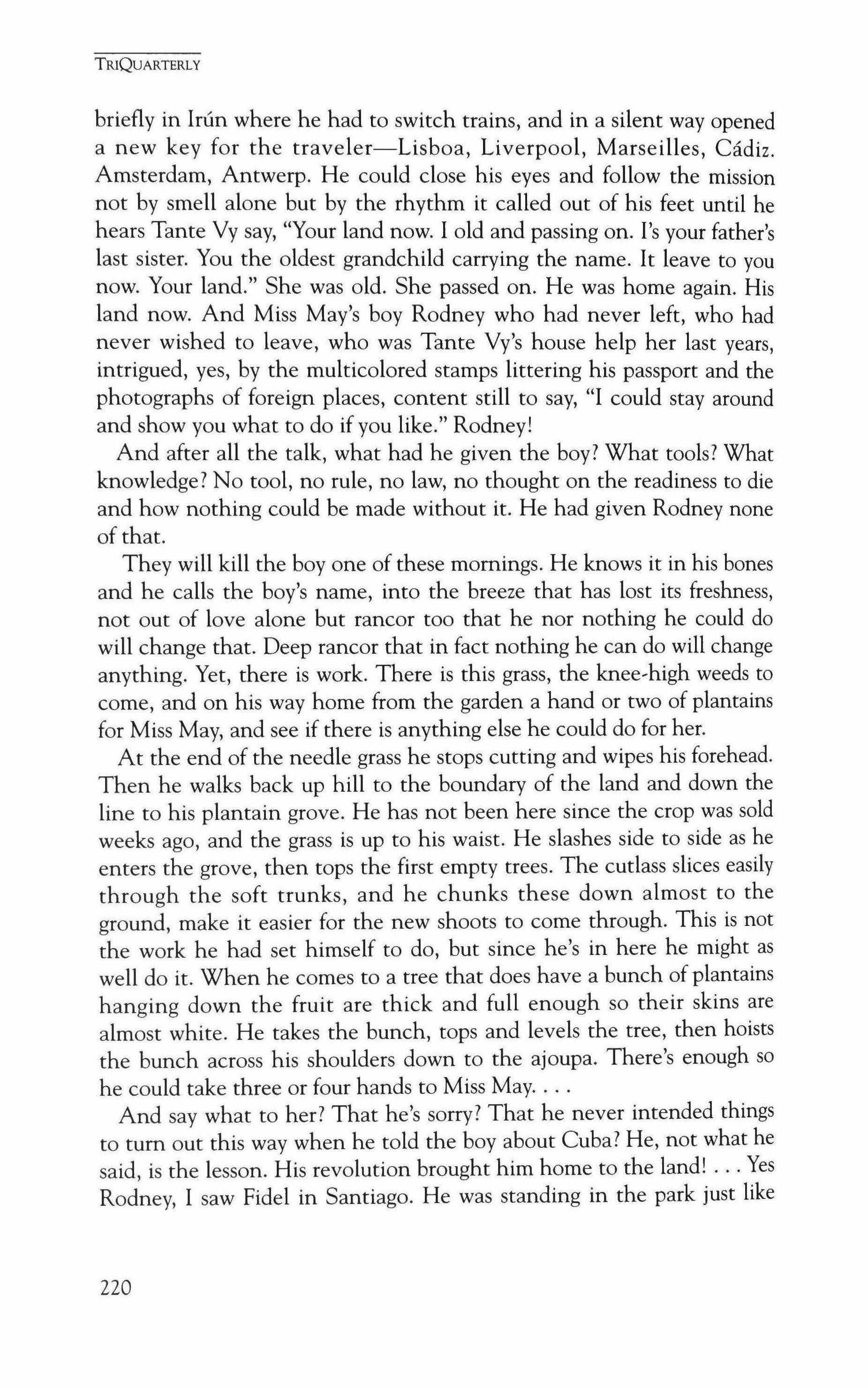
briefly in Inin where he had to switch trains, and in a silent way opened a new key for the traveler-Lisboa, Liverpool, Marseilles, Cadiz. Amsterdam, Antwerp. He could close his eyes and follow the mission not by smell alone but by the rhythm it called out of his feet until he hears Tante Vy say, "Your land now. I old and passing on. I's your father's last sister. You the oldest grandchild carrying the name. It leave to you now. Your land." She was old. She passed on. He was home again. His land now. And Miss May's boy Rodney who had never left, who had never wished to leave, who was Tante Vy's house help her last years, intrigued, yes, by the multicolored stamps littering his passport and the photographs of foreign places, content still to say, "I could stay around and show you what to do if you like." Rodney!
And after all the talk, what had he given the boy? What tools? What knowledge? No tool, no rule, no law, no thought on the readiness to die and how nothing could be made without it. He had given Rodney none of that.
They will kill the boy one of these mornings. He knows it in his bones and he calls the boy's name, into the breeze that has lost its freshness, not out of love alone but rancor too that he nor nothing he could do will change that. Deep rancor that in fact nothing he can do will change anything. Yet, there is work. There is this grass, the knee-high weeds to come, and on his way home from the garden a hand or two of plantains for Miss May, and see if there is anything else he could do for her.
At the end of the needle grass he stops cutting and wipes his forehead. Then he walks back up hill to the boundary of the land and down the line to his plantain grove. He has not been here since the crop was sold weeks ago, and the grass is up to his waist. He slashes side to side as he enters the grove, then tops the first empty trees. The cutlass slices easily through the soft trunks, and he chunks these down almost to the ground, make it easier for the new shoots to corne through. This is not the work he had set himself to do, but since he's in here he might as well do it. When he comes to a tree that does have a bunch ofplantains hanging down the fruit are thick and full enough so their skins are almost white. He takes the bunch, tops and levels the tree, then hoists the bunch across his shoulders down to the ajoupa. There's enough so he could take three or four hands to Miss May
And say what to her? That he's sorry? That he never intended things to tum out this way when he told the boy about Cuba? He, not what he said, is the lesson. His revolution brought him home to the land! Yes Rodney, I saw Fidel in Santiago. He was standing in the park just like
TRIQUARTERLY
220
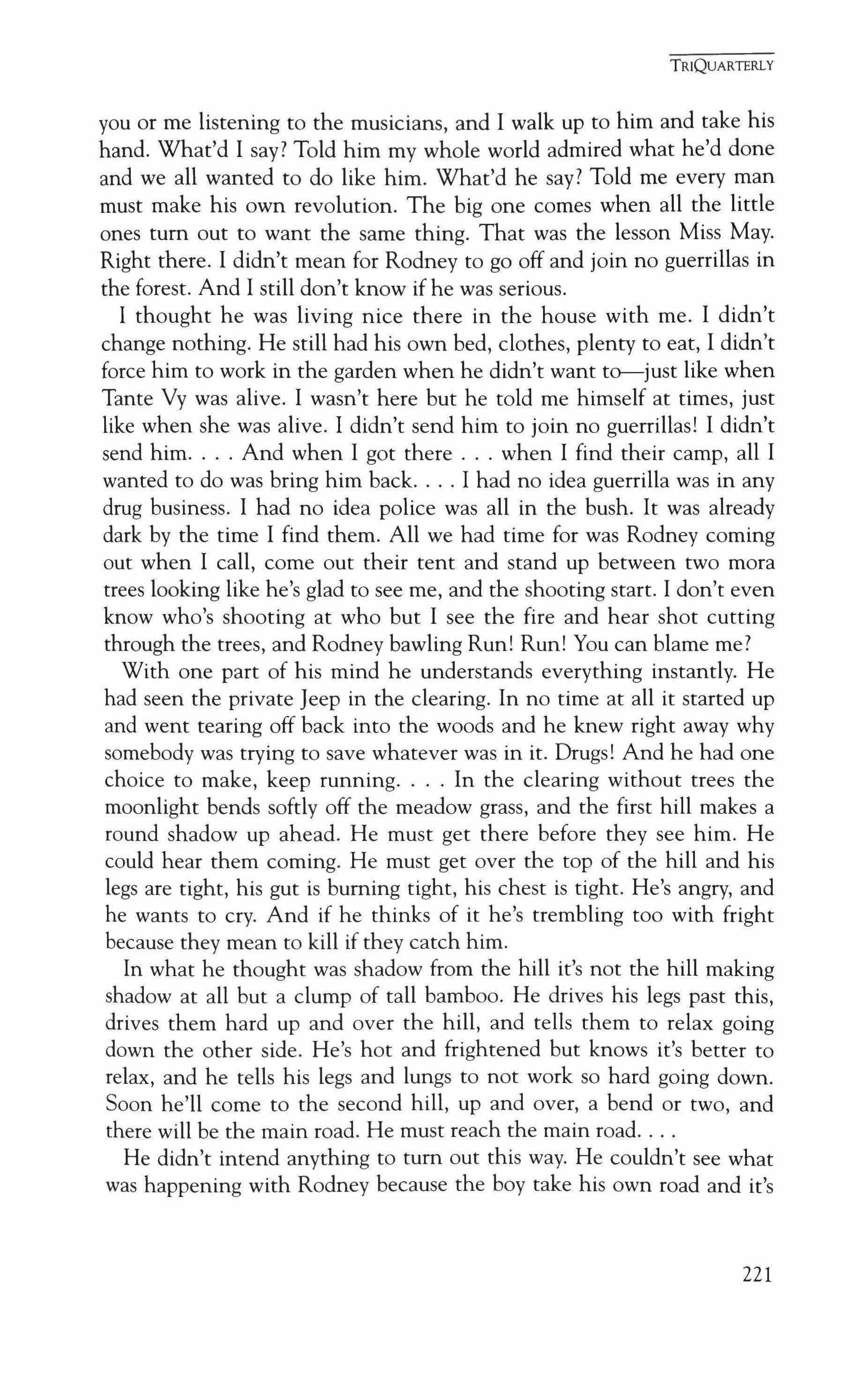
you or me listening to the musicians, and I walk up to him and take his hand. What'd I say? Told him my whole world admired what he'd done and we all wanted to do like him. What'd he say? Told me every man must make his own revolution. The big one comes when all the little ones tum out to want the same thing. That was the lesson Miss May. Right there. I didn't mean for Rodney to go off and join no guerrillas in the forest. And I still don't know if he was serious.
I thought he was living nice there in the house with me. I didn't change nothing. He still had his own bed, clothes, plenty to eat, I didn't force him to work in the garden when he didn't want to-just like when Tante Vy was alive. I wasn't here but he told me himself at times, just like when she was alive. I didn't send him to join no guerrillas! I didn't send him And when I got there when I find their camp, all I wanted to do was bring him back I had no idea guerrilla was in any drug business. I had no idea police was all in the bush. It was already dark by the time I find them. All we had time for was Rodney coming out when I call, come out their tent and stand up between two mora trees looking like he's glad to see me, and the shooting start. I don't even know who's shooting at who but I see the fire and hear shot cutting through the trees, and Rodney bawling Run! Run! You can blame me?
With one part of his mind he understands everything instantly. He had seen the private Jeep in the clearing. In no time at all it started up and went tearing off back into the woods and he knew right away why somebody was trying to save whatever was in it. Drugs! And he had one choice to make, keep running. In the clearing without trees the moonlight bends softly off the meadow grass, and the first hill makes a round shadow up ahead. He must get there before they see him. He could hear them coming. He must get over the top of the hill and his legs are tight, his gut is burning tight, his chest is tight. He's angry, and he wants to cry. And if he thinks of it he's trembling too with fright because they mean to kill if they catch him.
In what he thought was shadow from the hill it's not the hill making shadow at all but a clump of tall bamboo. He drives his legs past this, drives them hard up and over the hill, and tells them to relax going down the other side. He's hot and frightened but knows it's better to relax, and he tells his legs and lungs to not work so hard going down. Soon he'll come to the second hill, up and over, a bend or two, and there will be the main road. He must reach the main road
He didn't intend anything to tum out this way. He couldn't see what was happening with Rodney because the boy take his own road and it's
TRIQUARTERLY
221
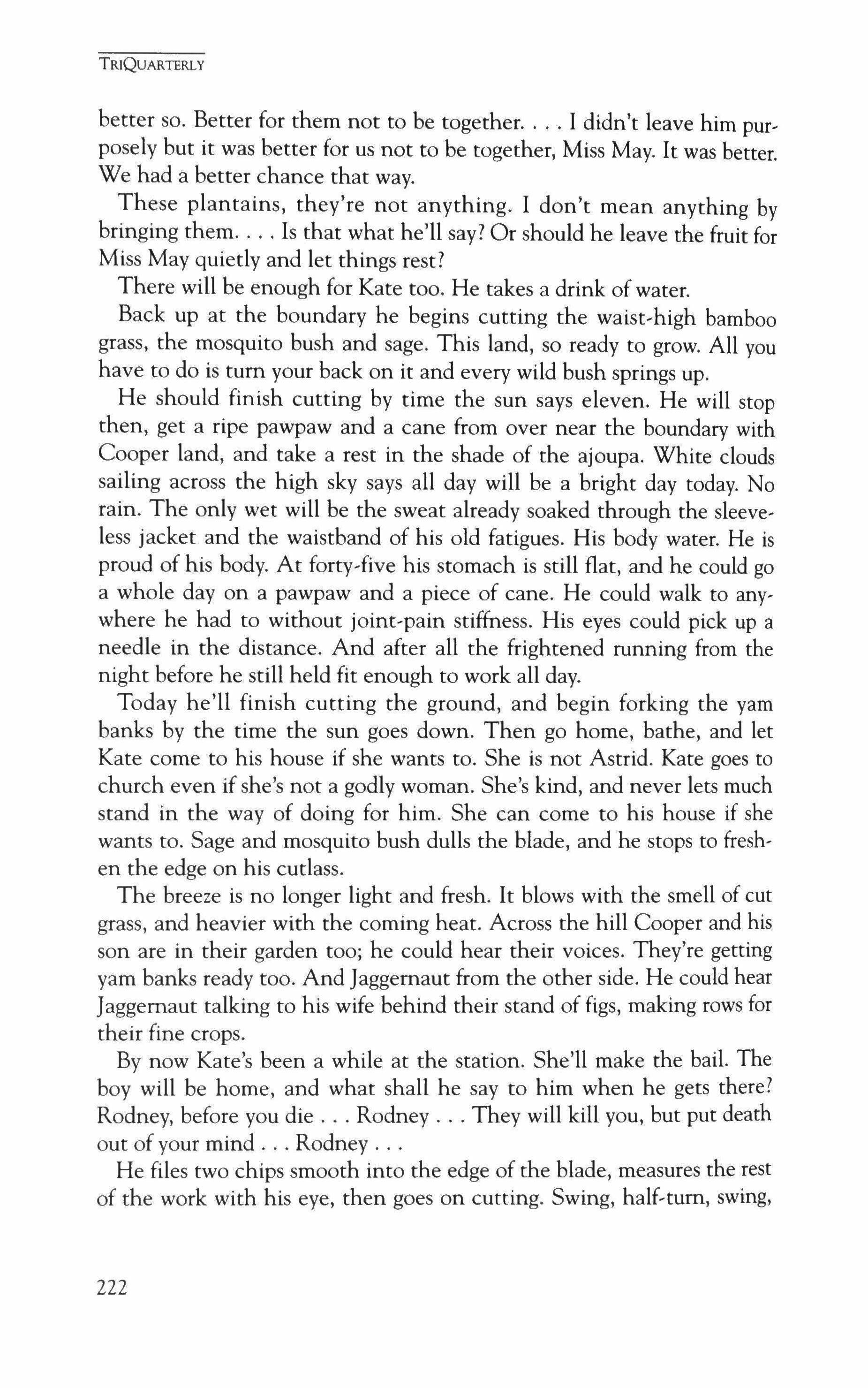
better so. Better for them not to be together I didn't leave him purposely but it was better for us not to be together, Miss May. It was better. We had a better chance that way.
These plantains, they're not anything. I don't mean anything by bringing them Is that what he'll say? Or should he leave the fruit for Miss May quietly and let things rest?
There will be enough for Kate too. He takes a drink of water.
Back up at the boundary he begins cutting the waist-high bamboo grass, the mosquito bush and sage. This land, so ready to grow. All you have to do is turn your back on it and every wild bush springs up.
He should finish cutting by time the sun says eleven. He will stop then, get a ripe pawpaw and a cane from over near the boundary with Cooper land, and take a rest in the shade of the ajoupa. White clouds sailing across the high sky says all day will be a bright day today. No rain. The only wet will be the sweat already soaked through the sleeveless jacket and the waistband of his old fatigues. His body water. He is proud of his body. At forty-five his stomach is still flat, and he could go a whole day on a pawpaw and a piece of cane. He could walk to anywhere he had to without joint-pain stiffness. His eyes could pick up a needle in the distance. And after all the frightened running from the night before he still held fit enough to work all day.
Today he'll finish cutting the ground, and begin forking the yam banks by the time the sun goes down. Then go home, bathe, and let Kate come to his house if she wants to. She is not Astrid. Kate goes to church even if she's not a godly woman. She's kind, and never lets much stand in the way of doing for him. She can come to his house if she wants to. Sage and mosquito bush dulls the blade, and he stops to freshen the edge on his cutlass.
The breeze is no longer light and fresh. It blows with the smell of cut grass, and heavier with the coming heat. Across the hill Cooper and his son are in their garden too; he could hear their voices. They're getting yam banks ready too. And Jaggernaut from the other side. He could hear Jaggernaut talking to his wife behind their stand of figs, making rows for their fine crops.
By now Kate's been a while at the station. She'll make the bail. The boy will be home, and what shall he say to him when he gets there? Rodney, before you die Rodney They will kill you, but put death out of your mind Rodney
He files two chips smooth into the edge of the blade, measures the rest of the work with his eye, then goes on cutting. Swing, half-turn, swing,
TRIQUARTERLY
222
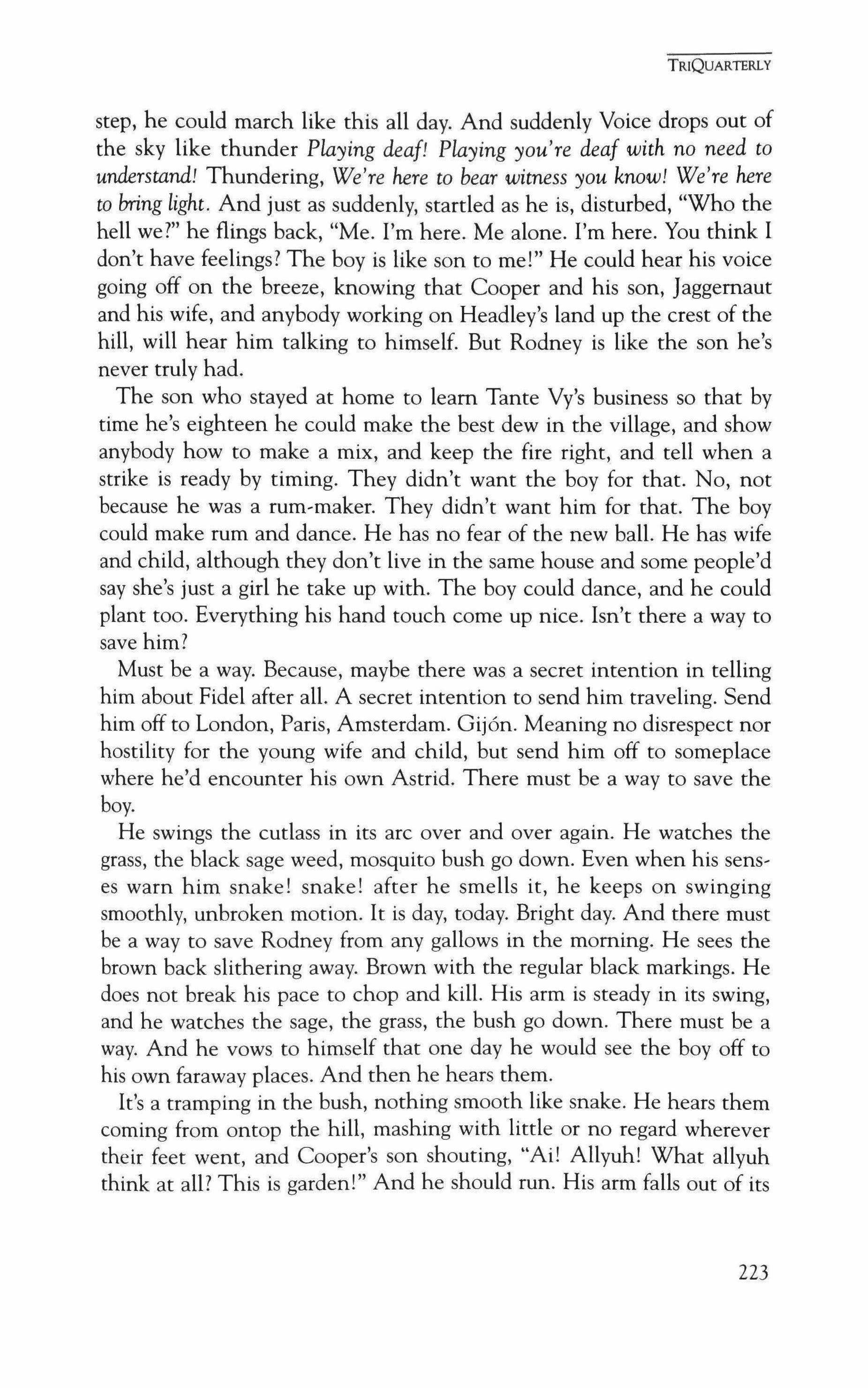
step, he could march like this all day. And suddenly Voice drops out of the sky like thunder Playing deaf! Playing you're deaf with no need to understand! Thundering, We're here to bear witness you know! We're here to bring light. And just as suddenly, startled as he is, disturbed, "Who the hell we?" he flings back, "Me. I'm here. Me alone. I'm here. You think I don't have feelings? The boy is like son to me!" He could hear his voice going off on the breeze, knowing that Cooper and his son, Jaggernaut and his wife, and anybody working on Headley's land up the crest of the hill, will hear him talking to himself. But Rodney is like the son he's never truly had.
The son who stayed at home to learn Tante Vy's business so that by time he's eighteen he could make the best dew in the village, and show anybody how to make a mix, and keep the fire right, and tell when a strike is ready by timing. They didn't want the boy for that. No, not because he was a rum-maker. They didn't want him for that. The boy could make rum and dance. He has no fear of the new ball. He has wife and child, although they don't live in the same house and some people'd say she's just a girl he take up with. The boy could dance, and he could plant too. Everything his hand touch come up nice. Isn't there a way to save him?
Must be a way. Because, maybe there was a secret intention in telling him about Fidel after all. A secret intention to send him traveling. Send him off to London, Paris, Amsterdam. Gij6n. Meaning no disrespect nor hostility for the young wife and child, but send him off to someplace where he'd encounter his own Astrid. There must be a way to save the boy.
He swings the cutlass in its arc over and over again. He watches the grass, the black sage weed, mosquito bush go down. Even when his senses warn him snake! snake! after he smells it, he keeps on swinging smoothly, unbroken motion. It is day, today. Bright day. And there must be a way to save Rodney from any gallows in the morning. He sees the brown back slithering away. Brown with the regular black markings. He does not break his pace to chop and kill. His arm is steady in its swing, and he watches the sage, the grass, the bush go down. There must be a way. And he vows to himself that one day he would see the boy off to his own faraway places. And then he hears them.
It's a tramping in the bush, nothing smooth like snake. He hears them coming from ontop the hill, mashing with little or no regard wherever their feet went, and Cooper's son shouting, "Ai! Allyuh! What allyuh think at all? This is garden!" And he should run. His arm falls out of its
TRIQUARTERLY
223

swing, and he stands rooted, wanting not to believe his ears, but they're coming. He should run. In the moonlit night he is running. He could hear them tramping, getting closer behind, but he is almost over the second hill now. They are close enough behind so he could hear the weight of their footfall, and hears one panting, "Bitch! You damn bitch!" He wonders why they don't shoot. He does not dwell on why they don't shoot, he windmills his legs downhill for the dark shade at the bottom ruts or no ruts. He goes pell-rnell through the low brush and the balisier. Underneath the interlaced banyans he's out of the moonlight now, there's a curve between him and the killers. They did not shoot. He wonders why they did not shoot. But there's the main road that he knows well. He turns to his right toward the overgrown cocoa estate. The old drying house is silhouetted in front of the dying cocoa trees; he runs past that. And at the next curve where half the road is fallen away in a raw landslide he throws himself off into the brush, stops dead still and waits. He does not hear them. He waits, taking air as quietly as he can through his mouth, fighting off the pains shooting through his side, his stomach, down the back of his legs. He waits, trembling on the inside, until he hears them coming up the road. There are two of them, but then he always knew that. One is fat and limping, he could tell from their footfall. The same one, likely, who keeps saying, "Bitch! Son of a bitch! Where he?" And the other one still out of breath says, "He must've take the other way. Is all right. We know who he is, we gon catch him." "Bitch!" "You don't have to fight up yourself like that, we gon catch him. Leh we go back by the junction and wait for the jeep." He could hear them going away. He could hear them walking away from the landslide back down the curve, their voices carrying in the quiet moonlight as if directly to him, "Bitch!" "We gon catch you. Don't fraid. We gon catch you."
He could hear them going away, he could hear them come back again, and he should run without waiting to see whether they will shoot this time or not. But he doesn't feel like running. He doesn't feel like doing anything except clearing the ground, getting it ready for his yam banks. Down from the sky it is a bright day, best sort of day for work, and he's ready to work all day in the breeze that is hot but carrying very little moisture. He could hear them thrashing through the grass and bush he's already cut, he does not look their way. He should've run, but instead his feet have taken root. Just for the test of it he bends and tries to lift them. They move, but not far off the ground. They move in no more than the dance he's been doing all morning long, and with a sneaking
TRIQUARTERLY
224

joy, as though some inner part of him has received confirmation, he reaches over and swings the blade.
He cuts the young bush cleanly and pulls it out of the way with his crook stick. He swings again. The muscles in his back stretch like hard bands through the reach of his arc then pull back, so he can swing again. They are here, he can feel them. But he does not look their way.
"Ai! You!" They are close enough, but he does not look up. Voice in the sky will make an announcement soon, he knows, and he will wait.
"Ai, niggah!"
"Don't say that!" the second one says, swift and cold. "The next time you call somebody that working with me is bullet in yuh ass. Yuh got that?"
"I enh mean nothing Sarge. Is he I calling."
He looks up then. He straightens up and looks at the two of them. Neither one is wearing uniform. The fat one is an Indian standing a few paces in front of Sarge, a brown cloth hat pulled down tightly over his head. His shirt'sleeves are unbuttoned, and he holds the shotgun in both hands across his heavy thighs, finger on the trigger. He is a heavy man with soft breast and a ragged mustache covering all his mouth. He is scowling as much as the fat in his face will let him, but only his eyes look dangerous. Pig eyes. Fixed. Intent. Ready for any motion. "Yes, you!" he says through the hairs covering his mouth.
"Ask his name," the next one says. Sarge is a tall black man whose nose has in the past been broken. He is bareheaded, and the flowered cotton shirt outside his blue jeans falls flat against his stomach. He probably was a fast bowler at one time, or even a defender on some foot, ball team. "Get his name first," he says. His gun's a pistol held casually at his side, finger on the trigger.
"What yuh name?"
"Who you?" he replies. "What're you doing on my land?"
"We don't care about who land! You have a name?"
"Who're you? What yuh want on my land?"
"Police in yuh ass, that's who. Why allyuh does thief so? Allyuh telling people allyuh is guerrilla, ain't nothing but thief. Allyuh know who ground that is you thiefing from?"
We're here to bear witness. We're here to receive all our own without pity nor anxiety. Even when time is untimely. We would prefer to see long life for the gifted. Rodney wasn't meant only for cricket. The gift oflight is in him. So wherever he pass, whatever he touch he brighten. We know where that come from. They know it too. That's why they'll kill Rodney one of these mornings.
TRIQUARTERLY
225
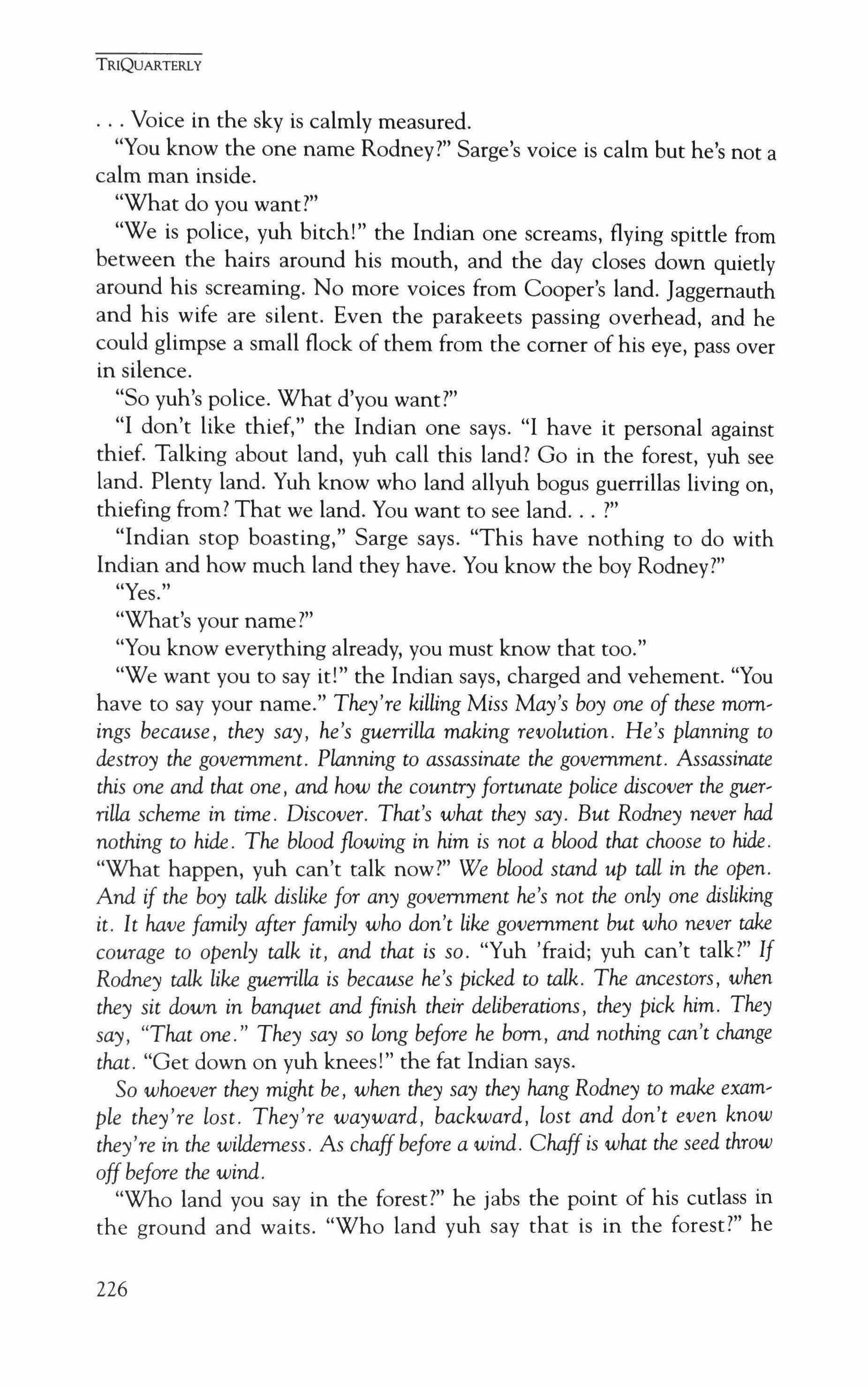
Voice in the sky is calmly measured.
"You know the one name Rodney?" Sarge's voice is calm but he's not a calm man inside.
"What do you want?"
"We is police, yuh bitch!" the Indian one screams, flying spittle from between the hairs around his mouth, and the day closes down quietly around his screaming. No more voices from Cooper's land. Jaggemauth and his wife are silent. Even the parakeets passing overhead, and he could glimpse a small flock of them from the comer of his eye, pass over in silence.
"So yuh's police. What d'you want?"
"I don't like thief," the Indian one says. "I have it personal against thief. Talking about land, yuh call this land? Go in the forest, yuh see land. Plenty land. Yuh know who land allyuh bogus guerrillas living on, thiefing from? That we land. You want to see land ?"
"Indian stop boasting," Sarge says. "This have nothing to do with Indian and how much land they have. You know the boy Rodney?" "Yes."
"What's your name?"
"You know everything already, you must know that too."
"We want you to say it!" the Indian says, charged and vehement. "You have to say your name." They're killing Miss May's boy one of these mom' ings because, they say, he's guerrilla making revolution. He's planning to destroy the government. Planning to assassinate the government. Assassinate this one and that one, and how the country fortunate police discover the guetrilla scheme in time. Discover. That's what they say. But Rodney never had nothing to hide. The blood flowing in him is not a blood that choose to hide.
"What happen, yuh can't talk now?" We blood stand up tall in the open. And if the boy talk dislike for any government he's not the only one disliking it. It have family after family who don't like government but who never take courage to openly talk it, and that is so. "Yuh 'fraid: yuh can't talk?" If Rodney talk like guerrilla is because he's picked to talk. The ancestors, when they sit down in banquet and finish their deliberations, they pick him. They say, "That one." They say so long before he bom, and nothing can't change that. "Get down on yuh knees!" the fat Indian says.
So whoever they might be, when they say they hang Rodney to make exam' pIe they're lost. They're wayward, backward, lost and don't even know they're in the wilderness. As chaffbefore a wind. Chaff is what the seed throw offbefore the wind.
"Who land you say in the forest?" he jabs the point of his cutlass in the ground and waits. "Who land yuh say that is in the forest?" he
TRIQUARTERLY
226
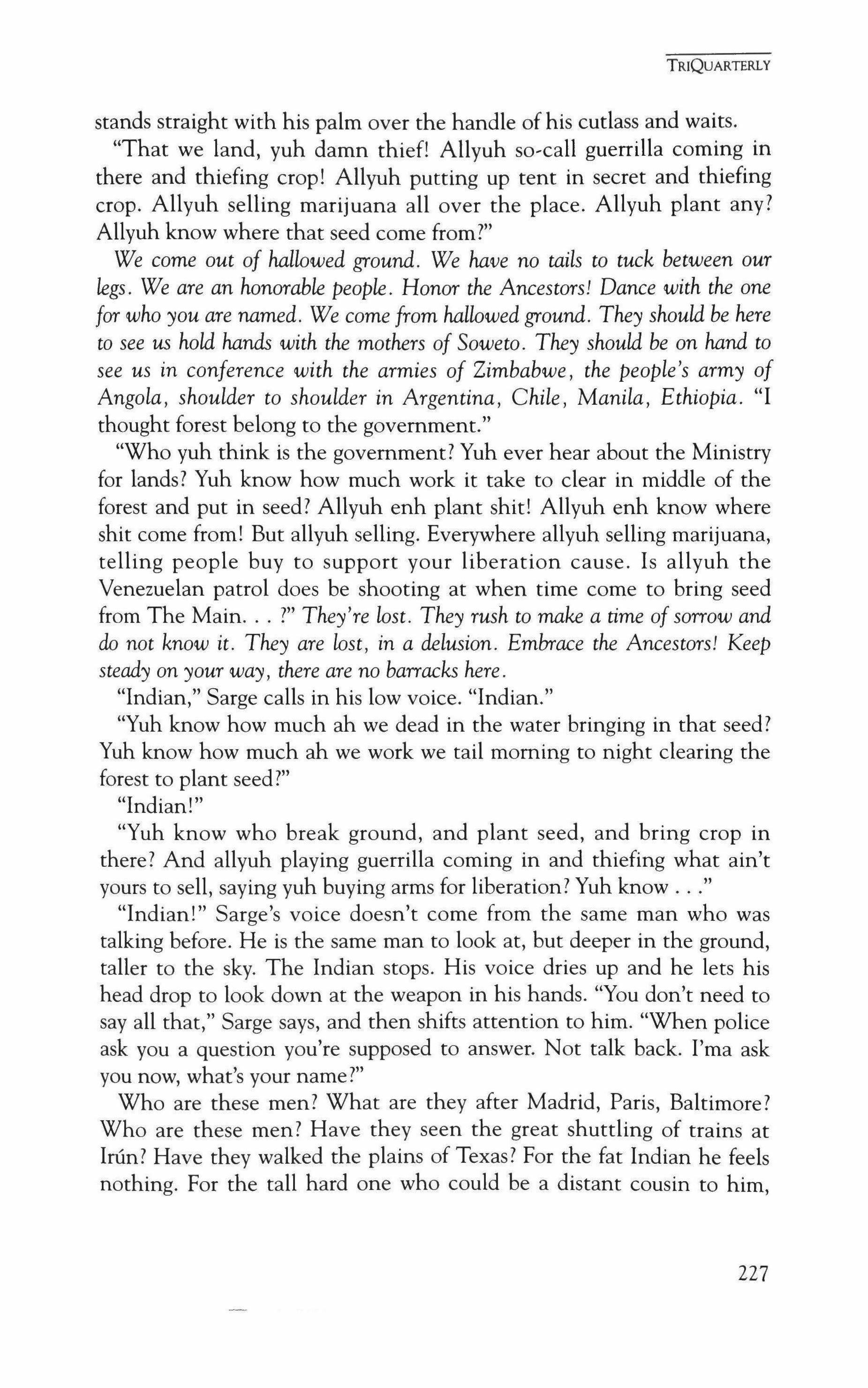
stands straight with his palm over the handle of his cutlass and waits.
"That we land, yuh damn thief! Allyuh so-call guerrilla coming in there and thiefing crop! Allyuh putting up tent in secret and thiefing crop. Allyuh selling marijuana all over the place. Allyuh plant any? Allyuh know where that seed come from?"
We come out of hallowed ground. We have no tails to tuck between our legs. We are an honorable people. Honor the Ancestors! Dance with the one for who you are named. We come from hallowed ground. They should be here to see us hold hands with the mothers of Soweto. They should be on hand to see us in conference with the armies of Zimbabwe, the people's army of Angola, shoulder to shoulder in Argentina, Chile, Manila, Ethiopia. "I thought forest belong to the government."
"Who yuh think is the government? Yuh ever hear about the Ministry for lands? Yuh know how much work it take to clear in middle of the forest and put in seed? Allyuh enh plant shit! Allyuh enh know where shit come from! But allyuh selling. Everywhere allyuh selling marijuana, telling people buy to support your liberation cause. Is allyuh the Venezuelan patrol does be shooting at when time come to bring seed from The Main ?" They're lost. They rush to make a time of sorrow and do not know it. They are lost, in a delusion. Embrace the Ancestors! Keep steady on your way, there are no barracks here.
"Indian," Sarge calls in his low voice. "Indian."
"Yuh know how much ah we dead in the water bringing in that seed? Yuh know how much ah we work we tail morning to night clearing the forest to plant seed?"
"Indian!"
"Yuh know who break ground, and plant seed, and bring crop in there? And allyuh playing guerrilla coming in and thiefing what ain't yours to sell, saying yuh buying arms for liberation? Yuh know "Indian!" Sarge's voice doesn't come from the same man who was talking before. He is the same man to look at, but deeper in the ground, taller to the sky. The Indian stops. His voice dries up and he lets his head drop to look down at the weapon in his hands. "You don't need to say all that," Sarge says, and then shifts attention to him. "When police ask you a question you're supposed to answer. Not talk back. I'ma ask you now, what's your name?"
Who are these men? What are they after Madrid, Paris, Baltimore? Who are these men? Have they seen the great shuttling of trains at Inin? Have they walked the plains of Texas? For the fat Indian he feels nothing. For the tall hard one who could be a distant cousin to him, 227
TRIQUARTERLY
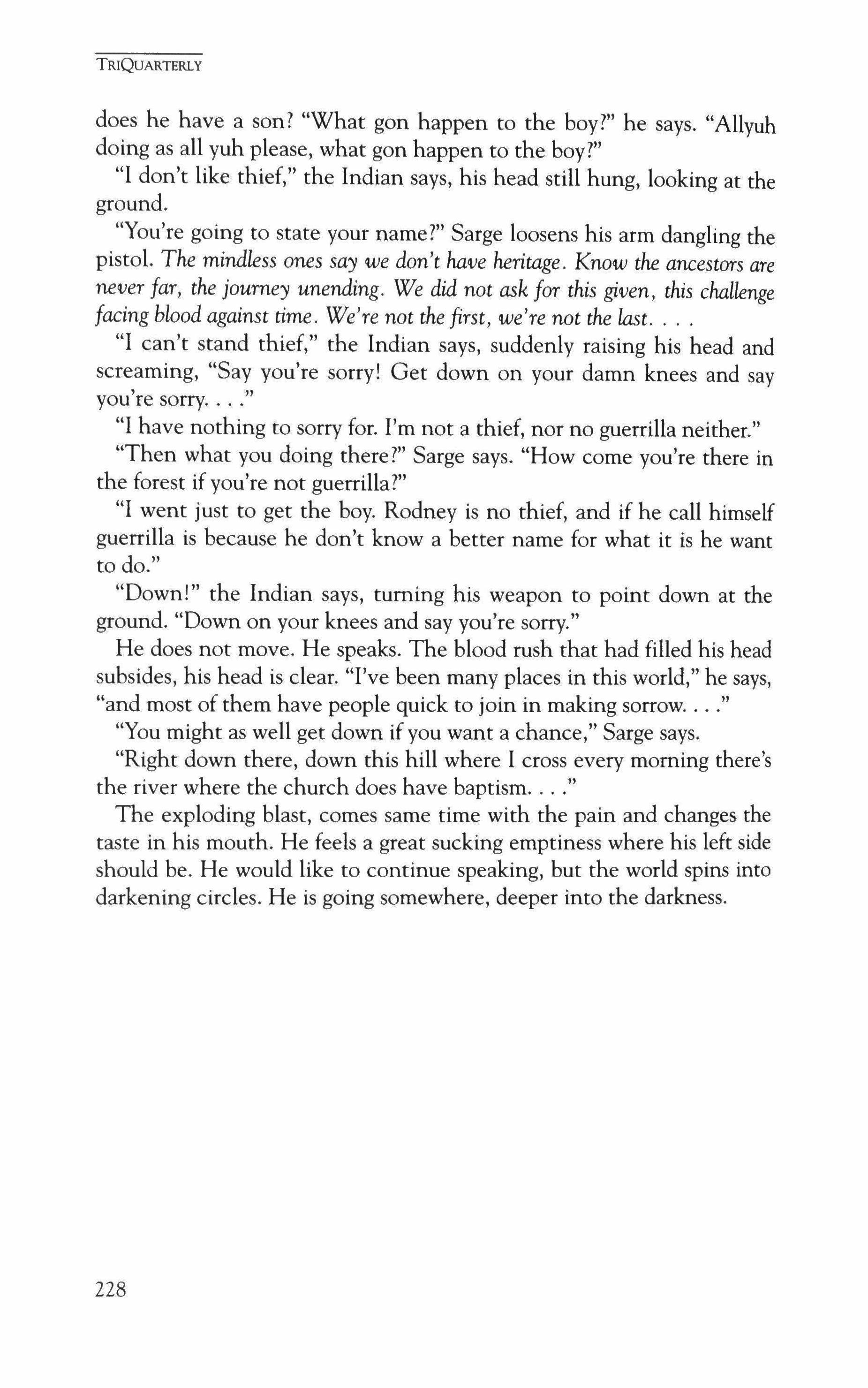
does he have a son? "What gon happen to the boy?" he says. "Allyuh doing as all yuh please, what gon happen to the boy?"
"I don't like thief," the Indian says, his head still hung, looking at the ground.
"You're going to state your name?" Sarge loosens his arm dangling the pistol. The mindless ones say we don't have heritage. Know the ancestors are never far, the journey unending. We did not ask for this given, this challenge facing blood against time. We're not the first, we're not the last
"I can't stand thief," the Indian says, suddenly raising his head and screaming, "Say you're sorry! Get down on your damn knees and say you're sorry
"I have nothing to sorry for. I'm not a thief, nor no guerrilla neither."
"Then what you doing there?" Sarge says. "How come you're there in the forest if you're not guerrilla?"
"I went just to get the boy. Rodney is no thief, and if he call himself guerrilla is because he don't know a better name for what it is he want to do."
"Down!" the Indian says, turning his weapon to point down at the ground. "Down on your knees and say you're sorry."
He does not move. He speaks. The blood rush that had filled his head subsides, his head is clear. "I've been many places in this world," he says, "and most of them have people quick to join in making sorrow
"You might as well get down if you want a chance," Sarge says.
"Right down there, down this hill where I cross every morning there's the river where the church does have baptism
The exploding blast, comes same time with the pain and changes the taste in his mouth. He feels a great sucking emptiness where his left side should be. He would like to continue speaking, but the world spins into darkening circles. He is going somewhere, deeper into the darkness.
TRIQUARTERLY
228
Three Poems
]ayanta Mahapatra
A Hint of Grief

The rain is home, clinging pitifully to the Orissa countryside. Orioles tum on their wings of gold where the sky falls into darker cloud. Beyond the wood fence grow lotuses and wild hyacinths of the wetness. Again, from somewhere, one calls back the love ofwhat one hungers to be touched by, so I can call you by your name-Orissa, as the wind returns again for those empty voices it nurtures in the thick,leafed mangoes and cashews, and rain's frightened hands drop the comic book of our history onto the weathered stones.
TRIQUARTERLY
229
Bazaar Scene
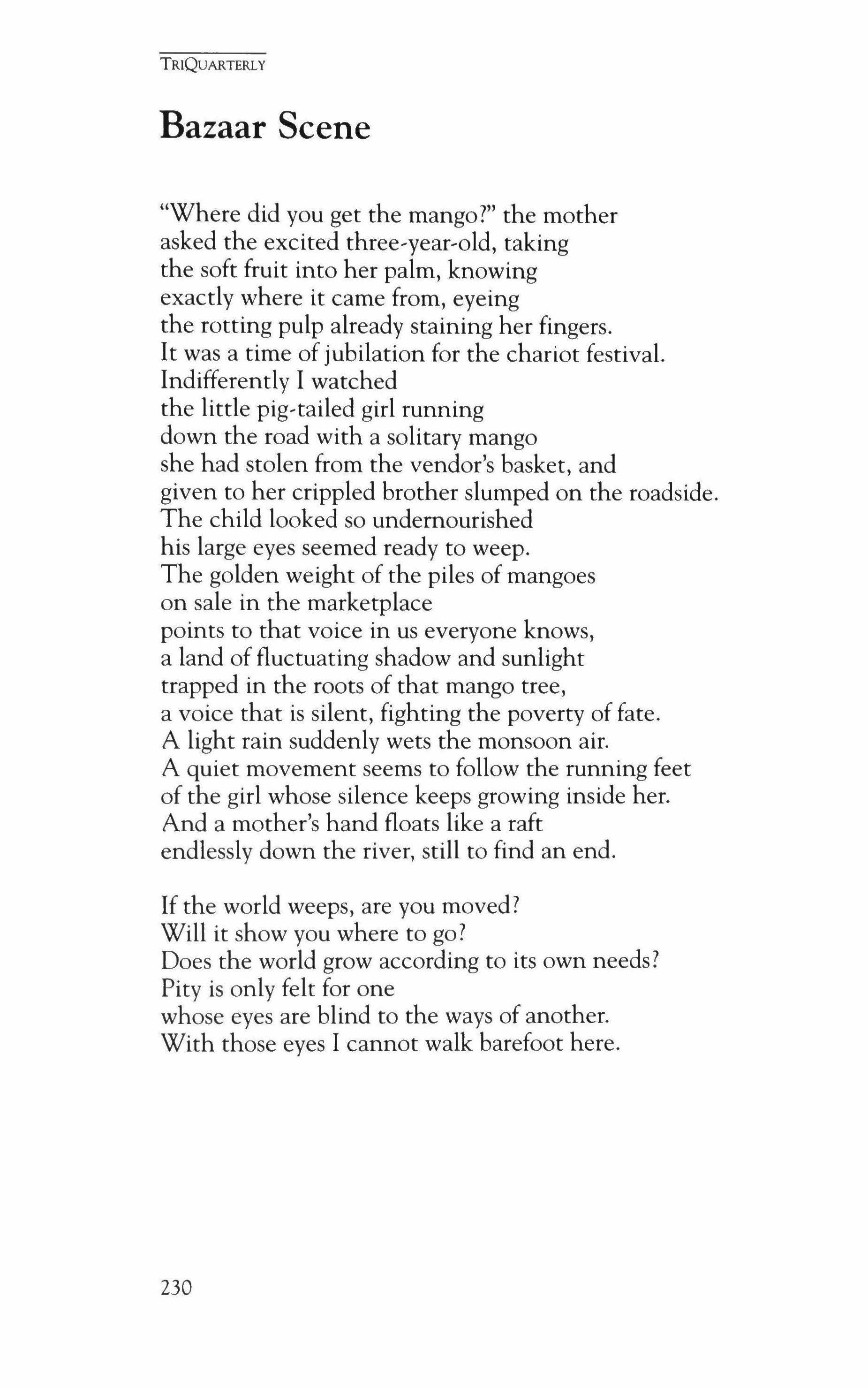
"Where did you get the mango?" the mother asked the excited three-year-old, taking the soft fruit into her palm, knowing exactly where it came from, eyeing the rotting pulp already staining her fingers. It was a time of jubilation for the chariot festival. Indifferently I watched the little pig,tailed girl running down the road with a solitary mango she had stolen from the vendor's basket, and given to her crippled brother slumped on the roadside. The child looked so undernourished his large eyes seemed ready to weep. The golden weight of the piles of mangoes on sale in the marketplace points to that voice in us everyone knows, a land of fluctuating shadow and sunlight trapped in the roots of that mango tree, a voice that is silent, fighting the poverty of fate. A light rain suddenly wets the monsoon air. A quiet movement seems to follow the running feet of the girl whose silence keeps growing inside her. And a mother's hand floats like a raft endlessly down the river, still to find an end.
If the world weeps, are you moved? Will it show you where to go? Does the world grow according to its own needs? Pity is only felt for one whose eyes are blind to the ways of another. With those eyes I cannot walk barefoot here.
TRIQUARTERLY
230

Living in Orissa
Something here, perhaps fatal spirit. Something that recalls the centuries of defeat. To live here, antlered in sickness and disease, in the past of uncomprehended totems and the spilt blood of ancestors one would wear like an amulet. Today the darkness of our own shadows slips over the uncared-for cemeteries by the river. Someone keeps walking down still across the ravenous dust between the graves, waiting like an ancient debt. And someone goes on dancing at the doors of indifferent temples carrying pain in an eyeless face. Only shadows shift now. They have the eyes of defeated spirits. The old old eyes.
TRIQUARTERLY
231
Three Poems
Reginald Shepherd
Narcissus in Plato's Cave
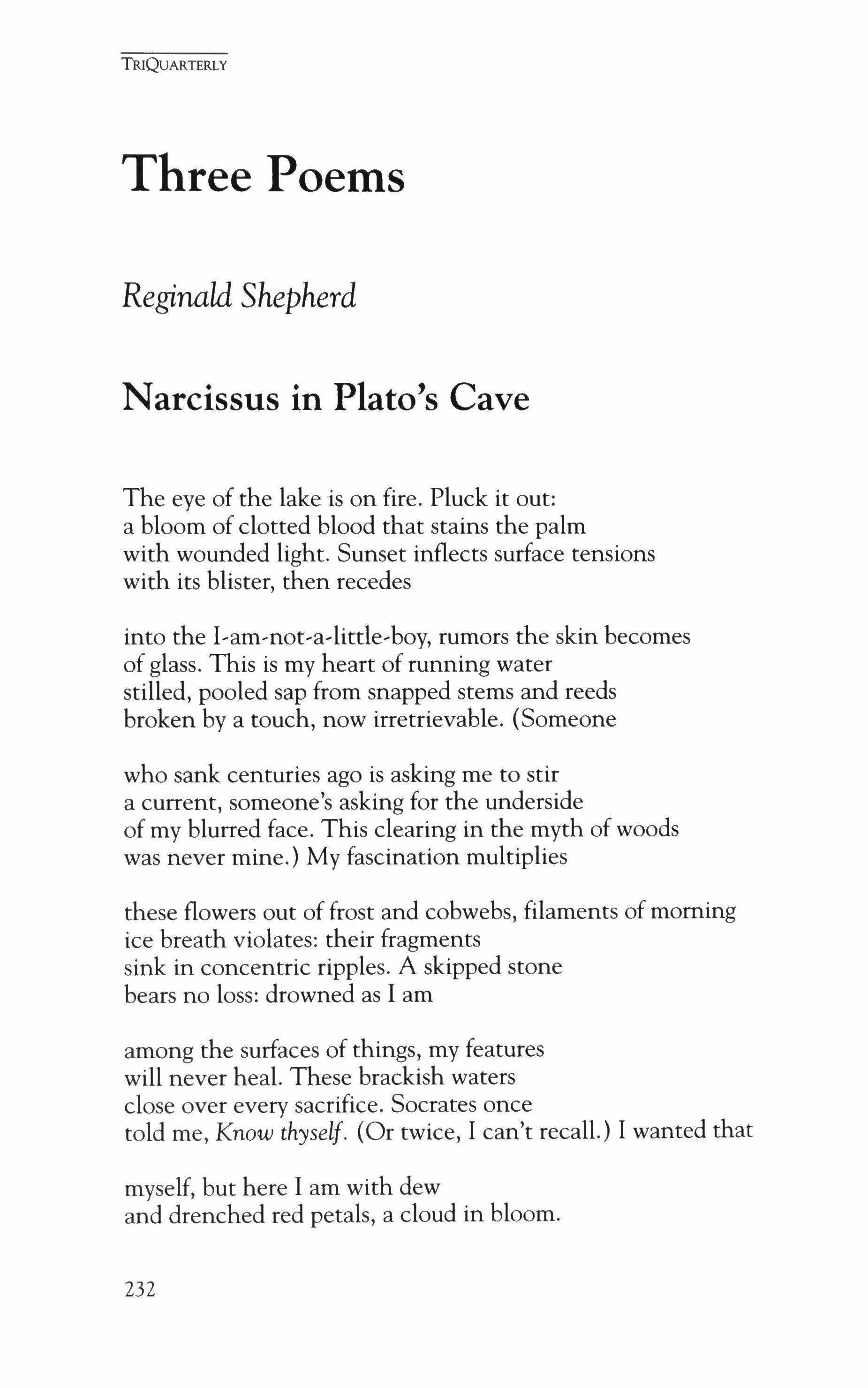
The eye of the lake is on fire. Pluck it out: a bloom of clotted blood that stains the palm with wounded light. Sunset inflects surface tensions with its blister, then recedes into the l-am-not-a-little-boy, rumors the skin becomes of glass. This is my heart of running water stilled, pooled sap from snapped stems and reeds broken by a touch, now irretrievable. (Someone who sank centuries ago is asking me to stir a current, someone's asking for the underside of my blurred face. This clearing in the myth of woods was never mine.) My fascination multiplies these flowers out of frost and cobwebs, filaments of morning ice breath violates: their fragments sink in concentric ripples. A skipped stone bears no loss: drowned as I am among the surfaces of things, my features will never heal. These brackish waters close over every sacrifice. Socrates once told me, Know thyself. (Or twice, I can't recall.) I wanted that myself, but here I am with dew and drenched red petals, a cloud in bloom.
TRIQUARTERLY
232
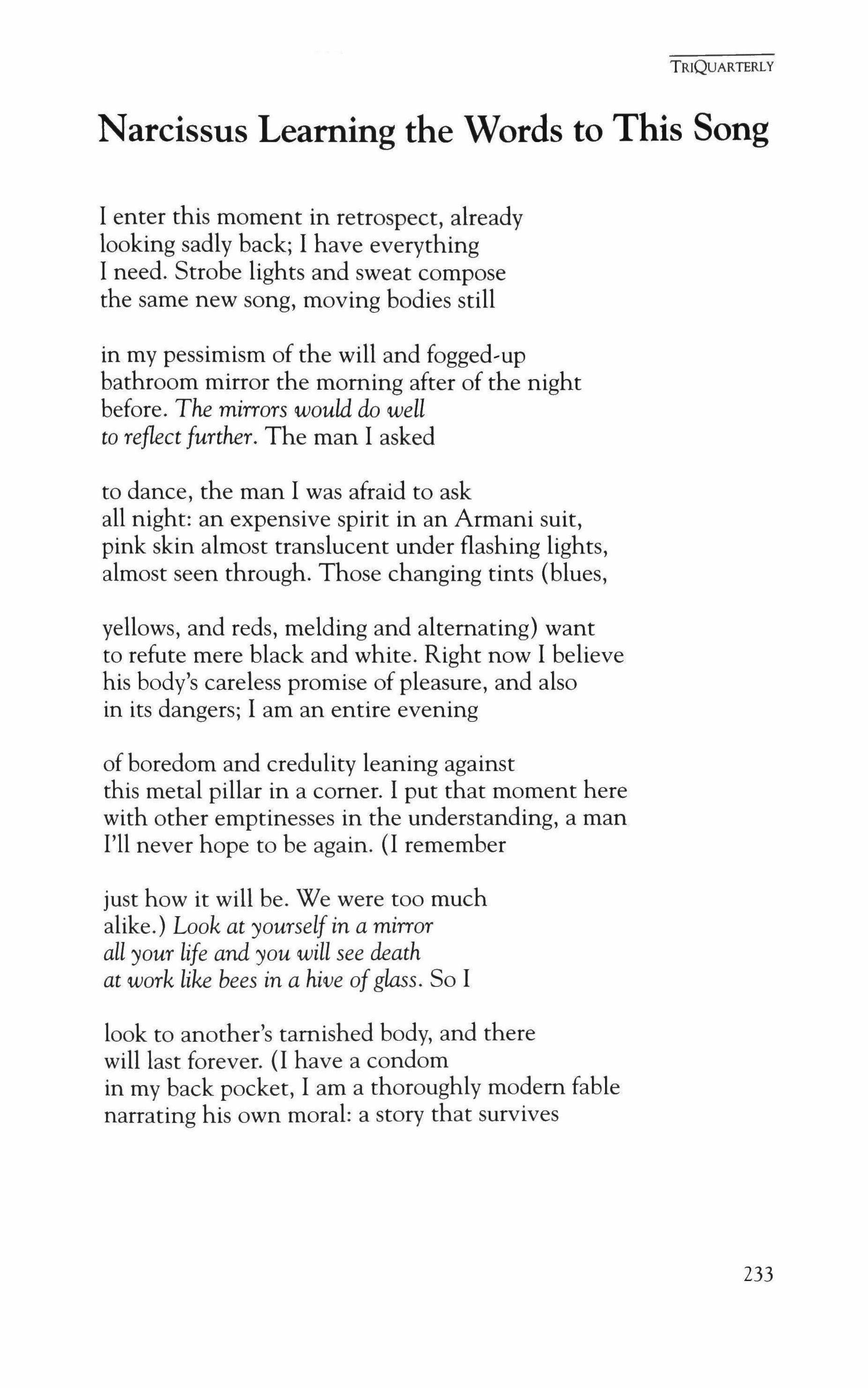
Narcissus Learning the Words to This Song
I enter this moment in retrospect, already looking sadly back; I have everything I need. Strobe lights and sweat compose the same new song, moving bodies still in my pessimism of the will and fogged-up bathroom mirror the morning after of the night before. The mirrors would do well to reflectfurther. The man I asked
to dance, the man I was afraid to ask all night: an expensive spirit in an Armani suit, pink skin almost translucent under flashing lights, almost seen through. Those changing tints (blues, yellows, and reds, melding and alternating) want to refute mere black and white. Right now I believe his body's careless promise of pleasure, and also in its dangers; I am an entire evening of boredom and credulity leaning against this metal pillar in a comer. I put that moment here with other emptinesses in the understanding, a man I'll never hope to be again. (I remember just how it will be. We were too much alike.) Look at yourself in a mirror all your life and you will see death at work like bees in a hive ofglass. So I
look to another's tarnished body, and there will last forever. (I have a condom in my back pocket, I am a thoroughly modem fable narrating his own moral: a story that survives
TRIQUARTERLY
233

tonight, and all the undressed pictures of desire corrected into beauty.) Foucault wrote that love is reminiscence, the shining hour after he leaves at three or four A.M. (A myth myself, I am familiar with the other fictions.) Histories of men I haven't met are waving goodbye from cabs. I author my loss for the beauty of its afterward, shared hours spent alone with these glass flowers: I have outlived my allegory. Send me forget-rne-nots.
TRIQUARTERLY
234
Narcissus as Gnostic
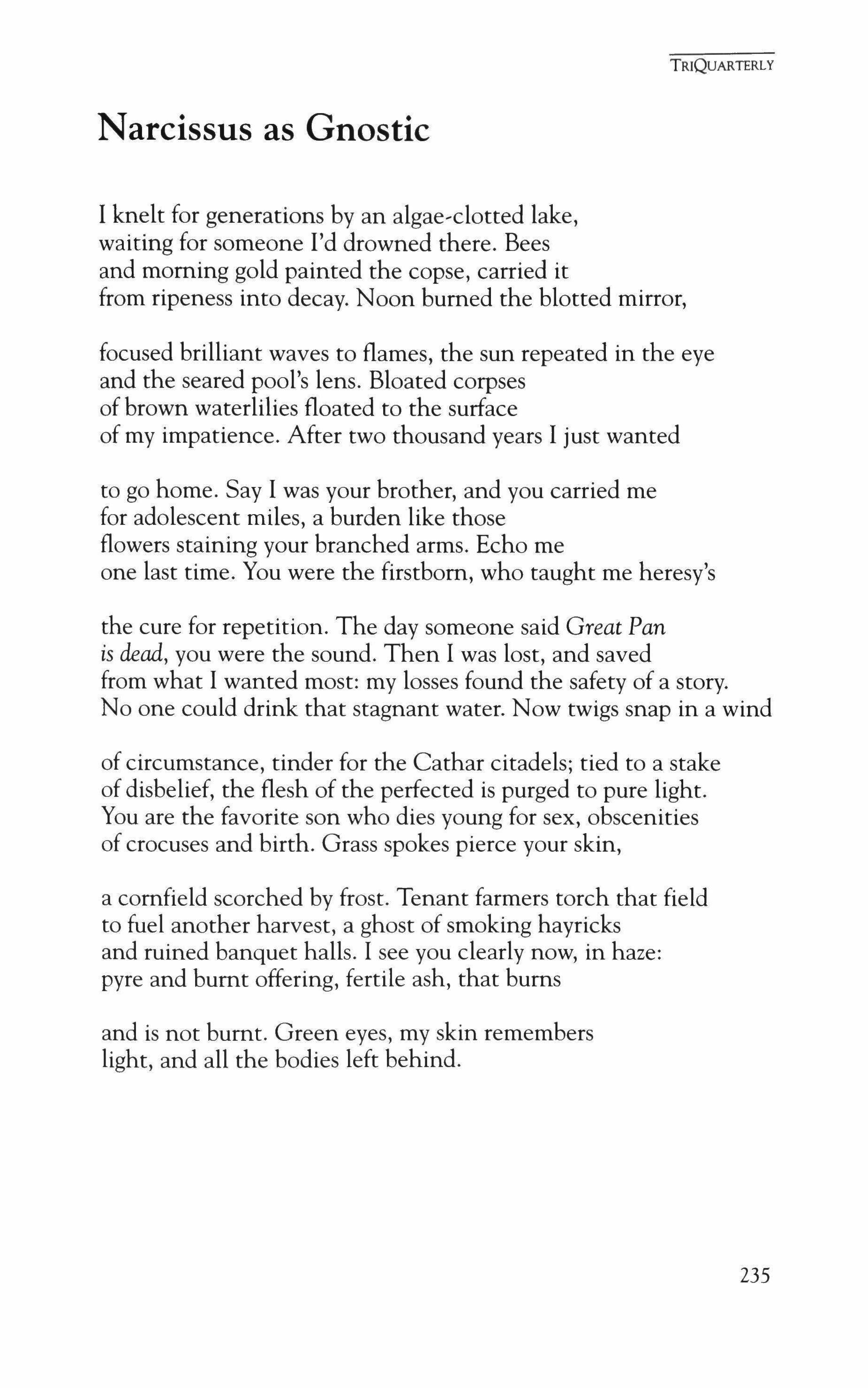
I knelt for generations by an algae,clotted lake, waiting for someone I'd drowned there. Bees and morning gold painted the copse, carried it from ripeness into decay. Noon burned the blotted mirror, focused brilliant waves to flames, the sun repeated in the eye and the seared pool's lens. Bloated corpses ofbrown waterlilies floated to the surface of my impatience. After two thousand years I just wanted to go home. Say I was your brother, and you carried me for adolescent miles, a burden like those flowers staining your branched arms. Echo me one last time. You were the firstborn, who taught me heresy's the cure for repetition. The day someone said Great Pan is dead, you were the sound. Then I was lost, and saved from what I wanted most: my losses found the safety of a story. No one could drink that stagnant water. Now twigs snap in a wind of circumstance, tinder for the Cathar citadels; tied to a stake of disbelief, the flesh of the perfected is purged to pure light. You are the favorite son who dies young for sex, obscenities of crocuses and birth. Grass spokes pierce your skin, a cornfield scorched by frost. Tenant farmers torch that field to fuel another harvest, a ghost of smoking hayricks and ruined banquet halls. I see you clearly now, in haze: pyre and burnt offering, fertile ash, that burns and is not burnt. Green eyes, my skin remembers light, and all the bodies left behind.
TRIQUARTERLY
235
Four Poems
]ose Emilia Pacheca
Translated from the Spanish by Cynthia Steele
Parejas

Los insectos se acoplan sobre el agua con una precision que Nijinsky hubiera envidiado. Coreograffa ensayada millones de afios.
Se juntan sin hundirse, sacan su fuerza de la corriente y el abismo, logran la pareja perfecta, el amor total. Cumplen con creces 10 esperado de elIos.
Tratamos de imitarlos y no es 10 mismo.
TRIQUARTERLY
236
Couples

Insects mate on the water with a precision Nijinsky would have envied. Choreography practiced for millions of years.
They join together without sinking, draw their strength from the rapids and the abyss, become the perfect couple, total love. They meet our expectations and then some.
We try to copy them, and it's not the same.
TRIQUARTERLY 237
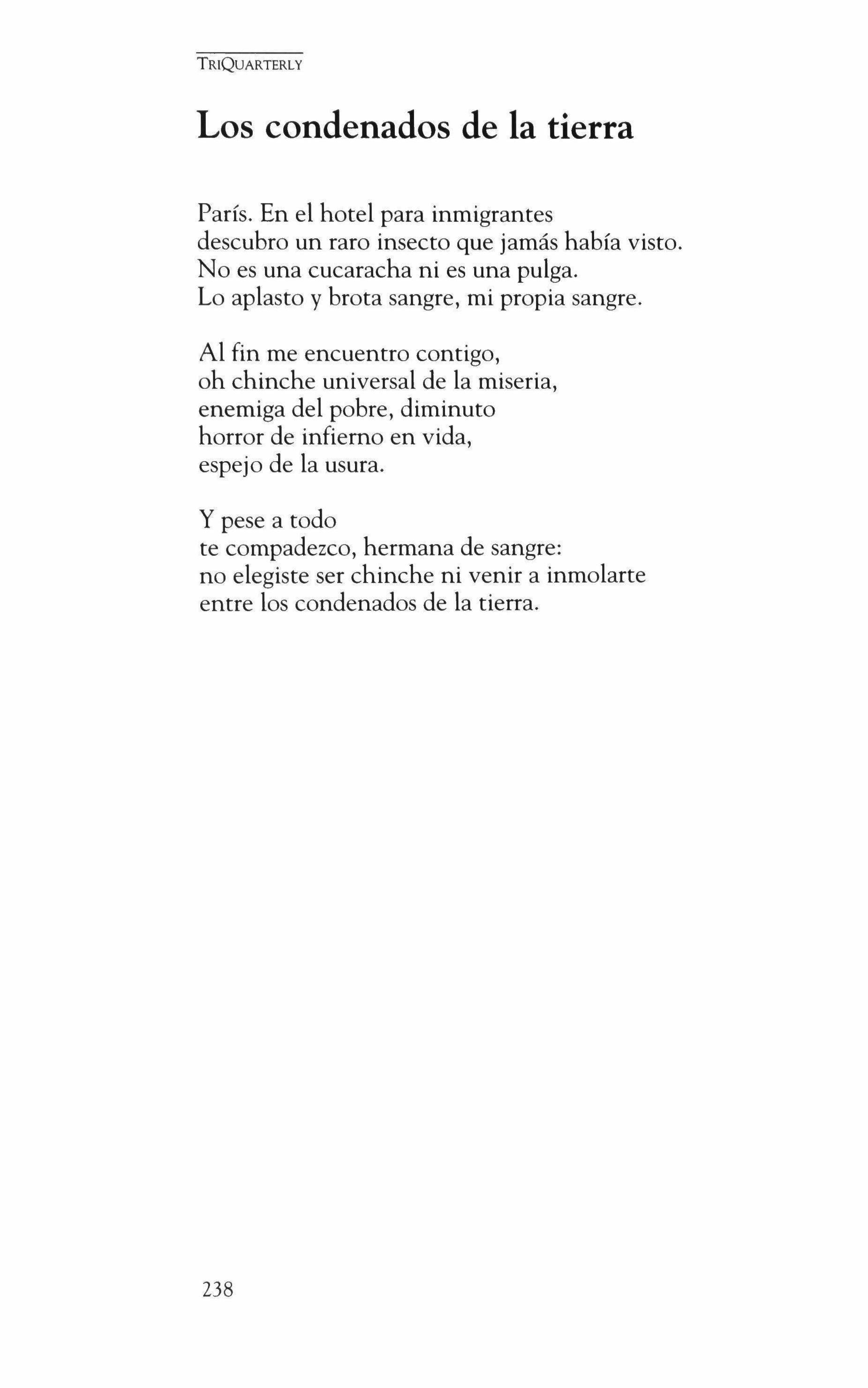
Los condenados de la tierra
Parfs. En el hotel para inmigrantes descubro un raro insecta que jamas habfa visto.
No es una cucaracha ni es una pulga. Lo aplasto y brota sangre, mi propia sangre.
Al fin me encuentro contigo, oh chinche universal de la miseria, enemiga del pobre, diminuto horror de infiemo en vida, espejo de la usura.
Y pese a todo te compadezco, hermana de sangre: no elegiste ser chinche ni venir a inmolarte entre los condenados de la tierra.
TRIQUARTERLY
238
The Wretched of the Earth
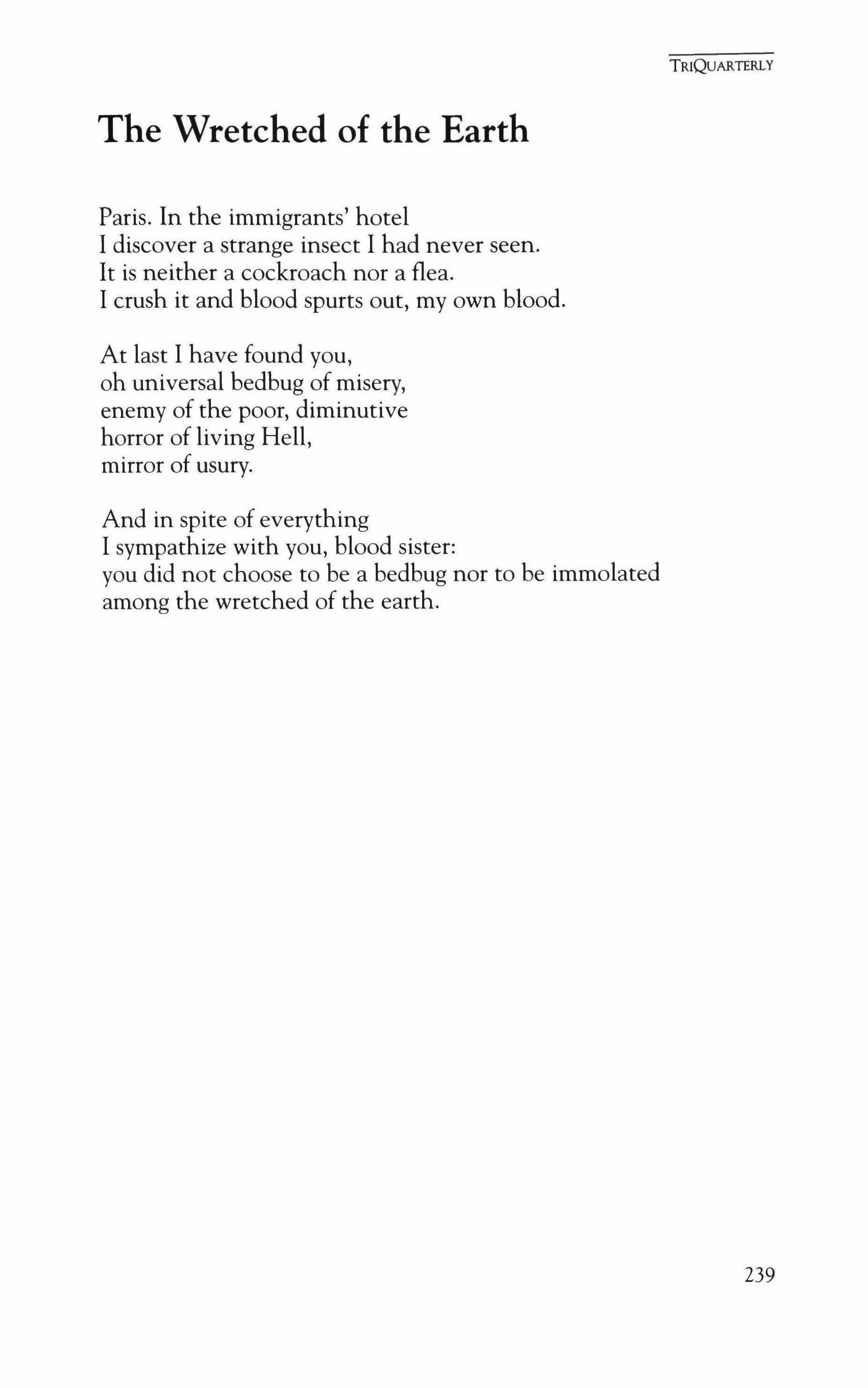
Paris. In the immigrants' hotel I discover a strange insect I had never seen. It is neither a cockroach nor a flea. I crush it and blood spurts out, my own blood.
At last I have found you, oh universal bedbug of misery, enemy of the poor, diminutive horror of living Hell, mirror of usury.
And in spite of everything I sympathize with you, blood sister: you did not choose to be a bedbug nor to be immolated among the wretched of the earth.
TRIQUARTERLY 239
Para ti
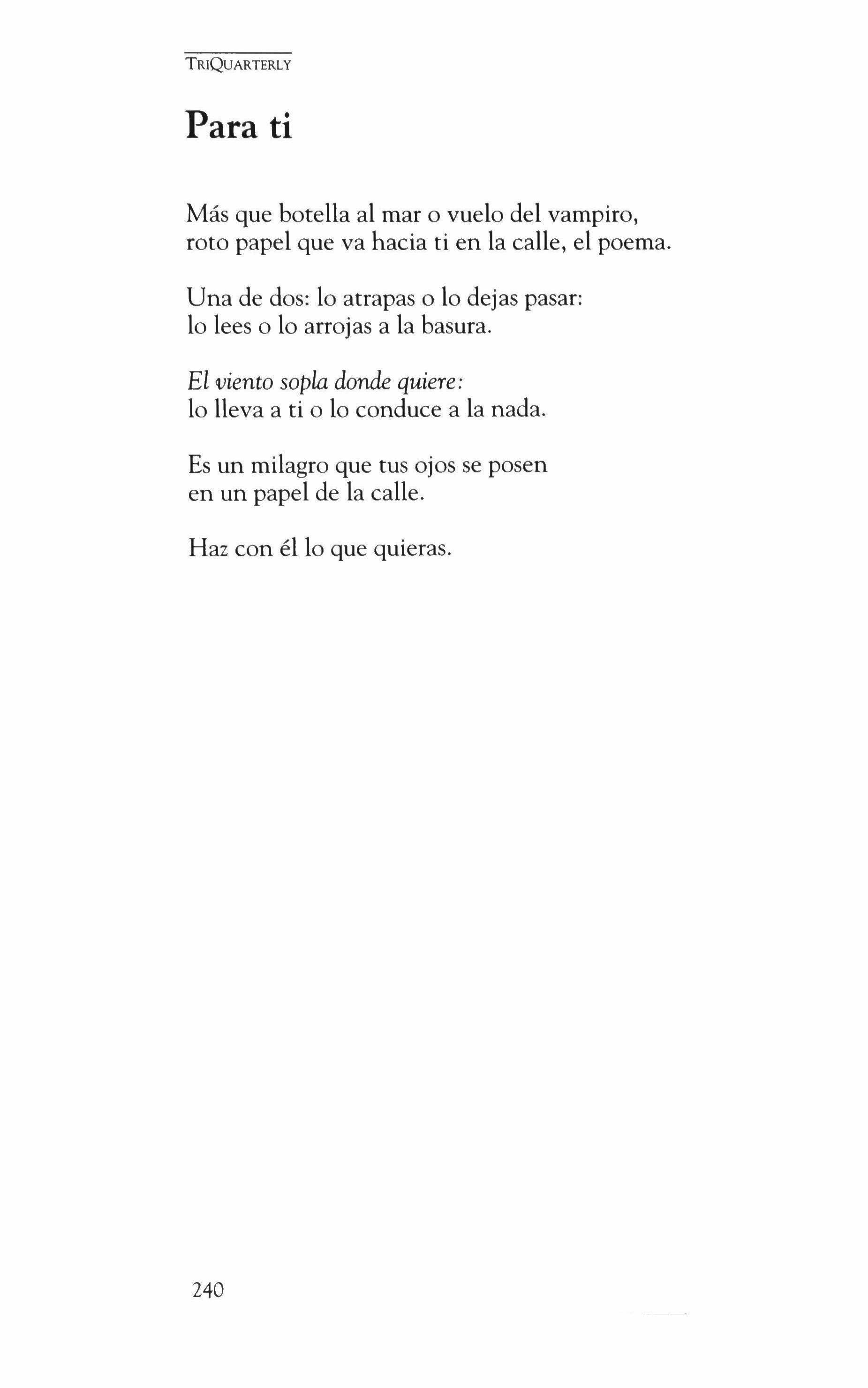
Mas que botella a1 mar 0 vuelo del vampiro, roto pape1 que va hacia ti en 1a calle, e1 poema.
Una de dos: 10 atrapas 0 10 dejas pasar: 10 lees 0 10 arroj as a 1a basura.
El viento sopla doMe quiere: 10 lleva a ti 0 10 conduce a 1a nada.
Es un milagro que tus ojos se posen en un papel de 1a calle.
Haz con e110 que quieras.
TRIQUARTERLY
240
For You

More than a bottle at sea or the vampire's flight, a tom scrap of paper blowing toward you on the street, the poem.
Do one thing or the other: trap it or let it go by; read it or throw it in the trash.
The wind blows where it will: putting it in your hand or steering it toward nothingness.
It's a miracle for your eyes to linger on a scrap of paper in the street.
Do whatever you want with it.
TRIQUARTERLY
241
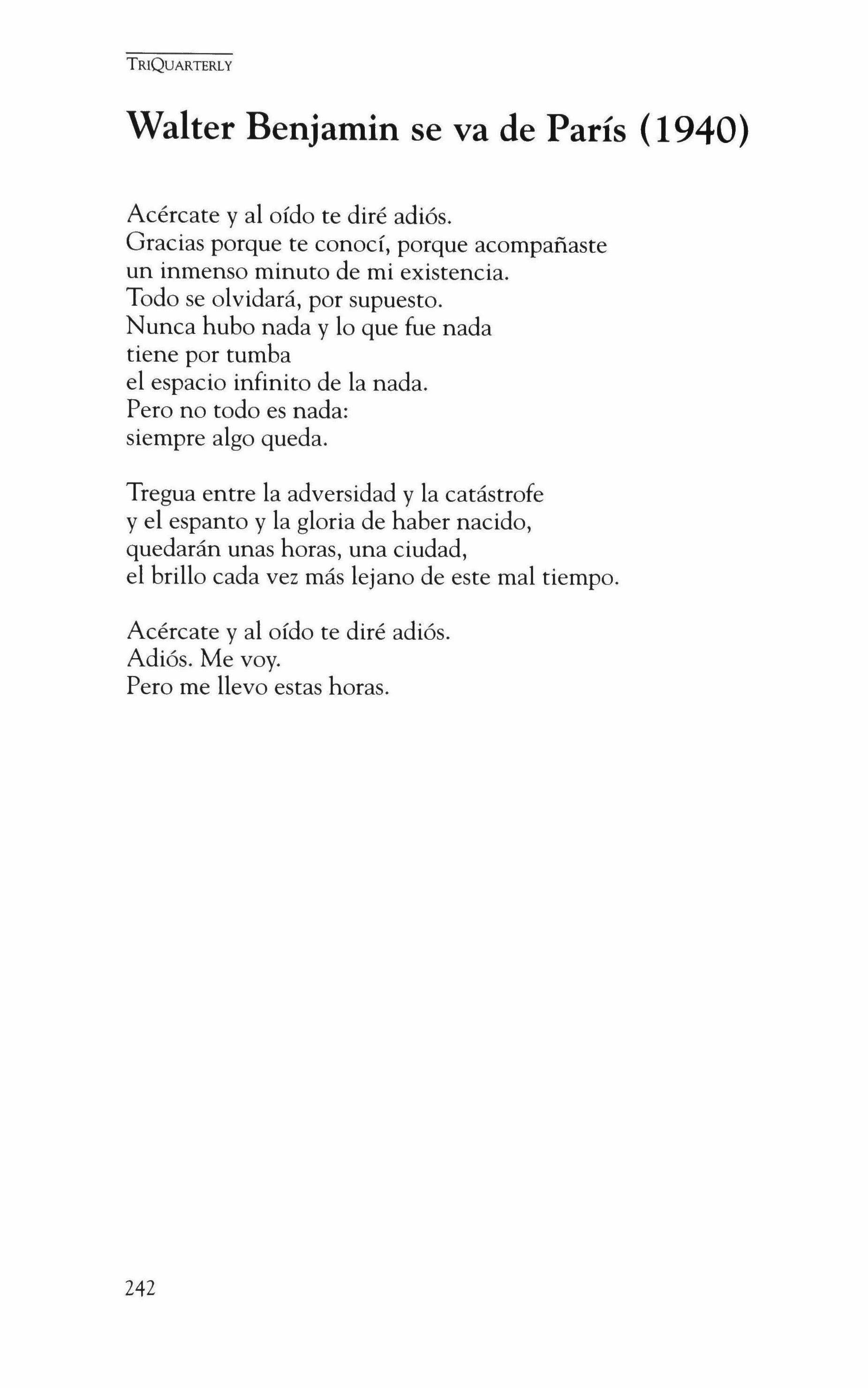
Walter Benjamin se va de Paris (1940)
Acercate y al ofdo te dire adios. Gracias porque te conoci, porque acompafiaste un inmenso minuto de mi existencia.
Todo se olvidara, por supuesto.
Nunca hubo nada y 10 que fue nada tiene por tumba el espacio infinito de la nada.
Pero no todo es nada: siempre algo queda.
Tregua entre la adversidad y la catastrofe y el espanto y la gloria de haber nacido, quedaran unas horas, una ciudad, el brillo cada vez mas lejano de este mal tiempo.
Acercate y al ofdo te dire adios.
Adios. Me voy.
Pero me llevo estas horas.
TRIQUARTERLY
242
Walter Benjamin Leaves Paris (1940)

Come closer and I'll whisper goodbye in your ear. Thank you for letting me know you, for sharing an immense minute of my existence. Everything will be forgotten, of course. There never was anything and what was nothing has the boundless space of nothingness for its tomb. But not everything is nothing: something always remains.
A truce between adversity and catastrophe and the fear and glory of having been born, a few hours and a city will remain, the ever more distant glow of this evil time.
Come closer and I'll whisper goodbye in your ear. Goodbye. I'm leaving now. But I'm taking these hours with me.
TRIQUARTERLY
243
Irony, Irony, Irony
Antonya Nelson

Lionel took off Elaine's underwear in the yard. She'd spread a tatty blanket over the grass and fallen onto it; the summer sky above her was jampacked with unknown constellations.
"If my parents open their curtains, they can see us," she whispered. Lionel hesitated in undressing her; it was freezing in the mountains, even in June, and goose bumps had risen on her stomach and chest. They'd been drinking rum and smoking marijuana: sticky, sweet-like youth. They laughed about Elaine's parents, whose bedroom window went dark a few minutes later. Their sex was heedless and exciting, as if between strangers. Afterwards, they ran to the house wearing various garments, wrapped clumsily in the damp leafy blanket, leaving Elaine's panties in the yard, where her father found them in the morning.
They were a bright white; he thought he'd located one of his hankies.
Besides handkerchiefs, Elaine's father carried other mementos of bygone times: a signet ring, a pocket watch, a money clip. He belonged to the generation on its way out, one unable to wholly recover from the Depression or the Second World War, one that understood itself lucky simply to survive, a generation baffled by the whining one that followed it.
Some of his habits, which came with the territory, annoyed his off, spring. He was cautious with money and took finances unnecessarily seriously. He did not believe gender irrelevant. Feminists made him defensive, homosexuals made him queasy, the Japanese made him nervous, addicts made him impatient, although blacks, as a rule, he felt an obligation to pity, still influenced as he was by the stretch of the 1960s
TRIQUARTERLY
244

and civil rights. Explosive displays within {and without} the family embarrassed him. He thought children should be seen rather than heard.
Other traits of his pleased Elaine and her siblings. For example, he had a gentleman's chivalry and would not tolerate rudeness toward Elaine's mother, to whom he'd been steadily married for forty-three years. He wished to protect his daughters. He did not want to know the inner workings of their lives, but he could not rest without assuming the general outer shape of them safe and intact. He honored the cocktail hour, and when they arrived at this house, he had waiting their favorite drinks, a margarita for Mary, red wine for Elaine, pink champagne for Dini. His son, with whom he had troubles, would drink whatever there was the most of.
This was the summer home, the frame house in the Rockies, the place where Elaine's family collected to remind themselves how badly they got along. Because the house stood empty for nine months of the year, the primary activity of the summer was mending its damage: screens, plumbing, painting. The side yard had seen the weddings of three of the four siblings; the fourth, Jonathan, seemed to be homosexual {the sisters were still debating; their father would have been appalled to learn what they thought}. The original family had fit easily in the house-plenty of bedrooms, adequate bath-but now had grown too large: three husbands, six grandchildren, a new baby on the way. The small children slept like dogs: on the couch, on the porch, on the floor.
Elaine's younger sister, Dini, had appeared on the Fourth of July with her husband the misanthrope and her large belly, morosely pregnant. No one thought her ready for it. And Elaine, fearing her own unwanted, indiscreet pregnancy, sighed heavily. Had she consulted her mother, she would have been told, not for the first time, that her two sisters had been accidents. "Accidents," her mother would say, "but not mistakes." The oldest and the youngest, the first and the last, the unintended parentheses around Elaine and Jonathan. Her mother would have advised having the baby; she would have extolled--over-extolled-the virtues of unplanned children.
Elaine, who already had a boy and a girl of her own {both planned}, indulged the fantasy of another baby, another pregnancy, knowing she would not follow through. She and her husband Lionel didn't have the requisite vigor for another child; it would exhaust them, the way her mother's last child, baby Dini, had exhausted her, leaving her dazed and depleted, emotionally anemic. Perhaps Elaine's mother had realized ear-
TRIQUARTERLY
245

lier, after Jonathan came along, that the household teams were no longer evenly matched, that the parents, outnumbered, would surely lose.
Elaine's youngest siblings were the closest of the grown children, separated from Elaine and her big sister, Mary, by their dependence on their parents, whom they resented because they were still financially beholden. This despite Jonathan's being thirty years old and owner of his own business; this despite Dini's marriage. It did not appear that her parents lorded the situation over Dini and Jonathan, though Elaine supposed they must, unwittingly.
Jonathan and Dini liked to complain about their mother and father, and Elaine and Mary would feel obliged to act as ambassadors for parenthood, their mission to explain why they did what they did. Without Jonathan, Dini might surrender, but with Jonathan on her side, she would not relent: her father and mother were monstrous, controlling, insufferable.
Mary, the oldest and most sentimental, had the shiny gloss of tears in her eyes; she couldn't bear their rancor, it broke her saintly heart.
"Why do you keep coming back to see them?" Elaine asked them, sincerely curious. Neither had an answer, although Elaine thought she understood their vain hope: that some day their parents would grasp who they truly were, and love them anyway.
When he wasn't egging on Dini in her tirades, Jonathan spent most of the reunion week underneath his motorcycle, either genuinely repairing it or pretending to, appearing for meals with oil on his clothing, black beneath his fingernails, an odor of machinery in his hair. Every morning, his shower lasted until the hot water turned tepid. Wearing only a towel around his waist, he stood on the sunny front porch and blew his nose over the railing. Elaine's five-year-old son was taking lessons, using his finger to close one nostril, leaning over and honking into the grass.
"Doesn't that destroy brain cells?" Dini asked, watching from the kitchen. Her clothes, because she refused to wear maternity outfits, strained against her body, leaving gaps, revealing her popped navel like a button.
Elaine said, "Women never do things like that, have you noticed?"
He was good with children, but Jonathan said he didn't want his own. Their father frowned, declaring-in the same peremptory tone he'd once used to advise a military stint-that of course Jonathan would change his mind when the right woman came along. The sisters exchanged glances while Jonathan turned red. They liked the idea of
TRIQUARTERLY
246
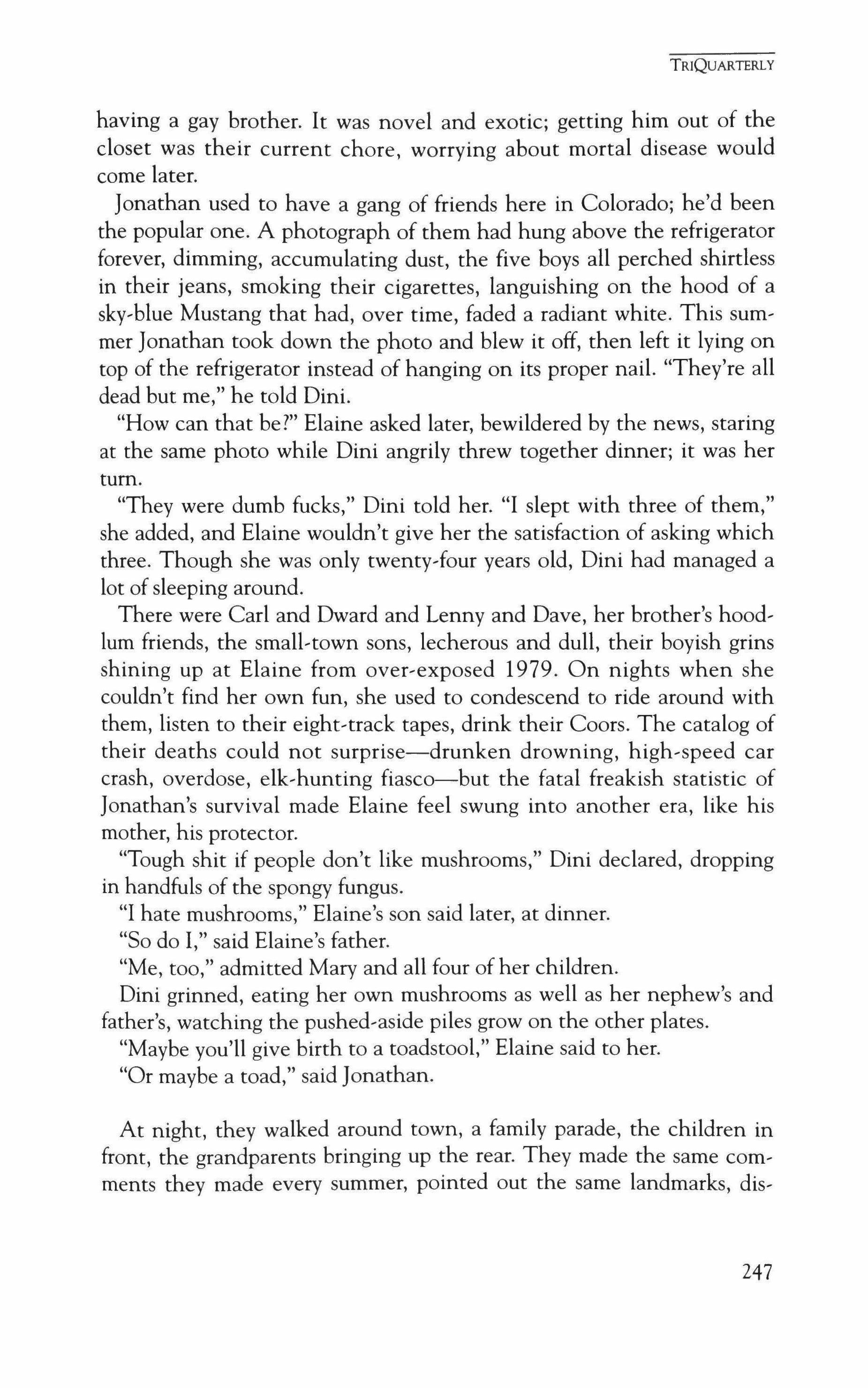
having a gay brother. It was novel and exotic; getting him out of the closet was their current chore, worrying about mortal disease would come later.
Jonathan used to have a gang of friends here in Colorado; he'd been the popular one. A photograph of them had hung above the refrigerator forever, dimming, accumulating dust, the five boys all perched shirtless in their jeans, smoking their cigarettes, languishing on the hood of a sky-blue Mustang that had, over time, faded a radiant white. This summer Jonathan took down the photo and blew it off, then left it lying on top of the refrigerator instead of hanging on its proper nail. "They're all dead but me," he told Dini.
"How can that be?" Elaine asked later, bewildered by the news, staring at the same photo while Dini angrily threw together dinner; it was her tum.
"They were dumb fucks," Dini told her. "I slept with three of them," she added, and Elaine wouldn't give her the satisfaction of asking which three. Though she was only twenty-four years old, Dini had managed a lot of sleeping around.
There were Carl and Dward and Lenny and Dave, her brother's hoodlum friends, the small-town sons, lecherous and dull, their boyish grins shining up at Elaine from over-exposed 1979. On nights when she couldn't find her own fun, she used to condescend to ride around with them, listen to their eight-track tapes, drink their Coors. The catalog of their deaths could not surprise-drunken drowning, high-speed car crash, overdose, elk-hunting fiasco-but the fatal freakish statistic of Jonathan's survival made Elaine feel swung into another era, like his mother, his protector.
"Tough shit if people don't like mushrooms," Dini declared, dropping in handfuls of the spongy fungus.
"I hate mushrooms," Elaine's son said later, at dinner.
"So do I," said Elaine's father.
"Me, too," admitted Mary and all four of her children.
Dini grinned, eating her own mushrooms as well as her nephew's and father's, watching the pushed-aside piles grow on the other plates.
"Maybe you'll give birth to a toadstool," Elaine said to her.
"Or maybe a toad," said Jonathan.
At night, they walked around town, a family parade, the children in front, the grandparents bringing up the rear. They made the same cornments they made every summer, pointed out the same landmarks, dis-
TRIQUARTERLY
247
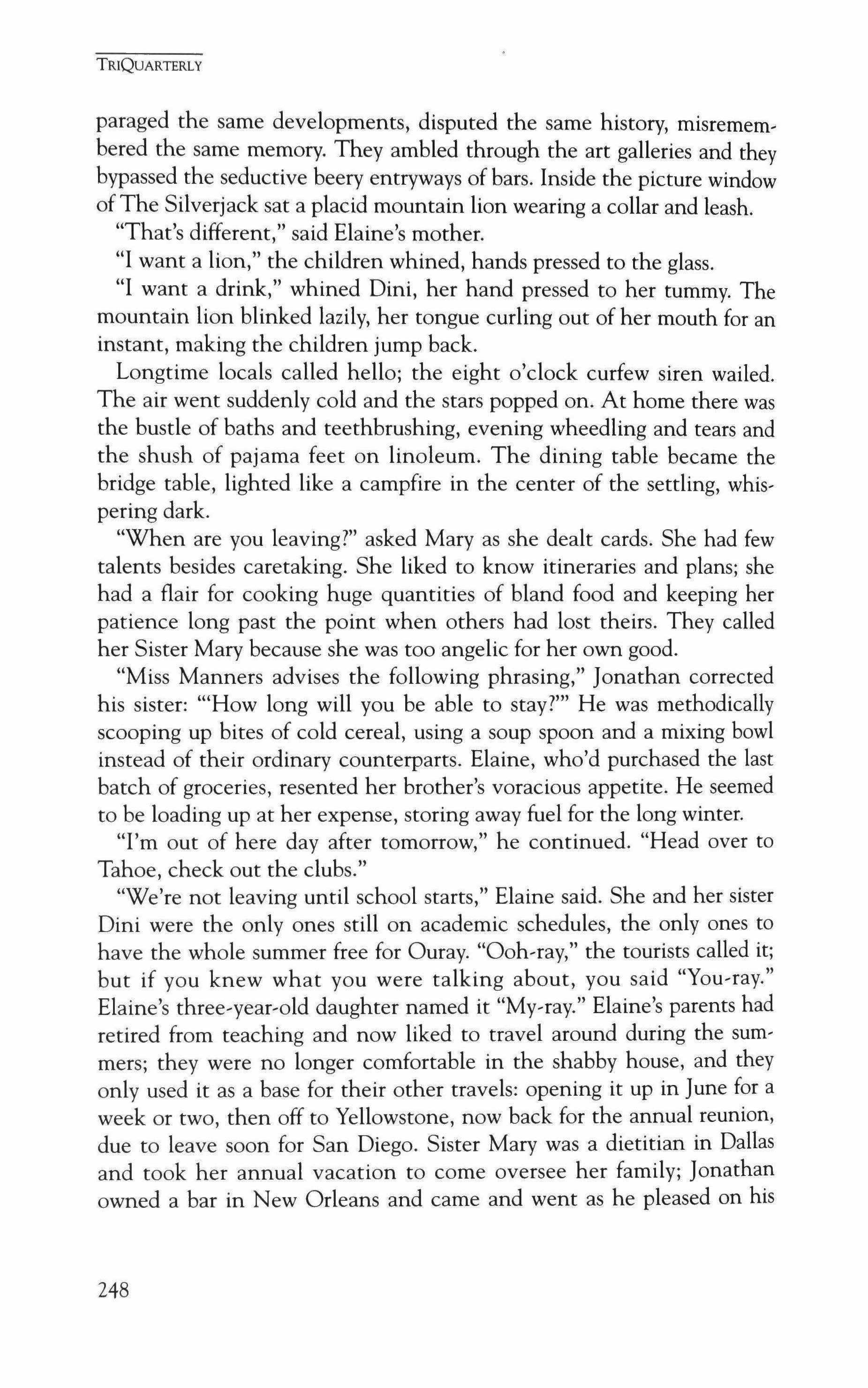
paraged the same developments, disputed the same history, misremernbered the same memory. They ambled through the art galleries and they bypassed the seductive beery entryways of bars. Inside the picture window of The Silverjack sat a placid mountain lion wearing a collar and leash.
"That's different," said Elaine's mother.
"I want a lion," the children whined, hands pressed to the glass.
"I want a drink," whined Dini, her hand pressed to her tummy. The mountain lion blinked lazily, her tongue curling out of her mouth for an instant, making the children jump back.
Longtime locals called hello; the eight o'clock curfew siren wailed. The air went suddenly cold and the stars popped on. At horne there was the bustle of baths and teerhbrushing, evening wheedling and tears and the shush of pajama feet on linoleum. The dining table became the bridge table, lighted like a campfire in the center of the settling, whispering dark.
"When are you leaving?" asked Mary as she dealt cards. She had few talents besides caretaking. She liked to know itineraries and plans; she had a flair for cooking huge quantities of bland food and keeping her patience long past the point when others had lost theirs. They called her Sister Mary because she was too angelic for her own good.
"Miss Manners advises the following phrasing," Jonathan corrected his sister: "'How long will you be able to stay?'" He was methodically scooping up bites of cold cereal, using a soup spoon and a mixing bowl instead of their ordinary counterparts. Elaine, who'd purchased the last batch of groceries, resented her brother's voracious appetite. He seemed to be loading up at her expense, storing away fuel for the long winter.
"I'm out of here day after tomorrow," he continued. "Head over to Tahoe, check out the clubs."
"We're not leaving until school starts," Elaine said. She and her sister Dini were the only ones still on academic schedules, the only ones to have the whole summer free for Ouray. "Ooh-ray," the tourists called it; but if you knew what you were talking about, you said "You-ray." Elaine's three-year-old daughter named it "My-ray." Elaine's parents had retired from teaching and now liked to travel around during the summers; they were no longer comfortable in the shabby house, and they only used it as a base for their other travels: opening it up in June for a week or two, then off to Yellowstone, now back for the annual reunion, due to leave soon for San Diego. Sister Mary was a dietitian in Dallas and took her annual vacation to come oversee her family; Jonathan owned a bar in New Orleans and came and went as he pleased on his
TRIQUARTERLY
248
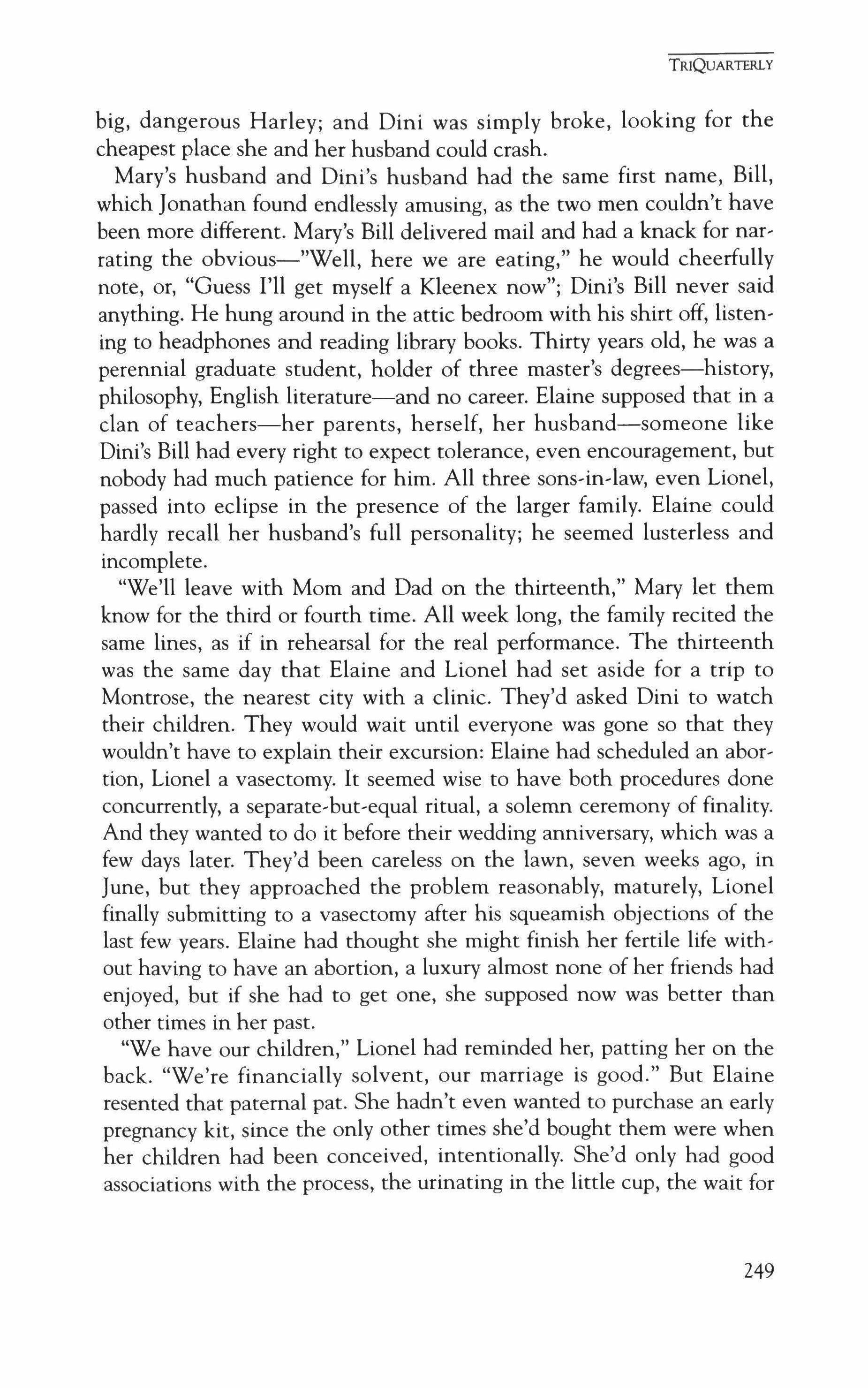
big, dangerous Harley; and Dini was simply broke, looking for the cheapest place she and her husband could crash.
Mary's husband and Dini's husband had the same first name, Bill, which Jonathan found endlessly amusing, as the two men couldn't have been more different. Mary's Bill delivered mail and had a knack for narrating the obvious-"Well, here we are eating," he would cheerfully note, or, "Guess I'll get myself a Kleenex now"; Dini's Bill never said anything. He hung around in the attic bedroom with his shirt off, listening to headphones and reading library books. Thirty years old, he was a perennial graduate student, holder of three master's degrees-history, philosophy, English literature-and no career. Elaine supposed that in a clan of teachers-her parents, herself, her husband-someone like Dim's Bill had every right to expect tolerance, even encouragement, but nobody had much patience for him. All three sons-in-law, even Lionel, passed into eclipse in the presence of the larger family. Elaine could hardly recall her husband's full personality; he seemed lusterless and incomplete.
"We'll leave with Mom and Dad on the thirteenth," Mary let them know for the third or fourth time. All week long, the family recited the same lines, as if in rehearsal for the real performance. The thirteenth was the same day that Elaine and Lionel had set aside for a trip to Montrose, the nearest city with a clinic. They'd asked Dini to watch their children. They would wait until everyone was gone so that they wouldn't have to explain their excursion: Elaine had scheduled an abortion, Lionel a vasectomy. It seemed wise to have both procedures done concurrently, a separate-but-equal ritual, a solemn ceremony of finality. And they wanted to do it before their wedding anniversary, which was a few days later. They'd been careless on the lawn, seven weeks ago, in June, but they approached the problem reasonably, maturely, Lionel finally submitting to a vasectomy after his squeamish objections of the last few years. Elaine had thought she might finish her fertile life without having to have an abortion, a luxury almost none of her friends had enjoyed, but if she had to get one, she supposed now was better than other times in her past.
"We have our children," Lionel had reminded her, patting her on the back. "We're financially solvent, our marriage is good." But Elaine resented that paternal pat. She hadn't even wanted to purchase an early pregnancy kit, since the only other times she'd bought them were when her children had been conceived, intentionally. She'd only had good associations with the process, the urinating in the little cup, the wait for
TRIQUARTERLY
249

a pink dipstick. Instead, she'd insisted on going to the Ouray ob-gyn, who only came around every Thursday, like the Book Mobile, and who had told her congratulations, she was expecting.
"Jonathan!" the children called now from their dark, makeshift beds. They preferred him; his tastes resembled their own. "Jonathan, tell us about Tommy Torso!" Elaine, who was dummy, leaned away from the bridge table to listen. Out of earshot of the other adults, Jonathan con, jured up Tommy Torso, the loathsome boy with no arms or legs, who propelled his skateboard with his big callused nose, a boy so gloriously ugly and unkind even his own mother didn't love him.
"We love him," the children swore. "We love Tommy Torso."
"Who will drive home?" Lionel asked on the evening of the twelfth. They were whispering in bed after many games of cribbage and bridge and charades. The children had stayed up late; popcorn had been popped, toddies poured, old record albums resurrected and played on the ancient player, Sam Hinton, Buffy Sainte-Marie, Glenn Miller.
"Afterwards, neither of us will be able to drive," Lionel said. They began laughing, covering their faces with pillows so that others wouldn't hear. It was hopelessly hysterical. Elaine had drunk more toddies than anyone else, just to keep her mood up. She didn't want to think about tomorrow. She didn't want to feel the way she felt: wrong, as usual.
"Dini will have to come with us," Lionel said.
"With the children? There won't be anyone here to watch the children if Dini drives."
"Except Bill."
"Right. Bill." They laughed more, until Elaine threatened to hyper' ventilate, to burst into tears. Her emotional state was an explosive cock, tail churning inside: hormones, guilt, liquor, fear.
"Bill could drive and Dini could stay here," Lionel suggested.
"I don't want Bill to drive. I think Bill is philosophically opposed to the automobile." Elaine noticed that she was having difficulty with philosophically so she repeated it-"philosophically, philosophically"until she didn't stumble.
"We'll have to all go together," Lionel said, pulling her close and fold, ing her in, damping down her restlessness. "An outing."
In the morning Elaine had a terrible headache even though she hadn't mixed alcohols, had stayed within a single family-the scotch one-the way she'd heard to do to avoid hangover. She felt betrayed. Downstairs,
TRIQUARTERLY
250
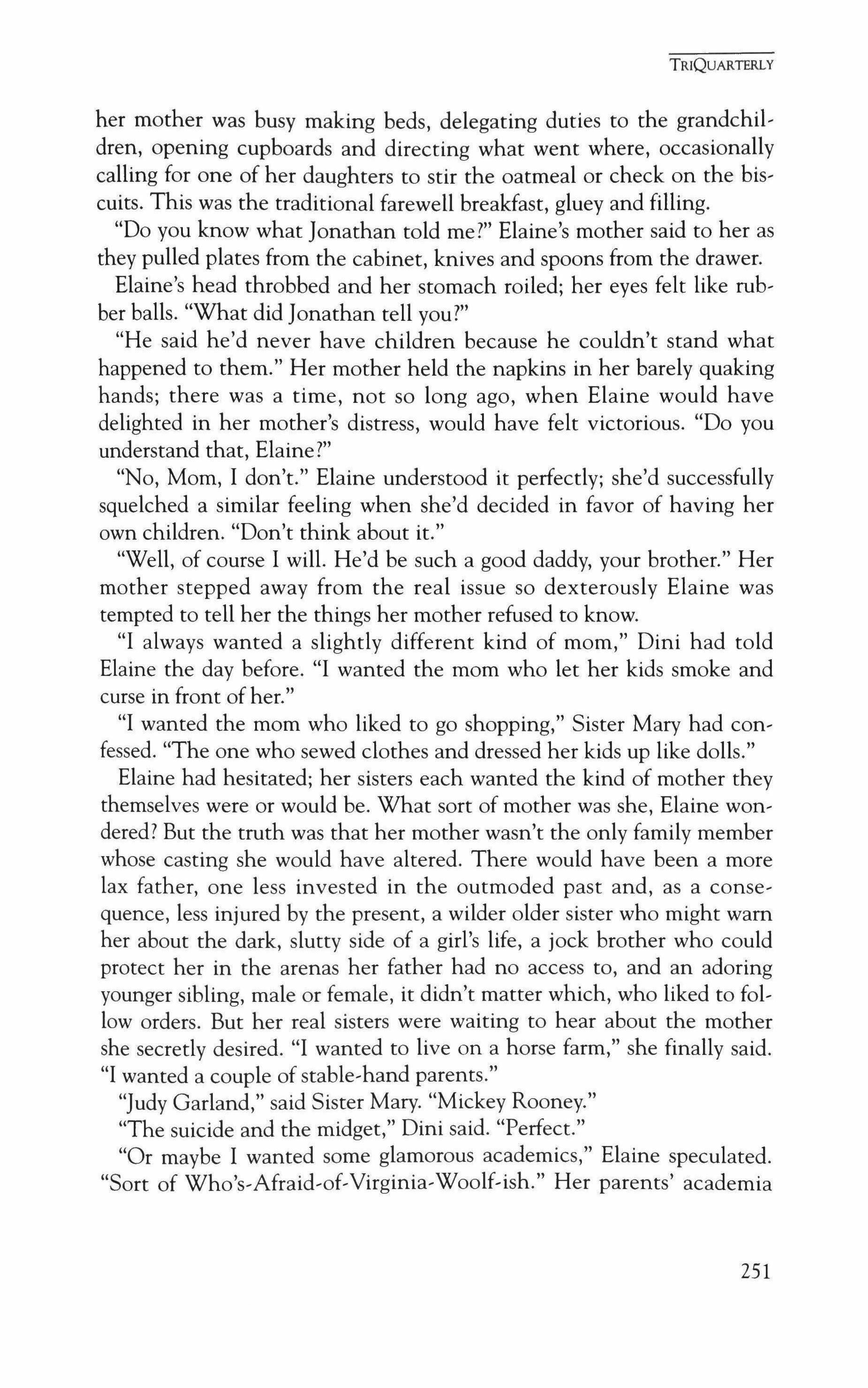
her mother was busy making beds, delegating duties to the grandchildren, opening cupboards and directing what went where, occasionally calling for one of her daughters to stir the oatmeal or check on the biscuits. This was the traditional farewell breakfast, gluey and filling.
"Do you know what Jonathan told me!" Elaine's mother said to her as they pulled plates from the cabinet, knives and spoons from the drawer.
Elaine's head throbbed and her stomach roiled; her eyes felt like rubber balls. "What did Jonathan tell you!"
"He said he'd never have children because he couldn't stand what happened to them." Her mother held the napkins in her barely quaking hands; there was a time, not so long ago, when Elaine would have delighted in her mother's distress, would have felt victorious. "Do you understand that, Elaine!"
"No, Mom, I don't." Elaine understood it perfectly; she'd successfully squelched a similar feeling when she'd decided in favor of having her own children. "Don't think about it."
"Well, of course I will. He'd be such a good daddy, your brother." Her mother stepped away from the real issue so dexterously Elaine was tempted to tell her the things her mother refused to know.
"I always wanted a slightly different kind of mom," Dini had told Elaine the day before. "I wanted the mom who let her kids smoke and curse in front of her."
"I wanted the mom who liked to go shopping," Sister Mary had confessed. "The one who sewed clothes and dressed her kids up like dolls."
Elaine had hesitated; her sisters each wanted the kind of mother they themselves were or would be. What sort of mother was she, Elaine wondered! But the truth was that her mother wasn't the only family member whose casting she would have altered. There would have been a more lax father, one less invested in the outmoded past and, as a consequence, less injured by the present, a wilder older sister who might warn her about the dark, slutty side of a girl's life, a jock brother who could protect her in the arenas her father had no access to, and an adoring younger sibling, male or female, it didn't matter which, who liked to follow orders. But her real sisters were waiting to hear about the mother she secretly desired. "I wanted to live on a horse farm," she finally said. "I wanted a couple of stable-hand parents."
"Judy Garland," said Sister Mary. "Mickey Rooney."
"The suicide and the midget," Dini said. "Perfect."
"Or maybe I wanted some glamorous academics," Elaine speculated. "Sort of Who's-Afraid-of-Virginia-Woolf-ish." Her parents' academia
TRIQUARTERLY
251

was not Ivy League but of a commuter-college variety.
"Goodbye, goodbye," Elaine's children called to the family as the cars pulled away, caravan-style, Jonathan's roaring motorcycle in the lead, his bandana a receding flash of red.
"I want a motorcycle," Elaine's son said, bursting into tears. "You wouldn't let me get even one ride!" he accused Elaine.
"I miss my grandma," said the three-year-old, also beginning to sob.
Everyone felt tragic; disbanding made them think of death, Elaine supposed, its chilly guarantee falling now like a vapor.
"Who wants to go on a trip?" Lionel finally asked, clapping his hands together to dispel the fog, to inspire levity.
In the car, the little girl began her babble. "Snapper snapper, get me out of here!, thank you sir, here's your bumbershoot." To everything, she responded with this stuff.
"Is she normal!" Dini asked.
"Of course," said Lionel. "They all do this."
"Dad called her a whippersnapper, I think," Elaine told Dini, who was driving in order to get a feel for the big, strange family vehicle Elaine and Lionel owned. They kept lurching; Dini kept blaming the car.
"Grandpa said I had a big head," the boy put in.
Dini jumped at this, accelerating around a curve and sending every' one leaning left. "Here Dad goes, insulting the next generation. No wonder we all have inferiority complexes-he bagged on us constantly."
Elaine was tired of defending her parents; in her opinion they all had superiority complexes, anyway. She had nothing to say; neither did her husband, who was thinking about surgery on his testicles. Finally Elaine said to her son, "Honey, you do have a big head. And I should know, since I gave birth to you."
Dini groaned at the thought of giving birth.
"This whole pregnancy thing sucks," she said.
"They hate it when you say 'suck,'" Elaine told her. "Watch Mom's face next time. She kind of cringes."
"You think I don't know that?" Dini asked. "You think I don't know every little thing that pisses them off?"
"I'm carsick," the boy said after a while.
"Close your eyes."
"Open the window."
"Give him water."
"Bumbershoot, bumbershoot," said the girl. "Toochi, toochi, I have a tail."
TRIQUARTERLY
252

"Jonathan would think our trip was funny," Dini told them. "Irony, irony, irony." Outside, Ralph Lauren's ranch went by; a moment later, there he was, jogging on the highway, surprisingly short. "Jonathan calls him the wee haberdasher," Dini said. "He's got a ranch the size of Idaho and he jogs on the highway. What a dope."
"Haberdasher," said the girl. "Haberdasher."
"What's irony?" the boy asked.
"For the clothes," said the girl. "With a board and the iron." She slid her pudgy palm along the front of her car seat to illustrate. "I want Jonathan," she said sadly. "Where is Jonathan?"
"Mama and Daddy are going to the doctor," Elaine told her children at the hospital parking lot. "You guys get to see Seven Dwarfs with Aunt Dini."
"Seven Dwarfs, Seven Dwarfs!" shouted the girl. "You hear that, Sammy? Seven Dwarfs."
"I don't want to go with Dini," the boy said in a voice Elaine recognized as provocative, probing. "I already saw Snow White." He needed his parents' attention; something was going on and he knew it and he wanted someone to say so.
"You can wait in the waiting room," Elaine said. "But it's deadly dull, and little Beanhead here will be a pest. She'll eat cigarette butts and bother people."
Lionel, slow to recognize Elaine's strategy, pleaded, "Just go with Dini, Sam. Do what we ask, please." Lionel had been an only child. He had no idea how a real family worked.
"I don't want to," Sam declared.
"So he stays here," Elaine said, opening her car door and hopping out. Her nausea stirred up again like a flashback, like nostalgia. "Just don't complain later when you missed the movie and the Skittles and the popcorn and the Coke. Then it'll be too late." She wished her sister would step in and make a bid for Sam, cheerlead for her own funness, but Dini clearly felt her feelings had been hurt and was sulking.
"I'll go," Sam finally said, twisting his face from his mother's kiss.
Dini drove off with them, squealing around the comer.
Elaine watched the backs of her children's heads disappear. She said, "She's not taking them to see dwarfs; she's taking them to something rated R." Anger swelled in her like a balloon.
"She wouldn't do that," Lionel said.
"Of course she would." But Elaine laughed; there was satisfaction in
TRIQUARTERLY
253

knowing something so surely.
"Later, alligator," Lionel told her at admissions, pinching her soft bottom. She didn't want to be touched, right now, especially on the bottom. "Don't be scared," he added.
"Yeah yeah yeah," she said.
"Nobody who performs vasectomies should be named Dr. Dick," Lionel said on the way home.
Dini said, "My ob-gyn always tells the same joke: at your cervix."
"You're sitting in the wah-wah seat," said the boy to his sister.
"Am not!"
"The wah-wah seat."
It was a customary car argument.
Though he claimed not to be tired, Lionel fell asleep first on the trip back, his hands cupped chastely on his lap, protecting the remainder of his tender bunch of genitalia. Then the girl closed her eyes, and then Elaine dropped off, drugged, dreaming of Rvrated chase scenes and her brother's dead friends. Having foreseen general sleepiness, Elaine had arranged Sam in the front seat beside Dini, to keep her company. But even reliable, vigilant Sam could not resist shutting his eyes, and soon lay his sweaty head on Dint's shoulder so that steering was difficult.
While Elaine's little brood slept, Dini drove eighty miles an hour atop the dangerous cliffs.
At the dark summer house, she braked before pulling into the driveway just to stare at the familiar face the door and windows made, the porch slats like a broad, wicked smile in the cold street light. Bats flew crazily, as if someone were throwing them around. Her Bill seemed to have gone out, not bothering to leave on a lamp for their homecoming.
In that second Dini let herself feel utterly sorry for herself, let self-pity collapse around her like a smelly tent. Her life wasn't going to be anything like her parents'; it wasn't even going to be like her sisters'. It was going to be a lot harder. She allowed a tear or two to leak down her face; she prodded her own belly until her baby woke up and rolled over. Then she recovered and turned off the engine, opening her door to fill the car with bright light and a harassing metronomic beeping.
"Home," she told her passengers.
On the answering machine were messages from Mary and their mother: everyone had arrived safely from their day on the road. "It was a heck of a trip," Sister Mary's cheery voice admitted, "but we made it, of course."
TRIQUARTERLY
254
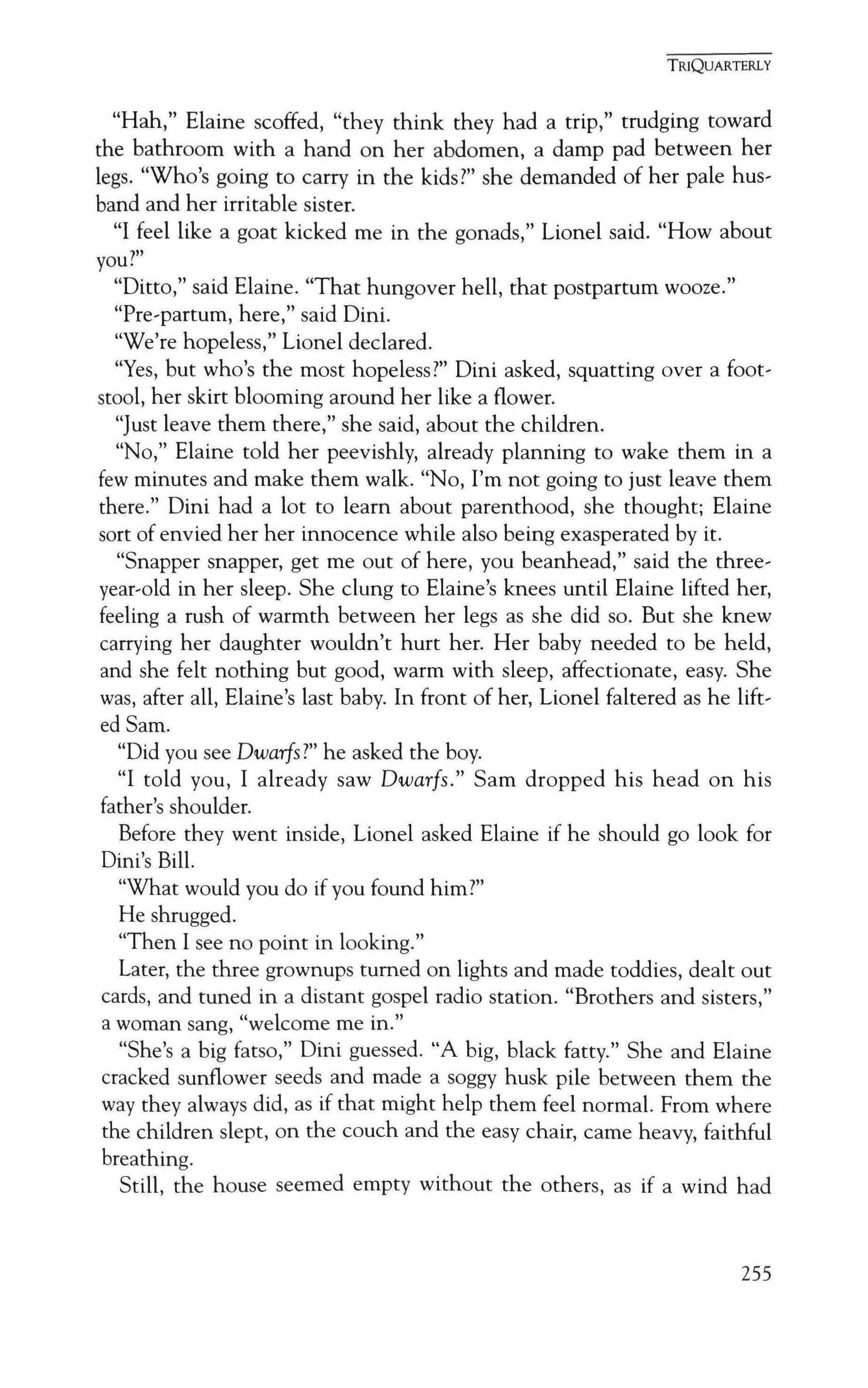
"Hah," Elaine scoffed, "they think they had a trip," trudging toward the bathroom with a hand on her abdomen, a damp pad between her legs. "Who's going to carry in the kids?" she demanded of her pale husband and her irritable sister.
"I feel like a goat kicked me in the gonads," Lionel said. "How about you?"
"Ditto," said Elaine. "That hungover hell, that postpartum wooze."
"Pre-partum, here," said Dini.
"We're hopeless," Lionel declared.
"Yes, but who's the most hopeless?" Dini asked, squatting over a footstool, her skirt blooming around her like a flower.
"Just leave them there," she said, about the children.
"No," Elaine told her peevishly, already planning to wake them in a few minutes and make them walk. "No, I'm not going to just leave them there." Dini had a lot to learn about parenthood, she thought; Elaine sort of envied her her innocence while also being exasperated by it.
"Snapper snapper, get me out of here, you beanhead," said the threeyear-old in her sleep. She clung to Elaine's knees until Elaine lifted her, feeling a rush of warmth between her legs as she did so. But she knew carrying her daughter wouldn't hurt her. Her baby needed to be held, and she felt nothing but good, warm with sleep, affectionate, easy. She was, after all, Elaine's last baby. In front of her, Lionel faltered as he liftedSam.
"Did you see Dwarfs?" he asked the boy.
"I told you, I already saw Dwarfs." Sam dropped his head on his father's shoulder.
Before they went inside, Lionel asked Elaine if he should go look for Dini's Bill.
"What would you do if you found him?"
He shrugged.
"Then I see no point in looking."
Later, the three grownups turned on lights and made toddies, dealt out cards, and tuned in a distant gospel radio station. "Brothers and sisters," a woman sang, "welcome me in."
"She's a big fatso," Dini guessed. "A big, black fatty." She and Elaine cracked sunflower seeds and made a soggy husk pile between them the way they always did, as if that might help them feel normal. From where the children slept, on the couch and the easy chair, came heavy, faithful breathing.
Still, the house seemed empty without the others, as if a wind had
TRIQUARTERLY
255
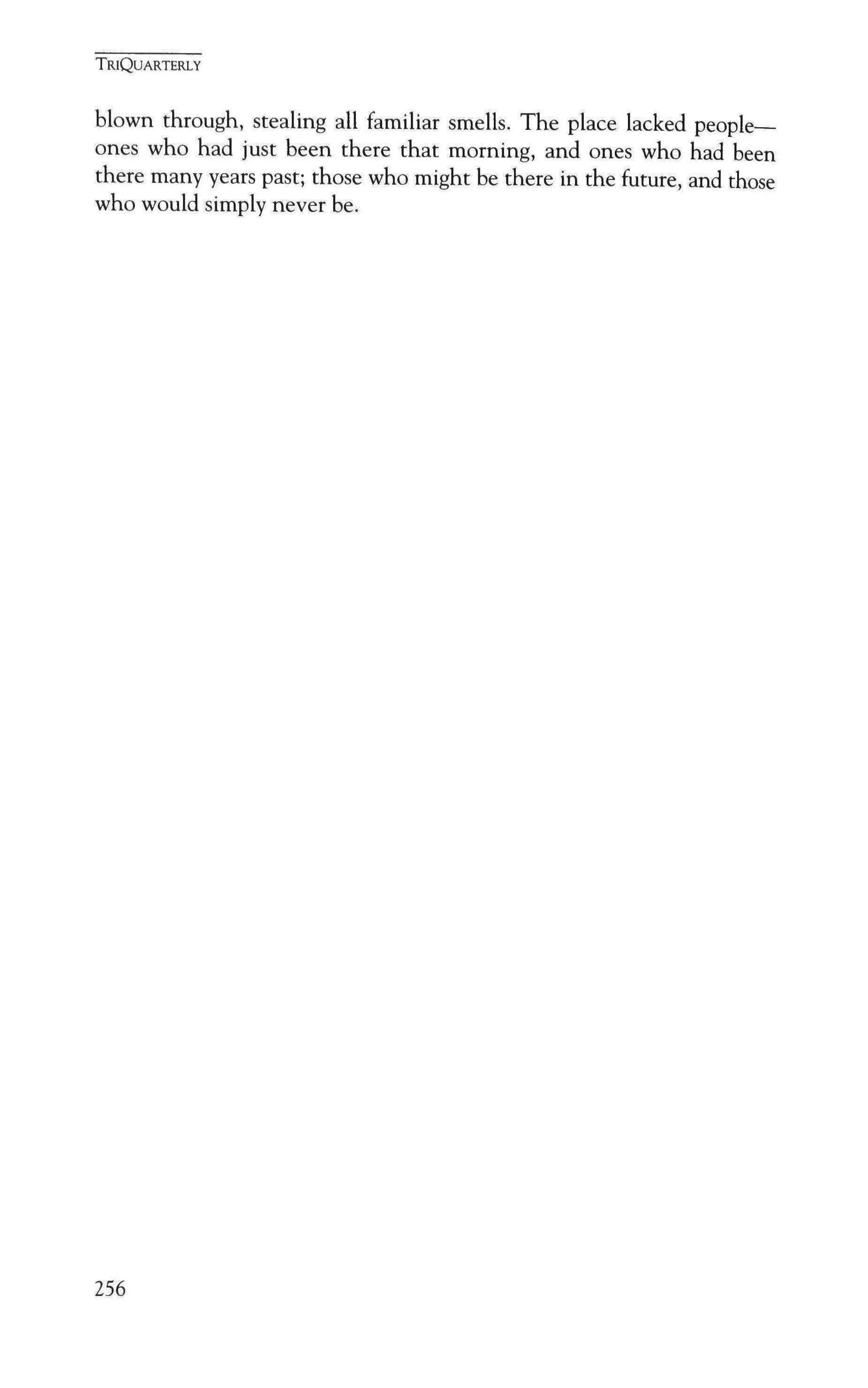
blown through, stealing all familiar smells. The place lacked peopleones who had just been there that morning, and ones who had been there many years past; those who might be there in the future, and those who would simply never be.
TRIQUARTERLY
256
Contributors
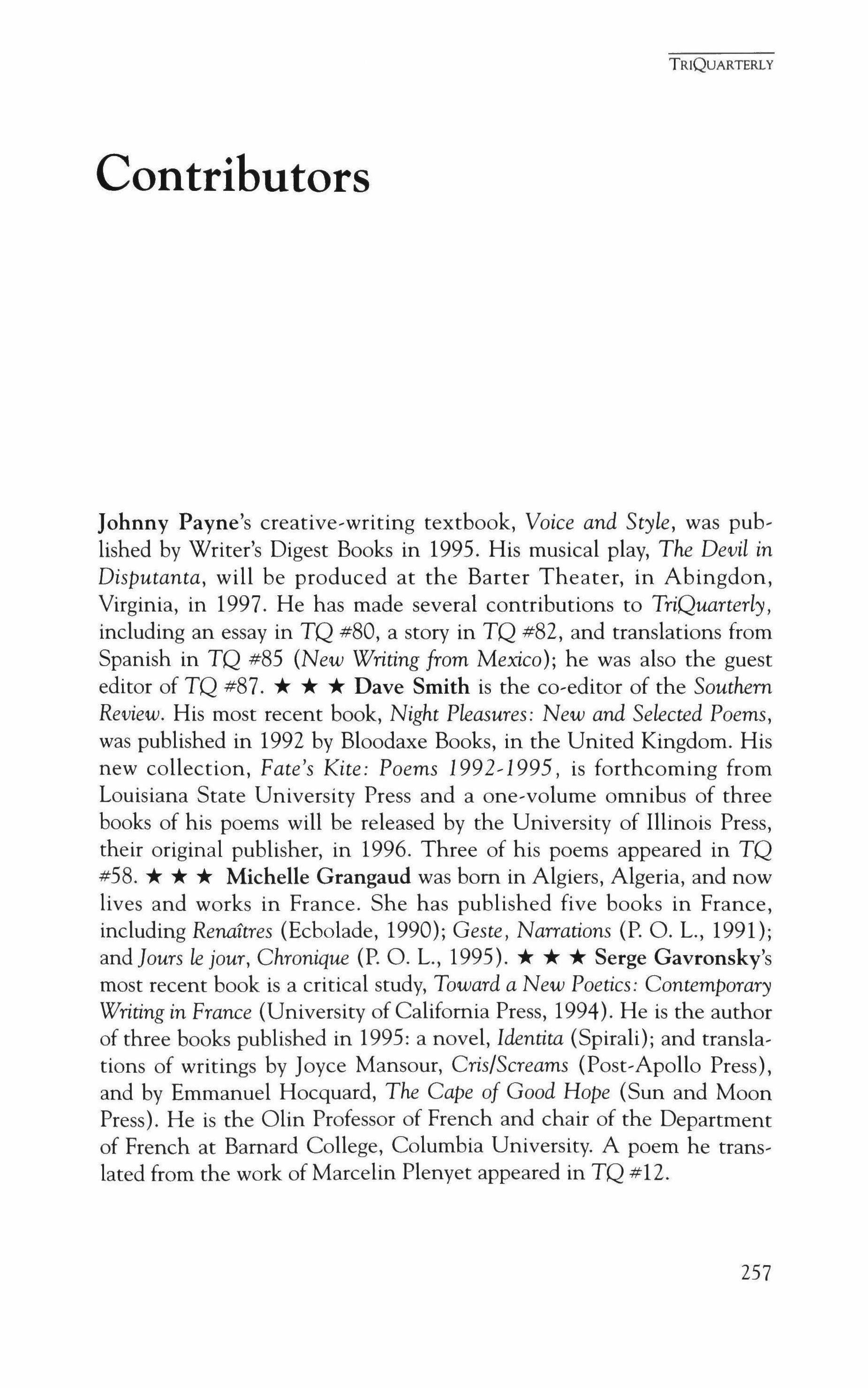
Johnny Payne's creative-writing textbook, Voice and Style, was published by Writer's Digest Books in 1995. His musical play, The Devil in Disputanta, will be produced at the Barter Theater, in Abingdon, Virginia, in 1997. He has made several contributions to TriQuarterly, including an essay in TQ #80, a story in TQ #82, and translations from Spanish in TQ #85 (New Writing from Mexico); he was also the guest editor of TQ #87. * * * Dave Smith is the co-editor of the Southern Review. His most recent book, Night Pleasures: New and Selected Poems, was published in 1992 by Bloodaxe Books, in the United Kingdom. His new collection, Fate's Kite: Poems 1992-1995, is forthcoming from Louisiana State University Press and a one-volume omnibus of three books of his poems will be released by the University of Illinois Press, their original publisher, in 1996. Three of his poems appeared in TQ #58. * * * Michelle Grangaud was born in Algiers, Algeria, and now lives and works in France. She has published five books in France, including Renaftres (Ecbolade, 1990); Geste, Narrations (P. O. L., 1991); and lours le jour, Chronique (P. o. L., 1995). * * * Serge Gavronsky's most recent book is a critical study, Toward a New Poetics: Contemporary Writing in France (University of California Press, 1994). He is the author of three books published in 1995: a novel, ldentita (Spirali): and translations of writings by Joyce Mansour, Cris/Screams (Post-Apollo Press), and by Emmanuel Hocquard, The Cape of Good Hope (Sun and Moon Press). He is the Olin Professor of French and chair of the Department of French at Barnard College, Columbia University. A poem he translated from the work of Marcelin Plenyet appeared in TQ #12. 257
TRIQUARTERLY
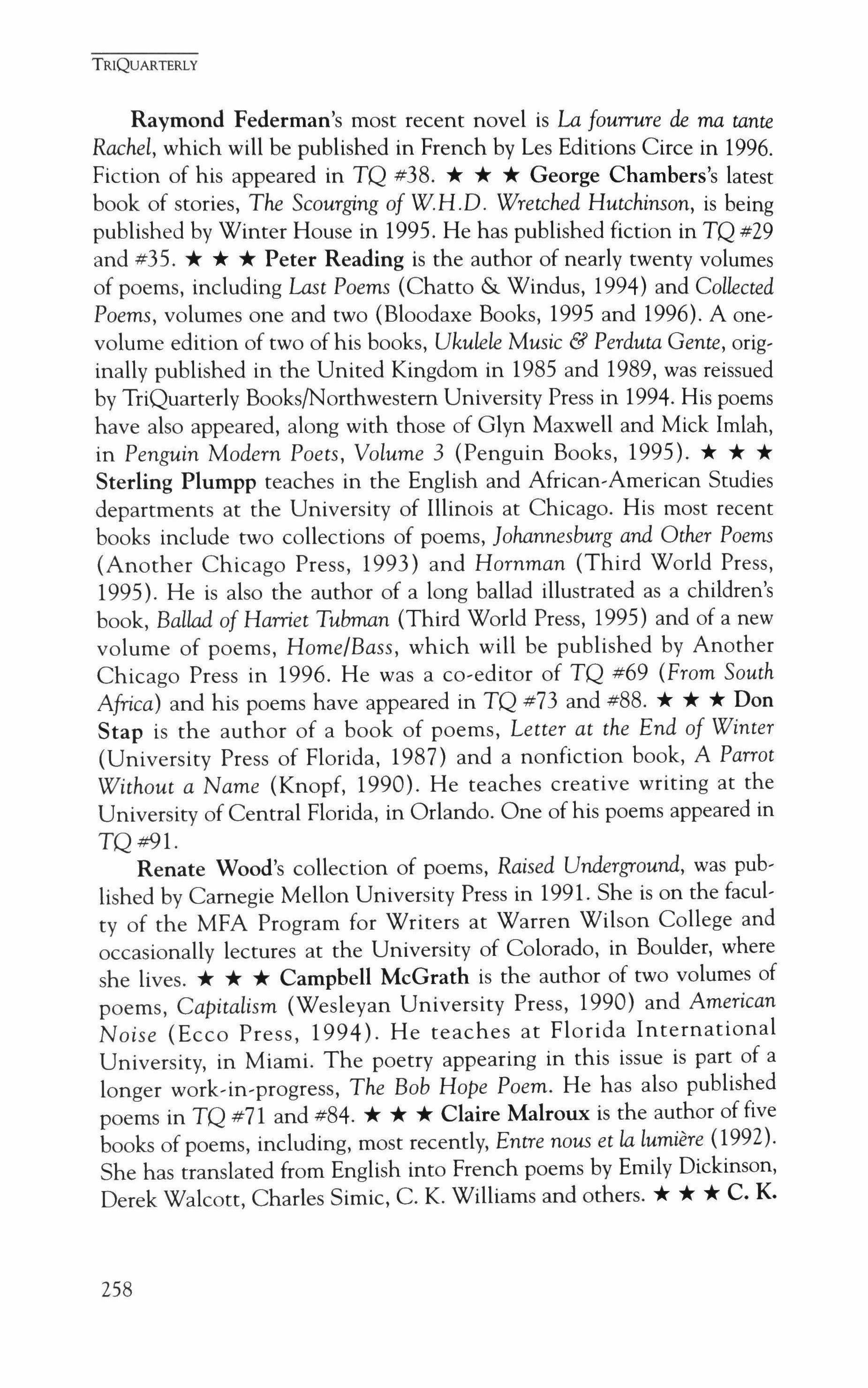
Raymond Federman's most recent novel is La fourrure de rna tante Rachel, which will be published in French by Les Editions Circe in 1996. Fiction of his appeared in TQ #38. * * * George Chambers's latest book of stories, The Scourging of WH.D. Wretched Hutchinson, is being published by Winter House in 1995. He has published fiction in TQ #29 and #35. * * * Peter Reading is the author of nearly twenty volumes of poems, including Last Poems (Chatto & Windus, 1994) and Collected Poems, volumes one and two (Bloodaxe Books, 1995 and 1996). A onevolume edition of two of his books, Ukulele Music & Perduta Gente, originally published in the United Kingdom in 1985 and 1989, was reissued by TriQuarterly Books/Northwestern University Press in 1994. His poems have also appeared, along with those of Glyn Maxwell and Mick Imlah, in Penguin Modern Poets, Volume 3 (Penguin Books, 1995). * * *
Sterling Plumpp teaches in the English and African-American Studies departments at the University of Illinois at Chicago. His most recent books include two collections of poems, Johannesburg and Other Poems (Another Chicago Press, 1993) and Hornman (Third World Press, 1995). He is also the author of a long ballad illustrated as a children's book, Ballad of Harriet Tubman (Third World Press, 1995) and of a new volume of poems, Home/Bass, which will be published by Another Chicago Press in 1996. He was a co-editor of TQ #69 (From South Africa) and his poems have appeared in TQ #73 and #88. * * * Don Stap is the author of a book of poems, Letter at the End of Winter (University Press of Florida, 1987) and a nonfiction book, A Parrot Without a Name (Knopf, 1990). He teaches creative writing at the University of Central Florida, in Orlando. One of his poems appeared in TQ #91.
Renate Wood's collection of poems, Raised Underground, was published by Carnegie Mellon University Press in 1991. She is on the faculty of the MFA Program for Writers at Warren Wilson College and occasionally lectures at the University of Colorado, in Boulder, where she lives. * * * Campbell McGrath is the author of two volumes of poems, Capitalism (Wesleyan University Press, 1990) and American Noise (Ecco Press, 1994). He teaches at Florida International University, in Miami. The poetry appearing in this issue is part of a longer work-in-progress, The Bob Hope Poem. He has also published poems in TQ #71 and #84. * * * Claire Malroux is the author of five books of poems, including, most recently, Entre nous et la lumiere (1992). She has translated from English into French poems by Emily Dickinson, Derek Walcott, Charles Sirnic, C. K. Williams and others. * * * c. K.
TRIQUARTERLY
258

Williams's volume of Selected Poems was published by Farrar Straus & Giroux in 1994, as was the translation, on which he collaborated with John Montague and Margaret Guiton, of The Selected Poems of Francis Ponge (edited by Margaret Guiton; Wake Forest University Press, 1994). Williams was a participant in the symposium, The Writer in Our World (TQ #65), and has been a frequent contributor to TQ of poems and essays, most recently in TQ #83.
Dan Chaon's first book, Fitting Ends and Other Stories is being published by TriQuarterly Books/Northwestern University Press this fall. His stories have appeared in TQ #68, #76 and #90 and in other journals, including Ploughshares, Story and American Short Fiction. He teaches at Ohio University. * * * John Stewart is an anthropologist and writer whose special interest is narrative ethnography. His publications include Drinkers, Drummers, and Decent Folk (SUNY Press, 1989). He is the director of the African American and African Studies Program at the University of California, Davis. A story of his appeared in TQ #58.
* * * Jayanta Mahapatra is both a poet and a scientist, having been a lecturer and a reader in physics in India for several years. He is the author of more than a dozen books of poems, including A Rain of Rites (University of Georgia Press, 1976), Relationship (Greenfield Review Press, 1980), Selected Poems (Oxford University Press, 1987), and Burden of Waves and Fruit (Three Continents Press, 1988). His most recent publications in India are A Whiteness of Bone (Penguin-Viking, 1992) and Bali (Vidyapuri, 1993). He is the poetry editor for the Telegraph, in Calcutta. * * * Reginald Shepherd's first book of poems, Some Are Drowning, received the Associated Writing Programs' Award in Poetry in 1993 and was published by the University of Pittsburgh Press the following year. The poems in this issue will appear in his second collection, Angel, Interrupted, which will be published by the University of Pittsburgh Press in 1996.
Jose Emilio Pacheco is considered, with Octavio Paz, to be one of the two most important living poets in Mexico. His books translated into English include Don't Ask Me How the Time Goes By: Poems, translated by Alastair Reid (Columbia University Press, 1978); Selected Poems, edited by George McWhirter (New Directions, 1987); Battles in the Desert and Other Stories, translated by Katherine Silver (New Directions, 1987); and An Ark for the Next Millennium: Poems, selected by Jorge Esquinca (University of Texas Press, 1993). The poems appearing in this issue were published originally in Ciudad de la memoria (Ediciones Era, 1989). A new collection of his poems, El silencio de la 259
TRIQUARTERLY
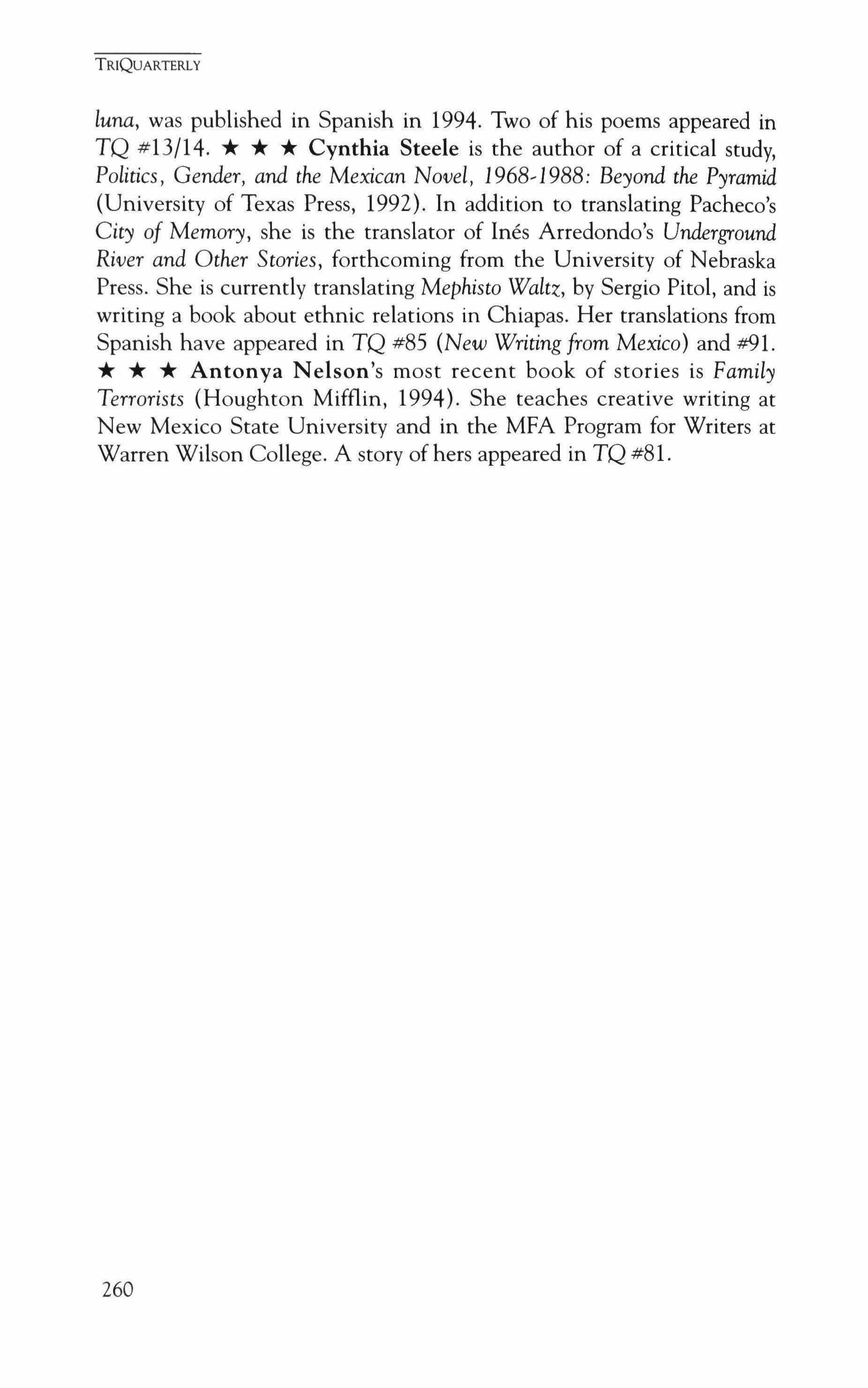
luna, was published in Spanish in 1994. Two of his poems appeared in TQ #13/14. * * * Cynthia Steele is the author of a critical study, Politics, Gender, and the Mexican Novel, 1968,1988: Beyond the Pyramid (University of Texas Press, 1992). In addition to translating Pacheco's City of Memory, she is the translator of Ines Arredondo's Underground River and Other Stories, forthcoming from the University of Nebraska Press. She is currently translating Mephisto Waltz, by Sergio Pitol, and is writing a book about ethnic relations in Chiapas. Her translations from Spanish have appeared in TQ #85 (New Writing from Mexico) and #91.
* * * Antonya Nelson's most recent book of stories is Family Terrorists (Houghton Mifflin, 1994). She teaches creative writing at New Mexico State University and in the MFA Program for Writers at Warren Wilson College. A story of hers appeared in TQ #81.
TRIQUARTERLY
260
the Denver Quarterly
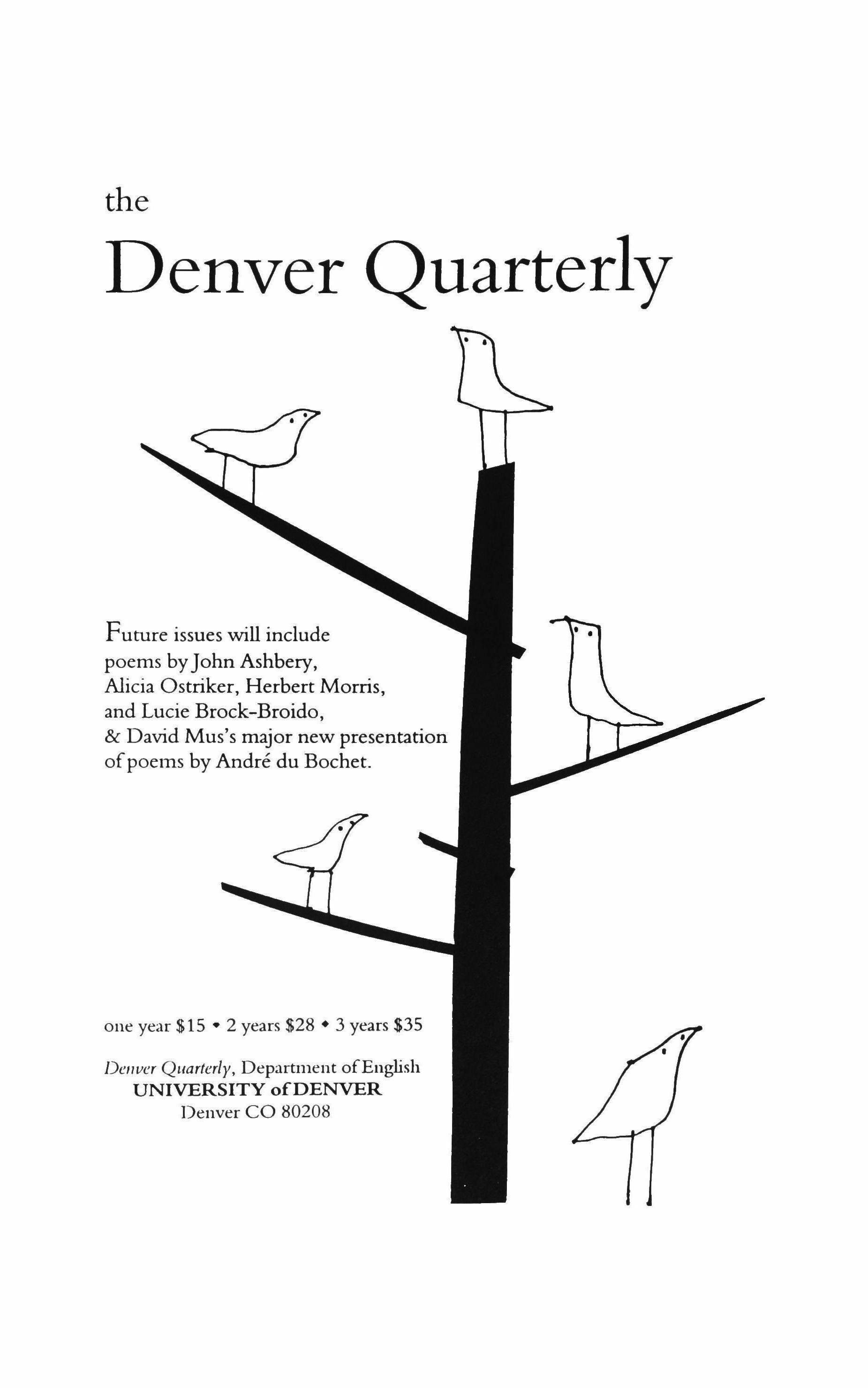
Future issues will include poems byJohn Ashbery, Alicia Ostriker, Herbert Morris, and Lucie Brock-Broido, & David Mus's major new presentation ofpoems by Andre du Bochet.
Deliver
English UNIVERSITY ofDENVER Denver CO 80208
Quarterly, Department of
one year $15 2 years $28 3 years $35

Stanley
Linda
Joyce
Sharon
Grace
Reynolds
luis
Gary
Paul
Tobias
Fiction Poetry Art • Criticism Rene Arceo: Mujeres guatema/tecas/From TQ '86 "Perhaps the preeminent journal for literary fiction" [New York Times], TriQuarterly also publishes poetry, translations and graphic art of rare and consistent excellence. Set apart from the predictable, the established and the commonplace, TriQuarterly is a magazine of literary exploration and discoveryalways lively, serious and varied. Subscribe now! $24/year $44/2 years 2020 Ridge Avenue Evanston, IL 60208 CALL TOLL-FREE 800/832-3615 • SOME RECENT CONTRIBUTORS Cyrus Colter W. S. Di Piero Rita Dove
Dybek
TriV2(UJ@l[fQCE?[J�y
Stuart
Elkin
Kumin
Maxine
McCarriston
Carol Oates
Olds
Paley
Price
J. Rodriguez
Snyder
West
K. Williams
C.
Wolff and many new voices • •
DONALD HALL
bell hooks
MICHAEL DORRIS
ROBERT PINSKY
MARTHA NUSSBAUM
RACHEL HADAS
MICHAEL WALZER
CORNEL WEST

Celebrate our 20th anniversary - become a subscriber and a friend of your choice will receive a free subscription.
YOUR NAME
ADDRESS
FRIEND'S NAME
FRIEND'S ADDRESS
Please mail your check for $15 (1 year, 6 issues), or $30 (2 years, 12 issues) to: Boston Review, E53-407, MIT, Cambridge, MA 02139
Boston Review
Black Warrior Review
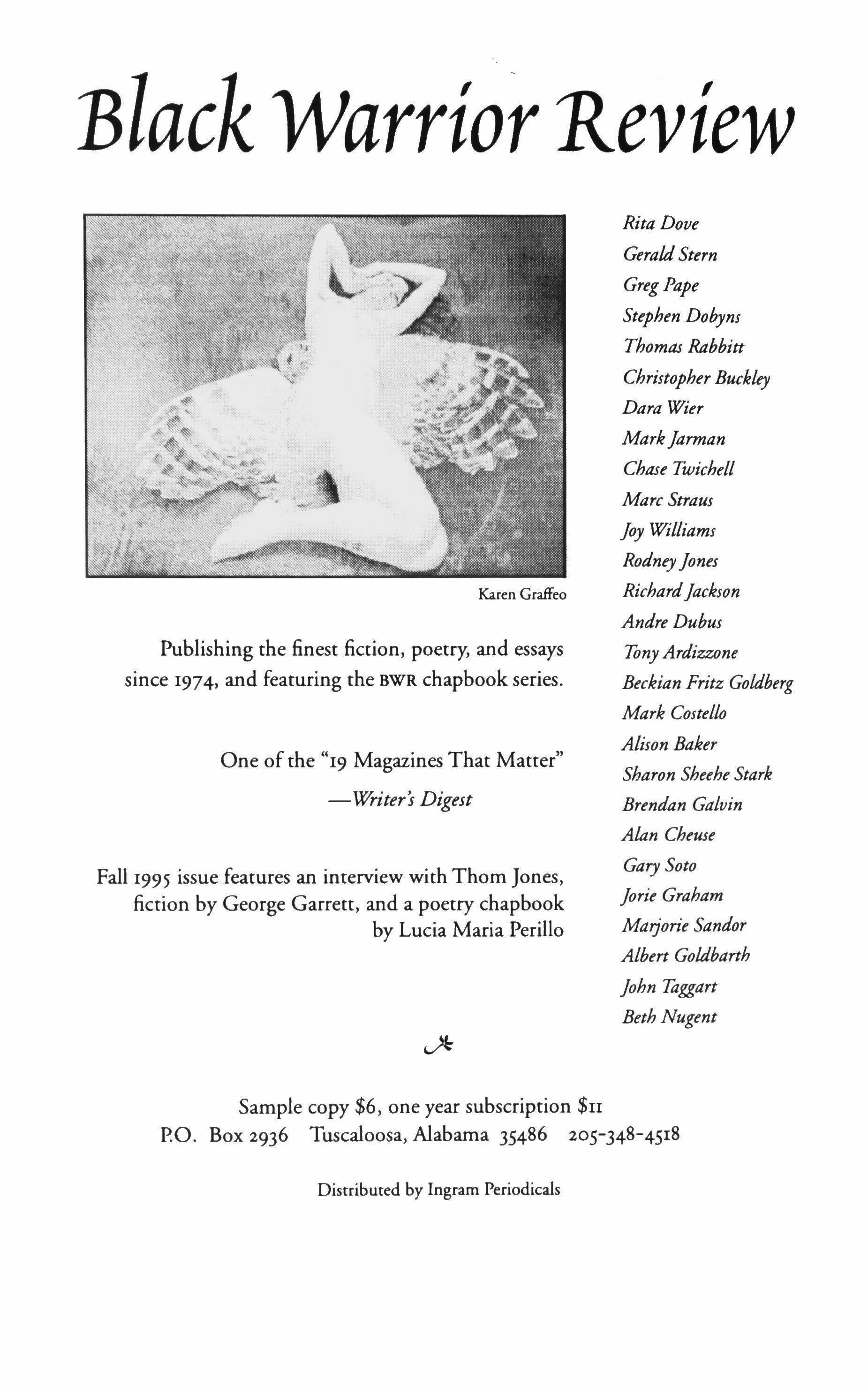
Publishing the finest fiction, poetry, and essays since 1974, and featuring the BWR chapbook series.
One of the "19 Magazines That Matter" - Writers Digest
Fall 1995 issue features an interview with Thorn Jones, fiction by George Garrett, and a poetry chapbook by Lucia Maria Perillo
Rita Dove
Gerald Stern
GregPape
Stephen Dobyns
Thomas Rabbitt
ChristopherBuckley
Dara Wier
Markfarman
Chase Twichell
Marc Straus
Joy Williams
RodneyJones
RichardJackson
Andre Dubus
Tony Ardizzone
Beckian Fritz Goldberg
Mark Costello
Alison Baker
Sharon Sbeebe Stark
Brendan Galvin
Alan Cheuse
Gary Soto
forie Graham
Marjorie Sandor
Albert Goldbarth
John Taggart
Beth Nugent
Sample copy $6, one year subscription $11 P.O. Box 2936 Tuscaloosa, Alabama 35486 205-348-4518
Karen Graffeo
Distributed by Ingram Periodicals
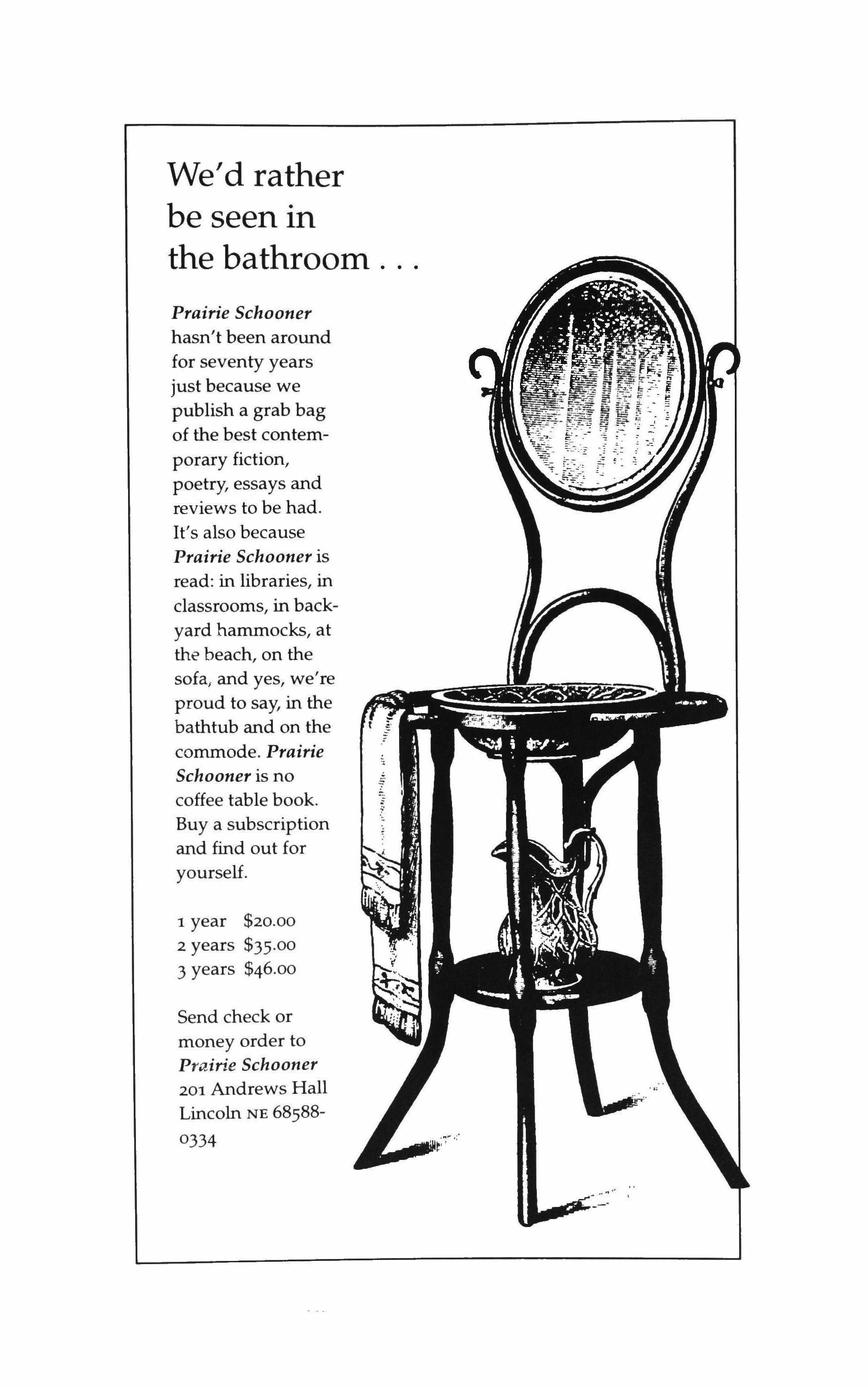
We'd rather be seen in the bathroom
Prairie Schooner hasn't been around for seventy years just because we publish a grab bag of the best contemporary fiction, poetry, essays and reviews to be had. It's also because Prairie Schooner is read: in libraries, in classrooms, in backyard hammocks, at the beach, on the sofa, and yes, we're proud to say, in the bathtub and on the commode. Prairie Schooner is no coffee table book.
Buy a subscription and find out for yourself.
1 year $20.00
2 years $35.00
3 years $46.00
Send check or money order to Prairie Schooner
201 Andrews Hall Lincoln NE 685880334
Where
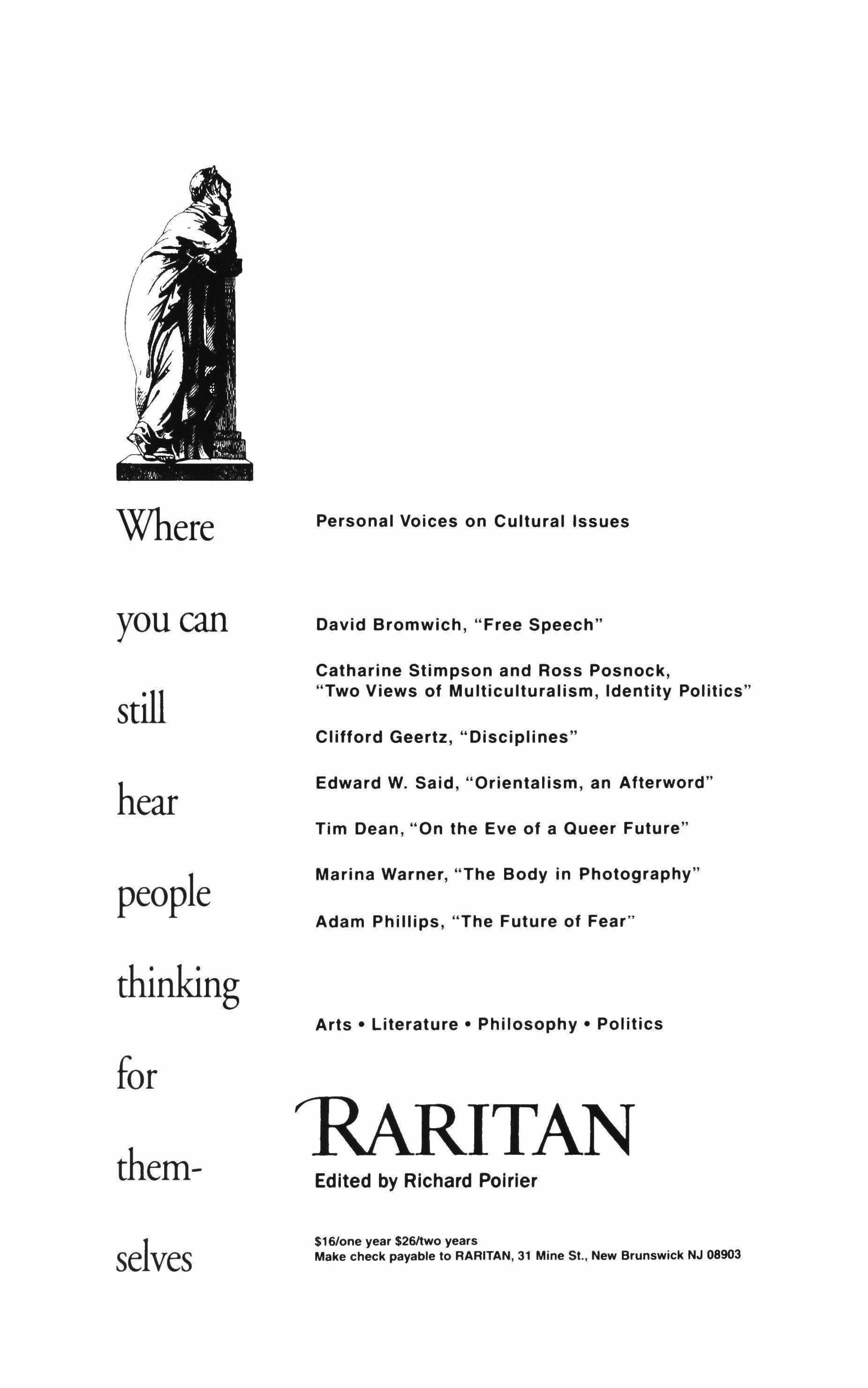
Personal Voices on Cultural Issues
you can still hear people thinking for themselves
David Bromwich, "Free Speech"
Catharine Stimpson and Ross Posnock, "Two Views of Multiculturalism, Identity Politics"
Clifford Geertz, "Disciplines"
Edward W. Said, "Orientalism, an Afterword"
Tim Dean, "On the Eve of a Queer Future"
Marina Warner, "The Body in Photography"
Adam Phillips, "The Future of Fear"
Arts Literature Philosophy Politics
�RITAN
Edited by Richard Poirier
$161one year $26ltwo years Make check payable to RARITAN, 31 Mine St., New Brunswick NJ 08903
What is THE THREEPENNY REVIEW?
� ITS WRITERS:
John Berger, Paul Bowles, Lars Eighner, Louise Gluck, Nadine Gordimer, Thorn Gunn, Elizabeth Hardwick, Diane Johnson, Tony Kushner, Leonard Michaels, Czeslaw Milosz, Robert Pinsky, Luc Sante, Vikram Seth, Susan Sontag, Amy Tan, Gore Vidal...
� ITS READERS:
"The Threepenny Review continues to be one of the brightest, liveliest, most intelligent and culturally alert journals in the country. It's one of the very few magazines that give one the feeling that there really is a conversation going on in this country about the arts and about ideas. I always read it with pleasure."
-Robert Hass
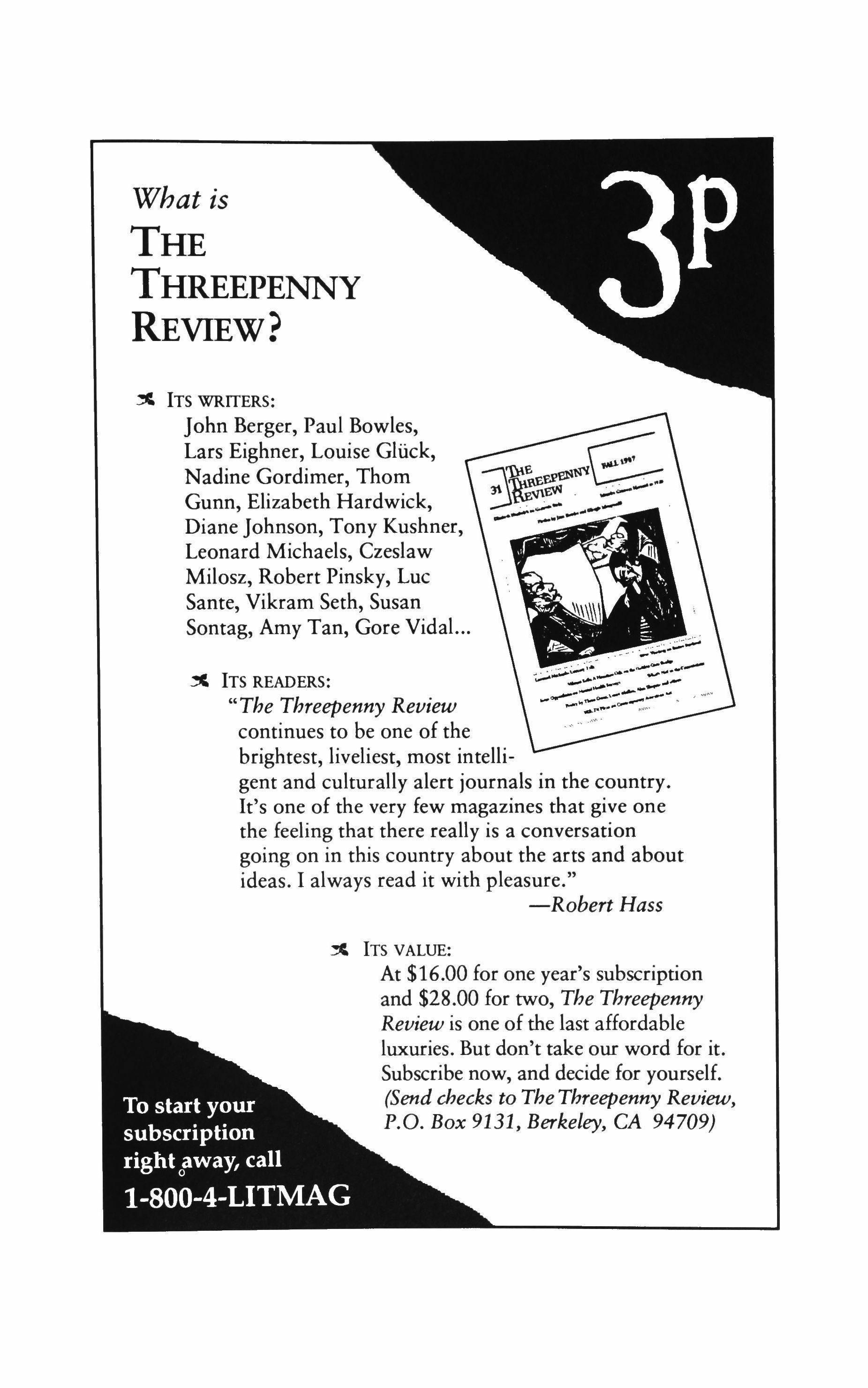
� ITS VALUE:
At $16.00 for one year's subscription and $28.00 for two, The Threepenny Review is one of the last affordable luxuries. But don't take our word for it. Subscribe now, and decide for yourself.
(Send checks to The Threepenny Review, P.O. Box 9131, Berkeley, CA 94709)
To start your subscription right�waYI call 1-800-4-LITMAG
EPOCH
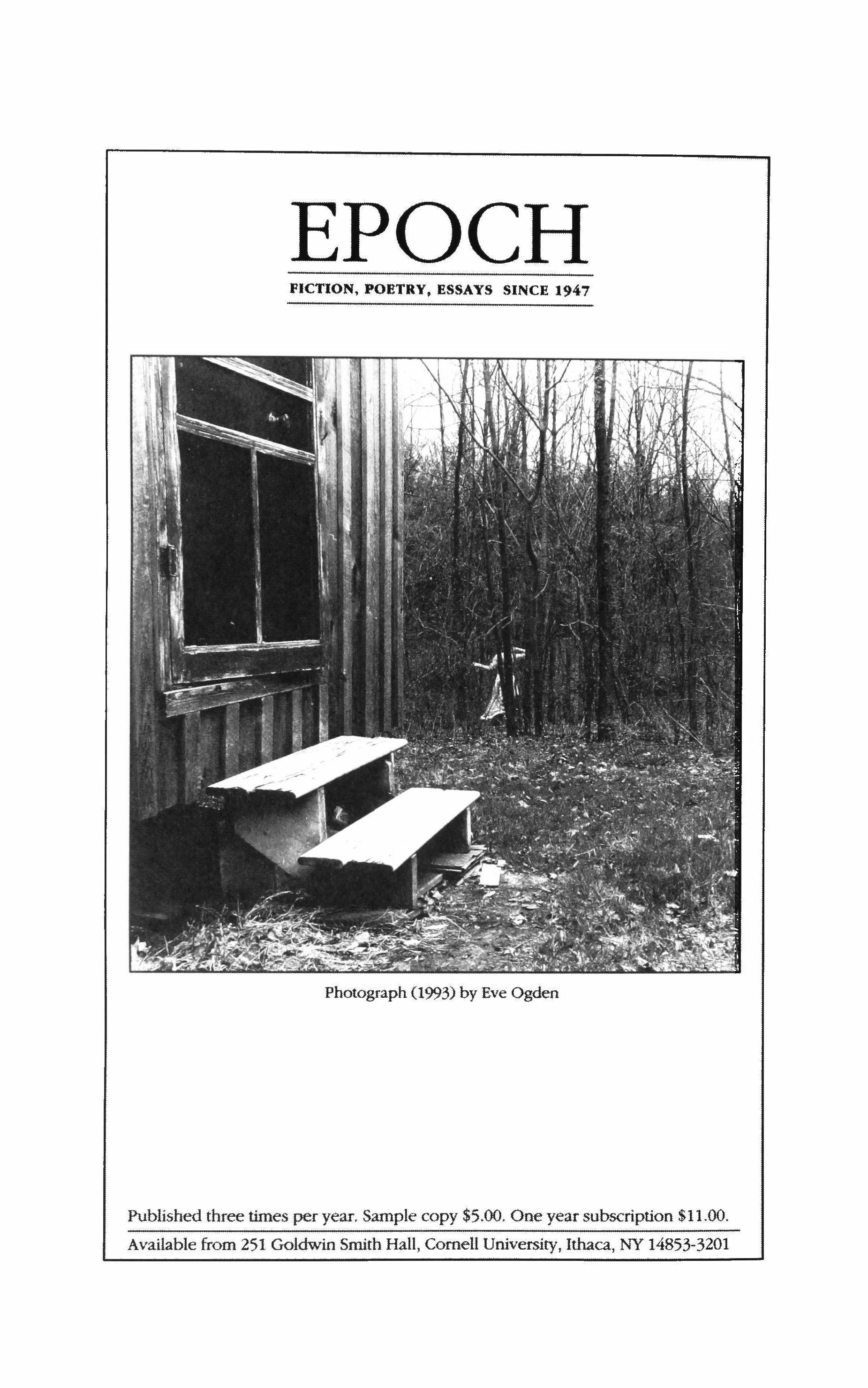
Published three times per year. Sample copy $5.00. One year subscription $11.00.
Available from 251 Goldwin Smith Hall, Cornell University, Ithaca, NY 14853-3201
FICTION, POETRY, ESSAYS SINCE 1947
Photograph (1993) by Eve Ogden
POETRY
FOUNDED IN 1912 BY HARRIET
MONROE
continues to make history
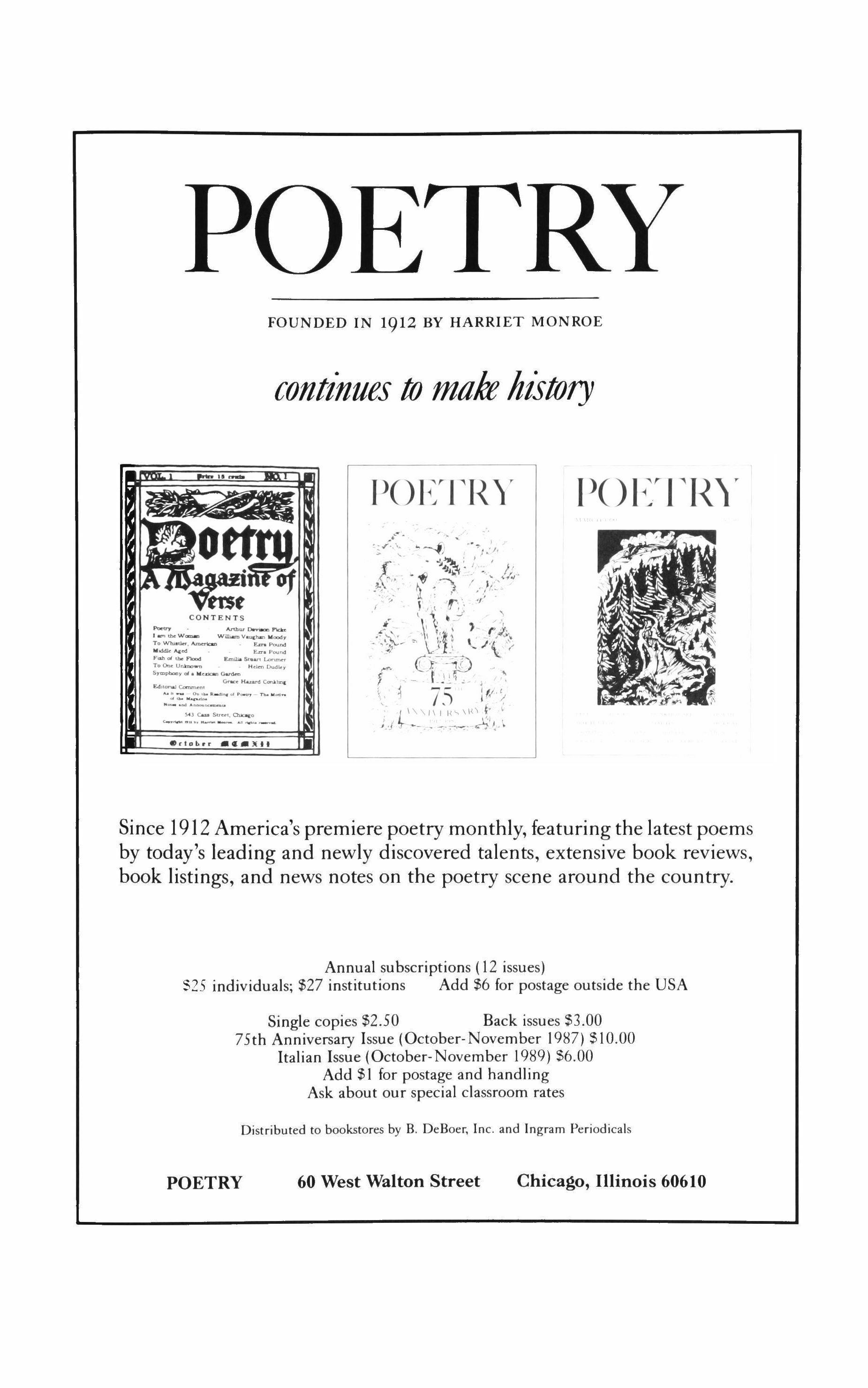
CONTENTS
Poonrp Anh", 0-...0.."""", r..,tJxw_ woo-..v_,_, TuWh>01J<o.� it<nPt>un<l ed eaop"",.., FOoI:l<oi_1"b>d 1?.mlJ.i.os....-,L..orur.n Too...u� HolmDuda., SY"'�yol.III<�o.ro.., t::.:IOIoneJ Ccmm o...c. tu.ard �lq ::.
.rlabIJr :11:11
Since 1912 America's premiere poetry monthly, featuring the latest poems by today's leading and newly discovered talents, extensive book reviews, book listings, and news notes on the poetry scene around the country.
Annual subscriptions (12 issues) 525 individuals; $27 institutions Add $6 for postage outside the USA
Single copies 52.50 Back issues 53.00 75th Anniversary Issue (October-November In7) 510.00 Italian Issue (October- November 1989) 56.00 Add 51 for postage and handling Ask about our special classroom rates
Distributed to bookstores by B. DeBoer, Inc. and Ingram Periodicals
60
::.".::::�
I)()I(1-'Rl' I)()ErI � I{)
oj p..... Tk
POETRY
West Walton Street Chicago, Illinois 60610
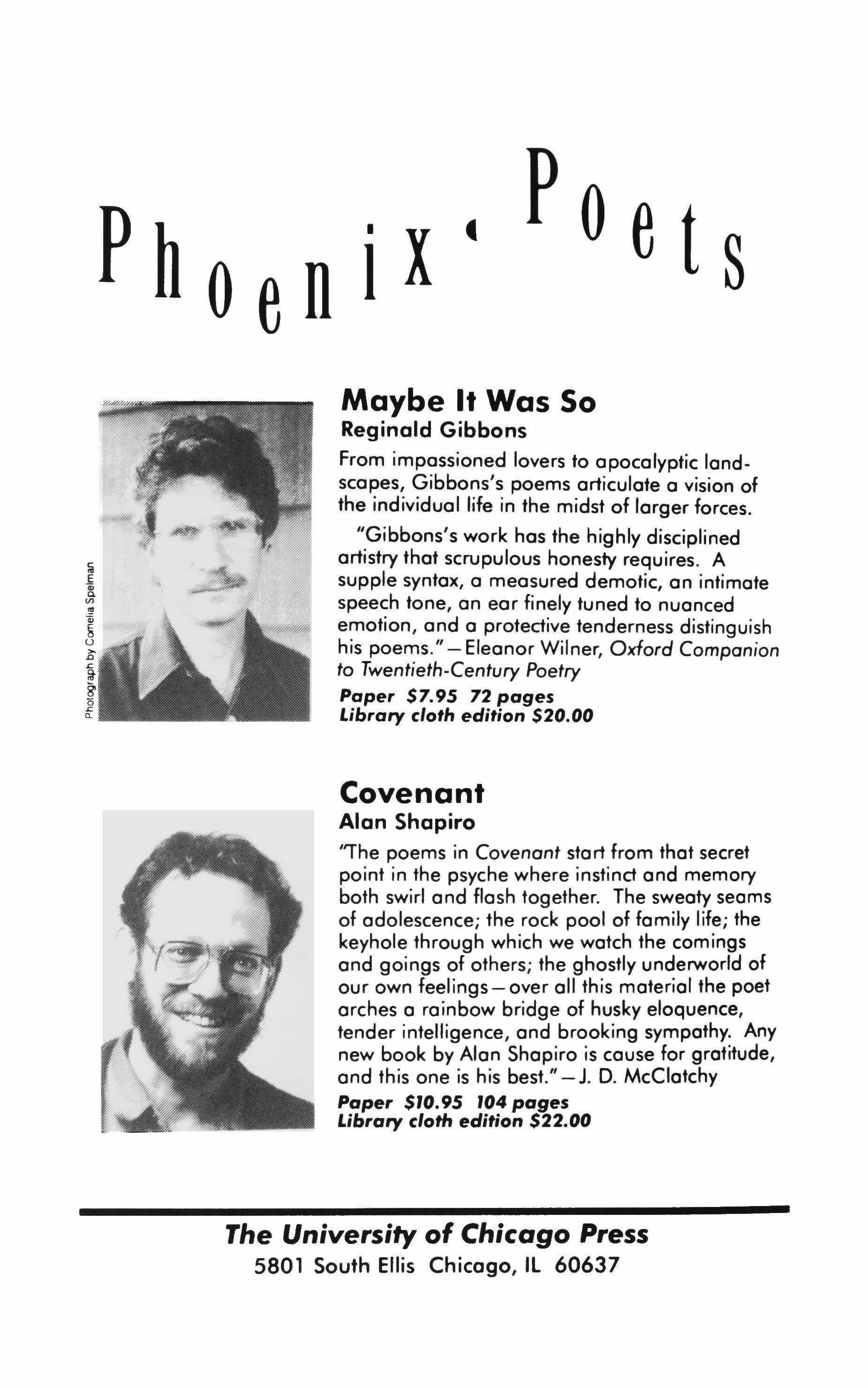
Maybe It Was So Reginald Gibbons
From impassioned lovers to apocalyptic landscopes, Gibbons's poems articulate a vision of the individual life in the midst of larger forces.
"Gibbons's work has the highly disciplined artistry that scrupulous honesty requires. A supple syntax, a measured demotic, an intimate speech tone, an ear finely tuned to nuanced emotion, and a protective tenderness distinguish his poems." - Eleanor Wilner, Oxford Companion to Twentieth-Century Poetry
Paper $7.95 72 pages
Library cloth edition $20.00
Covenant
Alan Shapiro
"The poems in Covenant start from that secret point in the psyche where instinct and memory both swirl and flash together. The sweaty seams of adolescence; the rock pool of family life; the keyhole through which we watch the comings and goings of others; the ghostly underworld of our own feelings - over all this material the poet arches a rainbow bridge of husky eloquence, tender intelligence, and brooking sympathy. Any new book by Alan Shapiro is cause for gratitude, and this one is his best." -J. D. McClatchy
Paper $10.95 104 pages
Library cloth edition $22.00 The University of Chicago Press 5801 South Ellis Chicago, Il 60637
IT WAS FEVER THAT MADE THE WORLD
Jim Powell
"His title burns away everywhere in the volume, in the fevers of eros, divination, memory, destruction, and grief. Page for page, there is more sheer fine, clear, yet syntactically subtle and metaphorically gorgeous writing in Powell than I have seen in some time."
-Mary Kinzie
Paper $8.95 88 pages (loth $20.00

THE RESTORERS
w. S. Oi Piero
"W. S. Di Piero's The Restorers is a collection of poems one wonts to call religious, so intense is each poem's evocation of holiness in life's moments These are poems of our time and place, redolent with crafty expression, passionate with concern for our health. Poetry has always been among the great restorers of our spirit, and here, again, it is so."
- Dove Smith
Paper $8.95 88 pages (loth $19.95
(.
THE UNIVERSITY OF CHICAGO PRESS 5801 SOUTH ElliS CHICAGO,ll 60637
Harriet Rubin's Mother's Wooden Hand
Susan Hahn
"Harriet Rubin's Mother's Wooden Hand is a superb book, passionate and moving, yet put together with considerable elegance and control. I found it gripping and consistently involving. A very remarkable first book."-Frank Bidart
Paper $8.95 96 pages
Cloth $22.00
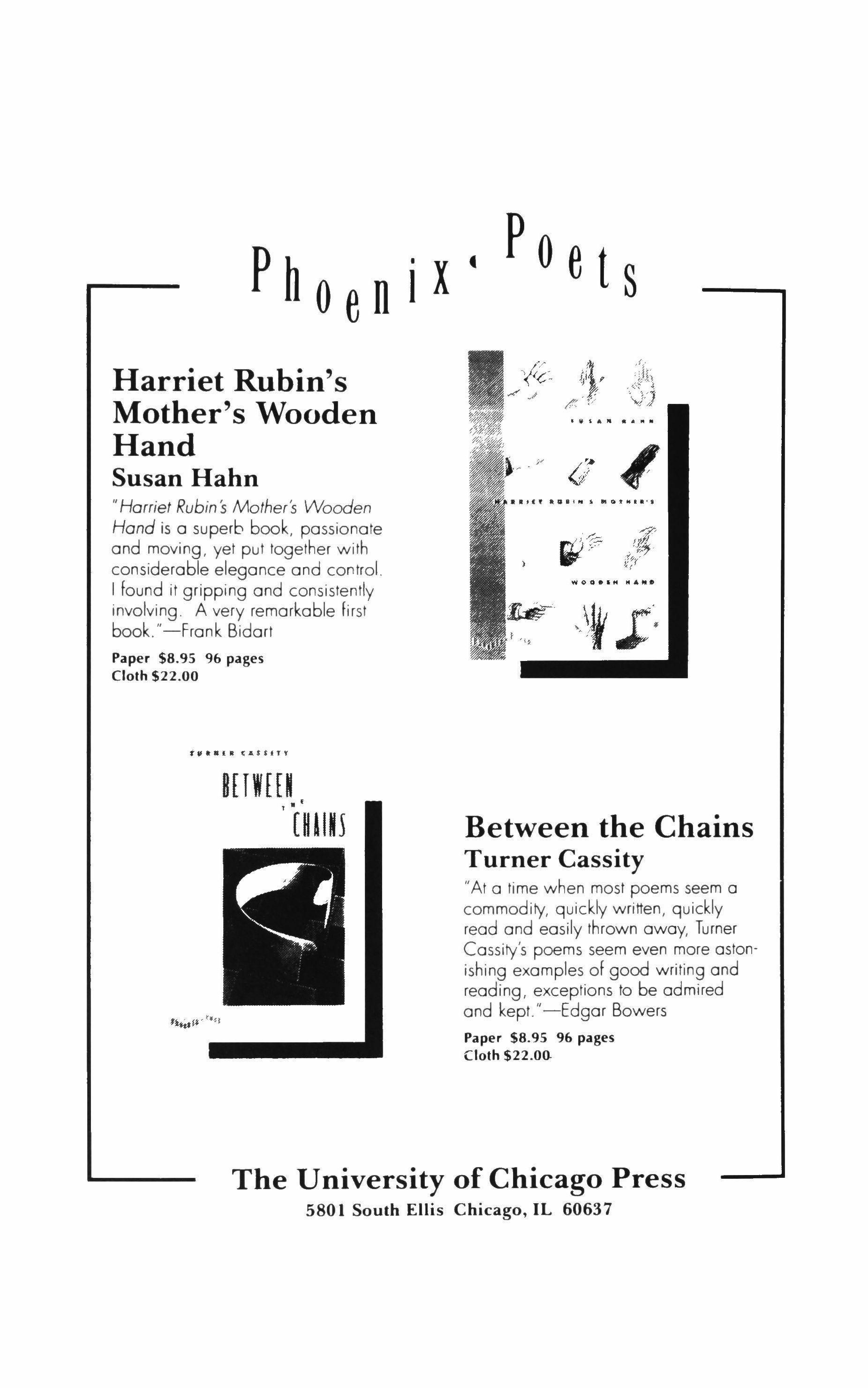
Between the Chains Turner Cassity
"At a time when most poems seem a commodity, quickly written, quickly read and easily thrown away, Turner Cassity's poems seem even more aston· ishing examples of good writing and reading, exceptions to be admired and kept."-Edgar Bowers
Paper $8.95 9& pages Cloth $22.00.
IHWHI 'rUIN� .y t/ ,
5801 South Ellis
The University of Chicago Press
Chicago,IL 60637
SENECA REVIEW
Vol. XXIV, No.2
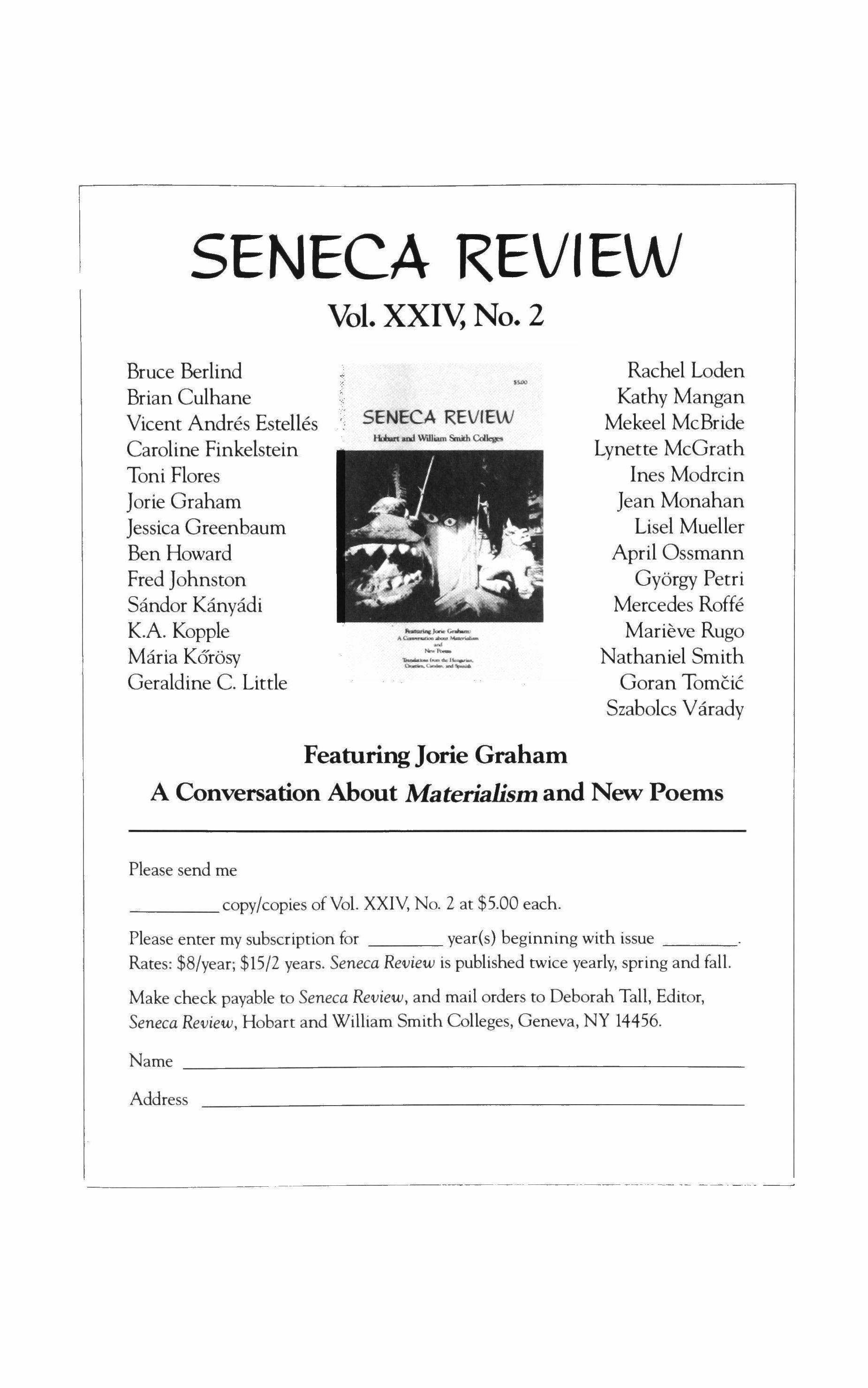
Bruce Berlind
Brian Culhane
Vicent Andres Estelles
Caroline Finkelstein
Toni Flores
Jorie Graham
Jessica Greenbaum
Ben Howard
Fred Johnston
Sandor Kanyadi
K.A. Kopple
Maria K6rosy
Geraldine C. Little
Featuring jorie Graham
Rachel Loden
Kathy Mangan
Mekeel Mcbride
Lynette McGrath
Ines Modrcin
Jean Monahan
Lisel Mueller
April Ossmann
Gyorgy Petri
Mercedes Roffe
Marieve Ruga
Nathaniel Smith
Goran Tomcic
Szabalcs Varady
A Conversation About Materialism and New Poems
Please send me
copy/copies of Vol. XXIV, No.2 at $5.00 each.
Please enter my subscription for year{s) beginning with issue
Rates: $8/year; $15/2 years. Seneca Review is published twice yearly, spring and fall.
Make check payable to Seneca Review, and mail orders to Deborah Tall, Editor, Seneca Review, Hobart and William Smith Colleges, Geneva, NY 14456.
Name
Address
A�� .__!.....,I� O""O""�""'1!rpoooWo
SENECA REVIEW
For a literary feast to delight your friends and colleagues all year long, this season give
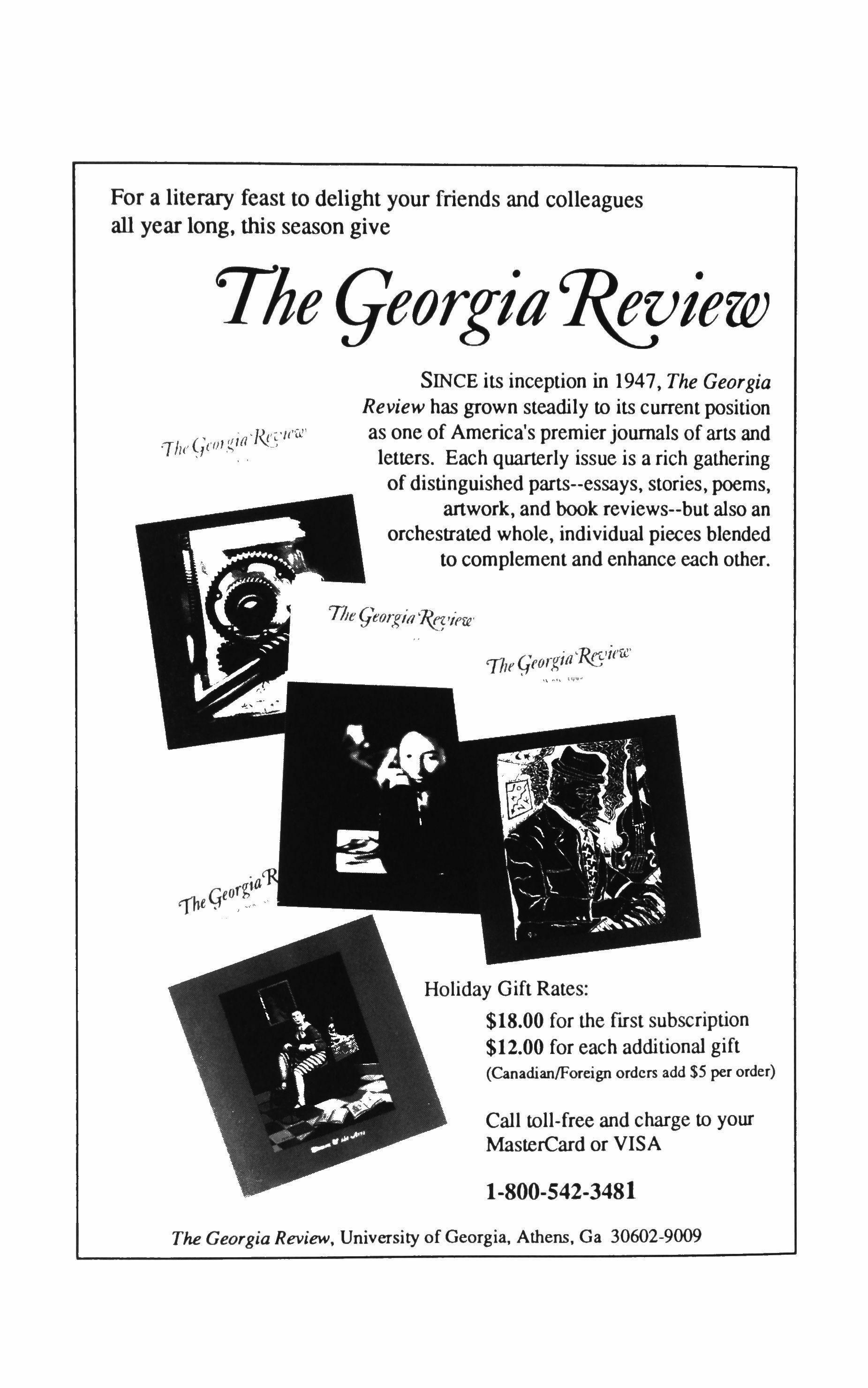
SINCE its inception in 1947, The Georgia Review has grown steadily to its current position as one of America's premierjournals of arts and letters. Each quarterly issue is a rich gathering of distinguished parts-essays, stories, poems, artwork, and book reviews-but also an orchestrated whole, individual pieces blended to complement and enhance each other.
for the first subscription $12.00 for each additional gift (Canadian/Foreign orders add $5 per order)
Thegeorgia�iew 'Thl'(i(1I1gi{l'J���'/I'U!'
7]lfGforJ!,i(l'l�'yil"&' '\�" ",'OJ $18.00
Call toll-free
to your MasterCard or VISA 1-800-542-3481 The Georgia Review. University of Georgia, Athens, Ga 30602-9009
and charge
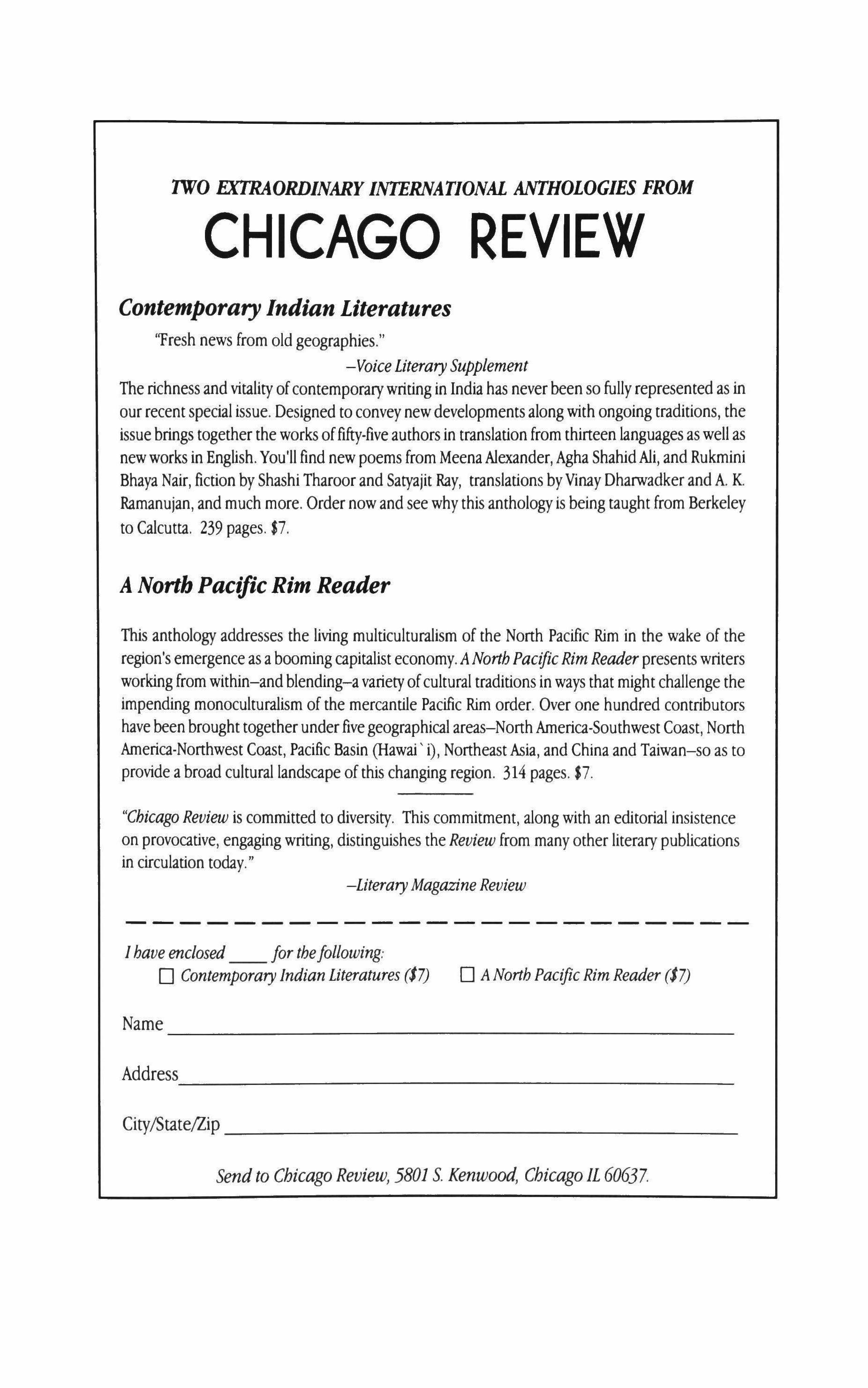
CHICAGO REVIEW
Contemporary Indian Literatures
''Fresh news from old geographies."
-Voice LiterarySupplement
The richness and vitality ofcontemporarywriting in India has never been so fullyrepresented as in our recent special issue. Designed to convey new developmentsalong with ongoing traditions, the issue bringstogether the worksoffifty-five authors in translation from thirteen languages as well as new works in English. You'll find new poems from Meena Alexander,Agha ShahidAli, and Rukmini Bhaya Nair, fiction by Shashi Tharoor and Satyajit Ray, translations byVinay Dharwadker and A. K
Ramanujan, and much more. Order now and see why this anthology is beingtaught from Berkeley to Calcutta. 239 pages. $7.
A North Pacific Rim Reader
This anthology addresses the living multiculturalism of the North Pacific Rim in the wake of the region's emergence as a boomingcapitalist economy. ANorth PacificRim Readerpresents writers working from within-and blending-avariety ofcultural traditions in ways that mightchallenge the impending monoculturalism of the mercantile Pacific Rim order. Over one hundred contributors have been broughttogetherunder fivegeographical areas-North America-Southwest Coast, North America-Northwest Coast, Pacific Basin (Hawai' i), Northeast Asia, and China and Taiwan-so as to provide a broad cultural landscape ofthis changing region. 314 pages. $7.
"Chicago Review is committed to diversity. This commitment, along with an editorial insistence on provocative, engaging writing, distinguishes the Review from many other literarypublications in circulation today.
-LiteraryMagazine Review
Ihave enclosed for thefollowing: o Contemporary Indian Literatures ($7) 0 A North Pacific Rim Reader ($7)
Name Address
City/State/Zip
Send to Chicago Review, 5801 S. Kenwood, Chicago II 60637.
1WO EXTRAORDINARY INTERNATIONAL ANTHOLOGIES FROM

The best of the best.
The Pushcart Prize XIX Best of the Small Presses featured more works from The Kenyon Review than from any other publication. * Congratulations to these prizewinning KR authors: Lynda Hull, "Suite for Emily"; Ha [in, "In Broad Daylight"; Fatima Lim Wilson, "Inventing the Filipino"; Khaled Mattawa, "Watermelon Review"; JaneMiller, "Countryside".
u�� Revi ..1.."'-'1. 1.yOn Mew First with the Best
SHENANDOAH
THE WASHINGTON AND LEE UNIVERSITY REVIEW
SHENANDOAH
Betty Adcock
Neal Bowers
Frederick Busch
Fred Chappell
Philip Dacey
Northrop Frye
Brendan Galvin
Donald Hall
Seamus Heaney
William Hoffman
Andrew Hudgins
X. J. Kennedy
Nanci Kincaid
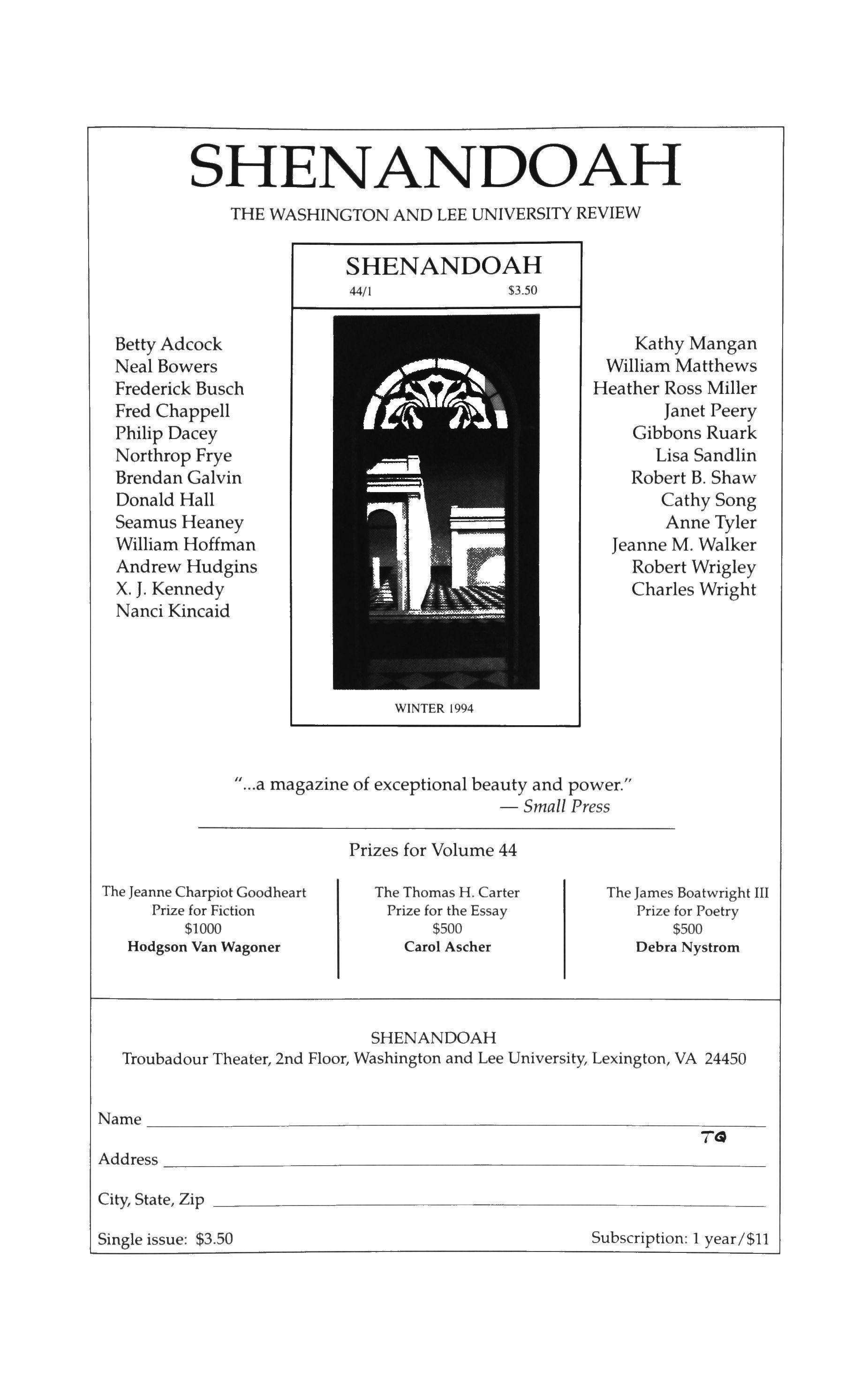
Kathy Mangan
William Matthews
Heather Ross Miller
Janet Peery
Gibbons Ruark
Lisa Sandlin
Robert B. Shaw
Cathy Song
Anne Tyler
Jeanne M. Walker
Robert Wrigley
Charles Wright
$1000 Hodgson Van Wagoner
Prizes for Volume 44
The Thomas H. Carter Prize for the Essay
$500 Carol Ascher
SHENANDOAH
$500
Debra Nystrom
Troubadour Theater, 2nd Floor, Washington and Lee University, Lexington, VA 24450
Narne Address
City, State, Zip
44/1 WINTER 1994 $3.50
"".a magazine of exceptional beauty and power." - Small Press
The Jeanne Charpiot Goodheart Prize for Fiction
The James Boatwright III Prize for Poetry
Subscription:
Single issue: $3.50
1 year/$11
E v I E w

R I z N S H 0 RTF C T o N $1000 FOR THE WINNING STORY
ALL FINALISTS PUBLISHED IN FALL 1996 MISSISSIPPI REVIEW
JUROR TO BE ANNOUNCED
(PREVIOUS JURORS: VERONICA GENG, AMY HEMPEL)
GUIDELINES: DEADLINE IS MARCH 31, 1996. NONREFUNDABLE ENTRY FEE IS $10 PER STORY, LIMIT TWO STORIES PER AUTHOR ($20). MAKE CHECK/MONEY ORDER PAYABLE TO MISSISSIPPI REVIEW PRIZE. NO MS RETURNED. CONTEST OPEN TO ALL US WRITERS EXCEPT STUDENTS OR EMPLOYEES OF USM. PREVIOUSLY PUBLISHED OR ACCEPTED WORK INELIGIBLE. MAXIMUM 6500 WORDS (25 PAGES), TYPED, DOUBLE-SPACED. AUTHOR, STORY TITLE, AND "MISSISSIPPI REVIEW PRIZE ENTRY" SHOULD BE ON PAGE ONE. INCLUDE SASE FOR LIST OF WINNERS. THE MISSISSIPPI REVIEW PRIZE ISSUE WILL BE AVAILABLE TO COMPETITORS AT A REDUCED RATE ($5). ISSUE SCHEDULED FOR FALL 1996. AA/EOE
------------� 1
MISSISSIPPI R
P
9 9
ENTRIES ACCEPTED SEPT 1, 1995 1996 MISSISSIPPI REVIEW PRIZE UN IV E R S I TV 0 F SOU THE R N MIS SIS SIP P I BOX 5144, HATTIESBURG, MS39406-5144 6 E
An
Audio Series on American Poets and Their Art

Introduction • A. R. Ammons John Ashbery
Gwendolyn Brooks Rita Dove • Allen Ginsberg
Maxine Kumin James Merrill W. S. Merwin
Sharon Olds Adrienne Rich Karl Shapiro
Gary Soto Charles Wright
Produced, written, and hosted by Joseph Parisi, Editor of Poetry
Fourteen half-hour programs on seven cassettes with a joo-page Listener's Guide, including a biographical-critical essay on each poet, complete texts of all poems read in the series, and bibliographies.
Complete set in library slipcase: $85.00. (Cassettes only: $65.00. Listener's Guide only: $9.95. Slipcase only: $10.00.)
(Postage and handling: $3.00.)
Modern Poetry Association
60 West Walton Street Chicago, IL 60610
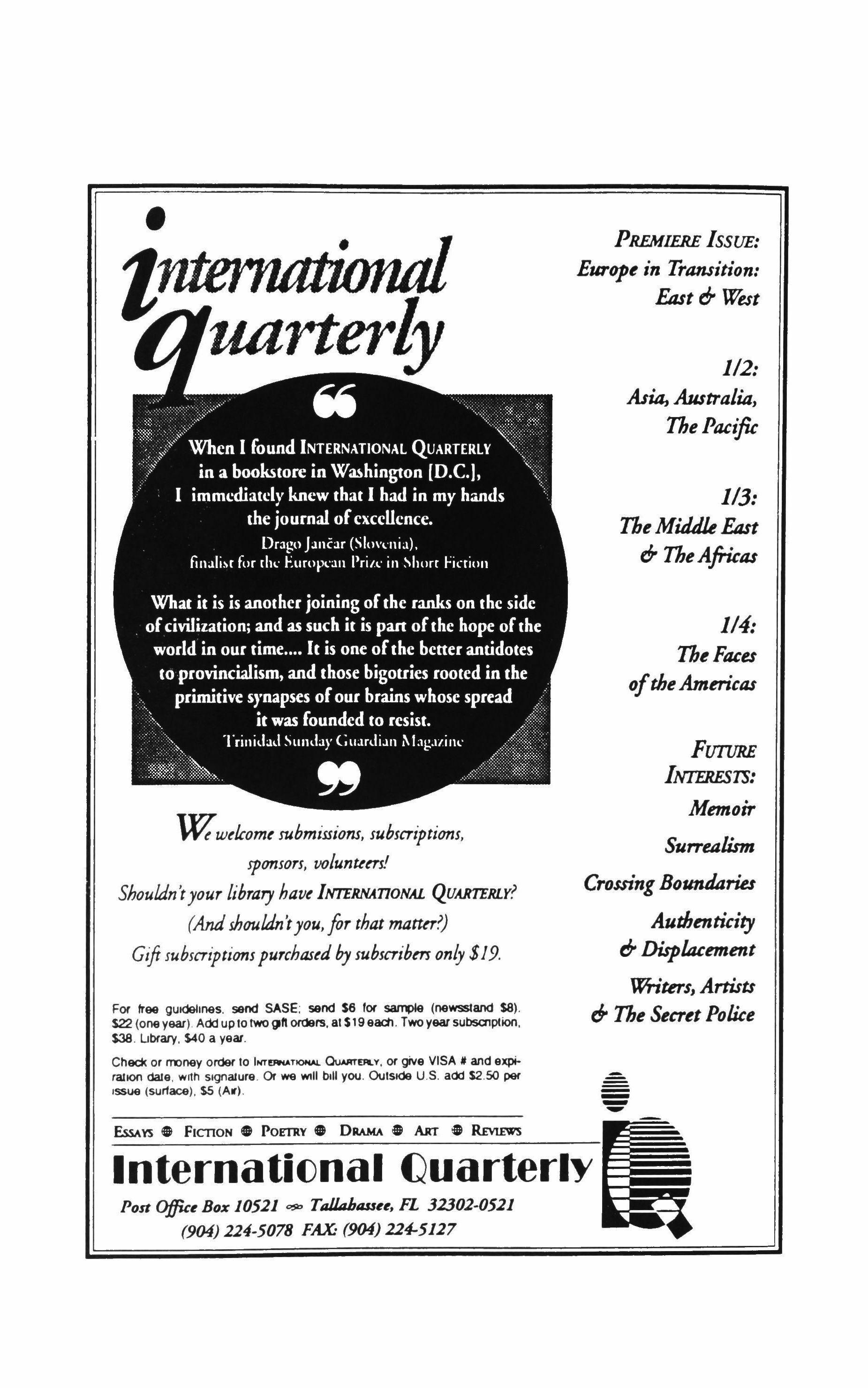
welcome submissions, subscriptions, ponsors, va/unum
Shouldn'tyour library bao« INTERNA170NAL QUARTERLY?
(Andshouldn'tyou,for that matteri)
Giftsubscriptionspurchasedbysubscriber: only $19,
For free guidelines, send SASE; send $6 for sample (newsstand $8). S22 (one year). Add upto two IJft ortlars, at $1geacll. Two yearsubsalption, $38. Llbraty. $40 a yeas.
Chad< or rroney order to INT TIONAl. OuARrEFLY, or give VISA II and expirallOtl dale. wrth signalure. Or we will bill you. Outside U.S. add $2.50 per ISSue (surface), 55 (Aw).
W
PREMIERE ISSUE: Europe in Transition: East & West 1/2: Asia, Australia, ThePacifo 113: TheMiJJJeEast & TheAfricas 1/4: The Faces oftheAmericas FU11JRE INTERESTS: Memoir SUTTealism Crossing BounJarieJ Authenticity & DisplAcement writers, Artists rf The Secret Police-EssAYS. F,cnON. POE1llY. DRAMA. ART • RrnEws II�!!�1�2�_��,.�:�!2�rIY (904) 224-5078 FAN (904) 224-5127
MICHIGAN QUARTERLY REVIEW
PRESENTS A SPECIAL ISSUE FALL 1995/ WINTER 1996
THE MOVIES: A CENTENNIAL ISSUE
EDITED BY LAURENCE GOLDSTEIN AND IRA KONIGSBERG
ESSAYS: Michael Anderegg on Orson Welles; Leo Braudy on method acting and 50s films; Alexander Cohen on future technology; Bonnie Friedman on The Wizard of Oz; Tom Gunning on technologies of vision; William Harrison on being a screenwriter in Hollywood; Diane Kirkpatrick on the use of movie materials in modern art, with a portfolio; Ira Konigsberg on psychoanalysis and film; Martin Marks on music in Casablanca and The Maltese Falcon; Arthur Miller: a memoir of the movies; William Paul on the changing screen; Andrew Sarris on sound film and the studios; Gaylyn Studlar on fan magazines and star persona; Alan West on film and opera.
REVIEWS: Thomas Doherty on animated film; Laurence Goldstein on new books about masculinity and the male body in film; Poonam Arora on multi-cultural cinema.
ARCHIVAL MATERIAL: "Success," a treatment in story form by Aldous Huxley; an essay by H.D. on Garbo; a defense of censorship by Vachel Lindsay; a memoir by Samuel Marx on producing at M-G-M the first film about the atomic bomb.
POETRY: Tom Andrews, Margaret Atwood, Daniela Crasnaru, Lynn Emmanuel, David Lehman, Mordechai Geldmann, Ira Sadoff, Diann Blakely Shoaf, Gisela von Wysocki, Charles Webb, S. L. Wisenberg, David Wojahn, and others.
FICTION: Kathleen de Azevedo, Laura Antillano, Jim Shepard, Eugene Stein, and others.

For the two volumes of "Movies" send a check for $16 (includes postage and handling) to: Michigan Quarterly Review, 3032 Rackham Building, University of Michigan, Ann Arbor, M I 48109-1070
CONTEMPORARY LITERATURE
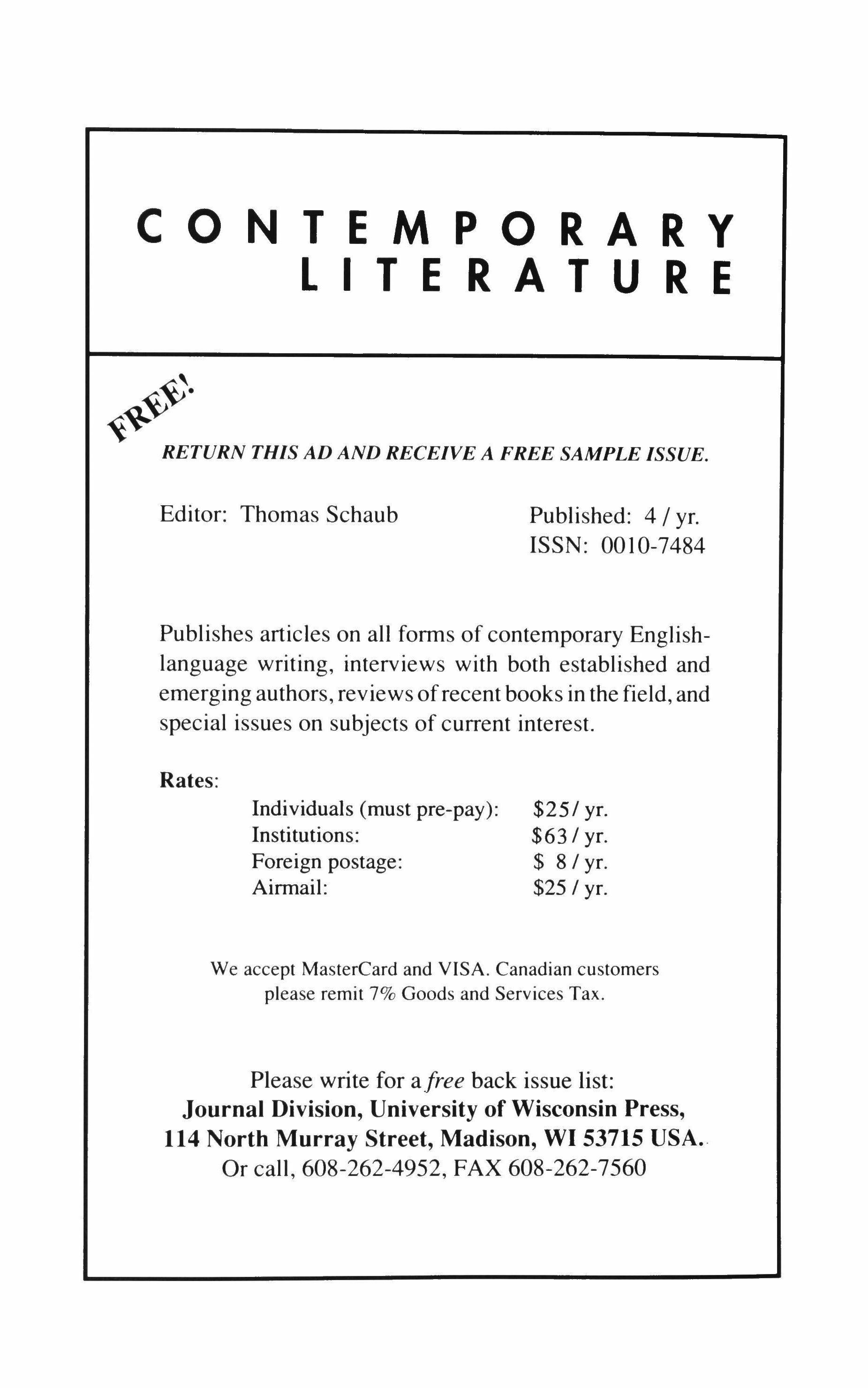
RETURN THIS AD AND RECEIVE A FREE SAMPLE ISSUE.
Editor: Thomas Schaub
Published: 4/ yr.
ISSN: 0010-7484
Publishes articles on all forms of contemporary Englishlanguage writing, interviews with both established and emerging authors, reviews of recent books in the field, and special issues on subjects of current interest.
Rates:
Individuals (must pre-pay): Institutions: Foreign postage: Airmail:
$25/yr.
$63/ yr.
$ 8/ yr.
$25/ yr.
We accept MasterCard and VISA. Canadian customers please remit 7% Goods and Services Tax.
Please write for afree back issue list:
Journal Division, University of Wisconsin Press, 114 North Murray Street, Madison, WI 53715 USA. Or call, 608-262-4952, FAX 608-262-7560
��.��
JACK KEROUAC IS PREGNANT
stories
by Aurelie Sheehan
"Dramatic collisions of images, swerving versions of what is called 'the truth,' and audacious shifts in tone make Aurelie Sheehan's debut collection of stories something exhilarating to read, extraordinary to hold inside."
-Carole Maso
"Jack Kerouac Is Pregnant is a marvelous introduction to Aurelie Sheehan's musical, muscular prose. She writes about the explosive warfare between women and men with heartbreak and naughty delight."
-Jerome Charyn
Too smart to be secretaries, too pregnant to be on the road, Sheehan's characters experiment with varying degress of rebellion and "pansyhood."

from your bookstore or from Dalkey Archive Press 4241 lllinois State University Normal, IL 61790-4241 (309) 438-7555
$19.95
$19.95 cloth, ISBN 1-56478-060-0
Available
cloth

I THE PREPRESS AWARDS Volume Two
Michigan Voices
Through these offbeat, quirky stories and F")cIllS, thirty-one cmerging Michigan writers speak to us of strange bedfellows, a dead grandmother with a gun, the bizarre side of Hollywood, and much more.
"An immenselygratifying read. Delivers the bigger truth." - Jack Driscoll "A book full of home truths, clearly articulated." - Charles Baxter.
"What good reading! A delightful and memorable collection." - Herbert Scott
Available in bookstores this fall.
ISBN 0-96:16327-I-X S II.95 softcover
PrePress Publishing of Michigan 1'0 Box 2153, Portage, Michigan 49081-2153.
a nonprofit equat-OPl'orttu1lty .. michigan cOllncilfor projectfur.tcd by
arts and ntln".allljfai,..
THE JAMES JONES
FIRST NOVEL FELLOWSHIP
The James Jones Society announces an annual $2,500 award for a first unpublished novel. Submission deadline: March 1, 1996. For eligibility and submission rules, send a SASE to:
The James Jones Society C/O Chairperson English Department Wilkes University Wilkes-Barre, PA 18766.
EfI
�
The Prose Poem
AN INTERNATIONAL JOURNAL
THE CHURCH OF INSOMNIA
The huge congregation is in the dark. The altar is a bed with a canopy. The minister reads by candlelight the works ofJonathan Edwards. Ifyou listen hard, you'll hear pages being turned, the ash of his cigarette falling into the abyss.
The cat with the mouse in its mouth is simply passing through.
- Charles Simic

A magazine exlusively devoted to "that which is neither poetry nor prose, but both," THE PROSEPOEM offers a lively annual forum for new work by contemporary writers from home and abroad, reviews of recent books ofexceptional interest and significance, and occasional theoretical commentaries on the form. Some recent contributors include:
Jack Anderson
Robert Bly
Russell Edson
David Ignatow
Sybil James
Naomi Shihab Nye
Yannis Ritsos
Charles Simic
Volume 4: Special Russell Edson Feature
All correspondence and subscriptions should be directed to Peter Johnson, The Prose Poem: An InternationalJournal, English Department, Providence College, Providence, RI 02918. Manuscripts will be considered only between January 1 and April 1 of each year. Unsolicited work submitted before January 1 will be returned. While we welcome submissions, we ask that you please include SASE and a two sentence biographical note and that you limit your submission to no more than five poems.
To subscribe or order a copy, please use the form below and send to: The Prose Poem: An International Journal, English Department, Providence College, Providence, RI 02918. Make checks payable to Providence College.
o Please send me copy/copies of The Prose Poem: An International Journal, Volume 4, at $8.00 each.
o Please enter my subscription for two years at $12.00 and begin it with Volume 4.
o Please send a sample copy at $4.00.
Name:
Address:

j;eaturing the writings of Djuna Barnes, Jean Valentine, Kimiko Hahn, Sheila Kohler, Marjorie Agosfn Kate Braverman, Marie Sheppard Williams, James Still, Gary Metras, Tanya Palmer, Jill Gonet, Penelope Scambly Schott, Sybil Kollar, Renee Ashley, Margaret Randall, etc.
Frederick Smock, Editor
1Xg·38
tAMERICAN VOICE 'Tenth LA"nniversary Issue
available at bookstores or by subscription ($15) to 332 West Broadway Louisville, KY 40202
 EDITED BY BOB PERLONGO
EDITED BY BOB PERLONGO
Finally-An Almanac To Read. iEVERYDAY �ALMANAC
}\ fOltiolis (olllltendiulIl of Facts! I?igtu·es and FIUI 1111011' till' l-lIh'I'I·Sl'. :\Iont':r. SIIOI·tloi. tht' Zodhu-. Tim!'. P"ts. :\'ilh .• Iok.,s. AI" illlIl mudl 1ll01"l'! SIC 0 N DID I , ION THE UPDATED SOURCE BOOK FOR EVERYONE ISBN 0-88496-398-5/468 pp. / $15.95 ph. / Puh.: Sept. '95 CAPRAqpPRESS Box 2068, Santa Barbara, CA 93120 (Distributed to the trade by CONSORTIUM BooK SALES, SI. Paul, MN 8001283-3572)
TriQuarterly thanks the following past donors and life subscribers:
David C. Abercrombie
Mr. and Mrs. Walter L. Adams
Amin Alimard
Lois Ames
Richard H. Anderson
Roger K. Anderson
Sandy Anderson
I. N. C. Aniebo
Anonymous
University of Arizona Poetry Center
Gayle Arnzen
Michael Attas
Asa Baber
Hadassah Baskin
Tom G. Bell
Sandra Berris
Simon J. Blattner, Jr.
Mr. and Mrs. Andrew K. Block
Louise Blosten
Carol Bly
Susan DeWitt Bodemer
Kay Bonetti
Robert Boruch
Mr. and Mrs. Richard S. Brennan
Van K. Brock
Gwendolyn Brooks
Timothy Browne
Paul Bundy
Eric O. Cahn
David Cassak
Stephen Chapman
Anthony Chase
Michael Chwe
Willard Cook
Mr. and Mrs. William Cottle
Robert A. Creamer
Andrew Cyr
Doreen Davie
Kenneth Day
Mark W. DeBree
Elizabeth Des Pres
Anstiss Drake
J. A. Dufresne
Mr. and Mrs. Donald Egan
John B. Elliott
Christopher English
Carol Erickson
Steven Finch
David R. Fine

Mr. and Mrs. H. Bernard Firestone
Melvin P. Firestone, M.D.
Mr. and Mrs. Solway Firestone
Paul Fjelstad
Torrence Fossland
Mr. and Mrs. C. Dwight Foster
Jeffrey Franklin
Martha Friedberg
Peter S. Fritz
Mrs. Angela M. Gannon
Kathy M. Garness
Robert Gislason
Mr. and Mrs. Stanford J. Goldblatt
Lawrence J. Gorman
Maxine Groffsky
Jack Hagstrom
Mrs. Donald Haider
Mrs. Heidi Hall-jones
Mrs. James E. Hayes
Joanna Hearne
Ross B. Heath
Charles Hedde
Gene Helton
Donald Hey
Donald A. Hillel
Mr. and Mrs. David C. Hilliard
Mr. and Mrs. Thomas D. Hodgkins
Craig V. Hodson
Irwin L. Hoffman
Irwin T. Holtzman
P. Hosier
Mary Gray Hughes
Charles Huss
Curtis Imrie
Helen Jacob
Del Ivan Janik
Fran Katz
Gary Michael Katz
Dr. Alfred D. Klinger
Loy E. Knapp
Sydney Knowlton
Mr. and Mrs. Martin Koldyke
Mr. and Mrs. Carl A. Kroch
Greg Kunz
Judy Kunz
Conrad A. Langenberg
John Larroquette
Isaac Lassiter
Dorothy Latiak
Elizabeth Leibik
Patrick A. Lezark
Patricia W. Linton
Philip Lister
Mr. and Mrs. W. J. Lorentz de Haas
Kubet Luchterhand
Ellen L. Marks
Richard Marmulstein
James Marquardt
Charles T. Martin, Jr.
Ms. Jane Mayer
Kevin McCanna
Robert D. McChesney
Charles Gene McDaniel
Martin H. McGrath
Robert McMillan
Mr. and Mrs. Andrew McNally
Michael Meaney
George Meredith
Lois Adele Meyer
Cliff Michel Gallery
University of Michigan Hopwood Room
Michal Miller
Ralph Miller
Kenneth Monroe
William T. Morgan
James E. Morrison IV
Max Nathan
Dean Neprud
Fred S. Novy
Catherine Ohs
Lenrie Peters
Paul Peters and Rosemarie Kozdron
Scott Peters
Jane Petro
Lee Phillip
Mrs. Marlene Welsh Phillips
Evelyn Pine
Doyle Pitman
Fran Podulka
Geraldine R. Pratt
Alex T. Primm
Richard Prinz, M.D.
Honora Rankine-Galloway
Anne Katheryn Ream
J. M. Reese
Peter Reich
Susan Reiners
Don Reynolds
Mary Ellen Reynolds
Christopher Richter
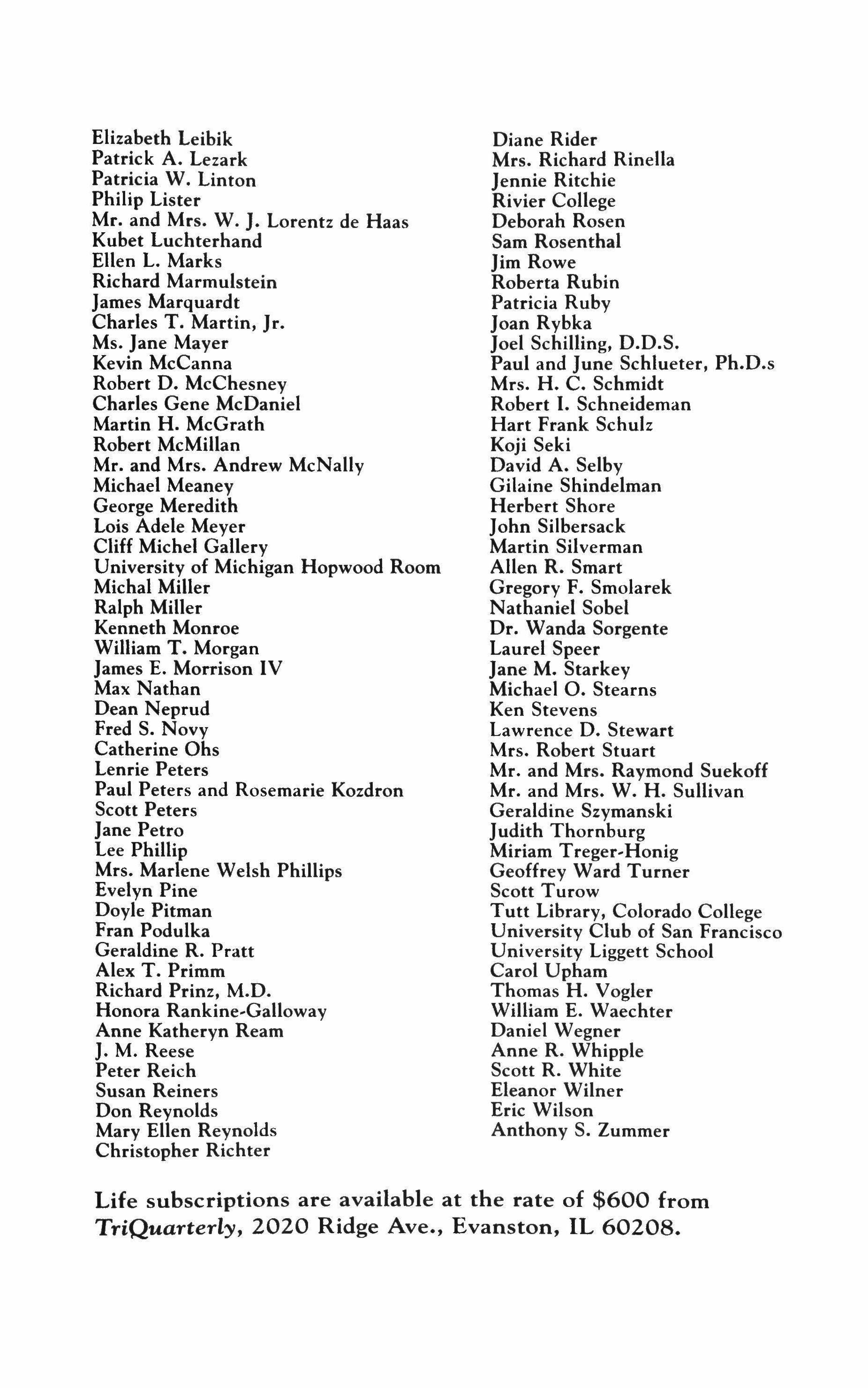
Diane Rider
Mrs. Richard Rinella
Jennie Ritchie
Rivier College
Deborah Rosen
Sam Rosenthal
Jim Rowe
Roberta Rubin
Patricia Ruby
Joan Rybka
Joel Schilling, D.D.S.
Paul and June Schlueter, Ph.D.s
Mrs. H. C. Schmidt
Robert l. Schneideman
Hart Frank Schulz
Koji Seki
David A. Selby
Gilaine Shindelman
Herbert Shore
John Silbersack
Martin Silverman
Allen R. Smart
Gregory F. Smolarek
Nathaniel Sobel
Dr. Wanda Sorgente
Laurel Speer
Jane M. Starkey
Michael O. Stearns
Ken Stevens
Lawrence D. Stewart
Mrs. Robert Stuart
Mr. and Mrs. Raymond Suekoff
Mr. and Mrs. W. H. Sullivan
Geraldine Szymanski
Judith Thornburg
Miriam Treger-Honig
Geoffrey Ward Turner
Scott Turow
Tutt Library, Colorado College
University Club of San Francisco
University Liggett School
Carol Upham
Thomas H. Vogler
William E. Waechter
Daniel Wegner
Anne R. Whipple
Scott R. White
Eleanor Wilner
Eric Wilson
Anthony S. Zummer
Life subscriptions are available at the rate of $600 from TriQuarterly, 2020 Ridge Ave., Evanston, IL 60208.


































































































































































































































































































 EDITED BY BOB PERLONGO
EDITED BY BOB PERLONGO


